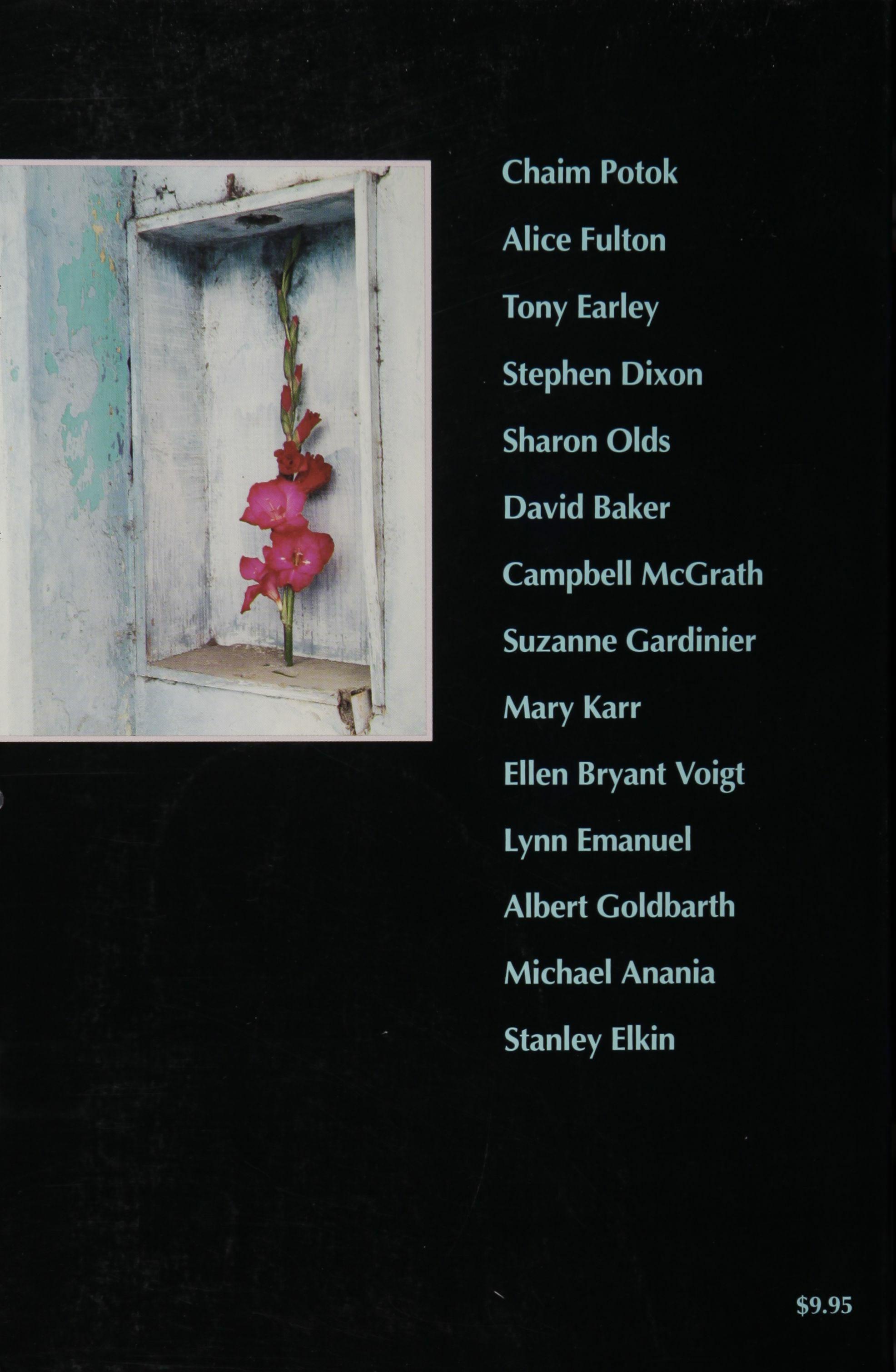
Publication of TriQuarterly is made possible in part by the donors of gifts and grants to the magazine. For their recent and continuing support, we are very pleased to thank the Illinois Arts Council, the John D. and Catherine T. MacArthur Foundation, the National Endowment for the Arts and many individual donors.
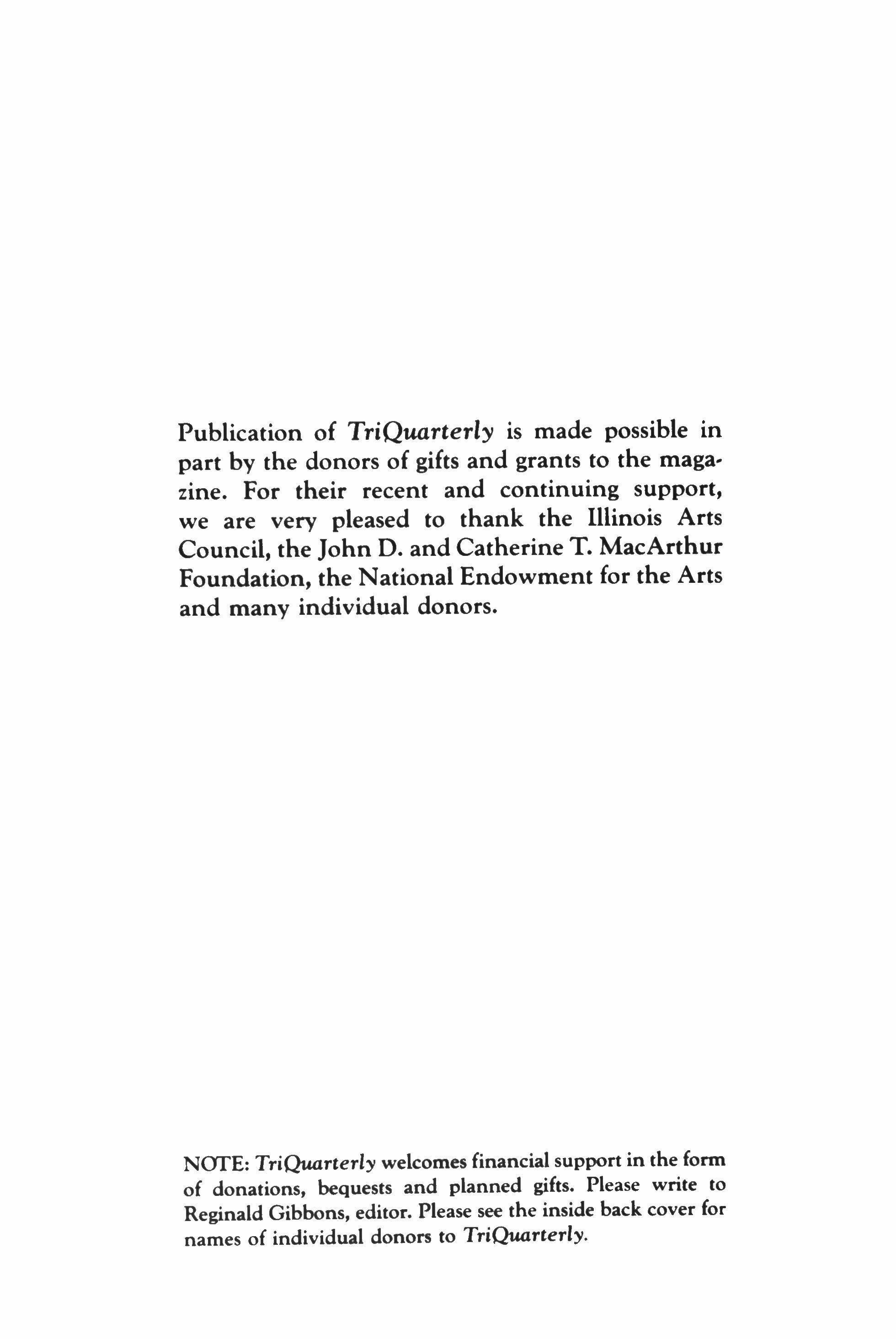
NOTE: TriQuarterly welcomes financial support in the form of donations, bequests and planned gifts. Please write to Reginald Gibbons, editor. Please see the inside back cover for names of individual donors to TriQuarterly.
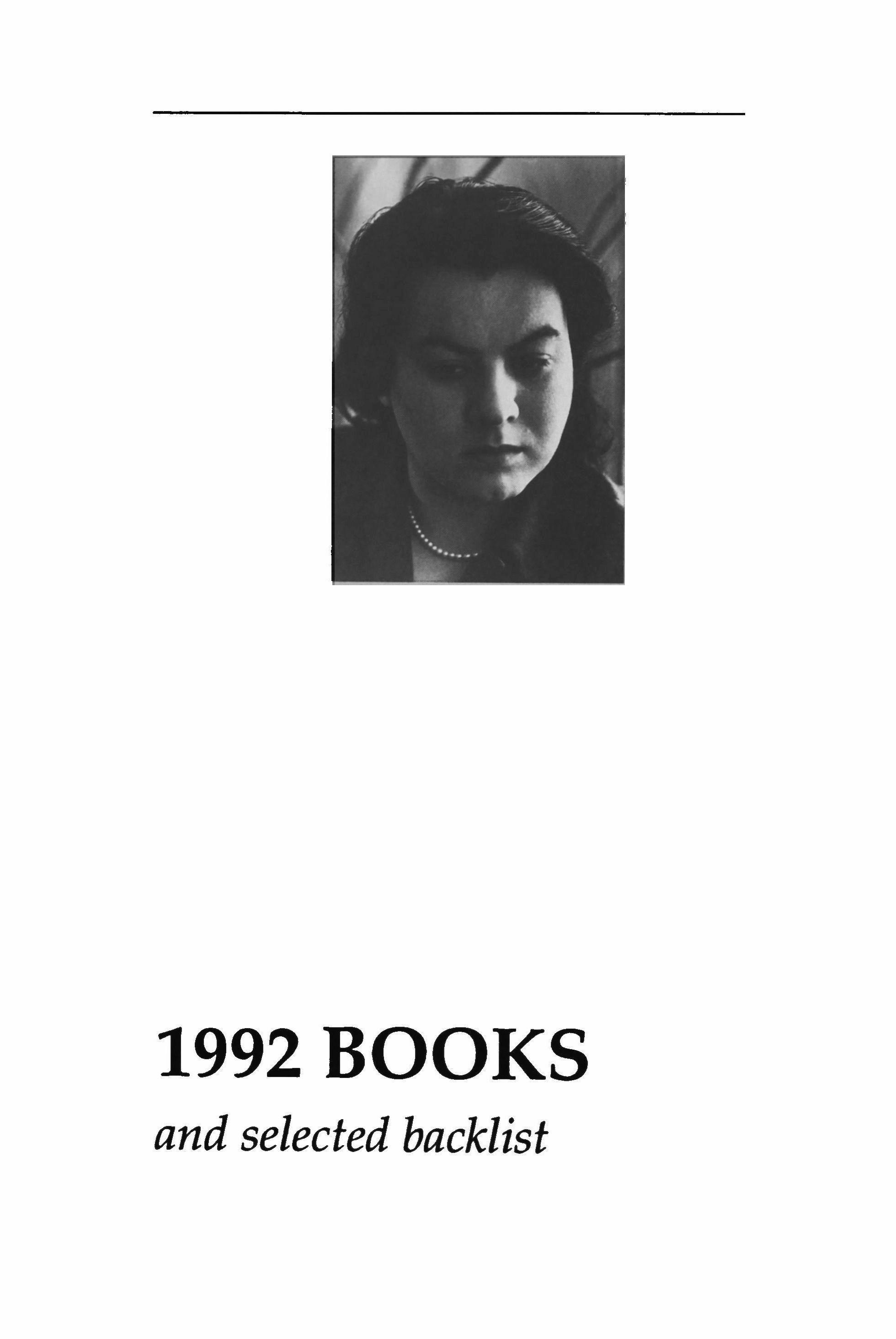
1992 BOOKS and selected backlist
MURIEL RUKEYSER
Out of Silence: Selected Poems
Edited by Kate Daniels
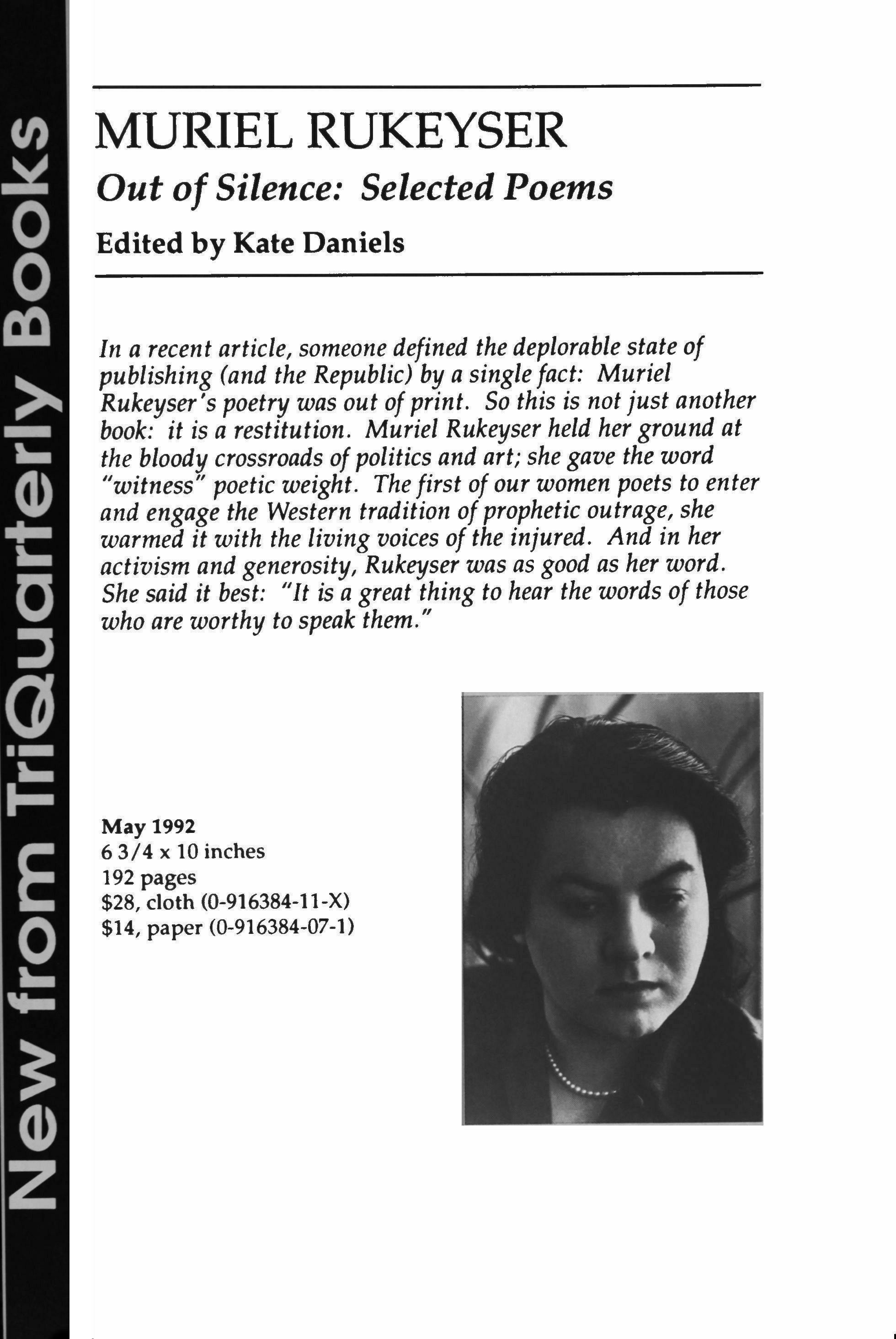
In a recent article, someone defined the deplorable state of publishing (and the Republic) by a singlefact: Muriel Rukeyser's poetry was out ofprint. So this is not just another book: it is a restitution. Muriel Rukeyser held her ground at the bloody crossroads ofpolitics and art; she gave the word "witness" poetic weight. The first of our women poets to enter and engage the Western tradition ofprophetic outrage, she warmed it with the living voices of the injured. And in her activism and generosity, Rukeyser was as good as her word. She said it best: "It is a great thing to hear the words of those who are worthy to speak them."
May 1992
6 3/4 x 10 inches
192 pages
$28, cloth (0-916384-11-X)
$14, paper (0-916384-07-1)
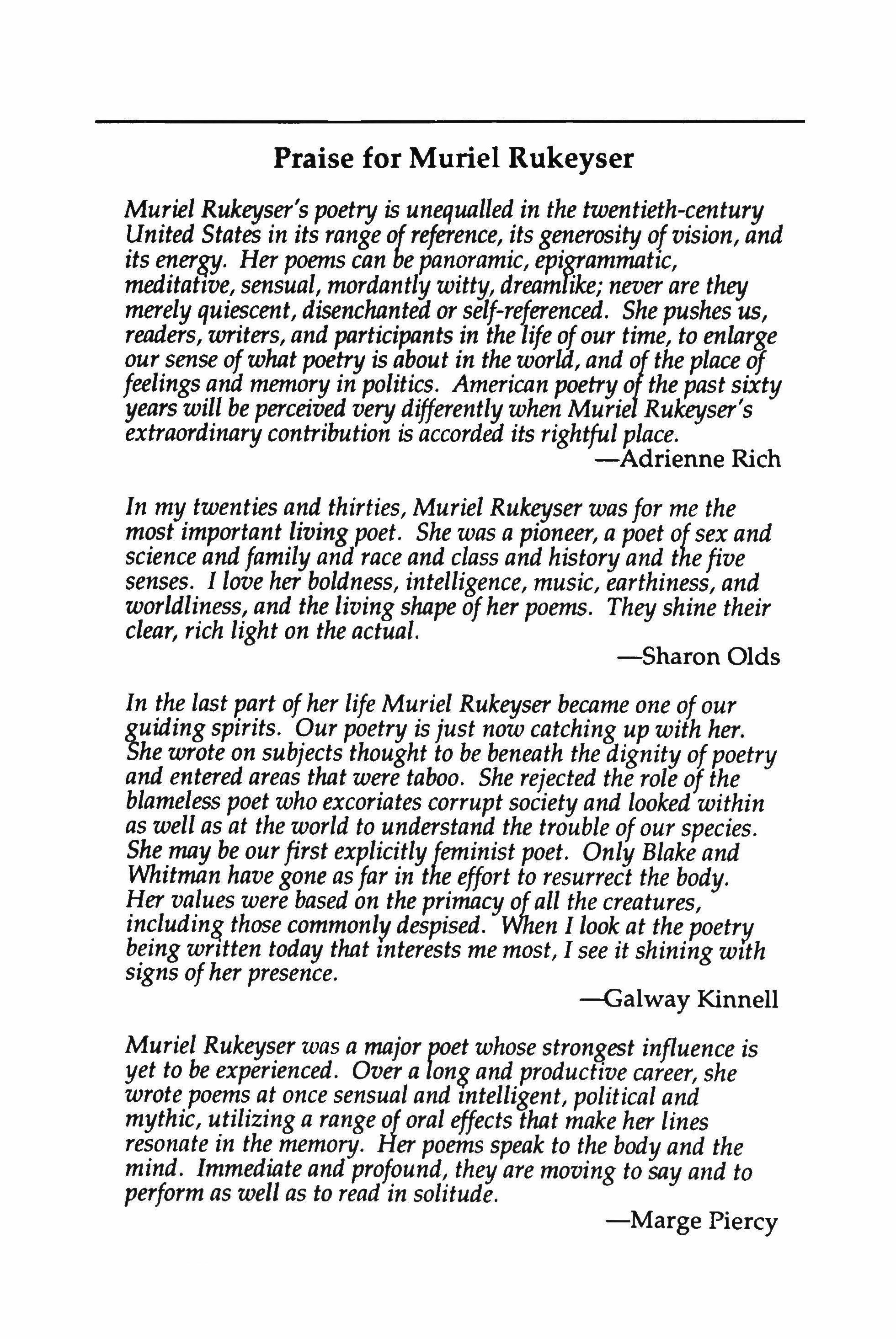
Praise for Muriel Rukeyser
Muriel Rukeyser's poetry is unequalled in the twentieth-century United States in its range ofreference, its generosity ofvision, and its energy. Her poems can be panoramic, epigrammatic, meditaiite, sensual, mordantly witty, dreamlike; never are they merely quiescent, disenchanted or self-referenced. She pushes us, readers, writers, and particip_ants in the life of our time, to enlarge our sense of what poetry is about in the worliJ, and
the place or feelings and memory in politics. American poetry 0 the past sixty years will be perceived very differently when Murie Rukeyser's extraordinary contribution is accorded its rightful place.
-Adrienne Rich
In my twenties and thirties, Muriel Rukeyser was for me the most important living poet. She was a pioneer, a poet of sex and science and family and race and class and history and thefive senses. I love her boldness, intelligence, music, earthiness, and worldliness, and the living shape ofher poems. They shine their clear, rich light on the actual.
-Sharon Oids
In the last part of her life Muriel Rukeyser became one of our guiding spirits. Our poetry is just now catching up with her. She wrote on subjects thought to be beneath the dignity of1?0etry and entered areas that were taboo. She rejected the role of the blameless poet who excoriates corrupt society and looked within as well as at the world to understand the trouble of our species. She may be our first explicitly feminist poet. Only Blake and Whitman have gone as far in the effort to resurrect the body. Her values were based on the primacy ofall the creatures, including those commonlydespised. When I look at the poetry being umiten today that interests me most, I see it shining With signs ofher presence.
-Galway Kinnell
Muriel Rukeyser was a major poet whose strongest influence is yet to be experienced. Over a long and productive career, she wrote poems at once sensual and intelligent, political and mythic, utilizing a range of oral effects that make her lines resonate in the memory. Her poems speak to the body and the mind. Immediate and profound, they are moving to say and to perform as well as to read in solitude.
-Marge Piercy
�
BRUCE WEIGL
What Saves Us
In these wrenching, elegant poems Bruce Weigl writes out of uncompromising memory and vision. His subject is both the transport and the anguish of being open to the lived and living moment. He writes of love, sex, violence, and the inhuman crossfire of historical forces. From bars and bedrooms, in Ohio and Nicaragua and Vietnam, his voice rises through the noise of history and habit to reach us with impeccable grace and remarkable invention. The images he discovers do not fade from our minds, and we are grateful for "what saves us" no matter who we are or where we have been.
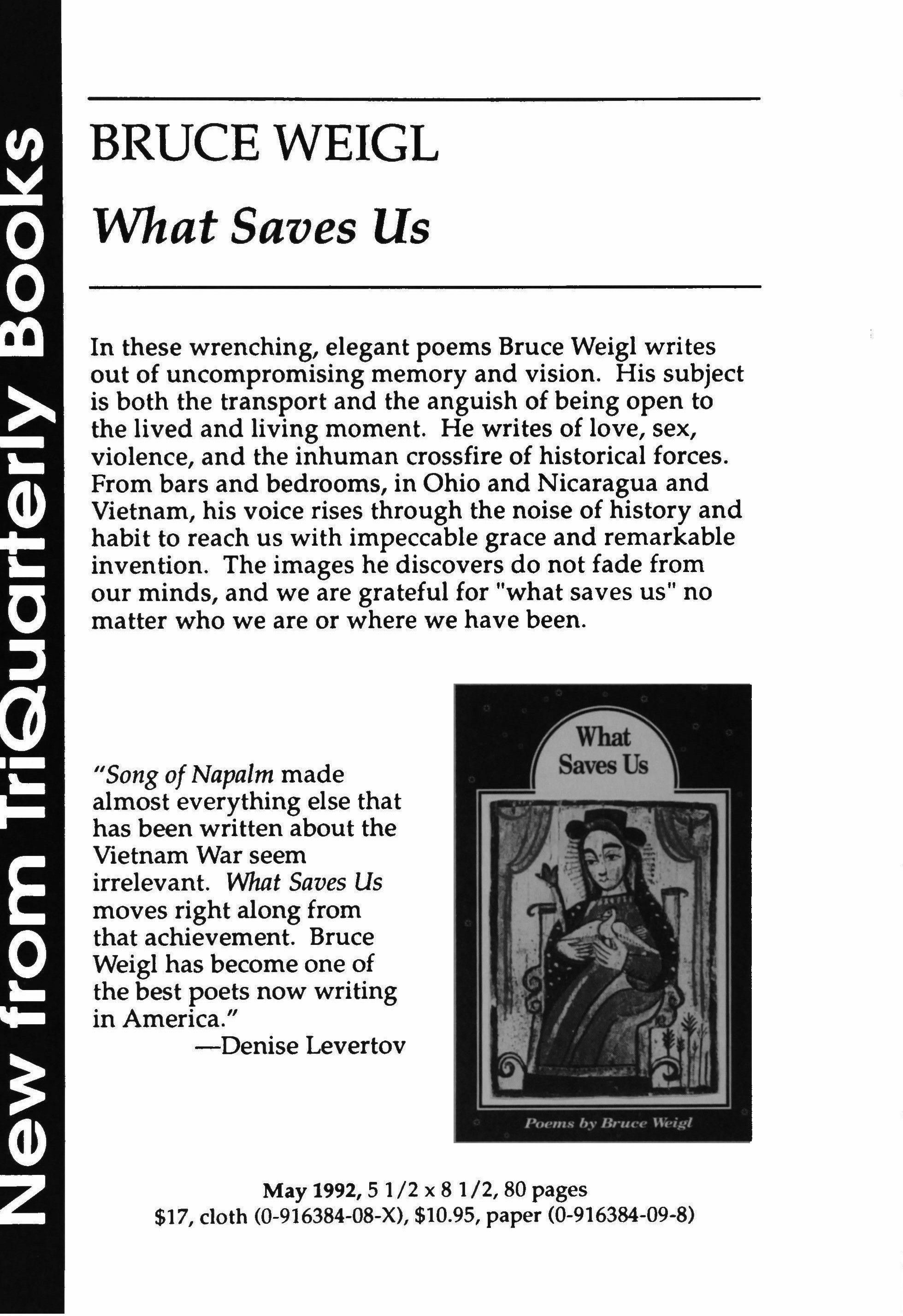
"Song ofNapalm made almost everything else that has been written about the Vietnam War seem irrelevant. What Saves Us moves right along from that achievement. Bruce Weigl has become one of the best poets now writing in America."
-Denise Levertov
May 1992, 5 1/2 x 8 1/2,80 pages $17, cloth (O-916384-08-X), $10.95, paper (0-916384-09-8)
Blues at the Equinox
In the shadows the woman dresses quietly, beyond light the parking lot spears through thin drapes, her heart inclined towards the miraculous.
What passes for love, the miles and the years and the rivers crossed no one could name, what passes for love is not always thefierce blessing the mortal lovers give�nd then grow palebut sometimes one heart robbing another in a rented room, a great sadness and a great happiness, at the same time, descending.
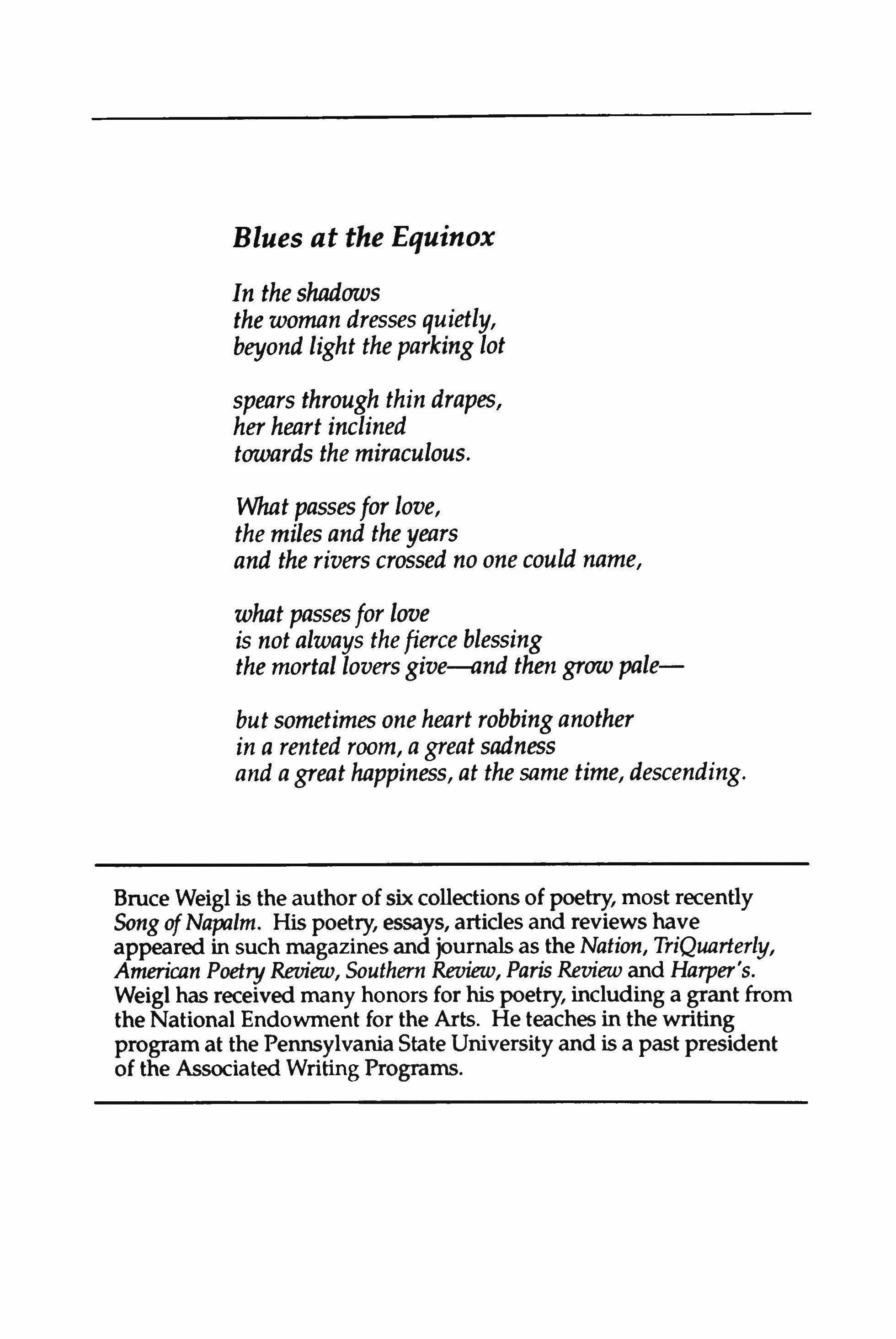
Bruce Weigl is the author ofsix collections of poetry, most recently Song ofNapalm. His poetry, essays, articles and reviews have appeared in such magazines and journals as the Nation, TriQuarterly, American Poetry Review, Southern Review, Paris Review and Harper's. Weigl has received many honors for his poetry, including a grant from the National Endowment for the Arts. He teaches in the writing program at the Pennsylvania State University and is a past president of the Associated Writing Programs.
Fiction of the Eighties
edited by Reginald Gibbons and Susan Hahn
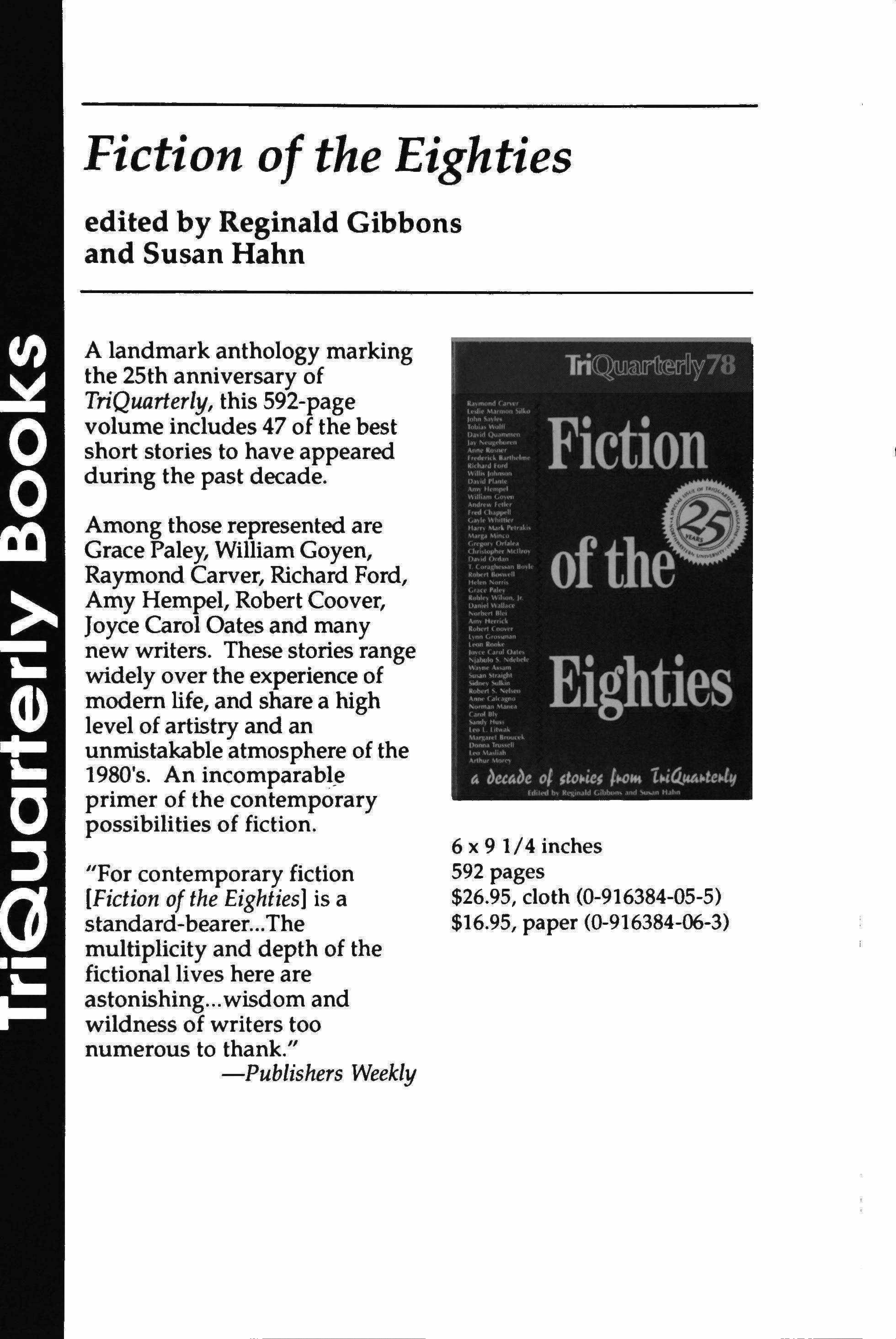
A landmark anthology marking the 25th anniversary of TriQuarterly, this 592-page volume includes 47 of the best short stories to have appeared during the past decade.
Among those represented are Grace Paley, William Goyen, Raymond Carver, Richard Ford, Amy Hempel, Robert Coover, Joyce Carol Oates and many new writers. These stories range widely over the experience of modem life, and share a high level of artistry and an unmistakable atmosphere of the 1980's. An incomparable primer of the contemporary possibilities of fiction.
"For contemporary fiction [Fiction of the Eighties] is a standard-bearer The multiplicity and depth of the fictionallives here are astonishing wisdom and wildness of writers too numerous to thank."
-Publishers Weekly
6 x 91/4 inches
592 pages
$26.95, cloth (0-916384-05-5) $16.95, paper (0-916384-06-3)
LINDA McCARRISTON Eva-Mary
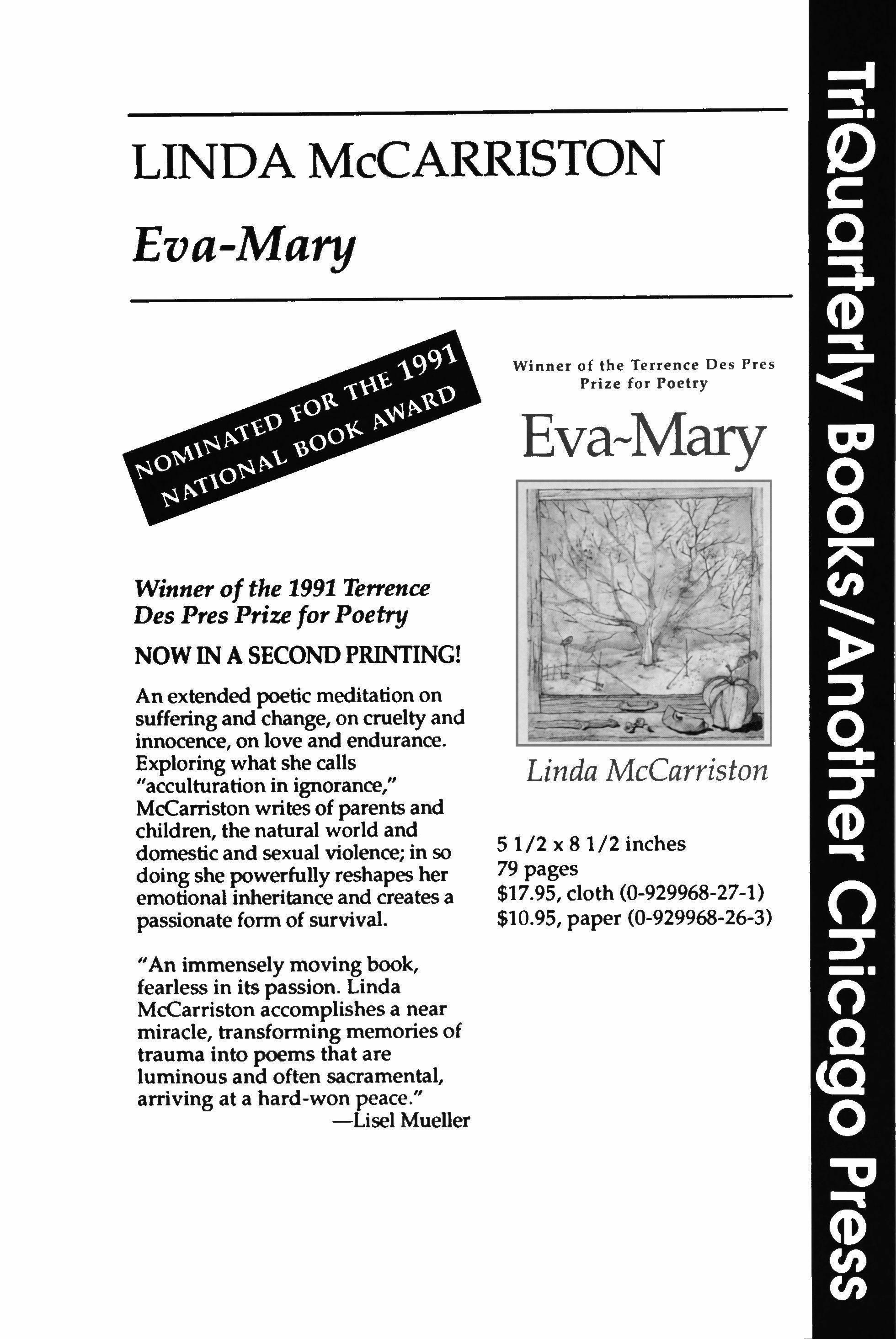
Winner of the 1991 Terrence Des Pres Prize forPoetry
NOW IN A SECOND PRINTING!
An extended poetic meditation on suffering and change, on cruelty and innocence, on love and endurance. Exploring what she calls "acculturation in ignorance," McCarriston writes of parents and children, the natural world and domestic and sexual violence; in so doing she powerfully reshapes her emotional inheritance and creates a passionate form of survival.
"An immensely moving book, fearless in its passion. Linda McCarriston accomplishes a near miracle, transforming memories of trauma into poems that are luminous and often sacramental, arriving at a hard-won peace."
-Lisel Mueller
51/2 x 81/2 inches
79 pages
$17.95, cloth (0-929968-27-1) $10.95, paper (0-929968-26-3)
Winner of the Terrence Des Pres Prize for Poetry
Eva-Mary
Linda McCarriston
GORDON WEAVER
Men Who Would Be Good
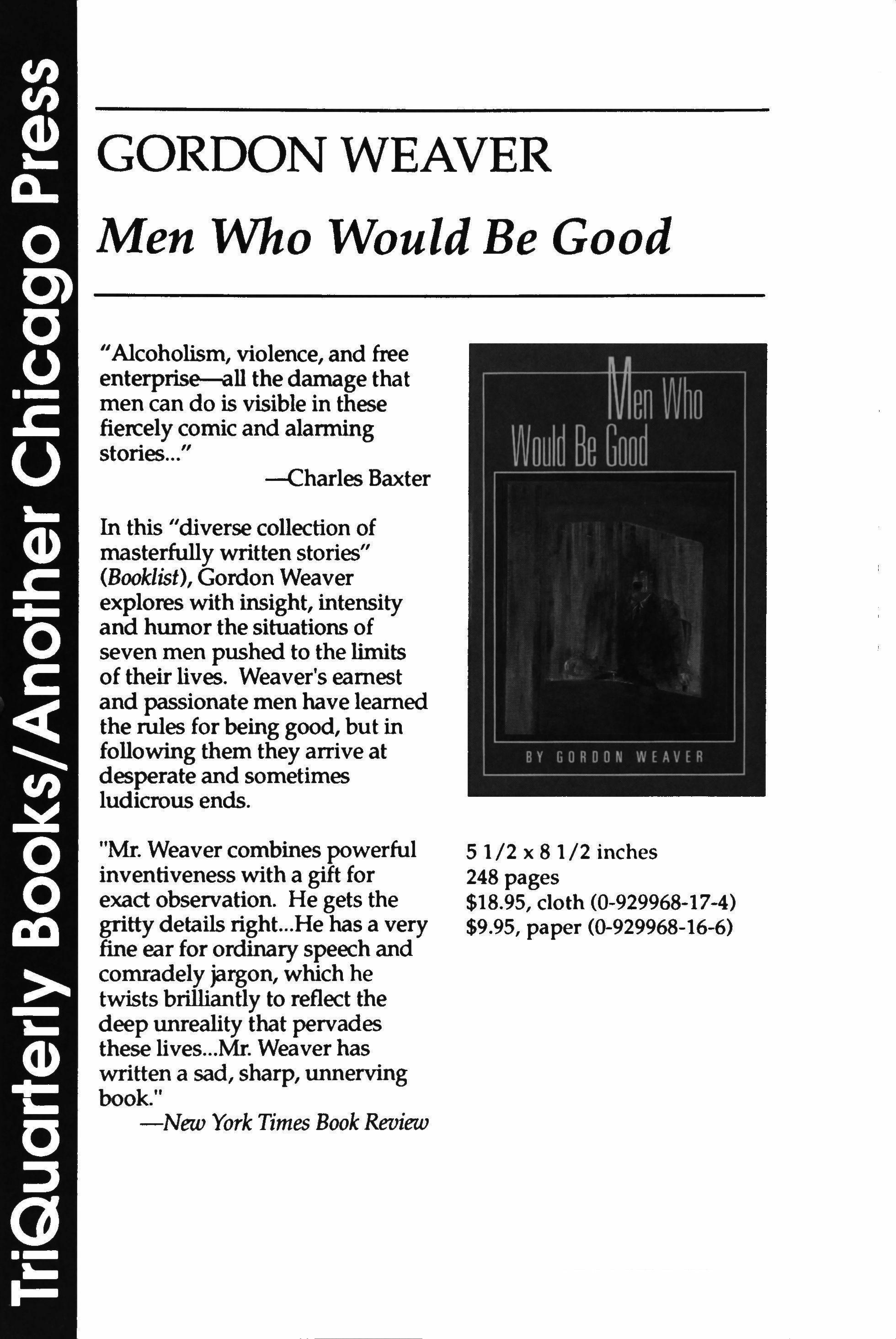
IIAlcoholism, violence, and free enterprise--all the damage that men can do is visible in these fiercely comic and alarming stories "
-Charles Baxter
In this "diverse collection of masterfully written stories" (Booklist), Gordon Weaver explores with insight, intensity and humor the situations of seven men pushed to the limits of their lives. Weaver's earnest and passionate men have learned the rules for being good, but in following them they arrive at desperate and sometimes ludicrous ends.
"Mr. Weaver combines powerful inventiveness with a gift for exact observation. He gets the gritty details right He has a very fine ear for ordinaryspeech and comradely jargon, which he twists brilliantly to reflect the deep unreality that pervades these lives Mr. Weaver has written a sad, sharp, unnerving book."
-New York Times Book Review
51/2 x 81/2 inches
248 pages
$18.95, cloth (0-929968-17-4)
$9.95, paper (0-929968-16-6)
E.S. GOLDMAN
Earthly Justice
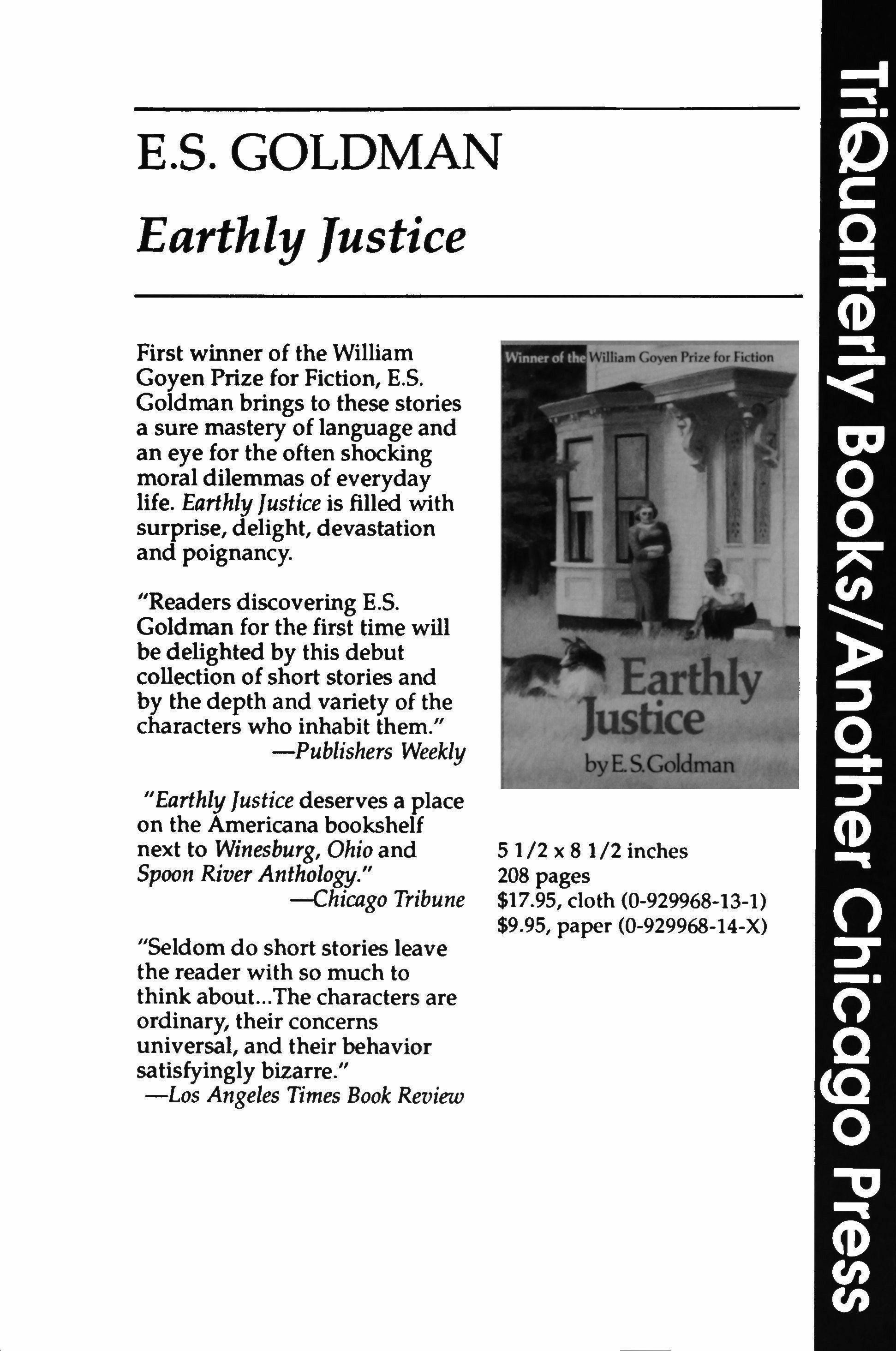
First winner of the William Goyen Prize for Fiction, E.S. Goldman brings to these stories a sure mastery of language and an eye for the often shocking moral dilemmas of everyday life. Earthly Justice is filled with surprise, delight, devastation and poignancy.
"Readers discovering E.S. Goldman for the first time will be delighted by this debut collection of short stories and by the depth and variety of the characters who inhabit them."
-Publishers Weekly
"Earthly Justice deserves a place on the Americana bookshelf next to Winesburg, Ohio and Spoon River Anthology."
-Chicago Tribune
"Seldom do short stories leave the reader with so much to think about...The characters are ordinary, their concerns universal, and their behavior satisfyingly bizarre."
-Los Angeles Times Book Review
51/2 x 81/2 inches
208 pages
$17.95, cloth (0-929968-13-1)
$9.95, paper (0-929968-14-X)
STANISLAW BARANCZAK
The Weight of the Body: Selected Poems
The first winner of the Terrence Des Pres prize for Poetry-these trenchant poems evoke the difficulty of life in Poland before the revolution of 1989 and the sadness of exile. Their astonishing force makes it possible for us to feel how it was in Poland, and-from a special point of view on our own society-what it is like to be living in the U.S. now.
74 pages
$16.95, doth (0-929968-02-6)
$8.95, paper (0-929968-01-8)
The Collected Poems ofSterlingA. Brown
selected by Michael S. Harper
Sterling A. Brown is a legend among writers, teachers and readers-an extraordinary poet, the founder of AfricanAmerican literary criticism and a great teacher and scholar. His poems have brought neglected but essential and precious subjects, tones of voice and poetic techniques into American poetry, and remain a living testament that will be read for generations.
280 pages
$9.95, paper (O-929968-O7-7)
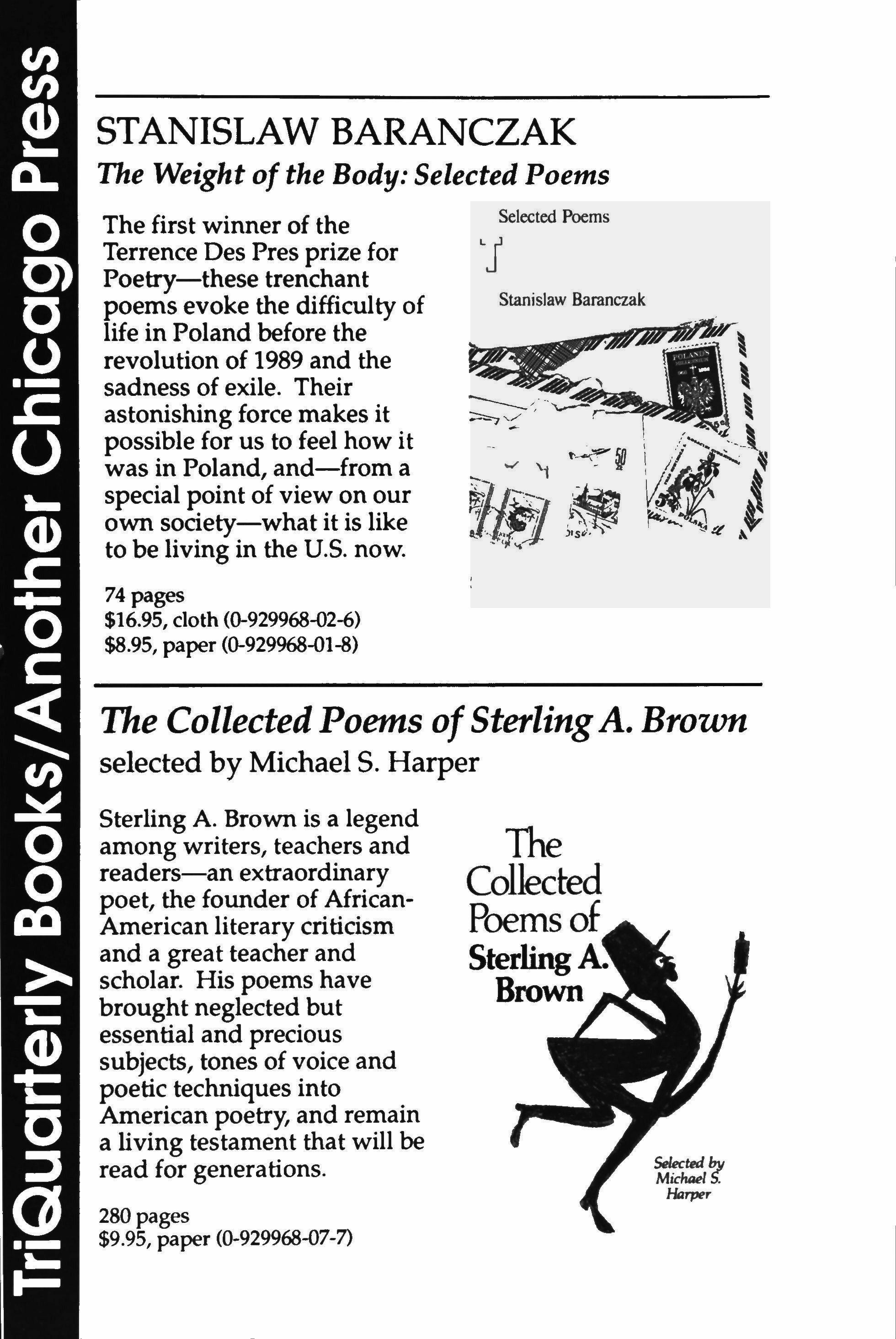
The Collected Poems of SterlingA. Brown
Selected Poems
Stanislaw Baranczak
Stephen Deutch, Photographer: From Paris to Chicago, 1932-1989
The gift book-with stunning photos of Chicago over decades of change, including Deutch's Pulitzernominated photos from the Daily News. This collection and analysis of Deutch's work, with plates both in duotone and in color, is the first full record of Deutch's achievement to be published.
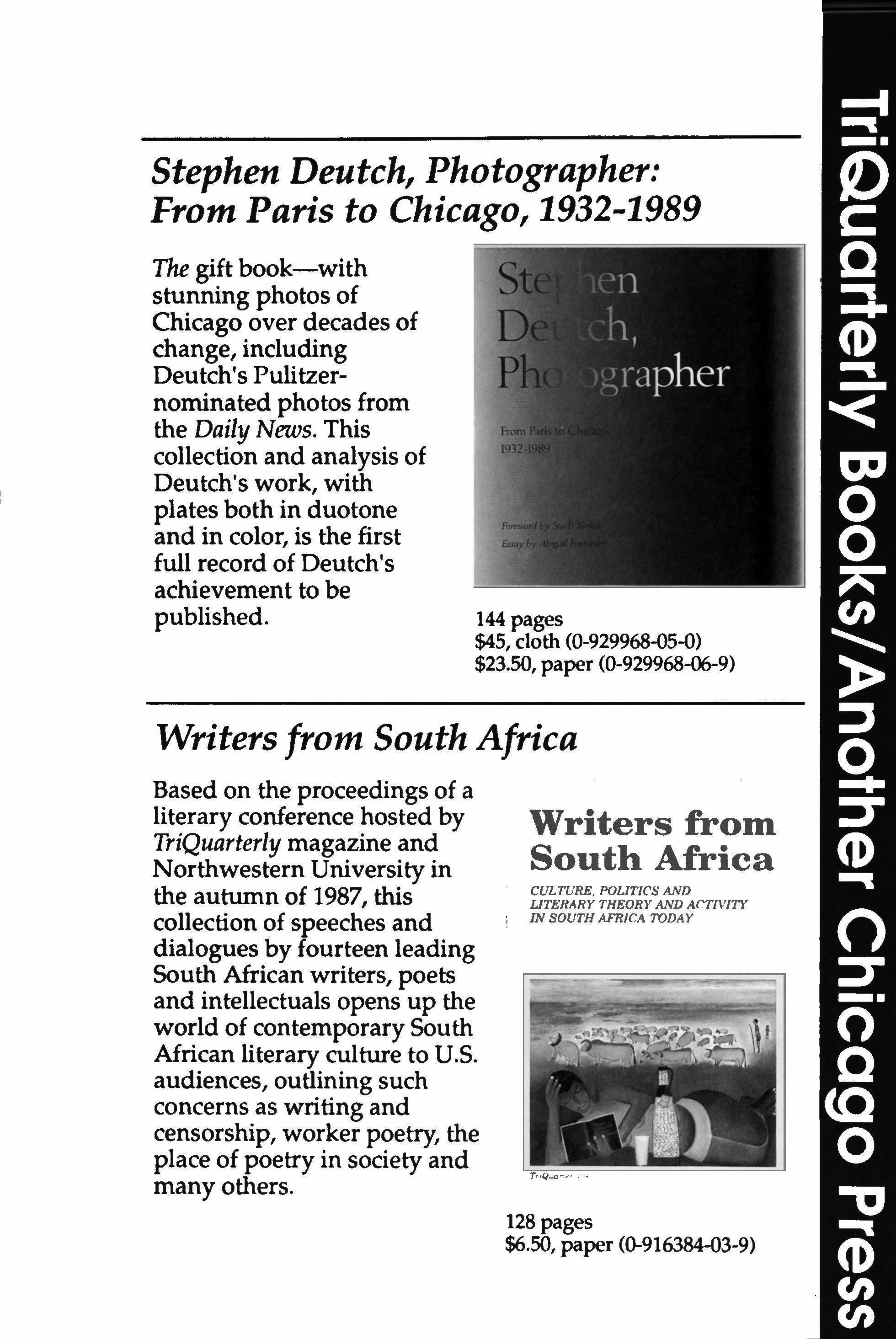
144 pages
$45, cloth (0-929968-05-0) $23.50, paper (0-929968-06-9)
Writers from South Africa
Based on the proceedings of a literary conference hosted by TriQuarterly magazine and Northwestern University in the autumn of 1987, this collection of speeches and dialogues by fourteen leading South African writers, poets and intellectuals opens up the world of contemporary South African literary culture to U.S. audiences, outlining such concerns as writing and censorship, worker poetry, the place of poetry in society and many others.
Writers from South Africa
CULTURE. POLITICS AND LITERARY THEORY AND Al'TNITY IN SOUTH AFRICA TODAY
128 pages $6.50, paper (0-916384-03-9)
Order Form
Individuals may deduct a 10% discount on orders of one book, or a 20% discount on orders of two books or more. The postage and handling fee for all orders is $3.
Date
Title Quantity Price

Name Address
Subtotal. Less discount.
Subtotal Postage $3_·OO
Total
enclosed
to
a Visa a Mastercard Acct. no.
a Check
(payable
TriQuarterly)
Expiration date
TriQuarterly Books,
University,
Send orders to:
Northwestern
2020 Ridge Avenue, Evanston, IL 60208-4302 phone orders: 708/491-7614
Editor
Reginald Gibbons
Managing Editor
Kirstie Felland
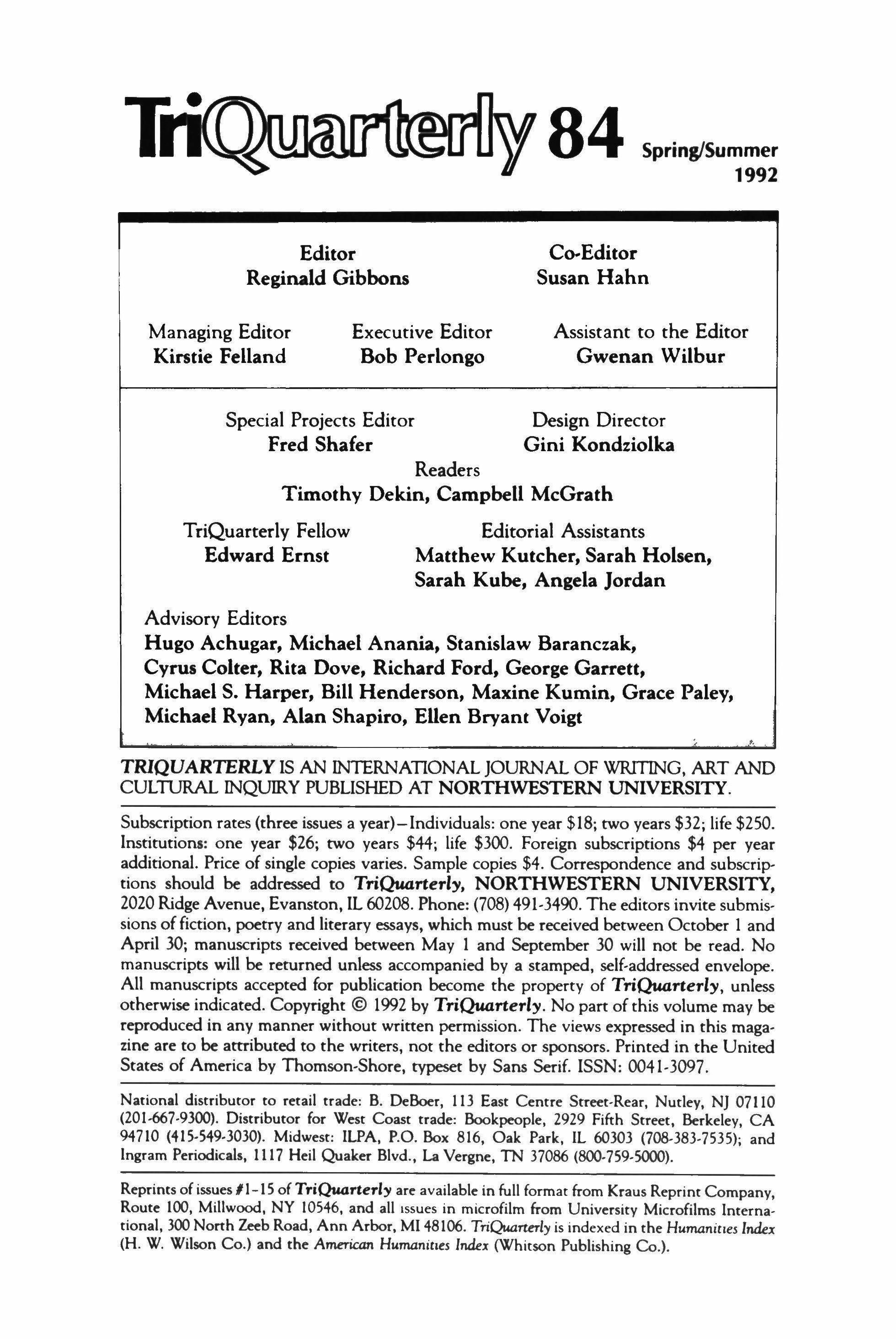
Executive Editor Bob Perlongo
Special Projects Editor Fred Shafer
Readers
Co-Editor Susan Hahn
Assistant to the Editor Gwenan Wilbur
Design Director Gini Kondeiolka
Timothy Dekin, Campbell McGrath
TriQuarterly Fellow
Edward Ernst
Advisory Editors
Editorial Assistants
Matthew Kutcher, Sarah Holsen, Sarah Kube, Angela Jordan
Hugo Achugar, Michael Anania, Stanislaw Baranczak, Cyrus Colter, Rita Dove, Richard Ford, George Garrett, Michael S. Harper, Bill Henderson, Maxine Kumin, Grace Paley, Michael Ryan, Alan Shapiro, Ellen Bryant Voigt
TRIQUARTERLY IS AN INTERNATIONAL JOURNAL OF WRITING, ART AND CULTIJRAL INQUIRY PUBLISHED AT NORTHWESTERN UNIVERSITY.
Subscription rates (three issues a year)-Individuals: one year $18; two years $32; life $250. Institutions: one year $26; two years $44; life $300. Foreign subscriptions $4 per year additional. Price of single copies varies. Sample copies $4. Correspondence and subscriptions should be addressed to TriQuarterly, NORTHWESTERN UNIVERSITY, 2020 Ridge Avenue, Evanston,IL 60208. Phone: (708) 491-3490. The editors invite submissions offiction, poetry and literary essays, which must be received between October 1 and April 30; manuscripts received between May 1 and September 30 will not be read. No manuscripts will be returned unless accompanied by a stamped, self-addressed envelope. All manuscripts accepted for publication become the property of TriQuarterly, unless otherwise indicated. Copyright © 1992 by TriQuarterly. No part of this volume may be reproduced in any manner without written permission. The views expressed in this magazine are to be attributed to the writers, not the editors or sponsors. Printed in the United States of America by Thomson-Shore, typeset by Sans Serif. ISSN: 0041-3097.
National distributor to retail trade: B. DeBoer, 113 East Centre Street-Rear, Nutley, NJ 07110 (201-667-9300). Distributor for West Coast trade: Bookpeople, 2929 Fifth Street, Berkeley, CA 94710 (415-549-3030). Midwest: ILPA, P.O. Box 816, Oak Park, IL 60303 (708-383-7535); and Ingram Periodicals, 1117 Heil Quaker Blvd., La Vergne, TN 37086 (800-759-5000).
Reprints of issues 11-15 of TriQuarterly are available in full format from Kraus Reprint Company, Route 100, Millwood, NY 10546, and all Issues in microfilm from University Microfilms International, 300 North Zeeb Road, Ann Arbor, MI48106. TnQuaTUTl-y is indexed in the Humanitle5lndex (H. W. Wilson Co.) and the American Humanitlt5 Index (Whitson Publishing Co.).
84
Spring/Summer 1992
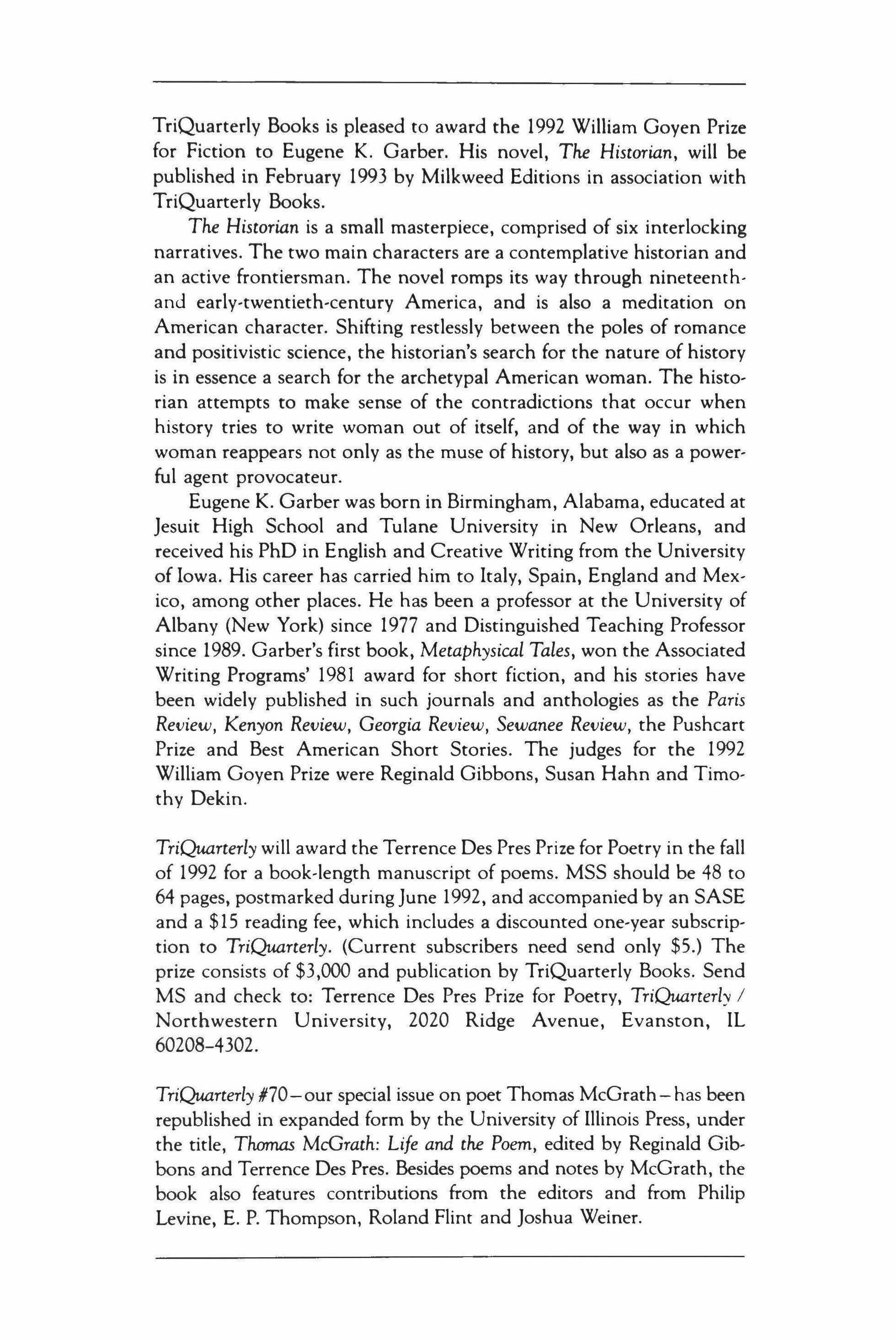
TriQuarterly Books is pleased to award the 1992 William Goyen Prize for Fiction to Eugene K. Garber. His novel, The Historian, will be published in February 1993 by Milkweed Editions in association with TriQuarterly Books.
The Historian is a small masterpiece, comprised of six interlocking narratives. The two main characters are a contemplative historian and an active frontiersman. The novel romps its way through nineteenthand early-twentieth-century America, and is also a meditation on American character. Shifting restlessly between the poles of romance and positivistic science, the historian's search for the nature of history is in essence a search for the archetypal American woman. The historian attempts to make sense of the contradictions that occur when history tries to write woman out of itself, and of the way in which woman reappears not only as the muse of history, but also as a powerful agent provocateur.
Eugene K. Garber was born in Birmingham, Alabama, educated at Jesuit High School and Tulane University in New Orleans, and received his PhD in English and Creative Writing from the University of Iowa. His career has carried him to Italy, Spain, England and Mexico, among other places. He has been a professor at the University of Albany (New York) since 1977 and Distinguished Teaching Professor since 1989. Garber's first book, Metaphysical Tales, won the Associated Writing Programs' 1981 award for short fiction, and his stories have been widely published in such journals and anthologies as the Paris Review, Kenyon Review, Georgia Review, Sewanee Review, the Pushcart Prize and Best American Short Stories. The judges for the 1992 William Goyen Prize were Reginald Gibbons, Susan Hahn and Timothy Dekin.
TriQuarterly will award the Terrence Des Pres Prize for Poetry in the fall of 1992 for a book-length manuscript of poems. MSS should be 48 to 64 pages, postmarked during June 1992, and accompanied by an SASE and a $15 reading fee, which includes a discounted one-year subscription to TriQuarterly. (Current subscribers need send only $5.) The prize consists of $3,000 and publication by TriQuarterly Books. Send MS and check to: Terrence Des Pres Prize for Poetry, TriQuarterly / Northwestern University, 2020 Ridge Avenue, Evanston, IL 60208-4302.
TriQuarterly #70 - our special issue on poet Thomas McGrath - has been republished in expanded form by the University of Illinois Press, under the title, Thomas McGrath: Life and the Poem, edited by Reginald Gibbons and Terrence Des Pres. Besides poems and notes by McGrath, the book also features contributions from the editors and from Philip Levine, E. P. Thompson, Roland Flint and Joshua Weiner.
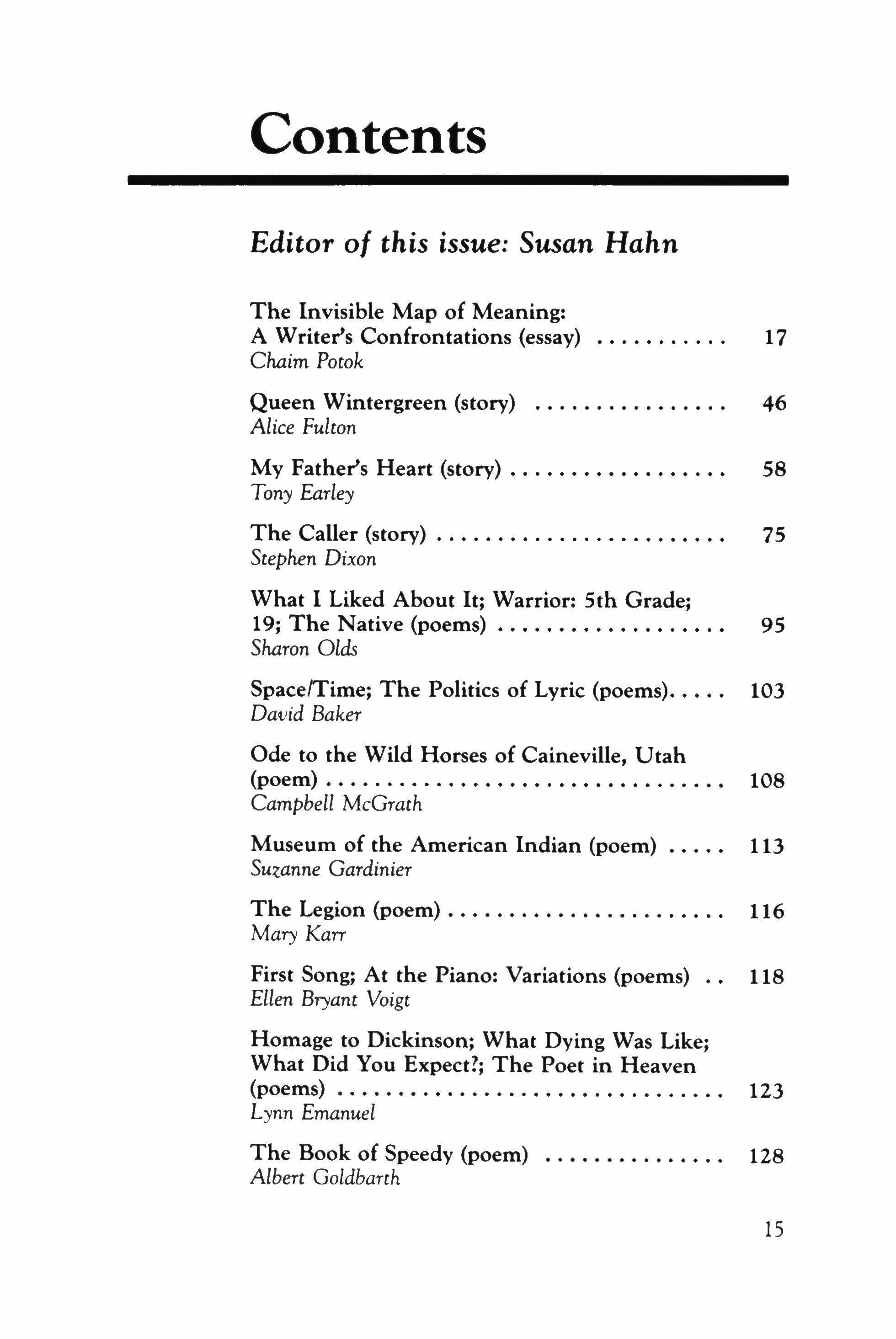
issue: Susan Hahn
Contents
this
The Invisible Map of Meaning: A Writer's Confrontations (essay) Chaim Potak Queen Wintergreen (story) 46 Alice Fulton 17 My Father's Heart (story) 58 Tony Earley The Caller (story) 75 Stephen Dixon What I Liked About It; Warrior: 5th Grade; 19; The Native (poems) 95 Sharon Olds Space/Time; The Politics of Lyric (poems). 103 David Baker Ode to the Wild Horses of Caineville, Utah (poem) 108 Campbell McGrath Museum of the American Indian (poem) 113 Suzanne Gardinier The Legion (poem) 116 Mary Karr First Song; At the Piano: Variations (poems) 118 Ellen Bryant Voigt Homage to Dickinson; What Dying Was Like; What Did You Expect?; The Poet in Heaven (poems) •............................... 123 Lynn Emanuel The Book of Speedy (poem) Albert Goldbarth 128 15
Editor of
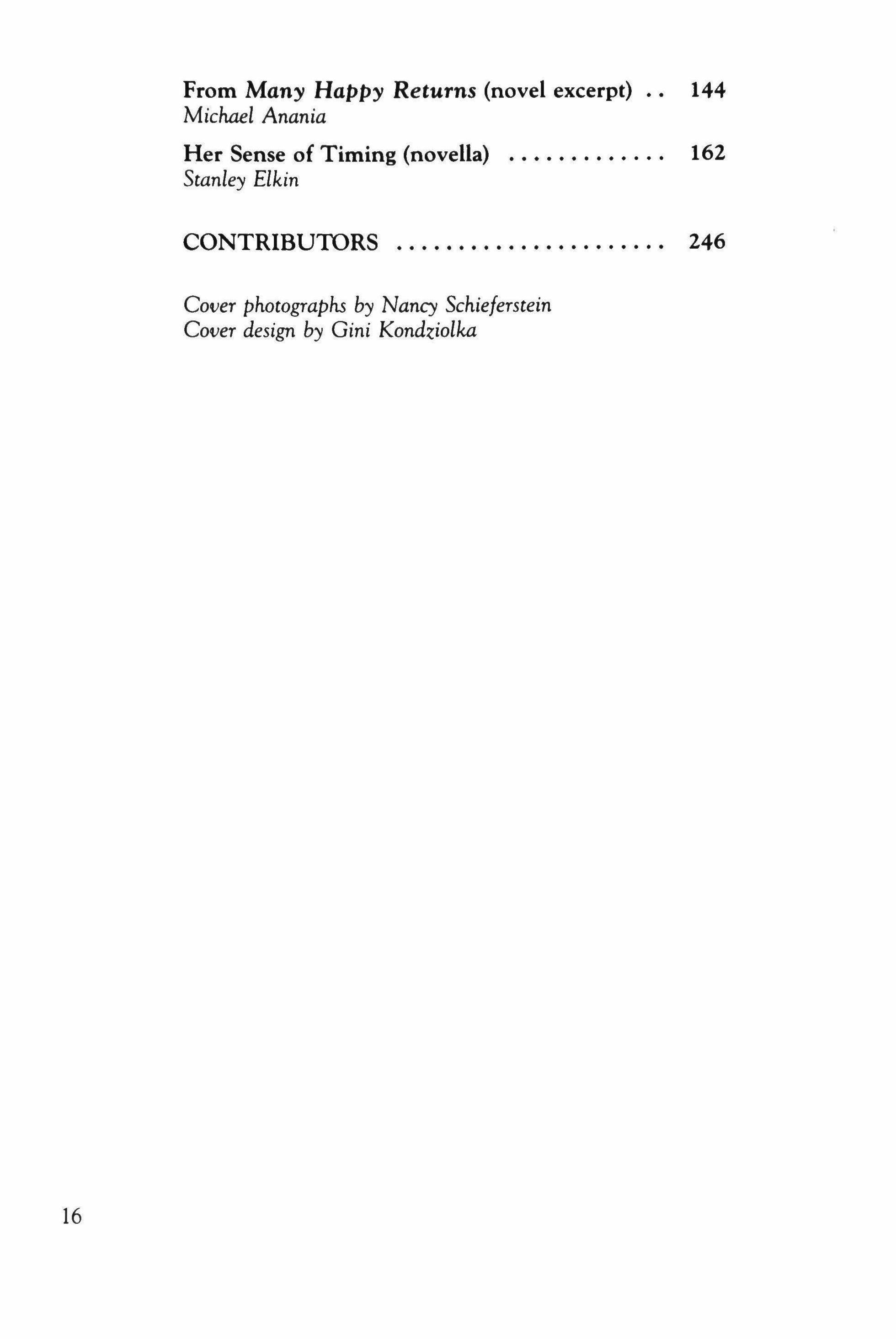
CONTRIBUIDRS
Cover photographs by Nancy Schieferstein
Cover design by Gini Kondziolka
Many Happy Returns (novel excerpt) 144
From
Sense of Timing (novella)
162
Michael Anania Her
Stanley Elkin
246
16
The Invisible Map of Meaning: A Writer's Confrontations
Chaim Potok
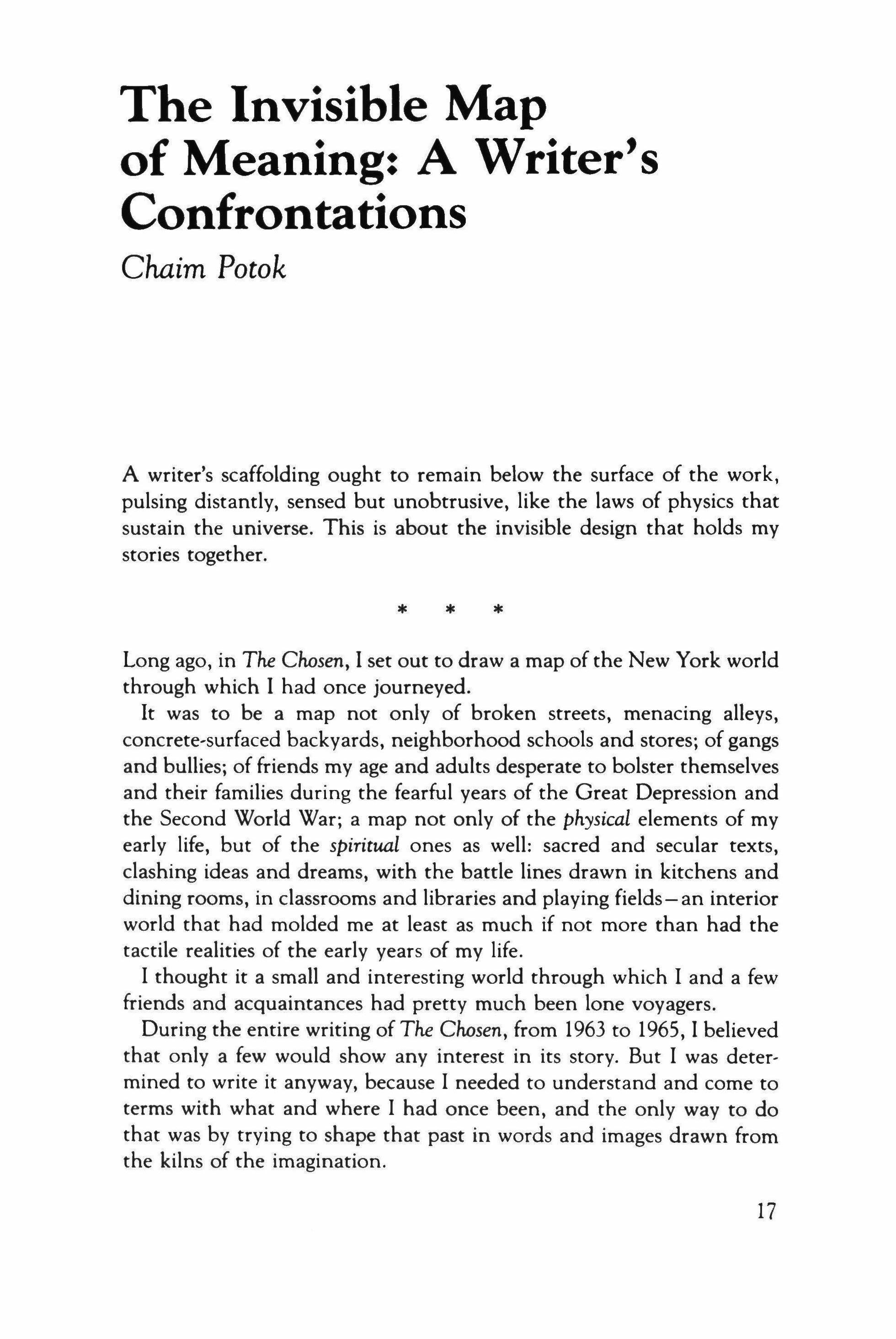
A writer's scaffolding ought to remain below the surface of the work, pulsing distantly, sensed but unobtrusive, like the laws of physics that sustain the universe. This is about the invisible design that holds my stories together.
Long ago, in The Chosen, I set out to draw a map of the New York world through which I had once journeyed.
It was to be a map not only of broken streets, menacing alleys, concrete-surfaced backyards, neighborhood schools and stores; of gangs and bullies; of friends my age and adults desperate to bolster themselves and their families during the fearful years of the Great Depression and the Second World War; a map not only of the physical elements of my early life, but of the spiritual ones as well: sacred and secular texts, clashing ideas and dreams, with the battle lines drawn in kitchens and dining rooms, in classrooms and libraries and playing fields-an interior world that had molded me at least as much if not more than had the tactile realities of the early years of my life.
I thought it a small and interesting world through which I and a few friends and acquaintances had pretty much been lone voyagers.
During the entire writing of The Chosen, from 1963 to 1965, I believed that only a few would show any interest in its story. But I was deter, mined to write it anyway, because I needed to understand and come to terms with what and where I had once been, and the only way to do that was by trying to shape that past in words and images drawn from the kilns of the imagination.
* * *
17
In the wake of the astonishing reaction to the novel, I came to understand that I had stumbled upon an experience that had not been exclusively mine. Rather, it appeared that I had unknowingly shared it with millions of others. I had filled a universal experience with a particular content.
Soon after the publication of the book it became apparent to me that I had mapped a certain kind of confrontation, which I will name later. That awareness led me to consider a series of works that would further explore the various facets of that confrontation.
Each of the subsequent books became a section of a large map, which I have been drawing and redrawing for the past decades.
I've resisted writing about that map until now, because it seemed too large and unwieldy a creation, indeed at times a blur, a shifting, changing blueprint in constant need of modification. Also it appeared at first to be less about literature than the sociology of literature. But even the most adamant of deconstructionists will admit that there is some fabric of contextuality to literature. And I've talked about the map often before different kinds of audiences; it has served me well over the years as a sort of loran for my work. And so perhaps now is as good a time as any to present it-in order to determine whether it has any broad value or is merely an idiosyncratic and parochial reading of literature by one writer of stories.

Until the modern period most people on this planet grew up, lived, and died, and never seriously contended with a new idea during their entire lives. People lived the only lives they would have, never traveling more than twenty-five miles from their place of birth, never entering into a relationship with a stranger, never engaging an alien idea. Only a few aristocrats, philosophers, scientists and clergymen ventured regularly beyond the walls of their world for an outside look at their culture's basic assumptions. Often they paid a high price for their effort.
If you lived in a village-as lord, priest, steward, bailiff, reeve, warden or serf-from where would a new idea come? Even in a town-city or suburb-people worked close to where they lived. And if you had to labor far away from home, rarely would you enter into any significant relationship with fellow workers. People lived and died inside a small, shared world of family, friends, neighbors, enemies, coreligionists.
All dwelt in a stable, vertical world of faith-even those in vaunted Elizabethan England, that purported secular hour between two ages of
* * *
18
Protestantism. God, Scripture and the eternal rewards of radiant Heaven above; Satan and the lengthy torments of mephitic Hellfire below; and errant humans moving up and down the verticality, now closer to Heaven, now to Hell, depending upon the measure of one's acquiescence at any given moment to the dictates of divine authority.
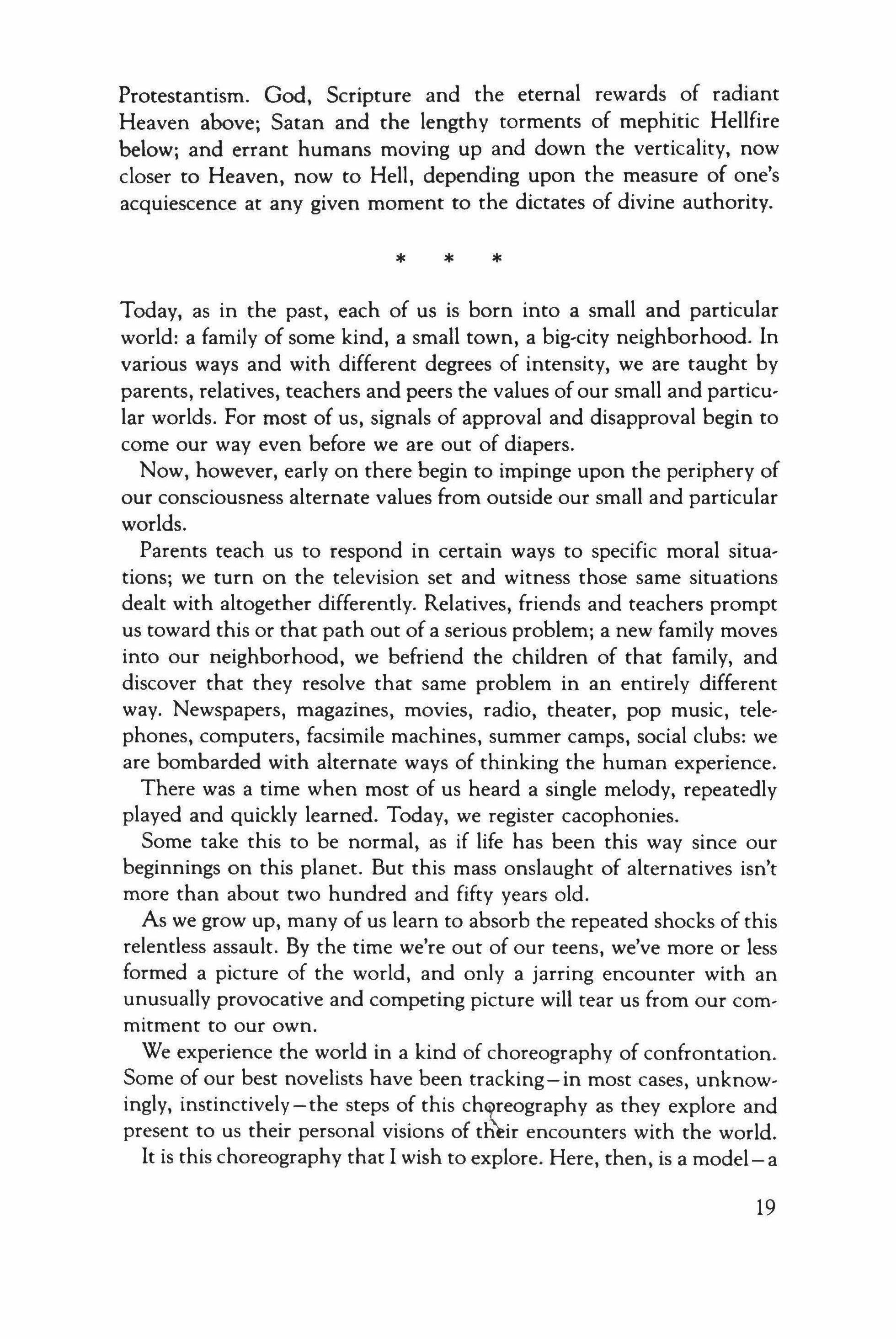
Today, as in the past, each of us is born into a small and particular world: a family of some kind, a small town, a big-city neighborhood. In various ways and with different degrees of intensity, we are taught by parents, relatives, teachers and peers the values of our small and particular worlds. For most of us, signals of approval and disapproval begin to come our way even before we are out of diapers.
Now, however, early on there begin to impinge upon the periphery of our consciousness alternate values from outside our small and particular worlds.
Parents teach us to respond in certain ways to specific moral situations; we turn on the television set and witness those same situations dealt with altogether differently. Relatives, friends and teachers prompt us toward this or that path out of a serious problem; a new family moves into our neighborhood, we befriend the children of that family, and discover that they resolve that same problem in an entirely different way. Newspapers, magazines, movies, radio, theater, pop music, telephones, computers, facsimile machines, summer camps, social clubs: we are bombarded with alternate ways of thinking the human experience.
There was a time when most of us heard a single melody, repeatedly played and quickly learned. Today, we register cacophonies.
Some take this to be normal, as if life has been this way since our beginnings on this planet. But this mass onslaught of alternatives isn't more than about two hundred and fifty years old.
As we grow up, many of us learn to absorb the repeated shocks of this relentless assault. By the time we're out of our teens, we've more or less formed a picture of the world, and only a jarring encounter with an unusually provocative and competing picture will tear us from our com, mitment to our own.
We experience the world in a kind of choreography of confrontation. Some of our best novelists have been tracking - in most cases, unknowingly, instinctively-the steps of this chereographv as they explore and present to us their personal visions of thtir encounters with the world.
It is this choreography that I wish to explore. Here, then, is a model-a
* * *
19
mapping-of how we encounter, as a matter of course, values and cultures not our own, and of some of the ways writers of stories have been exploring those encounters.
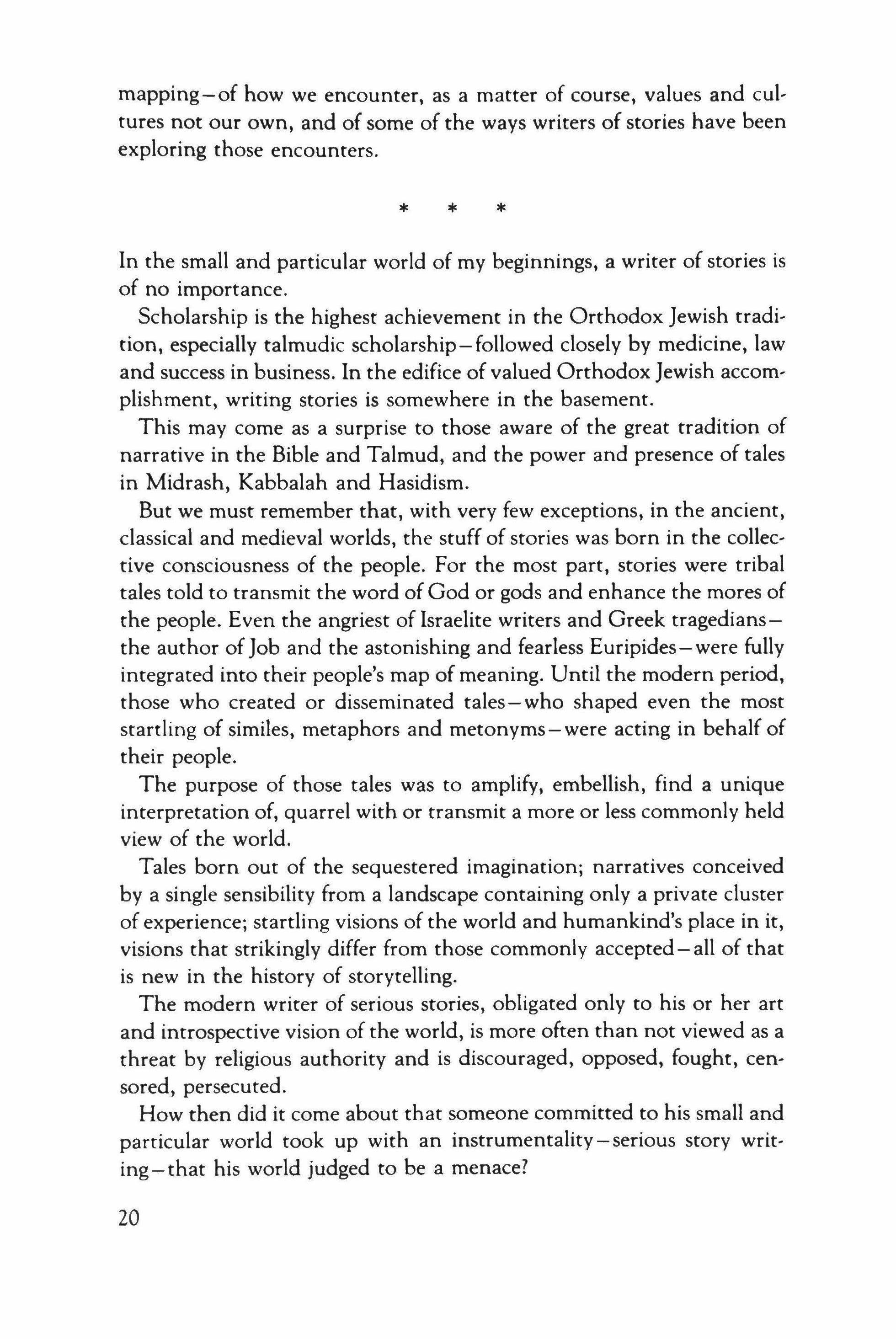
In the small and particular world of my beginnings, a writer of stories is of no importance.
Scholarship is the highest achievement in the Orthodox Jewish tradition, especially talmudic scholarship-followed closely by medicine, law and success in business. In the edifice of valued Orthodox Jewish accomplishment, writing stories is somewhere in the basement.
This may come as a surprise to those aware of the great tradition of narrative in the Bible and Talmud, and the power and presence of tales in Midrash, Kabbalah and Hasidism.
But we must remember that, with very few exceptions, in the ancient, classical and medieval worlds, the stuff of stories was born in the collective consciousness of the people. For the most part, stories were tribal tales told to transmit the word of God or gods and enhance the mores of the people. Even the angriest of Israelite writers and Greek tragediansthe author ofJob and the astonishing and fearless Euripides-were fully integrated into their people's map of meaning. Until the modern period, those who created or disseminated tales-who shaped even the most startling of similes, metaphors and metonyms - were acting in behalf of their people.
The purpose of those tales was to amplify, embellish, find a unique interpretation of, quarrel with or transmit a more or less commonly held view of the world.
Tales born out of the sequestered imagination; narratives conceived by a single sensibility from a landscape containing only a private cluster of experience; startling visions of the world and humankind's place in it, visions that strikingly differ from those commonly accepted - all of that is new in the history of storytelling.
The modern writer of serious stories, obligated only to his or her art and introspective vision of the world, is more often than not viewed as a threat by religious authority and is discouraged, opposed, fought, censored, persecuted.
How then did it corne about that someone committed to his small and particular world took up with an instrumentality-serious story writing-that his world judged to be a menace?
* * *
20
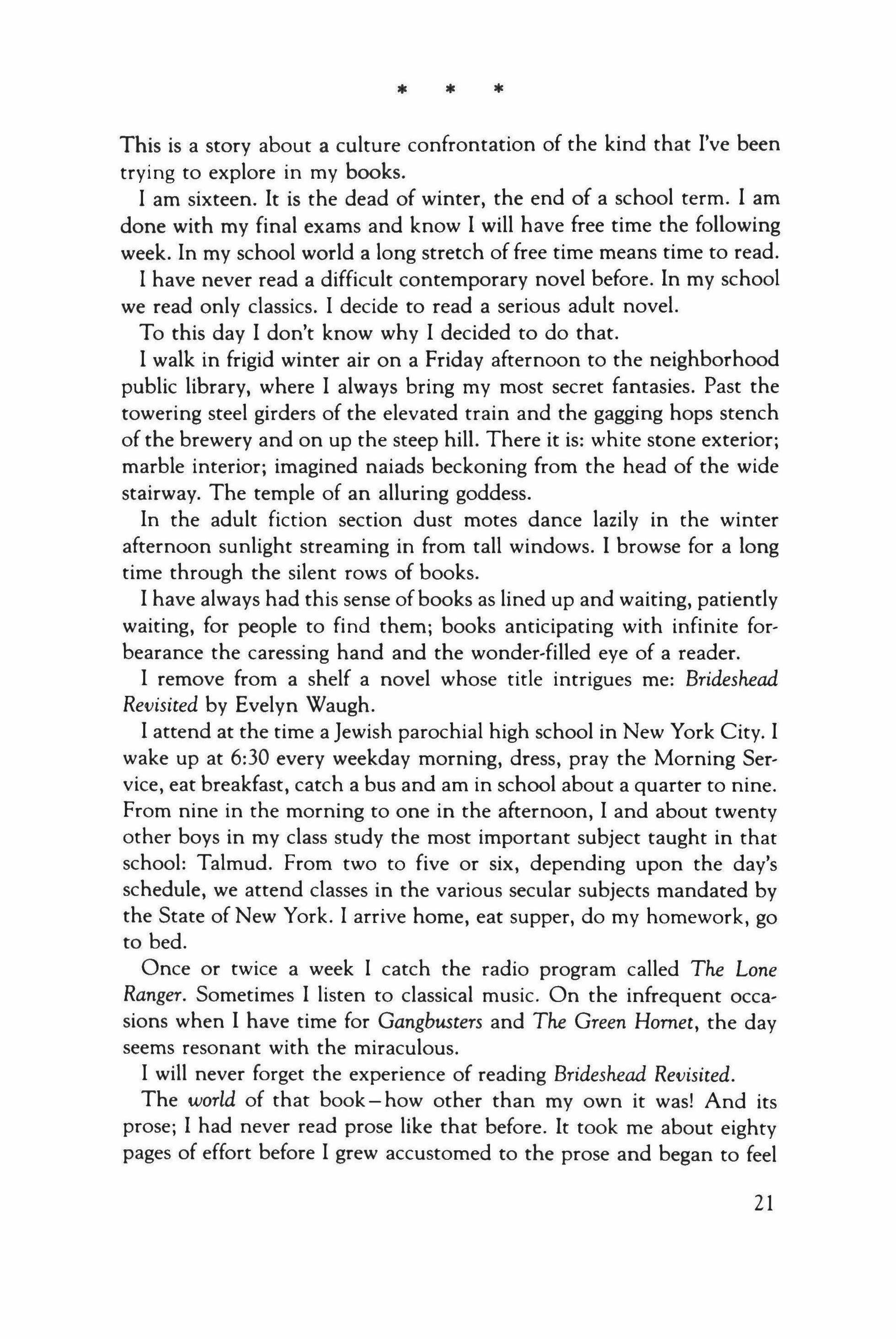
This is a story about a culture confrontation of the kind that I've been trying to explore in my books.
I am sixteen. It is the dead of winter, the end of a school term. I am done with my final exams and know I will have free time the following week. In my school world a long stretch of free time means time to read.
I have never read a difficult contemporary novel before. In my school we read only classics. I decide to read a serious adult novel.
To this day I don't know why I decided to do that.
I walk in frigid winter air on a Friday afternoon to the neighborhood public library, where I always bring my most secret fantasies. Past the towering steel girders of the elevated train and the gagging hops stench of the brewery and on up the steep hill. There it is: white stone exterior; marble interior; imagined naiads beckoning from the head of the wide stairway. The temple of an alluring goddess.
In the adult fiction section dust motes dance lazily in the winter afternoon sunlight streaming in from tall windows. I browse for a long time through the silent rows of books.
I have always had this sense ofbooks as lined up and waiting, patiently waiting, for people to find them; books anticipating with infinite forbearance the caressing hand and the wonder-filled eye of a reader.
I remove from a shelf a novel whose tide intrigues me: Brideshead Revisited by Evelyn Waugh.
I attend at the time a Jewish parochial high school in New York City. I wake up at 6:30 every weekday morning, dress, pray the Morning Service, eat breakfast, catch a bus and am in school about a quarter to nine. From nine in the morning to one in the afternoon, I and about twenty other boys in my class study the most important subject taught in that school: Talmud. From two to five or six, depending upon the day's schedule, we attend classes in the various secular subjects mandated by the State of New York. I arrive home, eat supper, do my homework, go to bed.
Once or twice a week I catch the radio program called The Lone Ranger. Sometimes I listen to classical music. On the infrequent occasions when I have time for Gangbusters and The Green Hornet, the day seems resonant with the miraculous.
I will never forget the experience of reading Brideshead Revisited. The world of that book - how other than my own it was! And its prose; I had never read prose like that before. It took me about eighty pages of effort before I grew accustomed to the prose and began to feel
* * *
21
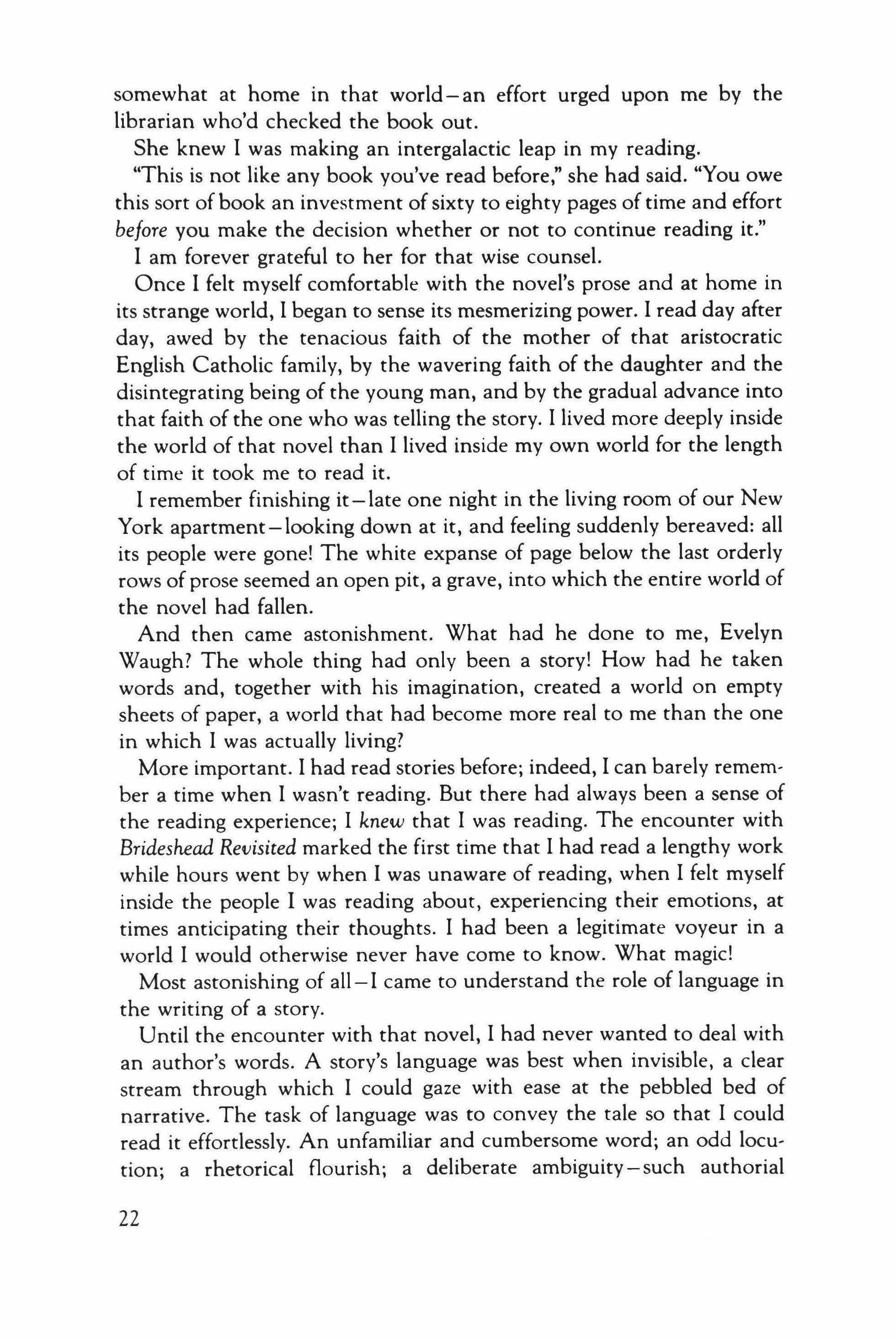
somewhat at home in that world - an effort urged upon me by the librarian who'd checked the book out.
She knew I was making an intergalactic leap in my reading.
"This is not like any book you've read before," she had said. "You owe this sort ofbook an investment ofsixty to eighty pages of time and effort before you make the decision whether or not to continue reading it."
I am forever grateful to her for that wise counsel.
Once 1 felt myself comfortable with the novel's prose and at home in its strange world, I began to sense its mesmerizing power. I read day after day, awed by the tenacious faith of the mother of that aristocratic English Catholic family, by the wavering faith of the daughter and the disintegrating being of the young man, and by the gradual advance into that faith of the one who was telling the story. I lived more deeply inside the world of that novel than I lived inside my own world for the length of time it took me to read it.
I remember finishing it -late one night in the living room of our New York apartment-looking down at it, and feeling suddenly bereaved: all its people were gone! The white expanse of page below the last orderly rows of prose seemed an open pit, a grave, into which the entire world of the novel had fallen.
And then came astonishment. What had he done to me, Evelyn Waugh? The whole thing had only been a story! How had he taken words and, together with his imagination, created a world on empty sheets of paper, a world that had become more real to me than the one in which I was actually living?
More important. I had read stories before; indeed, I can barely remember a time when I wasn't reading. But there had always been a sense of the reading experience; I knew that I was reading. The encounter with Brideshead Revisited marked the first time that I had read a lengthy work while hours went by when I was unaware of reading, when I felt myself inside the people 1 was reading about, experiencing their emotions, at times anticipating their thoughts. I had been a legitimate voyeur in a world I would otherwise never have come to know. What magic!
Most astonishing of all-I came to understand the role of language in the writing of a story.
Until the encounter with that novel, I had never wanted to deal with an author's words. A story's language was best when invisible, a clear stream through which I could gaze with ease at the pebbled bed of narrative. The task of language was to convey the tale so that I could read it effortlessly. An unfamiliar and cumbersome word; an odd locution; a rhetorical flourish; a deliberate ambiguity-such authorial
22
sleights of hand would annoy me. Now, for the first time, I grew aware of how language could be made to carry a story: the texture and nuances of a phrase, a sentence; the intricate rhythms of a paragraph; the living style of a work that was as much a part of its presence as the story itself. Indeed, I began to sense that story alone might not be the most important element in a novel. A serious novel was a multifaceted animate entity, and not the least of the sparks that brought it to life was its language.
Very soon after reading Brideshead Revisited I read A Portrait of the Artist as a Young Man by James Joyce.
Yet another astonishment!
Here was someone trying to give shape to turmoil I myself was experiencing: a growing sense of a world outside my own; pulsing sexuality; questions about God and the nature of my own self. Here was an author shaping his deepest thoughts and feelings with language, exploring an interior human terrain I had never thought it possible to configure with words.
What awesome and mysterious power there was in this kind of creativity!
I began to read ravenously, and to write.
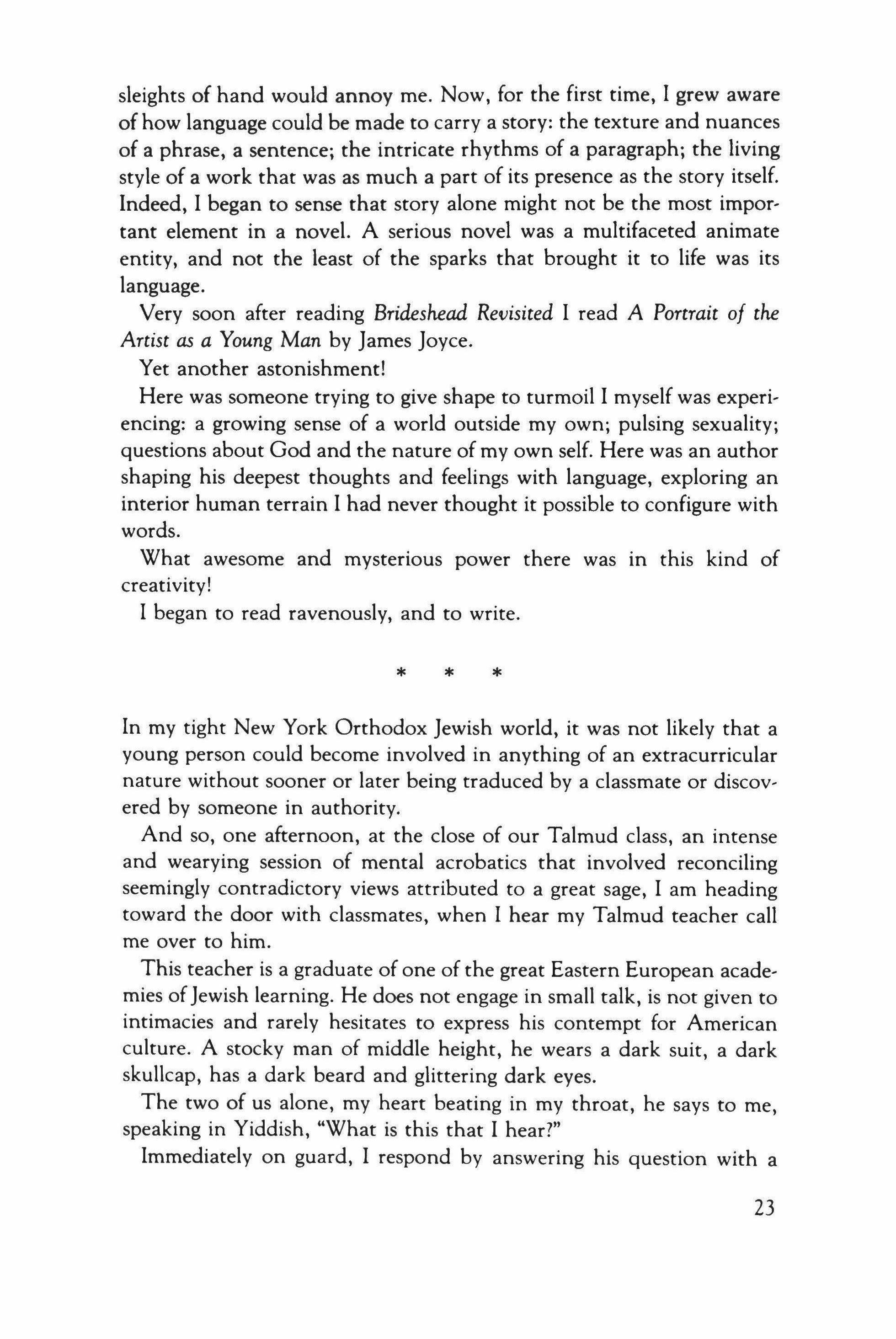
In my tight New York Orthodox Jewish world, it was not likely that a young person could become involved in anything of an extracurricular nature without sooner or later being traduced by a classmate or discovered by someone in authority.
And so, one afternoon, at the close of our Talmud class, an intense and wearying session of mental acrobatics that involved reconciling seemingly contradictory views attributed to a great sage, I am heading toward the door with classmates, when I hear my Talmud teacher call me over to him.
This teacher is a graduate of one of the great Eastern European academies ofJewish learning. He does not engage in small talk, is not given to intimacies and rarely hesitates to express his contempt for American culture. A stocky man of middle height, he wears a dark suit, a dark skullcap, has a dark beard and glittering dark eyes.
The two of us alone, my heart beating in my throat, he says to me, speaking in Yiddish, "What is this that I hear?"
Immediately on guard, I respond by answering his question with a
* * *
23
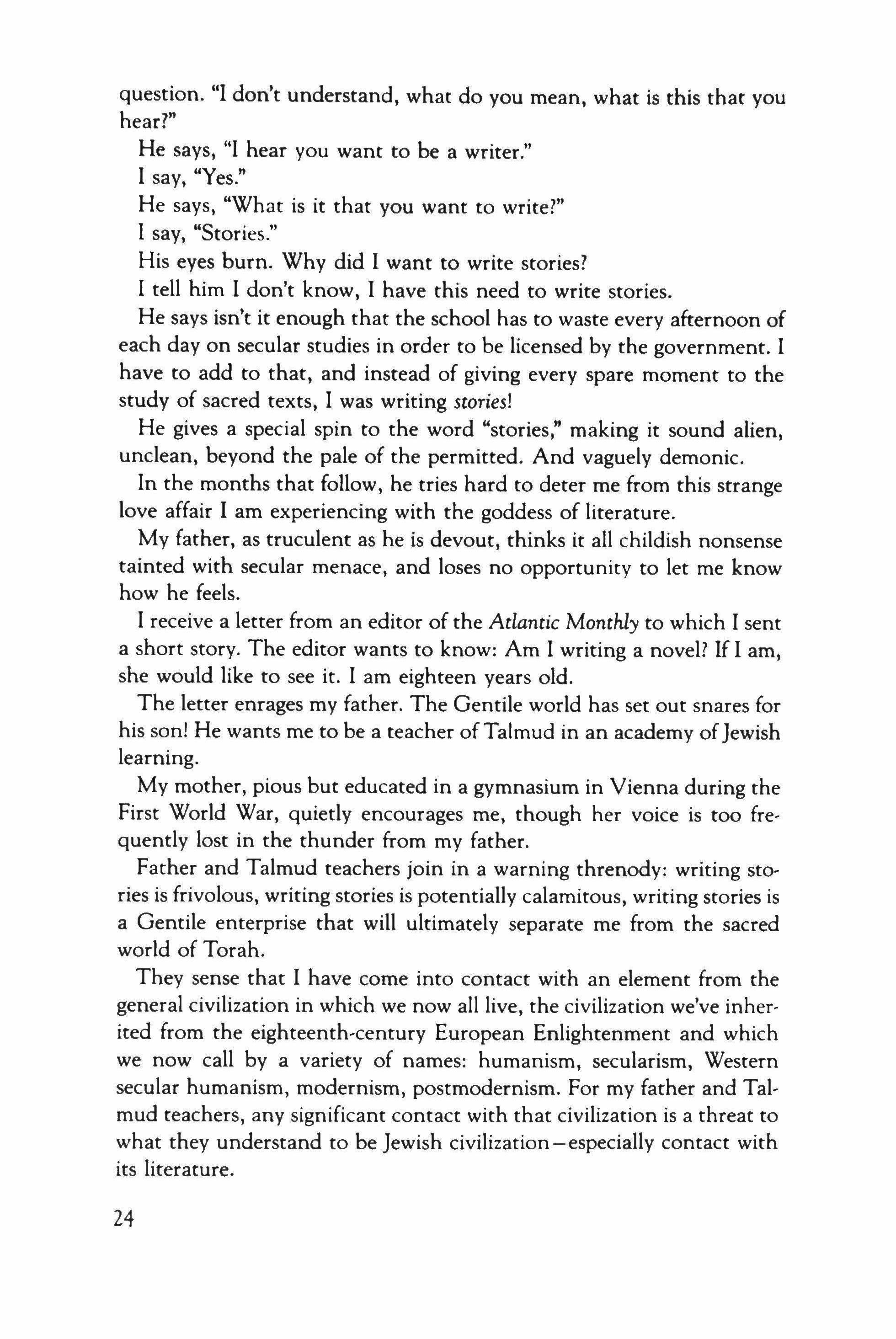
question. "I don't understand, what do you mean, what is this that you hear?"
He says, "I hear you want to be a writer."
I say, "Yes."
He says, "What is it that you want to write?"
I say, "Stories."
His eyes burn. Why did I want to write stories?
I tell him I don't know, I have this need to write stories.
He says isn't it enough that the school has to waste every afternoon of each day on secular studies in order to be licensed by the government. I have to add to that, and instead of giving every spare moment to the study of sacred texts, I was writing stories!
He gives a special spin to the word "stories," making it sound alien, unclean, beyond the pale of the permitted. And vaguely demonic.
In the months that follow, he tries hard to deter me from this strange love affair I am experiencing with the goddess of literature.
My father, as truculent as he is devout, thinks it all childish nonsense tainted with secular menace, and loses no opportunity to let me know how he feels.
I receive a letter from an editor of the Atlantic Monthly to which I sent a short story. The editor wants to know: Am I writing a novel? If I am, she would like to see it. I am eighteen years old.
The letter enrages my father. The Gentile world has set out snares for his son! He wants me to be a teacher of Talmud in an academy ofjewish learning.
My mother, pious but educated in a gymnasium in Vienna during the First World War, quietly encourages me, though her voice is too frequently lost in the thunder from my father.
Father and Talmud teachers join in a warning threnody: writing stories is frivolous, writing stories is potentially calamitous, writing stories is a Gentile enterprise that will ultimately separate me from the sacred world of Torah.
They sense that I have come into contact with an element from the general civilization in which we now all live, the civilization we've inherited from the eighteenth-century European Enlightenment and which we now call by a variety of names: humanism, secularism, Western secular humanism, modernism, postmodernism. For my father and Talmud teachers, any significant contact with that civilization is a threat to what they understand to be Jewish civilization-especially contact with its literature.
24
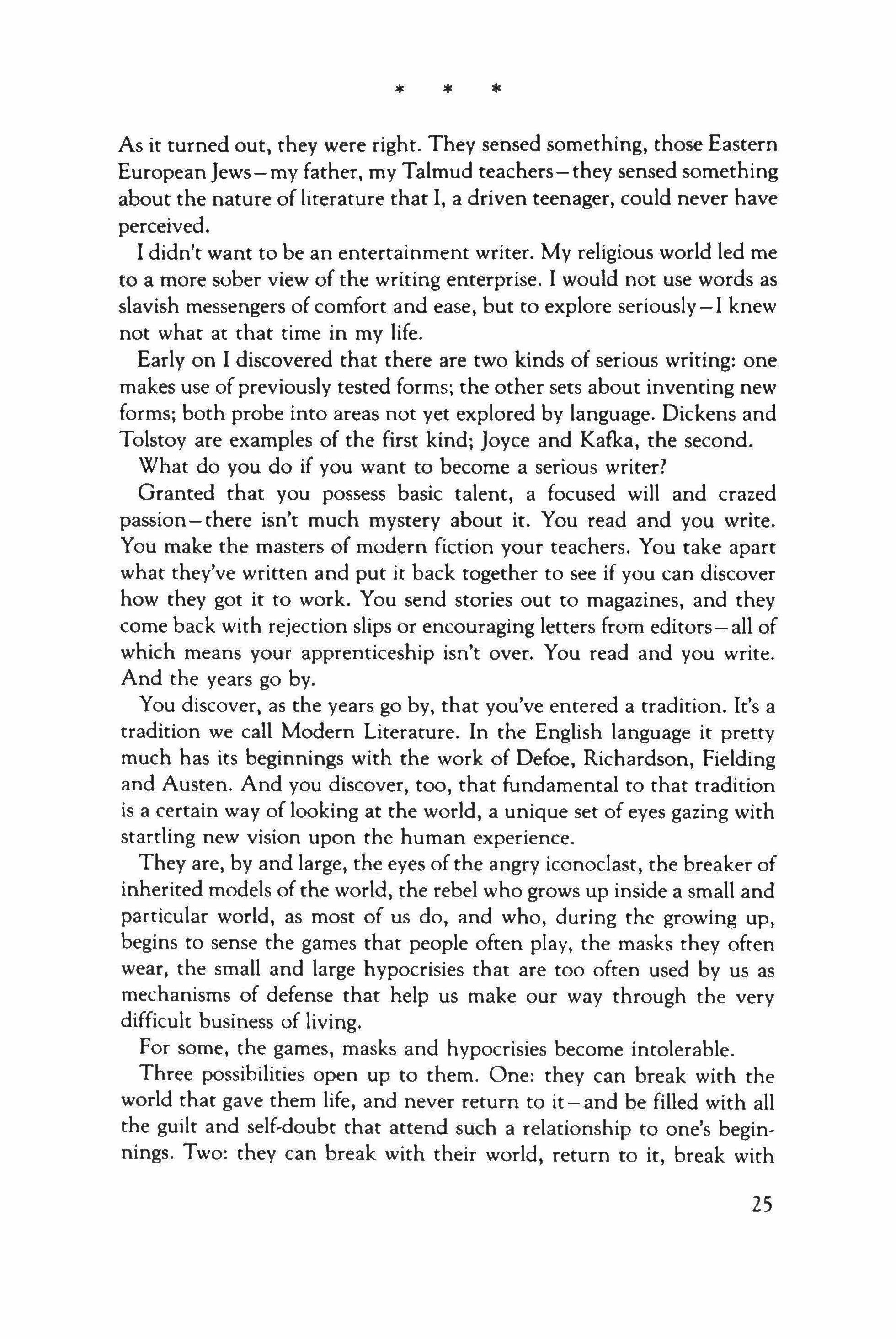
As it turned out, they were right. They sensed something, those Eastern European Jews-my father, my Talmud teachers-they sensed something about the nature of literature that I, a driven teenager, could never have perceived.
I didn't want to be an entertainment writer. My religious world led me to a more sober view of the writing enterprise. I would not use words as slavish messengers of comfort and ease, but to explore seriously-I knew not what at that time in my life.
Early on I discovered that there are two kinds of serious writing: one makes use of previously tested forms; the other sets about inventing new forms; both probe into areas not yet explored by language. Dickens and Tolstoy are examples of the first kind; Joyce and Kafka, the second.
What do you do if you want to become a serious writer?
Granted that you possess basic talent, a focused will and crazed passion-there isn't much mystery about it. You read and you write. You make the masters of modern fiction your teachers. You take apart what they've written and put it back together to see if you can discover how they got it to work. You send stories out to magazines, and they come back with rejection slips or encouraging letters from editors-all of which means your apprenticeship isn't over. You read and you write. And the years go by.
You discover, as the years go by, that you've entered a tradition. It's a tradition we call Modern Literature. In the English language it pretty much has its beginnings with the work of Defoe, Richardson, Fielding and Austen. And you discover, too, that fundamental to that tradition is a certain way of looking at the world, a unique set of eyes gazing with startling new vision upon the human experience.
They are, by and large, the eyes of the angry iconoclast, the breaker of inherited models of the world, the rebel who grows up inside a small and particular world, as most of us do, and who, during the growing up, begins to sense the games that people often play, the masks they often wear, the small and large hypocrisies that are too often used by us as mechanisms of defense that help us make our way through the very difficult business of living.
For some, the games, masks and hypocrisies become intolerable. Three possibilities open up to them. One: they can break with the world that gave them life, and never return to it-and be filled with all the guilt and self-doubt that attend such a relationship to one's beginnings. Two: they can break with their world, return to it, break with
* * *
25
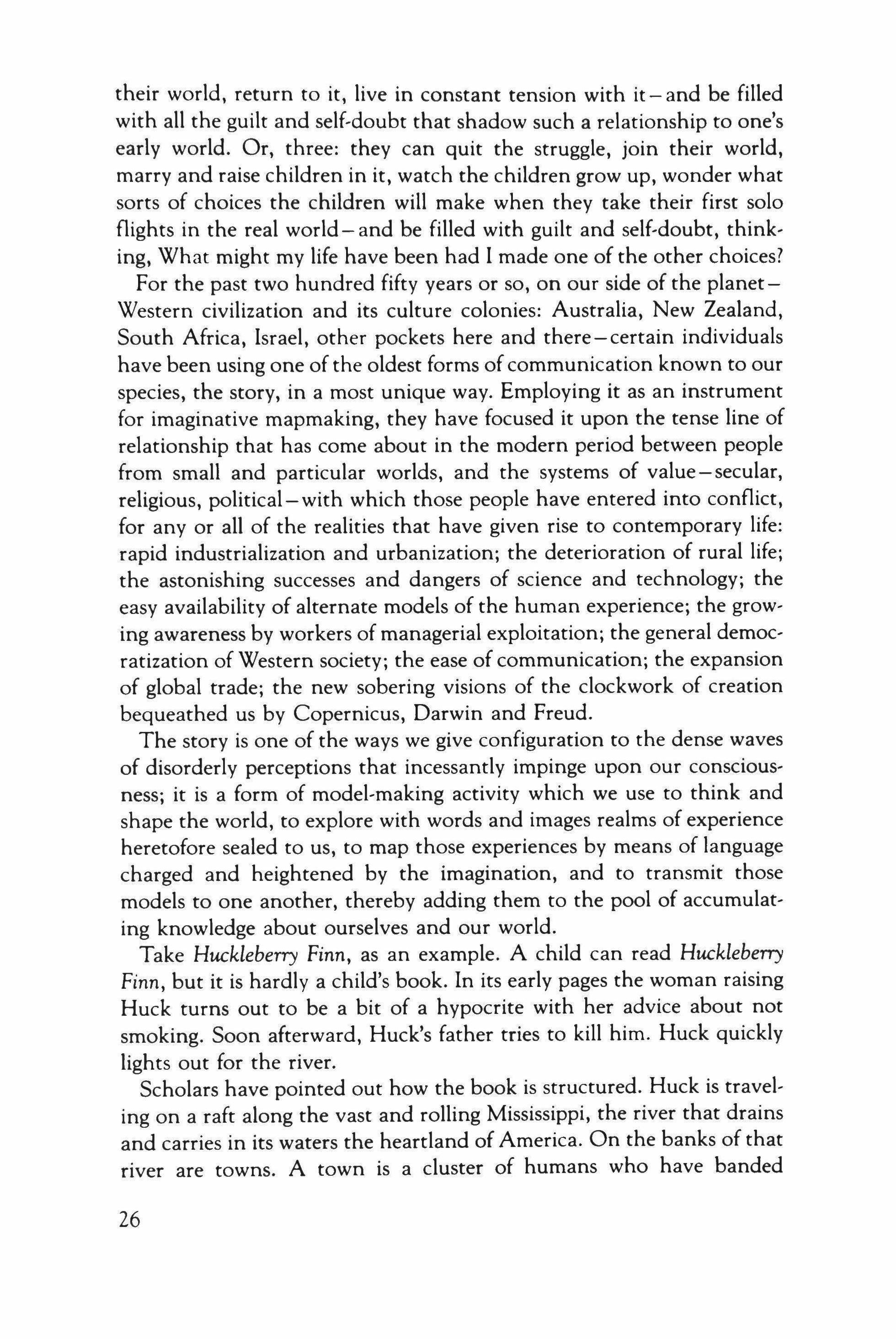
their world, return to it, live in constant tension with it - and be filled with all the guilt and self-doubt that shadow such a relationship to one's early world. Or, three: they can quit the struggle, join their world, marry and raise children in it, watch the children grow up, wonder what sorts of choices the children will make when they take their first solo flights in the real world - and be filled with guilt and self-doubt, thinking, What might my life have been had I made one of the other choices?
For the past two hundred fifty years or so, on our side of the planetWestern civilization and its culture colonies: Australia, New Zealand, South Africa, Israel, other pockets here and there-certain individuals have been using one of the oldest forms of communication known to our species, the story, in a most unique way. Employing it as an instrument for imaginative mapmaking, they have focused it upon the tense line of relationship that has come about in the modern period between people from small and particular worlds, and the systems of value-secular, religious, political-with which those people have entered into conflict, for any or all of the realities that have given rise to contemporary life: rapid industrialization and urbanization; the deterioration of rural life; the astonishing successes and dangers of science and technology; the easy availability of alternate models of the human experience; the growing awareness by workers of managerial exploitation; the general democratization of Western society; the ease of communication; the expansion of global trade; the new sobering visions of the clockwork of creation bequeathed us by Copernicus, Darwin and Freud.
The story is one of the ways we give configuration to the dense waves of disorderly perceptions that incessantly impinge upon our consciousness; it is a form of model-making activity which we use to think and shape the world, to explore with words and images realms of experience heretofore sealed to us, to map those experiences by means of language charged and heightened by the imagination, and to transmit those models to one another, thereby adding them to the pool of accumulating knowledge about ourselves and our world.
Take Huckleberry Finn, as an example. A child can read Huckleberry Finn, but it is hardly a child's book. In its early pages the woman raising Huck turns out to be a bit of a hypocrite with her advice about not smoking. Soon afterward, Huck's father tries to kill him. Huck quickly lights out for the river.
Scholars have pointed out how the book is structured. Huck is traveling on a raft along the vast and rolling Mississippi, the river that drains and carries in its waters the heartland of America. On the banks of that river are towns. A town is a cluster of humans who have banded
26
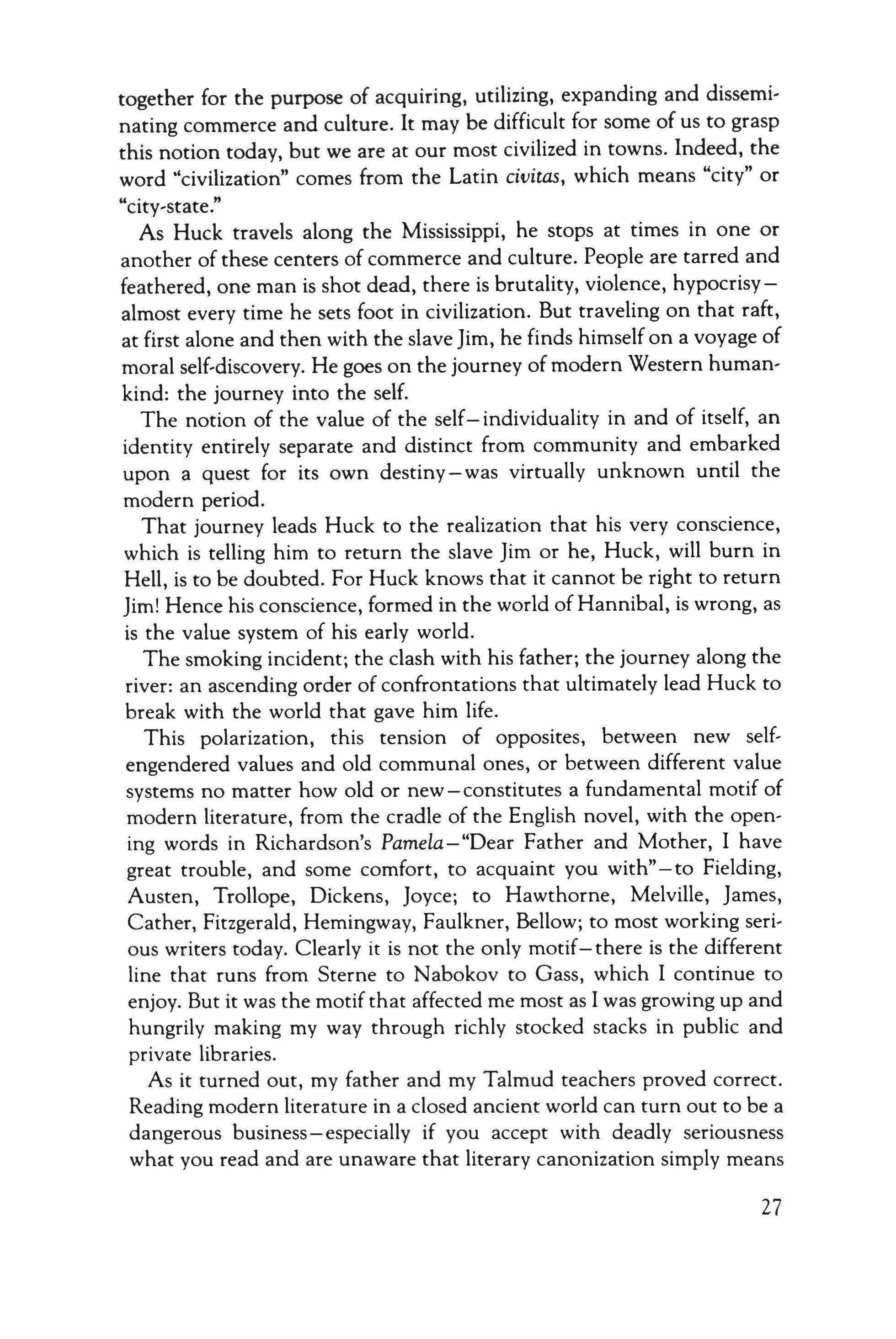
together for the purpose of acquiring, utilizing, expanding and disseminating commerce and culture. It may be difficult for some of us to grasp this notion today, but we are at our most civilized in towns. Indeed, the word "civilization" comes from the Latin civitas, which means "city" or "city-state,"
As Huck travels along the Mississippi, he stops at times in one or another of these centers of commerce and culture. People are tarred and feathered, one man is shot dead, there is brutality, violence, hypocrisyalmost every time he sets foot in civilization. But traveling on that raft, at first alone and then with the slave Jim, he finds himself on a voyage of moral self-discovery. He goes on the journey of modern Western humankind: the journey into the self.
The notion of the value of the self-individuality in and of itself, an identity entirely separate and distinct from community and embarked upon a quest for its own destiny-was virtually unknown until the modern period.
That journey leads Huck to the realization that his very conscience, which is telling him to return the slave Jim or he, Huck, will burn in Hell, is to be doubted. For Huck knows that it cannot be right to return Jim! Hence his conscience, formed in the world of Hannibal, is wrong, as is the value system of his early world.
The smoking incident; the clash with his father; the journey along the river: an ascending order of confrontations that ultimately lead Huck to break with the world that gave him life.
This polarization, this tension of opposites, between new selfengendered values and old communal ones, or between different value systems no matter how old or new-constitutes a fundamental motif of modern literature, from the cradle of the English novel, with the opening words in Richardson's Pamela-"Dear Father and Mother, I have great trouble, and some comfort, to acquaint you with" -to Fielding, Austen, Trollope, Dickens, Joyce; to Hawthorne, Melville, James, Cather, Fitzgerald, Hemingway, Faulkner, Bellow; to most working serious writers today. Clearly it is not the only motif-there is the different line that runs from Sterne to Nabokov to Gass, which I continue to enjoy. But it was the motif that affected me most as I was growing up and hungrily making my way through richly stocked stacks in public and private libraries.
As it turned out, my father and my Talmud teachers proved correct. Reading modern literature in a closed ancient world can turn out to be a dangerous business-especially if you accept with deadly seriousness what you read and are unaware that literary canonization simply means
27
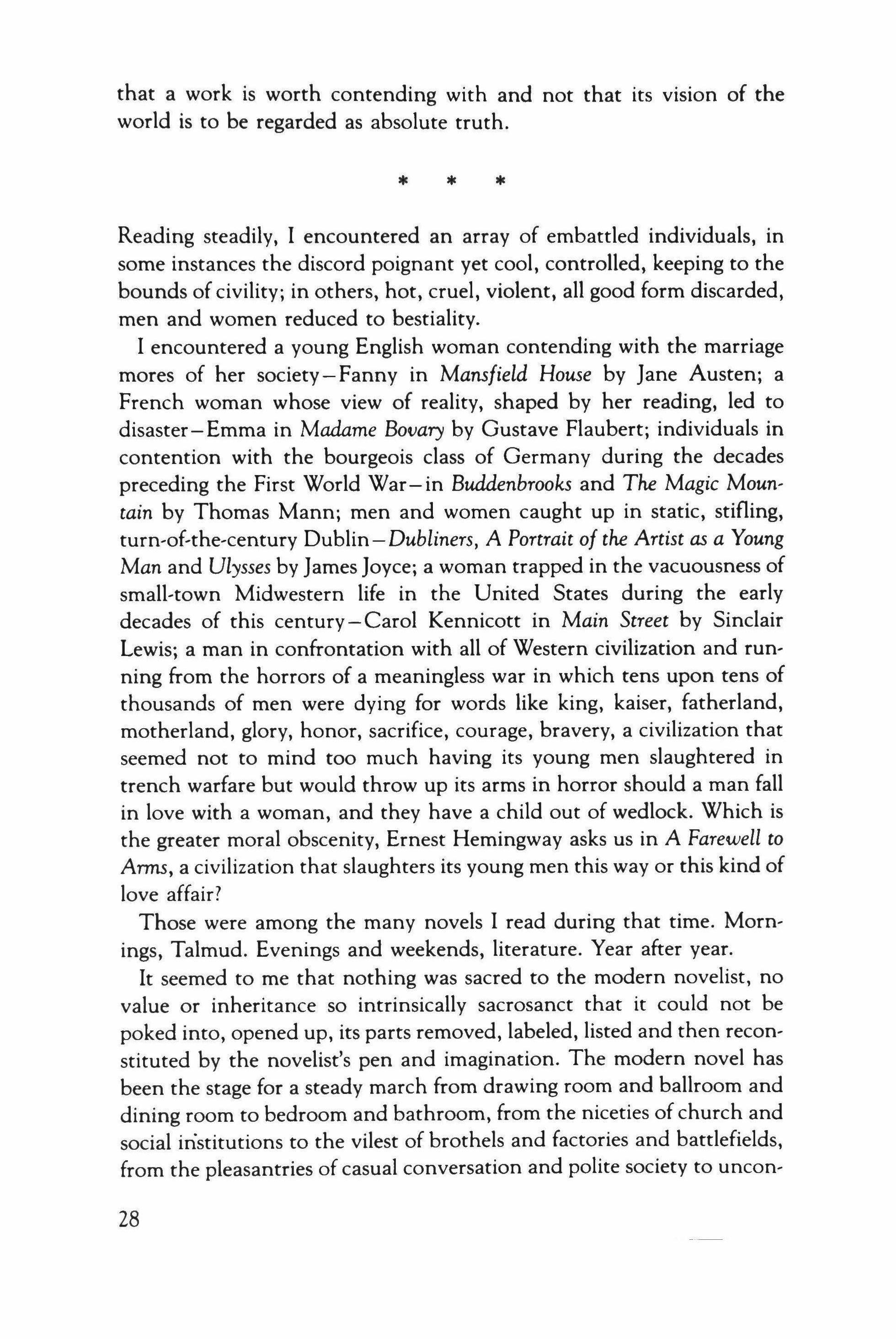
that a work is worth contending with and not that its vision of the world is to be regarded as absolute truth.
* * *
Reading steadily, I encountered an array of embattled individuals, in some instances the discord poignant yet cool, controlled, keeping to the bounds of civility; in others, hot, cruel, violent, all good form discarded, men and women reduced to bestiality.
I encountered a young English woman contending with the marriage mores of her society-Fanny in Mansfield House by Jane Austen; a French woman whose view of reality, shaped by her reading, led to disaster-Emma in Madame Bovary by Gustave Flaubert; individuals in contention with the bourgeois class of Germany during the decades preceding the First World War-in Buddenbrooks and The Magic Mountain by Thomas Mann; men and women caught up in static, stifling, turn-of-the-century Dublin - Dubliners, A Portrait of the Artist as a Young Man and Ulysses by James Joyce; a woman trapped in the vacuousness of small-town Midwestern life in the United States during the early decades of this century - Carol Kennicott in Main Street by Sinclair Lewis; a man in confrontation with all of Western civilization and running from the horrors of a meaningless war in which tens upon tens of thousands of men were dying for words like king, kaiser, fatherland, motherland, glory, honor, sacrifice, courage, bravery, a civilization that seemed not to mind too much having its young men slaughtered in trench warfare but would throw up its arms in horror should a man fall in love with a woman, and they have a child out of wedlock. Which is the greater moral obscenity, Ernest Hemingway asks us in A Farewell to Arms, a civilization that slaughters its young men this way or this kind of love affair?
Those were among the many novels I read during that time. Mornings, Talmud. Evenings and weekends, literature. Year after year.
It seemed to me that nothing was sacred to the modern novelist, no value or inheritance so intrinsically sacrosanct that it could not be poked into, opened up, its parts removed, labeled, listed and then reconstituted by the novelist's pen and imagination. The modern novel has been the stage for a steady march from drawing room and ballroom and dining room to bedroom and bathroom, from the niceties of church and social institutions to the vilest of brothels and factories and battlefields, from the pleasantries of casual conversation and polite society to uncon-
28
scious psychological states and our most deeply repressed motives and passions.
Even the novel itself as an art form is not sacred to the novelist; it too has journeyed, through realism, naturalism, symbolism, minimalism to-what next? It has in the course of the journey attained a Huckleberrv-Finn-like awareness of its own self, a self-consciousness which, like art in the hands of Picasso and music in the hands of Cage, has turned it upon its own inner clockwork and reason for being, and brought it to use its own forms, and unusual forms from other realms of expression, as subjects for art. Literature as the subject of literature, language writing about language rather than about the world-perhaps because it can no longer focus upon the chaotic brutality of our current existence and map the shifting complexities of contemporary values; it cannot deal with the primacy ofpossibilities, with a world that offers the self a panorama of endless promise from which there is absent a sense of rooted belonging. Promise without premise-a special sort of hell. So the artist makes his or her own art the premise of life. Myth died in this modern period of decreation, and the novel has done a long tracking shot of that death, while decreating itself in the process. For the modernist, the details of life were the center of attention: focus on the details, order them, understand them. An act of secular redemption. For the postmodernist, even the details no longer exist in stable form. Norhing is redeemable. All is flux. Now many look upon the artist as secular creator and prophet, as the only one capable ofcarving into some sort of significance the anarchic storms of contemporary experience, and perhaps finding new patterns and myths in the roiling and commonplace events of our present lives. Nothing is sacred to the serious novelist, save perhaps the act of writing.
That's what I learned about literature.
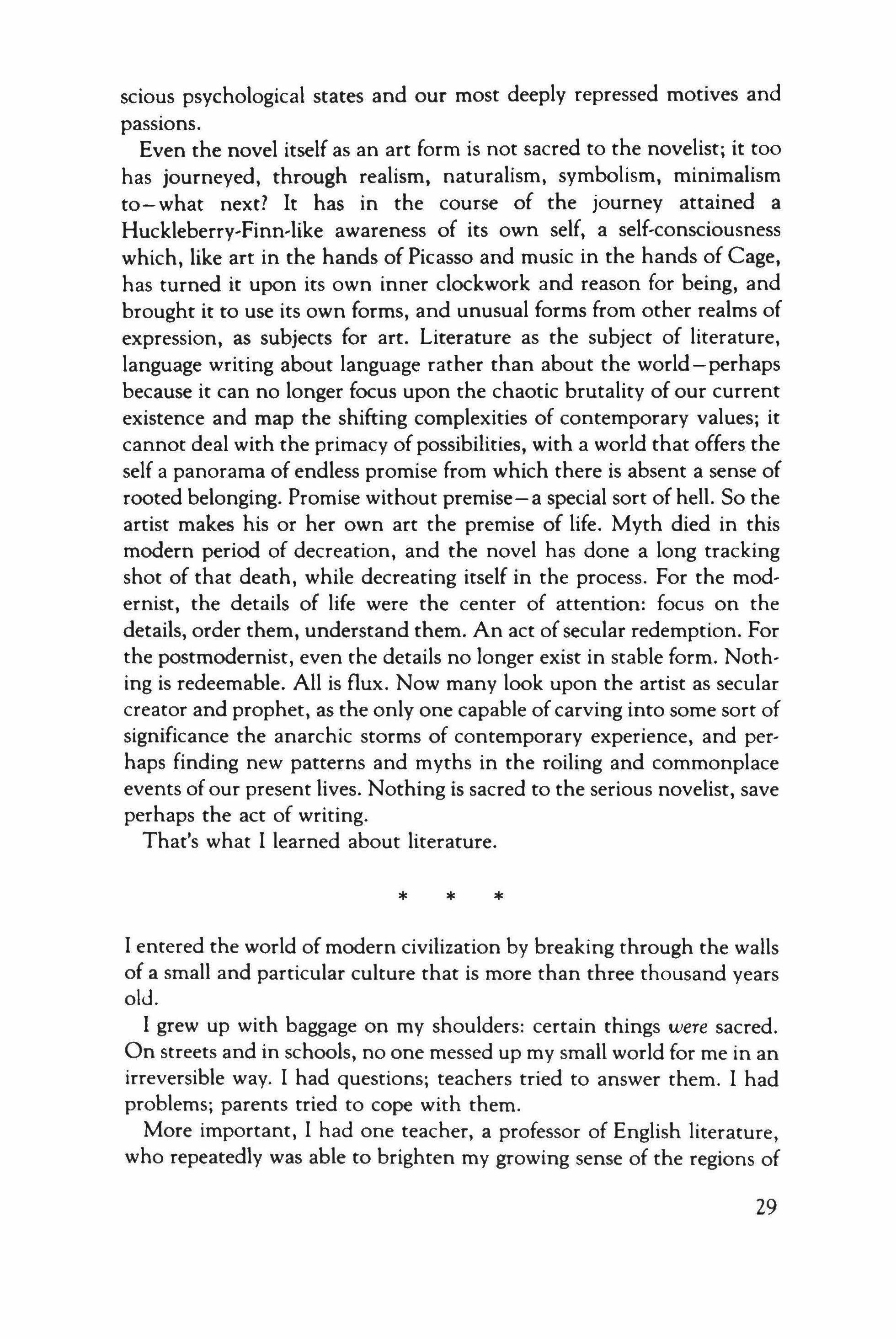
I entered the world of modern civilization by breaking through the walls of a small and particular culture that is more than three thousand years old.
I grew up with baggage on my shoulders: certain things were sacred. On streets and in schools, no one messed up my small world for me in an irreversible way. I had questions; teachers tried to answer them. I had problems; parents tried to cope with them.
More important, I had one teacher, a professor of English literature, who repeatedly was able to brighten my growing sense of the regions of
* * *
29
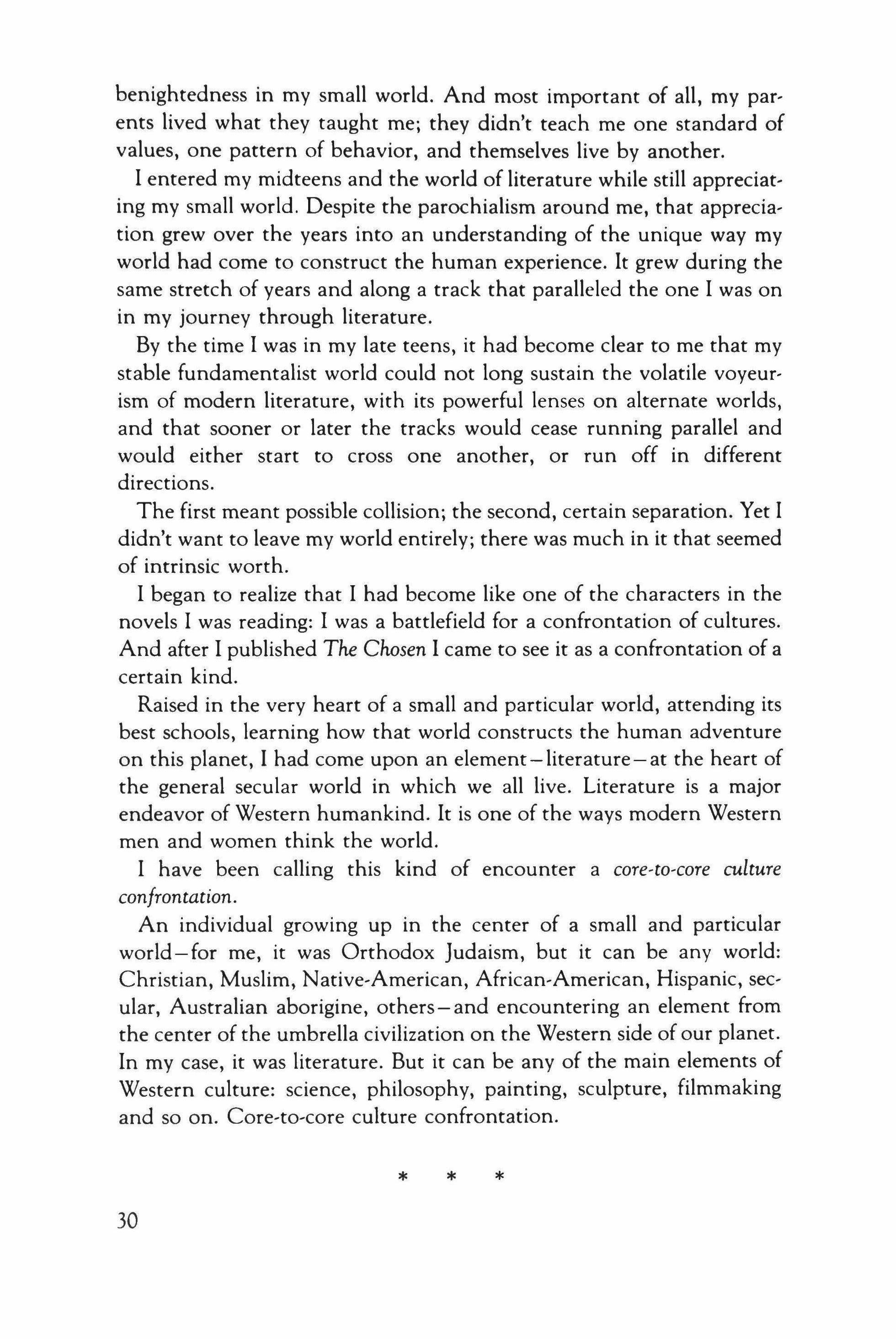
benightedness in my small world. And most important of all, my parents lived what they taught me; they didn't teach me one standard of values, one pattern of behavior, and themselves live by another.
I entered my midteens and the world of literature while still appreciating my small world. Despite the parochialism around me, that appreciation grew over the years into an understanding of the unique way my world had come to construct the human experience. It grew during the same stretch of years and along a track that paralleled the one I was on in my journey through literature.
By the time I was in my late teens, it had become clear to me that my stable fundamentalist world could not long sustain the volatile voyeurism of modern literature, with its powerful lenses on alternate worlds, and that sooner or later the tracks would cease running parallel and would either start to cross one another, or run off in different directions.
The first meant possible collision; the second, certain separation. Yet I didn't want to leave my world entirely; there was much in it that seemed of intrinsic worth.
I began to realize that I had become like one of the characters in the novels I was reading: I was a battlefield for a confrontation of cultures. And after I published The Chosen I came to see it as a confrontation of a certain kind.
Raised in the very heart of a small and particular world, attending its best schools, learning how that world constructs the human adventure on this planet, I had come upon an element -literature - at the heart of the general secular world in which we all live. Literature is a major endeavor of Western humankind. It is one of the ways modern Western men and women think the world.
I have been calling this kind of encounter a core-to-core culture confrontation.
An individual growing up in the center of a small and particular world-for me, it was Orthodox Judaism, but it can be any world: Christian, Muslim, Native-American, African-American, Hispanic, secular, Australian aborigine, others-and encountering an element from the center of the umbrella civilization on the Western side of our planet. In my case, it was literature. But it can be any of the main elements of Western culture: science, philosophy, painting, sculpture, filmmaking and so on. Core-to-core culture confrontation.
* * * 30
At the core of modern Western civilization reside, among many others, the following individuals: Rousseau, Diderot, Marx, Darwin, Freud, Einstein, Kafka, Joyce, Picasso, Stravinsky. It makes little difference whether we have or haven't studied Marx or Freud, read a word by Kafka or Joyce, seen a painting by Picasso, heard a bar of music by Stravinsky. The creations of those individuals pervade the air we breathe, light our world and serve us as maps for our own journeys.
At the core of my first culture-and here, substitute for yourselves others at the core of your early world if it differs from mine-reside, among others, an individual named Hillel, one of the greatest of the sages of the talmudic period; Akiba, a talmudic sage of heroic distinctiveness; Maimonides, the most innovative of the medieval rabbis; Ibn Ezra, for me the most daring of the medieval Spanish-Jewish commentators on the Bible; Rashi, by far the greatest of the Franco-German commentators on the Bible and Talmud; Isaac Luria, the most remarkable of the Jewish mystics; and the like.
Often the two cores are in harmony and generate little friction as they rub up against each other. At times, however, they see the world in very different ways. Someone caught up in and committed to both cultures simultaneously may suddenly find it necessary to navigate turbulent cultural waters. Commitments will have to be weighed, choices made. That is culture confrontation.
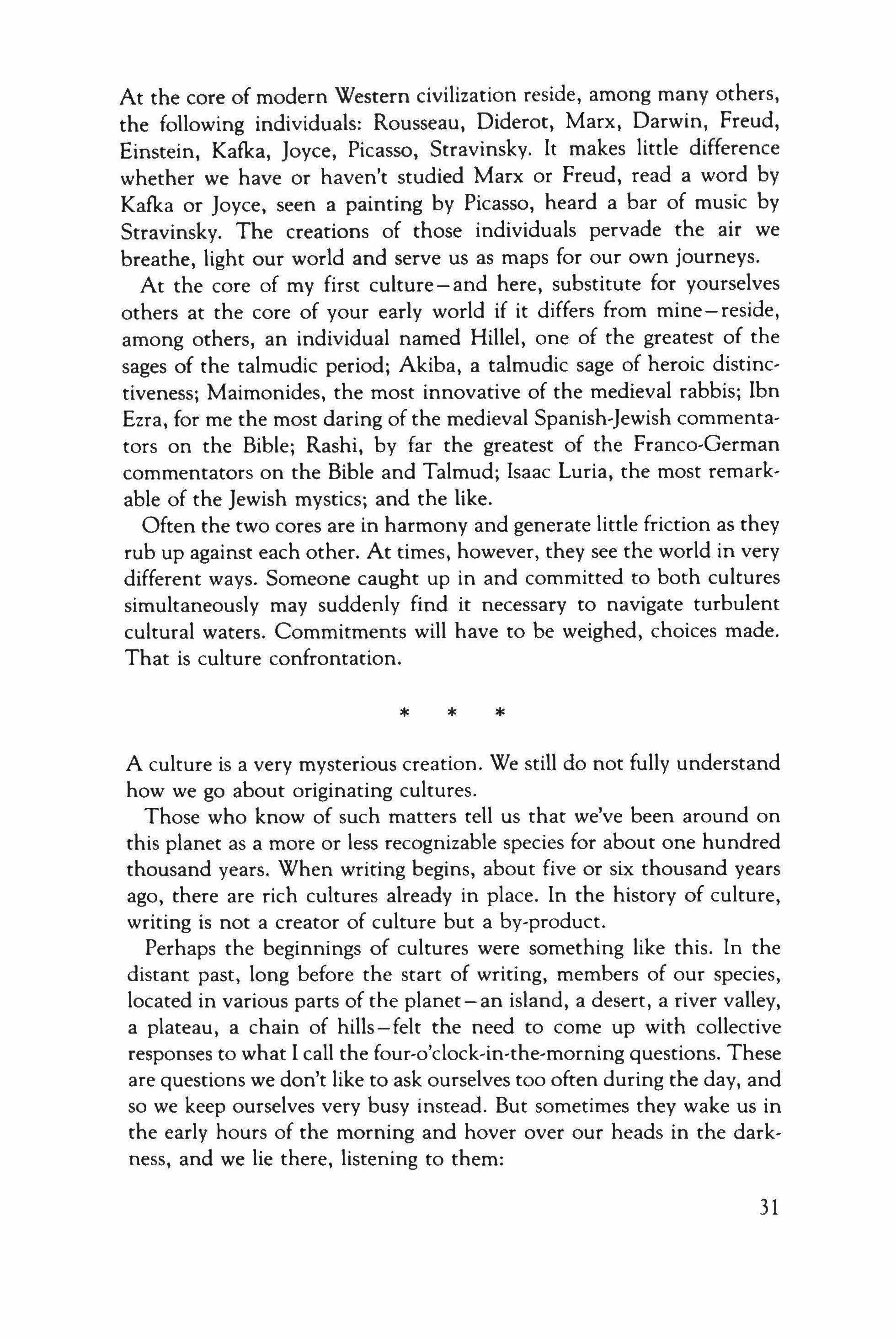
A culture is a very mysterious creation. We still do not fully understand how we go about originating cultures.
Those who know of such matters tell us that we've been around on this planet as a more or less recognizable species for about one hundred thousand years. When writing begins, about five or six thousand years ago, there are rich cultures already in place. In the history of culture, writing is not a creator of culture but a by-product.
Perhaps the beginnings of cultures were something like this. In the distant past, long before the start of writing, members of our species, located in various parts of the planet-an island, a desert, a river valley, a plateau, a chain of hills-felt the need to come up with collective responses to what I call the four-o'clock-in-the-morning questions. These are questions we don't like to ask ourselves too often during the day, and so we keep ourselves very busy instead. But sometimes they wake us in the early hours of the morning and hover over our heads in the darkness, and we lie there, listening to them:
* * *
31
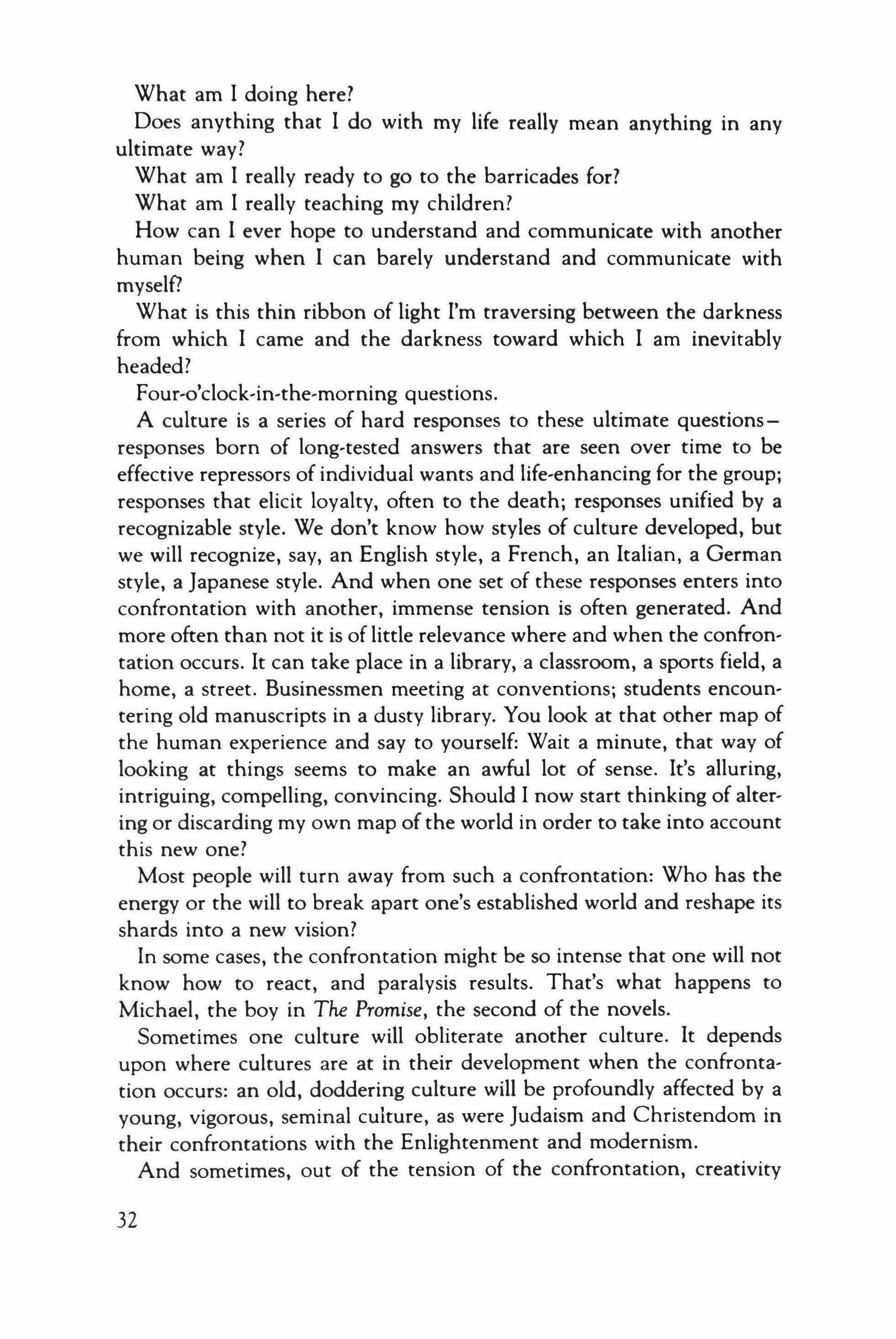
What am I doing here?
Does anything that I do with my life really mean anything in any ultimate way?
What am I really ready to go to the barricades for?
What am I really teaching my children?
How can I ever hope to understand and communicate with another human being when I can barely understand and communicate with myself?
What is this thin ribbon of light I'm traversing between the darkness from which I carne and the darkness toward which I am inevitably headed?
Four-o'clock-in-the-morning questions.
A culture is a series of hard responses to these ultimate questionsresponses born of long-tested answers that are seen over time to be effective repressors of individual wants and life-enhancing for the group; responses that elicit loyalty, often to the death; responses unified by a recognizable style. We don't know how styles of culture developed, but we will recognize, say, an English style, a French, an Italian, a German style, a Japanese style. And when one set of these responses enters into confrontation with another, immense tension is often generated. And more often than not it is of little relevance where and when the confrontation occurs. It can take place in a library, a classroom, a sports field, a horne, a street. Businessmen meeting at conventions; students encountering old manuscripts in a dusty library. You look at that other map of the human experience and say to yourself: Wait a minute, that way of looking at things seems to make an awful lot of sense. It's alluring, intriguing, compelling, convincing. Should I now start thinking of altering or discarding my own map of the world in order to take into account this new one?
Most people will turn away from such a confrontation: Who has the energy or the will to break apart one's established world and reshape its shards into a new vision?
In some cases, the confrontation might be so intense that one will not know how to react, and paralysis results. That's what happens to Michael, the boy in The Promise, the second of the novels.
Sometimes one culture will obliterate another culture. It depends upon where cultures are at in their development when the confrontation occurs: an old, doddering culture will be profoundly affected by a young, vigorous, seminal culture, as were Judaism and Christendom in their confrontations with the Enlightenment and modernism.
And sometimes, out of the tension of the confrontation, creativity
32
ensues by way of response, ideas are born, music is composed, paintings are made, books are written-gold is given us, which we can mine for all the rest of our existence as a species.
Israelites enter a new land after a long wilderness wandering and encounter what we now know to have been the highly sophisticated, literate, feudal culture of ancient Canaan. Eight hundred years of culture war follow. Out of that war emerges a remarkable literature, elements of which consist of fusions of core elements of both cultures. Much of the Book of Psalms is a result of core-to-core culture confrontation: Canaanite literary forms and Israelite monotheistic content.
A medieval rabbi encounters the thought of a long-dead Greek pagan. The rabbi is awed by the mind of the pagan. It is inconceivable to him that his revealed religious tradition does not contain the thought of that pagan - how can the word of God be inferior in quality to the philosophy of a Greek? -or the ability to refute it. The rabbi writes one of the great works of medieval thought in which he subjects the tradition to radical reinterpretation. The tradition has never been the same since.
Decades later, a Catholic encounters the thought of that same Greek pagan. The Catholic is familiar with the work of the rabbi, and in response to the pagan creates some of the greatest works of medieval theology.
The rabbi - Maimonides. The Catholic - Aquinas. The GreekAristotle.
In our own time, one of the greatest painters who ever lived encountered what to him was a new - it was fairly oldway of depicting the human form. Out of the ensuing tension came a new way of seeing the world.
The painter-Picasso. The different way of depicting the human form-African art. The result-cubism and modern art.
Repeatedly in the history of our species, when cores of culture have entered into confrontation, out of the resulting tension - sometimes tumultuous, sometimes tranquil- has come creativity that has helped to move us that much farther away from the dark magic of our beginnings.
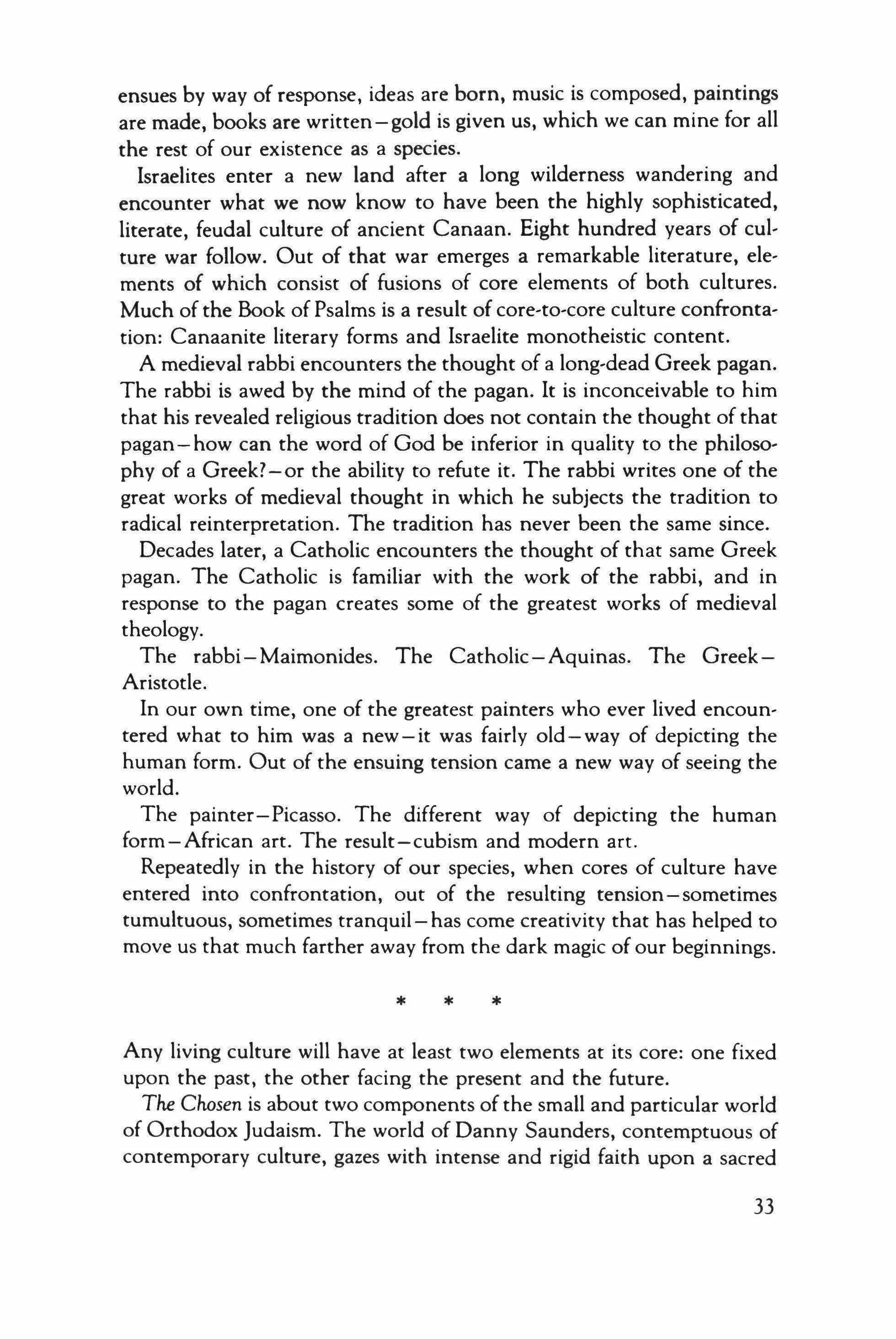
Any living culture will have at least two elements at its core: one fixed upon the past, the other facing the present and the future.
The Chosen is about two components of the small and particular world of Orthodox Judaism. The world of Danny Saunders, contemptuous of contemporary culture, gazes with intense and rigid faith upon a sacred
* * *
33
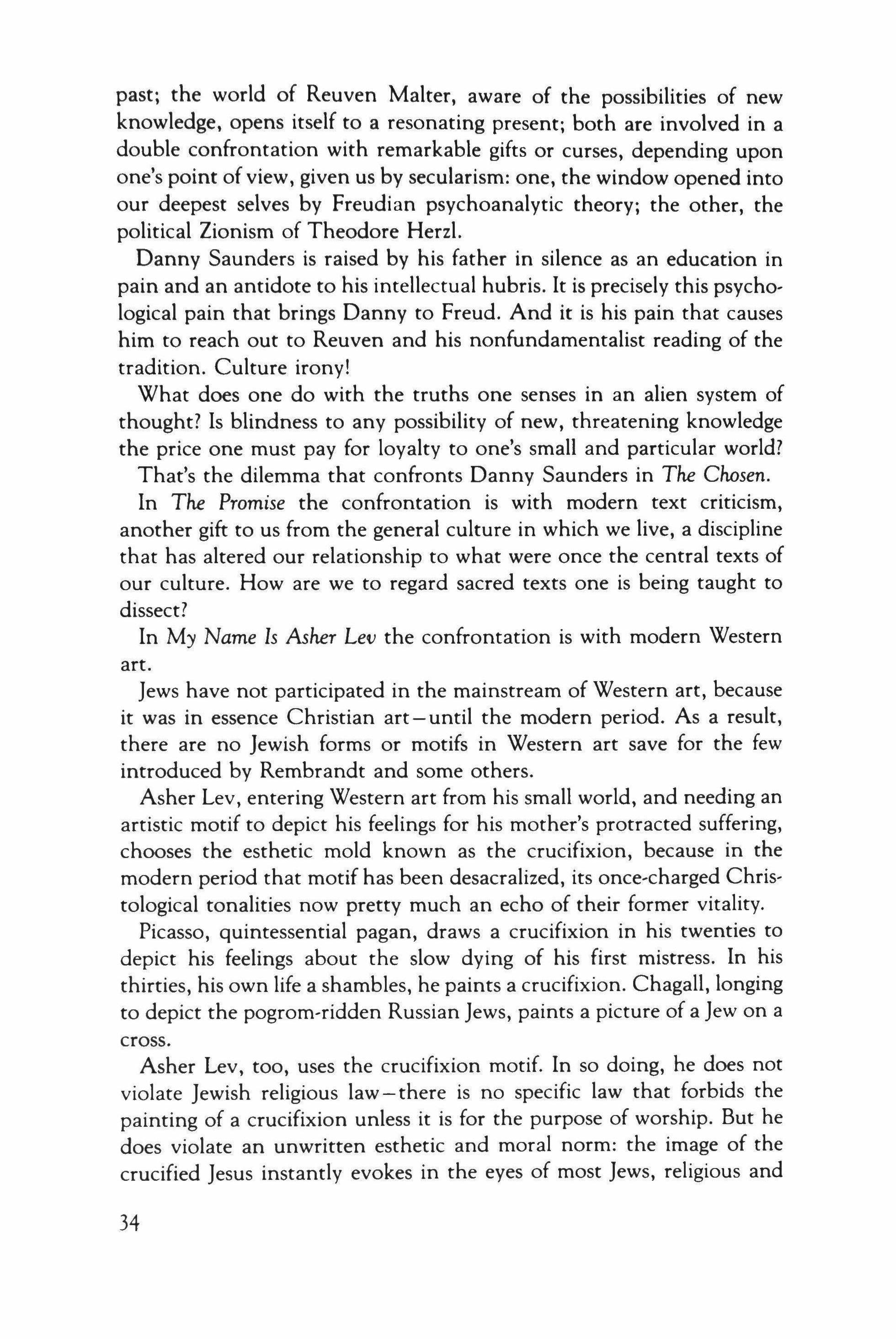
past; the world of Reuven Malter, aware of the possibilities of new knowledge, opens itself to a resonating present; both are involved in a double confrontation with remarkable gifts or curses, depending upon one's point of view, given us by secularism: one, the window opened into our deepest selves by Freudian psychoanalytic theory; the other, the political Zionism of Theodore Herzl.
Danny Saunders is raised by his father in silence as an education in pain and an antidote to his intellectual hubris. It is precisely this psychological pain that brings Danny to Freud. And it is his pain that causes him to reach out to Reuven and his nonfundamentalist reading of the tradition. Culture irony!
What does one do with the truths one senses in an alien system of thought? Is blindness to any possibility of new, threatening knowledge the price one must pay for loyalty to one's small and particular world?
That's the dilemma that confronts Danny Saunders in The Chosen.
In The Promise the confrontation is with modern text criticism, another gift to us from the general culture in which we live, a discipline that has altered our relationship to what were once the central texts of our culture. How are we to regard sacred texts one is being taught to dissect?
In My Name Is Asher Lev the confrontation is with modern Western art.
Jews have not participated in the mainstream of Western art, because it was in essence Christian art - until the modern period. As a result, there are no Jewish forms or motifs in Western art save for the few introduced by Rembrandt and some others.
Asher Lev, entering Western art from his small world, and needing an artistic motif to depict his feelings for his mother's protracted suffering, chooses the esthetic mold known as the crucifixion, because in the modern period that motif has been desacralized, its once-charged Christological tonalities now pretty much an echo of their former vitality.
Picasso, quintessential pagan, draws a crucifixion in his twenties to depict his feelings about the slow dying of his first mistress. In his thirties, his own life a shambles, he paints a crucifixion. Chagall, longing to depict the pogrom-ridden Russian Jews, paints a picture of a Jew on a cross.
Asher Lev, too, uses the crucifixion motif. In so doing, he does not violate Jewish religious law - there is no specific law that forbids the painting of a crucifixion unless it is for the purpose of worship. But he does violate an unwritten esthetic and moral norm: the image of the crucified Jesus instantly evokes in the eyes of most Jews, religious and
34
secular, pictures of rivers of Jewish blood, because of the countless Jews slain through the centuries for the charge of deicide. In Asher Lev, the image evokes protracted torment. He is aware of how his parents and community will react to those paintings. He chooses for his art, and pays the price of exile.
In the Beginning, set in the time of the Depression, the Second World War and the Holocaust, tells about a young man's confrontation with the radical new discipline of scientific Bible criticism and its strange alliance with anti-Semitism.
The Book of Lights is about a confrontation with the only pagan world remaining on this planet - the world of Asia.
Davita's Harp is about a confrontation between two potent fundamentalisms, two contrary mappings of the world: Jewish Orthodoxy and Marxist ideology.
The Gift of Asher Lev continues the theme of core-to-core culture confrontation into the next generation of children and grandchildren. Wanderings, the nonfiction work, is about all the various kinds of culture confrontations experienced by the Jewish people through the millennia as they came into contact with virtually all the major civilizations on our planet.
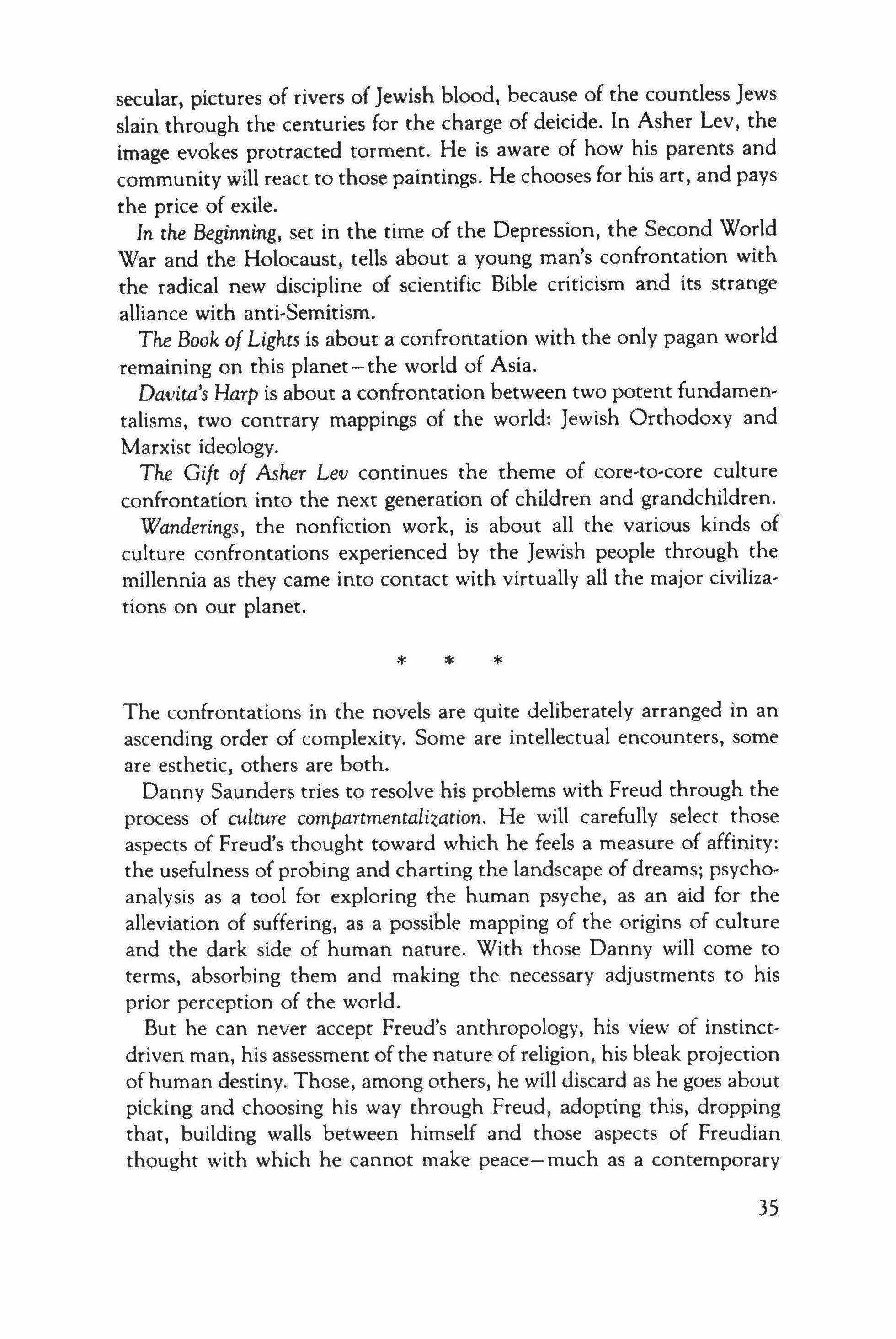
The confrontations in the novels are quite deliberately arranged in an ascending order of complexity. Some are intellectual encounters, some are esthetic, others are both.
Danny Saunders tries to resolve his problems with Freud through the process of culture compartmentalization. He will carefully select those aspects of Freud's thought toward which he feels a measure of affinity: the usefulness of probing and charting the landscape of dreams; psychoanalysis as a tool for exploring the human psyche, as an aid for the alleviation of suffering, as a possible mapping of the origins of culture and the dark side of human nature. With those Danny will come to terms, absorbing them and making the necessary adjustments to his prior perception of the world.
But he can never accept Freud's anthropology, his view of instinctdriven man, his assessment of the nature of religion, his bleak projection of human destiny. Those, among others, he will discard as he goes about picking and choosing his way through Freud, adopting this, dropping that, building walls between himself and those aspects of Freudian thought with which he cannot make peace-much as a contemporary
* * *
35

physicist who is also a devout religionist might claim that physics deals only with the material world and religion deals with the world of the spirit, and the two are separate realms with different sets of premises.
One might ask: By what right does one go about picking, choosing, accepting, rejecting this or that element in another system of thought? Don't we compromise intellectual honesty when we do that?
Well, perhaps. But we do it all the time. Indeed, the founding fathers of modernism did precisely that when they skipped over Christendom, which they abhorred, and entered into a cultural alliance with the more rational elements of Roman and Greek civilization, knowingly overlooking the cruelty, the greed, the hunger for power, the orgiastic mystery religions and many of the other unpleasantries that were fairly commonplace features of those pagan cultures.
Danny Saunders relates to Freud as many of us do when we confront an intriguing, challenging, compelling, threatening body of ideas: we select out of those ideas those elements toward which we feel a measure of affinity; those we take into ourselves, the rest we ignore.
That's what Reuven Malter does in The Promise. He uses the methodology of text criticism on the Talmud, but not on the central text of Judaism, the Bible. To use it on the Bible would render the biblical text fluid. There would suddenly be no solid ground in Reuven's life, no core.
There is no logical way one can defend restricting the use of this method to the Talmud only, and refraining from using it on the Bibleother than to argue from the premise that the Bible was revealed to us by God and is therefore the bedrock of Jewish law, and once we start tampering with it - doubting this, emending that - all of Jewish law will begin to crumble. Hence, Reuven Malter walls away the Bible from this new methodology.
Asher Lev, on the other hand, cannot compartmentalize. The arts do not lend themselves easily to the erection of sequestering walls, but tend to spill over into all the areas of experience. They comment upon and affect everything we think and do. Once we enter the arts, they invade and transform every bend and zigzag of our being.
Here the confrontation is along the lines of culture fusion.
The arena of conflict is a boiling cauldron into which both sides toss their feelings, ideas, dreams, terrors, all the elements of their separate beings-in this instance, the entire person that is Asher Lev and the entire tradition that is Western art. The result is often unpredictable, explosive, profound - and nearly always interesting.
36
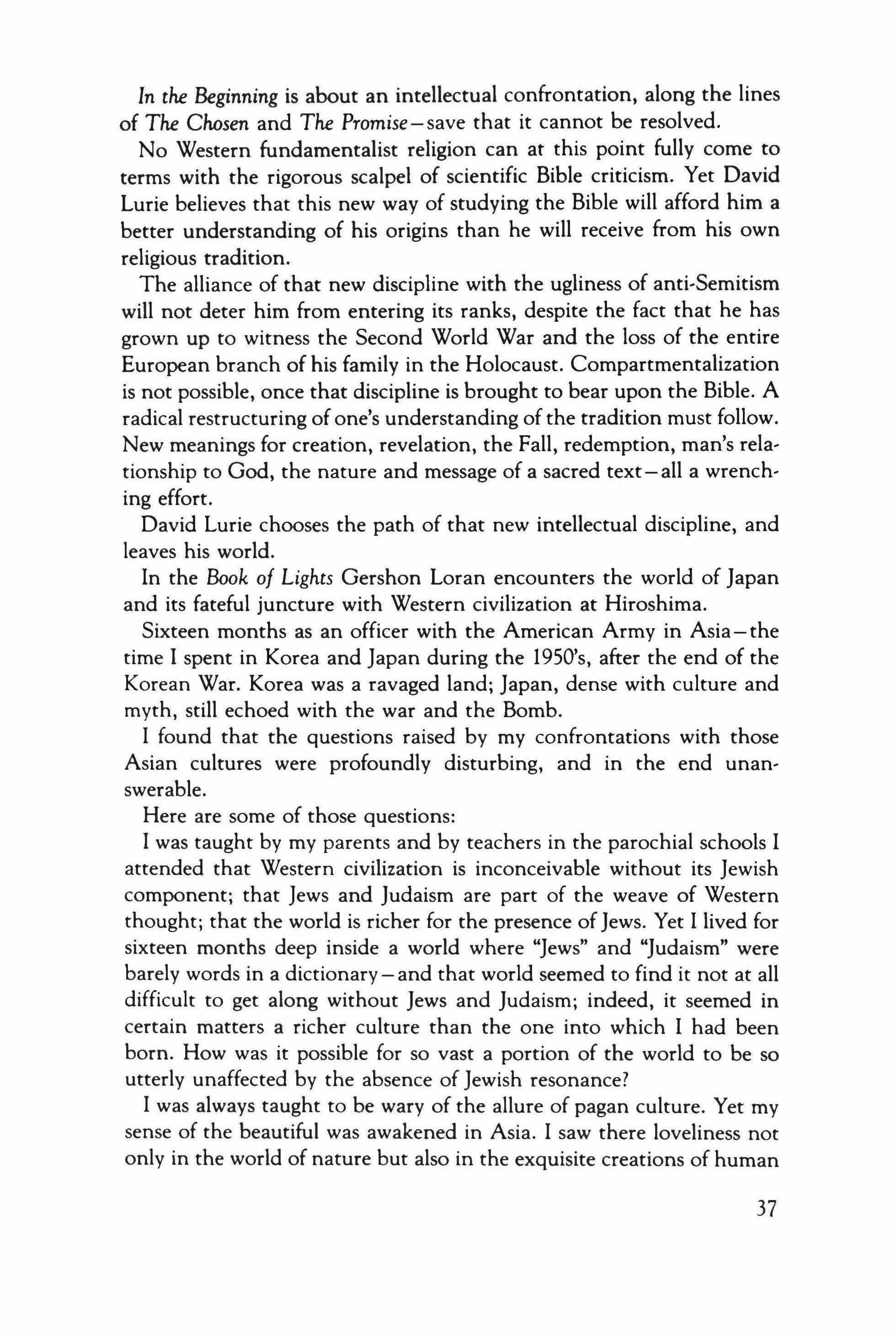
In the Beginning is about an intellectual confrontation, along the lines of The Chosen and The Promise-save that it cannot be resolved.
No Western fundamentalist religion can at this point fully come to terms with the rigorous scalpel of scientific Bible criticism. Yet David Lurie believes that this new way of studying the Bible will afford him a better understanding of his origins than he will receive from his own religious tradition.
The alliance of that new discipline with the ugliness of anti-Semitism will not deter him from entering its ranks, despite the fact that he has grown up to witness the Second World War and the loss of the entire European branch of his family in the Holocaust. Compartmentalization is not possible, once that discipline is brought to bear upon the Bible. A radical restructuring of one's understanding of the tradition must follow. New meanings for creation, revelation, the Fall, redemption, man's relationship to God, the nature and message of a sacred text - all a wrenching effort.
David Lurie chooses the path of that new intellectual discipline, and leaves his world.
In the Book 0/ Lights Gershon Loran encounters the world of Japan and its fateful juncture with Western civilization at Hiroshima.
Sixteen months as an officer with the American Army in Asia - the time I spent in Korea and Japan during the 1950's, after the end of the Korean War. Korea was a ravaged land; Japan, dense with culture and myth, still echoed with the war and the Bomb.
I found that the questions raised by my confrontations with those Asian cultures were profoundly disturbing, and in the end unanswerable.
Here are some of those questions:
I was taught by my parents and by teachers in the parochial schools I attended that Western civilization is inconceivable without its Jewish component; that Jews and Judaism are part of the weave of Western thought; that the world is richer for the presence ofJews. Yet I lived for sixteen months deep inside a world where "Jews" and "Judaism" were barely words in a dictionary - and that world seemed to find it not at all difficult to get along without Jews and Judaism; indeed, it seemed in certain matters a richer culture than the one into which I had been born. How was it possible for so vast a portion of the world to be so utterly unaffected by the absence of Jewish resonance?
I was always taught to be wary of the allure of pagan culture. Yet my sense of the beautiful was awakened in Asia. I saw there loveliness not only in the world of nature but also in the exquisite creations of human
37
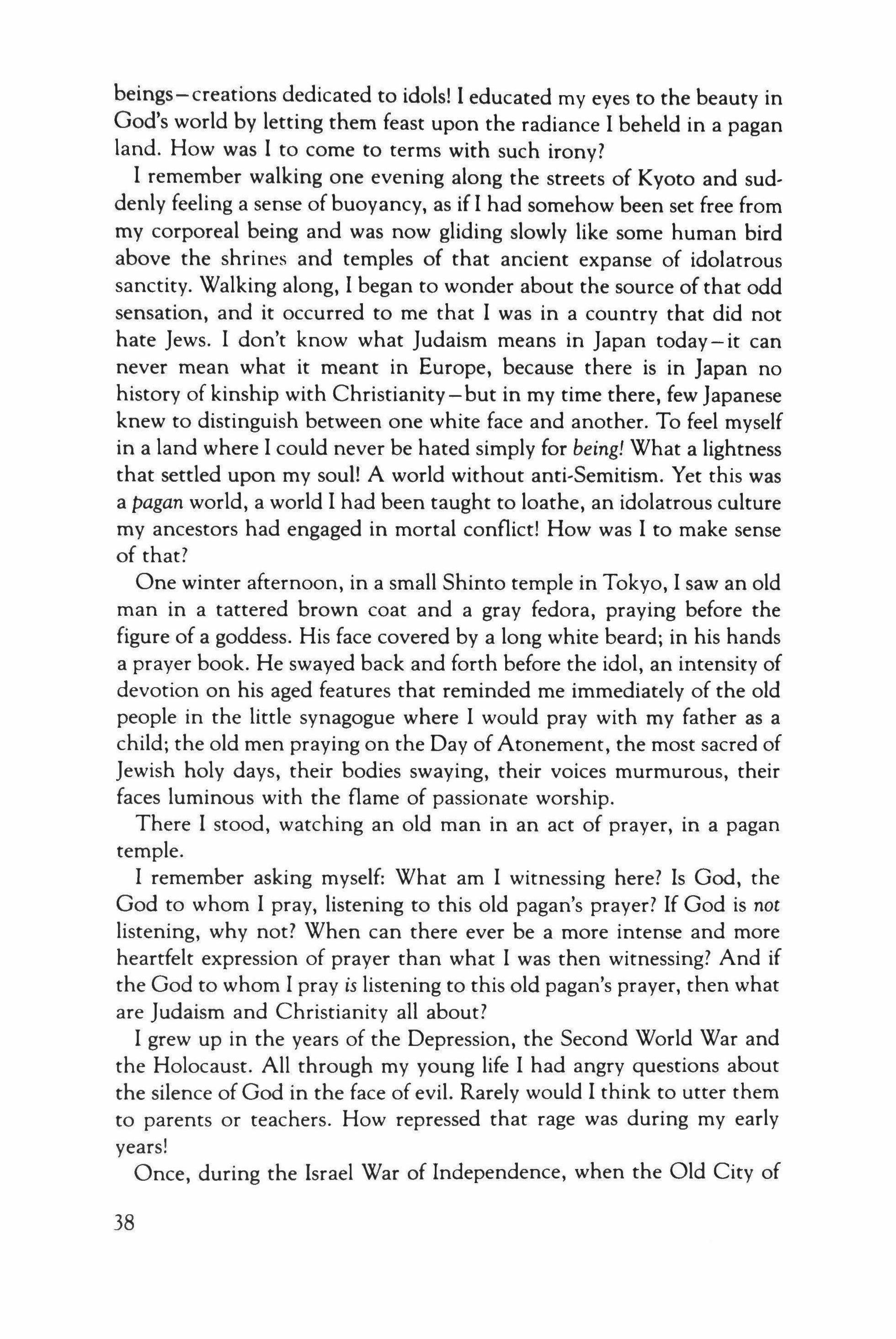
beings-creations dedicated to idols! I educated my eyes to the beauty in God's world by letting them feast upon the radiance I beheld in a pagan land. How was I to come to terms with such irony?
I remember walking one evening along the streets of Kyoto and suddenly feeling a sense of buoyancy, as if I had somehow been set free from my corporeal being and was now gliding slowly like some human bird above the shrines and temples of that ancient expanse of idolatrous sanctity. Walking along, I began to wonder about the source of that odd sensation, and it occurred to me that I was in a country that did not hate Jews. I don't know what Judaism means in Japan today-it can never mean what it meant in Europe, because there is in Japan no history of kinship with Christianity - but in my time there, few Japanese knew to distinguish between one white face and another. To feel myself in a land where I could never be hated simply for being! What a lightness that settled upon my soul! A world without anti-Semitism. Yet this was a pagan world, a world I had been taught to loathe, an idolatrous culture my ancestors had engaged in mortal conflict! How was I to make sense of that?
One winter afternoon, in a small Shinto temple in Tokyo, I saw an old man in a tattered brown coat and a gray fedora, praying before the figure of a goddess. His face covered by a long white beard; in his hands a prayer book. He swayed back and forth before the idol, an intensity of devotion on his aged features that reminded me immediately of the old people in the little synagogue where I would pray with my father as a child; the old men praying on the Day of Atonement, the most sacred of Jewish holy days, their bodies swaying, their voices murmurous, their faces luminous with the flame of passionate worship.
There I stood, watching an old man in an act of prayer, in a pagan temple.
I remember asking myself: What am I witnessing here? Is God, the God to whom I pray, listening to this old pagan's prayer? If God is not listening, why not? When can there ever be a more intense and more heartfelt expression of prayer than what I was then witnessing? And if the God to whom I pray is listening to this old pagan's prayer, then what are Judaism and Christianity all about?
I grew up in the years of the Depression, the Second World War and the Holocaust. All through my young life I had angry questions about the silence of God in the face of evil. Rarely would I think to utter them to parents or teachers. How repressed that rage was during my early years!
Once, during the Israel War of Independence, when the Old City of
38
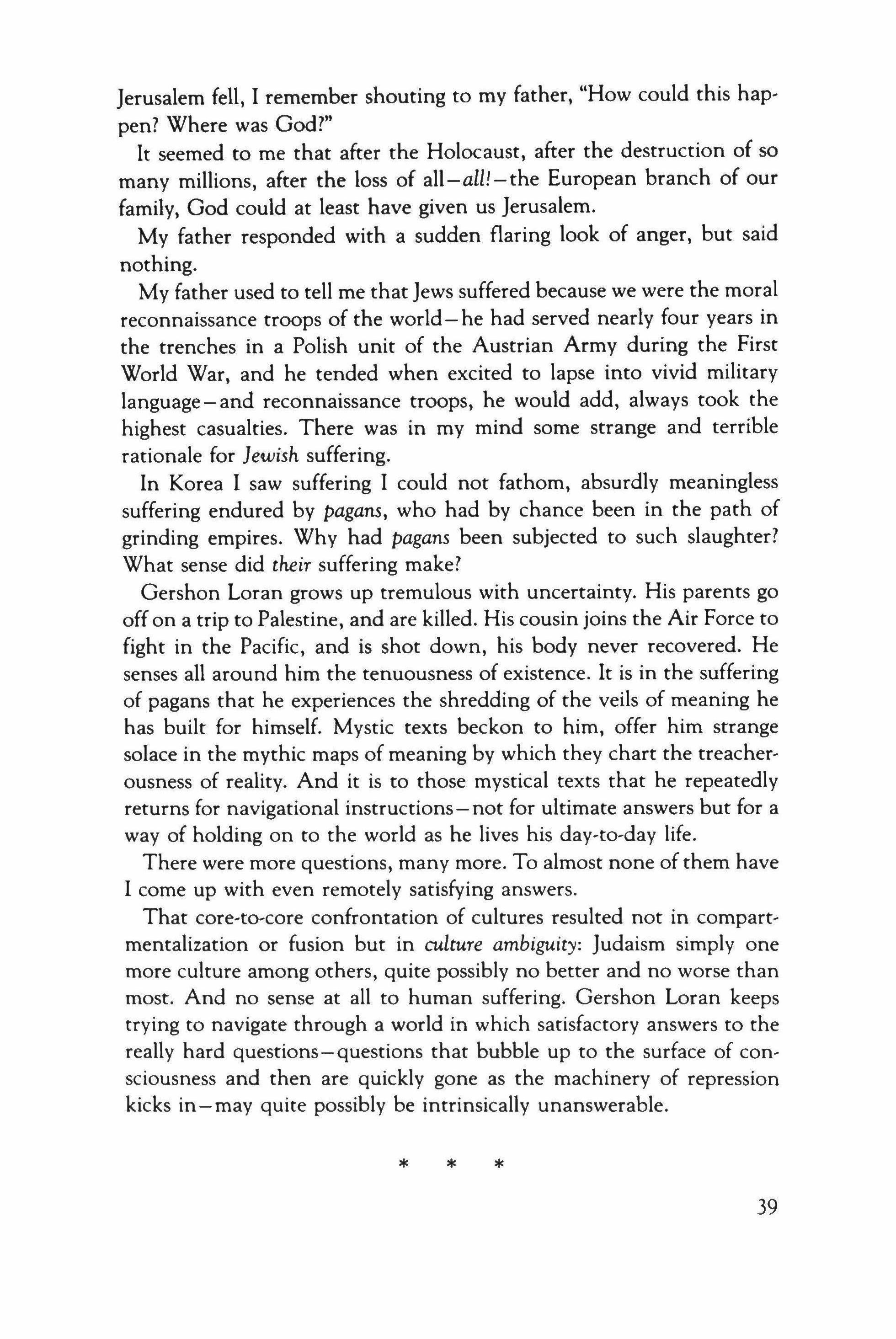
Jerusalem fell, I remember shouting to my father, "How could this happen? Where was God?"
It seemed to me that after the Holocaust, after the destruction of so many millions, after the loss of all-all!-the European branch of our family, God could at least have given us Jerusalem.
My father responded with a sudden flaring look of anger, but said nothing.
My father used to tell me that Jews suffered because we were the moral reconnaissance troops of the world - he had served nearly four years in the trenches in a Polish unit of the Austrian Army during the First World War, and he tended when excited to lapse into vivid military language-and reconnaissance troops, he would add, always took the highest casualties. There was in my mind some strange and terrible rationale for Jewish suffering.
In Korea I saw suffering I could not fathom, absurdly meaningless suffering endured by pagans, who had by chance been in the path of grinding empires. Why had pagans been subjected to such slaughter? What sense did their suffering make?
Gershon Loran grows up tremulous with uncertainty. His parents go off on a trip to Palestine, and are killed. His cousin joins the Air Force to fight in the Pacific, and is shot down, his body never recovered. He senses all around him the tenuousness of existence. It is in the suffering of pagans that he experiences the shredding of the veils of meaning he has built for himself. Mystic texts beckon to him, offer him strange solace in the mythic maps of meaning by which they chart the treacherousness of reality. And it is to those mystical texts that he repeatedly returns for navigational instructions-not for ultimate answers but for a way of holding on to the world as he lives his day-to-day life.
There were more questions, many more. To almost none of them have I come up with even remotely satisfying answers.
That core-to-core confrontation of cultures resulted not in compartmentalization or fusion but in culture ambiguity: Judaism simply one more culture among others, quite possibly no better and no worse than most. And no sense at all to human suffering. Gershon Loran keeps trying to navigate through a world in which satisfactory answers to the really hard questions-questions that bubble up to the surface of consciousness and then are quickly gone as the machinery of repression kicks in-may quite possibly be intrinsically unanswerable.
* * * 39
This invisible scaffolding-recondite, cerebral, perhaps bordering on pedantry - how does a writer of stories charge it with the drama of fictive life? How conceal it and yet make its presence known and felt? How bring to it the necessary passion that will enable it to penetrate varieties of culture envelopes?
That's the challenge that has faced me throughout my years as a writer of stories: to use that scaffolding as a structure for the stories and at the same time not only to make the reader an outside observer of a newly uncovered human experience but also to generate in him and her the powerful feeling of being vividly subjected to it, identified with it, overcome by it.
The sentences I write are steps in my search for the core of an intellectual-moral-emotional moment. That core has to consist of an ideaimage or a series of idea-images that I can render in words. Idea and image constitute a single essence. I call that essentialist writing.
I look for images, ideas, feelings in which we can all participate, no matter who we are and what the small and particular worlds we came from; essentialist core images that will connect the reader to the scaffolding through conduits of ideas, small hairs rising on the back of the neck, unfamiliar sensations in the pit of the stomach.
Essentialist images: a baseball striking a player's eye; a caring father oddly silent in the presence of his son; a nosebleed on a roller coaster; a carnival game filled with promises made and broken; an old family photograph of a group of young men with weapons; a painting of a crucified woman; a crumpled sandcastle on a sandy beach; a man vanishing into the boiling chaos of the bombing of Guernica; the Hiroshima Peace Monument on a cold winter morning; a man carrying his little daughter to a hospital along dark rainswept cobblestone streets; a family hiding from the Germans in a sunless Paris apartment. Images thought and felt, images not overwhelmed by writing that repeatedly and dramatically calls attention to itself, essential elementary images, threaded to the invisible scaffolding.
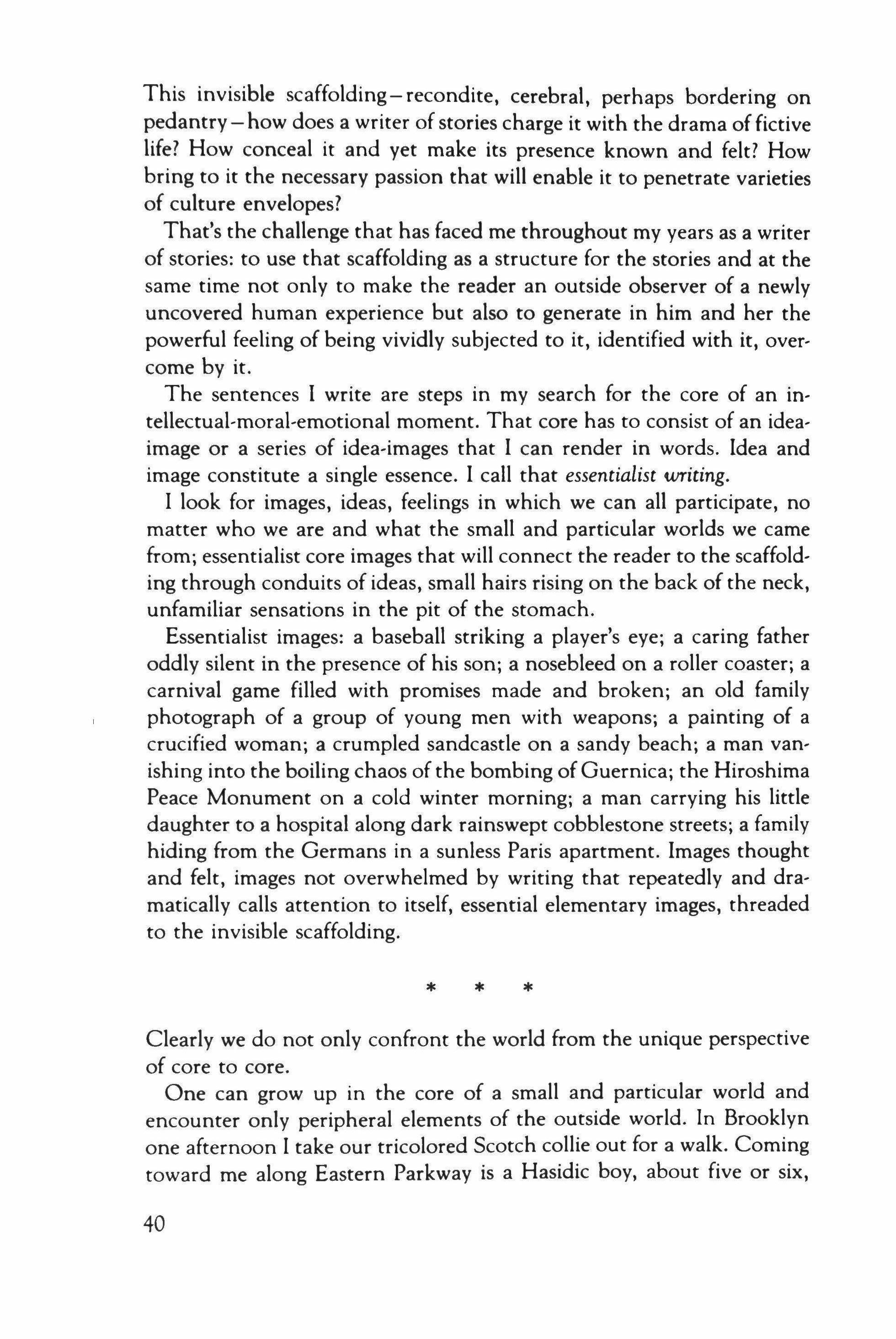
Clearly we do not only confront the world from the unique perspective of core to core.
One can grow up in the core of a small and particular world and encounter only peripheral elements of the outside world. In Brooklyn one afternoon I take our tricolored Scotch collie out for a walk. Coming toward me along Eastern Parkway is a Hasidic boy, about five or six,
* * *
40
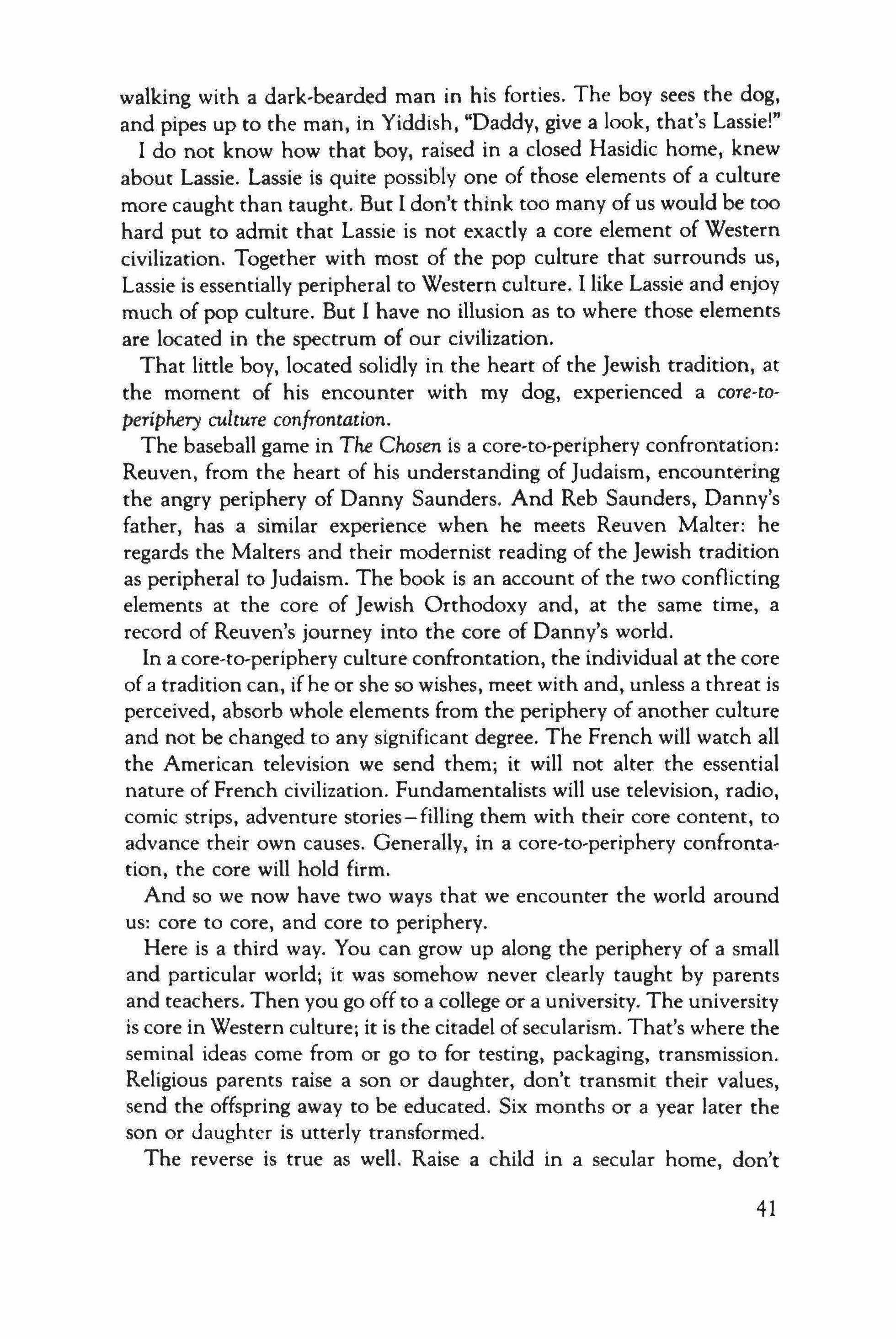
walking with a dark-bearded man in his forties. The boy sees the dog, and pipes up to the man, in Yiddish, "Daddy, give a look, that's Lassie!"
I do not know how that boy, raised in a closed Hasidic home, knew about Lassie. Lassie is quite possibly one of those elements of a culture more caught than taught. But I don't think too many of us would be too hard put to admit that Lassie is not exactly a core element of Western civilization. Together with most of the pop culture that surrounds us, Lassie is essentially peripheral to Western culture. I like Lassie and enjoy much of pop culture. But I have no illusion as to where those elements are located in the spectrum of our civilization.
That little boy, located solidly in the heart of the Jewish tradition, at the moment of his encounter with my dog, experienced a core-toperiphery culture confrontation.
The baseball game in The Chosen is a core-to-periphery confrontation: Reuven, from the heart of his understanding of Judaism, encountering the angry periphery of Danny Saunders. And Reb Saunders, Danny's father, has a similar experience when he meets Reuven Malter: he regards the Malters and their modernist reading of the Jewish tradition as peripheral to Judaism. The book is an account of the two conflicting elements at the core of Jewish Orthodoxy and, at the same time, a record of Reuven's journey into the core of Danny's world.
In a core-to-periphery culture confrontation, the individual at the core of a tradition can, if he or she so wishes, meet with and, unless a threat is perceived, absorb whole elements from the periphery of another culture and not be changed to any significant degree. The French will watch all the American television we send them; it will not alter the essential nature of French civilization. Fundamentalists will use television, radio, comic strips, adventure stories-filling them with their core content, to advance their own causes. Generally, in a core-to-periphery confrontation, the core will hold firm.
And so we now have two ways that we encounter the world around us: core to core, and core to periphery.
Here is a third way. You can grow up along the periphery of a small and particular world; it was somehow never clearly taught by parents and teachers. Then you go off to a college or a university. The university is core in Western culture; it is the citadel of secularism. That's where the seminal ideas come from or go to for testing, packaging, transmission. Religious parents raise a son or daughter, don't transmit their values, send the offspring away to be educated. Six months or a year later the son or daughter is utterly transformed.
The reverse is true as well. Raise a child in a secular home, don't
41
transmit a core of values, the child has no sense of self, of rootedness. Off goes the child, encounters the hot core of a religious cult, and is changed. It is difficult not to be swayed by an alluring core if you are only peripherally attached to your past, your beginnings, your self.
That is a periphery-to-core culture confrontation.
Saul Bellow's Herzog: a picture of periphery-to-core culture confrontation. Herzog along the periphery of his Jewish world and in the center of the university world.
Here is a fourth way we encounter the world around us. You can grow up along the periphery of your small world and along the periphery of the general culture. You know neither world well.
That is a periphery-to-periphery culture confrontation: a rub-up of ignoranees that generates effluvia, aberrations, ugliness.
Much of modern literature-because of the democratization of the novel, and because many novelists have themselves only experienced periphery-to-periphery confrontation - makes this brittle aspect of contemporary life the focus of exploration. Alienated, bewildered, contentious individuals, belonging nowhere, tenuously connected to culture and community, many committed only to the hermeneutics of doubt: the Man from Underground, the shadows populating the world of Kafka, Jake Barnes, Lieutenant Henry, Catherine Barkley, Sister Carrie, Rabbit Angstrom, people in the work of Philip Roth.
For the texture of core-to-core confrontation, read James Joyce's A Portrait of the Artist as a Young Man. Stephen Dedalus, from the core of Irish Catholicism, in confrontation with the core of modern secularism: literature. And read Buddenbrooks and The Magic Mountain by Thomas Mann. And most of Ibsen. And Brideshead Revisited by Evelyn Waugh.
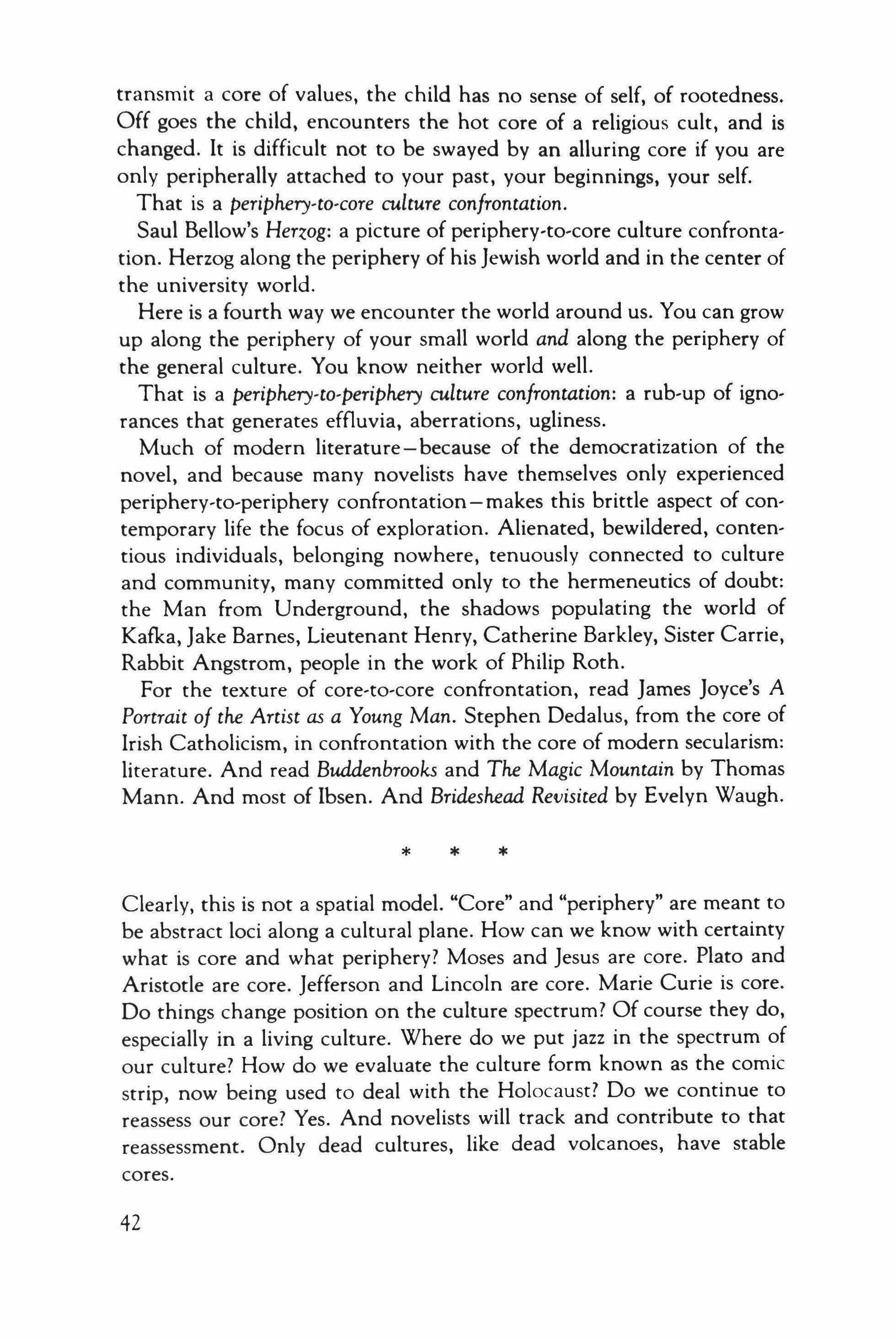
Clearly, this is not a spatial model. "Core" and "periphery" are meant to be abstract loci along a cultural plane. How can we know with certainty what is core and what periphery? Moses and Jesus are core. Plato and Aristotle are core. Jefferson and Lincoln are core. Marie Curie is core. Do things change position on the culture spectrum? Of course they do, especially in a living culture. Where do we put jazz in the spectrum of our culture? How do we evaluate the culture form known as the comic strip, now being used to deal with the Holocaust? Do we continue to reassess our core? Yes. And novelists will track and contribute to that reassessment. Only dead cultures, like dead volcanoes, have stable cores.
* * *
42
We live in a tumultuous world of culture, and are rarely fully engaged in only one form of confrontation all the time. The fact is that at one moment we might be core to core, at another core to periphery, at a third periphery to core, at a fourth periphery to periphery, and back again-depending upon how much we know and how we feel about our deepest selves at each different moment of confrontation. We live in a complex, distracting, often confounding tangle of ideas. Often we are different beings with each idea we encounter. We are the relationships between ourselves and the elements of the world around us. And those relationships by and large fall into one or another of the categories of the model I've presented here.

Some questions:
Is anti-Semitism core in Western civilization?
Is core necessarily elitist? Where do we locate the ongoing stream of folk culture transmitted from generation to generation that significantly shapes the way we see the world?
Is it not possible for periphery so to inundate a culture that it becomes core?
Is the demonic as much core as the saintly?
Does the contemporary blurring of reality and illusion affect the dis, tinction between core and periphery?
What are core and periphery in deconstructed creation?
Those are not the only questions.
Not so long ago, around the turn of the last century, we thought that if we discovered the truth about ourselves and our world we might live in bliss.
"I wanted to be part of this new age that was dawning," says Rebecca in Ibsen's play Rosmersholm, "and in on all the new ideas."
As this century begins its turn, spinning us into the new millennium, we know that the truths we discovered have left us diminished and sundered.
We're told that a woman who has been raped reports the atrocity in incoherent bits and pieces. To questions, she will often respond with contradictory answers. Images vivid one moment dissolve the next. Reality, shattered by trauma, becomes fluid, prismatic, kaleidoscopic, chaotic.
* * *
* * *
43
When the bits and pieces begin to become coherent; when she starts shaping them into a story, any kind of story-the process of healing has begun.
It might be imagined that in the eighteenth and nineteenth centuries, the God of the religion of Sinai and Jerusalem began further to withdraw His being from our world in order to make room for a new creation: the revelation of unpleasant truths. For a while that revelation was radiant, and we seemed able to handle it. Then in our century it broke apart in two world wars, the Holocaust, disillusionment. Infinite shards of creative light spilled into the darkness of decreation.
In our time, sundered by truths about ourselves and our world that yield more trauma than comfort, we often look upon story-making as the beginning of healing. If stories merely entertain, if they serve only to anesthetize us, to paper over gritty truths, we will continue to be Emma Bovary to our new understanding of the world. And tales of self-pitying despair; and clever, titillating, morally evasive language games-is that the entire tomorrow of literature? I hope not, unless we want the novel to perish of anemia. To take those new hard truths, gaze deeply into their essential nature, come to terms with what they really tell us about ourselves; to turn those truths into the cores of stories about human beings, into vivid new visions of our selves, into mythologies that shape through language and idea-images new maps of our place on this fragile planet, in this violent universe, among the stars and gases and black holes that stud the mind-numbing expanses all around us-that's the essential task of a writer.
How we make those maps, what goes on in the head and the heart as we try in our daily lives to make structures out of incoherence, and how we might map the mapmaking itself-that is what has lately begun to interest me.

I've been writing about people and events that were of particular concern to me and to others like me as I grew up and began to make my way into this world. My hope has been that if I wrote about those people and events honestly, with simplicity of language and invisibility of structure, and with as much controlled focus as I could bring to bear upon them, that my world would open up, and others would be caught up in it just as I was once caught up in the small and particular worlds of A Portrait of the Artist as a Young Man and Brideshead Revisited. I've been writing about the dreams, thoughts and passions of individuals caught up in
* * *
44
core-to-core culture confrontation; how they relate to parents, friends, teachers, peers, to themselves, when their world is suddenly challenged by an alternate powerful map of meaning.
Someone asked James Joyce why he only wrote about Dublin. The response, found in Richard Ellmann's biography, is worth citing. It gives us some notion of Joyce's view of the nature and task of literature:
For myself I always write about Dublin, because if I can get to the heart of Dublin, I can get to the heart of all the cities of the world. In the particular is contained the universal.
A novel is about particulars: the commonplace grittiness of life as reimagined by someone with a facility for setting down images with words on paper and making a map so rich in detail and resonance that it will become eyeglasses of sorts, worn by readers who will forever see the world of the writer through those lenses. No one who reads Tolstoy can ever see Russia the same way after finishing Tolstoy as he or she might have seen it before coming to Tolstoy. No one who reads Kafka and Joyce can ever see the inner world of humankind the same way after finishing Kafka and Joyce as he or she might have seen it before coming to Kafka and Joyce. The great writers create maps that affect our view of the world and help us to chart our outer and inner destinies on this planet.
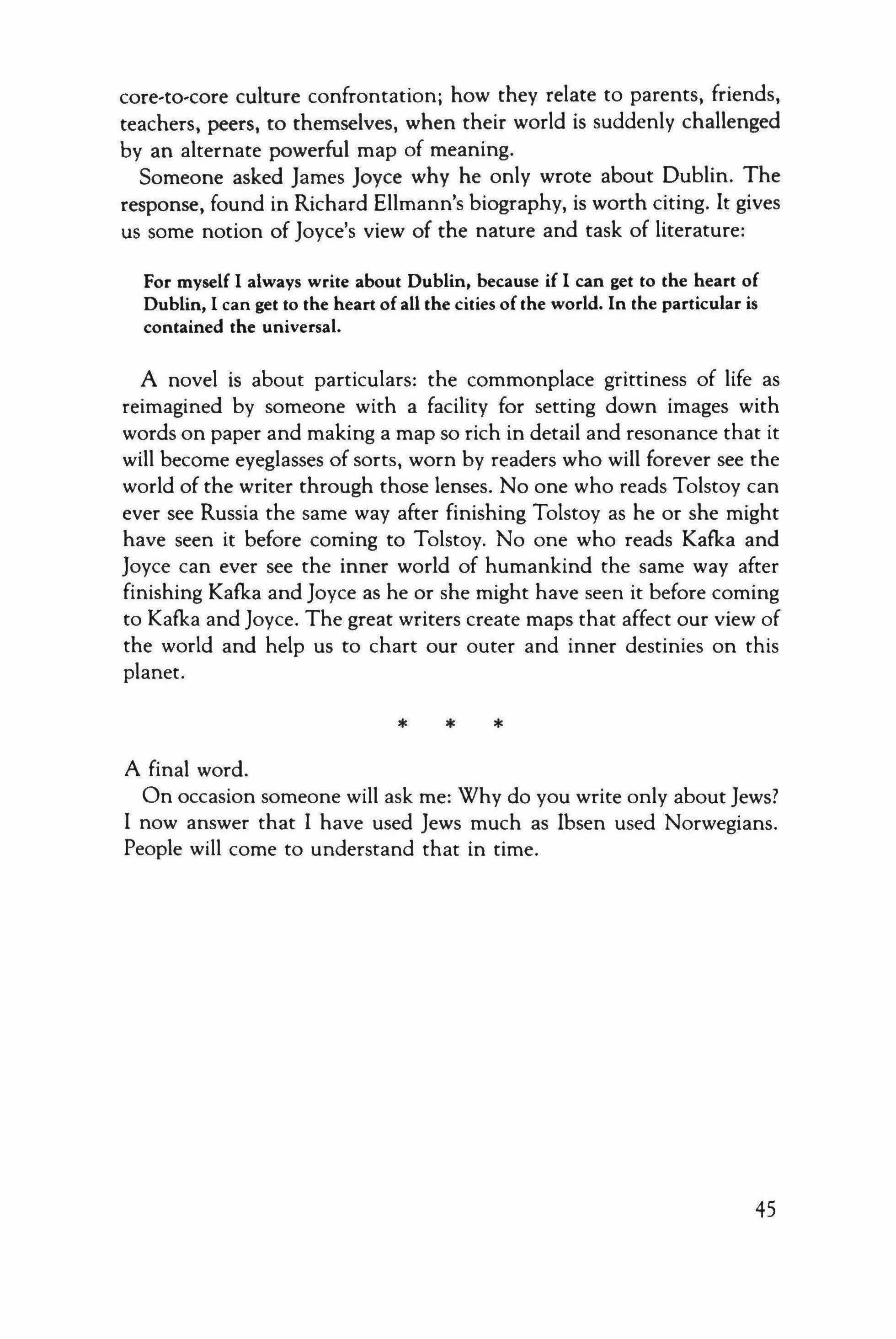
A final word.
On occasion someone will ask me: Why do you write only about Jews? I now answer that I have used Jews much as Ibsen used Norwegians. People will come to understand that in time.
* * *
45
Queen Wintergreen
Alice Fulton

Margaret Merns was on her knees in the front yard, picking dandelions for wine, when she spotted a snowy mystery on the ground. Jarvis Fitzgerald's sight was surer than her own. Yet she had to call his attention to the crumpled whiteness. Jarvis picked it up and settled spectacles on his face. Although the temperature was over eighty at seven A.M., he wore his best heavy coat with no tatters at the cuffs and a vest smooth as a new sail. There must be some high fussing on him to send him into his holiday clothes, she thought. I suppose he thinks we're keeping company. But it must be a brother and sister state of affairs at our age. He curled the wire spectacles like tiny ram's horns around his ears and read the white circular aloud: "Americans who believe in the demands of Ireland that they be allowed to govern themselves will hold a meeting the night of July 1, 1919, at St. Comin's Hall."
Peg Merns didn't listen. He is here again, as he is every morning, she thought. He is here, reading to me with the vast gaze in his granite blue eyes. Since the girls in her hamlet weren't sent to school, she'd never learned to read. Was it just three years since her husband Michael had read to her the accounts of the Irish and the Strangers? Although she was tired of the Troubles, she would have liked to read on her own about the girls of the city fighting shoulder to shoulder with the boys. Jarvis braced his feet apart like a horse in rough country as he concluded, " so cognizant of their rights, and so determined to remain what God made them - a distinct and independent nation." He folded the flier and put down the sack he'd been holding for her. "Except for the shoes on your feet, you could be a pilgrim circling the stone beds of St. Patrick's Purgatory," he said. "Get yourself up from the dirt, and we'll have a word."
46
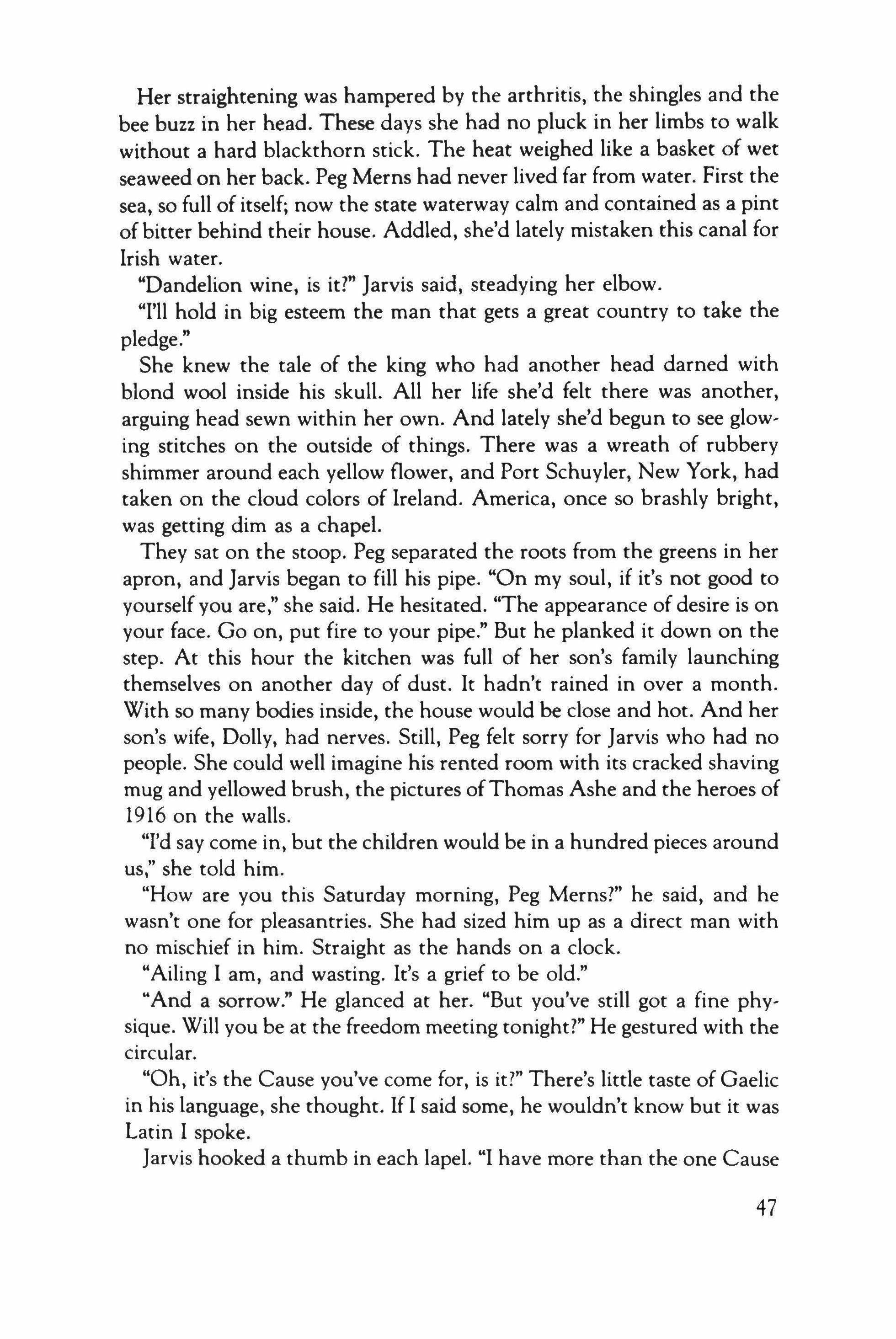
Her straightening was hampered by the arthritis, the shingles and the bee buzz in her head. These days she had no pluck in her limbs to walk without a hard blackthorn stick. The heat weighed like a basket of wet seaweed on her back. Peg Merns had never lived far from water. First the sea, so full of itself; now the state waterway calm and contained as a pint of bitter behind their house. Addled, she'd lately mistaken this canal for Irish water.
"Dandelion wine, is it?" Jarvis said, steadying her elbow.
"I'll hold in big esteem the man that gets a great country to take the pledge."
She knew the tale of the king who had another head darned with blond wool inside his skull. All her life she'd felt there was another, arguing head sewn within her own. And lately she'd begun to see glowing stitches on the outside of things. There was a wreath of rubbery shimmer around each yellow flower, and Port Schuyler, New York, had taken on the cloud colors of Ireland. America, once so brashly bright, was getting dim as a chapel.
They sat on the stoop. Peg separated the roots from the greens in her apron, and Jarvis began to fill his pipe. "On my soul, if it's not good to yourself you are," she said. He hesitated. "The appearance of desire is on your face. Go on, put fire to your pipe." But he planked it down on the step. At this hour the kitchen was full of her son's family launching themselves on another day of dust. It hadn't rained in over a month. With so many bodies inside, the house would be close and hot. And her son's wife, Dolly, had nerves. Still, Peg felt sorry for Jarvis who had no people. She could well imagine his rented room with its cracked shaving mug and yellowed brush, the pictures ofThomas Ashe and the heroes of 1916 on the walls.
"I'd say come in, but the children would be in a hundred pieces around us," she told him.
"How are you this Saturday morning, Peg Merns?" he said, and he wasn't one for pleasantries. She had sized him up as a direct man with no mischief in him. Straight as the hands on a clock.
"Ailing I am, and wasting. It's a grief to be old."
"And a sorrow." He glanced at her. "But you've still got a fine physique. Will you be at the freedom meeting tonight?" He gestured with the circular.
"Oh, it's the Cause you've come for, is it?" There's little taste of Gaelic in his language, she thought. If I said some, he wouldn't know but it was Latin I spoke.
Jarvis hooked a thumb in each lapel. "I have more than the one Cause
47
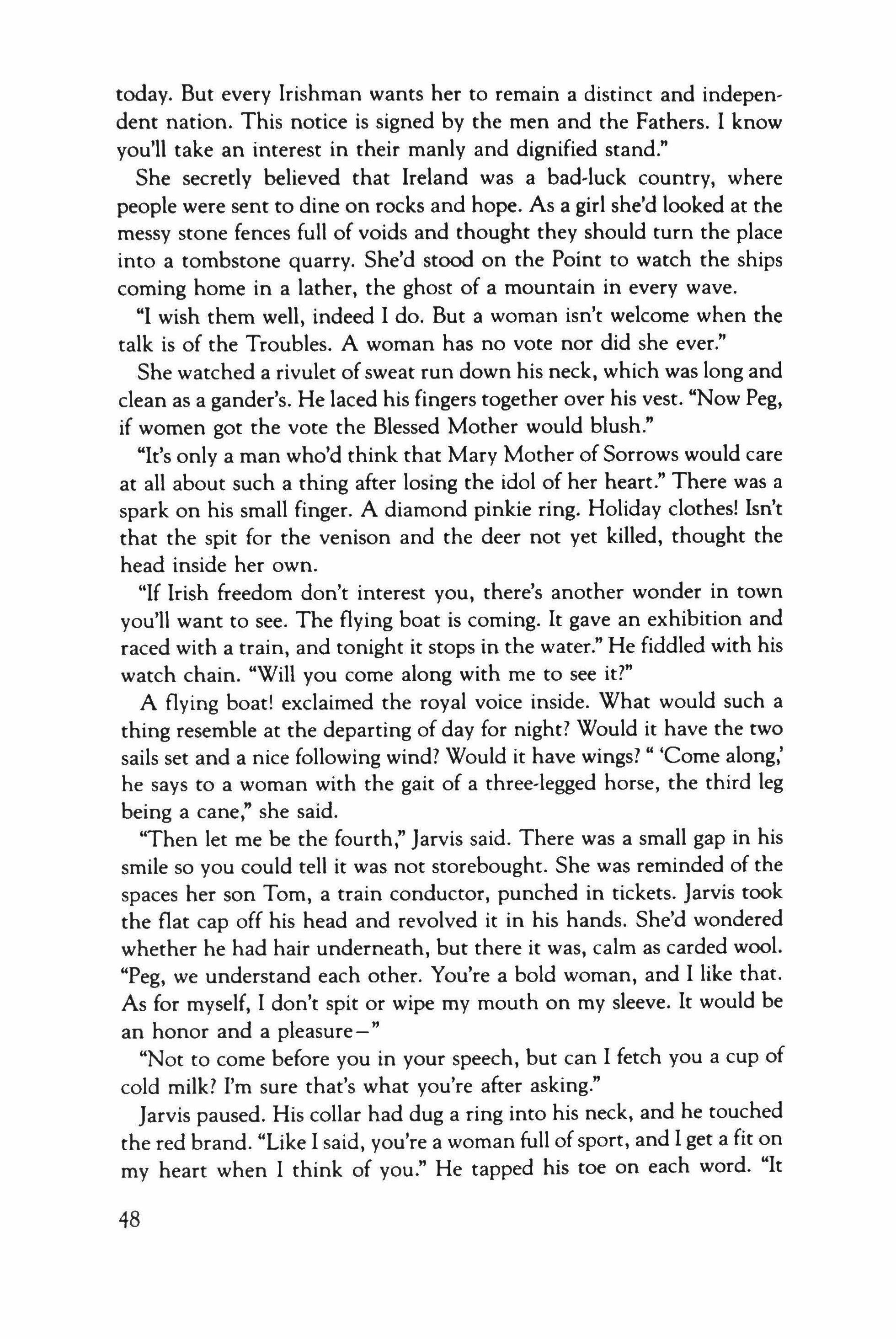
today. But every Irishman wants her to remain a distinct and independent nation. This notice is signed by the men and the Fathers. I know you'll take an interest in their manly and dignified stand."
She secretly believed that Ireland was a bad-luck country, where people were sent to dine on rocks and hope. As a girl she'd looked at the messy stone fences full of voids and thought they should turn the place into a tombstone quarry. She'd stood on the Point to watch the ships coming home in a lather, the ghost of a mountain in every wave.
"I wish them well, indeed I do. But a woman isn't welcome when the talk is of the Troubles. A woman has no vote nor did she ever."
She watched a rivulet of sweat run down his neck, which was long and clean as a gander's. He laced his fingers together over his vest. "Now Peg, if women got the vote the Blessed Mother would blush."
"It's only a man who'd think that Mary Mother of Sorrows would care at all about such a thing after losing the idol of her heart." There was a spark on his small finger. A diamond pinkie ring. Holiday clothes! Isn't that the spit for the venison and the deer not yet killed, thought the head inside her own.
"If Irish freedom don't interest you, there's another wonder in town you'll want to see. The flying boat is coming. It gave an exhibition and raced with a train, and tonight it stops in the water." He fiddled with his watch chain. "Will you come along with me to see it?"
A flying boat! exclaimed the royal voice inside. What would such a thing resemble at the departing of day for night? Would it have the two sails set and a nice following wind? Would it have wings? 'Come along,' he says to a woman with the gait of a three-legged horse, the third leg being a cane," she said.
"Then let me be the fourth," Jarvis said. There was a small gap in his smile so you could tell it was not storebought. She was reminded of the spaces her son Tom, a train conductor, punched in tickets. Jarvis took the flat cap off his head and revolved it in his hands. She'd wondered whether he had hair underneath, but there it was, calm as carded wool. "Peg, we understand each other. You're a bold woman, and I like that. As for myself, I don't spit or wipe my mouth on my sleeve. It would be an honor and a pleasure-"
"Not to come before you in your speech, but can I fetch you a cup of cold milk? I'm sure that's what you're after asking."
Jarvis paused. His collar had dug a ring into his neck, and he touched the red brand. "Like I said, you're a woman full of sport, and I get a fit on my heart when I think of you." He tapped his toe on each word. "It
48
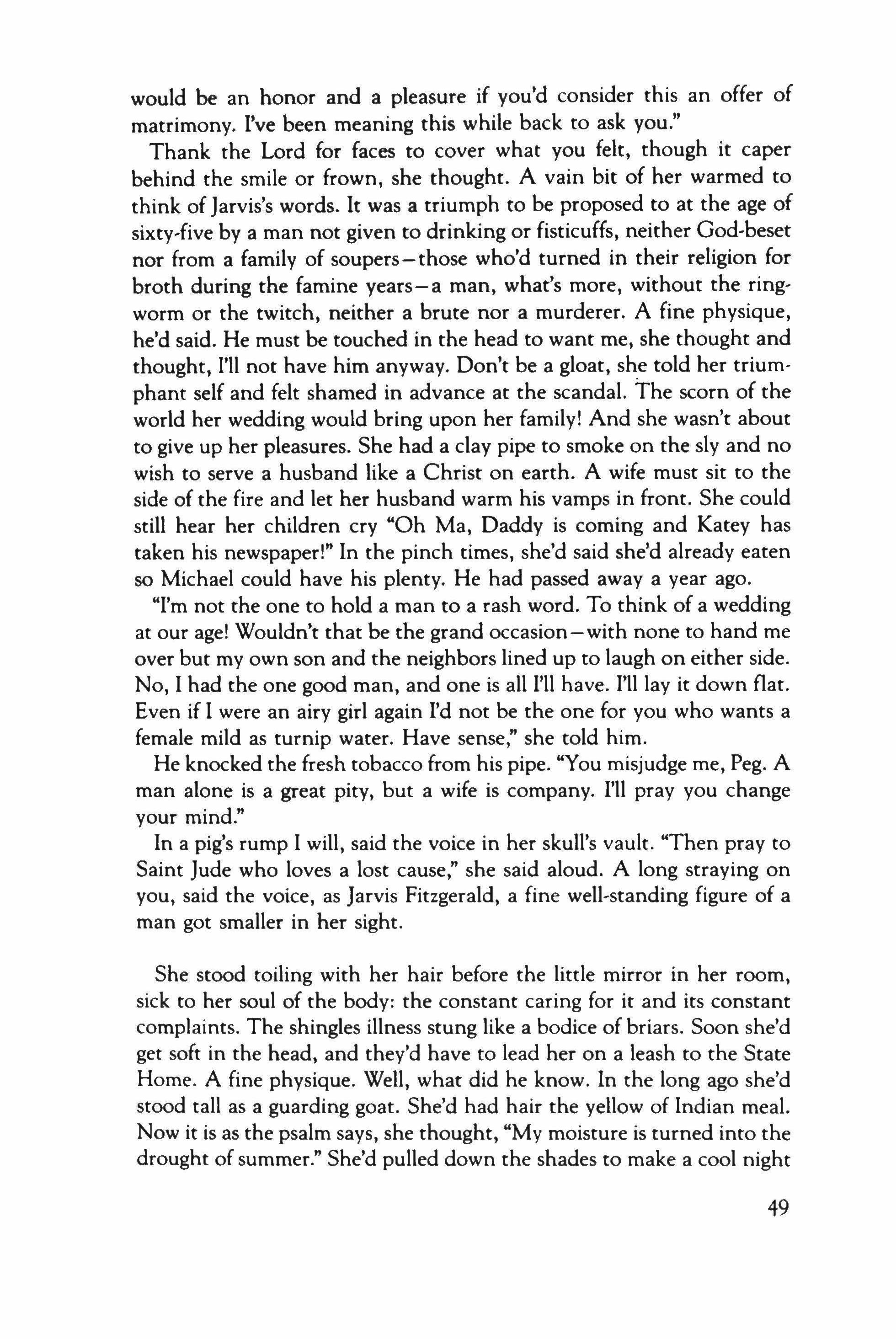
would be an honor and a pleasure if you'd consider this an offer of matrimony. I've been meaning this while back to ask you."
Thank the Lord for faces to cover what you felt, though it caper behind the smile or frown, she thought. A vain bit of her warmed to think ofJarvis's words. It was a triumph to be proposed to at the age of sixty-five by a man not given to drinking or fisticuffs, neither God-beset nor from a family of soupers-those who'd turned in their religion for broth during the famine years-a man, what's more, without the ringworm or the twitch, neither a brute nor a murderer. A fine physique, he'd said. He must be touched in the head to want me, she thought and thought, I'll not have him anyway. Don't be a gloat, she told her triumphant self and felt shamed in advance at the scandal. The scorn of the world her wedding would bring upon her family! And she wasn't about to give up her pleasures. She had a clay pipe to smoke on the sly and no wish to serve a husband like a Christ on earth. A wife must sit to the side of the fire and let her husband warm his vamps in front. She could still hear her children cry "Oh Ma, Daddy is coming and Katey has taken his newspaper!" In the pinch times, she'd said she'd already eaten so Michael could have his plenty. He had passed away a year ago.
"I'm not the one to hold a man to a rash word. To think of a wedding at our age! Wouldn't that be the grand occasion-with none to hand me over but my own son and the neighbors lined up to laugh on either side. No, I had the one good man, and one is all I'll have. I'll lay it down flat. Even if I were an airy girl again I'd not be the one for you who wants a female mild as turnip water. Have sense," she told him.
He knocked the fresh tobacco from his pipe. "You misjudge me, Peg. A man alone is a great pity, but a wife is company. I'll pray you change your mind."
In a pig's rump I will, said the voice in her skull's vault. "Then pray to Saint Jude who loves a lost cause," she said aloud. A long straying on you, said the voice, as Jarvis Fitzgerald, a fine well-standing figure of a man got smaller in her sight.
She stood toiling with her hair before the little mirror in her room, sick to her soul of the body: the constant caring for it and its constant complaints. The shingles illness stung like a bodice of briars. Soon she'd get soft in the head, and they'd have to lead her on a leash to the State Home. A fine physique. Well, what did he know. In the long ago she'd stood tall as a guarding goat. She'd had hair the yellow of Indian meal. Now it is as the psalm says, she thought, "My moisture is turned into the drought of summer." She'd pulled down the shades to make a cool night
49
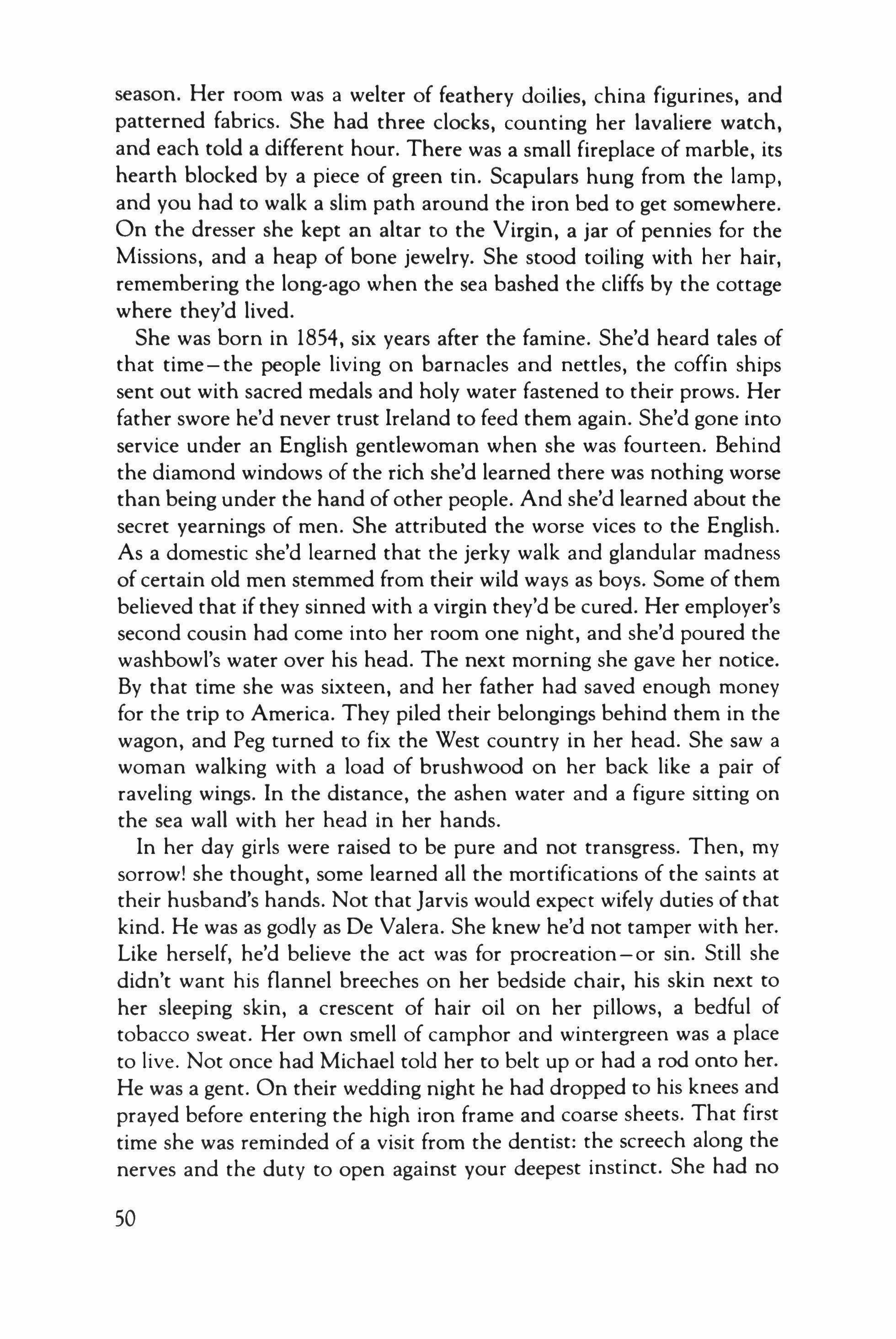
season. Her room was a welter of feathery doilies, china figurines, and patterned fabrics. She had three clocks, counting her lavaliere watch, and each told a different hour. There was a small fireplace of marble, its hearth blocked by a piece of green tin. Scapulars hung from the lamp, and you had to walk a slim path around the iron bed to get somewhere. On the dresser she kept an altar to the Virgin, a jar of pennies for the Missions, and a heap of bone jewelry. She stood toiling with her hair, remembering the long-ago when the sea bashed the cliffs by the cottage where they'd lived.
She was born in 1854, six years after the famine. She'd heard tales of that time-the people living on barnacles and nettles, the coffin ships sent out with sacred medals and holy water fastened to their prows. Her father swore he'd never trust Ireland to feed them again. She'd gone into service under an English gentlewoman when she was fourteen. Behind the diamond windows of the rich she'd learned there was nothing worse than being under the hand of other people. And she'd learned about the secret yearnings of men. She attributed the worse vices to the English. As a domestic she'd learned that the jerky walk and glandular madness of certain old men stemmed from their wild ways as boys. Some of them believed that if they sinned with a virgin they'd be cured. Her employer's second cousin had come into her room one night, and she'd poured the washbowl's water over his head. The next morning she gave her notice. By that time she was sixteen, and her father had saved enough money for the trip to America. They piled their belongings behind them in the wagon, and Peg turned to fix the West country in her head. She saw a woman walking with a load of brushwood on her back like a pair of raveling wings. In the distance, the ashen water and a figure sitting on the sea wall with her head in her hands.
In her day girls were raised to be pure and not transgress. Then, my sorrow! she thought, some learned all the mortifications of the saints at their husband's hands. Not that Jarvis would expect wifely duties of that kind. He was as godly as De Valera. She knew he'd not tamper with her. Like herself, he'd believe the act was for procreation-or sin. Still she didn't want his flannel breeches on her bedside chair, his skin next to her sleeping skin, a crescent of hair oil on her pillows, a bedful of tobacco sweat. Her own smell of camphor and wintergreen was a place to live. Not once had Michael told her to belt up or had a rod onto her. He was a gent. On their wedding night he had dropped to his knees and prayed before entering the high iron frame and coarse sheets. That first time she was reminded of a visit from the dentist: the screech along the nerves and the duty to open against your deepest instinct. She had no
50
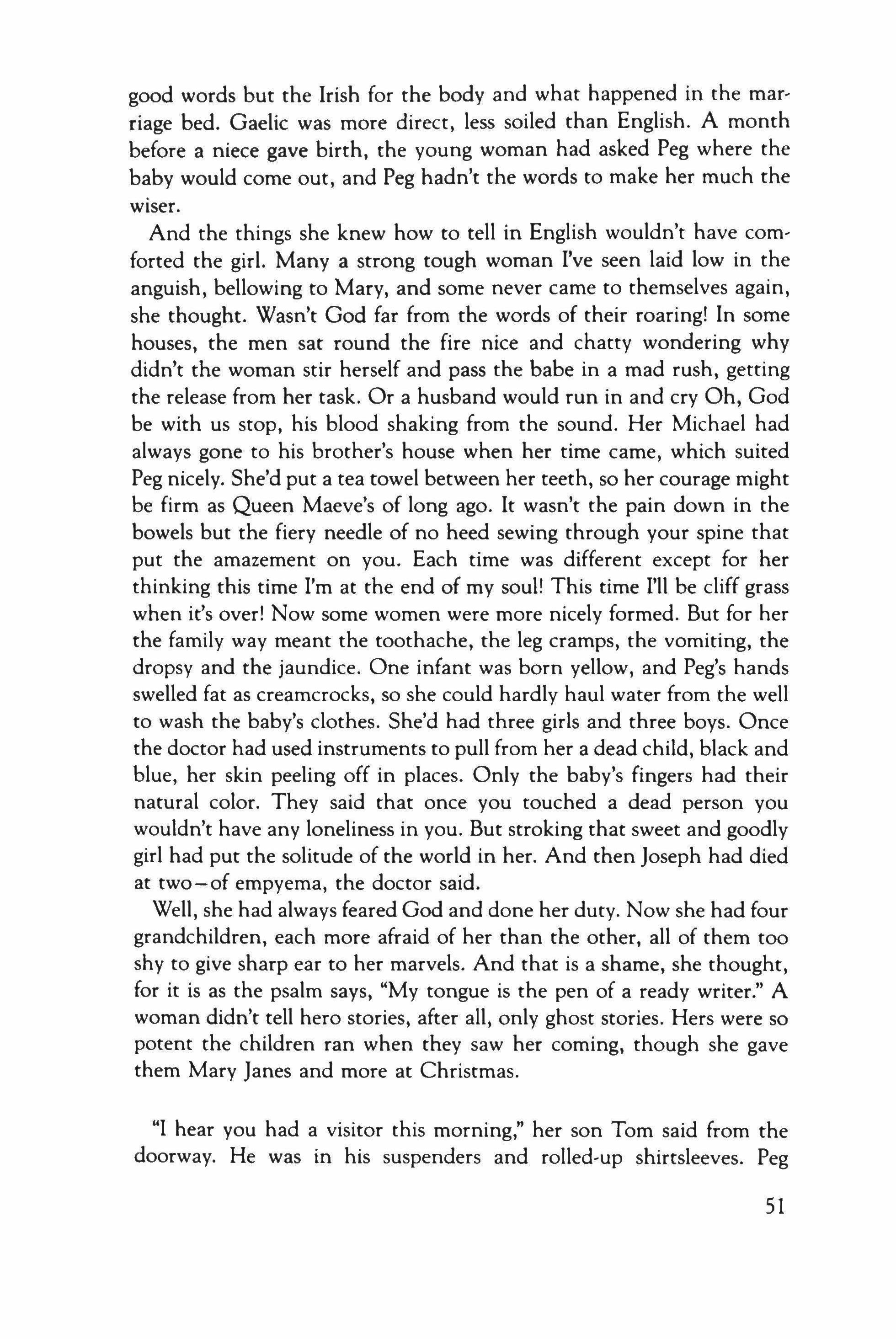
good words but the Irish for the body and what happened in the marriage bed. Gaelic was more direct, less soiled than English. A month before a niece gave birth, the young woman had asked Peg where the baby would come out, and Peg hadn't the words to make her much the wiser.
And the things she knew how to tell in English wouldn't have comforted the girl. Many a strong tough woman I've seen laid low in the anguish, bellowing to Mary, and some never came to themselves again, she thought. Wasn't God far from the words of their roaring! In some houses, the men sat round the fire nice and chatty wondering why didn't the woman stir herself and pass the babe in a mad rush, getting the release from her task. Or a husband would run in and cry Oh, God be with us stop, his blood shaking from the sound. Her Michael had always gone to his brother's house when her time came, which suited Peg nicely. She'd put a tea towel between her teeth, so her courage might be firm as Queen Maeve's of long ago. It wasn't the pain down in the bowels but the fiery needle of no heed sewing through your spine that put the amazement on you. Each time was different except for her thinking this time I'm at the end of my soul! This time I'll be cliff grass when it's over! Now some women were more nicely formed. But for her the family way meant the toothache, the leg cramps, the vomiting, the dropsy and the jaundice. One infant was born yellow, and Peg's hands swelled fat as creamcrocks, so she could hardly haul water from the well to wash the baby's clothes. She'd had three girls and three boys. Once the doctor had used instruments to pull from her a dead child, black and blue, her skin peeling off in places. Only the baby's fingers had their natural color. They said that once you touched a dead person you wouldn't have any loneliness in you. But stroking that sweet and goodly girl had put the solitude of the world in her. And then Joseph had died at two-of empyema, the doctor said.
Well, she had always feared God and done her duty. Now she had four grandchildren, each more afraid of her than the other, all of them too shy to give sharp ear to her marvels. And that is a shame, she thought, for it is as the psalm says, "My tongue is the pen of a ready writer." A woman didn't tell hero stories, after all, only ghost stories. Hers were so potent the children ran when they saw her coming, though she gave them Mary Janes and more at Christmas.
"I hear you had a visitor this morning," her son Tom said from the doorway. He was in his suspenders and rolled-up shirtsleeves. Peg
51
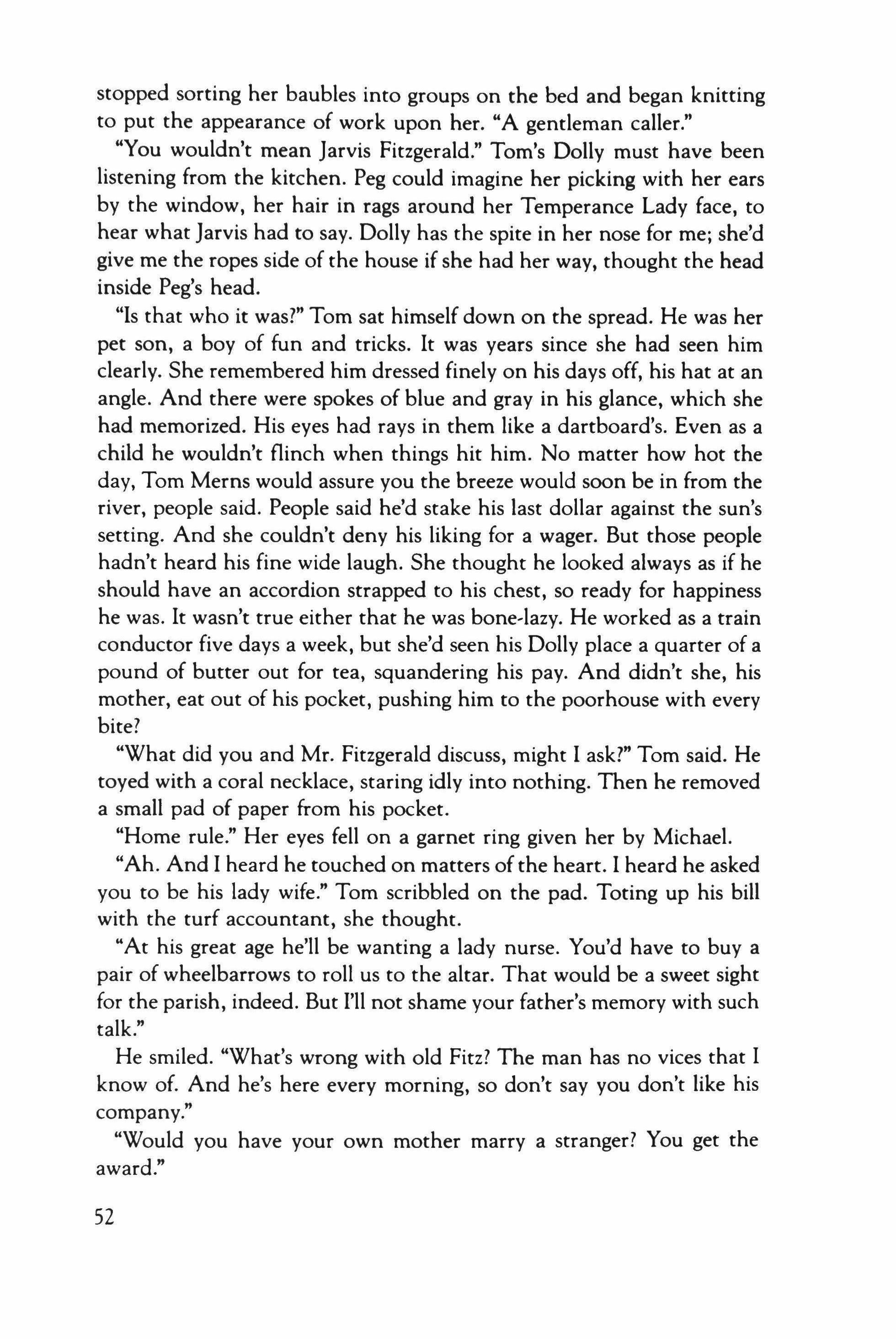
stopped sorting her baubles into groups on the bed and began knitting to put the appearance of work upon her. "A gentleman caller."
"You wouldn't mean Jarvis Fitzgerald." Tom's Dolly must have been listening from the kitchen. Peg could imagine her picking with her ears by the window, her hair in rags around her Temperance Lady face, to hear what Jarvis had to say. Dolly has the spite in her nose for me; she'd give me the ropes side of the house if she had her way, thought the head inside Peg's head.
"Is that who it was?" Tom sat himself down on the spread. He was her pet son, a boy of fun and tricks. It was years since she had seen him clearly. She remembered him dressed finely on his days off, his hat at an angle. And there were spokes of blue and gray in his glance, which she had memorized. His eyes had rays in them like a dartboard's. Even as a child he wouldn't flinch when things hit him. No matter how hot the day, Tom Merns would assure you the breeze would soon be in from the river, people said. People said he'd stake his last dollar against the sun's setting. And she couldn't deny his liking for a wager. But those people hadn't heard his fine wide laugh. She thought he looked always as if he should have an accordion strapped to his chest, so ready for happiness he was. It wasn't true either that he was bone-lazy. He worked as a train conductor five days a week, but she'd seen his Dolly place a quarter of a pound of butter out for tea, squandering his pay. And didn't she, his mother, eat out of his pocket, pushing him to the poorhouse with every bite?
"What did you and Mr. Fitzgerald discuss, might I ask?" Tom said. He toyed with a coral necklace, staring idly into nothing. Then he removed a small pad of paper from his pocket.
"Home rule." Her eyes fell on a garnet ring given her by Michael.
"Ah. And I heard he touched on matters of the heart. I heard he asked you to be his lady wife." Tom scribbled on the pad. Toting up his bill with the turf accountant, she thought.
"At his great age he'll be wanting a lady nurse. You'd have to buy a pair of wheelbarrows to roll us to the altar. That would be a sweet sight for the parish, indeed. But I'll not shame your father's memory with such talk."
He smiled. "What's wrong with old Fitz? The man has no vices that I know of. And he's here every morning, so don't say you don't like his company."
"Would you have your own mother marry a stranger? You get the award."
52
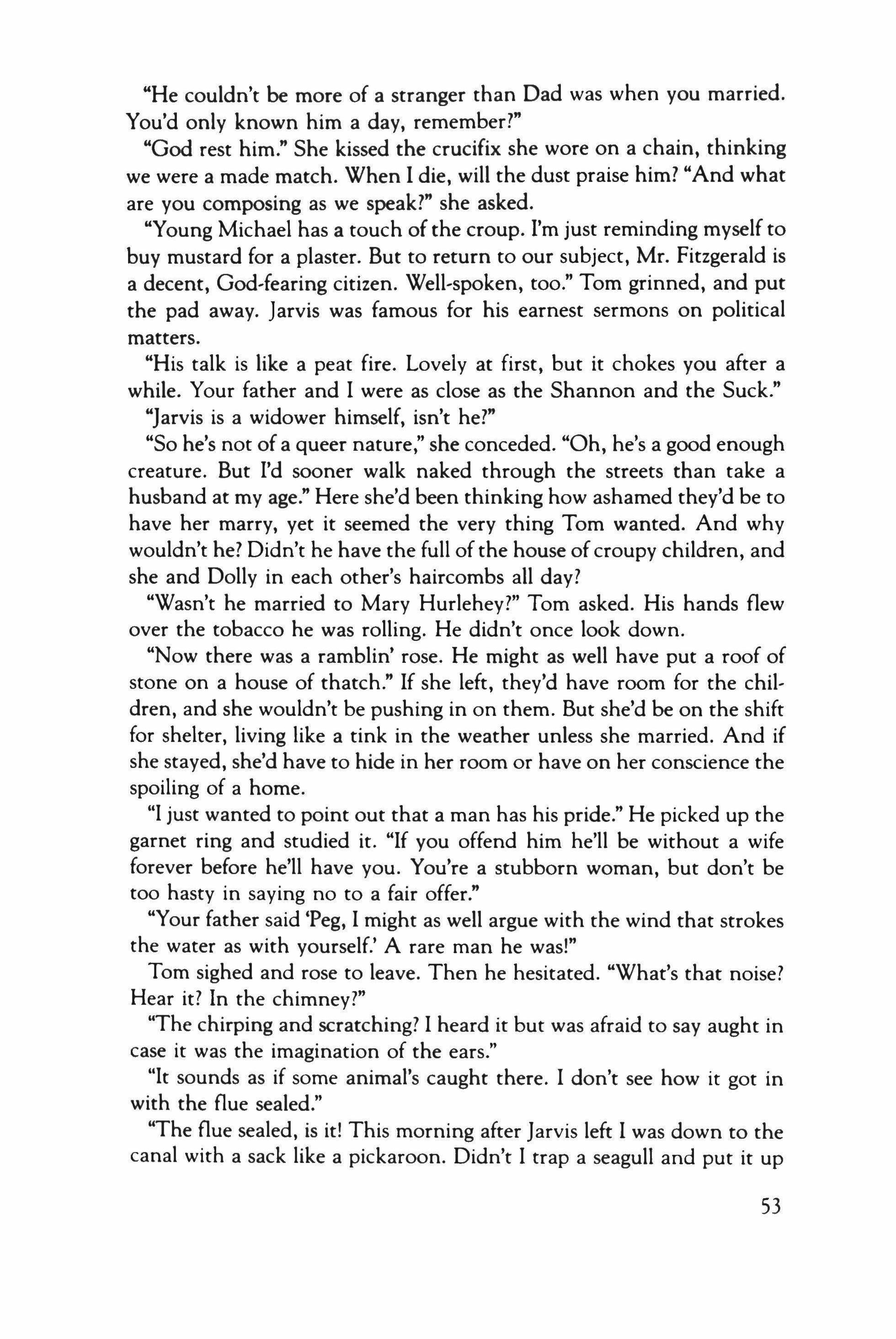
"He couldn't be more of a stranger than Dad was when you married. You'd only known him a day, remember?"
"God rest him." She kissed the crucifix she wore on a chain, thinking we were a made match. When 1 die, will the dust praise him? "And what are you composing as we speak?" she asked.
"Young Michael has a touch of the croup. I'm just reminding myself to buy mustard for a plaster. But to return to our subject, Mr. Fitzgerald is a decent, God-fearing citizen. Well,spoken, too." Tom grinned, and put the pad away. Jarvis was famous for his earnest sermons on political matters.
"His talk is like a peat fire. Lovely at first, but it chokes you after a while. Your father and 1 were as close as the Shannon and the Suck."
"Jarvis is a widower himself, isn't he?"
"So he's not of a queer nature," she conceded. "Oh, he's a good enough creature. But I'd sooner walk naked through the streets than take a husband at my age." Here she'd been thinking how ashamed they'd be to have her marry, yet it seemed the very thing Tom wanted. And why wouldn't he? Didn't he have the full ofthe house of croupy children, and she and Dolly in each other's haircombs all day?
"Wasn't he married to Mary Hurlehey?" Tom asked. His hands flew over the tobacco he was rolling. He didn't once look down.
"Now there was a ramblin' rose. He might as well have put a roof of stone on a house of thatch." If she left, they'd have room for the children, and she wouldn't be pushing in on them. But she'd be on the shift for shelter, living like a tink in the weather unless she married. And if she stayed, she'd have to hide in her room or have on her conscience the spoiling of a home.
"I just wanted to point out that a man has his pride." He picked up the garnet ring and studied it. "If you offend him he'll be without a wife forever before he'll have you. You're a stubborn woman, but don't be too hasty in saying no to a fair offer."
"Your father said 'Peg, I might as well argue with the wind that strokes the water as with yourself.' A rare man he was!"
Tom sighed and rose to leave. Then he hesitated. "What's that noise? Hear it? In the chimney?"
"The chirping and scratching? I heard it but was afraid to say aught in case it was the imagination of the ears."
"It sounds as if some animal's caught there. I don't see how it got in with the flue sealed."
"The flue sealed, is it! This morning after Jarvis left 1 was down to the canal with a sack like a pickaroon. Didn't I trap a seagull and put it up
53

the chimney because yourself said it needed cleaning and so we couldn't use it. Last winter I wished for a good blaze." There hadn't been a fire in the hearth since she and Michael were young.
Tom's broad face furrowed in a scowl. "Oh Ma, you didn't! Jesus, Mary and Joseph! Have you taken leave of your senses? How did you ever sneak the bird past Dolly?" He continued, greatly stirred, saying he would buy her a stove if she felt chilly. And how could she remember winter on a ninety-degree day? At last he left to get the long-handled broom. She would put her hair in a snood, take her shawl and go to Edward McWilliams's wake. Then Tom's family could have the house to themselves for a while. How wearisome it must be to live with an old woman who brought livestock in the building. She was shaking with humiliation. Hadn't she raised Tom from a tiny mite only to find the back of his hand given her now? He had said Jarvis was proud. She knew the Fitzgeralds had been the most spoken-of family in Western Ireland. Even during the famine they'd had a budgetful of yellow gold and sauce with their potatoes. "Well, he's cold poor now," she said aloud. Though he thought he'd be a mouthful in this country, he'd never advanced beyond foreman at the mill. As for those who whispered of a fortune hidden in his house, let them try to live on whispers. His lady wife! As if she'd be rich and wear white stockings. She'd planned on having safe moorings here for the rest of her life. But when a person thinks it's nice 'tis how it's a mocking trick, she thought, overcome with self-pity.
Tom hurried in with his stern face on. "A seagull! You'd sell your shawl rather than do anything the normal way." He opened the flue and pushed the straw end of the broom up the chimney. The beating stopped, and his face cleared. "I think it's gone. Are you going to see the hydroairplane? I hear it's docked in the canal."
"I am not." She selected an earring from the trinkets on the spread and held it out to him. "Would you be giving this to your Dolly from myself? It's lost its mate, but it'll make a lovely brooch."
Edward McWilliams was stretched in the front parlor with eleven lit candles at his head and feet. The twelfth candle went unlit to stand for Judas. A lamp glowed red in the corner of the room, and the air hung thick as a blanket of flowers. People stood around chatting or sat in rows before the casket, waiting for the lovely young priest to say a prayer. None of the women could do enough for the young Father. They at least would stay until he spoke. Jarvis was there, looking ill at ease since the afternoon mourners were mostly female. Peg waited until he stood alone, then went over.
54

"Did you know Edward McWilliams well?" he asked.
"Not at all," she admitted.
"Then why are you here to pay respects?"
"They say death makes your praying more sincere," she said with a flick of her shawl. Putting her hand to her mouth she added, "I heard it was the cancer killed him. But whisper! I have a recipe for that." She had to get someone to write down her cancer cure before she cleared off.
"I heard his last words were 'Show me the mercy you'd show a beast and shoot me,''' Jarvis whispered back.
"He was a great dramatist then, was he?"
"The despair runs in that family," he told her. "They're from the West Country, you know. His father died after leaping in a holy well, may they be safe where it's told."
"They say a holy death is a happy death," she noted piously.
"But to die without penance, or anointing rites, without the Host!" Jarvis sighed. "And didn't he change his mind after the leap and come up with the moss in his hair. And Jim Boyle, staggering home on a toot, shot him for the anti-Christ,"
"It is short until we join him on high," she said sweetly.
"There's nothing but a while in this life for anyone," Jarvis agreed. After a bit he added, "I've heard that heaven's a yard and a half above the height of a man."
"Wouldn't that be the way of it," she said. "To be just out of reach." The subqueen in her mind wondered why people feared death if death meant entering forever to bright welcomes from your darling dear ones. But she held her tongue.
"I was after coming to inquire for you tonight. I don't suppose you've considered the story I opened this morning?"
So he'd still want her, though she poured a hundred discouragements on his head! "I have," she said.
"Well, let it to me, woman. Has your answer changed?"
"It has." She wouldn't dig her heels in any longer.
Jarvis brightened. "Then the matter is right. God never failed the patient heart."
"Patient, is it? It's been all of the eight hours since you honored me with your attentions, my good gentleman."
"You're right, Peg," he said. "It's well late for us to be patient." She would have to do for him for the rest of his life. The thought made her want to flee the fuzzy, red-lit room. Talking with Jarvis was like trying to sit still on a prickly horsehair couch, she thought.
55

She went home and told them right before supper. Then, entering the little room off the kitchen where they ate, she saw that Tom's Dolly had set out enough cutlery for courses. And a fruitcake left from Christmas, jeweled with candied fruit like a dark crown, sat on the sideboard. They had to eat in shifts or suffer bruised elbows at the table. Usually she took a tray of tea to her room, but tonight Tom insisted she join them. The babies would eat in the parlor. But when Tom's Dolly placed a chop before her she found she had no edge on her teeth. "I thought you were partial to lamb," Dolly chided.
"I'll have a tomato with a whiff of sugar on it. I have the liking of the world for that," she said.
"Why didn't you invite Jarvis over to see his new home?" Tom asked.
"When a woman marries she goes to her husband," Peg said. She thought of Jarvis's rented room, the hunks of sun falling through its windows and herself perishing with the heat. What wouldn't she give for a hole of her own! A steady hut on a stump of land out of the water, an old boat turned upside down as hens would live in.
"Nonsense!" said Tom. "You have to stay here with your family, with all of your things."
"You really must live with us, Mother," Dolly added. "This was your house before we moved in."
Why is it my nose would bleed if I met her without warning in the dark, Peg thought. You can't hate a woman because she has no complexion on her. Isn't it that when I sit with her for thirty minutes I feel I've been dead and buried that full half-hour? How it must distress Tom, the two women raking each other! But what if she'd been wrong, and her son had no grudge against her living here? There was still no going against the promise she'd made Jarvis. And she'd never bring a husband into their crowded lot, another someone to bump into on the backstairs.
Later, as her room grew dark, Tom came up with a bottle he'd stashed before Prohibition became law. "What if herself finds out you've been drinking?" Peg asked. "She'll Carry Nation you for a week."
"A man has a right to celebrate his mother's wedding."
They had a glass and laid into talk with each other. Peg said a psalm that went, "The king's daughter is all glorious within: her clothing is of wrought gold," having learned it by heart from her mother. And Tom told her of the great events he'd read in the evening's paper. Does it not seem Tom would like me to stay, she thought.
"It's much I admire those people whose lives would make books you'd need two hands to lift," she told him. It would be grand to do one bold,
56
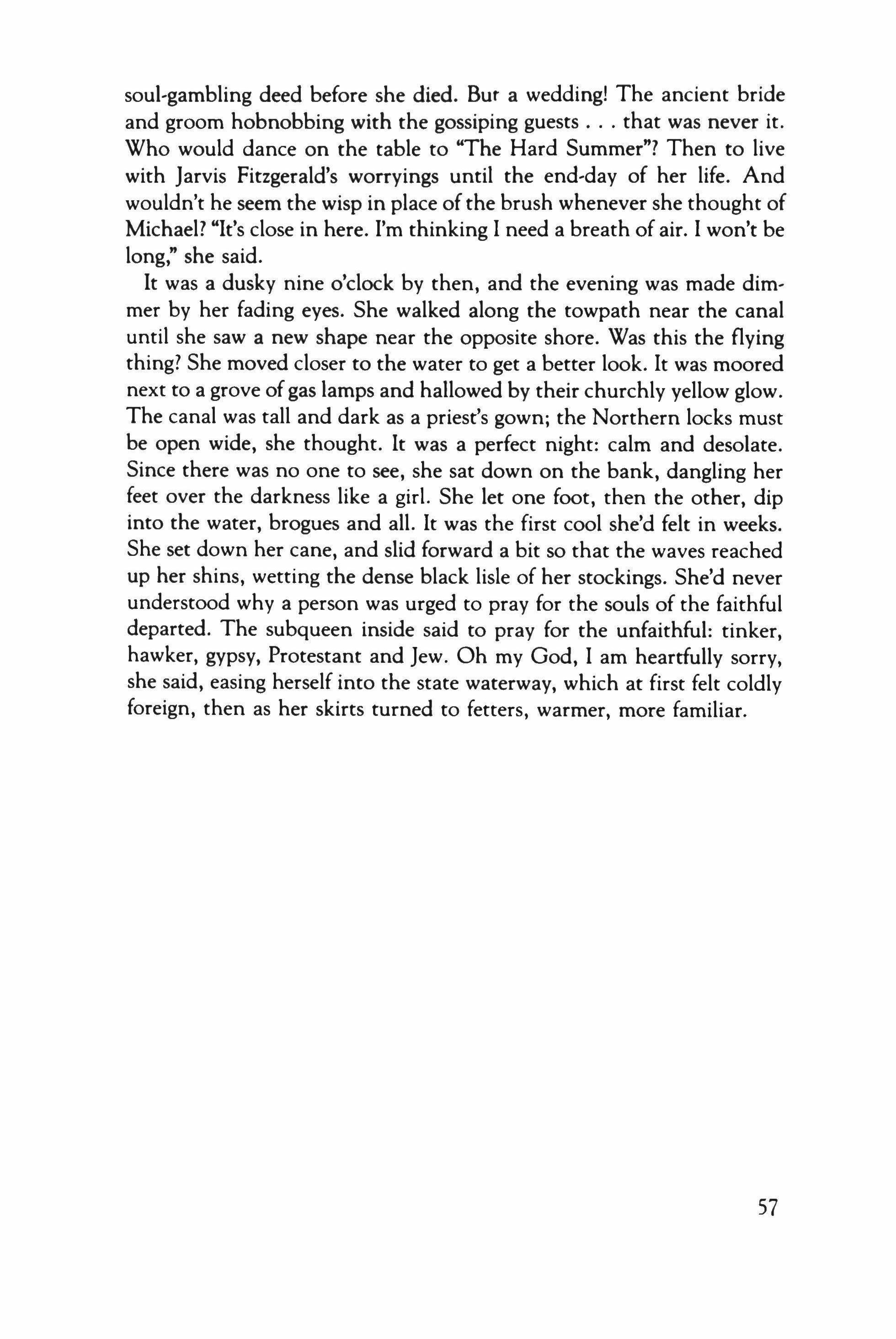
soul-gambling deed before she died. But a wedding! The ancient bride and groom hobnobbing with the gossiping guests that was never it. Who would dance on the table to "The Hard Summer"? Then to live with Jarvis Fitzgerald's worryings until the end-day of her life. And wouldn't he seem the wisp in place of the brush whenever she thought of Michael? "It's close in here. I'm thinking I need a breath of air. I won't be long," she said.
It was a dusky nine o'clock by then, and the evening was made dimmer by her fading eyes. She walked along the towpath near the canal until she saw a new shape near the opposite shore. Was this the flying thing? She moved closer to the water to get a better look. It was moored next to a grove of gas lamps and hallowed by their churchly yellow glow. The canal was tall and dark as a priest's gown; the Northern locks must be open wide, she thought. It was a perfect night: calm and desolate. Since there was no one to see, she sat down on the bank, dangling her feet over the darkness like a girl. She let one foot, then the other, dip into the water, brogues and all. It was the first cool she'd felt in weeks. She set down her cane, and slid forward a bit so that the waves reached up her shins, wetting the dense black lisle of her stockings. She'd never understood why a person was urged to pray for the souls of the faithful departed. The subqueen inside said to pray for the unfaithful: tinker, hawker, gypsy, Protestant and Jew. Oh my God, I am heartfully sorry, she said, easing herself into the state waterway, which at first felt coldly foreign, then as her skirts turned to fetters, warmer, more familiar.
57
My Father's Heart
Tony Earley
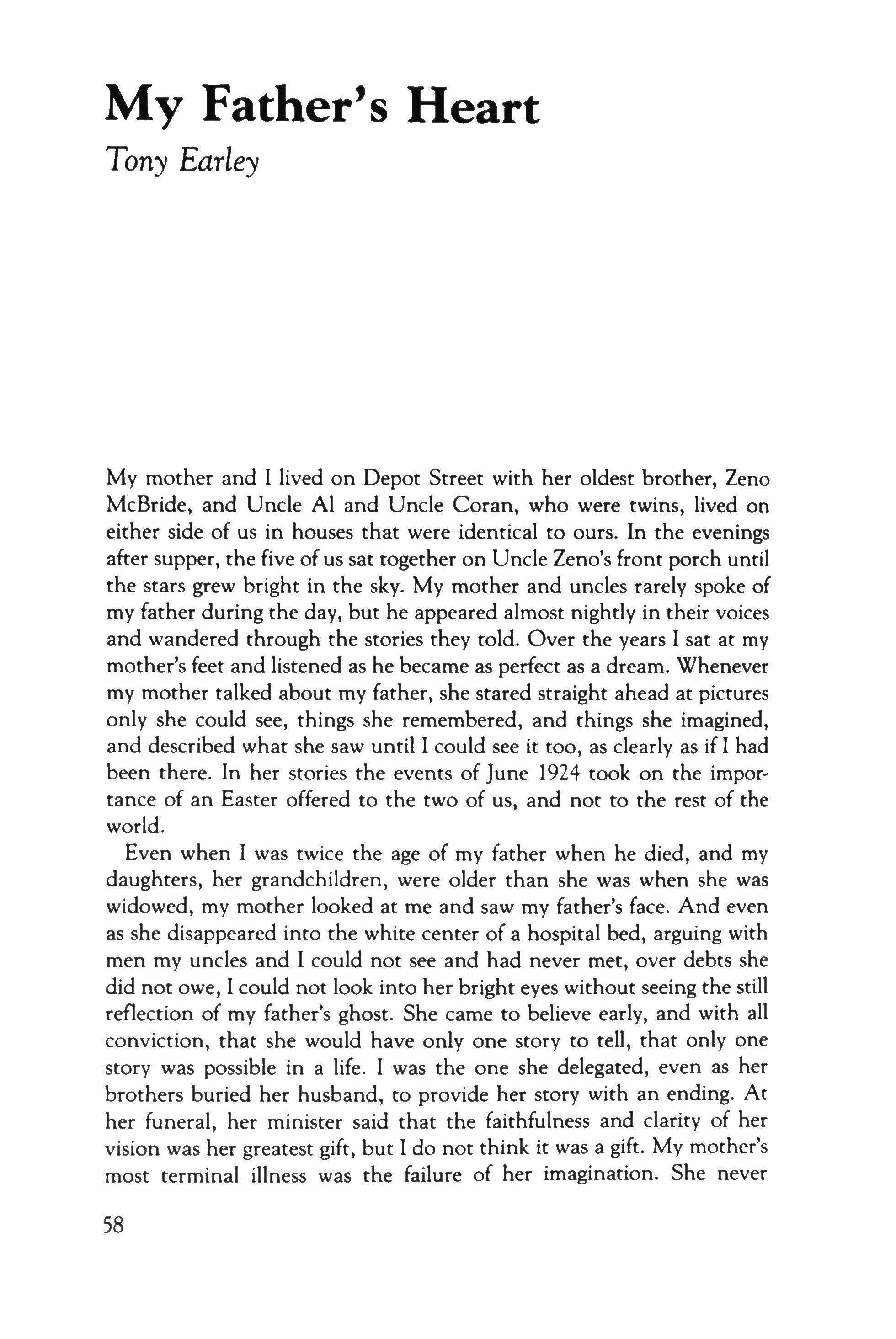
My mother and I lived on Depot Street with her oldest brother, Zeno McBride, and Uncle Al and Uncle Coran, who were twins, lived on either side of us in houses that were identical to ours. In the evenings after supper, the five of us sat together on Uncle Zeno's front porch until the stars grew bright in the sky. My mother and uncles rarely spoke of my father during the day, but he appeared almost nightly in their voices and wandered through the stories they told. Over the years I sat at my mother's feet and listened as he became as perfect as a dream. Whenever my mother talked about my father, she stared straight ahead at pictures only she could see, things she remembered, and things she imagined, and described what she saw until I could see it too, as clearly as if I had been there. In her stories the events of June 1924 took on the importance of an Easter offered to the two of us, and not to the rest of the world.
Even when I was twice the age of my father when he died, and my daughters, her grandchildren, were older than she was when she was widowed, my mother looked at me and saw my father's face. And even as she disappeared into the white center of a hospital bed, arguing with men my uncles and I could not see and had never met, over debts she did not owe, I could not look into her bright eyes without seeing the still reflection of my father's ghost. She came to believe early, and with all conviction, that she would have only one story to tell, that only one story was possible in a life. I was the one she delegated, even as her brothers buried her husband, to provide her story with an ending. At her funeral, her minister said that the faithfulness and clarity of her vision was her greatest gift, but I do not think it was a gift. My mother's most terminal illness was the failure of her imagination. She never
58
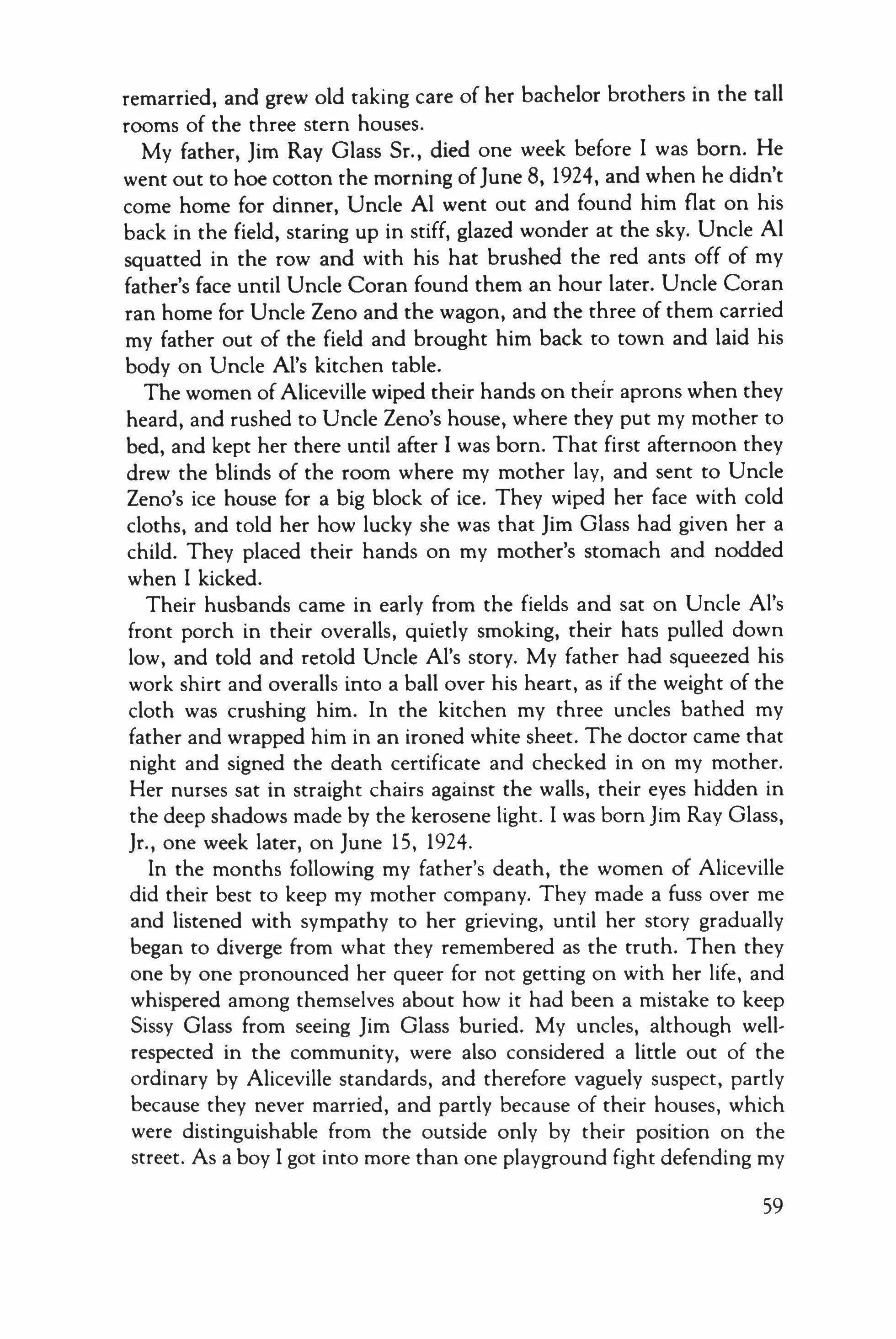
remarried, and grew old taking care of her bachelor brothers in the tall rooms of the three stern houses.
My father, Jim Ray Glass Sr., died one week before I was born. He went out to hoe cotton the morning ofJune 8, 1924, and when he didn't come home for dinner, Uncle Al went out and found him flat on his back in the field, staring up in stiff, glazed wonder at the sky. Uncle Al squatted in the row and with his hat brushed the red ants off of my father's face until Uncle Coran found them an hour later. Uncle Coran ran home for Uncle Zeno and the wagon, and the three of them carried my father out of the field and brought him back to town and laid his body on Uncle AI's kitchen table.
The women of Aliceville wiped their hands on their aprons when they heard, and rushed to Uncle Zeno's house, where they put my mother to bed, and kept her there until after I was born. That first afternoon they drew the blinds of the room where my mother lay, and sent to Uncle Zeno's ice house for a big block of ice. They wiped her face with cold cloths, and told her how lucky she was that Jim Glass had given her a child. They placed their hands on my mother's stomach and nodded when I kicked.
Their husbands came in early from the fields and sat on Uncle AI's front porch in their overalls, quietly smoking, their hats pulled down low, and told and retold Uncle AI's story. My father had squeezed his work shirt and overalls into a ball over his heart, as if the weight of the cloth was crushing him. In the kitchen my three uncles bathed my father and wrapped him in an ironed white sheet. The doctor came that night and signed the death certificate and checked in on my mother. Her nurses sat in straight chairs against the walls, their eyes hidden in the deep shadows made by the kerosene light. I was born Jim Ray Glass, jr., one week later, on June 15, 1924.
In the months following my father's death, the women of Aliceville did their best to keep my mother company. They made a fuss over me and listened with sympathy to her grieving, until her story gradually began to diverge from what they remembered as the truth. Then they one by one pronounced her queer for not getting on with her life, and whispered among themselves about how it had been a mistake to keep Sissy Glass from seeing Jim Glass buried. My uncles, although wellrespected in the community, were also considered a little out of the ordinary by Aliceville standards, and therefore vaguely suspect, partly because they never married, and partly because of their houses, which were distinguishable from the outside only by their position on the street. As a boy I got into more than one playground fight defending my
59
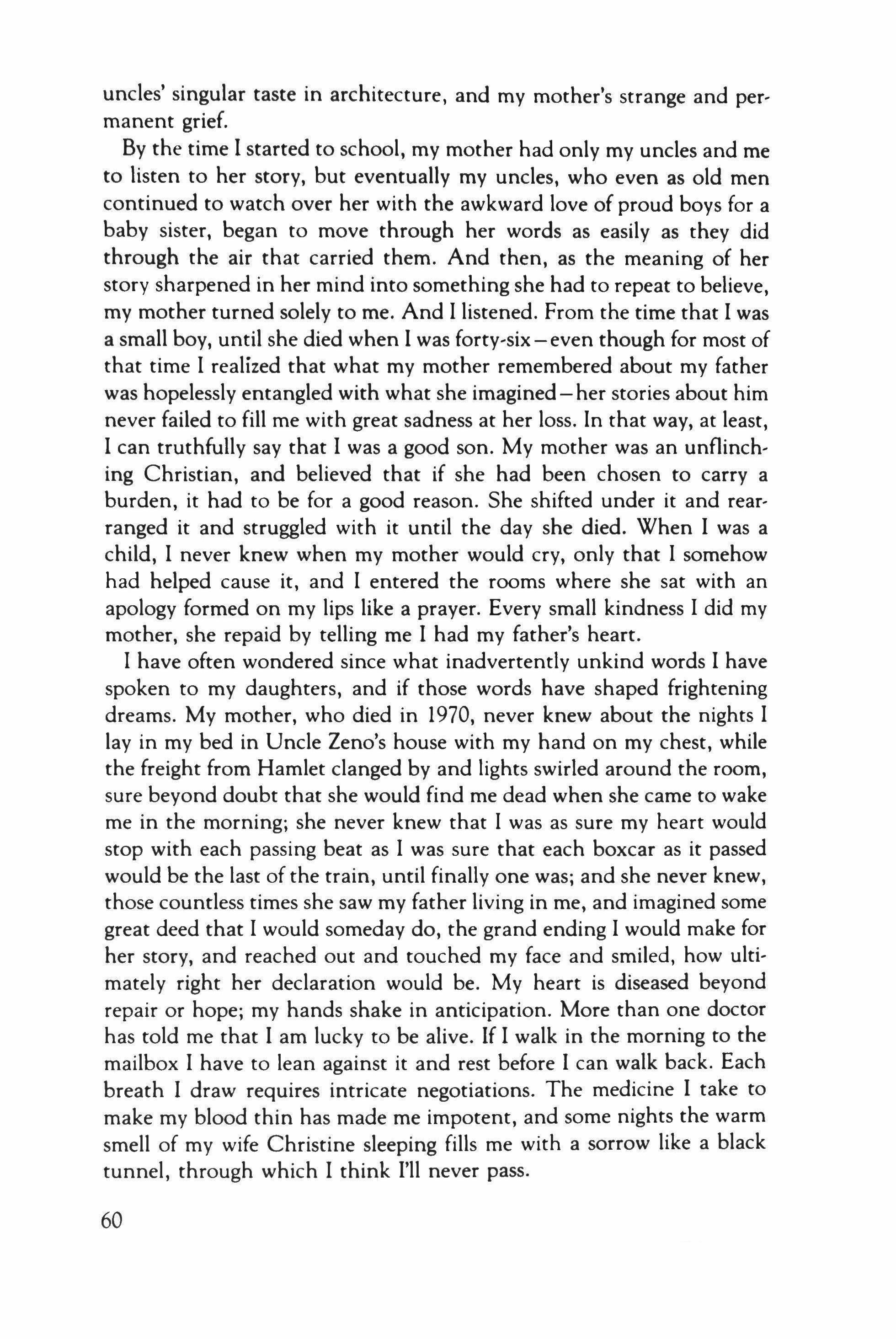
uncles' singular taste in architecture, and my mother's strange and permanent grief.
By the time I started to school, my mother had only my uncles and me to listen to her story, but eventually my uncles, who even as old men continued to watch over her with the awkward love of proud boys for a baby sister, began to move through her words as easily as they did through the air that carried them. And then, as the meaning of her story sharpened in her mind into something she had to repeat to believe, my mother turned solely to me. And I listened. From the time that I was a small boy, until she died when I was forty-six-even though for most of that time I realized that what my mother remembered about my father was hopelessly entangled with what she imagined - her stories about him never failed to fill me with great sadness at her loss. In that way, at least, I can truthfully say that I was a good son. My mother was an unflinching Christian, and believed that if she had been chosen to carry a burden, it had to be for a good reason. She shifted under it and rearranged it and struggled with it until the day she died. When I was a child, I never knew when my mother would cry, only that I somehow had helped cause it, and I entered the rooms where she sat with an apology formed on my lips like a prayer. Every small kindness I did my mother, she repaid by telling me I had my father's heart.
I have often wondered since what inadvertently unkind words I have spoken to my daughters, and if those words have shaped frightening dreams. My mother, who died in 1970, never knew about the nights I lay in my bed in Uncle Zeno's house with my hand on my chest, while the freight from Hamlet clanged by and lights swirled around the room, sure beyond doubt that she would find me dead when she came to wake me in the morning; she never knew that I was as sure my heart would stop with each passing beat as I was sure that each boxcar as it passed would be the last of the train, until finally one was; and she never knew, those countless times she saw my father living in me, and imagined some great deed that I would someday do, the grand ending I would make for her story, and reached out and touched my face and smiled, how ultimately right her declaration would be. My heart is diseased beyond repair or hope; my hands shake in anticipation. More than one doctor has told me that I am lucky to be alive. If I walk in the morning to the mailbox I have to lean against it and rest before I can walk back. Each breath I draw requires intricate negotiations. The medicine I take to make my blood thin has made me impotent, and some nights the warm smell of my wife Christine sleeping fills me with a sorrow like a black tunnel, through which I think I'll never pass.
60
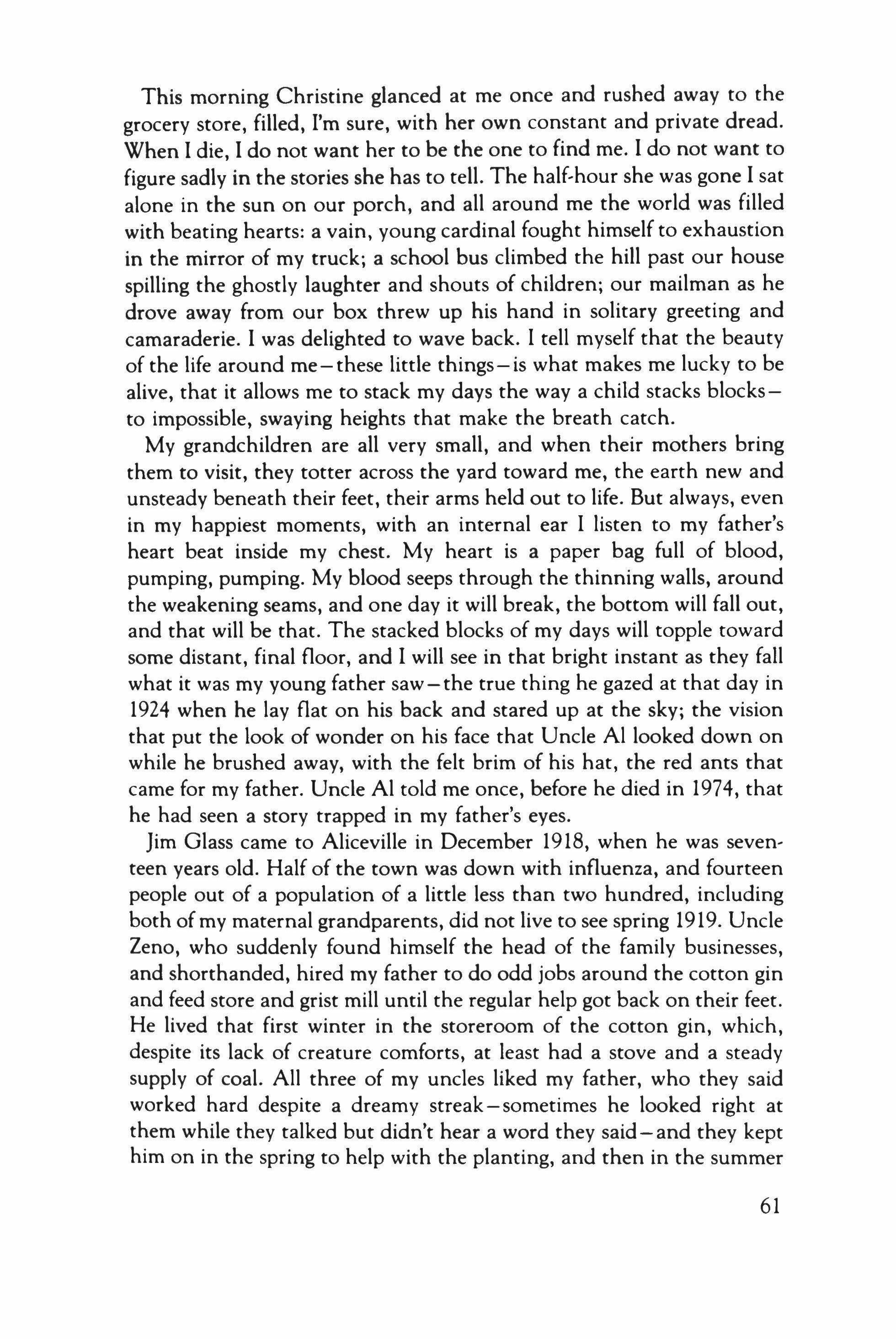
This morning Christine glanced at me once and rushed away to the grocery store, filled, I'm sure, with her own constant and private dread. When I die, I do not want her to be the one to find me. I do not want to figure sadly in the stories she has to tell. The half-hour she was gone I sat alone in the sun on our porch, and all around me the world was filled with beating hearts: a vain, young cardinal fought himself to exhaustion in the mirror of my truck; a school bus climbed the hill past our house spilling the ghostly laughter and shouts of children; our mailman as he drove away from our box threw up his hand in solitary greeting and camaraderie. I was delighted to wave back. I tell myself that the beauty of the life around me-these little things-is what makes me lucky to be alive, that it allows me to stack my days the way a child stacks blocksto impossible, swaying heights that make the breath catch.
My grandchildren are all very small, and when their mothers bring them to visit, they totter across the yard toward me, the earth new and unsteady beneath their feet, their arms held out to life. But always, even in my happiest moments, with an internal ear I listen to my father's heart beat inside my chest. My heart is a paper bag full of blood, pumping, pumping. My blood seeps through the thinning walls, around the weakening seams, and one day it will break, the bottom will fall out, and that will be that. The stacked blocks of my days will topple toward some distant, final floor, and I will see in that bright instant as they fall what it was my young father saw - the true thing he gazed at that day in 1924 when he lay flat on his back and stared up at the sky; the vision that put the look of wonder on his face that Uncle Al looked down on while he brushed away, with the felt brim of his hat, the red ants that came for my father. Uncle Al told me once, before he died in 1974, that he had seen a story trapped in my father's eyes.
Jim Glass came to Aliceville in December 1918, when he was seventeen years old. Half of the town was down with influenza, and fourteen people out of a population of a little less than two hundred, including both of my maternal grandparents, did not live to see spring 1919. Uncle Zeno, who suddenly found himself the head of the family businesses, and shorthanded, hired my father to do odd jobs around the cotton gin and feed store and grist mill until the regular help got back on their feet. He lived that first winter in the storeroom of the cotton gin, which, despite its lack of creature comforts, at least had a stove and a steady supply of coal. All three of my uncles liked my father, who they said worked hard despite a dreamy streak-sometimes he looked right at them while they talked but didn't hear a word they said-and they kept him on in the spring to help with the planting, and then in the summer
61
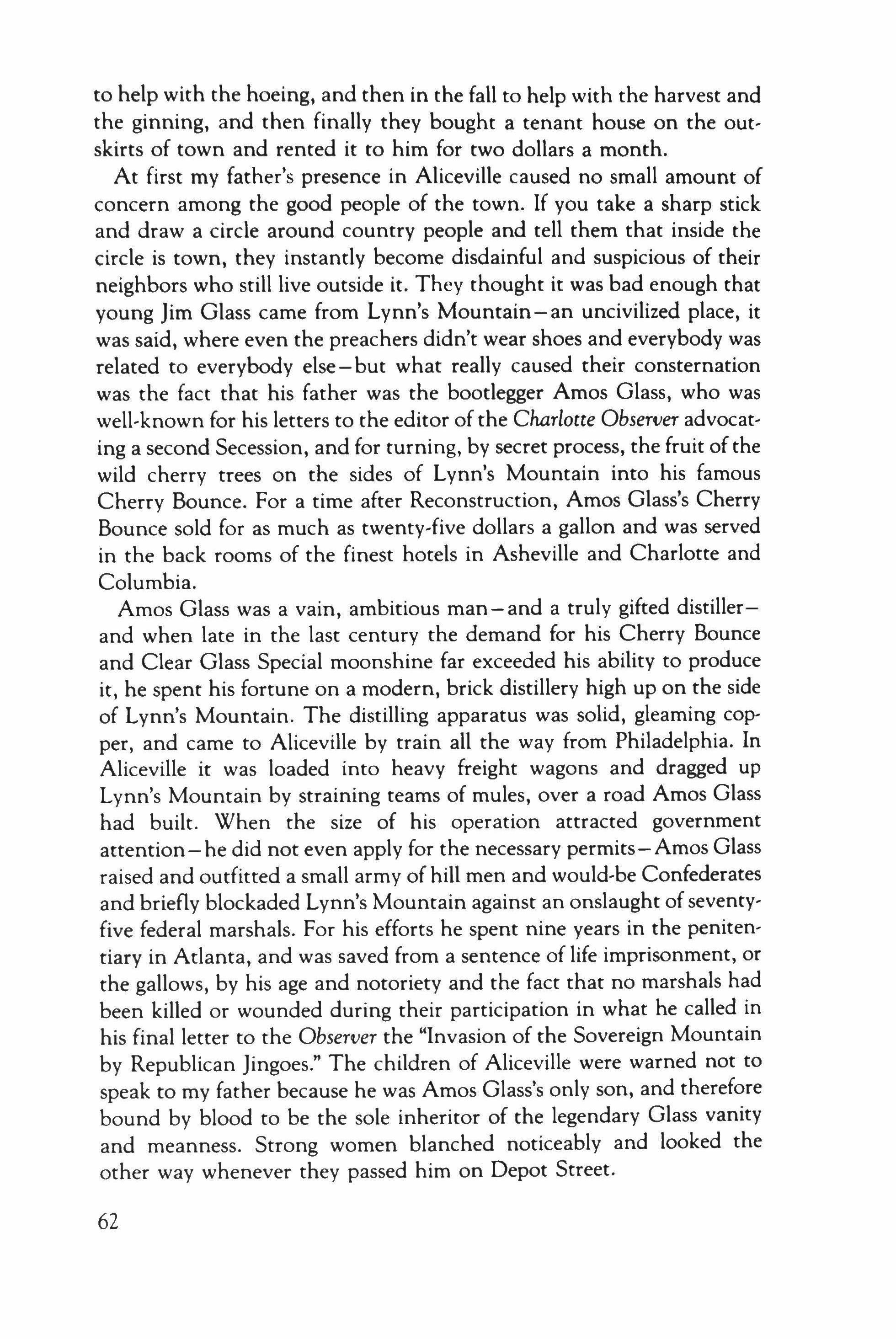
to help with the hoeing, and then in the fall to help with the harvest and the ginning, and then finally they bought a tenant house on the outskirts of town and rented it to him for two dollars a month.
At first my father's presence in Aliceville caused no small amount of concern among the good people of the town. If you take a sharp stick and draw a circle around country people and tell them that inside the circle is town, they instantly become disdainful and suspicious of their neighbors who still live outside it. They thought it was bad enough that young Jim Glass came from Lynn's Mountain-an uncivilized place, it was said, where even the preachers didn't wear shoes and everybody was related to everybody else-but what really caused their consternation was the fact that his father was the bootlegger Amos Glass, who was well-known for his letters to the editor of the Charlotte Observer advocating a second Secession, and for turning, by secret process, the fruit of the wild cherry trees on the sides of Lynn's Mountain into his famous Cherry Bounce. For a time after Reconstruction, Amos Glass's Cherry Bounce sold for as much as twenty-five dollars a gallon and was served in the back rooms of the finest hotels in Asheville and Charlotte and Columbia.
Amos Glass was a vain, ambitious man-and a truly gifted distillerand when late in the last century the demand for his Cherry Bounce and Clear Glass Special moonshine far exceeded his ability to produce it, he spent his fortune on a modern, brick distillery high up on the side of Lynn's Mountain. The distilling apparatus was solid, gleaming copper, and came to Aliceville by train all the way from Philadelphia. In Aliceville it was loaded into heavy freight wagons and dragged up Lynn's Mountain by straining teams of mules, over a road Amos Glass had built. When the size of his operation attracted government attention - he did not even apply for the necessary permits-Amos Glass raised and outfitted a small army of hill men and would-be Confederates and briefly blockaded Lynn's Mountain against an onslaught of seventyfive federal marshals. For his efforts he spent nine years in the penitentiary in Atlanta, and was saved from a sentence of life imprisonment, or the gallows, by his age and notoriety and the fact that no marshals had been killed or wounded during their participation in what he called in his final letter to the Observer the "Invasion of the Sovereign Mountain by Republican Jingoes." The children of Aliceville were warned not to speak to my father because he was Amos Glass's only son, and therefore bound by blood to be the sole inheritor of the legendary Glass vanity and meanness. Strong women blanched noticeably and looked the other way whenever they passed him on Depot Street.
62
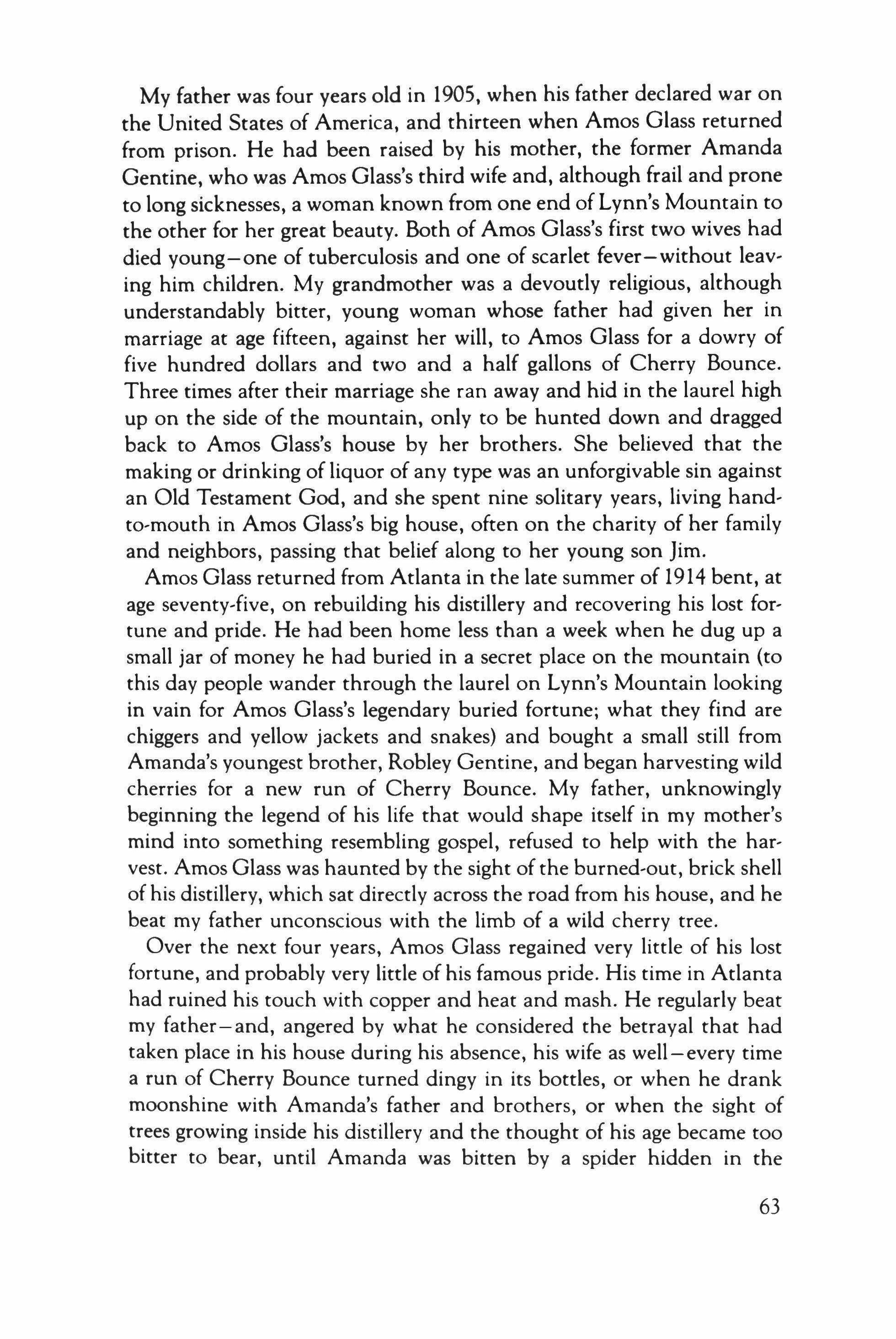
My father was four years old in 1905, when his father declared war on the United States of America, and thirteen when Amos Glass returned from prison. He had been raised by his mother, the former Amanda Gentine, who was Amos Glass's third wife and, although frail and prone to long sicknesses, a woman known from one end of Lynn's Mountain to the other for her great beauty. Both of Amos Glass's first two wives had died young-one of tuberculosis and one of scarlet fever-without leaving him children. My grandmother was a devoutly religious, although understandably bitter, young woman whose father had given her in marriage at age fifteen, against her will, to Amos Glass for a dowry of five hundred dollars and two and a half gallons of Cherry Bounce.
Three times after their marriage she ran away and hid in the laurel high up on the side of the mountain, only to be hunted down and dragged back to Amos Glass's house by her brothers. She believed that the making or drinking of liquor of any type was an unforgivable sin against an Old Testament God, and she spent nine solitary years, living handto-mouth in Amos Glass's big house, often on the charity of her family and neighbors, passing that belief along to her young son Jim.
Amos Glass returned from Atlanta in the late summer of 1914 bent, at age seventy-five, on rebuilding his distillery and recovering his lost fortune and pride. He had been home less than a week when he dug up a small jar of money he had buried in a secret place on the mountain (to this day people wander through the laurel on Lynn's Mountain looking in vain for Amos Glass's legendary buried fortune; what they find are chiggers and yellow jackets and snakes) and bought a small still from Amanda's youngest brother, Robley Gentine, and began harvesting wild cherries for a new run of Cherry Bounce. My father, unknowingly beginning the legend of his life that would shape itself in my mother's mind into something resembling gospel, refused to help with the harvest. Amos Glass was haunted by the sight of the burned-out, brick shell of his distillery, which sat directly across the road from his house, and he beat my father unconscious with the limb of a wild cherry tree.
Over the next four years, Amos Glass regained very little of his lost fortune, and probably very little of his famous pride. His time in Atlanta had ruined his touch with copper and heat and mash. He regularly beat my father-and, angered by what he considered the betrayal that had taken place in his house during his absence, his wife as well-every time a run of Cherry Bounce turned dingy in its bottles, or when he drank moonshine with Amanda's father and brothers, or when the sight of trees growing inside his distillery and the thought of his age became too bitter to bear, until Amanda was bitten by a spider hidden in the
63
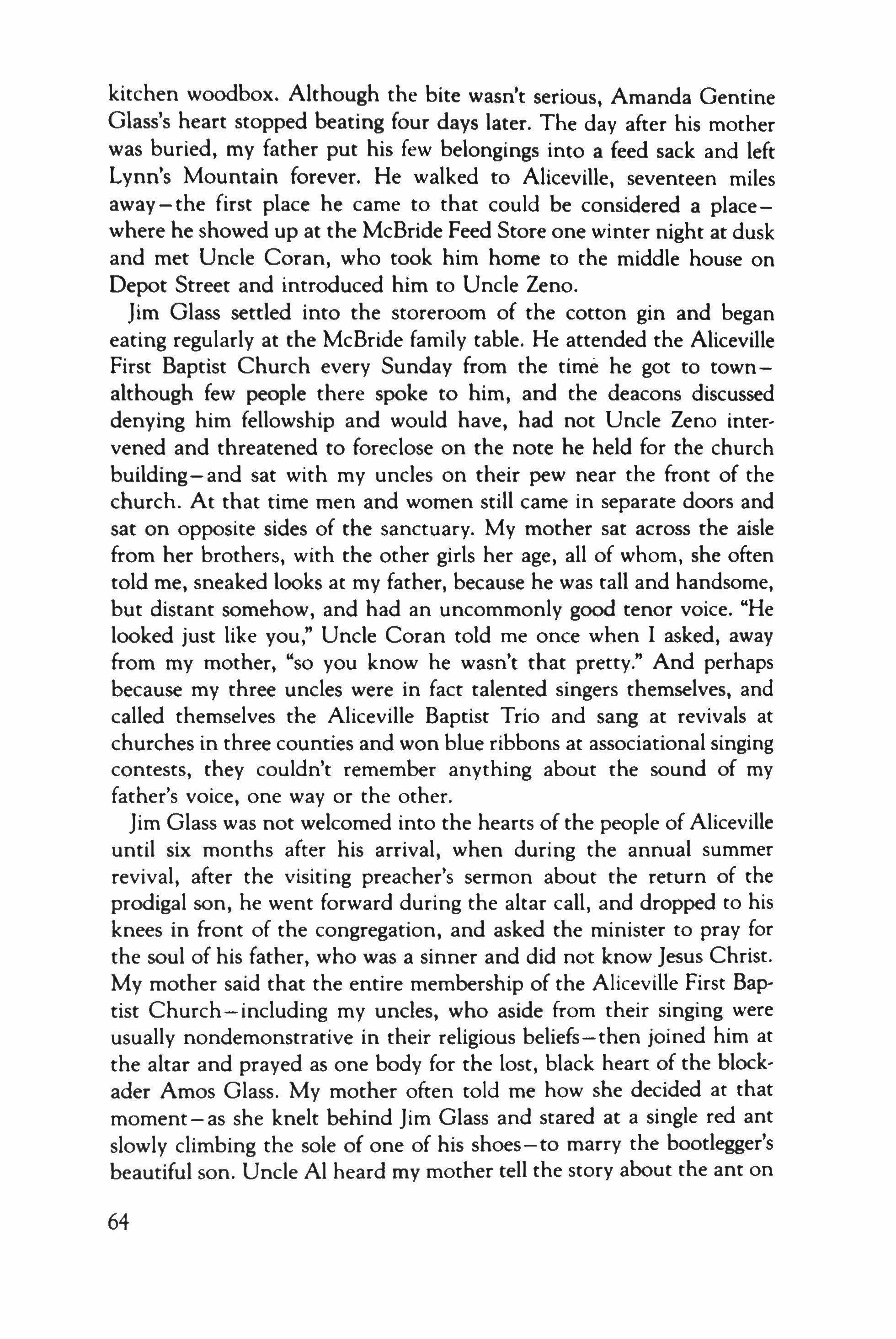
kitchen woodbox. Although the bite wasn't serious, Amanda Gentine Glass's heart stopped beating four days later. The day after his mother was buried, my father put his few belongings into a feed sack and left Lynn's Mountain forever. He walked to Aliceville, seventeen miles away-the first place he came to that could be considered a placewhere he showed up at the McBride Feed Store one winter night at dusk and met Uncle Coran, who took him home to the middle house on Depot Street and introduced him to Uncle Zeno.
Jim Glass settled into the storeroom of the cotton gin and began eating regularly at the McBride family table. He attended the Aliceville First Baptist Church every Sunday from the time he got to townalthough few people there spoke to him, and the deacons discussed denying him fellowship and would have, had not Uncle Zeno intervened and threatened to foreclose on the note he held for the church building-and sat with my uncles on their pew near the front of the church. At that time men and women still came in separate doors and sat on opposite sides of the sanctuary. My mother sat across the aisle from her brothers, with the other girls her age, all of whom, she often told me, sneaked looks at my father, because he was tall and handsome, but distant somehow, and had an uncommonly good tenor voice. "He looked just like you," Uncle Coran told me once when I asked, away from my mother, "so you know he wasn't that pretty." And perhaps because my three uncles were in fact talented singers themselves, and called themselves the Aliceville Baptist Trio and sang at revivals at churches in three counties and won blue ribbons at associational singing contests, they couldn't remember anything about the sound of my father's voice, one way or the other.
Jim Glass was not welcomed into the hearts of the people of Aliceville until six months after his arrival, when during the annual summer revival, after the visiting preacher's sermon about the return of the prodigal son, he went forward during the altar call, and dropped to his knees in front of the congregation, and asked the minister to pray for the soul of his father, who was a sinner and did not know Jesus Christ. My mother said that the entire membership of the Aliceville First Baptist Church - including my uncles, who aside from their singing were usually nondemonstrative in their religious beliefs-then joined him at the altar and prayed as one body for the lost, black heart of the blockader Amos Glass. My mother often told me how she decided at that moment-as she knelt behind Jim Glass and stared at a single red ant slowly climbing the sole of one of his shoes-to marry the bootlegger's beautiful son. Uncle Al heard my mother tell the story about the ant on
64
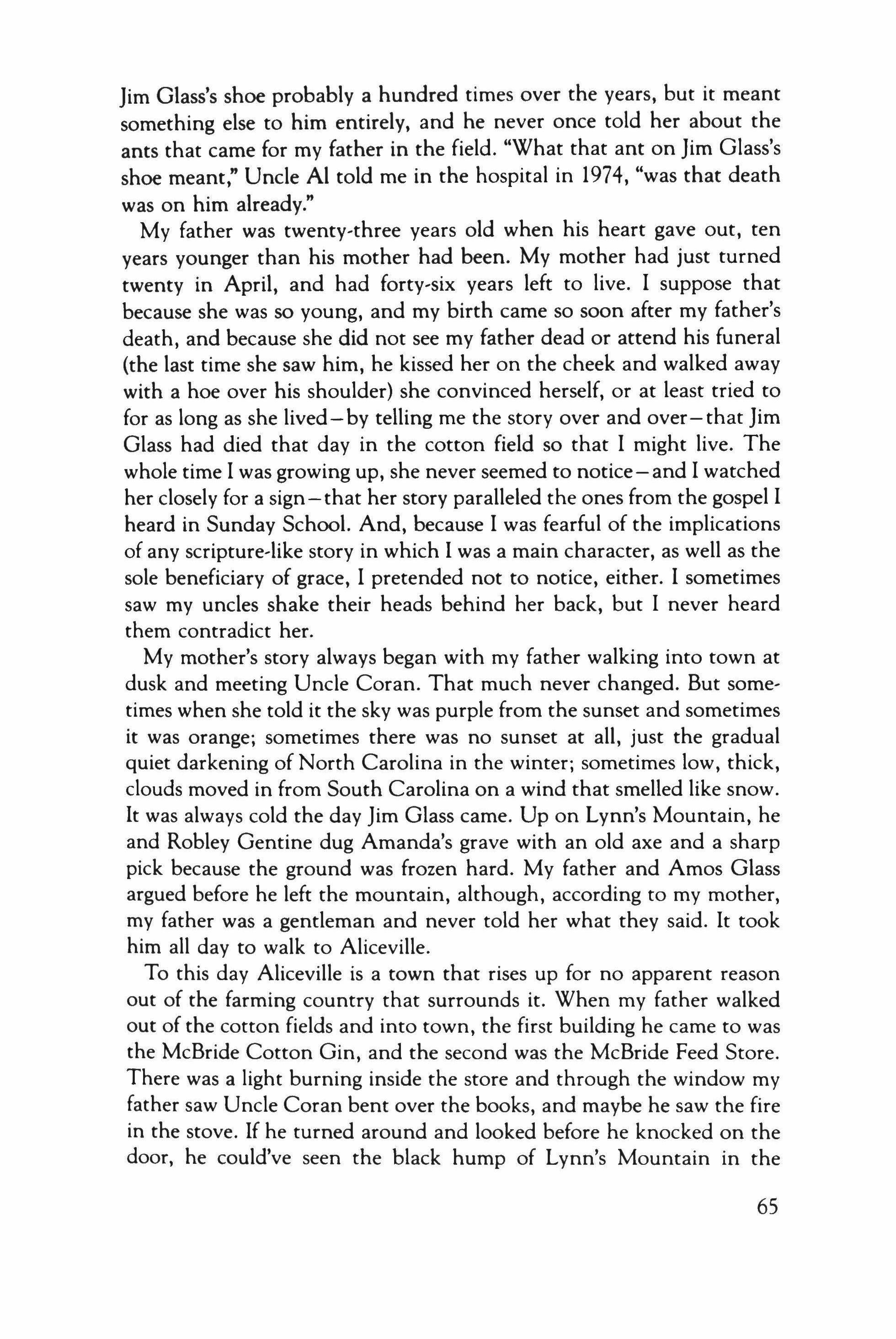
jim Glass's shoe probably a hundred times over the years, but it meant something else to him entirely, and he never once told her about the ants that came for my father in the field. "What that ant on jim Glass's shoe meant," Uncle Al told me in the hospital in 1974, "was that death was on him already."
My father was twenty-three years old when his heart gave out, ten years younger than his mother had been. My mother had just turned twenty in April, and had forty-six years left to live. I suppose that because she was so young, and my birth came so soon after my father's death, and because she did not see my father dead or attend his funeral (the last time she saw him, he kissed her on the cheek and walked away with a hoe over his shoulder) she convinced herself, or at least tried to for as long as she lived - by telling me the story over and over- that jim Glass had died that day in the cotton field so that I might live. The whole time I was growing up, she never seemed to notice-and I watched her closely for a sign-that her story paralleled the ones from the gospel I heard in Sunday School. And, because I was fearful of the implications of any scripture-like story in which I was a main character, as well as the sole beneficiary of grace, I pretended not to notice, either. I sometimes saw my uncles shake their heads behind her back, but I never heard them contradict her.
My mother's story always began with my father walking into town at dusk and meeting Uncle Coran. That much never changed. But sometimes when she told it the sky was purple from the sunset and sometimes it was orange; sometimes there was no sunset at all, just the gradual quiet darkening of North Carolina in the winter; sometimes low, thick, clouds moved in from South Carolina on a wind that smelled like snow. It was always cold the day jim Glass came. Up on Lynn's Mountain, he and Robley Gentine dug Amanda's grave with an old axe and a sharp pick because the ground was frozen hard. My father and Amos Glass argued before he left the mountain, although, according to my mother, my father was a gentleman and never told her what they said. It took him all day to walk to Aliceville.
To this day Aliceville is a town that rises up for no apparent reason out of the farming country that surrounds it. When my father walked out of the cotton fields and into town, the first building he came to was the McBride Cotton Gin, and the second was the McBride Feed Store. There was a light burning inside the store and through the window my father saw Uncle Coran bent over the books, and maybe he saw the fire in the stove. If he turned around and looked before he knocked on the door, he could've seen the black hump of Lynn's Mountain in the
65
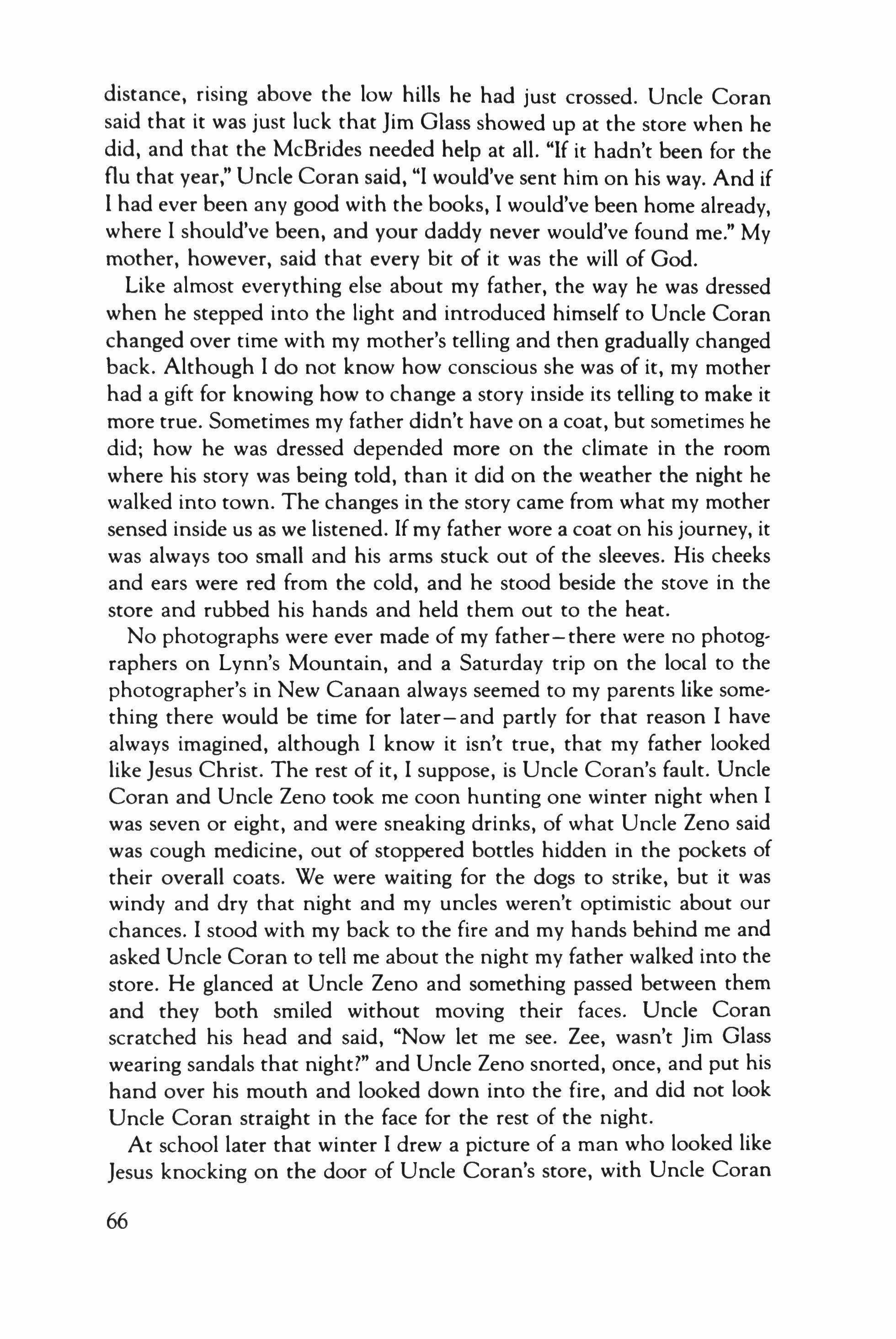
distance, rising above the low hills he had just crossed. Uncle Coran said that it was just luck that Jim Glass showed up at the store when he did, and that the McBrides needed help at all. "If it hadn't been for the flu that year," Uncle Coran said, "I would've sent him on his way. And if I had ever been any good with the books, I would've been home already, where I should've been, and your daddy never would've found me." My mother, however, said that every bit of it was the will of God.
Like almost everything else about my father, the way he was dressed when he stepped into the light and introduced himself to Uncle Coran changed over time with my mother's telling and then gradually changed back. Although I do not know how conscious she was of it, my mother had a gift for knowing how to change a story inside its telling to make it more true. Sometimes my father didn't have on a coat, but sometimes he did; how he was dressed depended more on the climate in the room where his story was being told, than it did on the weather the night he walked into town. The changes in the story came from what my mother sensed inside us as we listened. If my father wore a coat on his journey, it was always too small and his arms stuck out of the sleeves. His cheeks and ears were red from the cold, and he stood beside the stove in the store and rubbed his hands and held them out to the heat.
No photographs were ever made of my father-there were no photographers on Lynn's Mountain, and a Saturday trip on the local to the photographer's in New Canaan always seemed to my parents like something there would be time for later- and partly for that reason I have always imagined, although I know it isn't true, that my father looked like Jesus Christ. The rest of it, I suppose, is Uncle Coran's fault. Uncle Coran and Uncle Zeno took me coon hunting one winter night when I was seven or eight, and were sneaking drinks, of what Uncle Zeno said was cough medicine, out of stoppered bottles hidden in the pockets of their overall coats. We were waiting for the dogs to strike, but it was windy and dry that night and my uncles weren't optimistic about our chances. I stood with my back to the fire and my hands behind me and asked Uncle Coran to tell me about the night my father walked into the store. He glanced at Uncle Zeno and something passed between them and they both smiled without moving their faces. Uncle Coran scratched his head and said, "Now let me see. lee, wasn't Jim Glass wearing sandals that night?" and Uncle Zeno snorted, once, and put his hand over his mouth and looked down into the fire, and did not look Uncle Coran straight in the face for the rest of the night.
At school later that winter I drew a picture of a man who looked like Jesus knocking on the door of Uncle Coran's store, with Uncle Coran
66
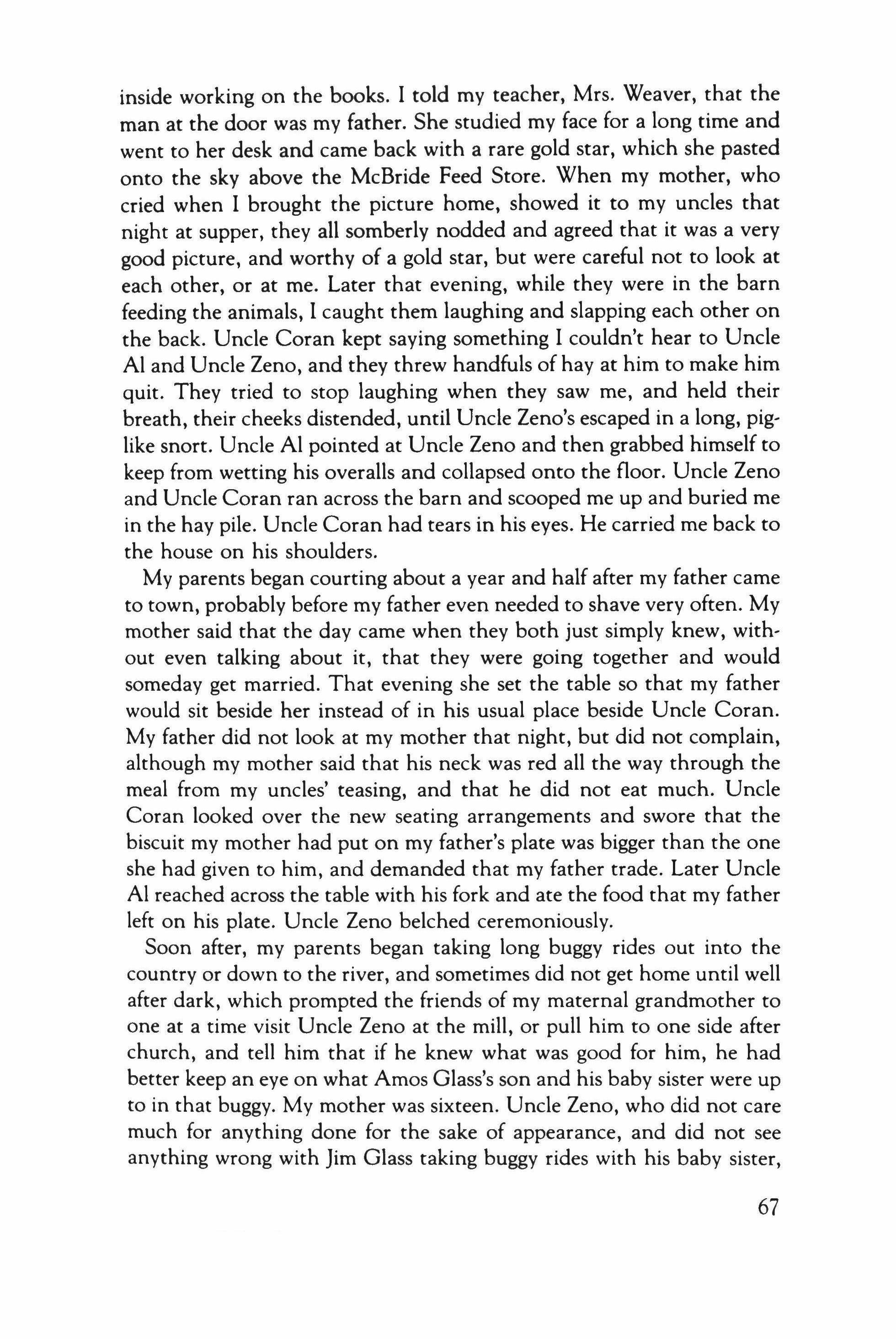
inside working on the books. I told my teacher, Mrs. Weaver, that the man at the door was my father. She studied my face for a long time and went to her desk and came back with a rare gold star, which she pasted onto the sky above the McBride Feed Store. When my mother, who cried when I brought the picture home, showed it to my uncles that night at supper, they all somberly nodded and agreed that it was a very good picture, and worthy of a gold star, but were careful not to look at each other, or at me. Later that evening, while they were in the barn feeding the animals, I caught them laughing and slapping each other on the back. Uncle Coran kept saying something I couldn't hear to Uncle Al and Uncle Zeno, and they threw handfuls of hay at him to make him quit. They tried to stop laughing when they saw me, and held their breath, their cheeks distended, until Uncle Zeno's escaped in a long, piglike snort. Uncle Al pointed at Uncle Zeno and then grabbed himself to keep from wetting his overalls and collapsed onto the floor. Uncle Zeno and Uncle Coran ran across the barn and scooped me up and buried me in the hay pile. Uncle Coran had tears in his eyes. He carried me back to the house on his shoulders.
My parents began courting about a year and half after my father came to town, probably before my father even needed to shave very often. My mother said that the day came when they both just simply knew, without even talking about it, that they were going together and would someday get married. That evening she set the table so that my father would sit beside her instead of in his usual place beside Uncle Coran. My father did not look at my mother that night, but did not complain, although my mother said that his neck was red all the way through the meal from my uncles' teasing, and that he did not eat much. Uncle Coran looked over the new seating arrangements and swore that the biscuit my mother had put on my father's plate was bigger than the one she had given to him, and demanded that my father trade. Later Uncle Al reached across the table with his fork and ate the food that my father left on his plate. Uncle Zeno belched ceremoniously.
Soon after, my parents began taking long buggy rides out into the country or down to the river, and sometimes did not get home until well after dark, which prompted the friends of my maternal grandmother to one at a time visit Uncle Zeno at the mill, or pull him to one side after church, and tell him that if he knew what was good for him, he had better keep an eye on what Amos Glass's son and his baby sister were up to in that buggy. My mother was sixteen. Uncle Zeno, who did not care much for anything done for the sake of appearance, and did not see anything wrong with Jim Glass taking buggy rides with his baby sister,
67

told each of them in turn that he would worry about his business and family, and that they should worry about their own. Consequently, my mother said, there were some conspicuous absences at their wedding, and that as a result, our relationships with some of the families in town were still cool, although she never told me which families. But on the red playground behind Aliceville School, I formulated suspicions of my own and struck, as I imagined, blows that settled old scores.
On successive spring Saturdays before their wedding, in May 1921, Uncle Zeno took my mother all the way to Charlotte to buy a readymade wedding dress-which was the talk and envy of all the girls in Aliceville-and my father to New Canaan to buy a navy-blue suit and new black shoes. Uncle Coran loaned my father twenty-eight dollars to buy my mother a ring and Uncle Al cut his hair. Uncle Zeno gave my mother away, and Uncle Al and Uncle Coran stood with my father. My uncles sang "Blest Be the Tie" during the ceremony while my mother avoided their eyes and my father studied his new shoes. Uncle Coran said that Uncle Al got so choked up during the second verse that he lost his note, an accusation that Uncle Al always denied. All three of my uncles were tenors, but managed to win ribbons as a trio because Uncle Coran, who always swore that in the first place he was a baritone, and not a tenor, sang bass in a falsetto voice and Uncle AI, who was the most talented singer of the three, sang alto. My mother said that the singing of her brothers on the day she married Jim Glass was the most beautiful thing she had ever heard. Uncle Zeno said that their singing was only passable at the wedding, and would not have won any ribbons.
For their honeymoon my parents took the local to New Canaan, a limited to Marion, and a tourist excursion train behind an old, slow engine for the scary trip up Old Fort Mountain to Asheville. They stayed in a hotel with an elevator, rode the electric trolleys to the ends of all the lines, saw two silent movies, one of them a western, and savored the three meals a day they ate in restaurants and diners. They took a yellow taxi to the Grove Park Inn, but my father would not go inside because he had not worn his suit and was ashamed of his clothes. My mother went inside alone and later described to my father, and then to my uncles, and later still to me, the great stone fireplace in the lobby that would hold the trunks of whole trees. They made an appointment at a photographic studio on Wall Street, but the photographer stood them up. They climbed Beaucatcher Mountain late in the afternoon and sat on a rock and watched the sun set over the town, and made up stories about their old age and how their yard would be filled with
68

grandchildren. They decided to name their first son James McBride Glass and call him Mac. They rented a buggy and drove to the gates of the Biltmore Estate, and talked at some length with a caretaker about the rich people and marvels he had seen on the other side.
My mother and father came back to Aliceville after their three days in Asheville more in love, according to my mother, than when they left. They settled down in the little tenant house on the outskirts of town, for which my uncles had stopped charging rent, and lived together for the remaining three years of my father's life. My mother still cooked three meals a day in Uncle Zeno's house for her brothers, except on Saturday night, when she made them fend for themselves and cooked in the little tenant house for herself and her new husband. Because Amanda Glass had been sickly and often bedridden while he was growing up, my father had learned to cook on Lynn's Mountain, and on Sunday afternoons, while my uncles and my mother sat together on Uncle Zeno's porch, and my uncles brandished tuning forks and hymnals and sang and accused each other of being sharp or flat, he often sneaked away to the tenant house and baked small lemon-flavored pound cakes or deep-dish apple pies for my mother, for which my uncles kidded him unmercifully.
During those days my uncles accepted Jim Glass as a brother, if they hadn't already, and began to work him into the family businesses as a partner. Their plan was for him to someday manage the cotton gin and one of the McBride farms. My mother selected a spot, just outside the town limits, away from the railroad tracks, for the house my uncles planned to build for them as a late wedding present. The spot she picked was right in the middle of one of the better McBride cotton fields, but on my mother's nineteenth birthday, my uncles met together behind the barn and agreed to give up the lot. It was on a slight knoll, facing the river on one side and the mountains in the distance on the other. My mother became pregnant shortly thereafter. My uncles threw their hats in the air when they heard, and chased my father down Depot Street and rubbed dirt on his face.
Although they were genuinely puzzled at first by the request, my uncles agreed to build a house for my mother and father that was different in design from their own. They were practical men who liked their houses-they were the largest in Aliceville-and figured they could do better and more quickly anything they had done more than once. But one Saturday my uncles closed down all the family businesses at dinnertime and went with my father in the truck to New Canaan, where they walked up and down the streets until they picked out a house that my father said he thought he could live in and all three of my uncles
69
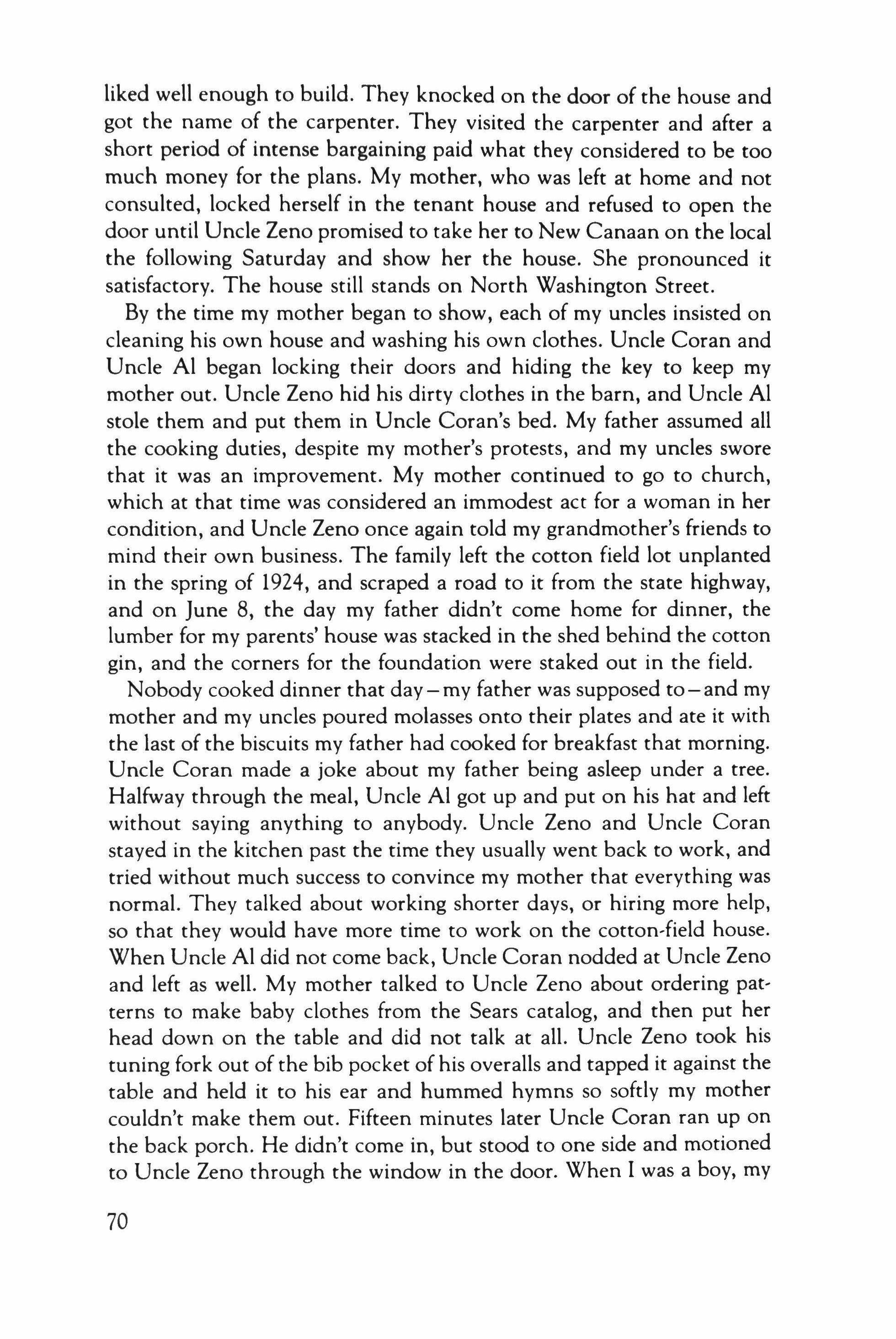
liked well enough to build. They knocked on the door of the house and got the name of the carpenter. They visited the carpenter and after a short period of intense bargaining paid what they considered to be too much money for the plans. My mother, who was left at home and not consulted, locked herself in the tenant house and refused to open the door until Uncle Zeno promised to take her to New Canaan on the local the following Saturday and show her the house. She pronounced it satisfactory. The house still stands on North Washington Street. By the time my mother began to show, each of my uncles insisted on cleaning his own house and washing his own clothes. Uncle Coran and Uncle Al began locking their doors and hiding the key to keep my mother out. Uncle Zeno hid his dirty clothes in the barn, and Uncle Al stole them and put them in Uncle Coran's bed. My father assumed all the cooking duties, despite my mother's protests, and my uncles swore that it was an improvement. My mother continued to go to church, which at that time was considered an immodest act for a woman in her condition, and Uncle Zeno once again told my grandmother's friends to mind their own business. The family left the cotton field lot unplanted in the spring of 1924, and scraped a road to it from the state highway, and on June 8, the day my father didn't come home for dinner, the lumber for my parents' house was stacked in the shed behind the cotton gin, and the corners for the foundation were staked out in the field.
Nobody cooked dinner that day-my father was supposed to-and my mother and my uncles poured molasses onto their plates and ate it with the last of the biscuits my father had cooked for breakfast that morning. Uncle Coran made a joke about my father being asleep under a tree. Halfway through the meal, Uncle Al got up and put on his hat and left without saying anything to anybody. Uncle Zeno and Uncle Coran stayed in the kitchen past the time they usually went back to work, and tried without much success to convince my mother that everything was normal. They talked about working shorter days, or hiring more help, so that they would have more time to work on the cotton-field house. When Uncle Al did not come back, Uncle Coran nodded at Uncle Zeno and left as well. My mother talked to Uncle Zeno about ordering patterns to make baby clothes from the Sears catalog, and then put her head down on the table and did not talk at all. Uncle Zeno took his tuning fork out of the bib pocket of his overalls and tapped it against the table and held it to his ear and hummed hymns so softly my mother couldn't make them out. Fifteen minutes later Uncle Coran ran up on the back porch. He didn't come in, but stood to one side and motioned to Uncle Zeno through the window in the door. When I was a boy, my
70
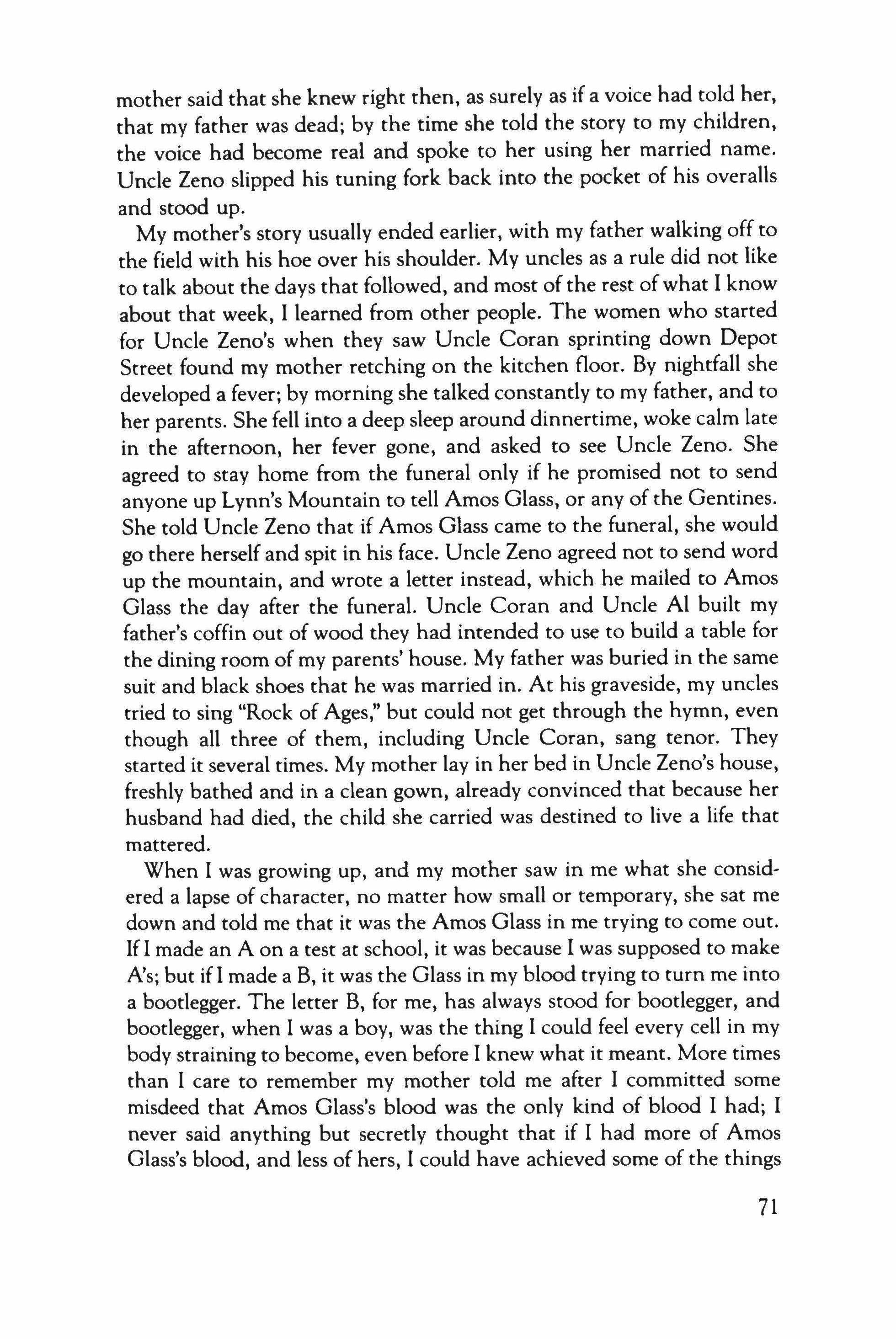
mother said that she knew right then. as surely as if a voice had told her, that my father was dead; by the time she told the story to my children, the voice had become real and spoke to her using her married name. Uncle Zeno slipped his tuning fork back into the pocket of his overalls and stood up.
My mother's story usually ended earlier. with my father walking off to the field with his hoe over his shoulder. My uncles as a rule did not like to talk about the days that followed, and most of the rest of what I know about that week, I learned from other people. The women who started for Uncle Zeno's when they saw Uncle Coran sprinting down Depot Street found my mother retching on the kitchen floor. By nightfall she developed a fever; by morning she talked constantly to my father, and to her parents. She fell into a deep sleep around dinnertime. woke calm late in the afternoon, her fever gone, and asked to see Uncle Zeno. She agreed to stay home from the funeral only if he promised not to send anyone up Lynn's Mountain to tell Amos Glass, or any of the Gentines. She told Uncle Zeno that if Amos Glass came to the funeral, she would go there herself and spit in his face. Uncle Zeno agreed not to send word up the mountain, and wrote a letter instead, which he mailed to Amos Glass the day after the funeral. Uncle Coran and Uncle Al built my father's coffin out of wood they had intended to use to build a table for the dining room of my parents' house. My father was buried in the same suit and black shoes that he was married in. At his graveside, my uncles tried to sing "Rock of Ages," but could not get through the hymn, even though all three of them, including Uncle Coran, sang tenor. They started it several times. My mother lay in her bed in Uncle Zeno's house, freshly bathed and in a clean gown, already convinced that because her husband had died, the child she carried was destined to live a life that mattered.
When I was growing up, and my mother saw in me what she considered a lapse of character, no matter how small or temporary, she sat me down and told me that it was the Amos Glass in me trying to come out. If I made an A on a test at school, it was because I was supposed to make A's; but if! made a B, it was the Glass in my blood trying to turn me into a bootlegger. The letter B, for me, has always stood for bootlegger, and bootlegger, when I was a boy, was the thing I could feel every cell in my body straining to become, even before I knew what it meant. More times than I care to remember my mother told me after I committed some misdeed that Amos Glass's blood was the only kind of blood I had; I never said anything but secretly thought that if I had more of Amos Glass's blood, and less of hers, I could have achieved some of the things
71
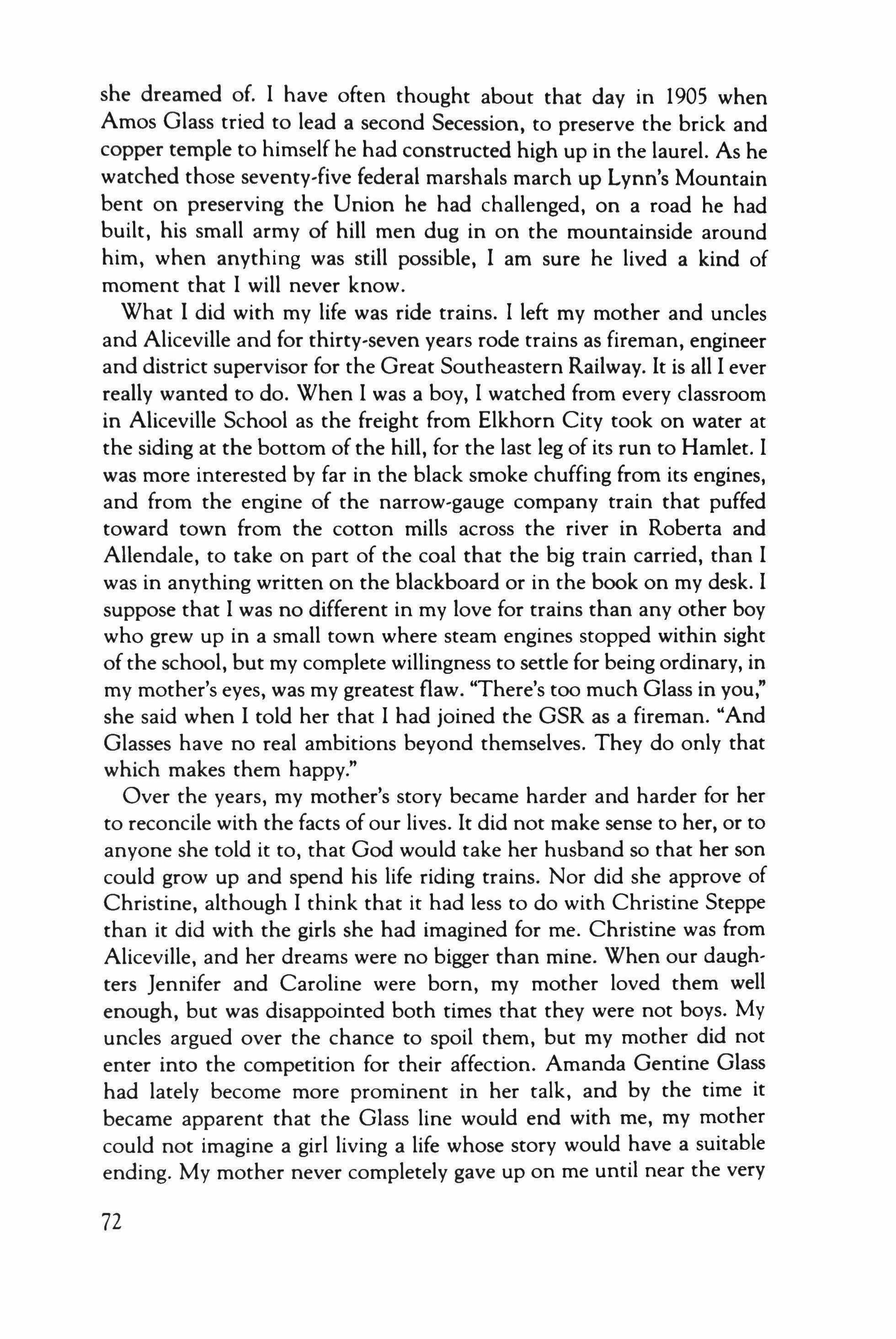
she dreamed of. I have often thought about that day in 1905 when Amos Glass tried to lead a second Secession, to preserve the brick and copper temple to himself he had constructed high up in the laurel. As he watched those seventy-five federal marshals march up Lynn's Mountain bent on preserving the Union he had challenged, on a road he had built, his small army of hill men dug in on the mountainside around him, when anything was still possible, I am sure he lived a kind of moment that I will never know.
What I did with my life was ride trains. I left my mother and uncles and Aliceville and for thirty-seven years rode trains as fireman, engineer and district supervisor for the Great Southeastern Railway. It is all I ever really wanted to do. When I was a boy, I watched from every classroom in Aliceville School as the freight from Elkhorn City took on water at the siding at the bottom of the hill, for the last leg of its run to Hamlet. I was more interested by far in the black smoke chuffing from its engines, and from the engine of the narrow-gauge company train that puffed toward town from the cotton mills across the river in Roberta and Allendale, to take on part of the coal that the big train carried, than I was in anything written on the blackboard or in the book on my desk. I suppose that I was no different in my love for trains than any other boy who grew up in a small town where steam engines stopped within sight of the school, but my complete willingness to settle for being ordinary, in my mother's eyes, was my greatest flaw. "There's too much Glass in you," she said when I told her that I had joined the GSR as a fireman. "And Glasses have no real ambitions beyond themselves. They do only that which makes them happy."
Over the years, my mother's story became harder and harder for her to reconcile with the facts of our lives. It did not make sense to her, or to anyone she told it to, that God would take her husband so that her son could grow up and spend his life riding trains. Nor did she approve of Christine, although I think that it had less to do with Christine Steppe than it did with the girls she had imagined for me. Christine was from Aliceville, and her dreams were no bigger than mine. When our daughters Jennifer and Caroline were born, my mother loved them well enough, but was disappointed both times that they were not boys. My uncles argued over the chance to spoil them, but my mother did not enter into the competition for their affection. Amanda Gentine Glass had lately become more prominent in her talk, and by the time it became apparent that the Glass line would end with me, my mother could not imagine a girl living a life whose story would have a suitable ending. My mother never completely gave up on me until near the very
72

end, probably on the outside chance that even late I might still possibly do the one great deed that would make God's will manifest. Before she died, long after I had given up on her ever recognizing me again, she said, "Jimmy, you tell Robley Gentine I will pay him what lowe him, but he will have to wait a few days." And then she fell asleep. Later that night she opened her eyes and said with all contempt the last three words I ever heard her say: "You ride trains."
The McBrides have always chosen to be buried on their own land, and not shoulder to shoulder in a churchyard, among people who were not family. My maternal grandparents, W. T. and Colleen Mcbride, who died during the flu epidemic of 1918, are buried near the river, at the edge of a sandy field always particularly suited to sweet potatoes. They are buried alongside my great-grandparents, Mauney and Sallie McBride, who picked the spot because it did not take up arable ground. My mother, however, chose to bury my father where he fell in the field, and not in the McBride graveyard by the river, and my uncles agreed to it, because they were Mcbrides, although when they plowed it would always mean breaking the rows on one side of my father's grave, and starting them again on the other.
Although many people in town considered the middle of a cotton field a strange place to bury a man, even one married to a McBride, my father's grave has always seemed as natural to me as a mountain in the distance. If you are from this part of North Carolina, the sight of the sky meeting flat ground will always make you lonesome. I can't imagine Aliceville without Lynn's Mountain rising above the hills to the north and west, anymore than I can imagine the field where my father died without his tombstone rising above the rows. Whenever I worked that field as a young man and boy, I always looked forward to hoeing the four rows that were broken in the middle by my father's grave. I viewed it as a place of reward and renewal, not only for my father, but for me; it was a spot that by its nature forced me to end one thing, and momentarily step out of my way and consider, and then start something fresh on the other side; it made room inside those four rows of cotton, and the working days that held them, for a small, necessary type ofhope. It is the same hope that I found riding trains and finishing a day of work in a place different than where I started, the simple thing that in the absence of a greater dream carried me to the end of my life.
The field where my father died and was buried came to be known around Aliceville as the Jim Glass field - all fields in the country sprout names, and all country people know them-and in the years after my father's death, I often saw my uncles' field hands take their breaks sitting
73
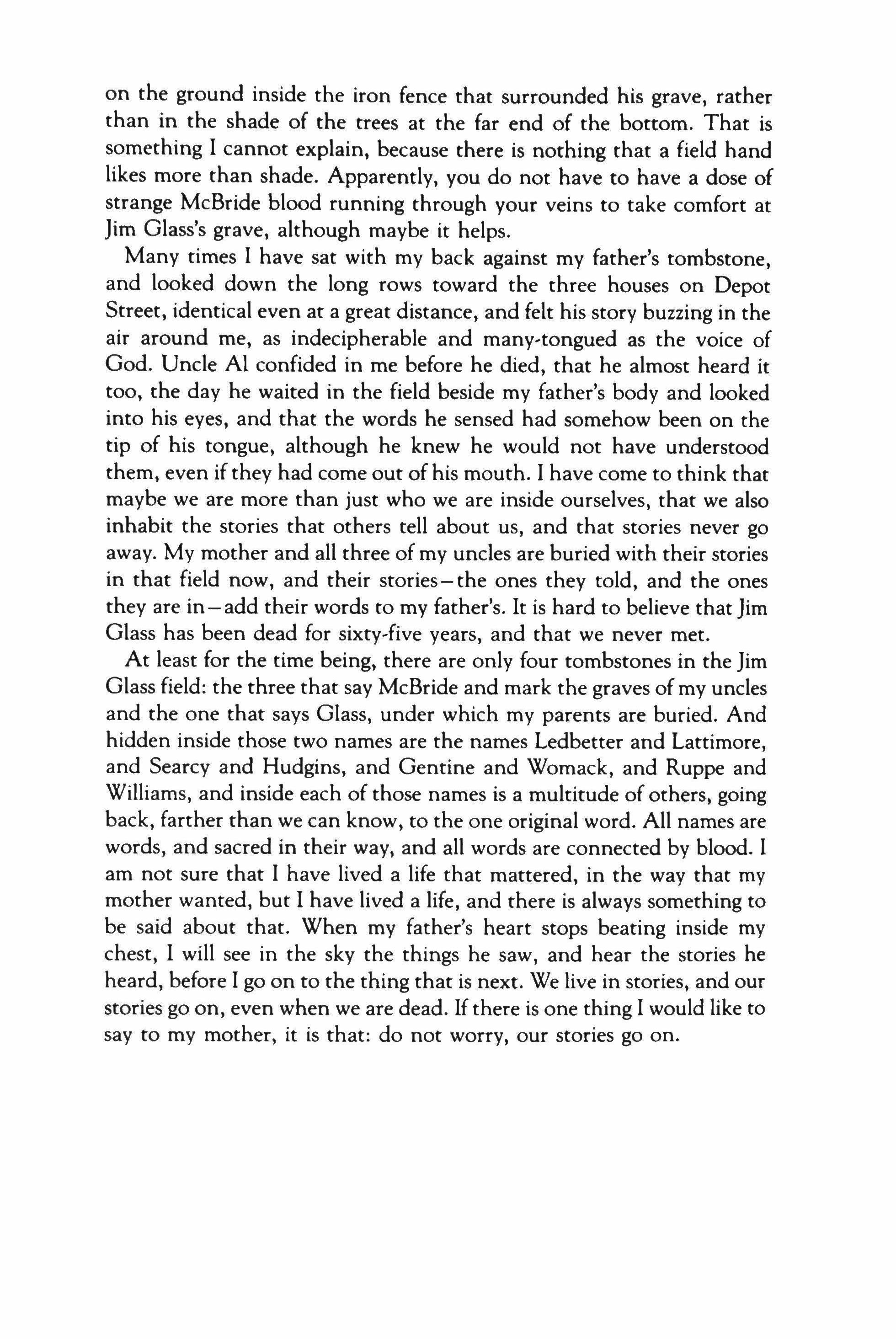
on the ground inside the iron fence that surrounded his grave, rather than in the shade of the trees at the far end of the bottom. That is something I cannot explain, because there is nothing that a field hand likes more than shade. Apparently, you do not have to have a dose of strange McBride blood running through your veins to take comfort at Jim Glass's grave, although maybe it helps.
Many times I have sat with my back against my father's tombstone, and looked down the long rows toward the three houses on Depot Street, identical even at a great distance, and felt his story buzzing in the air around me, as indecipherable and many-tongued as the voice of God. Uncle Al confided in me before he died, that he almost heard it too, the day he waited in the field beside my father's body and looked into his eyes, and that the words he sensed had somehow been on the tip of his tongue, although he knew he would not have understood them, even if they had come out of his mouth. I have come to think that maybe we are more than just who we are inside ourselves, that we also inhabit the stories that others tell about us, and that stories never go away. My mother and all three of my uncles are buried with their stories in that field now, and their stories-the ones they told, and the ones they are in - add their words to my father's. It is hard to believe that Jim Glass has been dead for sixty-five years, and that we never met.
At least for the time being, there are only four tombstones in the Jim Glass field: the three that say McBride and mark the graves of my uncles and the one that says Glass, under which my parents are buried. And hidden inside those two names are the names Ledbetter and Lattimore, and Searcy and Hudgins, and Gentine and Womack, and Ruppe and Williams, and inside each of those names is a multitude of others, going back, farther than we can know, to the one original word. All names are words, and sacred in their way, and all words are connected by blood. I am not sure that I have lived a life that mattered, in the way that my mother wanted, but I have lived a life, and there is always something to be said about that. When my father's heart stops beating inside my chest, I will see in the sky the things he saw, and hear the stories he heard, before I go on to the thing that is next. We live in stories, and our stories go on, even when we are dead. If there is one thing I would like to say to my mother, it is that: do not worry, our stories go on.
The Caller
Stephen Dixon

My wife answers and says "It's for you," and hands me the cordless and I go into the kitchen with it because she's working in the living room and shut the door and say hello and a woman says "Jack, hi, it's Ramona Bauer," and I shout "What, Ramona Bauer?-not myoid friend Ramona," and she says "That's right, and myoid friend Jack, how are you?" and I say "God, how are you, I'm fine, but how are you and what have you been doing?" and she says she's still in New Haven, different house though, and has two children, girl in college, boy graduating high school, girl has been a delight her entire life and at the very top of her class since kindergarten and is already a fantastic scientist, boy has some emotional problems but nothing that won't be solved, she and her husband are divorcing after being married close to nineteen years and together for twenty-two, and I say "Sorry to hear that, it must be a very difficult thing to go through, especially for the children," and she says "Not as much as it's been for everyone enduring the two of us living together the last five years, and if you're saying part of my son's problem is the breakup, that's true but a small part of
75
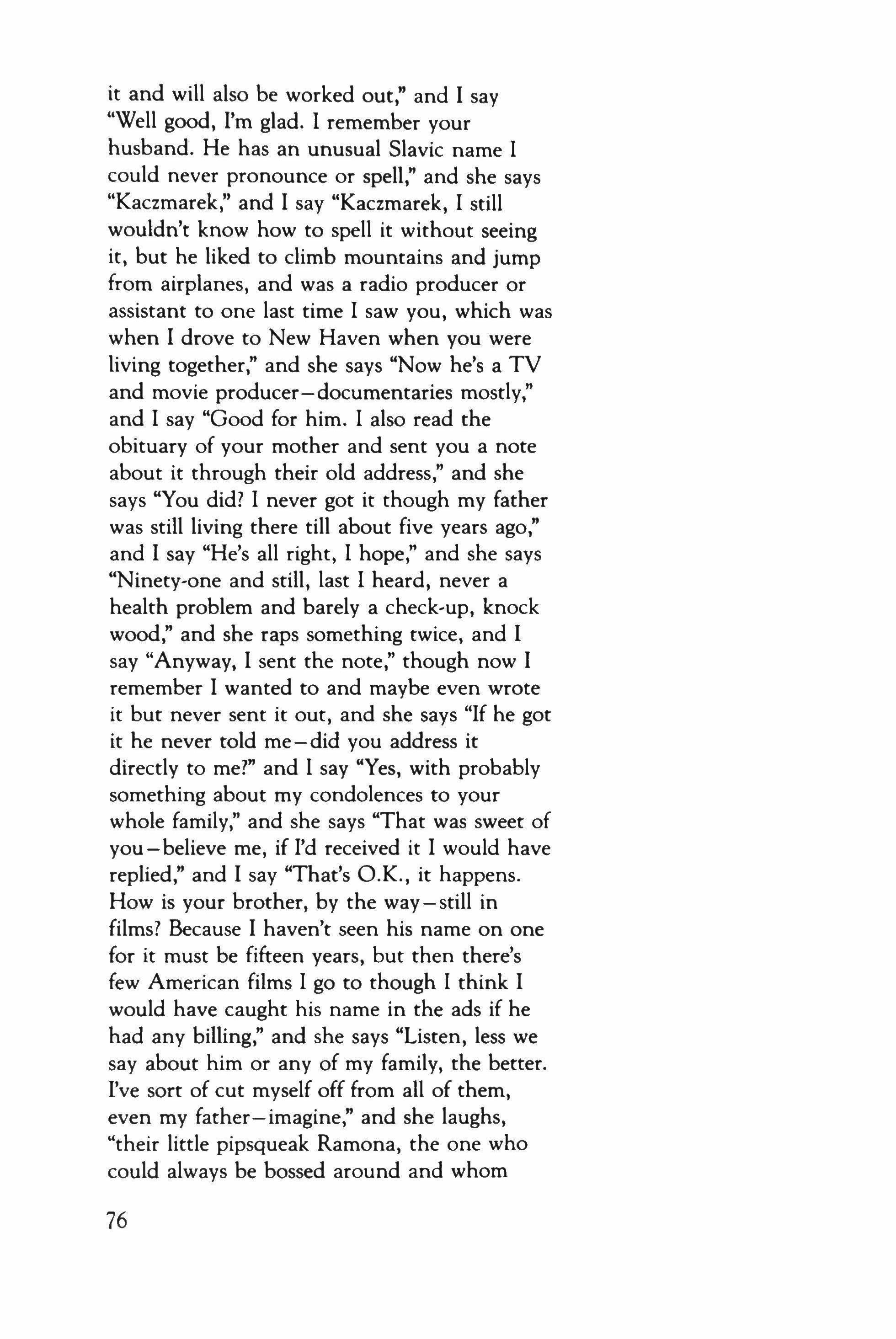
it and will also be worked out," and I say "Well good, I'm glad. I remember your husband. He has an unusual Slavic name I could never pronounce or spell," and she says "Kaczmarek," and I say "Kaczmarek, I still wouldn't know how to spell it without seeing it, but he liked to climb mountains and jump from airplanes, and was a radio producer or assistant to one last time I saw you, which was when I drove to New Haven when you were living together," and she says "Now he's a TV and movie producer-documentaries mostly," and I say "Good for him. I also read the obituary of your mother and sent you a note about it through their old address," and she says "You did? I never got it though my father was still living there till about five years ago," and I say "He's all right, I hope," and she says "Ninety-one and still, last I heard, never a health problem and barely a check-up, knock wood," and she raps something twice, and I say "Anyway, I sent the note," though now I remember I wanted to and maybe even wrote it but never sent it out, and she says "If he got it he never told me - did you address it directly to me?" and I say "Yes, with probably something about my condolences to your whole family," and she says "That was sweet of you-believe me, if I'd received it I would have replied," and I say "That's O.K., it happens. How is your brother, by the way-still in films? Because I haven't seen his name on one for it must be fifteen years, but then there's few American films I go to though I think I would have caught his name in the ads if he had any billing," and she says "Listen, less we say about him or any of my family, the better. I've sort of cut myself off from all of them, even my father-imagine," and she laughs, "their little pipsqueak Ramona, the one who could always be bossed around and whom
76
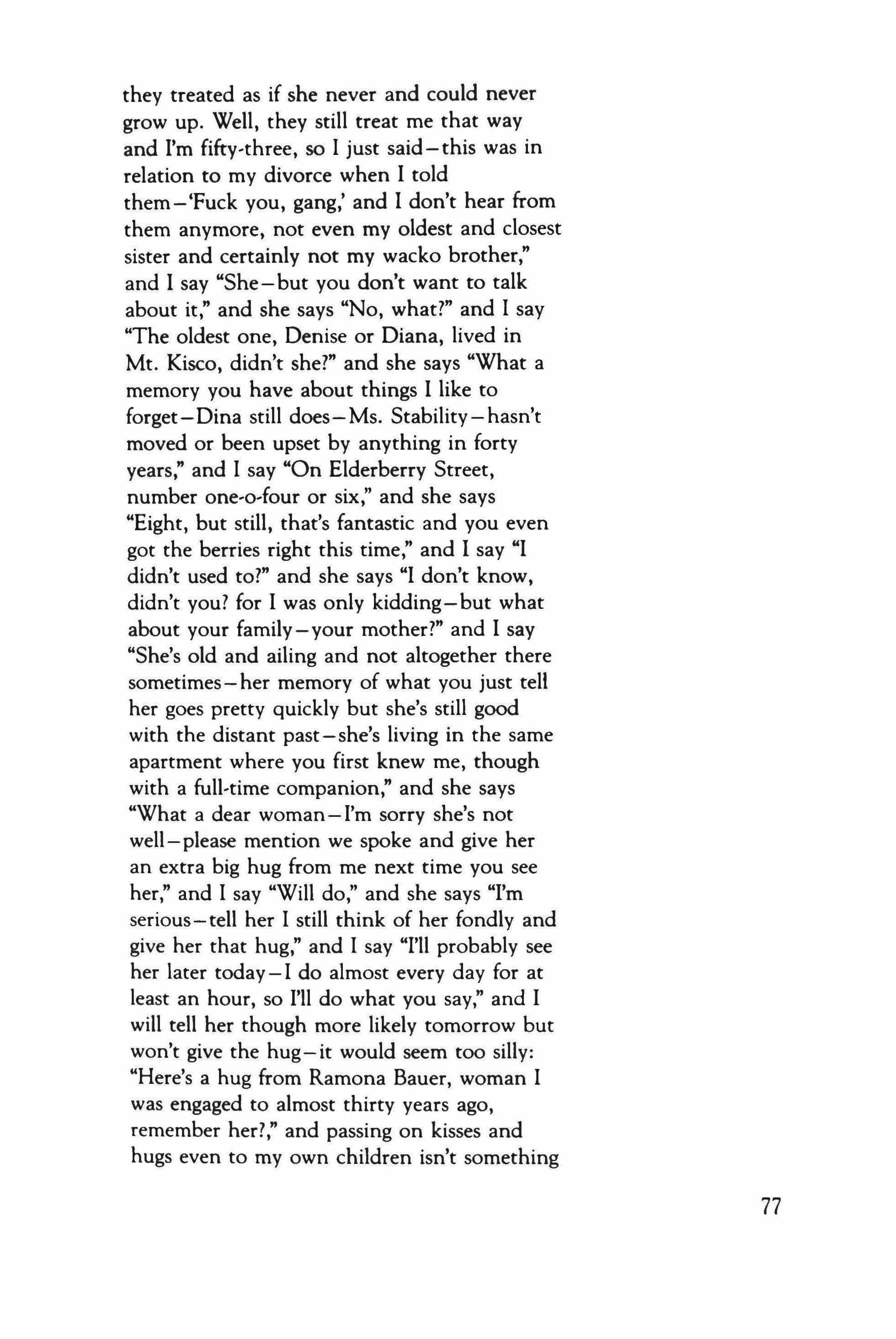
they treated as if she never and could never grow up. Well, they still treat me that way and I'm fifty-three, so I just said-this was in relation to my divorce when 1 told them - 'Fuck you, gang,' and 1 don't hear from them anymore, not even my oldest and closest sister and certainly not my wacko brother," and 1 say "She-but you don't want to talk about it," and she says "No, what?" and I say "The oldest one, Denise or Diana, lived in Mr. Kisco, didn't she?" and she says "What a memory you have about things 1 like to forget-Dina still does-Ms. Stability-hasn't moved or been upset by anything in forty years," and I say "On Elderberry Street, number one-o-four or six," and she says "Eight, but still, that's fantastic and you even got the berries right this time," and 1 say "1 didn't used to?" and she says "1 don't know, didn't you? for 1 was only kidding-but what about your family-your mother?" and 1 say "She's old and ailing and not altogether there sometimes - her memory of what you just tell her goes pretty quickly but she's still good with the distant past-she's living in the same apartment where you first knew me, though with a full-time companion," and she says "What a dear woman -I'm sorry she's not well-please mention we spoke and give her an extra big hug from me next time you see her," and I say "Will do," and she says "I'm serious-tell her I still think of her fondly and give her that hug," and I say "I'll probably see her later today - I do almost every day for at least an hour, so I'll do what you say," and 1 will tell her though more likely tomorrow but won't give the hug-it would seem too silly: "Here's a hug from Ramona Bauer, woman I was engaged to almost thirty years ago, remember her?," and passing on kisses and hugs even to my own children isn't something
77
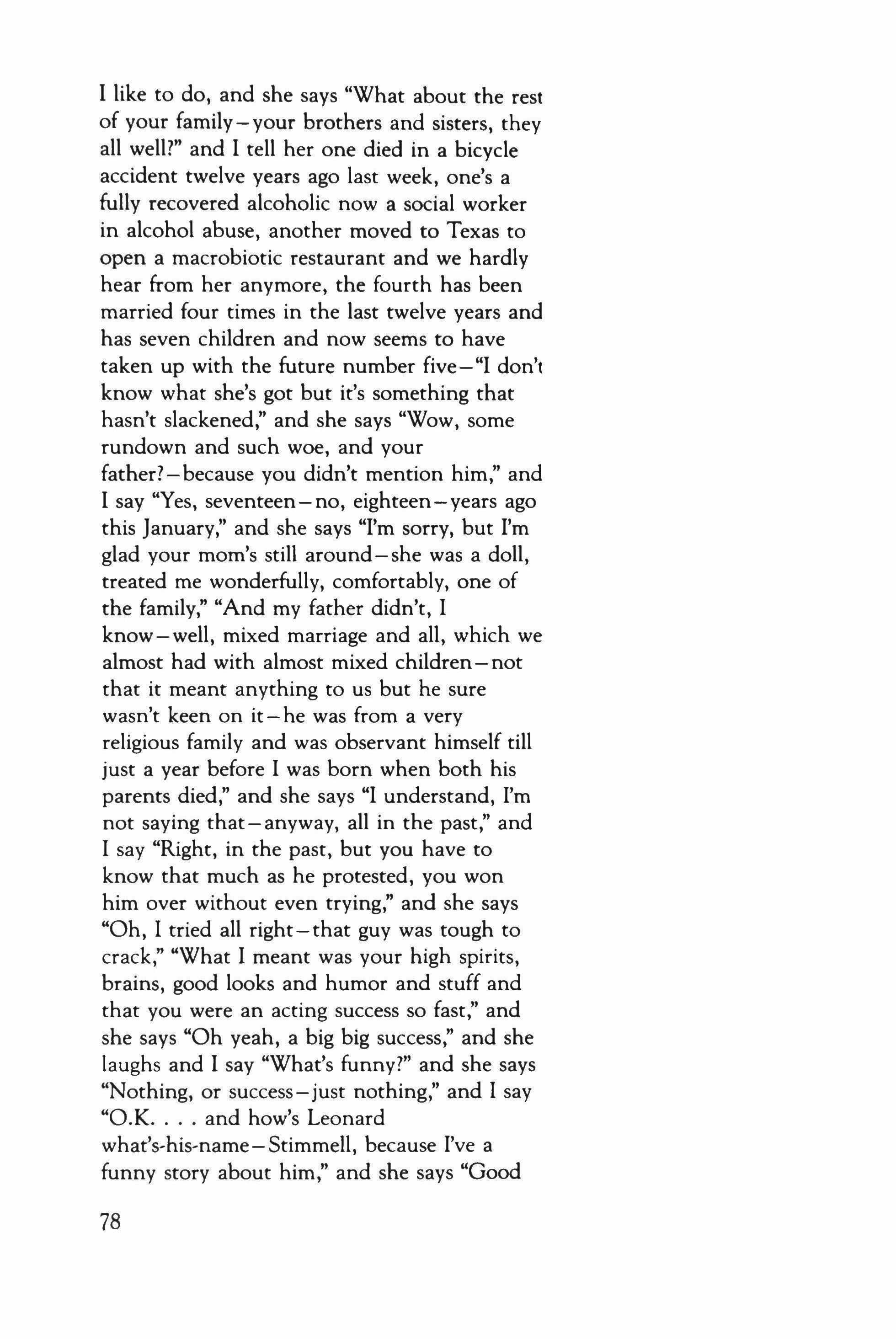
I like to do, and she says "What about the rest of your familyyour brothers and sisters, they all well?" and I tell her one died in a bicycle accident twelve years ago last week, one's a fully recovered alcoholic now a social worker in alcohol abuse, another moved to Texas to open a macrobiotic restaurant and we hardly hear from her anymore, the fourth has been married four times in the last twelve years and has seven children and now seems to have taken up with the future number five-"I don't know what she's got but it's something that hasn't slackened," and she says "Wow, some rundown and such woe, and your father? - because you didn't mention him," and I say "Yes, seventeenno, eighteenyears ago this January," and she says "I'm sorry, but I'm glad your mom's still around - she was a doll, treated me wonderfully, comfortably, one of the family," "And my father didn't, I know - well, mixed marriage and all, which we almost had with almost mixed children - not that it meant anything to us but he sure wasn't keen on it - he was from a very religious family and was observant himself till just a year before I was born when both his parents died," and she says "I understand, I'm not saying that-anyway, all in the past," and I say "Right, in the past, but you have to know that much as he protested, you won him over without even trying," and she says "Oh, I tried all right - that guy was tough to crack," "What I meant was your high spirits, brains, good looks and humor and stuff and that you were an acting success so fast," and she says "Oh yeah, a big big success," and she laughs and I say "What's funny?" and she says "Nothing, or success - just nothing," and I say "O.K and how's Leonard what's-his-name - Stimmell, because I've a funny story about him," and she says "Good
78
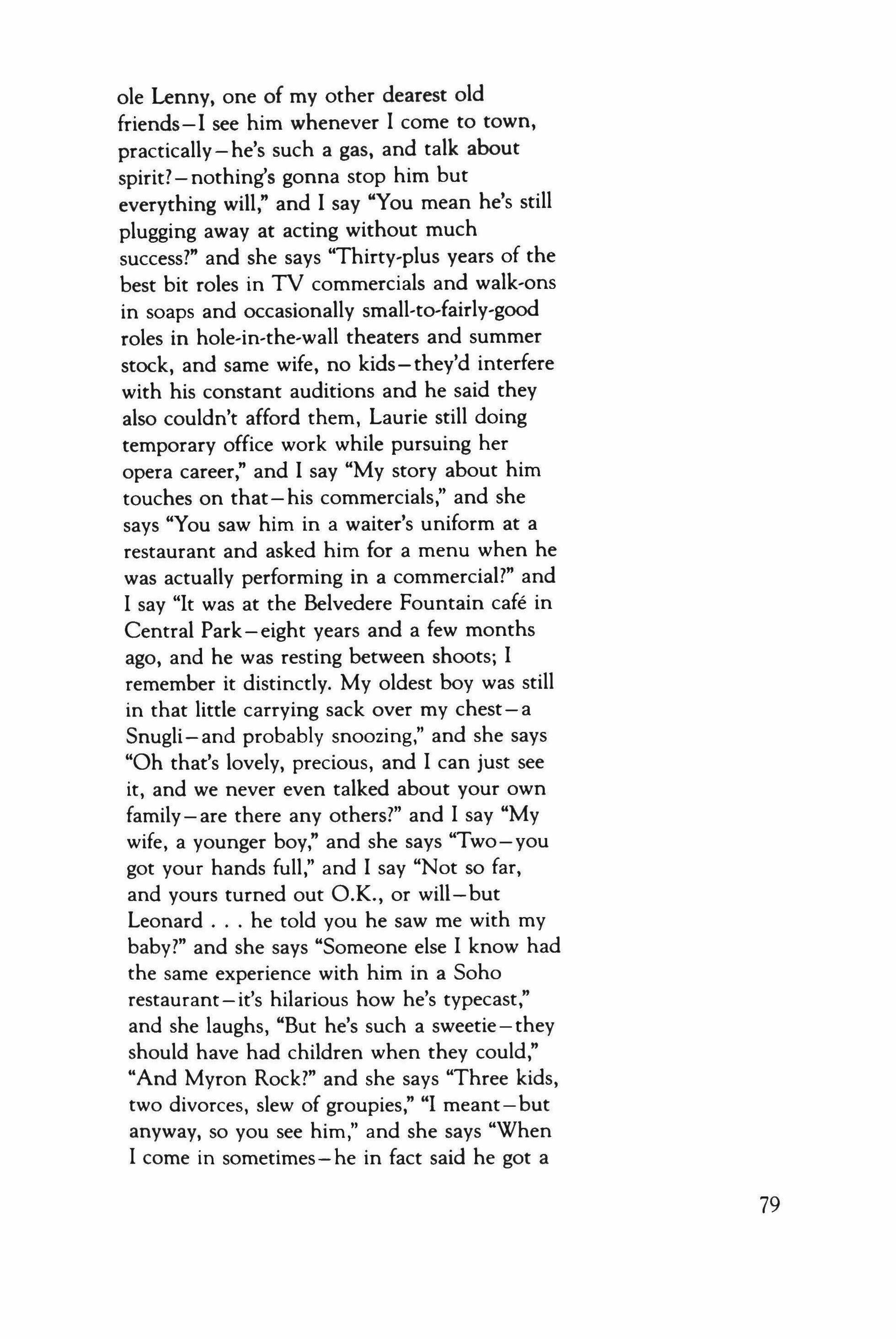
ole Lenny, one of my other dearest old friends-I see him whenever I come to town, practically - he's such a gas, and talk about spirit? - nothing's gonna stop him but everything will," and I say "You mean he's still plugging away at acting without much success?" and she says "Thirty-plus years of the best bit roles in TV commercials and walk-ens in soaps and occasionally srnall-to-fairly-good roles in hole-in-the-wall theaters and summer stock, and same wife, no kids-they'd interfere with his constant auditions and he said they also couldn't afford them, Laurie still doing temporary office work while pursuing her opera career," and I say "My story about him touches on that-his commercials," and she says "You saw him in a waiter's uniform at a restaurant and asked him for a menu when he was actually performing in a commercial?" and I say "It was at the Belvedere Fountain cafe in Central Park - eight years and a few months ago, and he was resting between shoots; I remember it distinctly. My oldest boy was still in that little carrying sack over my chest - a Snugli-and probably snoozing," and she says "Oh that's lovely, precious, and I can just see it, and we never even talked about your own family-are there any others?" and I say "My wife, a younger boy," and she says "Two-you got your hands full," and I say "Not so far, and yours turned out O.K., or will-but Leonard he told you he saw me with my baby?" and she says "Someone else I know had the same experience with him in a Soho restaurant-it's hilarious how he's typecast," and she laughs, "But he's such a sweetie - they should have had children when they could," "And Myron Rock?" and she says "Three kids, two divorces, slew of groupies," "I meant - but anyway, so you see him," and she says "When I come in sometimes-he in fact said he got a
79
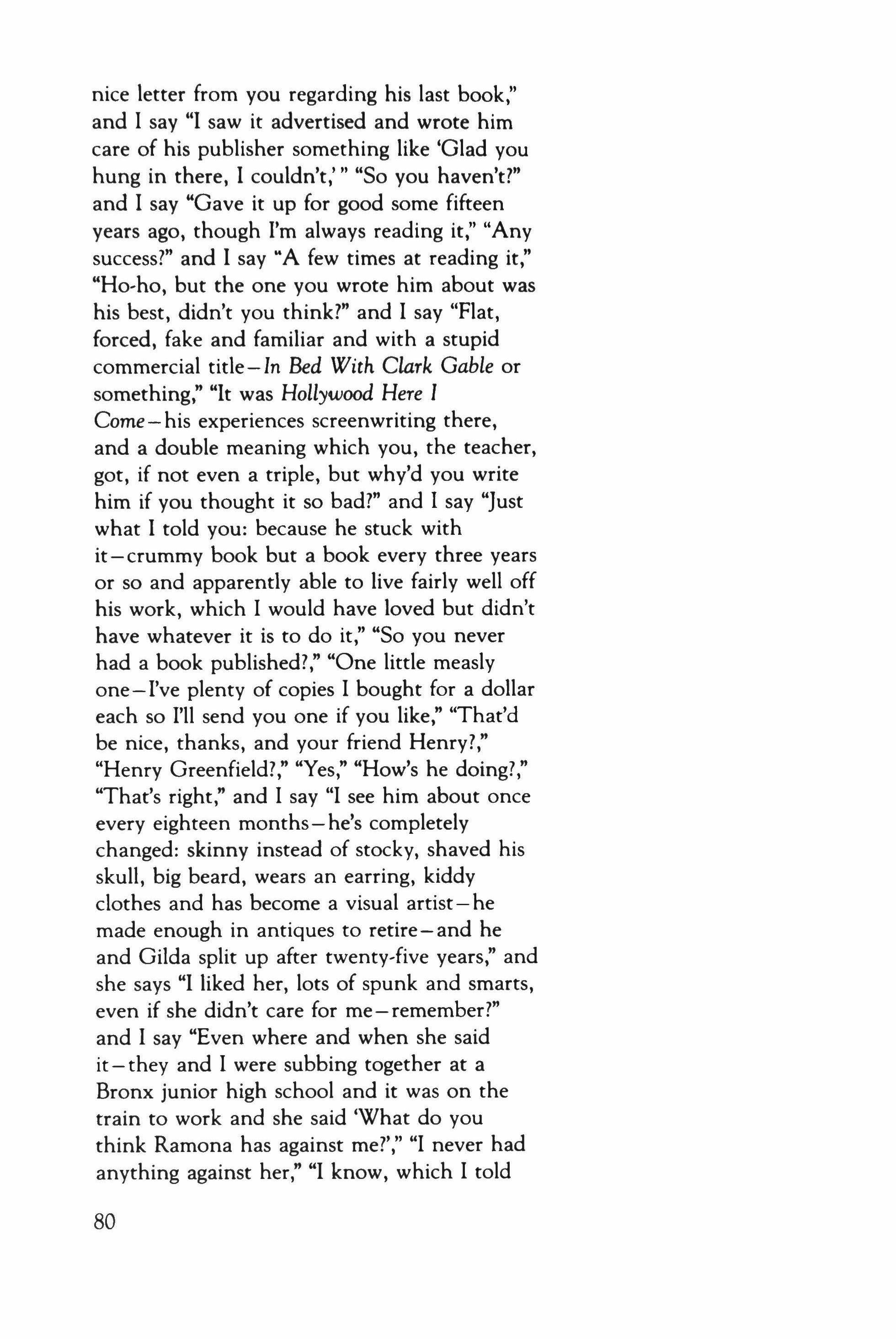
nice letter from you regarding his last book," and I say "1 saw it advertised and wrote him care of his publisher something like 'Glad you hung in there, 1 couldn't,' "So you haven't?" and 1 say "Gave it up for good some fifteen years ago, though I'm always reading it," "Any success?" and 1 say "A few times at reading it," "Ho-ho, but the one you wrote him about was his best, didn't you think?" and I say "Flat, forced, fake and familiar and with a stupid commercial title-In Bed With Clark Gable or something," "It was Hollywood Here I Come - his experiences screenwriting there, and a double meaning which you, the teacher, got, if not even a triple, but why'd you write him if you thought it so bad?" and I say "Just what I told you: because he stuck with itcrummy book but a book every three years or so and apparently able to live fairly well off his work, which I would have loved but didn't have whatever it is to do it," "So you never had a book published?," "One little measly one-I've plenty of copies I bought for a dollar each so I'll send you one if you like," "That'd be nice, thanks, and your friend Henry?," "Henry Greenfield?," "Yes," "How's he doing?," "That's right," and I say "I see him about once every eighteen months-he's completely changed: skinny instead of stocky, shaved his skull, big beard, wears an earring, kiddy clothes and has become a visual artist - he made enough in antiques to retire-and he and Gilda split up after twentv-five years," and she says "I liked her, lots of spunk and smarts, even if she didn't care for me - remember?" and I say "Even where and when she said it - they and I were subbing together at a Bronx junior high school and it was on the train to work and she said 'What do you think Ramona has against me?'," "I never had anything against her," "I know, which I told 80
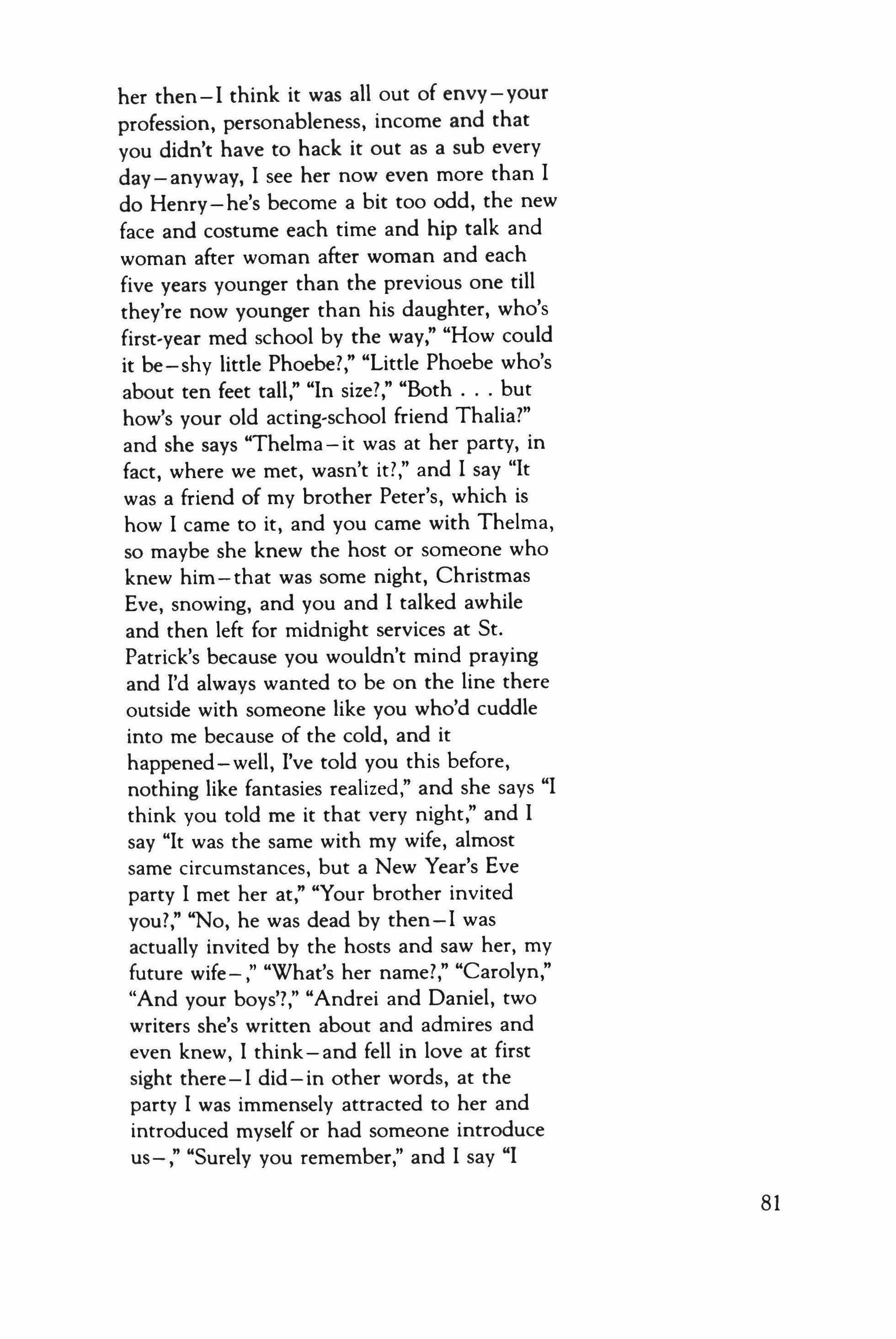
her then - I think it was all out of envyyour profession, personableness, income and that you didn't have to hack it out as a sub every day-anyway, I see her now even more than I do Henry - he's become a bit too odd, the new face and costume each time and hip talk and woman after woman after woman and each five years younger than the previous one till they're now younger than his daughter, who's first-year med school by the way," "How could it be-shy little Phoebe?," "Little Phoebe who's about ten feet tall," "In size?," "Both but how's your old acting-school friend Thalia?" and she says "Thelma - it was at her party, in fact, where we met, wasn't it?," and I say "It was a friend of my brother Peter's, which is how I came to it, and you came with Thelma, so maybe she knew the host or someone who knew him-that was some night, Christmas Eve, snowing, and you and I talked awhile and then left for midnight services at St. Patrick's because you wouldn't mind praying and I'd always wanted to be on the line there outside with someone like you who'd cuddle into me because of the cold, and it happened - well, I've told you this before, nothing like fantasies realized," and she says "I think you told me it that very night," and I say "It was the same with my wife, almost same circumstances, but a New Year's Eve party I met her at," "Your brother invited you?," "No, he was dead by then-I was actually invited by the hosts and saw her, my future wife-," "What's her name?," "Carolyn," "And your boys'?," "Andrei and Daniel, two writers she's written about and admires and even knew, I think - and fell in love at first sight there-I did-in other words, at the party 1 was immensely attracted to her and introduced myself or had someone introduce us-," "Surely you remember," and I say "I
81
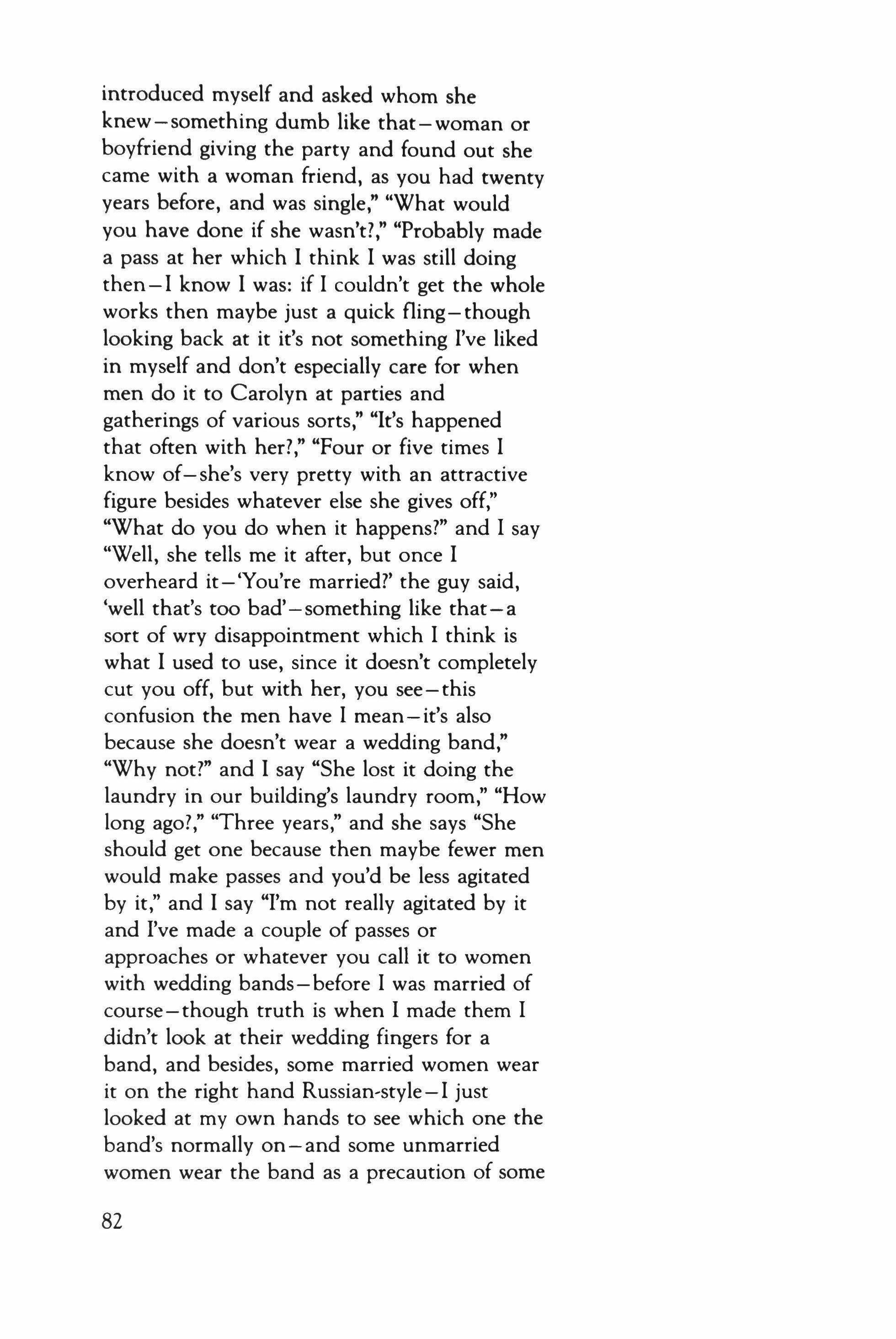
introduced myself and asked whom she knew - something dumb like that - woman or boyfriend giving the party and found out she came with a woman friend, as you had twenty years before, and was single," "What would you have done if she wasn't?," "Probably made a pass at her which I think I was still doing then - I know I was: if I couldn't get the whole works then maybe just a quick fling-though looking back at it it's not something I've liked in myself and don't especially care for when men do it to Carolyn at parties and gatherings of various sorts," "It's happened that often with her?," "Four or five times I know of-she's very pretty with an attractive figure besides whatever else she gives off," "What do you do when it happens?" and I say "Well, she tells me it after, but once I overheard it - 'You're married?' the guy said, 'well that's too bad'-something like that-a sort of wry disappointment which I think is what I used to use, since it doesn't completely cut you off, but with her, you see-this confusion the men have I mean - it's also because she doesn't wear a wedding band," "Why not?" and I say "She lost it doing the laundry in our building's laundry room," "How long ago?," "Three years," and she says "She should get one because then maybe fewer men would make passes and you'd be less agitated by it," and I say "I'm not really agitated by it and I've made a couple of passes or approaches or whatever you call it to women with wedding bands - before I was married of course-though truth is when I made them I didn't look at their wedding fingers for a band, and besides, some married women wear it on the right hand Russian-srvle=l just looked at my own hands to see which one the band's normally on - and some unmarried women wear the band as a precaution of some
82
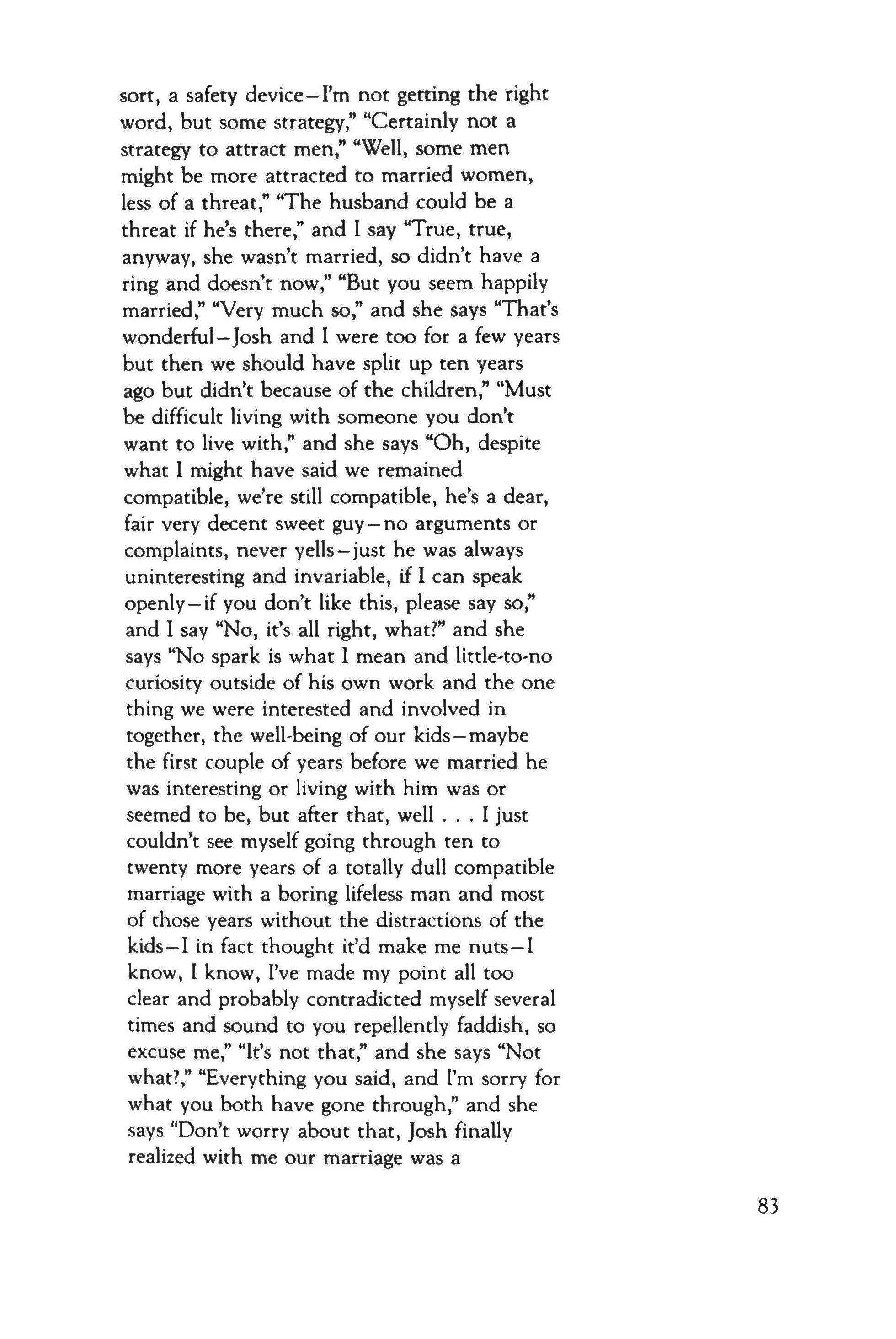
sort, a safety device-I'm not getting the right word, but some strategy," "Certainly not a strategy to attract men," "Well, some men might be more attracted to married women, less of a threat," "The husband could be a threat if he's there," and I say "True, true, anyway, she wasn't married, so didn't have a ring and doesn't now," "But you seem happily married," "Very much so," and she says "That's wonderful-Josh and I were too for a few years but then we should have split up ten years ago but didn't because of the children," "Must be difficult living with someone you don't want to live with," and she says "Oh, despite what I might have said we remained compatible, we're still compatible, he's a dear, fair very decent sweet guy - no arguments or complaints, never yells-just he was always uninteresting and invariable, if I can speak openly - if you don't like this, please say so," and I say "No, it's all right, what?" and she says "No spark is what I mean and little-to-no curiosity outside of his own work and the one thing we were interested and involved in together, the well-being of our kids-maybe the first couple of years before we married he was interesting or living with him was or seemed to be, but after that, well I just couldn't see myself going through ten to twenty more years of a totally dull compatible marriage with a boring lifeless man and most of those years without the distractions of the kids-l in fact thought it'd make me nuts-I know, I know, I've made my point all too clear and probably contradicted myself several times and sound to you repellently faddish, so excuse me," "It's not that," and she says "Not what?," "Everything you said, and I'm sorry for what you both have gone through," and she says "Don't worry about that, Josh finally realized with me our marriage was a
83
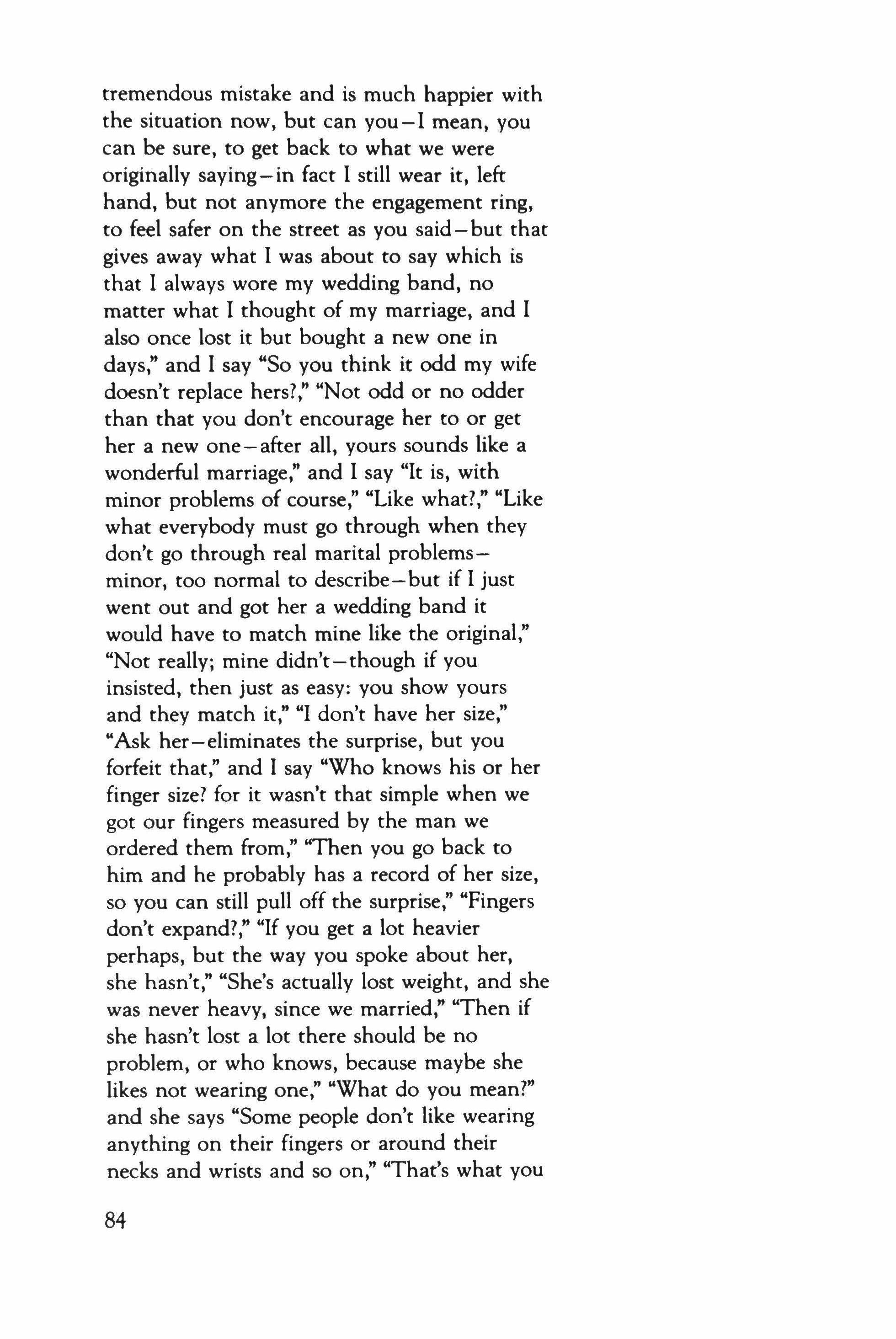
tremendous mistake and is much happier with the situation now, but can you -I mean, you can be sure, to get back to what we were originally saying-in fact 1 still wear it, left hand, but not anymore the engagement ring, to feel safer on the street as you said - but that gives away what 1 was about to say which is that 1 always wore my wedding band, no matter what 1 thought of my marriage, and 1 also once lost it but bought a new one in days," and 1 say "So you think it odd my wife doesn't replace hers?," "Not odd or no odder than that you don't encourage her to or get her a new one-after all, yours sounds like a wonderful marriage," and I say "It is, with minor problems of course," "Like what?," "Like what everybody must go through when they don't go through real marital problemsminor, too normal to describe-but if I just went out and got her a wedding band it would have to match mine like the original," "Not really; mine didn't - though if you insisted, then just as easy: you show yours and they match it," "I don't have her size," "Ask her-eliminates the surprise, but you forfeit that," and I say "Who knows his or her finger size? for it wasn't that simple when we got our fingers measured by the man we ordered them from," "Then you go back to him and he probably has a record of her size, so you can still pull off the surprise," "Fingers don't expand?," "If you get a lot heavier perhaps, but the way you spoke about her, she hasn't," "She's actually lost weight, and she was never heavy, since we married," "Then if she hasn't lost a lot there should be no problem, or who knows, because maybe she likes not wearing one," "What do you mean?" and she says "Some people don't like wearing anything on their fingers or around their necks and wrists and so on," "That's what you
84
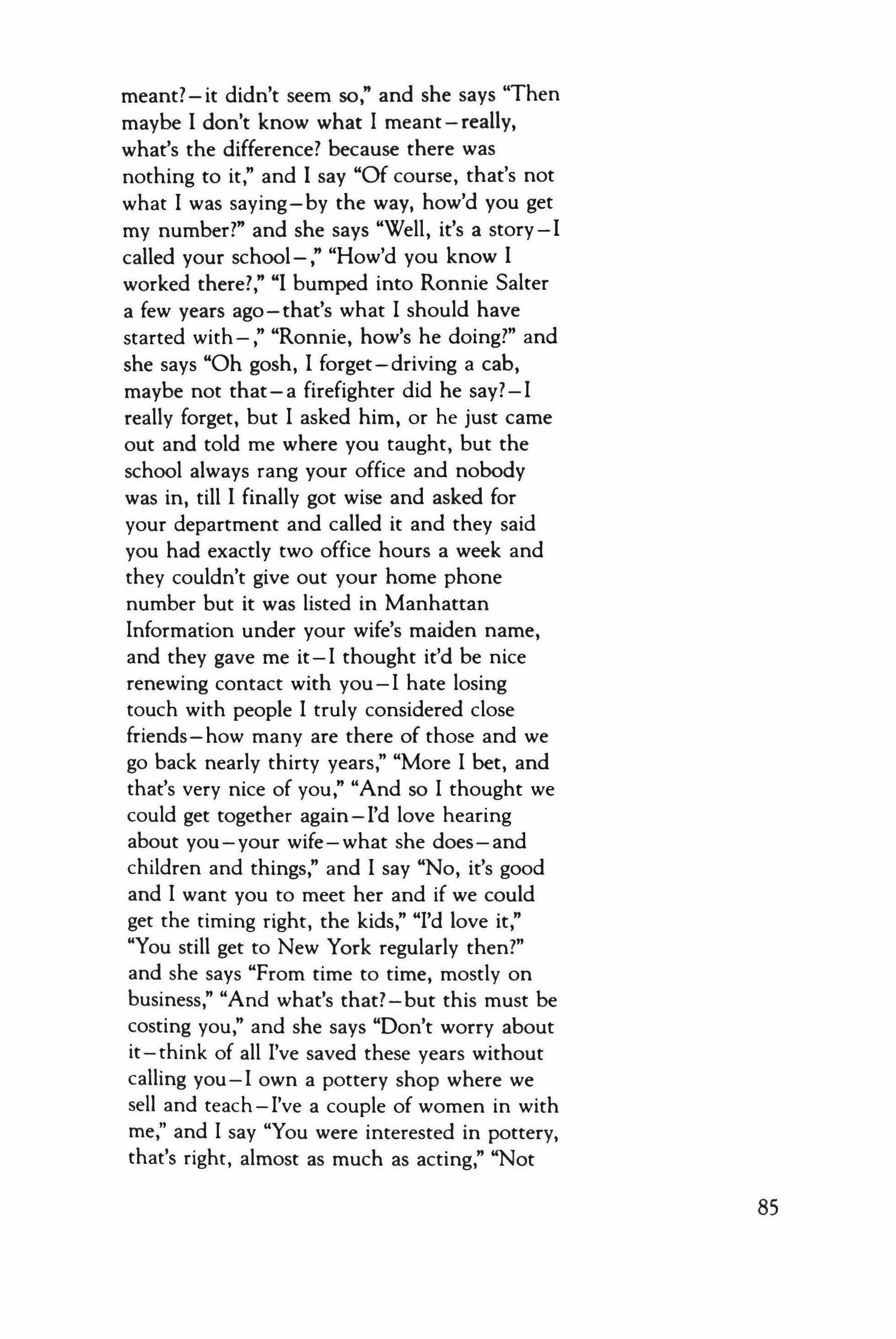
meant? - it didn't seem so," and she says "Then maybe I don't know what I meant-really, what's the difference? because there was nothing to it," and I say "Of course, that's not what I was saying-by the way, how'd you get my number?" and she says "Well, it's a story-I called your school-," "How'd you know I worked there?," "I bumped into Ronnie Salter a few years ago-that's what I should have started with-," "Ronnie, how's he doing?" and she says "Oh gosh, I forget - driving a cab, maybe not that-a firefighter did he say?-I really forget, but I asked him, or he just came out and told me where you taught, but the school always rang your office and nobody was in, till I finally got wise and asked for your department and called it and they said you had exactly two office hours a week and they couldn't give out your home phone number but it was listed in Manhattan Information under your wife's maiden name, and they gave me it-I thought it'd be nice renewing contact with you -I hate losing touch with people I truly considered close friends- how many are there of those and we go back nearly thirty years," "More I bet, and that's very nice of you," "And so I thought we could get together again-I'd love hearing about you-your wife-what she does-and children and things," and I say "No, it's good and I want you to meet her and if we could get the timing right, the kids," "I'd love it," "You still get to New York regularly then?" and she says "From time to time, mostly on business," "And what's that? - but this must be costing you," and she says "Don't worry about it - think of all I've saved these years without calling you -I own a pottery shop where we sell and teach-I've a couple of women in with me," and I say "You were interested in pottery, that's right, almost as much as acting," "Not
85
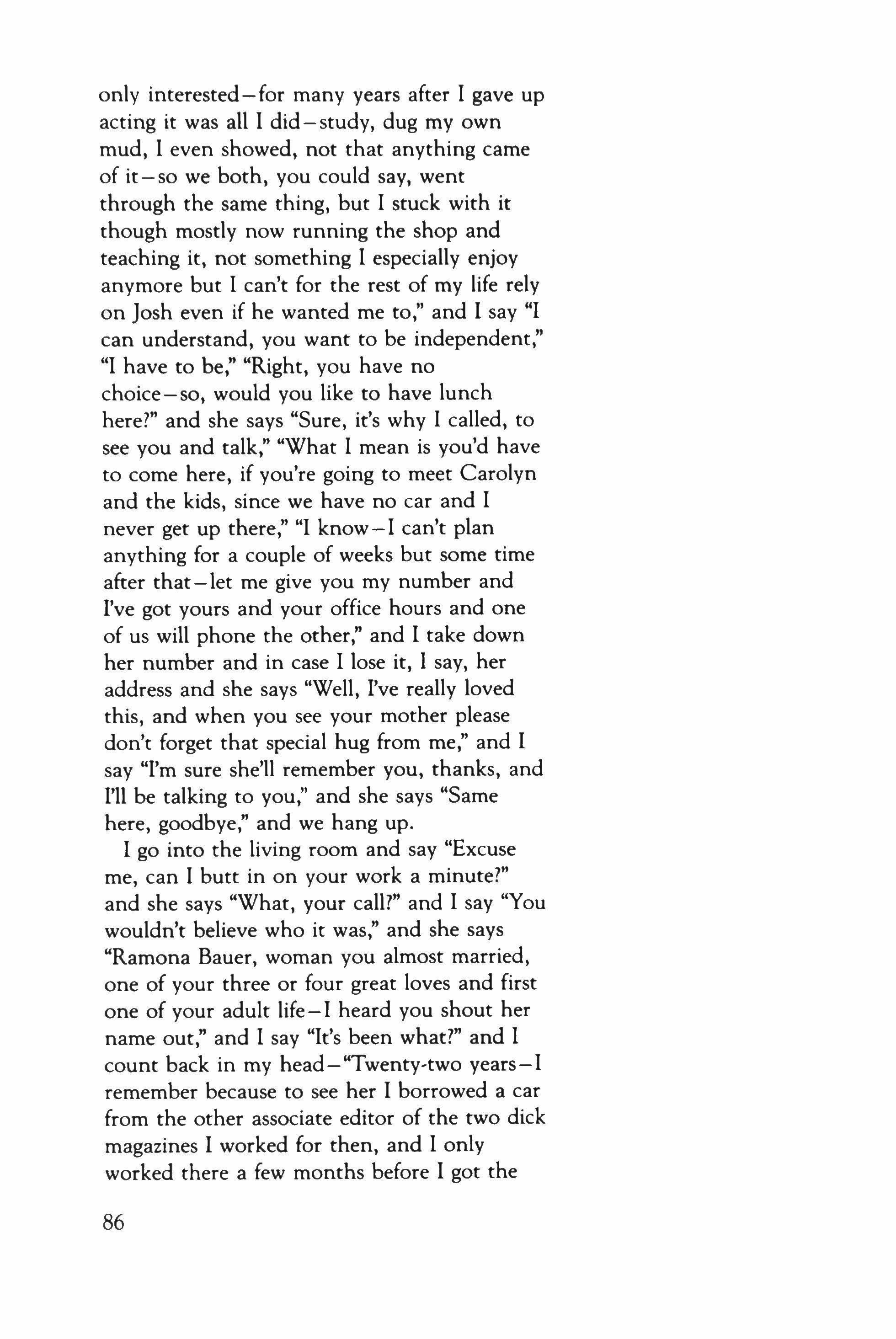
only interested-for many years after I gave up acting it was all I did-study, dug my own mud, I even showed, not that anything came of it-so we both, you could say, went through the same thing, but I stuck with it though mostly now running the shop and teaching it, not something I especially enjoy anymore but I can't for the rest of my life rely on Josh even if he wanted me to," and I say "I can understand, you want to be independent," "I have to be," "Right, you have no choiceso, would you like to have lunch here?" and she says "Sure, it's why I called, to see you and talk," "What I mean is you'd have to come here, if you're going to meet Carolyn and the kids, since we have no car and I never get up there," "I know-I can't plan anything for a couple of weeks but some time after that-let me give you my number and I've got yours and your office hours and one of us will phone the other," and I take down her number and in case I lose it, I say, her address and she says "Well, I've really loved this, and when you see your mother please don't forget that special hug from me," and I say "I'm sure she'll remember you, thanks, and I'll be talking to you," and she says "Same here, goodbye," and we hang up.
I go into the living room and say "Excuse me, can I butt in on your work a minute?" and she says "What, your call?" and I say "You wouldn't believe who it was," and she says "Ramona Bauer, woman you almost married, one of your three or four great loves and first one of your adult life-I heard you shout her name out," and I say "It's been what?" and I count back in my head-"Twenty-two years-l remember because to see her I borrowed a car from the other associate editor of the two dick magazines I worked for then, and I only worked there a few months before I got the
86
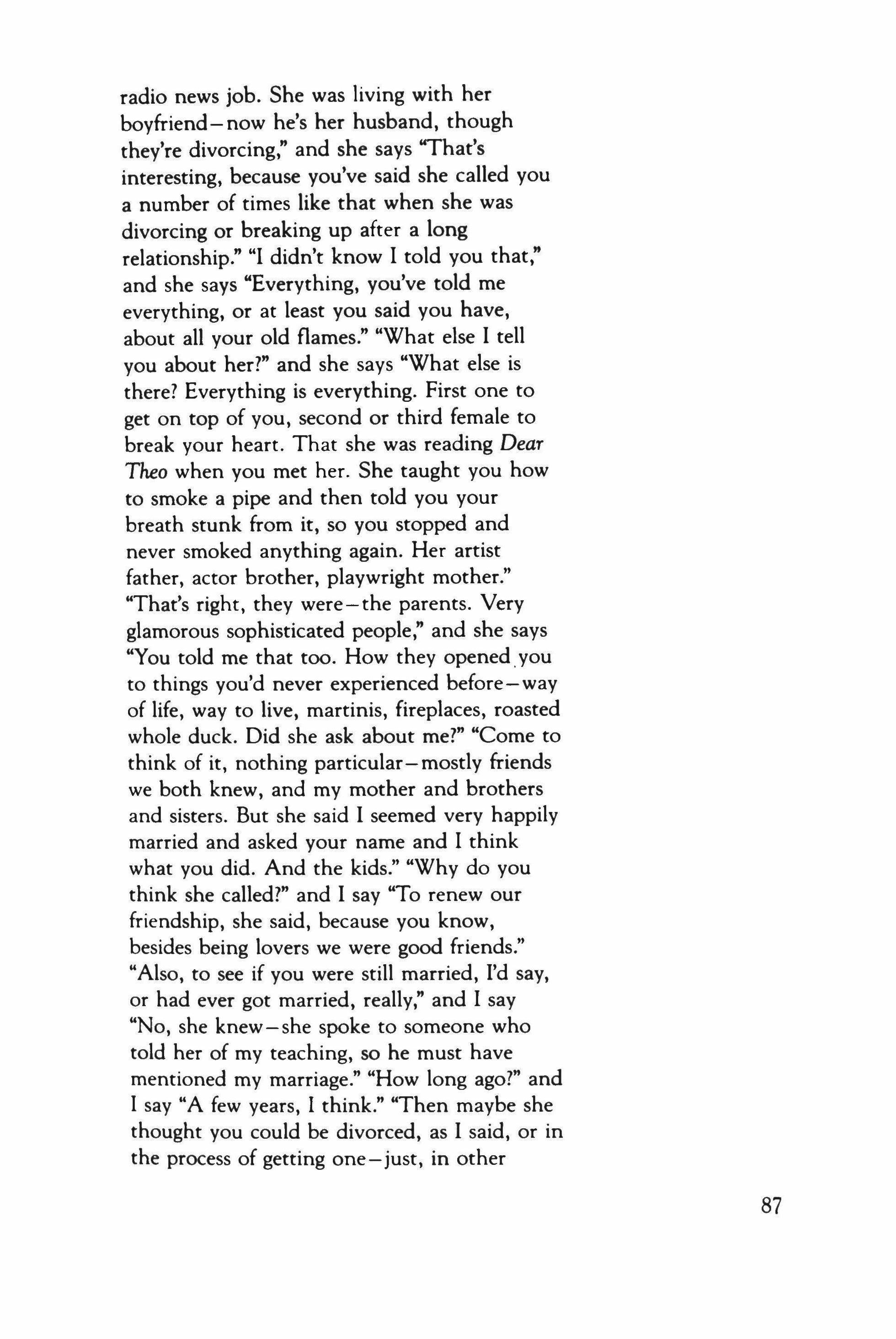
radio news job. She was living with her boyfriend-now he's her husband, though they're divorcing," and she says "That's interesting, because you've said she called you a number of times like that when she was divorcing or breaking up after a long relationship." "1 didn't know 1 told you that," and she says "Everything, you've told me everything, or at least you said you have, about all your old flames." "What else I tell you about her?" and she says "What else is there? Everything is everything. First one to get on top of you, second or third female to break your heart. That she was reading Dear Theo when you met her. She taught you how to smoke a pipe and then told you your breath stunk from it, so you stopped and never smoked anything again. Her artist father, actor brother, playwright mother."
"That's right, they were-the parents. Very glamorous sophisticated people," and she says "You told me that too. How they opened. you to things you'd never experienced before-way of life, way to live, martinis, fireplaces, roasted whole duck. Did she ask about me?" "Come to think of it, nothing particular-mostly friends we both knew, and my mother and brothers and sisters. But she said I seemed very happily married and asked your name and I think what you did. And the kids." "Why do you think she called?" and 1 say "To renew our friendship, she said, because you know, besides being lovers we were good friends."
"Also, to see if you were still married, I'd say, or had ever got married, really," and I say "No, she knew-she spoke to someone who told her of my teaching, so he must have mentioned my marriage." "How long ago?" and I say"A few years, I think." "Then maybe she thought you could be divorced, as 1 said, or in the process of getting one-just, in other
87
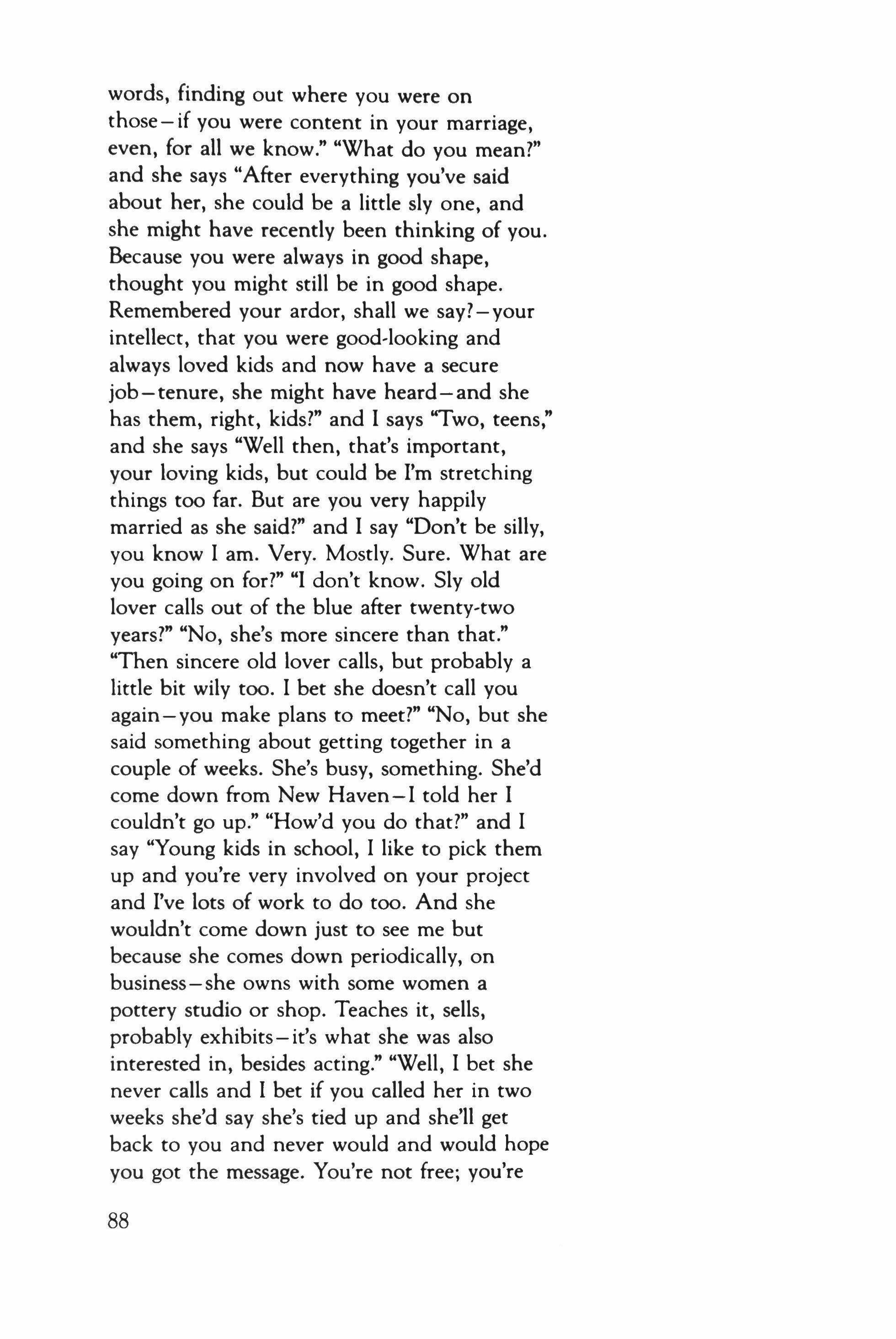
words, finding out where you were on those-if you were content in your marriage, even, for all we know." "What do you mean?" and she says "After everything you've said about her, she could be a little sly one, and she might have recently been thinking of you. Because you were always in good shape, thought you might still be in good shape. Remembered your ardor, shall we say?-your intellect, that you were good-looking and always loved kids and now have a secure job-tenure, she might have heard-and she has them, right, kids?" and 1 says "Two, teens," and she says "Well then, that's important, your loving kids, but could be I'm stretching things too far. But are you very happily married as she said?" and 1 say "Don't be silly, you know 1 am. Very. Mostly. Sure. What are you going on for?" "I don't know. Sly old lover calls out of the blue after twenty-two years?" "No, she's more sincere than that." "Then sincere old lover calls, but probably a little bit wily too. 1 bet she doesn't call you againyou make plans to meet?" "No, but she said something about getting together in a couple of weeks. She's busy, something. She'd come down from New Haven-I told her 1 couldn't go up." "How'd you do that?" and 1 say "Young kids in school, 1 like to pick them up and you're very involved on your project and I've lots of work to do too. And she wouldn't come down just to see me but because she comes down periodically, on business - she owns with some women a pottery studio or shop. Teaches it, sells, probably exhibits-it's what she was also interested in, besides acting." "Well, 1 bet she never calls and 1 bet if you called her in two weeks she'd say she's tied up and she'll get back to you and never would and would hope you got the message. You're not free; you're
88
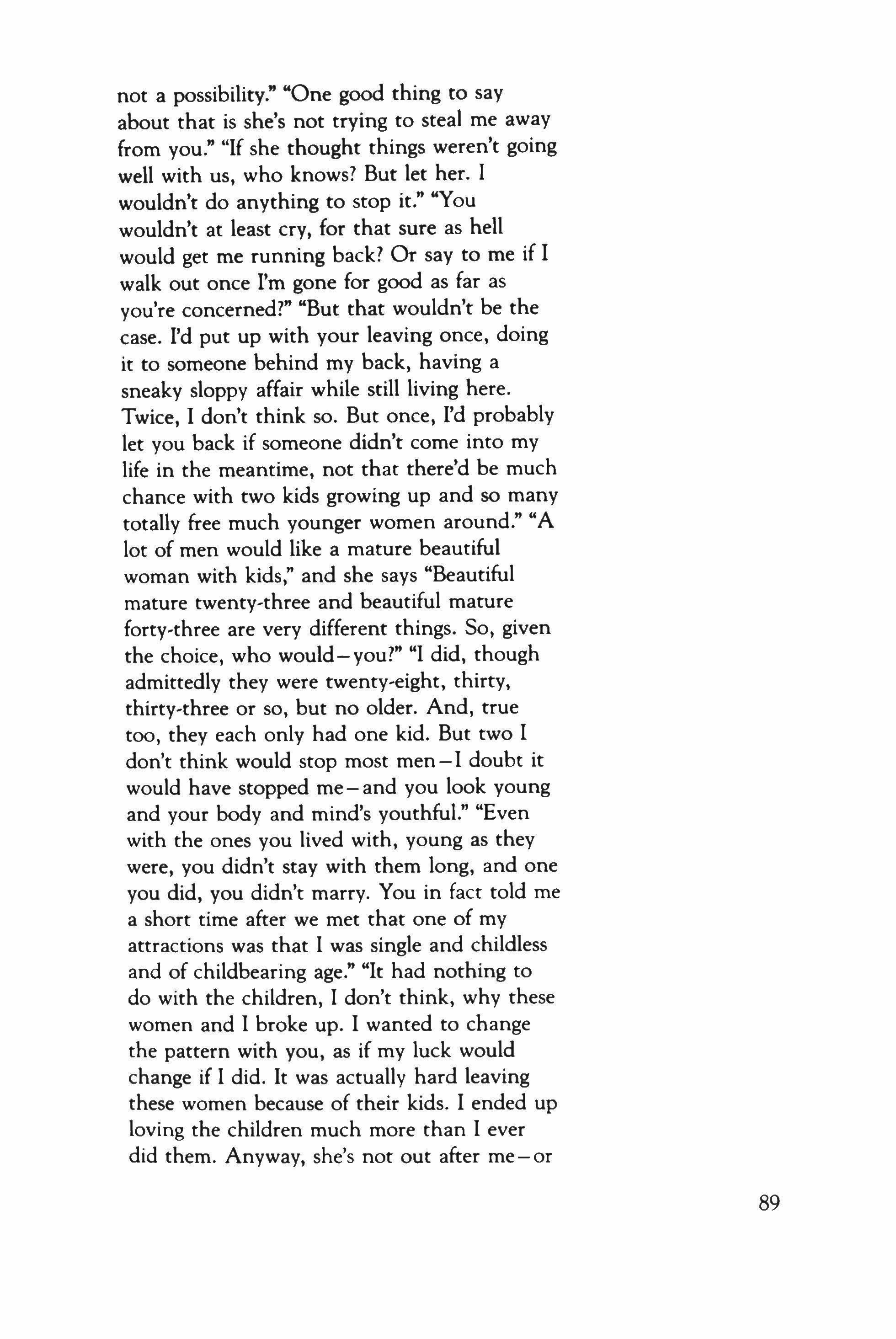
not a possibility." "One good thing to say about that is she's not trying to steal me away from you." "If she thought things weren't going well with us, who knows? But let her. I wouldn't do anything to stop it." "You wouldn't at least cry, for that sure as hell would get me running back? Or say to me if I walk out once I'm gone for good as far as you're concerned?" "But that wouldn't be the case. I'd put up with your leaving once, doing it to someone behind my back, having a sneaky sloppy affair while still living here. Twice, I don't think so. But once, I'd probably let you back if someone didn't come into my life in the meantime, not that there'd be much chance with two kids growing up and so many totally free much younger women around." "A lot of men would like a mature beautiful woman with kids," and she says "Beautiful mature twenty-three and beautiful mature forty-three are very different things. So, given the choice, who would-you?" "I did, though admittedly they were twenty-eight, thirty, thirty-three or so, but no older. And, true too, they each only had one kid. But two I don't think would stop most men -I doubt it would have stopped me - and you look young and your body and mind's youthful." "Even with the ones you lived with, young as they were, you didn't stay with them long, and one you did, you didn't marry. You in fact told me a short time after we met that one of my attractions was that I was single and childless and of childbearing age." "It had nothing to do with the children, I don't think, why these women and I broke up. I wanted to change the pattern with you, as if my luck would change if I did. It was actually hard leaving these women because of their kids. I ended up loving the children much more than I ever did them. Anyway, she's not out after me-or
89
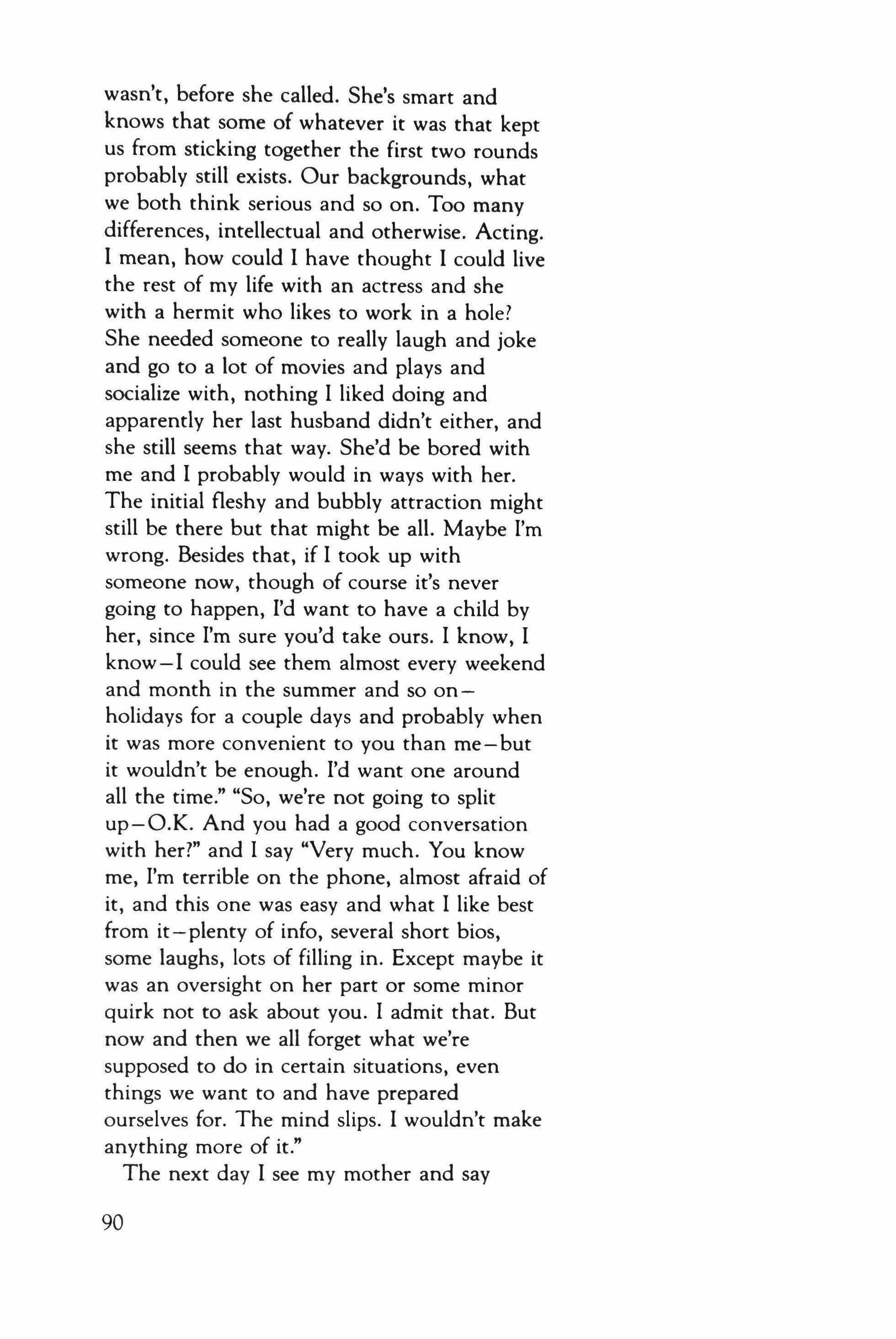
wasn't, before she called. She's smart and knows that some of whatever it was that kept us from sticking together the first two rounds probably still exists. Our backgrounds, what we both think serious and so on. Too many differences, intellectual and otherwise. Acting. 1 mean, how could 1 have thought 1 could live the rest of my life with an actress and she with a hermit who likes to work in a hole? She needed someone to really laugh and joke and go to a lot of movies and plays and socialize with, nothing 1 liked doing and apparently her last husband didn't either, and she still seems that way. She'd be bored with me and 1 probably would in ways with her. The initial fleshy and bubbly attraction might still be there but that might be all. Maybe I'm wrong. Besides that, if 1 took up with someone now, though of course it's never going to happen, I'd want to have a child by her, since I'm sure you'd take ours. 1 know, 1 know -I could see them almost every weekend and month in the summer and so onholidays for a couple days and probably when it was more convenient to you than me-but it wouldn't be enough. I'd want one around all the time." "So, we're not going to split up-O.K. And you had a good conversation with her?" and 1 say "Very much. You know me, I'm terrible on the phone, almost afraid of it, and this one was easy and what 1 like best from it-plenty of info, several short bios, some laughs, lots of filling in. Except maybe it was an oversight on her part or some minor quirk not to ask about you. 1 admit that. But now and then we all forget what we're supposed to do in certain situations, even things we want to and have prepared ourselves for. The mind slips. I wouldn't make anything more of it."
The next day 1 see my mother and say
90
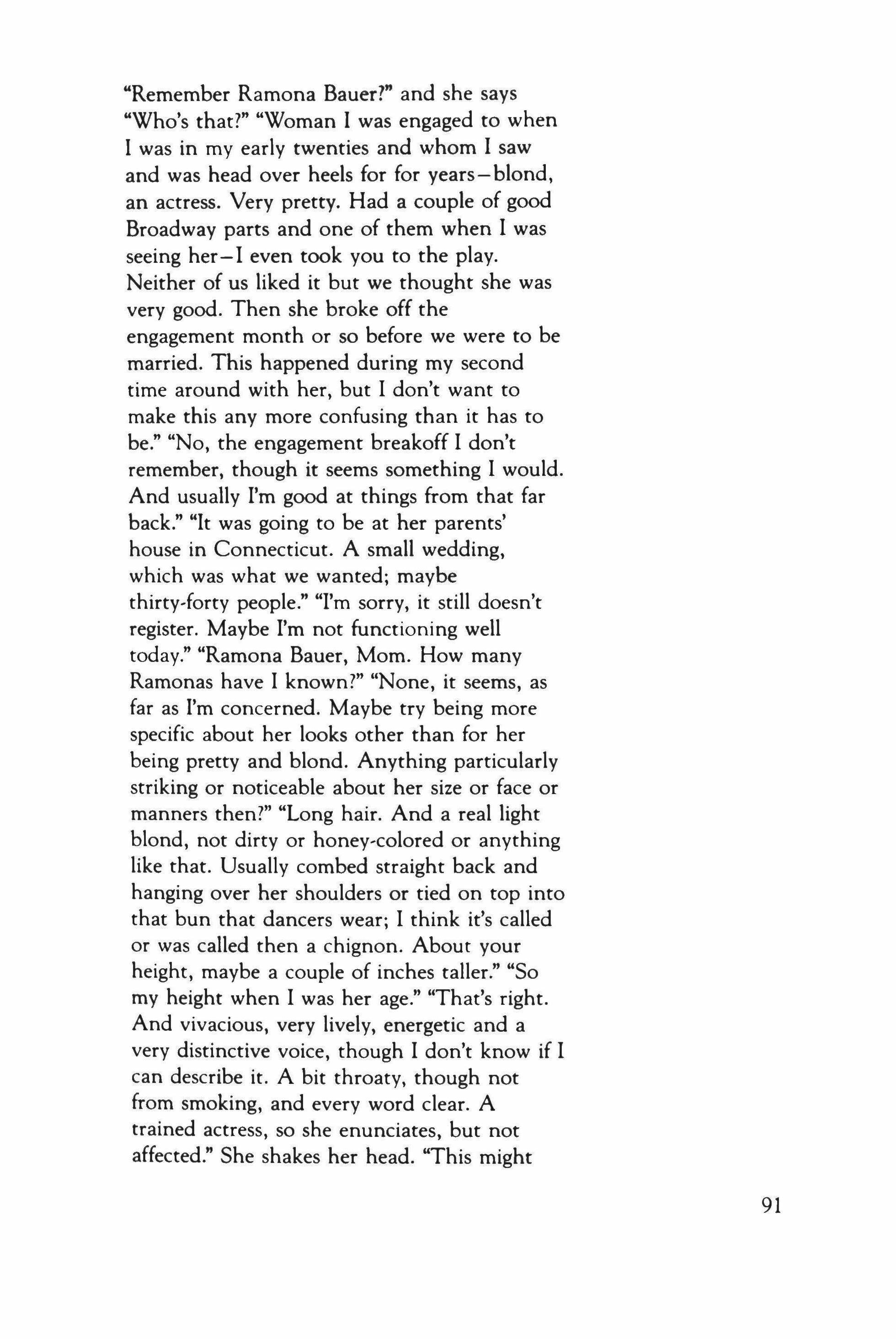
"Remember Ramona Bauer?" and she says "Who's that?" "Woman I was engaged to when I was in my early twenties and whom I saw and was head over heels for for years-blond, an actress. Very pretty. Had a couple of good Broadway parts and one of them when I was seeing her-I even took you to the play. Neither of us liked it but we thought she was very good. Then she broke off the engagement month or so before we were to be married. This happened during my second time around with her, but I don't want to make this any more confusing than it has to be." "No, the engagement breakoff I don't remember, though it seems something I would. And usually I'm good at things from that far back." "It was going to be at her parents' house in Connecticut. A small wedding, which was what we wanted; maybe thirty-forty people." "I'm sorry, it still doesn't register. Maybe I'm not functioning well today." "Ramona Bauer, Mom. How many Ramonas have I known?" "None, it seems, as far as I'm concerned. Maybe try being more specific about her looks other than for her being pretty and blond. Anything particularly striking or noticeable about her size or face or manners then?" "Long hair. And a real light blond, not dirty or honey-colored or anything like that. Usually combed straight back and hanging over her shoulders or tied on top into that bun that dancers wear; I think it's called or was called then a chignon. About your height, maybe a couple of inches taller." "So my height when I was her age." "That's right. And vivacious, very lively, energetic and a very distinctive voice, though I don't know if I can describe it. A bit throaty, though not from smoking, and every word clear. A trained actress, so she enunciates, but not affected." She shakes her head. "This might
91
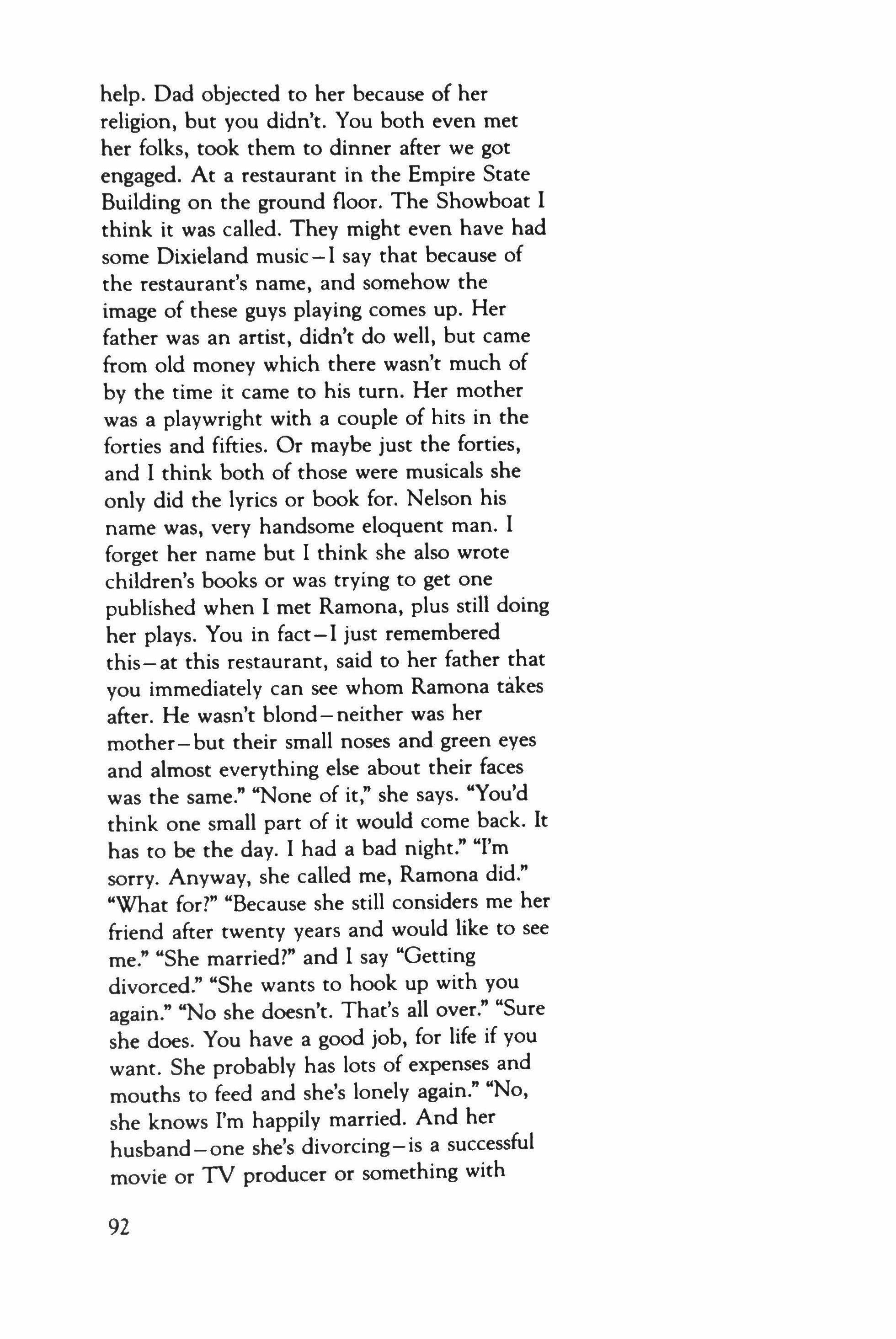
help. Dad objected to her because of her religion, but you didn't. You both even met her folks, took them to dinner after we got engaged. At a restaurant in the Empire State Building on the ground floor. The Showboat I think it was called. They might even have had some Dixieland music - I say that because of the restaurant's name, and somehow the image of these guys playing comes up. Her father was an artist, didn't do well, but came from old money which there wasn't much of by the time it came to his turn. Her mother was a playwright with a couple of hits in the forties and fifties. Or maybe just the forties, and I think both of those were musicals she only did the lyrics or book for. Nelson his name was, very handsome eloquent man. I forget her name but I think she also wrote children's books or was trying to get one published when I met Ramona, plus still doing her plays. You in fact-I just remembered this-at this restaurant, said to her father that you immediately can see whom Ramona takes after. He wasn't blond-neither was her mother-but their small noses and green eyes and almost everything else about their faces was the same." "None of it," she says. "You'd think one small part of it would come back. It has to be the day. I had a bad night." "I'm sorry. Anyway, she called me, Ramona did." "What for?" "Because she still considers me her friend after twenty years and would like to see me." "She married?" and I say "Getting divorced." "She wants to hook up with you again." "No she doesn't. That's all over." "Sure she does. You have a good job, for life if you want. She probably has lots of expenses and mouths to feed and she's lonely again." "No, she knows I'm happily married. And her husband-one she's divorcing-is a successful movie or TV producer or something with
92
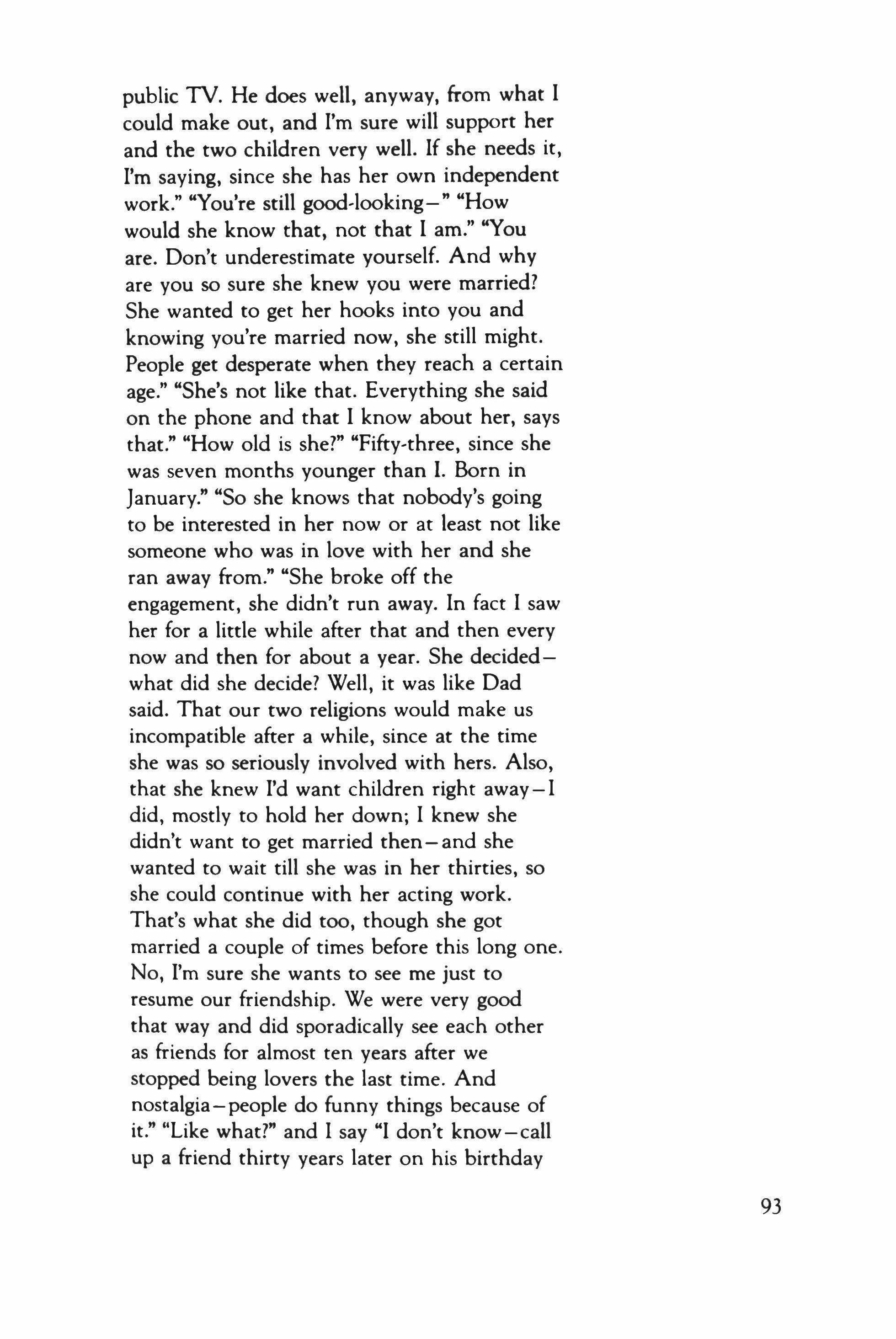
public TV. He does well, anyway, from what I could make out, and I'm sure will support her and the two children very well. If she needs it, I'm saying, since she has her own independent work." "You're still good-looking-" "How would she know that, not that I am." "You are. Don't underestimate yourself. And why are you so sure she knew you were married? She wanted to get her hooks into you and knowing you're married now, she still might. People get desperate when they reach a certain age." "She's not like that. Everything she said on the phone and that I know about her, says that." "How old is she?" "Fifty-three, since she was seven months younger than I. Born in January." "So she knows that nobody's going to be interested in her now or at least not like someone who was in love with her and she ran away from." "She broke off the engagement, she didn't run away. In fact I saw her for a little while after that and then every now and then for about a year. She decidedwhat did she decide? Well, it was like Dad said. That our two religions would make us incompatible after a while, since at the time she was so seriously involved with hers. Also, that she knew I'd want children right away-I did, mostly to hold her down; I knew she didn't want to get married then - and she wanted to wait till she was in her thirties, so she could continue with her acting work. That's what she did too, though she got married a couple of times before this long one. No, I'm sure she wants to see me just to resume our friendship. We were very good that way and did sporadically see each other as friends for almost ten years after we stopped being lovers the last time. And nostalgia-people do funny things because of it." "Like what?" and I say "I don't know-call up a friend thirty years later on his birthday
93
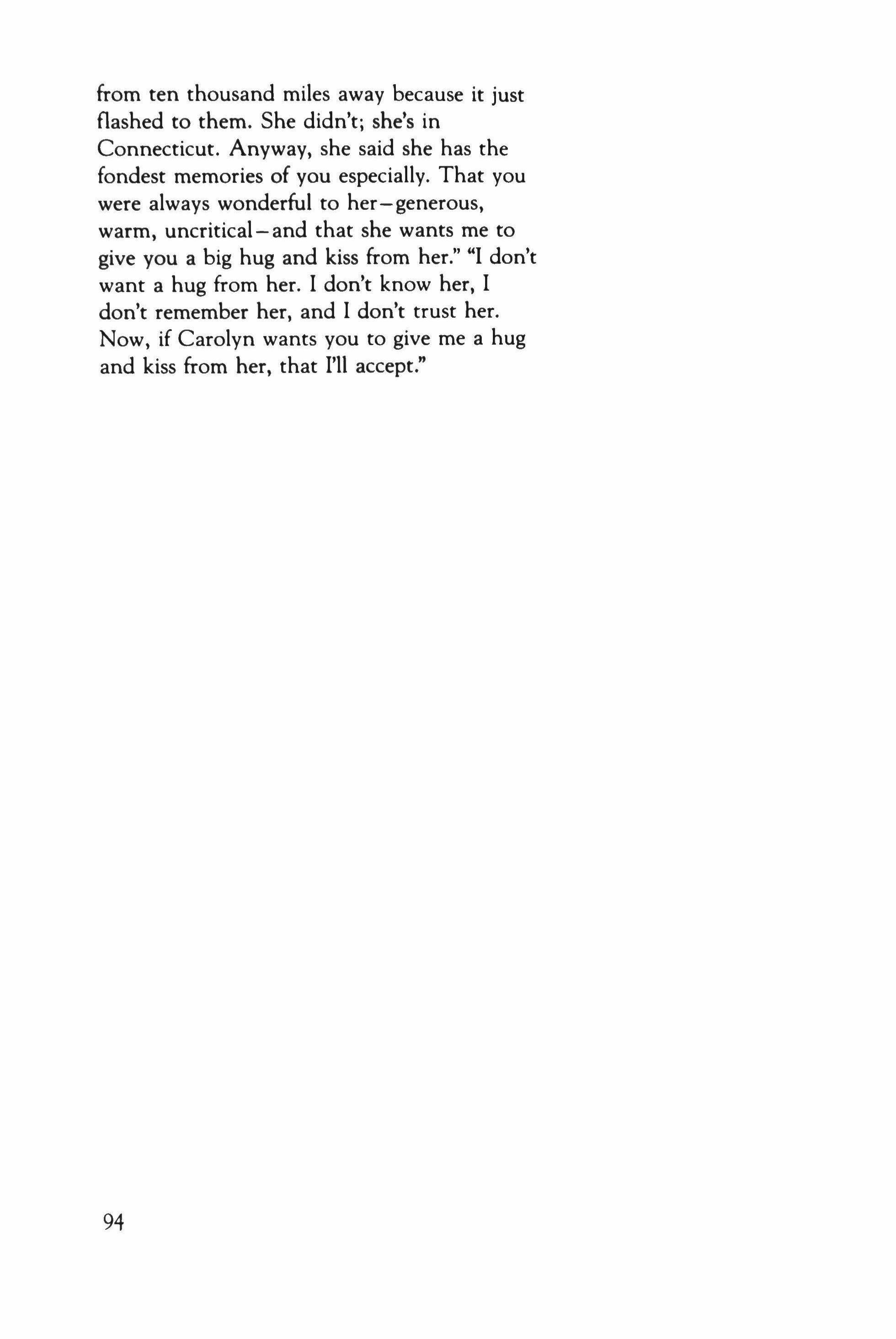
from ten thousand miles away because it just flashed to them. She didn't; she's in Connecticut. Anyway, she said she has the fondest memories of you especially. That you were always wonderful to her-generous, warm, uncritical- and that she wants me to give you a big hug and kiss from her." "I don't want a hug from her. I don't know her, I don't remember her, and I don't trust her. Now, if Carolyn wants you to give me a hug and kiss from her, that I'll accept."
94
Four Poems
Sharon alds
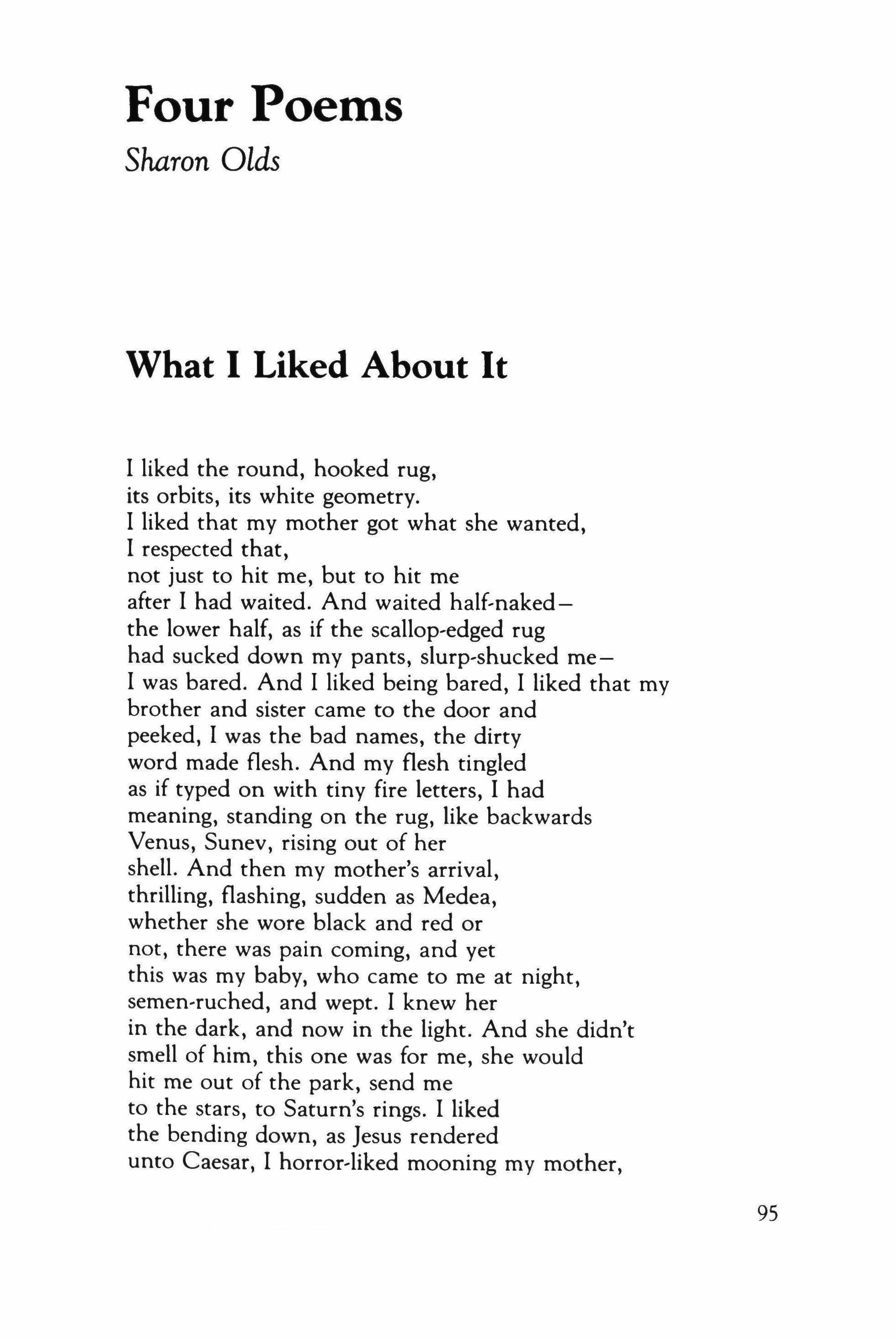
What I Liked About It
I liked the round, hooked rug, its orbits, its white geometry. I liked that my mother got what she wanted, I respected that, not just to hit me, but to hit me after I had waited. And waited half-naked= the lower half, as if the scallop-edged rug had sucked down my pants, slurp-shucked mel was bared. And I liked being bared, I liked that my brother and sister came to the door and peeked, I was the bad names, the dirty word made flesh. And my flesh tingled as if typed on with tiny fire letters, I had meaning, standing on the rug, like backwards Venus, Sunev, rising out of her shell. And then my mother's arrival, thrilling, flashing, sudden as Medea, whether she wore black and red or not, there was pain coming, and yet this was my baby, who came to me at night, semen-ruched, and wept. I knew her in the dark, and now in the light. And she didn't smell of him, this one was for me, she would hit me out of the park, send me to the stars, to Saturn's rings. I liked the bending down, as Jesus rendered unto Caesar, I horror-liked mooning my mother,
95
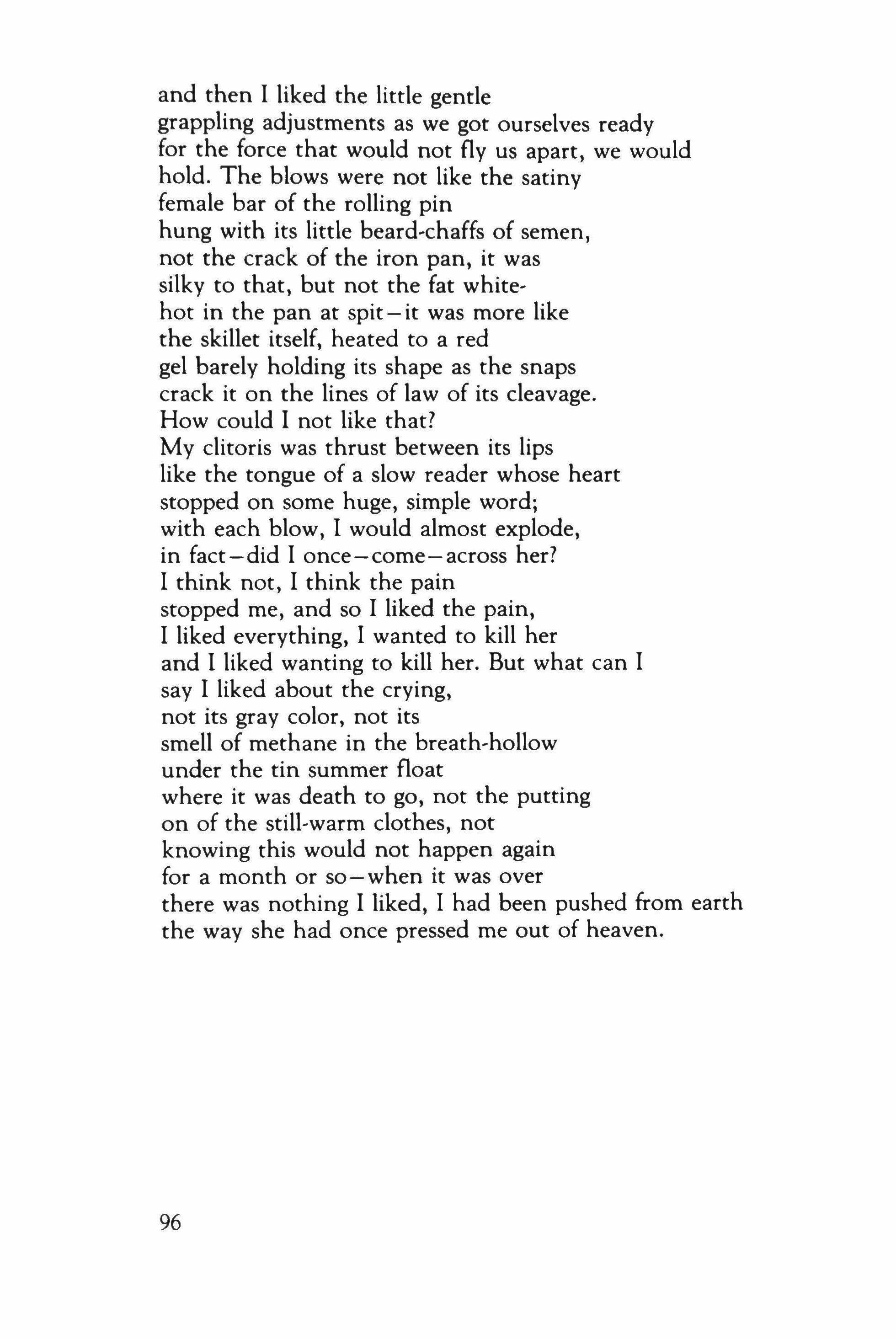
and then I liked the little gentle grappling adjustments as we got ourselves ready for the force that would not fly us apart, we would hold. The blows were not like the satiny female bar of the rolling pin hung with its little beard-chaffs of semen, not the crack of the iron pan, it was silky to that, but not the fat whitehot in the pan at spit - it was more like the skillet itself, heated to a red gel barely holding its shape as the snaps crack it on the lines of law of its cleavage. How could I not like that?
My clitoris was thrust between its lips like the tongue of a slow reader whose heart stopped on some huge, simple word; with each blow, I would almost explode, in fact-did I once-come-across her?
I think not, I think the pain stopped me, and so I liked the pain, I liked everything, I wanted to kill her and I liked wanting to kill her. But what can I say I liked about the crying, not its gray color, not its smell of methane in the breath-hollow under the tin summer float where it was death to go, not the putting on of the still-warm clothes, not knowing this would not happen again for a month or so-when it was over there was nothing I liked, I had been pushed from earth the way she had once pressed me out of heaven.
96
Warrior: 5th Grade
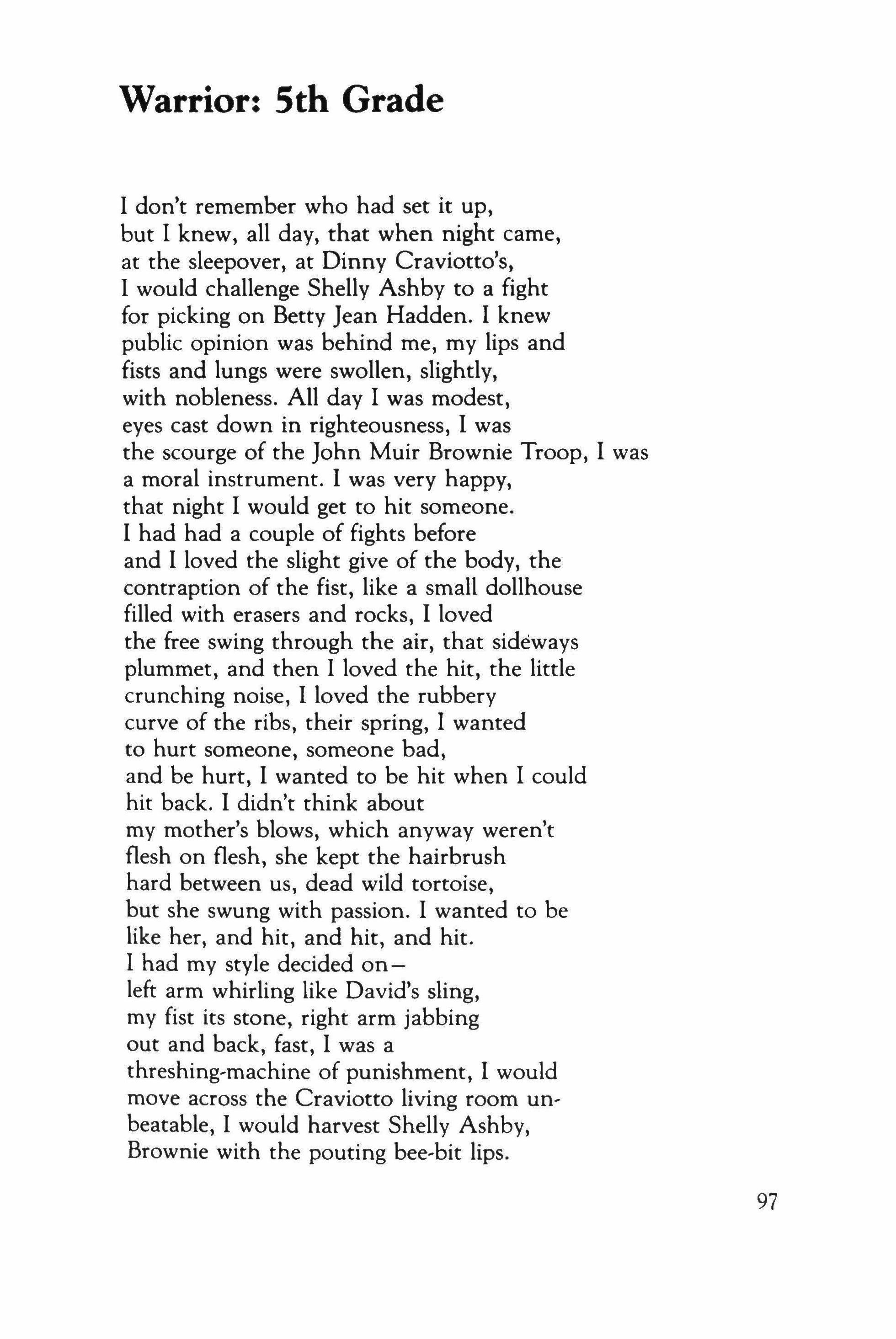
I don't remember who had set it up, but I knew, all day, that when night came, at the sleepover, at Dinny Craviotto's, I would challenge Shelly Ashby to a fight for picking on Betty Jean Hadden. I knew public opinion was behind me, my lips and fists and lungs were swollen, slightly, with nobleness. All day I was modest, eyes cast down in righteousness, I was the scourge of the John Muir Brownie Troop, I was a moral instrument. I was very happy, that night I would get to hit someone. I had had a couple of fights before and I loved the slight give of the body, the contraption of the fist, like a small dollhouse filled with erasers and rocks, I loved the free swing through the air, that sideways plummet, and then I loved the hit, the little crunching noise, I loved the rubbery curve of the ribs, their spring, I wanted to hurt someone, someone bad, and be hurt, I wanted to be hit when I could hit back. I didn't think about my mother's blows, which anyway weren't flesh on flesh, she kept the hairbrush hard between us, dead wild tortoise, but she swung with passion. I wanted to be like her, and hit, and hit, and hit. I had my style decided onleft arm whirling like David's sling, my fist its stone, right arm jabbing out and back, fast, I was a threshing-machine of punishment, I would move across the Craviotto living room unbeatable, I would harvest Shelly Ashby, Brownie with the pouting bee-bit lips.
97
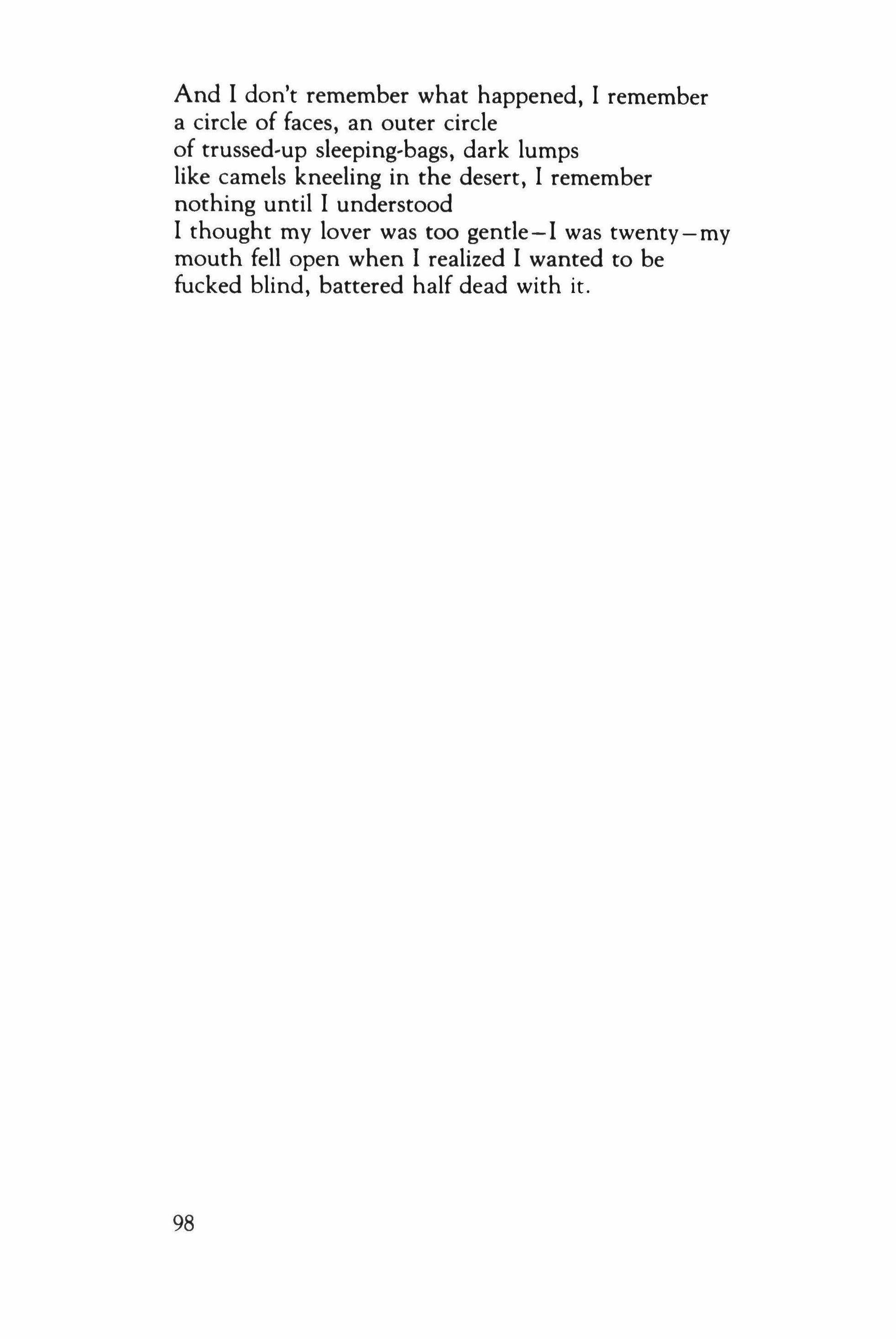
And I don't remember what happened, I remember a circle of faces, an outer circle of trussed-up sleeping-bags, dark lumps like camels kneeling in the desert, I remember nothing until I understood I thought my lover was too gentle-I was twenty-my mouth fell open when I realized I wanted to be fucked blind, battered half dead with it.
98
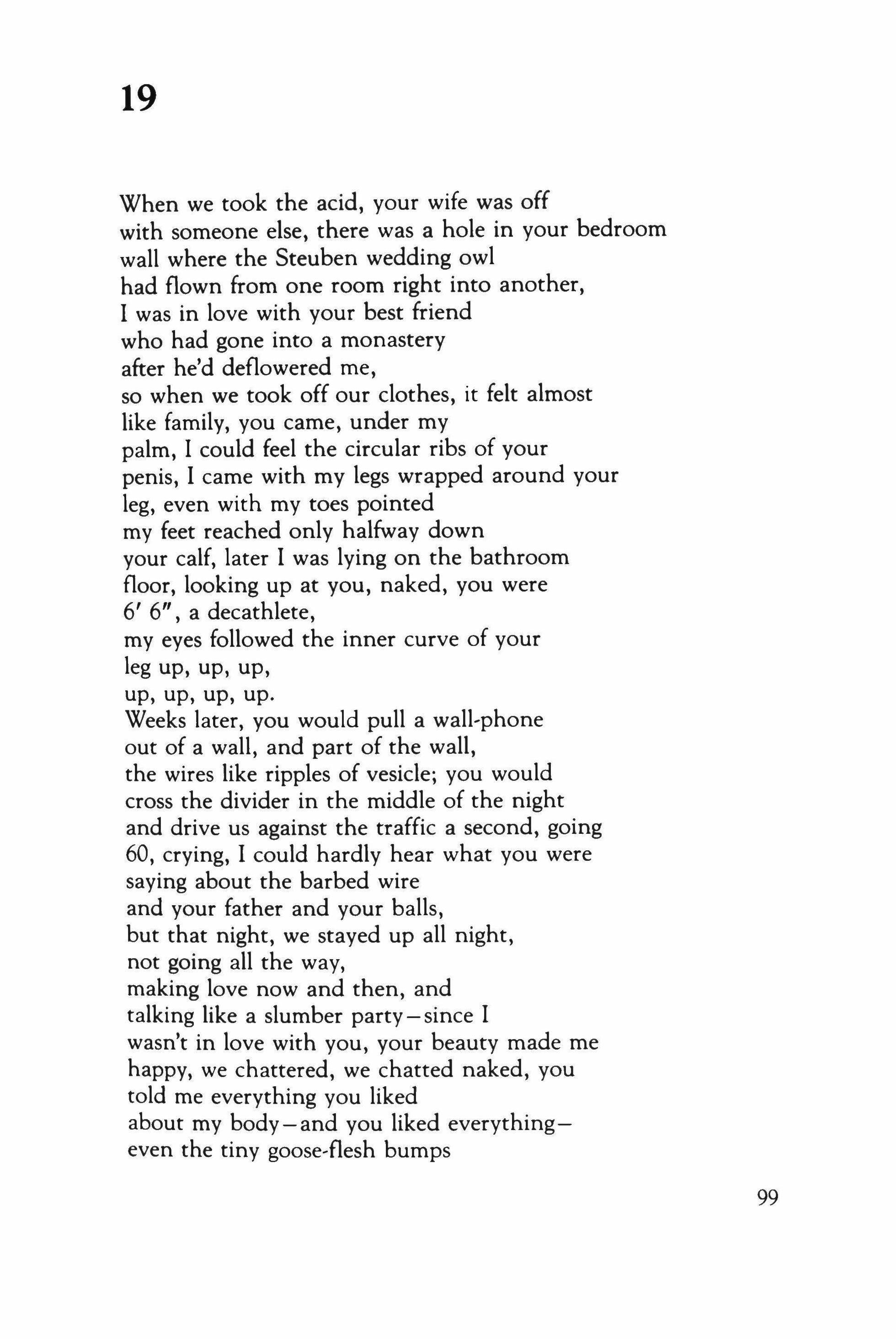
When we took the acid, your wife was off with someone else, there was a hole in your bedroom wall where the Steuben wedding owl had flown from one room right into another, I was in love with your best friend who had gone into a monastery after he'd deflowered me, so when we took off our clothes, it felt almost like family, you came, under my palm, I could feel the circular ribs of your penis, I came with my legs wrapped around your leg, even with my toes pointed my feet reached only halfway down your calf, later I was lying on the bathroom floor, looking up at you, naked, you were 6' 6" a decathlete, my eyes followed the inner curve of your leg up, up, up, up, up, up, up.
Weeks later, you would pull a wall-phone out of a wall, and part of the wall, the wires like ripples of vesicle; you would cross the divider in the middle of the night and drive us against the traffic a second, going 60, crying, I could hardly hear what you were saying about the barbed wire and your father and your balls, but that night, we stayed up all night, not going all the way, making love now and then, and talking like a slumber party - since I wasn't in love with you, your beauty made me happy, we chattered, we chatted naked, you told me everything you liked about my body-and you liked everythingeven the tiny goose-flesh bumps
19
99
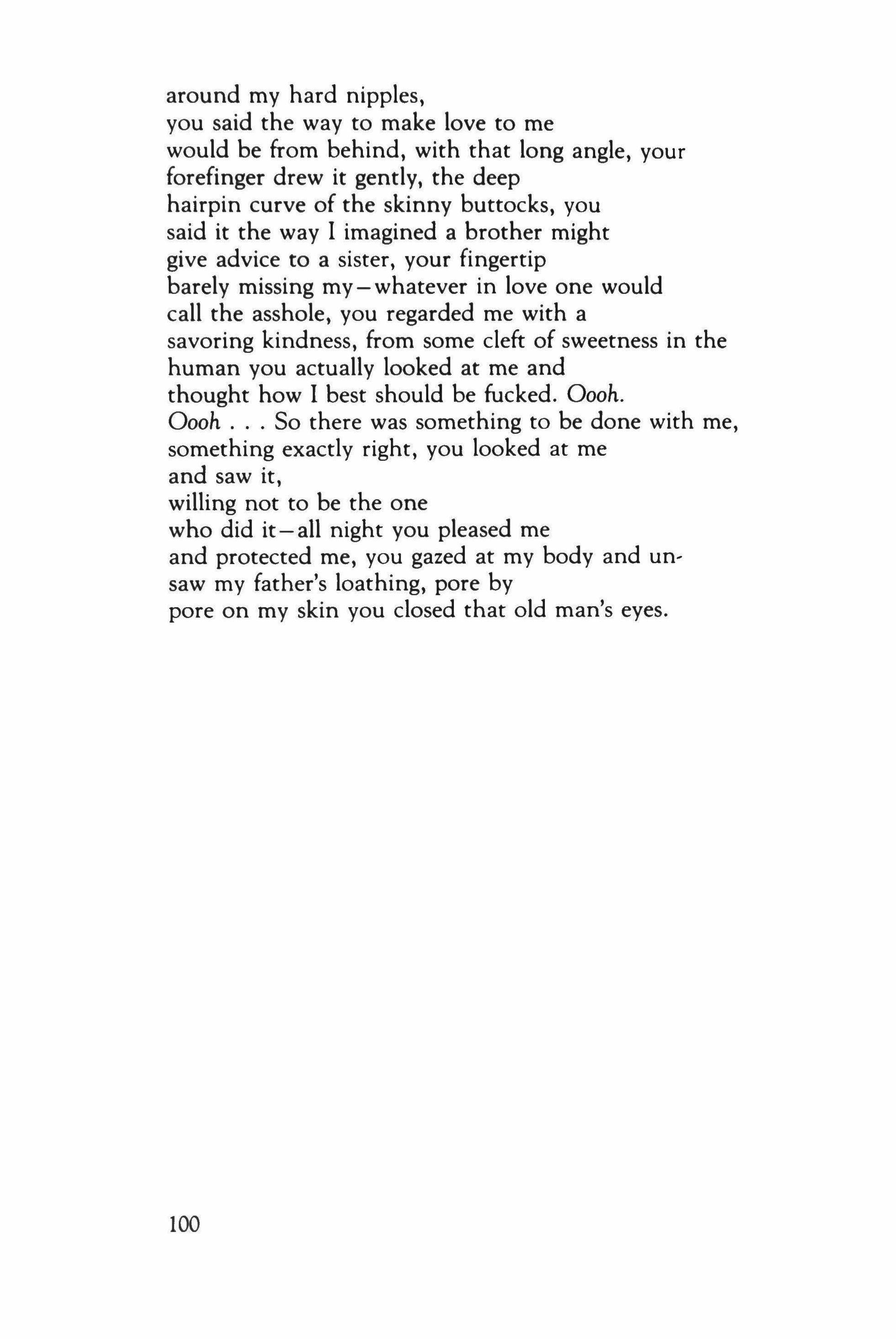
around my hard nipples, you said the way to make love to me would be from behind, with that long angle, your forefinger drew it gently, the deep hairpin curve of the skinny buttocks, you said it the way I imagined a brother might give advice to a sister, your fingertip barely missing my - whatever in love one would call the asshole, you regarded me with a savoring kindness, from some cleft of sweetness in the human you actually looked at me and thought how I best should be fucked. Oooh. Oooh So there was something to be done with me, something exactly right, you looked at me and saw it, willing not to be the one who did it-all night you pleased me and protected me, you gazed at my body and unsaw my father's loathing, pore by pore on my skin you closed that old man's eyes.
100
The Native
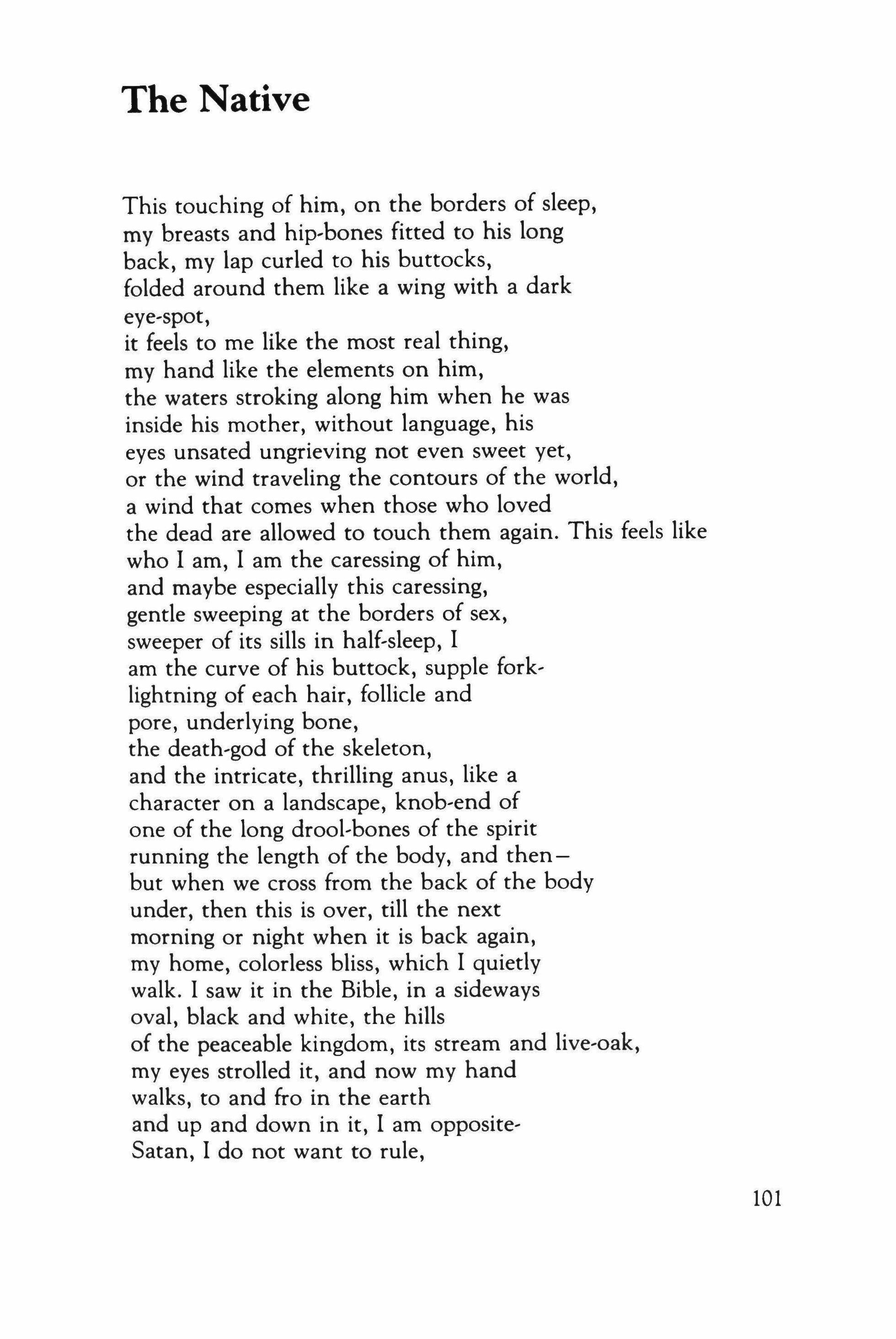
This touching of him, on the borders of sleep, my breasts and hip-bones fitted to his long back, my lap curled to his buttocks, folded around them like a wing with a dark eve-spot, it feels to me like the most real thing, my hand like the elements on him, the waters stroking along him when he was inside his mother, without language, his eyes unsated ungrieving not even sweet yet, or the wind traveling the contours of the world, a wind that comes when those who loved the dead are allowed to touch them again. This feels like who I am, I am the caressing of him, and maybe especially this caressing, gentle sweeping at the borders of sex, sweeper of its sills in half-sleep, I am the curve of his buttock, supple fork, lightning of each hair, follicle and pore, underlying bone, the death-god of the skeleton, and the intricate, thrilling anus, like a character on a landscape, knob-end of one of the long drool-bones of the spirit running the length of the body, and thenbut when we cross from the back of the body under, then this is over, till the next morning or night when it is back again, my home, colorless bliss, which I quietly walk. I saw it in the Bible, in a sideways oval, black and white, the hills of the peaceable kingdom, its stream and live-oak, my eyes strolled it, and now my hand walks, to and fro in the earth and up and down in it, I am opposite, Satan, I do not want to rule,
101
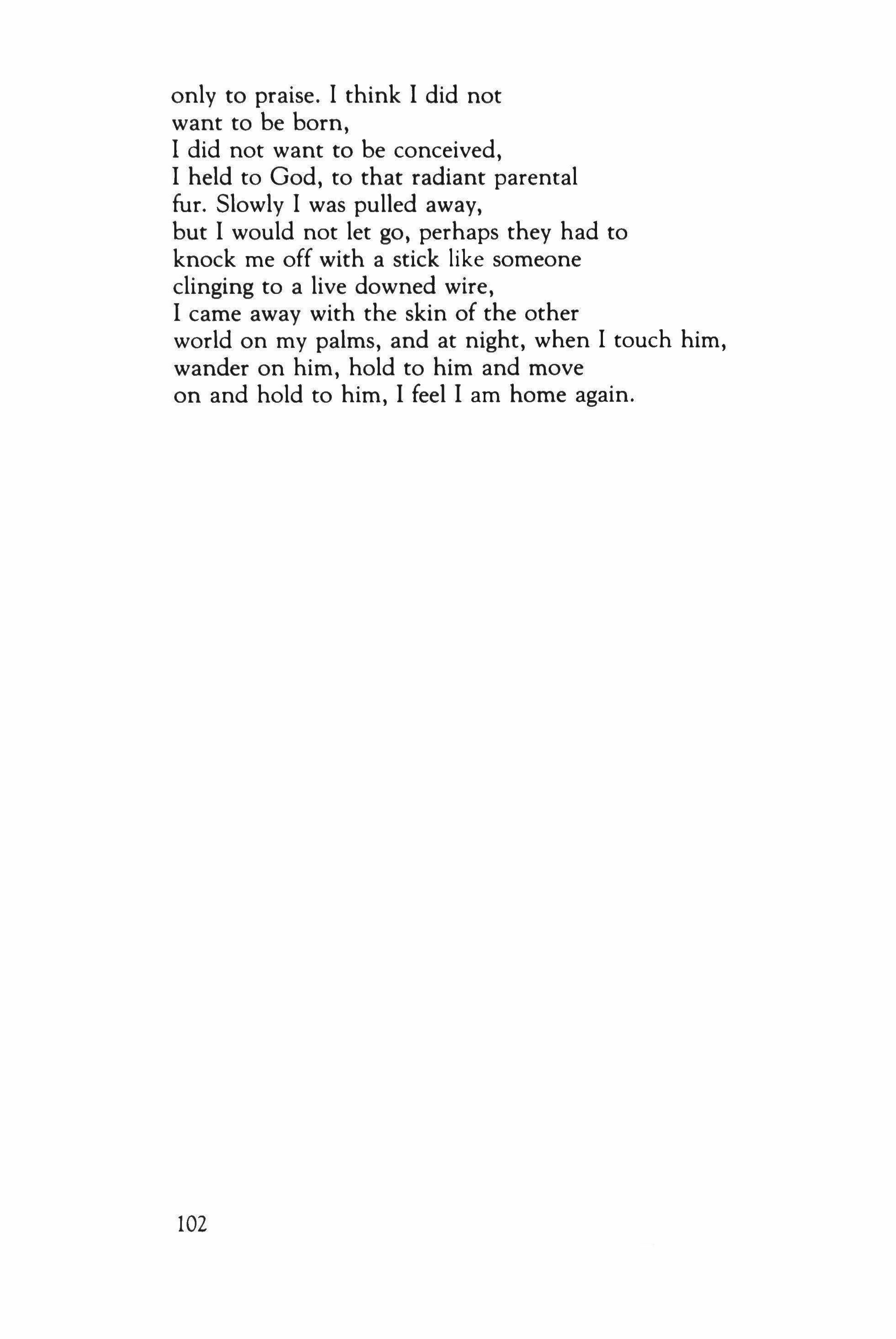
only to praise. I think I did not want to be born, I did not want to be conceived, I held to God, to that radiant parental fur. Slowly I was pulled away, but I would not let go, perhaps they had to knock me off with a stick like someone clinging to a live downed wire, I came away with the skin of the other world on my palms, and at night, when I touch him, wander on him, hold to him and move on and hold to him, I feel I am home again.
102
Two Poems
David Baker
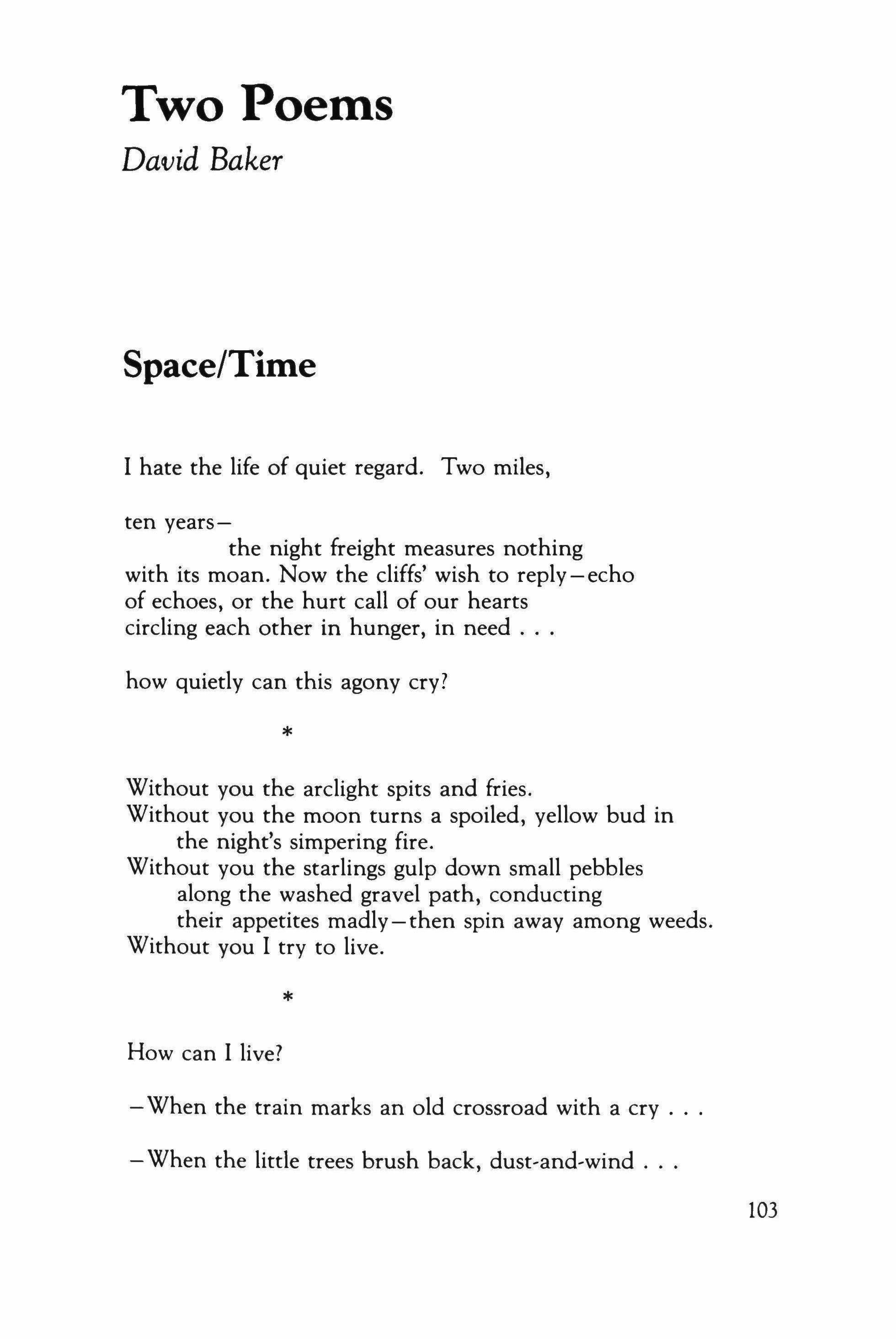
Space/Time
I hate the life of quiet regard. Two miles, ten yearsthe night freight measures nothing with its moan. Now the cliffs' wish to reply-echo of echoes, or the hurt call of our hearts circling each other in hunger, in need how quietly can this agony cry?
*
Without you the arclight spits and fries. Without you the moon turns a spoiled, yellow bud in the night's simpering fire. Without you the starlings gulp down small pebbles along the washed gravel path, conducting their appetites madly-then spin away among weeds. Without you I try to live.
*
How can I live?
- When the train marks an old crossroad with a cry - When the little trees brush back, dust-and-wind
103
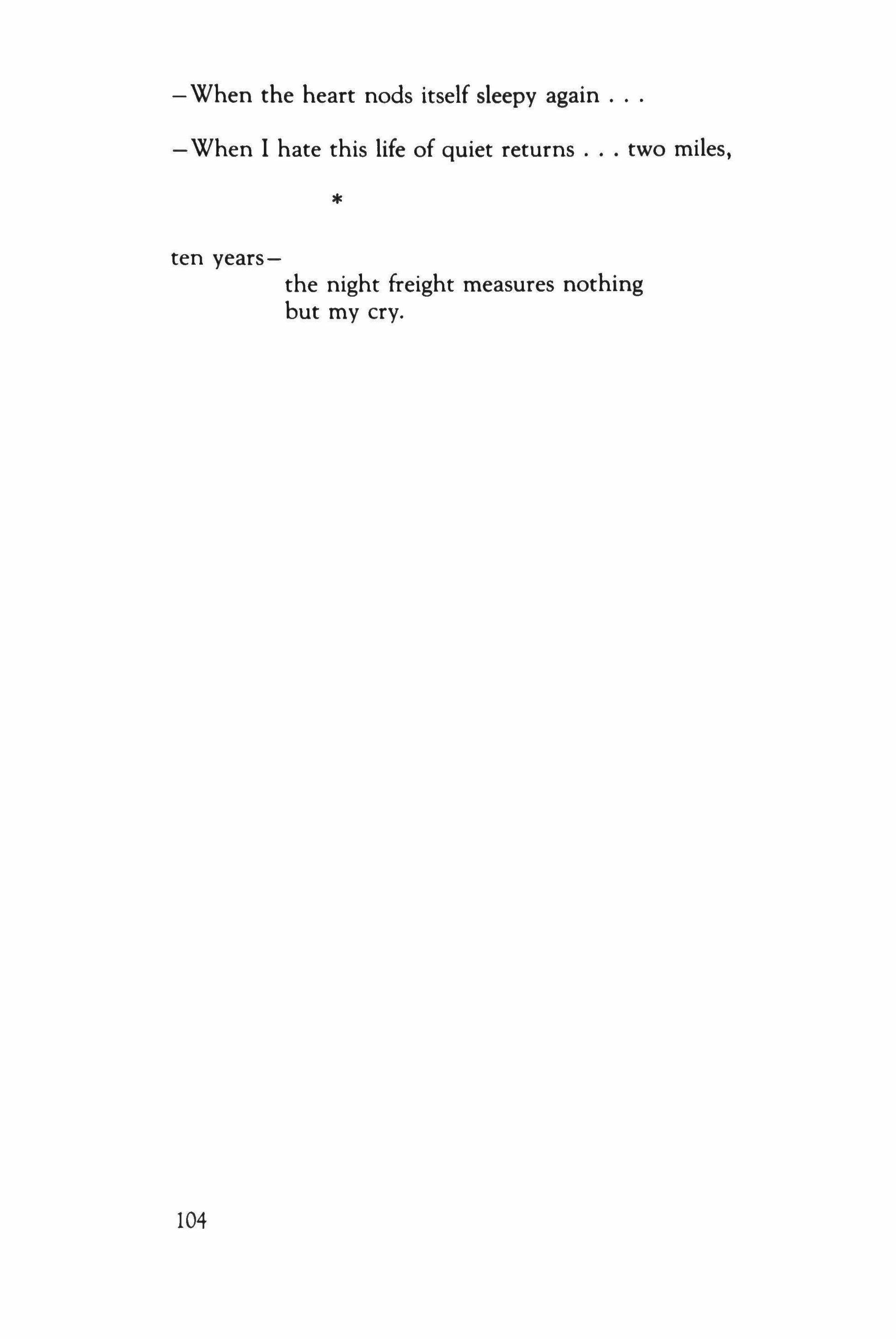
- When the heart nods itself sleepy again
- When I hate this life of quiet returns two miles, * ten yearsthe night freight measures nothing but my cry.
104
The Politics of Lyric

1.
This morning, after you got up, I listened for a long, clear time.
And you know what I heard?
2.
First, three or four cardinals yapping about something. You can tell from their quick, high, repetitive chirplike icepicks chipping new brick. I think they were working on a nest, all together, in a terrible hurry. And some trucks kept dragging down for town, dieseling, groaning.
3.
Also: more cars, half a yardful of other birds playing havoc with each other's sanity, the way it sounded, and a tic in the wall somewhere, subversive, like water escaping, or a squirrel.
I don't know where you were,
105
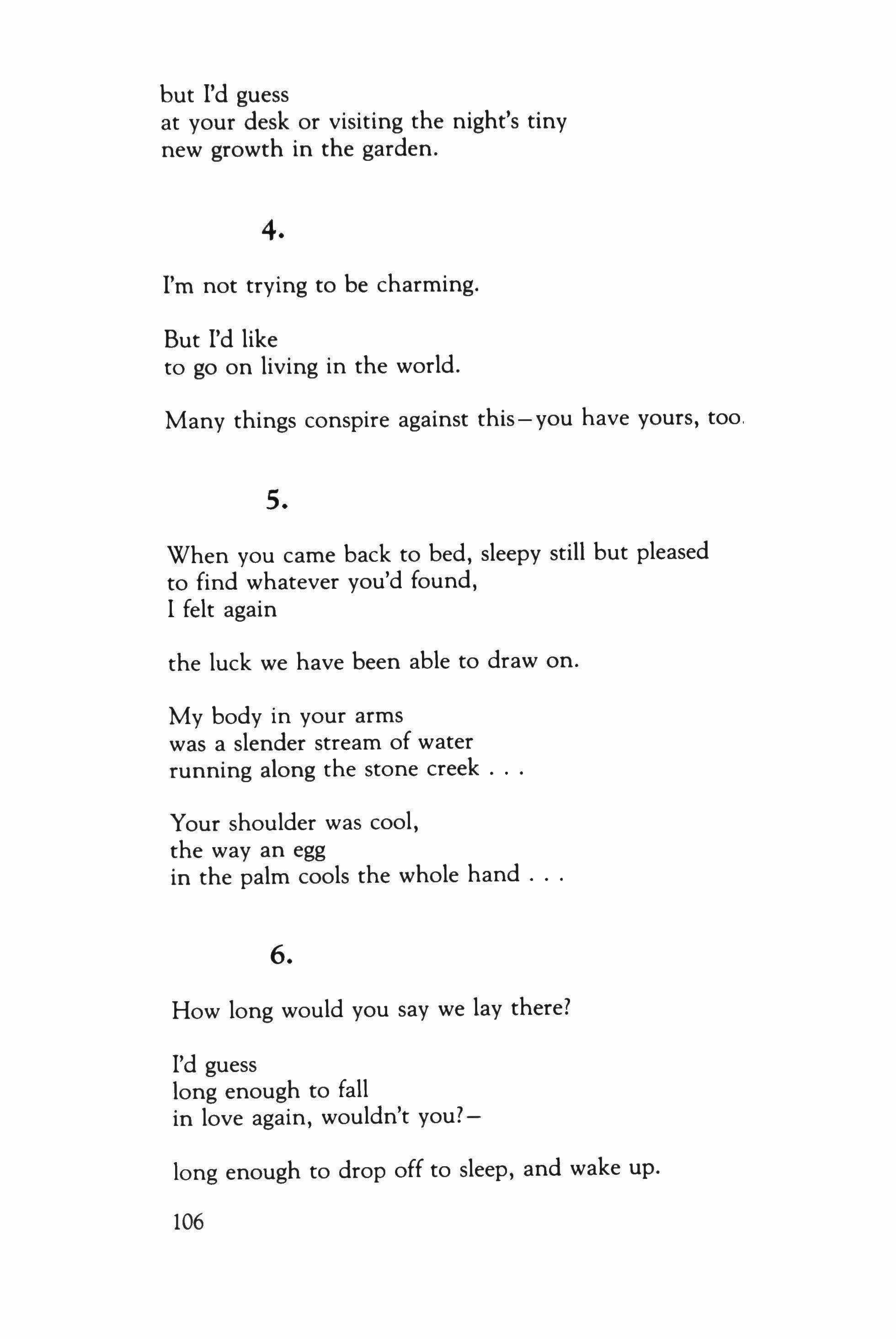
but I'd guess at your desk or visiting the night's tiny new growth in the garden.
4.
I'm not trying to be charming.
But I'd like to go on living in the world.
Many things conspire against this-you have yours, too,
5.
When you came back to bed, sleepy still but pleased to find whatever you'd found, I felt again the luck we have been able to draw on.
My body in your arms was a slender stream of water running along the stone creek
Your shoulder was cool, the wayan egg in the palm cools the whole hand
6. How long would you say we lay there?
I'd guess long enough to fall in love again, wouldn't you?long enough to drop off to sleep, and wake up.
106
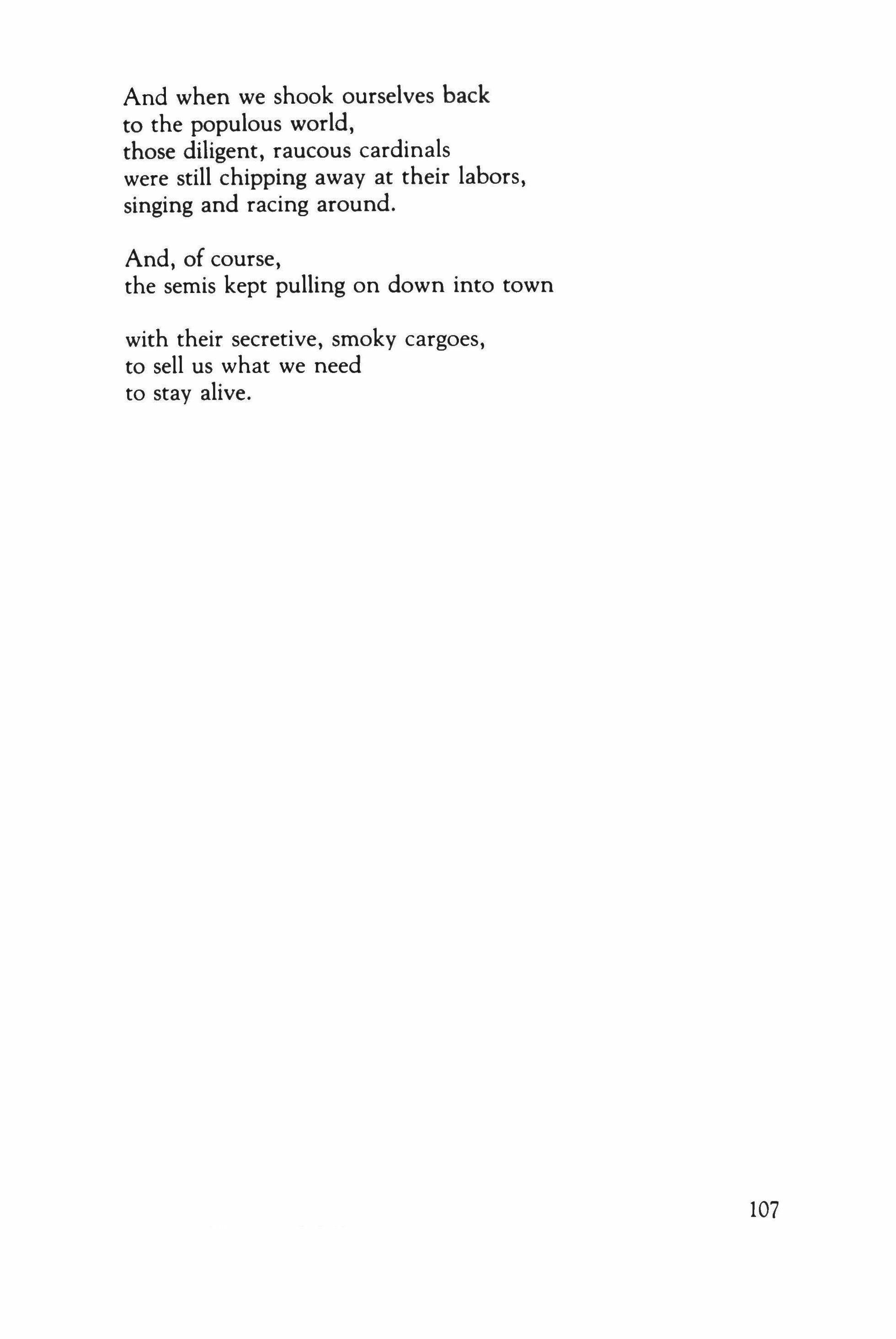
And when we shook ourselves back to the populous world, those diligent, raucous cardinals were still chipping away at their labors, singing and racing around.
And, of course, the semis kept pulling on down into town with their secretive, smoky cargoes, to sell us what we need to stay alive.
107
Ode to the Wild Horses of Caineville, Utah
Campbell McGrath
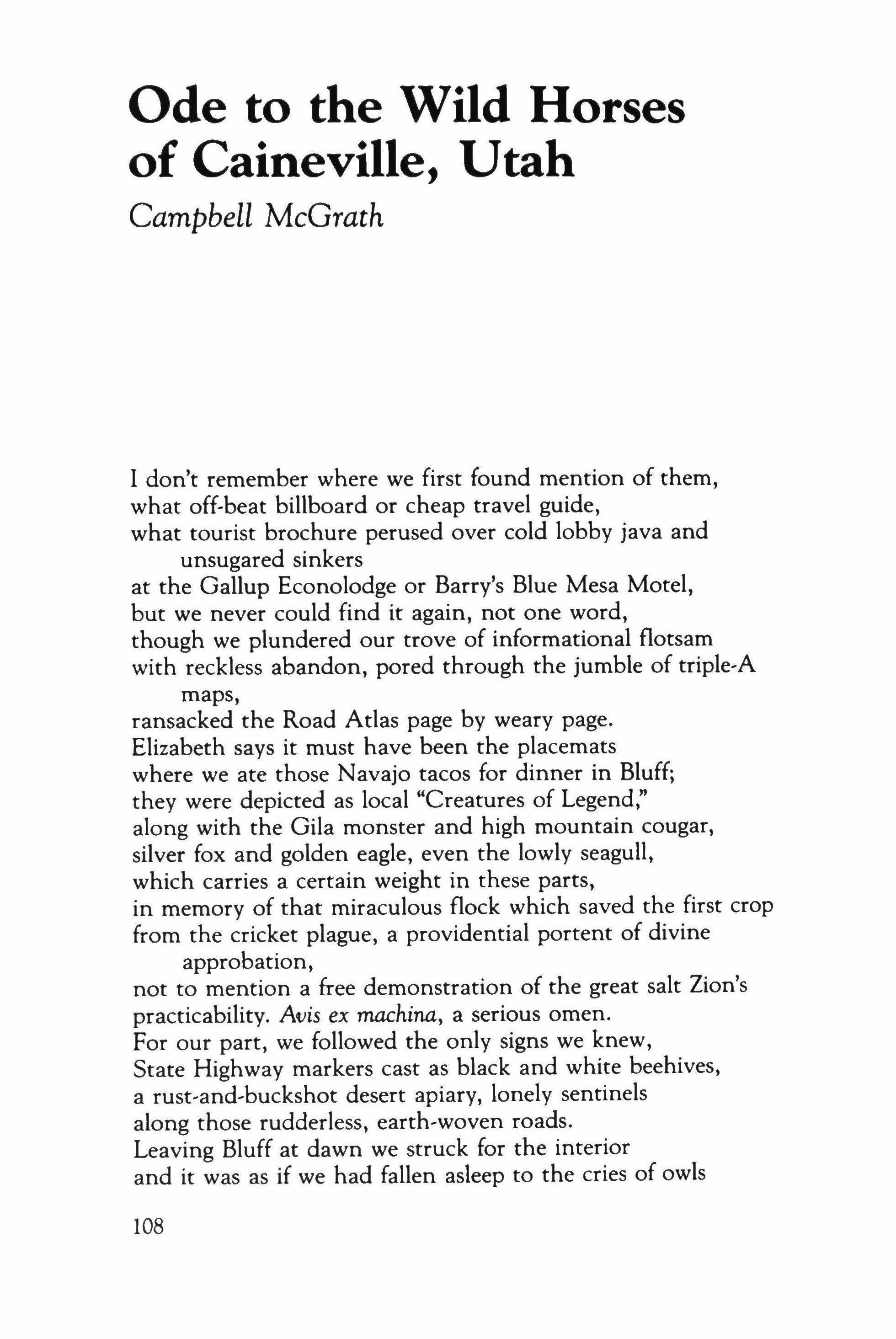
I don't remember where we first found mention of them, what off-beat billboard or cheap travel guide, what tourist brochure perused over cold lobby java and unsugared sinkers at the Gallup Econolodge or Barry's Blue Mesa Motel, but we never could find it again, not one word, though we plundered our trove of informational flotsam with reckless abandon, pored through the jumble of triple-A maps, ransacked the Road Atlas page by weary page. Elizabeth says it must have been the placemats where we ate those Navajo tacos for dinner in Bluff; they were depicted as local "Creatures of Legend," along with the Gila monster and high mountain cougar, silver fox and golden eagle, even the lowly seagull, which carries a certain weight in these parts, in memory of that miraculous flock which saved the first crop from the cricket plague, a providential portent of divine approbation, not to mention a free demonstration of the great salt Zion's practicability. Avis ex machina, a serious omen. For our part, we followed the only signs we knew, State Highway markers cast as black and white beehives, a rust-and-buckshot desert apiary, lonely sentinels along those rudderless, earth-woven roads. Leaving Bluff at dawn we struck for the interior and it was as if we had fallen asleep to the cries of owls
108
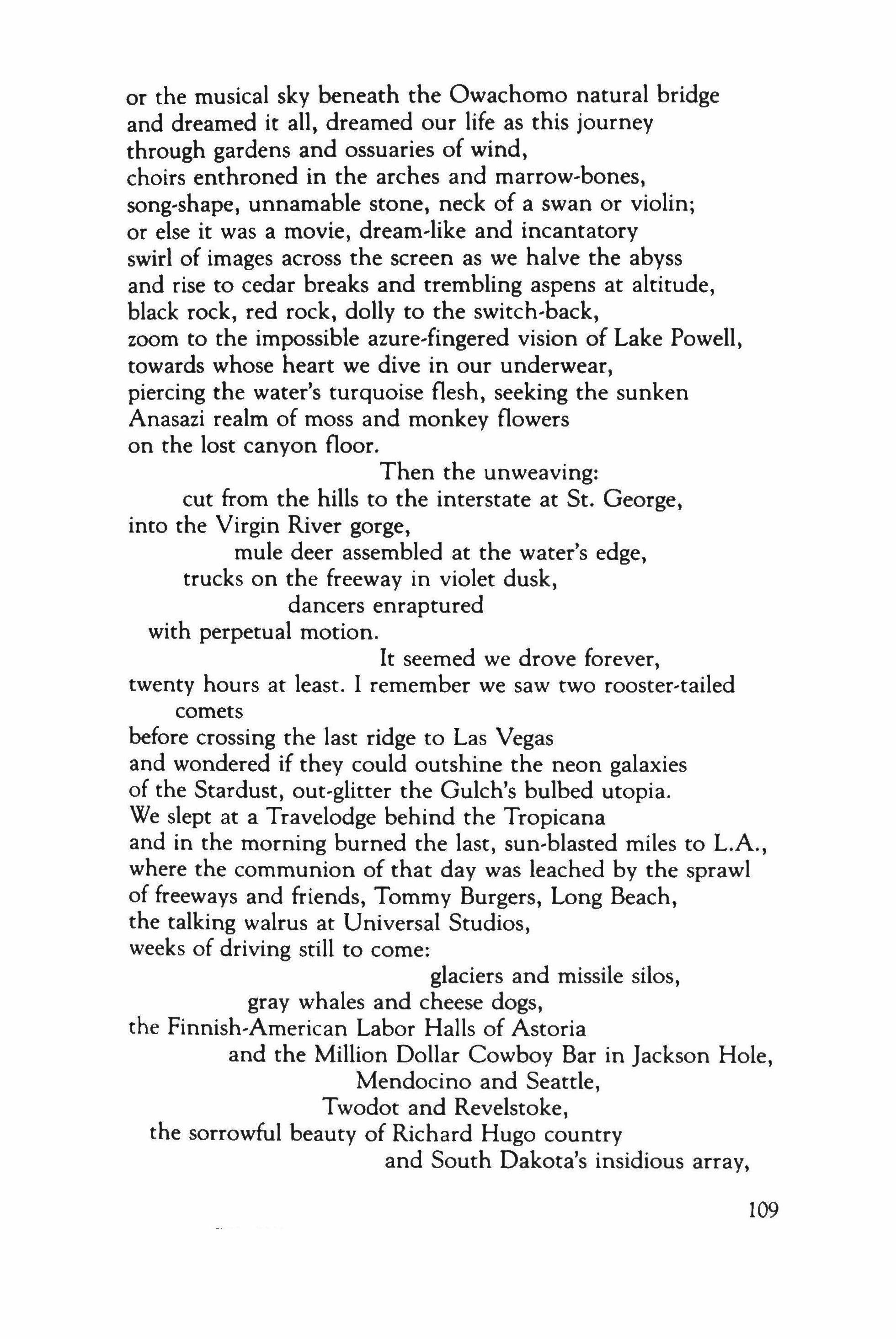
or the musical sky beneath the Owachomo natural bridge and dreamed it all, dreamed our life as this journey through gardens and ossuaries of wind, choirs enthroned in the arches and marrow-bones, song-shape, unnamable stone, neck of a swan or violin; or else it was a movie, dream-like and incantatory swirl of images across the screen as we halve the abyss and rise to cedar breaks and trembling aspens at altitude, black rock, red rock, dolly to the switch-back, zoom to the impossible azure-fingered vision of Lake Powell, towards whose heart we dive in our underwear, piercing the water's turquoise flesh, seeking the sunken Anasazi realm of moss and monkey flowers on the lost canyon floor.
Then the unweaving: cut from the hills to the interstate at St. George, into the Virgin River gorge, mule deer assembled at the water's edge, trucks on the freeway in violet dusk, dancers enraptured with perpetual motion. It seemed we drove forever, twenty hours at least. I remember we saw two rooster-tailed comets before crossing the last ridge to Las Vegas and wondered if they could outshine the neon galaxies of the Stardust, out-glitter the Gulch's bulbed utopia. We slept at a Travelodge behind the Tropicana and in the morning burned the last, sun-blasted miles to L.A., where the communion of that day was leached by the sprawl of freeways and friends, Tommy Burgers, Long Beach, the talking walrus at Universal Studios, weeks of driving still to come: glaciers and missile silos, gray whales and cheese dogs, the Finnish-American Labor Halls of Astoria and the Million Dollar Cowboy Bar in Jackson Hole, Mendocino and Seattle, Twodot and Revelstoke, the sorrowful beauty of Richard Hugo country and South Dakota's insidious array,
109
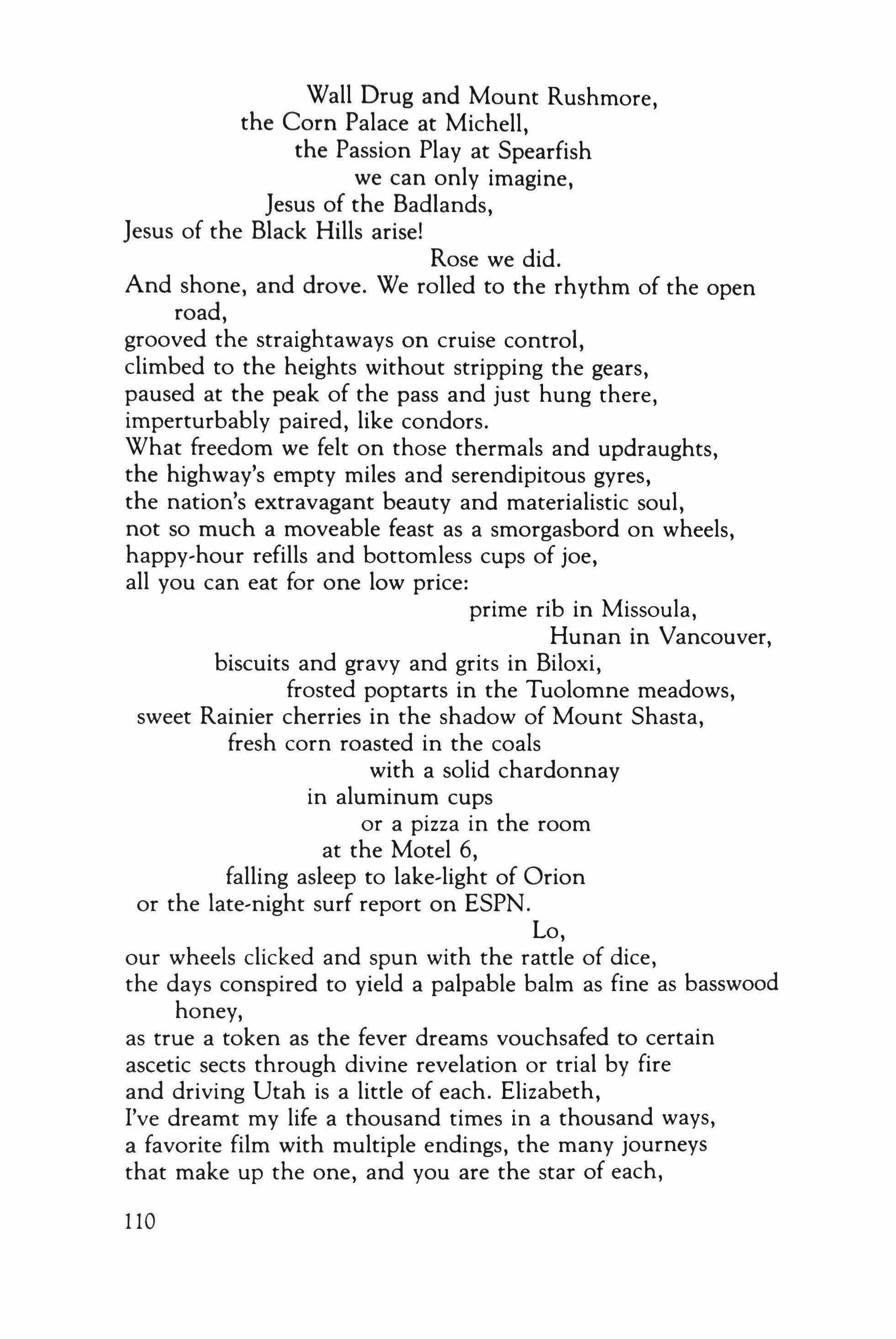
Wall Drug and Mount Rushmore, the Corn Palace at Michell, the Passion Play at Spearfish we can only imagine, Jesus of the Badlands, Jesus of the Black Hills arise!
Rose we did. And shone, and drove. We rolled to the rhythm of the open road, grooved the straightaways on cruise control, climbed to the heights without stripping the gears, paused at the peak of the pass and just hung there, imperturbably paired, like condors. What freedom we felt on those thermals and updraughts, the highway's empty miles and serendipitous gyres, the nation's extravagant beauty and materialistic soul, not so much a moveable feast as a smorgasbord on wheels, happy-hour refills and bottomless cups of joe, all you can eat for one low price: prime rib in Missoula, Hunan in Vancouver, biscuits and gravy and grits in Biloxi, frosted poptarts in the Tuolomne meadows, sweet Rainier cherries in the shadow of Mount Shasta, fresh corn roasted in the coals with a solid chardonnay in aluminum cups or a pizza in the room at the Motel 6, falling asleep to lake-light of Orion or the late-night surf report on ESPN.
Lo, our wheels clicked and spun with the rattle of dice, the days conspired to yield a palpable balm as fine as basswood honey, as true a token as the fever dreams vouchsafed to certain ascetic sects through divine revelation or trial by fire and driving Utah is a little of each. Elizabeth, I've dreamt my life a thousand times in a thousand ways, a favorite film with multiple endings, the many journeys that make up the one, and you are the star of each,
110

the ubiquitous heroine on the Stardust marquee, the constellation by which I sight, though even on occluded nights
I can detect your polar inference, as Harriet Tubman felt her way to freedom by the mossy sides of trees. Faith, they say, is blind, but there are always signs: even Brigham Young had read John C. Fremont, heard the mountain trappers tell of tall grass waving in the rain-rich shadow of the Wasatch Range; John Wesley Powell descended the impassable Colorado in wooden boats because the laws of science demanded it; compiled ethnological data and mastered the local languages; devised systems of land classification and water distribution; surveyed, plotted, theorized, mappedthis as a one,armed veteran of Shiloh, a man who during the siege of Vicksburg took time from his command in the Illinois artillery to search the earthworks and mortar-tom trenches for fossils.
Such is the force of belief; such the hunger for indisputable evidence. So too beneath these catalogs there lies a buried essence, a brass ring or trilobite, a golden coin in the wedding cake of tiers and geological strata, though finding it may be like digging for bones in the wide flesh of the oceans, as hard to pin down as the Henry Mountains in midsummer heat shimmer, like tracing the clouds or our precise route that day out of Bluff, impossible, but it's there, I can feel it like a lodestone, and I know that it's you. I almost forgot the wild horses. At first we caught their smell, a salt and metal musk
111
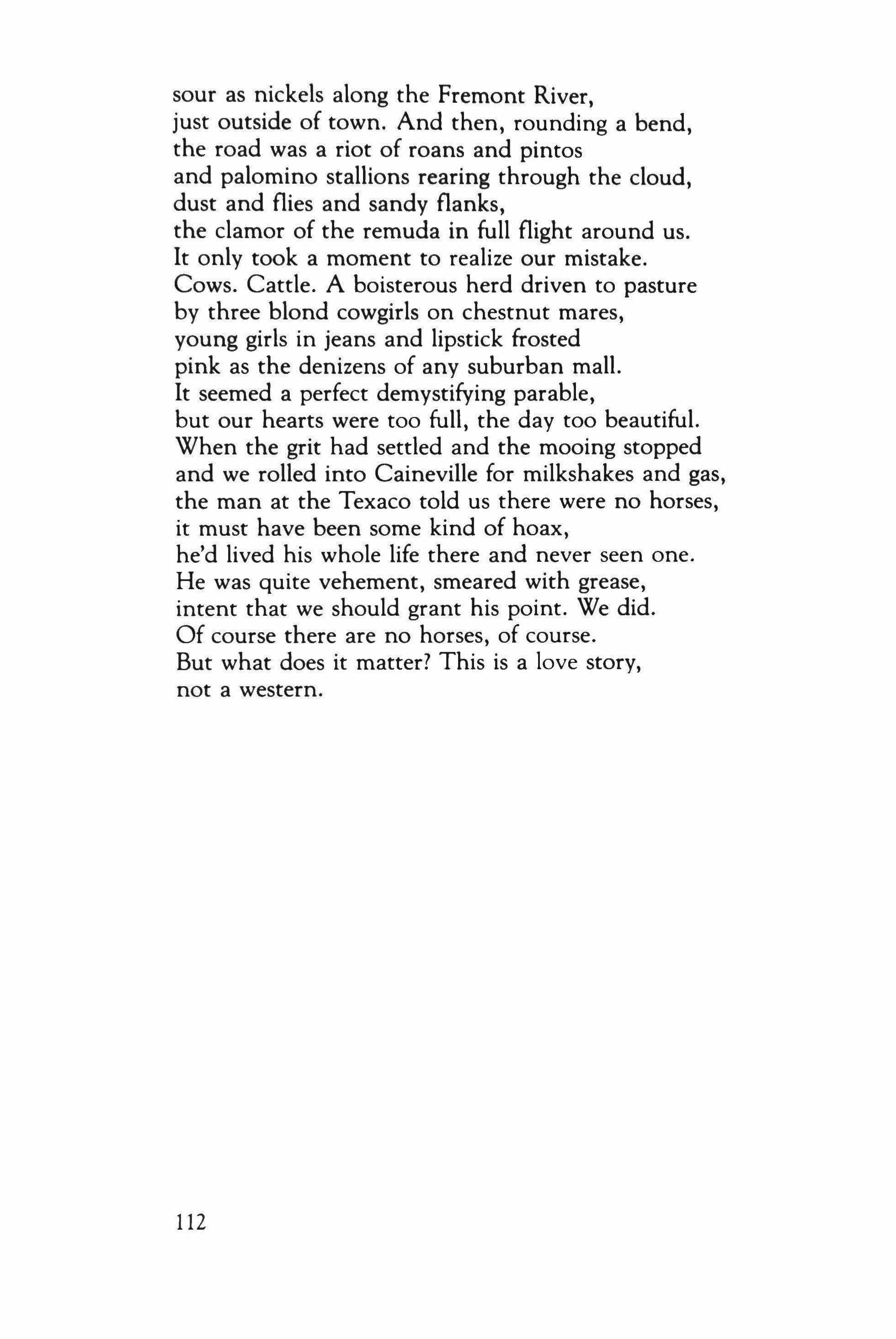
sour as nickels along the Fremont River, just outside of town. And then, rounding a bend, the road was a riot of roans and pintos and palomino stallions rearing through the cloud, dust and flies and sandy flanks, the clamor of the remuda in full flight around us. It only took a moment to realize our mistake. Cows. Cattle. A boisterous herd driven to pasture by three blond cowgirls on chestnut mares, young girls in jeans and lipstick frosted pink as the denizens of any suburban mall. It seemed a perfect demystifying parable, but our hearts were too full, the day too beautiful. When the grit had settled and the mooing stopped and we rolled into Caineville for milkshakes and gas, the man at the Texaco told us there were no horses, it must have been some kind of hoax, he'd lived his whole life there and never seen one. He was quite vehement, smeared with grease, intent that we should grant his point. We did. Of course there are no horses, of course. But what does it matter? This is a love story, not a western.
112
Museum of the American Indian
Suzanne Gardinier
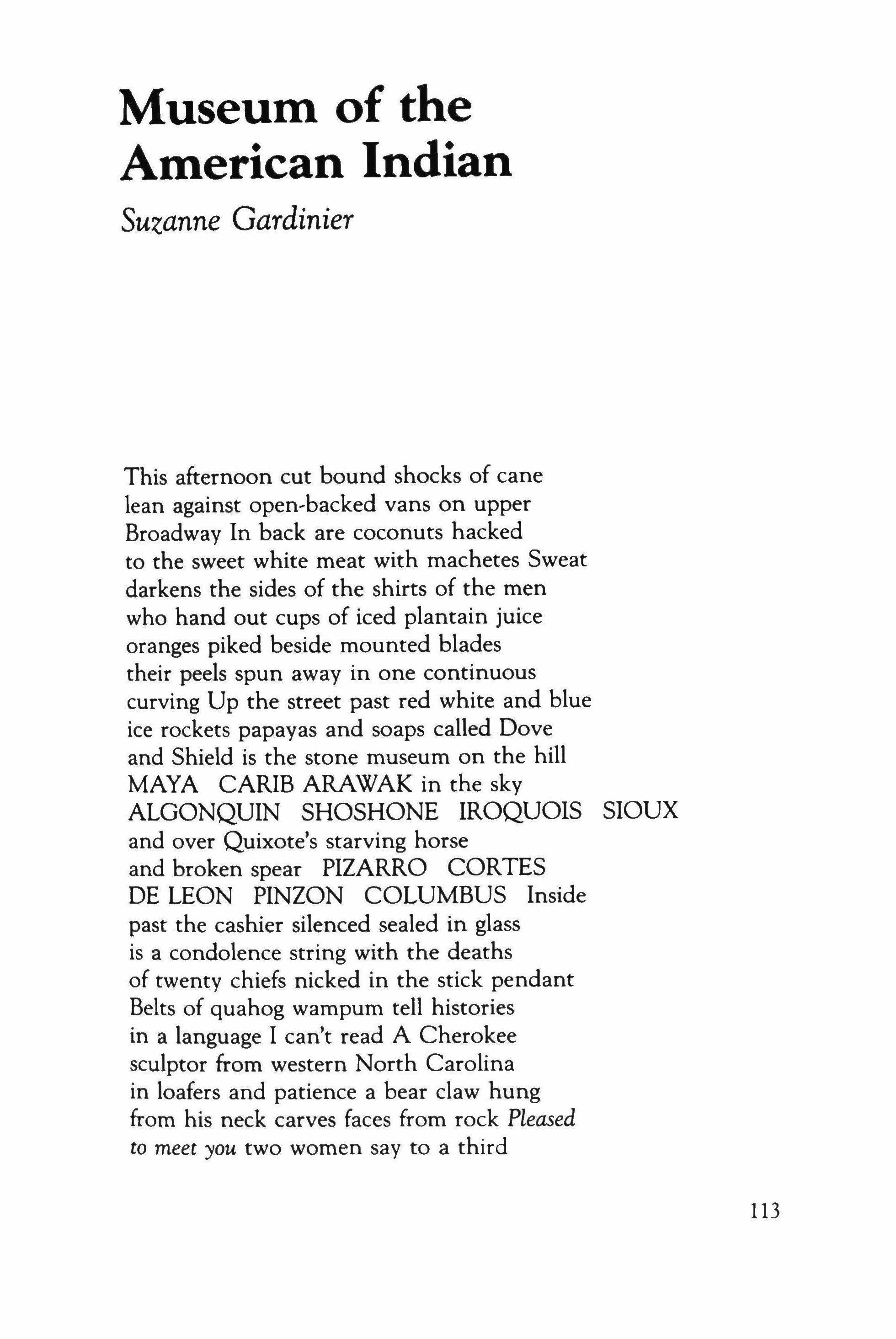
This afternoon cut bound shocks of cane lean against open-backed vans on upper Broadway In back are coconuts hacked to the sweet white meat with machetes Sweat darkens the sides of the shirts of the men who hand out cups of iced plantain juice oranges piked beside mounted blades their peels spun away in one continuous curving Up the street past red white and blue ice rockets papayas and soaps called Dove and Shield is the stone museum on the hill
MAYA CARIB ARAWAK in the sky
ALGONQUIN SHOSHONE IROQUOIS SIOUX and over Quixote's starving horse and broken spear PIZARRO CORTES DE LEON PINZON COLUMBUS Inside past the cashier silenced sealed in glass is a condolence string with the deaths of twenty chiefs nicked in the stick pendant Belts of quahog wampum tell histories in a language I can't read A Cherokee sculptor from western North Carolina in loafers and patience a bear claw hung from his neck carves faces from rock Pleased to meet you two women say to a third
113
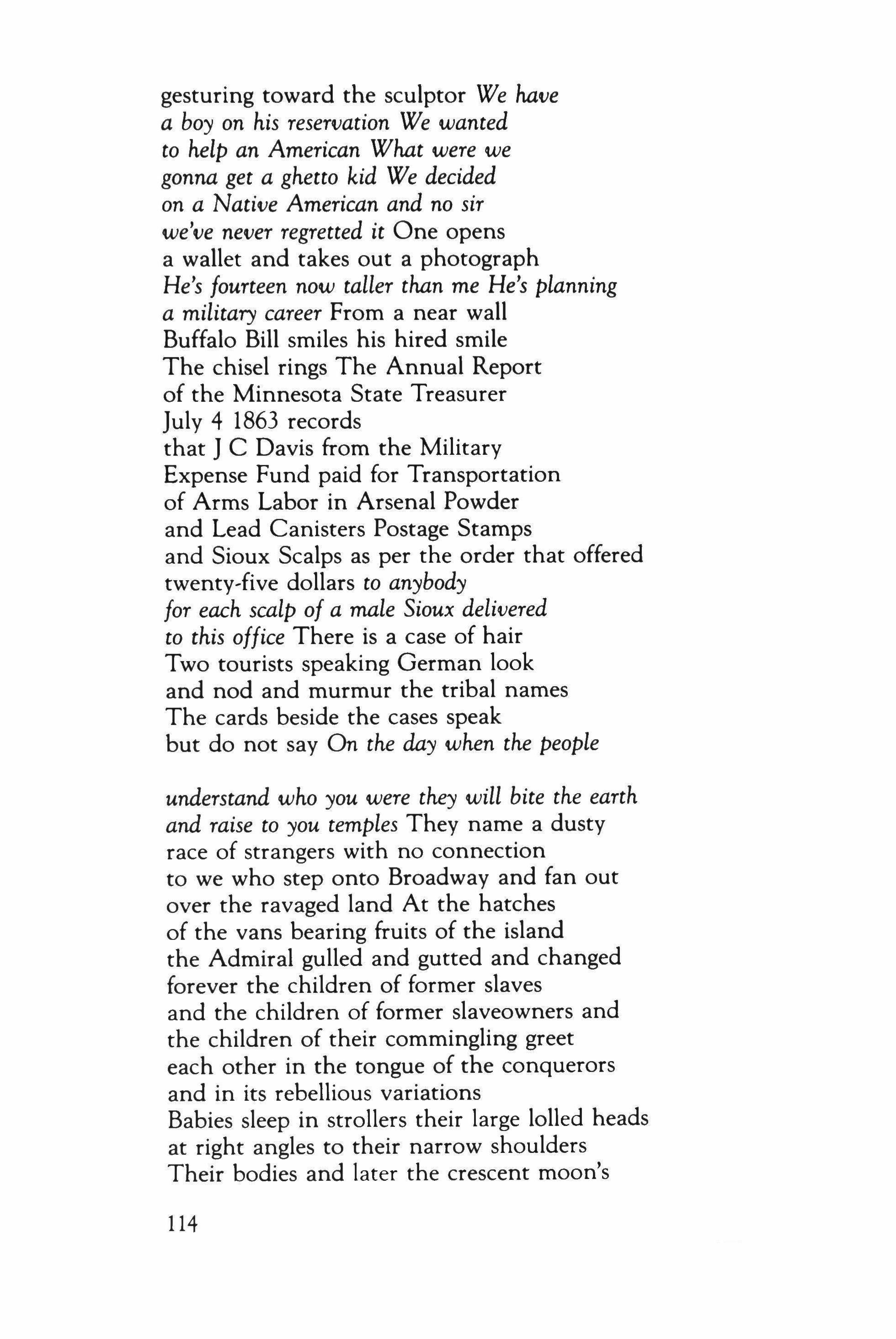
gesturing toward the sculptor We have a boy on his reservation We wanted to help an American What were we gonna get a ghetto kid We decided on a Native American and no sir we've never regretted it One opens a wallet and takes out a photograph He's fourteen now taller than me He's planning a military career From a near wall Buffalo Bill smiles his hired smile The chisel rings The Annual Report of the Minnesota State Treasurer July 4 1863 records that J C Davis from the Military Expense Fund paid for Transportation of Arms Labor in Arsenal Powder and Lead Canisters Postage Stamps and Sioux Scalps as per the order that offered twenty-five dollars to anybody for each scalp of a male Sioux delivered to this office There is a case of hair Two tourists speaking German look and nod and murmur the tribal names The cards beside the cases speak but do not say On the day when the people
understand who you were they will bite the earth and raise to you temples They name a dusty race of strangers with no connection to we who step onto Broadway and fan out over the ravaged land At the hatches of the vans bearing fruits of the island the Admiral gulled and gutted and changed forever the children of former slaves and the children of former slaveowners and the children of their commingling greet each other in the tongue of the conquerors and in its rebellious variations Babies sleep in strollers their large lolled heads at right angles to their narrow shoulders Their bodies and later the crescent moon's
114

blurred cusps testify beside the forges and furnace smokestacks and sirens and trains that this island is not a machine Inside the locked museum the corner is dark that describes the Taino those who taught Columbus how to feed himself and his men how to sleep in net beds slung between trees or hold hooks But Taino was not their word for themselves It was a word they spoke to strangers It was a greeting meaning people of peace
115
The Legion
Mary Karr
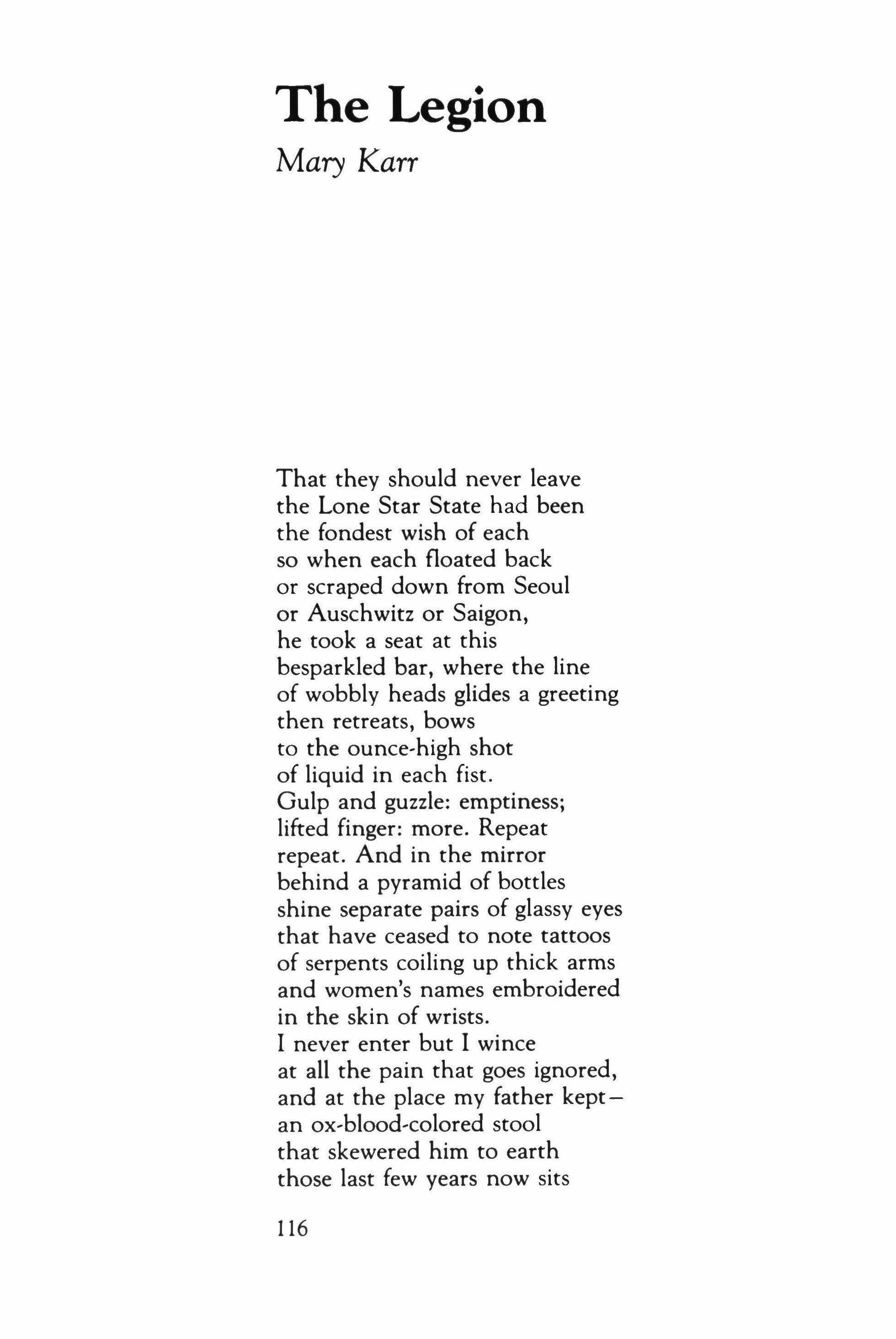
That they should never leave the Lone Star State had been the fondest wish of each so when each floated back or scraped down from Seoul or Auschwitz or Saigon, he took a seat at this besparkled bar, where the line of wobbly heads glides a greeting then retreats, bows to the ounce-high shot of liquid in each fist. Gulp and guzzle: emptiness; lifted finger: more. Repeat repeat. And in the mirror behind a pyramid of bottles shine separate pairs of glassy eyes that have ceased to note tattoos of serpents coiling up thick arms and women's names embroidered in the skin of wrists.
I never enter but I wince at all the pain that goes ignored, and at the place my father keptan ox-blood-colored stool that skewered him to earth those last few years now sits
116
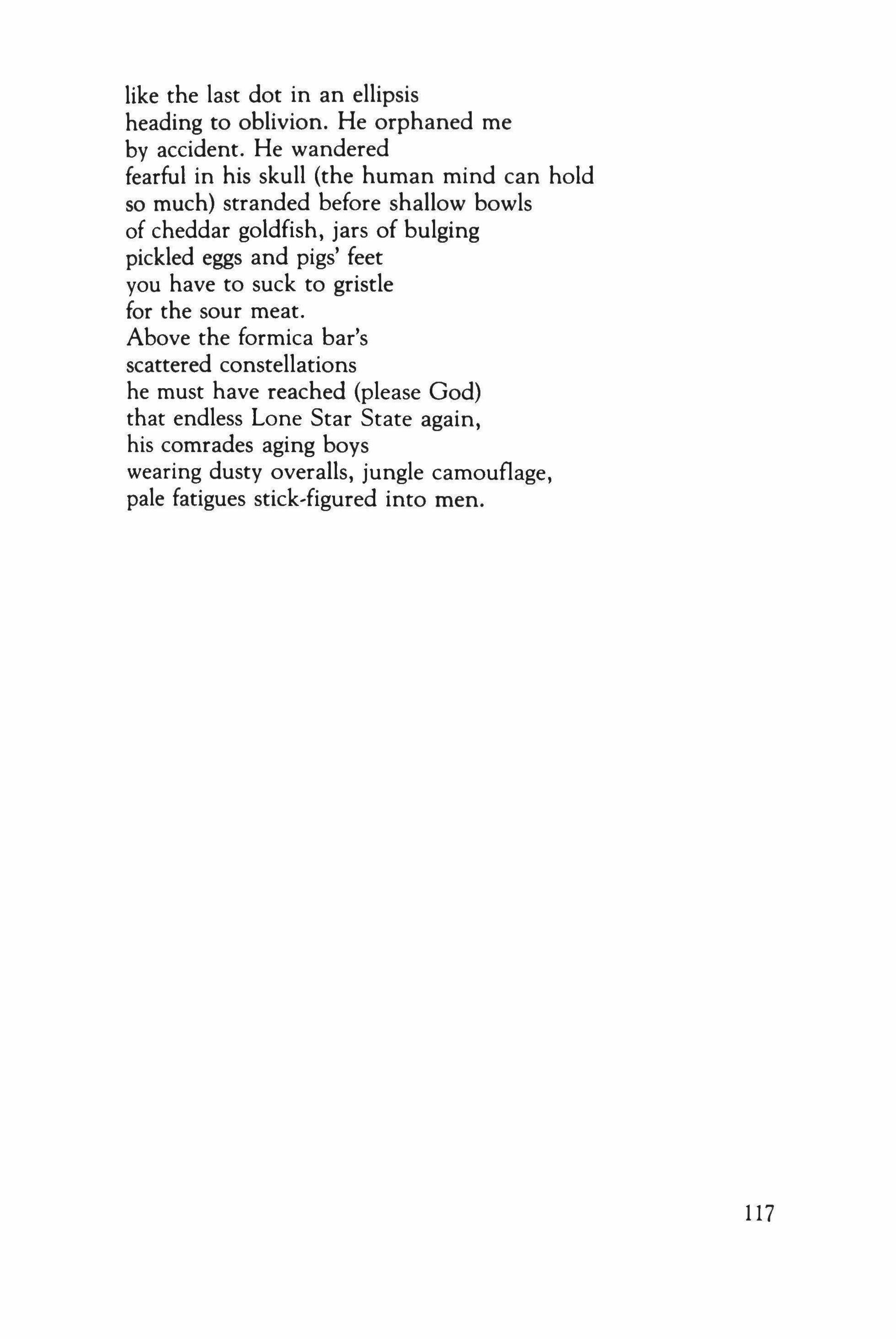
like the last dot in an ellipsis heading to oblivion. He orphaned me by accident. He wandered fearful in his skull (the human mind can hold so much) stranded before shallow bowls of cheddar goldfish, jars of bulging pickled eggs and pigs' feet you have to suck to gristle for the sour meat. Above the formica bar's scattered constellations he must have reached (please God) that endless Lone Star State again, his comrades aging boys wearing dusty overalls, jungle camouflage, pale fatigues stick-figured into men.
117
Two Poems
Ellen Bryant Voigt
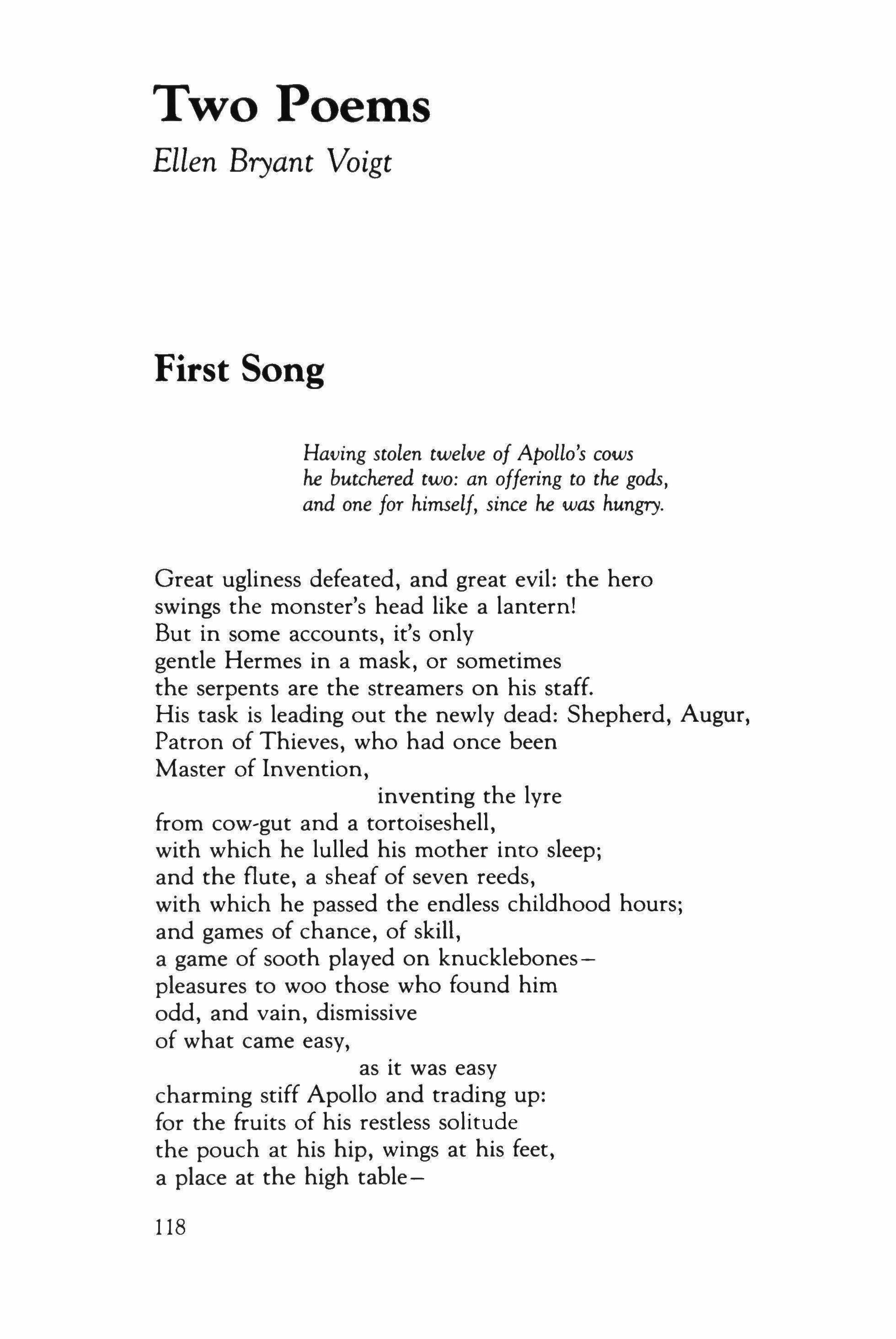
First Song
Having stolen twelve of Apollo's cows he butchered two: an offering to the gods, and one for himself, since he was hungry.
Great ugliness defeated, and great evil: the hero swings the monster's head like a lantern! But in some accounts, it's only gentle Hermes in a mask, or sometimes the serpents are the streamers on his staff. His task is leading out the newly dead: Shepherd, Augur, Patron of Thieves, who had once been Master of Invention,
inventing the lyre from cow-gut and a tortoiseshell, with which he lulled his mother into sleep; and the flute, a sheaf of seven reeds, with which he passed the endless childhood hours; and games of chance, of skill, a game of sooth played on knucklebonespleasures to woo those who found him odd, and vain, dismissive of what came easy, as it was easy charming stiff Apollo and trading up: for the fruits of his restless solitude the pouch at his hip, wings at his feet, a place at the high table-
118
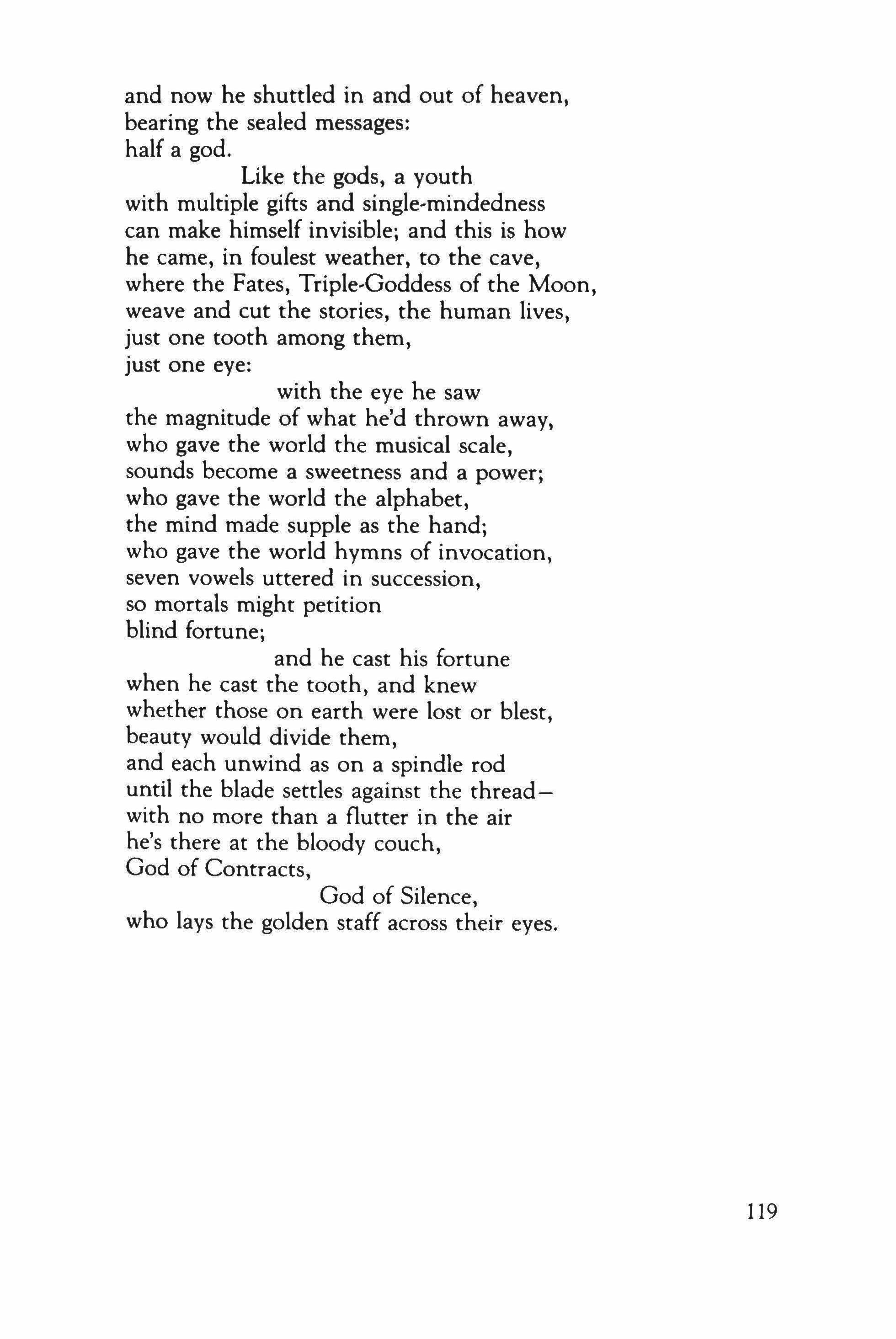
and now he shuttled in and out of heaven, bearing the sealed messages: half a god.
Like the gods, a youth with multiple gifts and single-rnindedness can make himself invisible; and this is how he came, in foulest weather, to the cave, where the Fates, Triple-Goddess of the Moon, weave and cut the stories, the human lives, just one tooth among them, just one eye:
with the eye he saw the magnitude of what he'd thrown away, who gave the world the musical scale, sounds become a sweetness and a power; who gave the world the alphabet, the mind made supple as the hand; who gave the world hymns of invocation, seven vowels uttered in succession, so mortals might petition blind fortune;
and he cast his fortune when he cast the tooth, and knew whether those on earth were lost or blest, beauty would divide them, and each unwind as on a spindle rod until the blade settles against the threadwith no more than a flutter in the air he's there at the bloody couch, God of Contracts, God of Silence, who lays the golden staff across their eyes.
119
At the Piano: Variations
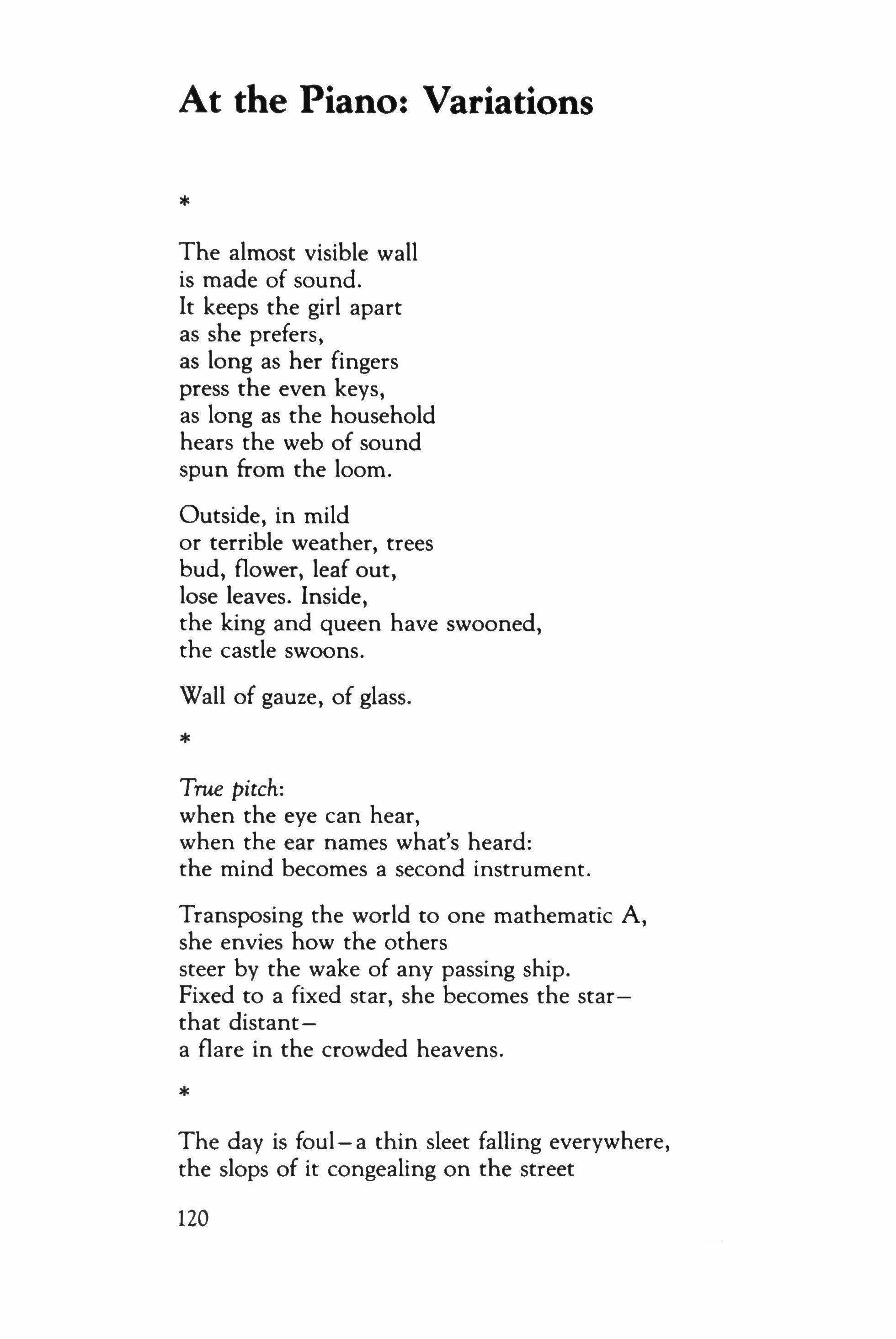
* The almost visible wall is made of sound. It keeps the girl apart as she prefers, as long as her fingers press the even keys, as long as the household hears the web of sound spun from the loom.
Outside, in mild or terrible weather, trees bud, flower, leaf out, lose leaves. Inside, the king and queen have swooned, the castle swoons.
Wall of gauze, of glass.
* True pitch: when the eye can hear, when the ear names what's heard: the mind becomes a second instrument.
Transposing the world to one mathematic A, she envies how the others steer by the wake of any passing ship. Fixed to a fixed star, she becomes the starthat distanta flare in the crowded heavens.
* The day is foul- a thin sleet falling everywhere, the slops of it congealing on the street
120
with trash, soot, smog and general gruuc, the sky's dark clouds incarnate underfoot, buses, cars, people, rats, roaches flooding the street with their effluvia.
Inside the studio, it's high summer, 18th Century rational Germany.
On the open score a meadow blooms, the notes flowers on their upright sterns, the pianist harvesting from each its grain of soundshe has, that is, the undeflected focus of a bee, and from the concert grand the fugue emerging-
see how it seduces, what carries no mark of the present world, no news, no merchants, no murderous weather, no crude alarms, no lives lost or saved.
* "Earthy, exuberant, full of gusto, bristling with intelligence.
And the tips of your fingers were so very small." He leans across her arm to pour the wine.
Since thirty years have passed he can admit he envied her her giftsperhaps mistakes that envy for desire, like David on the throne hearing the harp.
And now remembers the slope of her white neck; and now is sure that neck's improved with age.
Digging a hole to where the past is buried, one covers the living grass on either side.
*

This far inland, after the hurricane, a wind on the porch sufficient to chuff and ravel the tangled "Baby's Tears" disturbs the cluster of chimes:
121
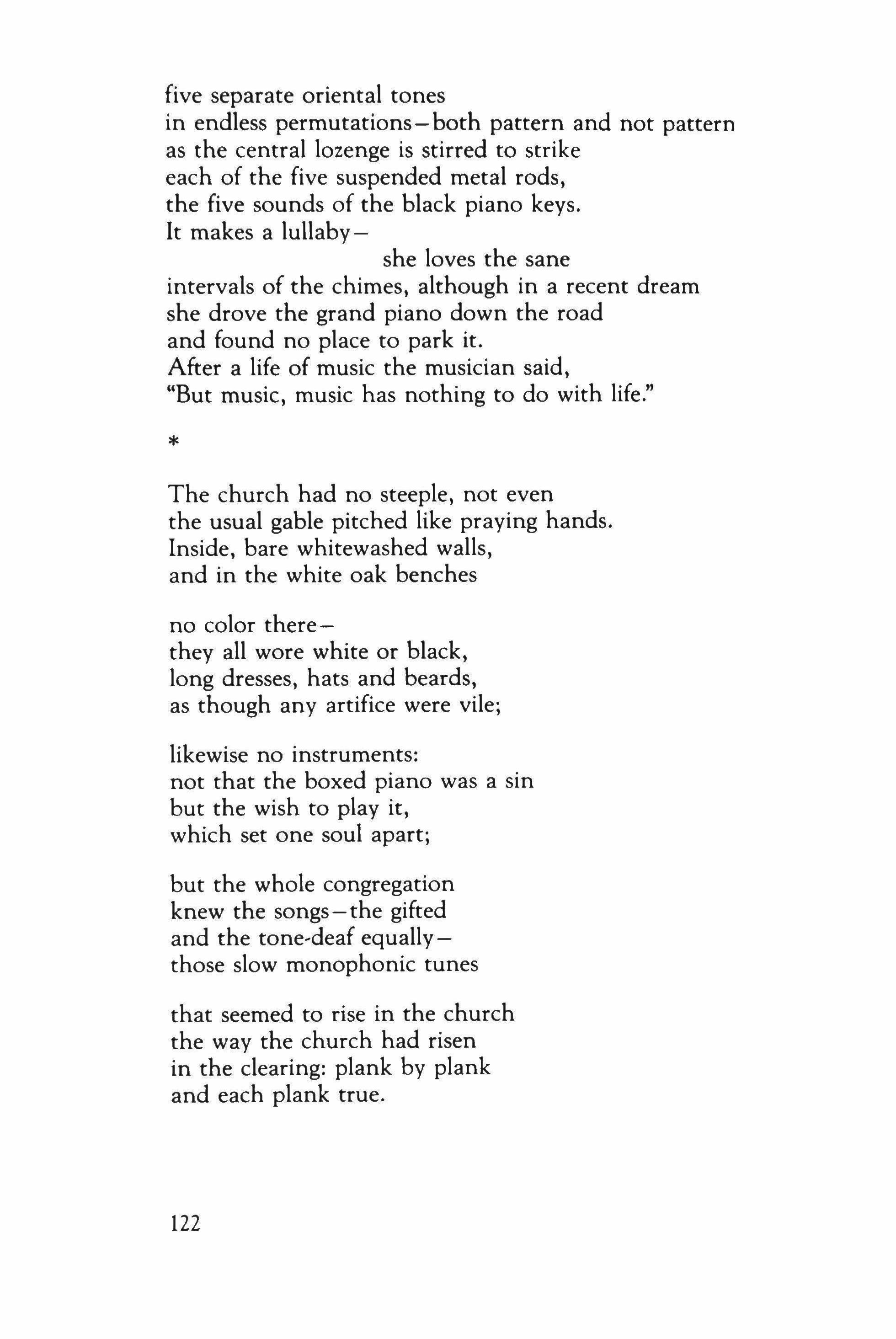
five separate oriental tones in endless permutations-both pattern and not pattern as the central lozenge is stirred to strike each of the five suspended metal rods, the five sounds of the black piano keys. It makes a lullabyshe loves the sane intervals of the chimes, although in a recent dream she drove the grand piano down the road and found no place to park it. After a life of music the musician said, "But music, music has nothing to do with life." *
The church had no steeple, not even the usual gable pitched like praying hands. Inside, bare whitewashed walls, and in the white oak benches no color therethey all wore white or black, long dresses, hats and beards, as though any artifice were vile;
likewise no instruments: not that the boxed piano was a sin but the wish to play it, which set one soul apart; but the whole congregation knew the songs - the gifted and the tone-deaf equallythose slow monophonic tunes that seemed to rise in the church the way the church had risen in the clearing: plank by plank and each plank true.
122
Four Poems
Lynn Emanuel
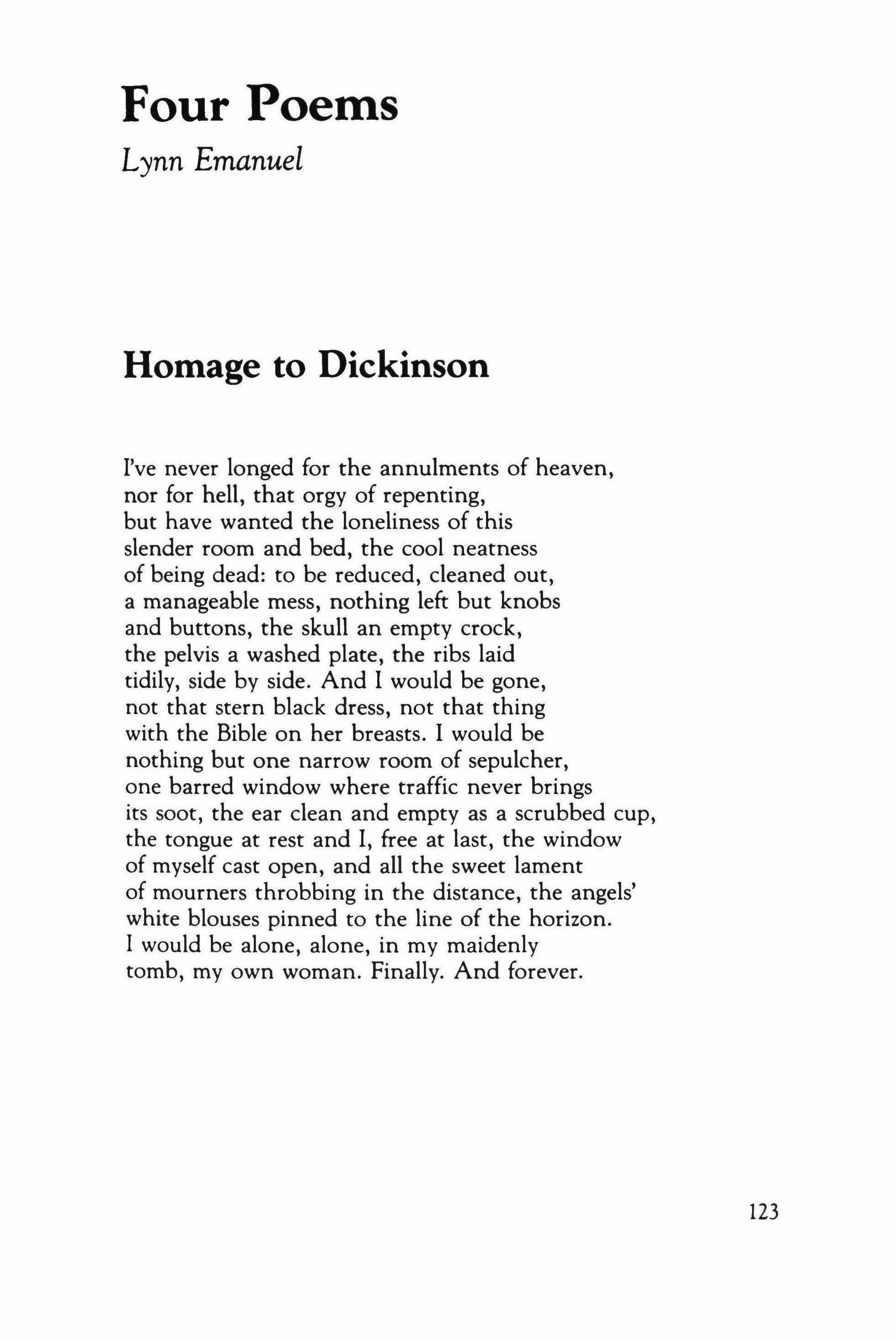
Homage to Dickinson
I've never longed for the annulments of heaven, nor for hell, that orgy of repenting, but have wanted the loneliness of this slender room and bed, the cool neatness of being dead: to be reduced, cleaned out, a manageable mess, nothing left but knobs and buttons, the skull an empty crock, the pelvis a washed plate, the ribs laid tidily, side by side. And I would be gone, not that stern black dress, not that thing with the Bible on her breasts. I would be nothing but one narrow room of sepulcher, one barred window where traffic never brings its soot, the ear clean and empty as a scrubbed cup, the tongue at rest and I, free at last, the window of myself cast open, and all the sweet lament of mourners throbbing in the distance, the angels' white blouses pinned to the line of the horizon. I would be alone, alone, in my maidenly tomb, my own woman. Finally. And forever.
123
What Dying Was Like
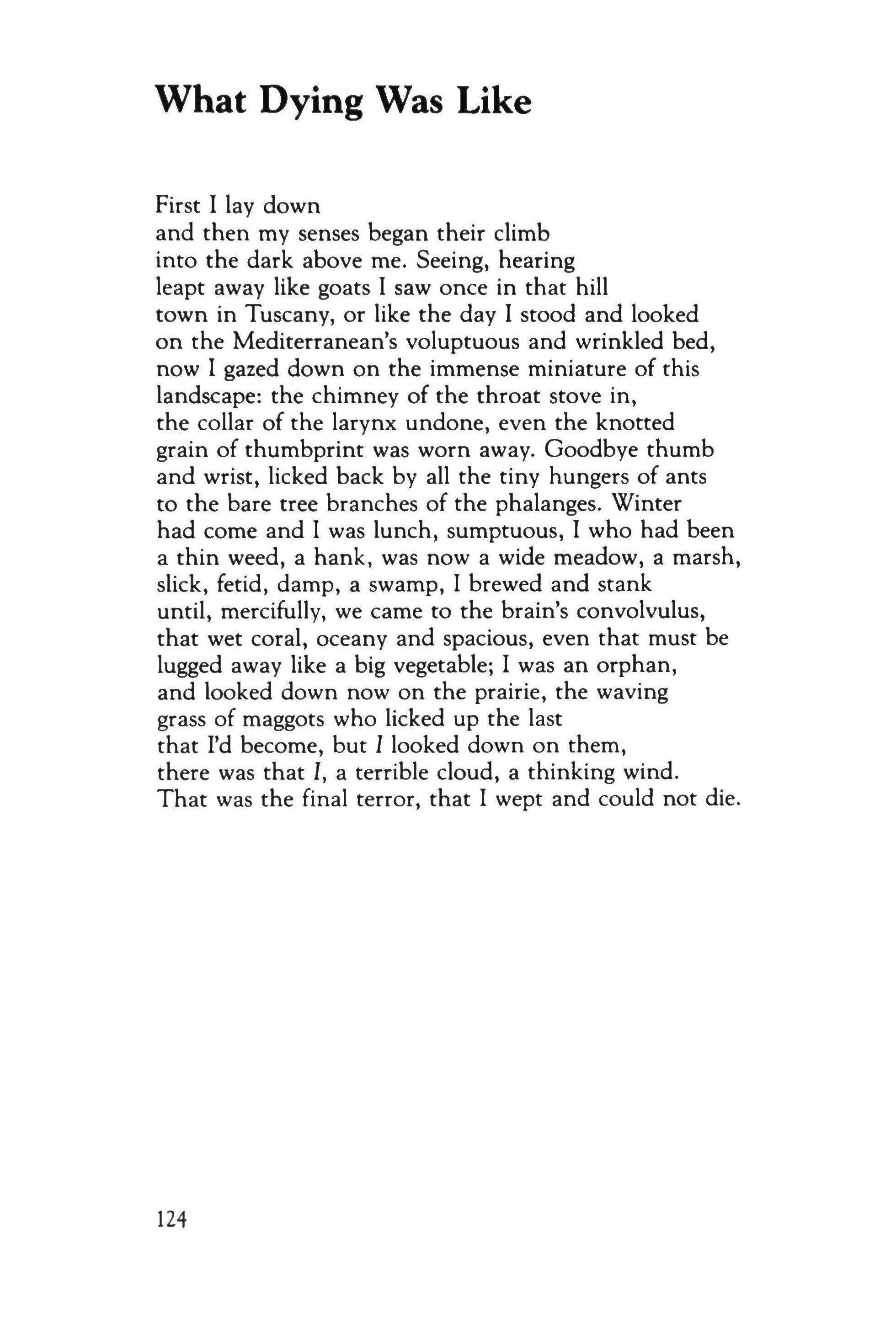
First I lay down and then my senses began their climb into the dark above me. Seeing, hearing leapt away like goats I saw once in that hill town in Tuscany, or like the day I stood and looked on the Mediterranean's voluptuous and wrinkled bed, now I gazed down on the immense miniature of this landscape: the chimney of the throat stove in, the collar of the larynx undone, even the knotted grain of thumbprint was worn away. Goodbye thumb and wrist, licked back by all the tiny hungers of ants to the bare tree branches of the phalanges. Winter had come and I was lunch, sumptuous, I who had been a thin weed, a hank, was now a wide meadow, a marsh, slick, fetid, damp, a swamp, I brewed and stank until, mercifully, we came to the brain's convolvulus, that wet coral, oceany and spacious, even that must be lugged away like a big vegetable; I was an orphan, and looked down now on the prairie, the waving grass of maggots who licked up the last that I'd become, but I looked down on them, there was that I, a terrible cloud, a thinking wind. That was the final terror, that I wept and could not die.
124
What Did You Expect?
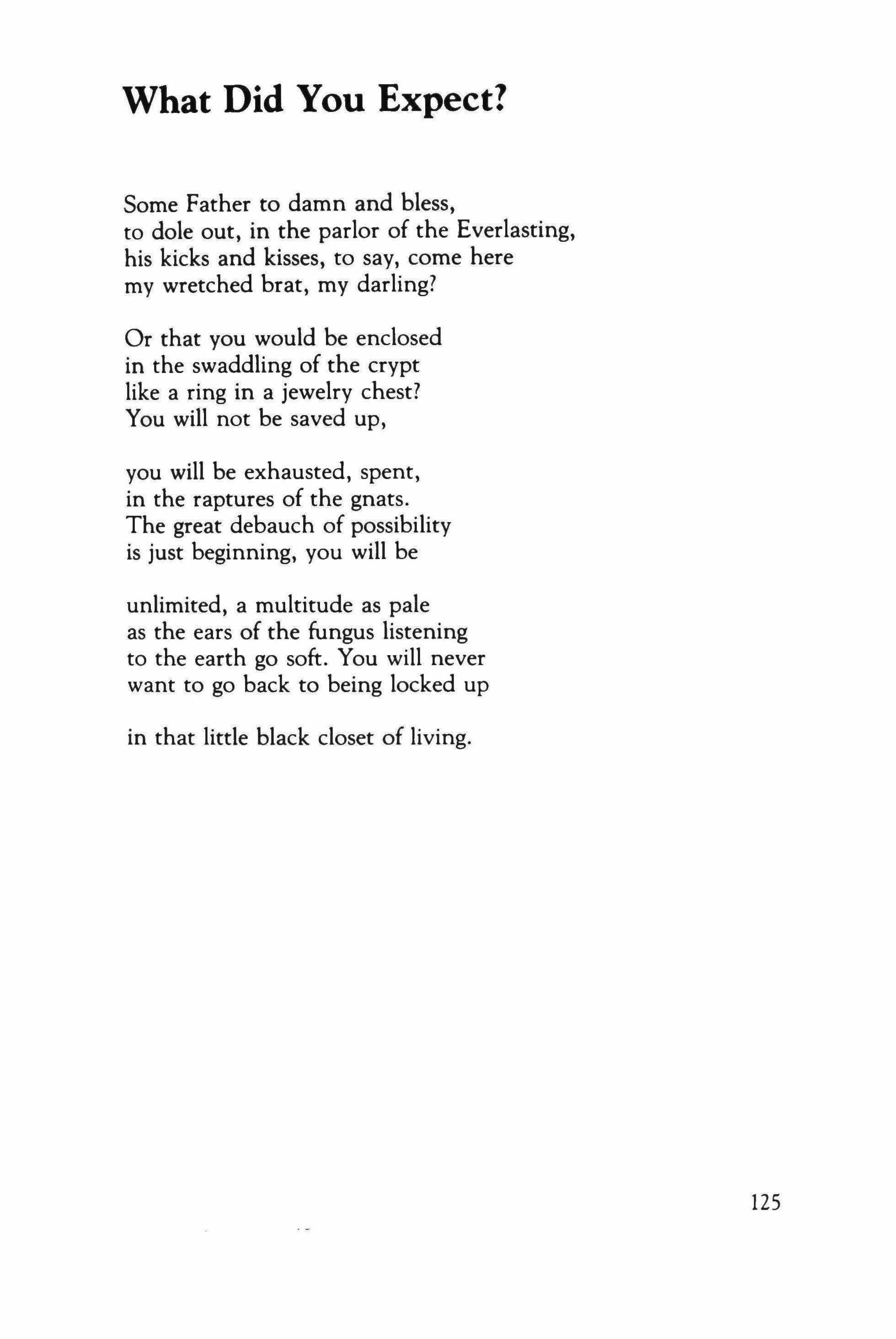
Some Father to damn and bless, to dole out, in the parlor of the Everlasting, his kicks and kisses, to say, come here my wretched brat, my darling? Or that you would be enclosed in the swaddling of the crypt like a ring in a jewelry chest? You will not be saved up, you will be exhausted, spent, in the raptures of the gnats. The great debauch of possibility is just beginning, you will be
unlimited, a multitude as pale as the ears of the fungus listening to the earth go soft. You will never want to go back to being locked up in that little black closet of living.
125
The Poet in Heaven
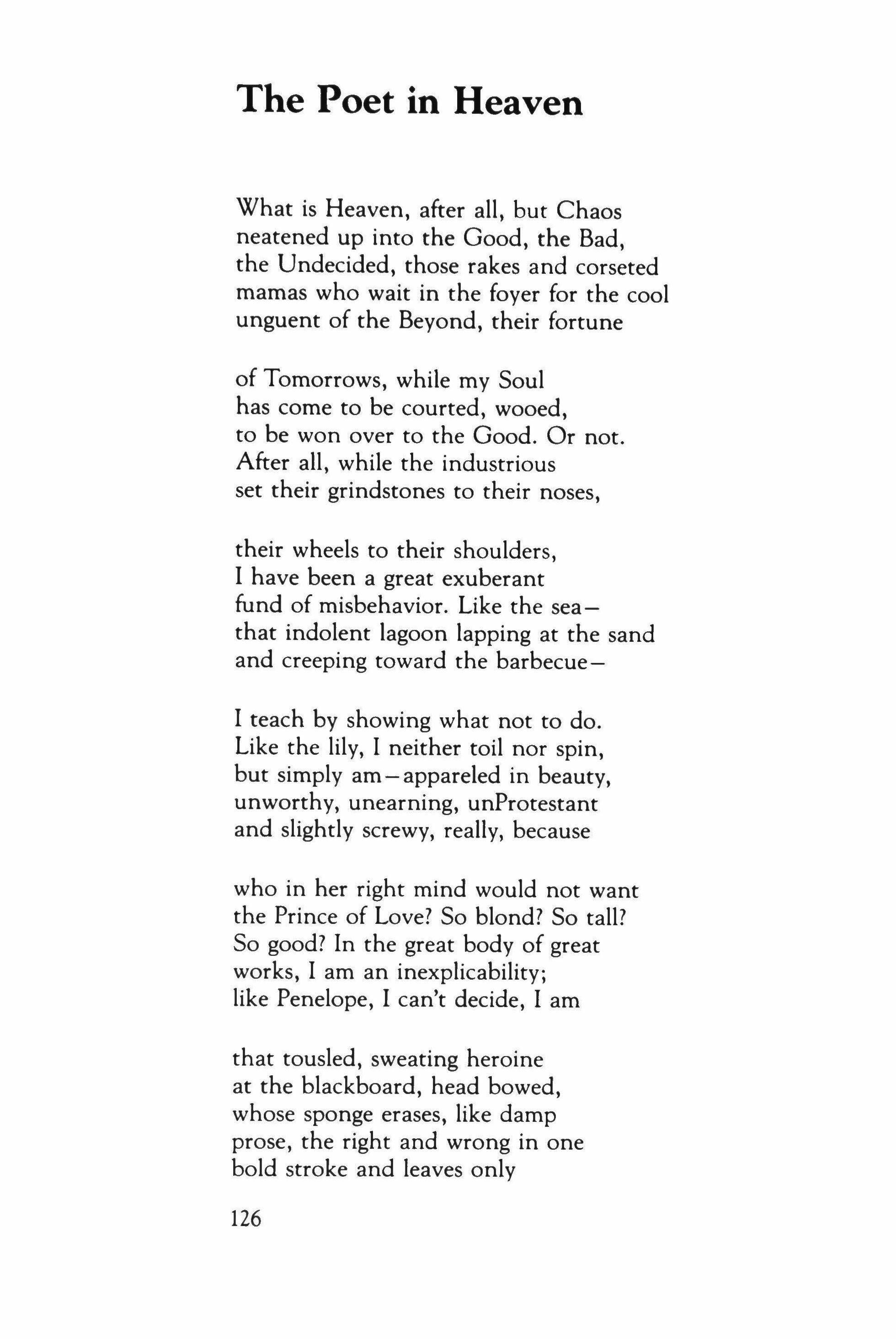
What is Heaven, after all, but Chaos neatened up into the Good, the Bad, the Undecided, those rakes and corseted mamas who wait in the foyer for the cool unguent of the Beyond, their fortune
of Tomorrows, while my Soul has corne to be courted, wooed, to be won over to the Good. Or not. After all, while the industrious set their grindstones to their noses, their wheels to their shoulders, I have been a great exuberant fund of misbehavior. Like the seathat indolent lagoon lapping at the sand and creeping toward the barbecue-
I teach by showing what not to do. Like the lily, I neither toil nor spin, but simply am-appareled in beauty, unworthy, unearning, unProtestant and slightly screwy, really, because who in her right mind would not want the Prince of Love? So blond? So tall? So good? In the great body of great works, I am an inexplicability; like Penelope, I can't decide, I am that tousled, sweating heroine at the blackboard, head bowed, whose sponge erases, like damp prose, the right and wrong in one bold stroke and leaves only
126

that blurred and blurry path between this lesson and the next, what she was supposed to know and didn't.
I am a pebble under the boots of history, a loose thread,
nothing, really, the unimportant and, therefore, immortal.
127
The Book of Speedy
Albert Goldbarth
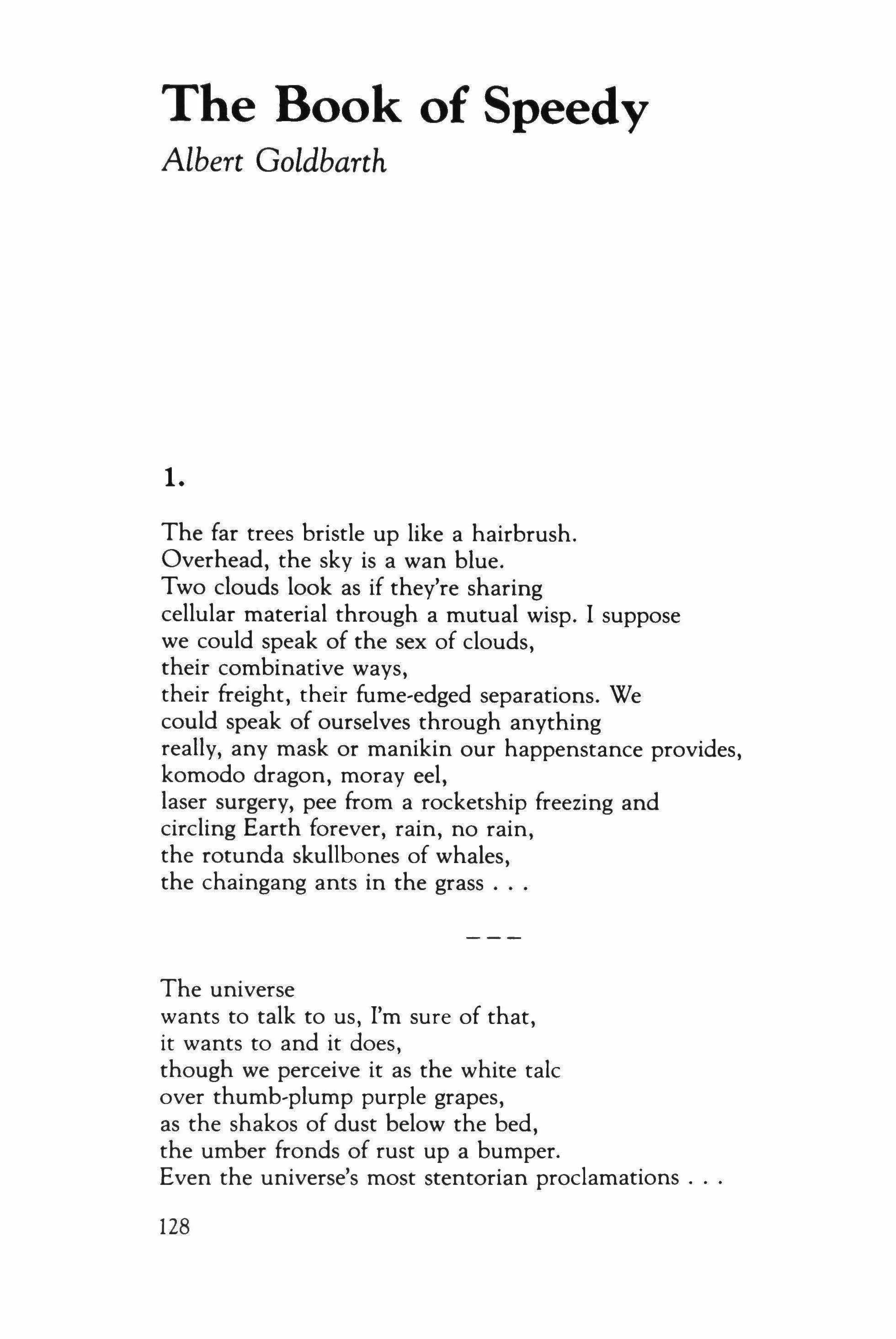
1.
The far trees bristle up like a hairbrush. Overhead, the sky is a wan blue. Two clouds look as if they're sharing cellular material through a mutual wisp. I suppose we could speak of the sex of clouds, their combinative ways, their freight, their fume-edged separations. We could speak of ourselves through anything really, any mask or manikin our happenstance provides, komodo dragon, moray eel, laser surgery, pee from a rocketship freezing and circling Earth forever, rain, no rain, the rotunda skullbones of whales, the chaingang ants in the grass
The universe wants to talk to us, I'm sure of that, it wants to and it does, though we perceive it as the white talc over thumb-plump purple grapes, as the shakos of dust below the bed, the umber fronds of rust up a bumper. Even the universe's most stentorian proclamations
128
it isn't the hog hit broadside, it's the dusklight in the rearview mirror dwindling to a needleprick.
The High Gods are my theme here, or whatever psychic monologues, or everwiffling red-shift edge of energies we call "the Gods" - but fallen, from such aboriginal nebulousness, to language: something common and salival, something, anything, though by that I mean the Gods have been recorded as speaking as well through thunder and fiery orbs as the picked-apart scat of the peacocks.
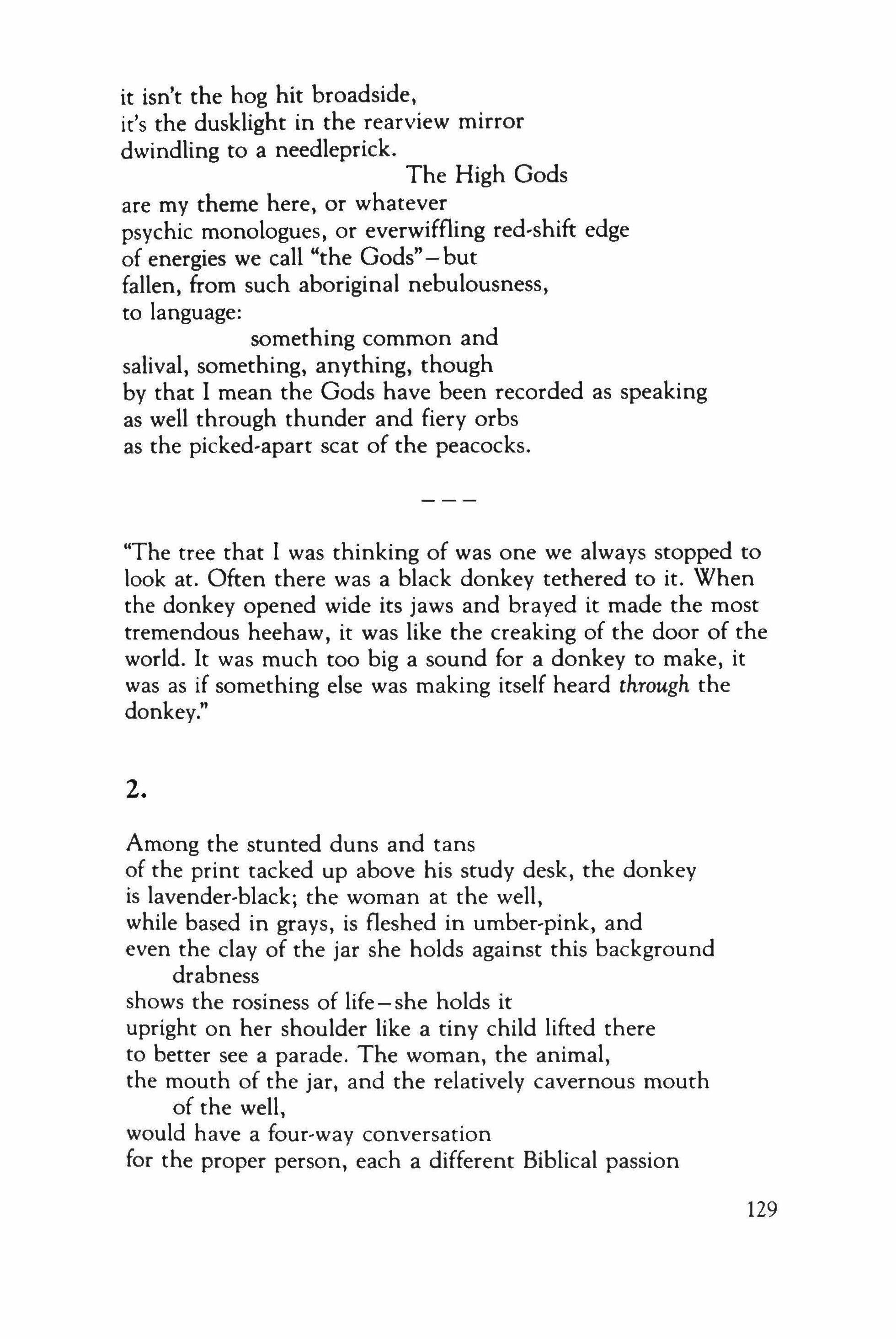
"The tree that I was thinking of was one we always stopped to look at. Often there was a black donkey tethered to it. When the donkey opened wide its jaws and brayed it made the most tremendous heehaw, it was like the creaking of the door of the world. It was much too big a sound for a donkey to make, it was as if something else was making itself heard through the donkey." 2.
Among the stunted duns and tans of the print tacked up above his study desk, the donkey is lavender-black; the woman at the well, while based in grays, is fleshed in umber-pink, and even the clay of the jar she holds against this background drabness shows the rosiness of life - she holds it upright on her shoulder like a tiny child lifted there to better see a parade. The woman, the animal, the mouth of the jar, and the relatively cavernous mouth of the well, would have a four-way conversation for the proper person, each a different Biblical passion
129
rendered, from the bedrock of this uninviting landscape, into speech, into perhaps - who knows? - prodigious, chthonian, luminous speech; but not now and not here: not for him.
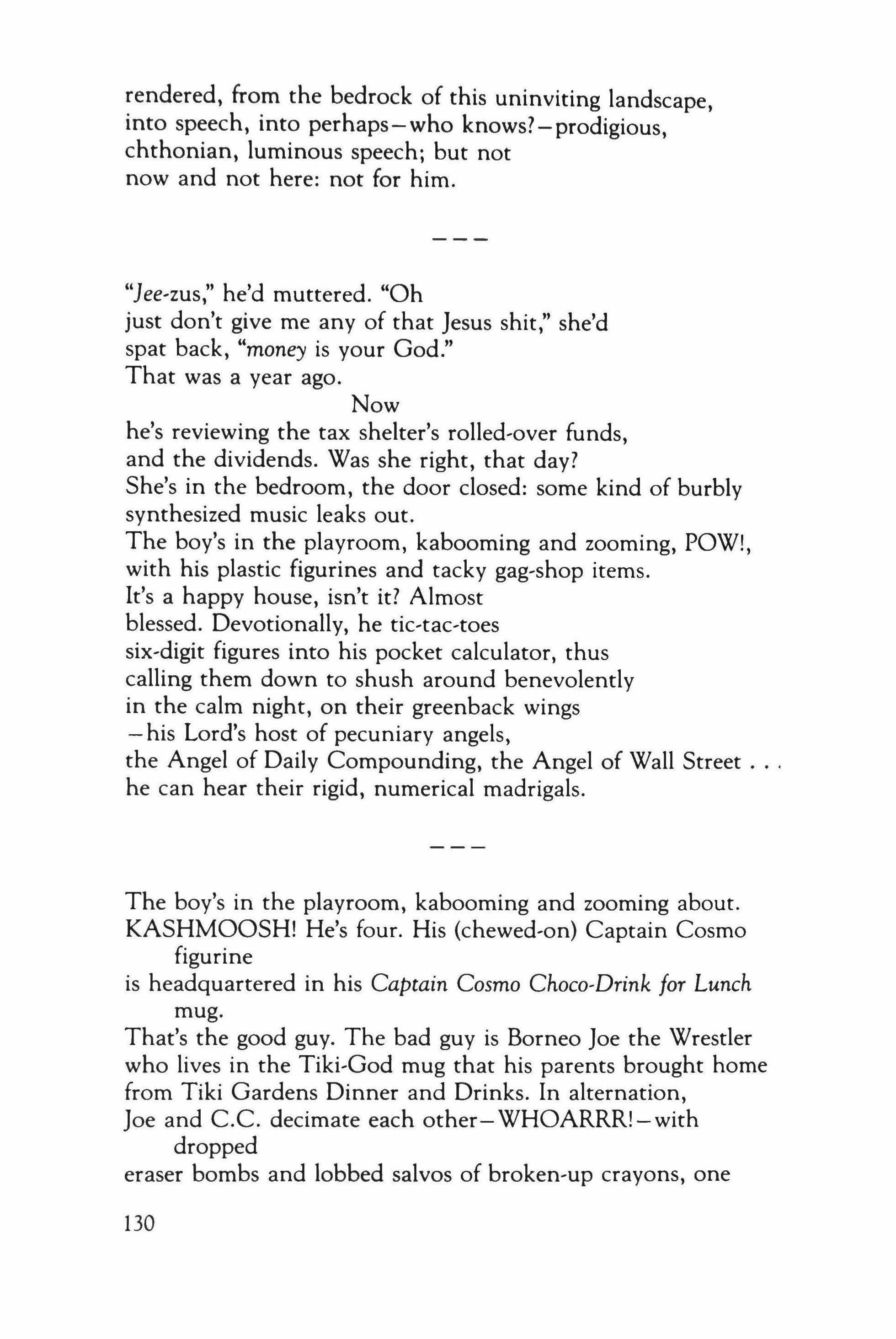
"]ee,zus," he'd muttered. "Oh just don't give me any of that Jesus shit," she'd spat back, "money is your God." That was a year ago. Now
he's reviewing the tax shelter's rolled-over funds, and the dividends. Was she right, that day?
She's in the bedroom, the door closed: some kind of burbly synthesized music leaks out.
The boy's in the playroom, kabooming and zooming, POW!, with his plastic figurines and tacky gag-shop items. It's a happy house, isn't it? Almost blessed. Devotionally, he tic-rae-toes six-digit figures into his pocket calculator, thus calling them down to shush around benevolently in the calm night, on their greenback wings - his Lord's host of pecuniary angels, the Angel of Daily Compounding, the Angel of Wall Street he can hear their rigid, numerical madrigals.
The boy's in the playroom, kabooming and zooming about.
KASHMOOSH! He's four. His (chewed-on) Captain Cosmo figurine is headquartered in his Captain Cosmo Choco,Drink for Lunch mug.
That's the good guy. The bad guy is Borneo Joe the Wrestler who lives in the Tiki-God mug that his parents brought home from Tiki Gardens Dinner and Drinks. In alternation, Joe and C.C. decimate each other-WHOARRR!-with dropped eraser bombs and lobbed salvos of broken-up crayons, one
130
of the primary pleasures of being four. I'll tell you this about the ethereal tether that, though thin, still links our lives to timelessness. The Gods - the unimaginable patterns in the atoms of stars and nervous systems - need to be imagined; we provide them Masks: Ahura Mazda, Mirhra, Jehovah, sometimes sculpting lesser masks for these Masks: out of soapstone, coral, marble, clay-with-seeds-and-pig-tusks Sandalwood was the material for Hawaiian gods, like ku,kaili,moku, the "eater of land," but trade, and visiting Christian missionaries, halted the production of these ancient holy images by the early 19th century. "Today, Hawaii is visited by millions of people hoping to find reminders of a Polynesian paradise where unspoiled people once lived beside idyllic lagoons. So the tourist trade has fitted out the old gods with new names and bogus legends. These are called 'tikis,' a Maori name that has nothing to do with Hawaii Tiki party lights in red, white, green and yellow, Tiki key chains, pop bottle openers, vases
How do you measure the fall of a God to Earth? In units of bathos.
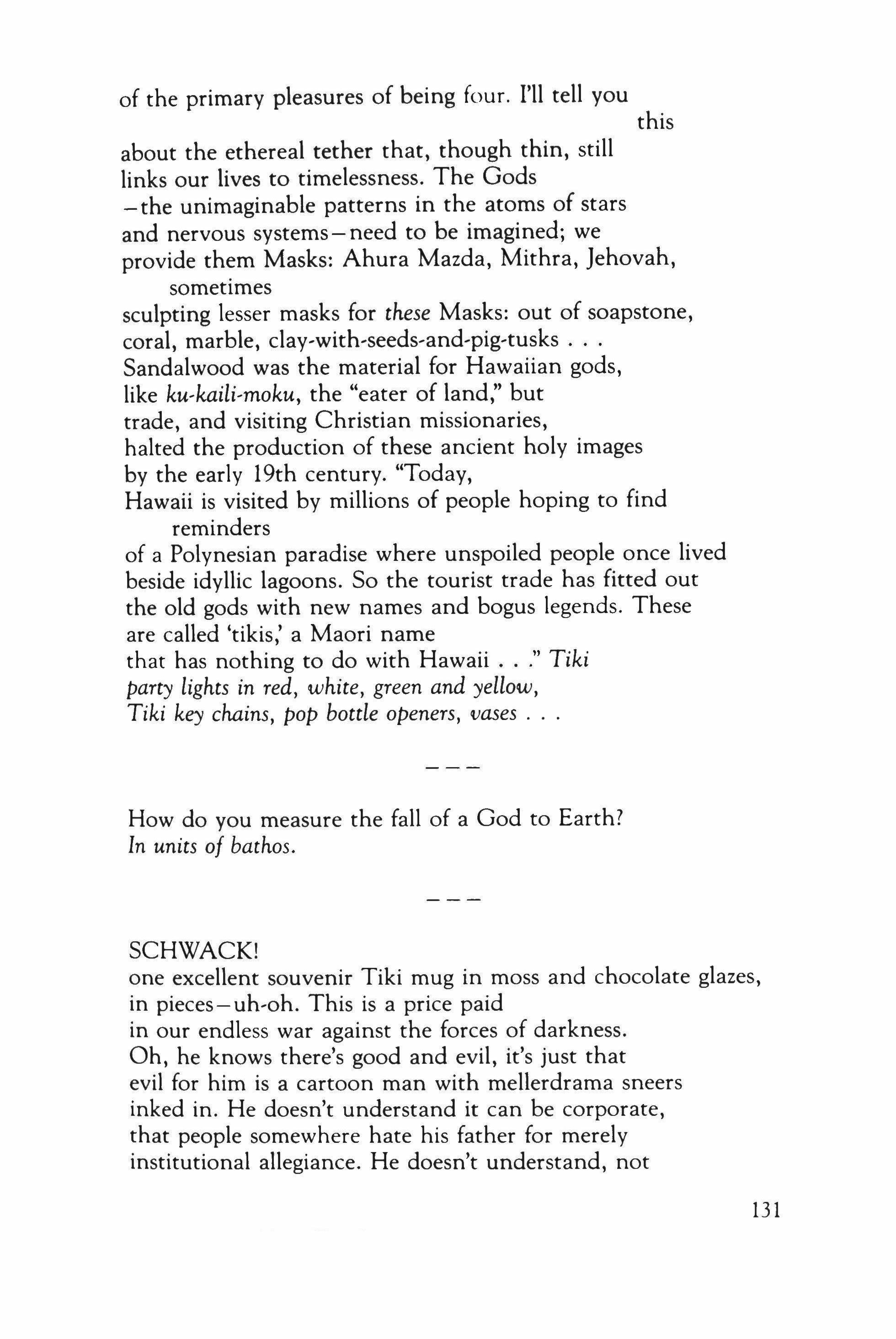
SCHWACK!
one excellent souvenir Tiki mug in moss and chocolate glazes, in pieces - uh-oh, This is a price paid in our endless war against the forces of darkness. Oh, he knows there's good and evil, it's just that evil for him is a cartoon man with mellerdrama sneers inked in. He doesn't understand it can be corporate, that people somewhere hate his father for merely institutional allegiance. He doesn't understand, not
131
yet, the ways that tragedy can be the size of a node: his mother's in the bedroom, the door closed. Goopy synthesized music washes over her rolled-up body in waves, in nearly oceanic waves, and what she'd like to be is something smooth and fetal heaved up on a beach. So she could start over then, without the cancer. Shhh. She hasn't told him yet, she's waiting until he's done for the night with his goddam stock-market pedantry, yes or maybe she won't tell anyone at all: the radiation therapy will work, it will work, then this momentary flaw in her system can be her secret. "Radiation"-whatever that is. It's her religion for now, as difficult to picture as the subtleties and precepts of religion, and the mask that makes it personal for her -she can't help it, she knows it's a joke-is the logo character used for years in his company's advertising campaigns: the beaming bulb head and zigzag voltage body of Mr. Lighr-Brite. "Hey! All day and night, It'll be all right " (and then he tips his zillion-watt derby) With LIGHT-BRITE" - his tune, his mnemonic tune she needs so much to believe in.
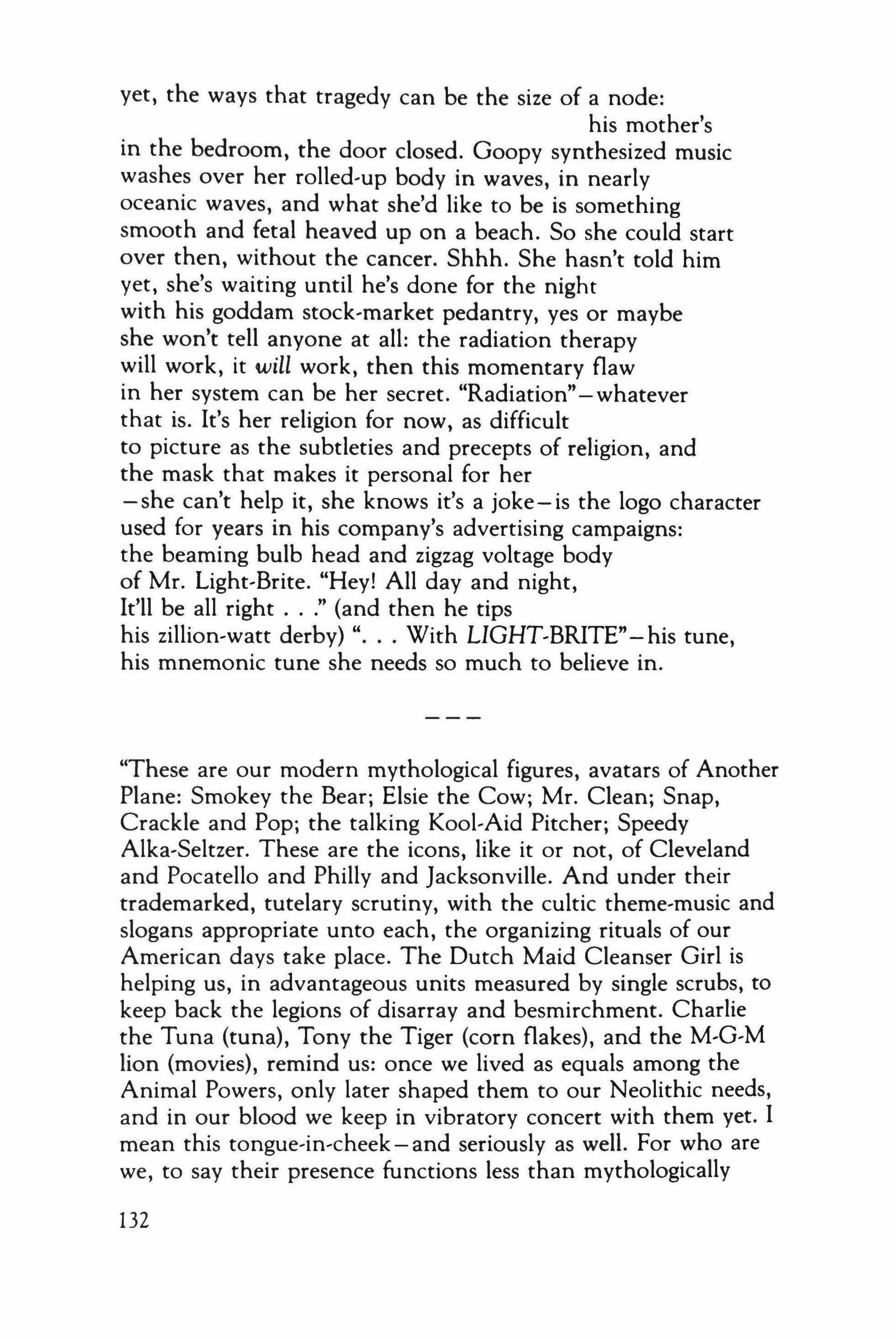
"These are our modern mythological figures, avatars of Another Plane: Smokey the Bear; Elsie the Cow; Mr. Clean; Snap, Crackle and Pop; the talking Kool-Aid Pitcher; Speedy Alka-Seltzer. These are the icons, like it or not, of Cleveland and Pocatello and Philly and Jacksonville. And under their trademarked, tutelary scrutiny, with the cultic theme-music and slogans appropriate unto each, the organizing rituals of our American days take place. The Dutch Maid Cleanser Girl is helping us, in advantageous units measured by single scrubs, to keep back the legions of disarray and besmirchment. Charlie the Tuna (tuna), Tony the Tiger (corn flakes), and the M-G-M lion (movies), remind us: once we lived as equals among the Animal Powers, only later shaped them to our Neolithic needs, and in our blood we keep in vibratory concert with them yet. 1 mean this tongue-in-cheek - and seriously as well. For who are we, to say their presence functions less than mythologically
132
because their other purpose is commercial? (Isn't any religion a part of its economic times?) Yes, who are we to say to the supplicants thronging at various niches and altars: this mouth is an oracle, this one not?"
3.
And the future is read in the slippery knots and inclines of the raw lamb liver: Deity has written in the liver, where a few will claim to understand a language otherwise spoken in effluvia, photons, and genes. And the future is read in lees, in heated cracking tortoise shells, in cast beans Divination: the divine rising out of our marketplace stuffs and shuffling its schoolroom flash cards. This is the moon, the cock, the coffin spider, the cesium atom repeat after Me.
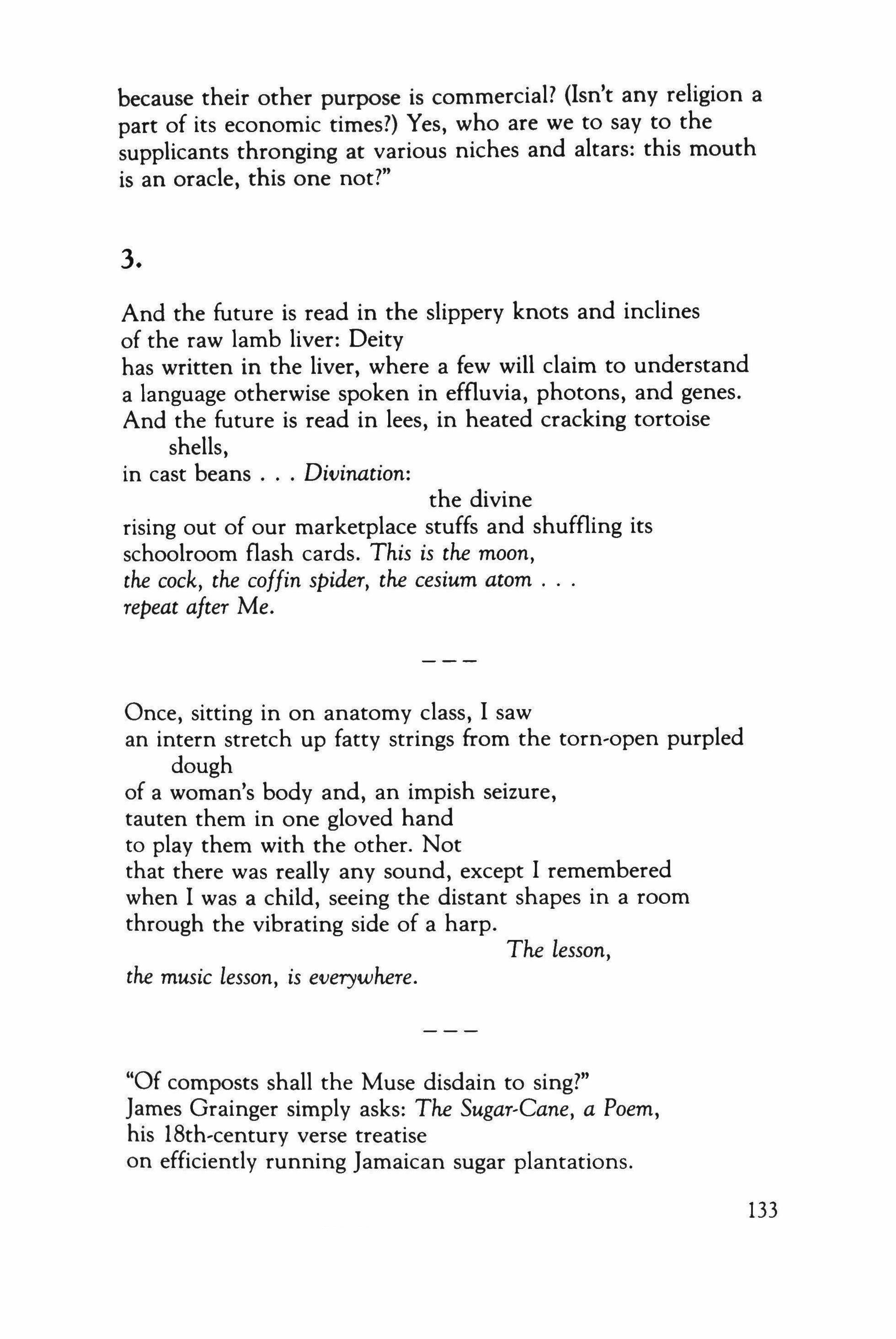
Once, sitting in on anatomy class, I saw an intern stretch up fatty strings from the torn-open purpled dough of a woman's body and, an impish seizure, tauten them in one gloved hand to play them with the other. Not that there was really any sound, except I remembered when I was a child, seeing the distant shapes in a room through the vibrating side of a harp. The lesson, the music lesson, is everywhere.
"Of composts shall the Muse disdain to sing?" James Grainger simply asks: The Sugar,Cane, a Poem, his ISth-cenrurv verse treatise on efficiently running Jamaican sugar plantations.
133
Johnson's critical response is droll, of course, and Boswell reports a performance at Reynolds's house
one night occasioned witty scoff; but, still the slipknot signatures of flies in the air around it then a season, another season, and then the earliest pale-green shoots of the sweetness Grainger knows where in a person murmurs of poesy oft first stir their effects. "Now, Muse," he continues, "let's sing of rats "
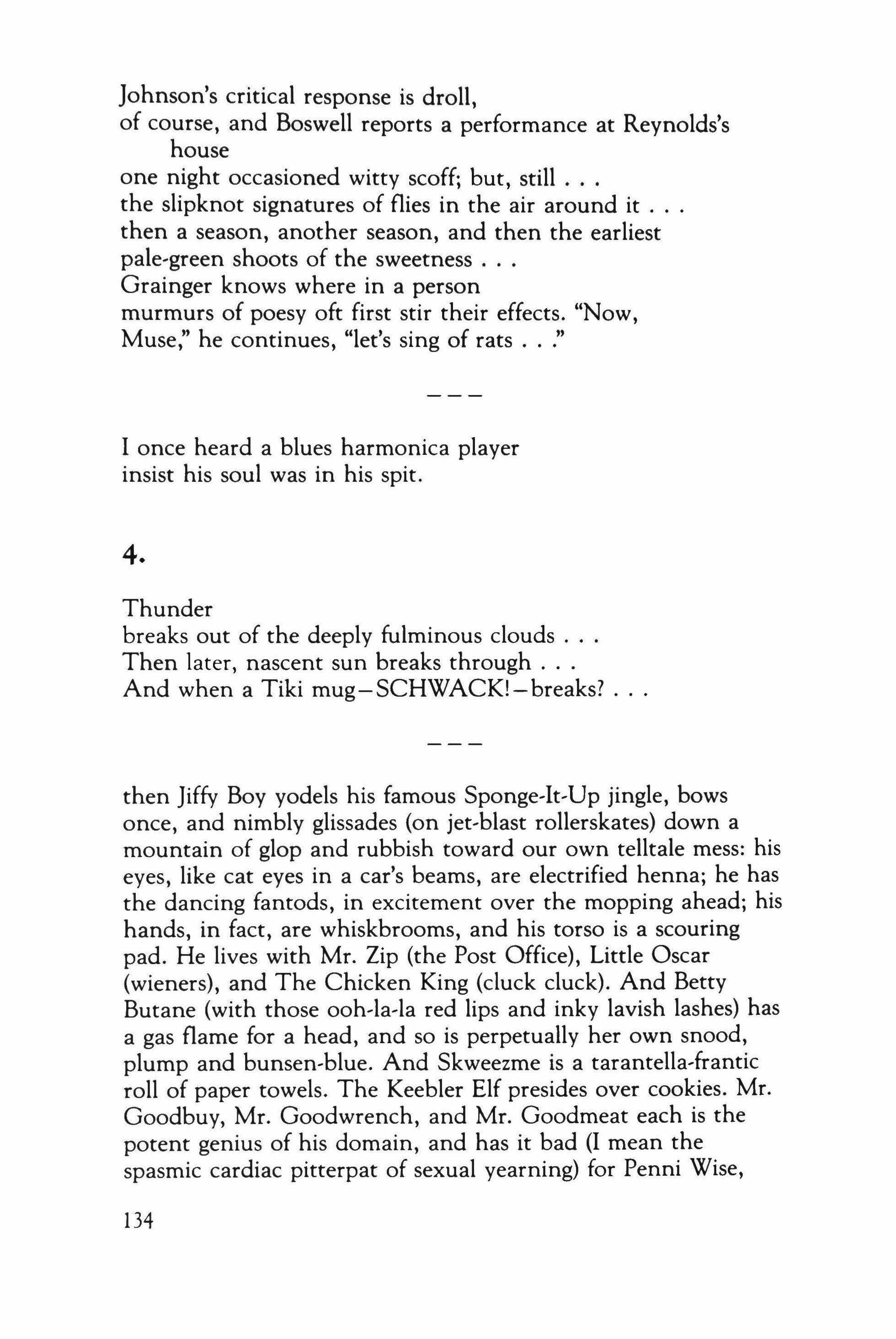
1 once heard a blues harmonica player insist his soul was in his spit.
4. Thunder breaks out of the deeply fulminous clouds Then later, nascent sun breaks through And when a Tiki mug-SCHWACK!-breaks?
then Jiffy Boy yodels his famous Sponge-It-Up jingle, bows once, and nimbly glissades (on jet-blast rollerskates) down a mountain of glop and rubbish toward our own telltale mess: his eyes, like cat eyes in a car's beams, are electrified henna; he has the dancing fantods, in excitement over the mopping ahead; his hands, in fact, are whiskbrooms, and his torso is a scouring pad. He lives with Mr. Zip (the Post Office), Little Oscar (wieners), and The Chicken King (cluck cluck). And Betty Butane (with those ooh-la-la red lips and inky lavish lashes) has a gas flame for a head, and so is perpetually her own snood, plump and bunsen-blue. And Skweezme is a tarantella-frantic roll of paper towels. The Keebler Elf presides over cookies. Mr. Goodbuy, Mr. Goodwrench, and Mr. Goodmeat each is the potent genius of his domain, and has it bad (I mean the spasmic cardiac pitterpat of sexual yearning) for Penni Wise,
134
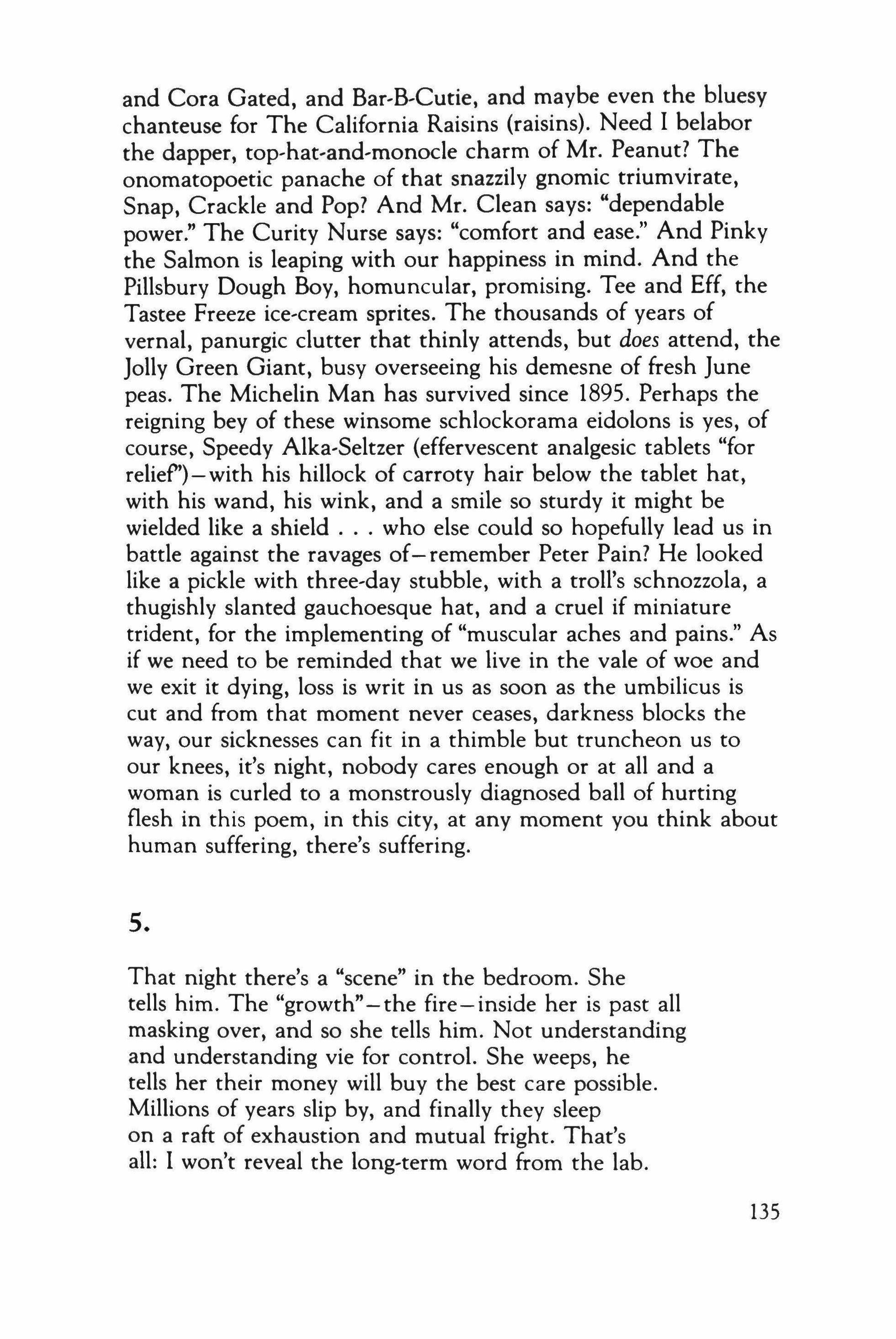
and Cora Gated, and Bar�B�Cutie, and maybe even the bluesy chanteuse for The California Raisins (raisins). Need I belabor the dapper, top-hat-and-monocle charm of Mr. Peanut? The onomatopoetic panache of that snazzilv gnomic triumvirate, Snap, Crackle and Pop? And Mr. Clean says: "dependable power." The Curity Nurse says: "comfort and ease." And Pinky the Salmon is leaping with our happiness in mind. And the Pillsbury Dough Boy, homuncular, promising. Tee and Eff, the Tastee Freeze ice-cream sprites. The thousands of years of vernal, panurgic clutter that thinly attends, but does attend, the Jolly Green Giant, busy overseeing his demesne of fresh June peas. The Michelin Man has survived since 1895. Perhaps the reigning bey of these winsome schlockorama eidolons is yes, of course, Speedy Alka-Seltzer (effervescent analgesic tablets "for relief")-with his hillock of carroty hair below the tablet hat, with his wand, his wink, and a smile so sturdy it might be wielded like a shield who else could so hopefully lead us in battle against the ravages of-remember Peter Pain? He looked like a pickle with three-dav stubble, with a troll's schnozzola, a thugishly slanted gauchoesque hat, and a cruel if miniature trident, for the implementing of "muscular aches and pains." As if we need to be reminded that we live in the vale of woe and we exit it dying, loss is writ in us as soon as the umbilicus is cut and from that moment never ceases, darkness blocks the way, our sicknesses can fit in a thimble but truncheon us to our knees, it's night, nobody cares enough or at all and a woman is curled to a monstrously diagnosed ball of hurting flesh in this poem, in this city, at any moment you think about human suffering, there's suffering.
5.
That night there's a "scene" in the bedroom. She tells him. The "growth" - the fire - inside her is past all masking over, and so she tells him. Not understanding and understanding vie for control. She weeps, he tells her their money will buy the best care possible. Millions of years slip by, and finally they sleep on a raft of exhaustion and mutual fright. That's all: I won't reveal the long-term word from the lab.
135
What I want is studying them, where they're fit together like soft tongs until morning; studying them, in their unit-of-two unconsciousness and inarticulation; even the rise of their chests is invisible now, they could be a painting. Yes, and in the tacked-up print in the upstairs study, it's much the same: the woman at the well is singing-grief? or exultation? we don't know, but singing, surely singing: in her world. For us, outside of that plane, the room is silent, dark now and silent, the woman is silent and still.
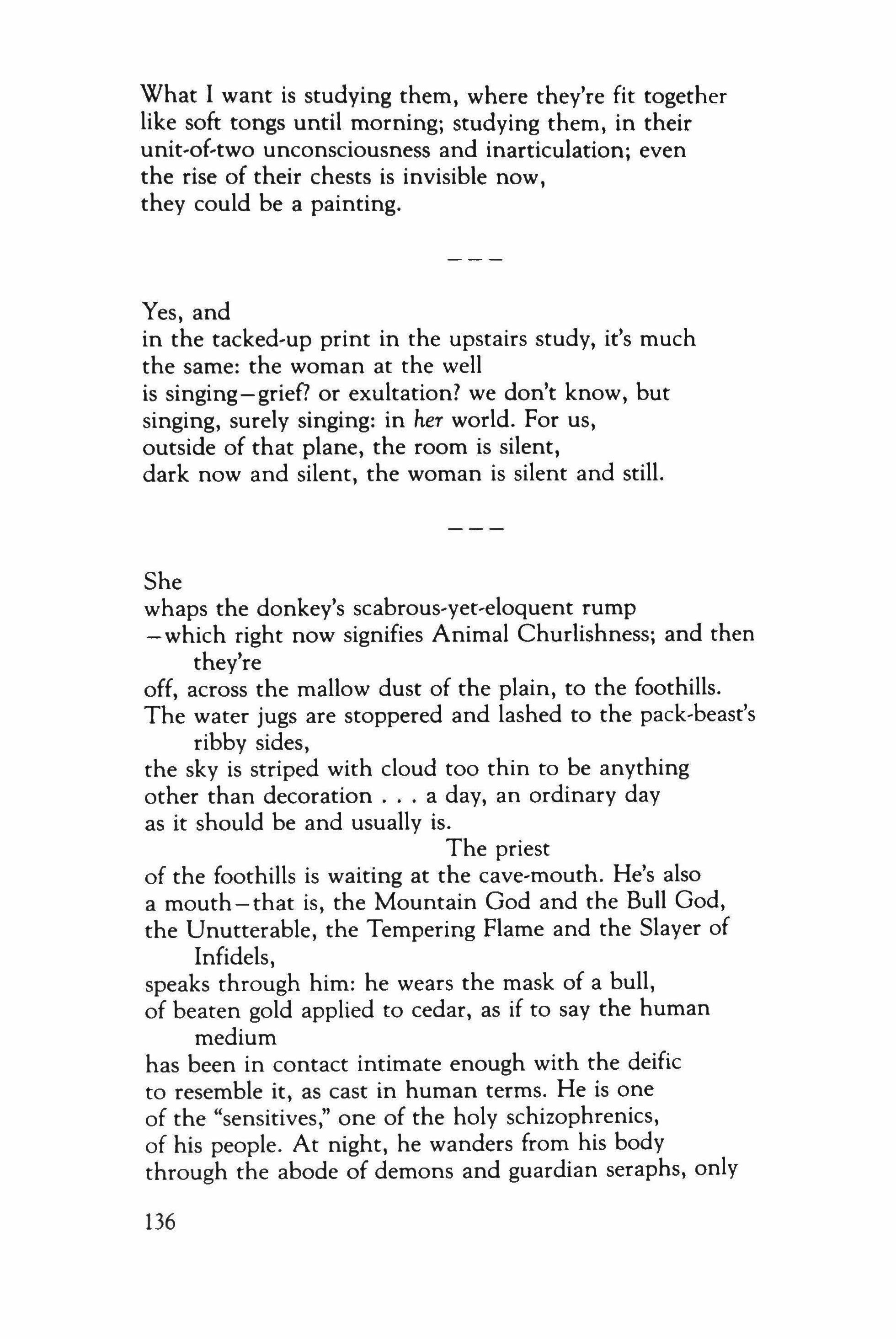
She whaps the donkey's scabrous-yet-eloquent rump - which right now signifies Animal Churlishness; and then they're off, across the mallow dust of the plain, to the foothills. The water jugs are stoppered and lashed to the pack-beast's ribbv sides, the sky is striped with cloud too thin to be anything other than decoration a day, an ordinary day as it should be and usually is.
The priest of the foothills is waiting at the cave-mouth. He's also a mouth-that is, the Mountain God and the Bull God, the Unutterable, the Tempering Flame and the Slayer of Infidels, speaks through him: he wears the mask of a bull, of beaten gold applied to cedar, as if to say the human medium has been in contact intimate enough with the deific to resemble it, as cast in human terms. He is one of the "sensitives," one of the holy schizophrenics, of his people. At night, he wanders from his body through the abode of demons and guardian seraphs, only
136
a tendril of phlogistonic substance connecting him back to his sleeping form; by day, he is known to fall to the rockfloor like a man who's had his ankle-tendons severed, and writhe there foaming, later to rise and deliver the wisdoms of the Flame and Bull.
And so she is corne for counsel: let's say a pain, let's say a mustard-grain of pain, in her belly won't let her sleep, and what does it mean? He stands in the smoke of the brazier, the mask becoming even more life,like to her eyes. It gleams-the Flame. He bellows-the Bull. He bellows, he charges around the hill-floor crazily, stumbling, smacking into the cave walls, overflowing with his roar and gesturing wildly, like a hurt thing, like a vessel touched by contents from a different world, until even the far birds, even the stunted grasses, seem to her to be symbolic of a level of Birds and Grasses paradigmatic to ours And then he drops, and cools and quiets, and then repeats what he was told in his trance. The donkey, even-she'd tethered it to a nearby brambleis braying, with the desperate edge of some ubermatrix message to its simple yowl, a message larger than it is.
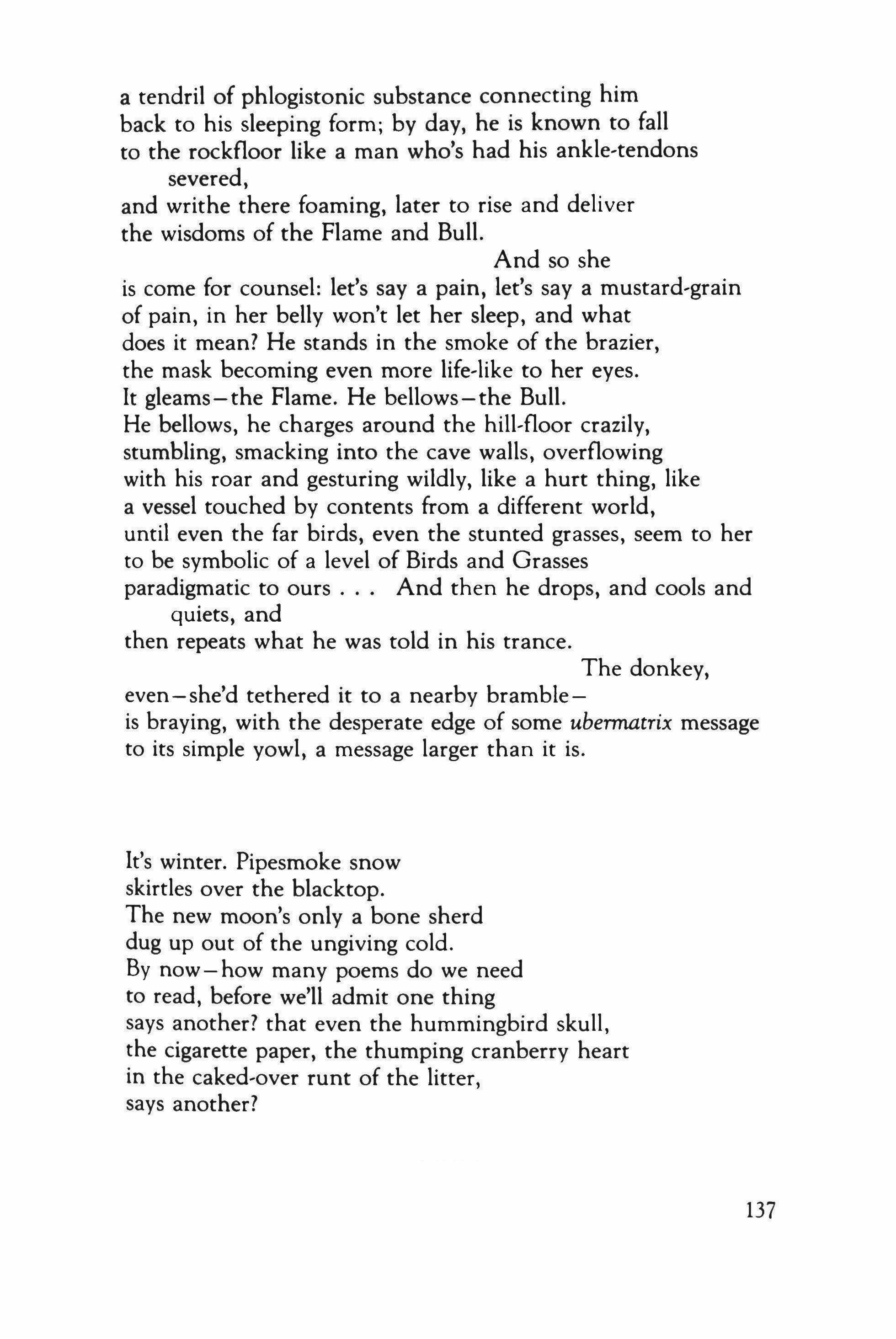
It's winter. Pipesmoke snow skirtles over the blacktop. The new moon's only a bone sherd dug up out of the ungiving cold. By now-how many poems do we need to read, before we'll admit one thing says another? that even the hummingbird skull, the cigarette paper, the thumping cranberry heart in the caked-over runt of the litter, says another?
137
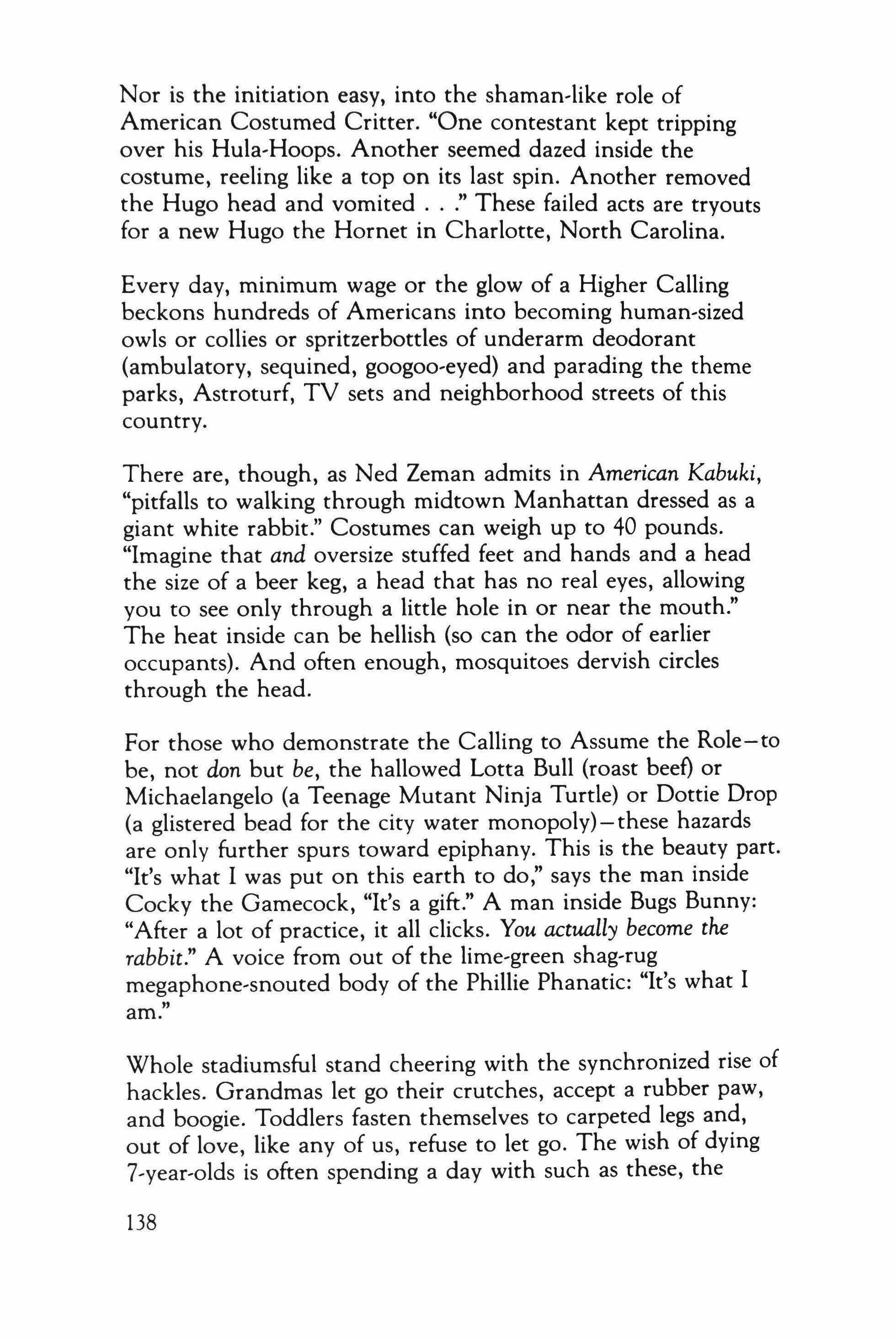
Nor is the initiation easy, into the shaman-like role of American Costumed Critter. "One contestant kept tripping over his Hula-Hoops. Another seemed dazed inside the costume, reeling like a top on its last spin. Another removed the Hugo head and vomited These failed acts are tryouts for a new Hugo the Hornet in Charlotte, North Carolina.
Every day, minimum wage or the glow of a Higher Calling beckons hundreds of Americans into becoming human-sized owls or collies or spritzerbottles of underarm deodorant (ambulatory, sequined, googoo-eyed) and parading the theme parks, Astroturf, TV sets and neighborhood streets of this country.
There are, though, as Ned Zeman admits in American Kabuki, "pitfalls to walking through midtown Manhattan dressed as a giant white rabbit." Costumes can weigh up to 40 pounds. "Imagine that and oversize stuffed feet and hands and a head the size of a beer keg, a head that has no real eyes, allowing you to see only through a little hole in or near the mouth." The heat inside can be hellish (so can the odor of earlier occupants). And often enough, mosquitoes dervish circles through the head.
For those who demonstrate the Calling to Assume the Role-to be, not don but be, the hallowed Lotta Bull (roast beef) or Michaelangelo (a Teenage Mutant Ninja Turtle) or Dottie Drop (a glistered bead for the city water monopoly)-these hazards are only further spurs toward epiphany. This is the beauty part. "It's what I was put on this earth to do," says the man inside Cocky the Gamecock, "It's a gift." A man inside Bugs Bunny: "After a lot of practice, it all clicks. You actually become the rabbit." A voice from out of the lime-green shag-rug megaphone-snouted body of the Phillie Phanatic: lilt's what I am."
Whole stadiumsful stand cheering with the synchronized rise of hackles. Grandmas let go their crutches, accept a rubber paw, and boogie. Toddlers fasten themselves to carpeted legs and, out of love, like any of us, refuse to let go. The wish of dying 7,year,0Ids is often spending a day with such as these, the
138
roosters and alligators and frolicsome mice of an alternate Earth where comic and karmic are wedded as one.
"Explains the Chicken, 'I want the Chicken to supersede the man. She can't sleep. Much too much floods in. Amid it all, she remembers holding the boy to her shoulder once, at a parade; he was as easy to hold as the jug in that picture up in the study. Captain Cosmo rode by in his Cosmobile, the boy liked that. And, near the end, not so important a figure as all of the various Mickeys and Goofies, Mr. Light-Brite slowly rolled past on a float of tinfoil wattage. "Look," she'd said, "from Daddy's office." The boy didn't care at all. But she, refusing to think of safety in terms of money, could think it as "Yes, he'll protect us."
6.
And the battle is fought in the filamental flash up someone's nerve-connected dyed-to-match prosthetic hook-of-a-hand; in the shoptalk of light and leaf sugars; the battle is on our bedsheets, is in gamma rays, is sifting through the charged ennui of the video-games arcade the battle of wholeness versus flying apart, the battle of the universe itself, and of its orrery: the beermug rings and their shotglass moons, complexly staining a bartop.
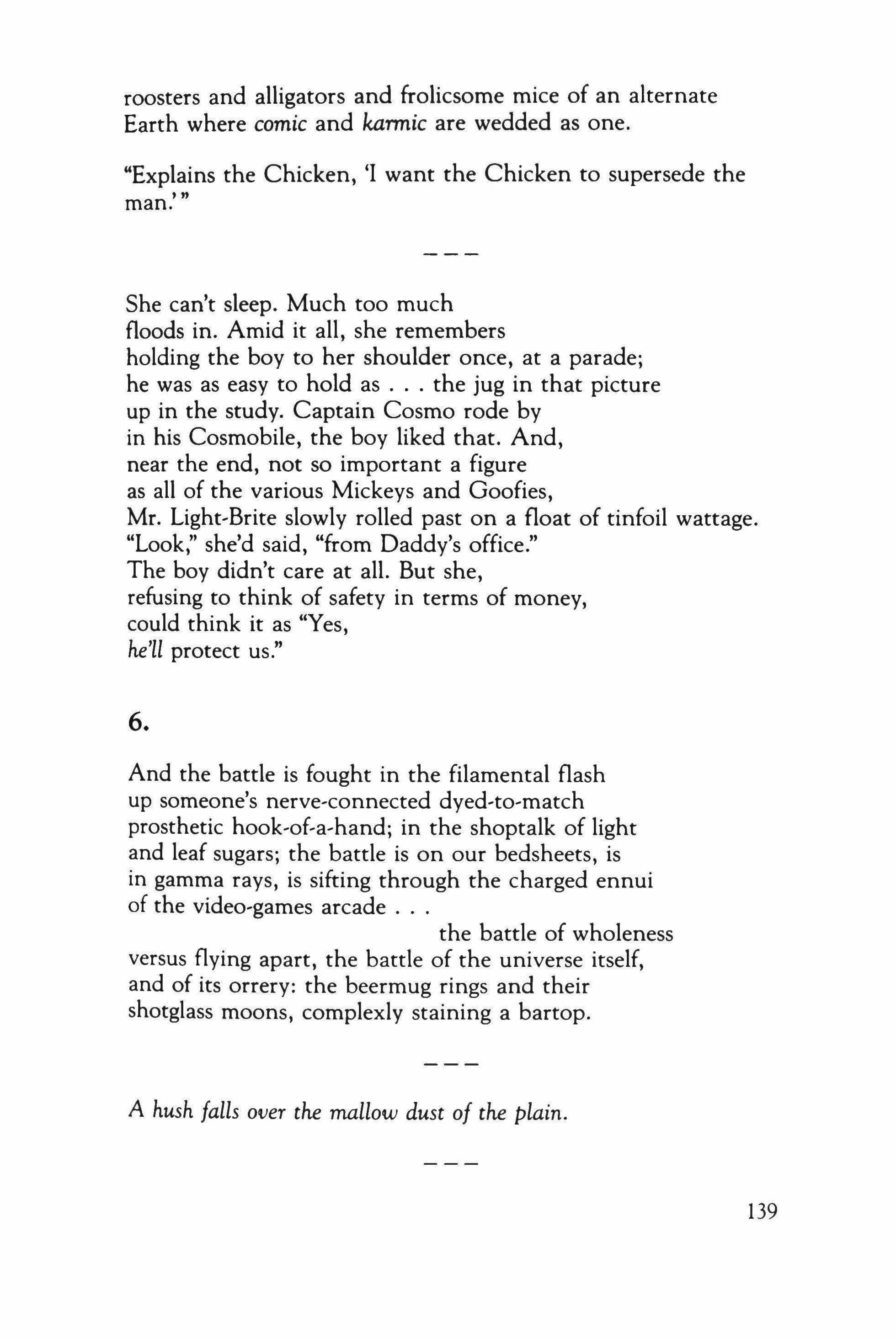
A hush falls over the mallow dust of the plain.
139
And then he awoke, and arose, and smote his keepers, and like the reeds of the waters he broke his chains, and unto him called his (plague)mates
Weal and Woe, and then did he walk the lands of the people once more, P+r Pain for I shall fear him, I dread his (evil eye) (1)
And then did he seek out conquest I shall fear him, I dread his green step P+r Pain, the in-rny-bowels-the-stabber P+r Pain, the in-rnv-chest-a-jackal/flion) (?)
Up is down, and every hand is turned against another
And then there was no safety for the people from his three-prong-lance for I shall fear his three�prong�lance
And then did the cries rise up, and the people beseeched. And it was heard; and from the central plain, and thereupon the temple of the central plain, * did Spee-d-Alka stride forth with the Tablets of Relief it is ours to swallow{? see "ingest") with works-like-magic praise him it is ours to take as directed Spee-d-Alka who rallies the forces that stay our anguish.
Then did the battle ensue.
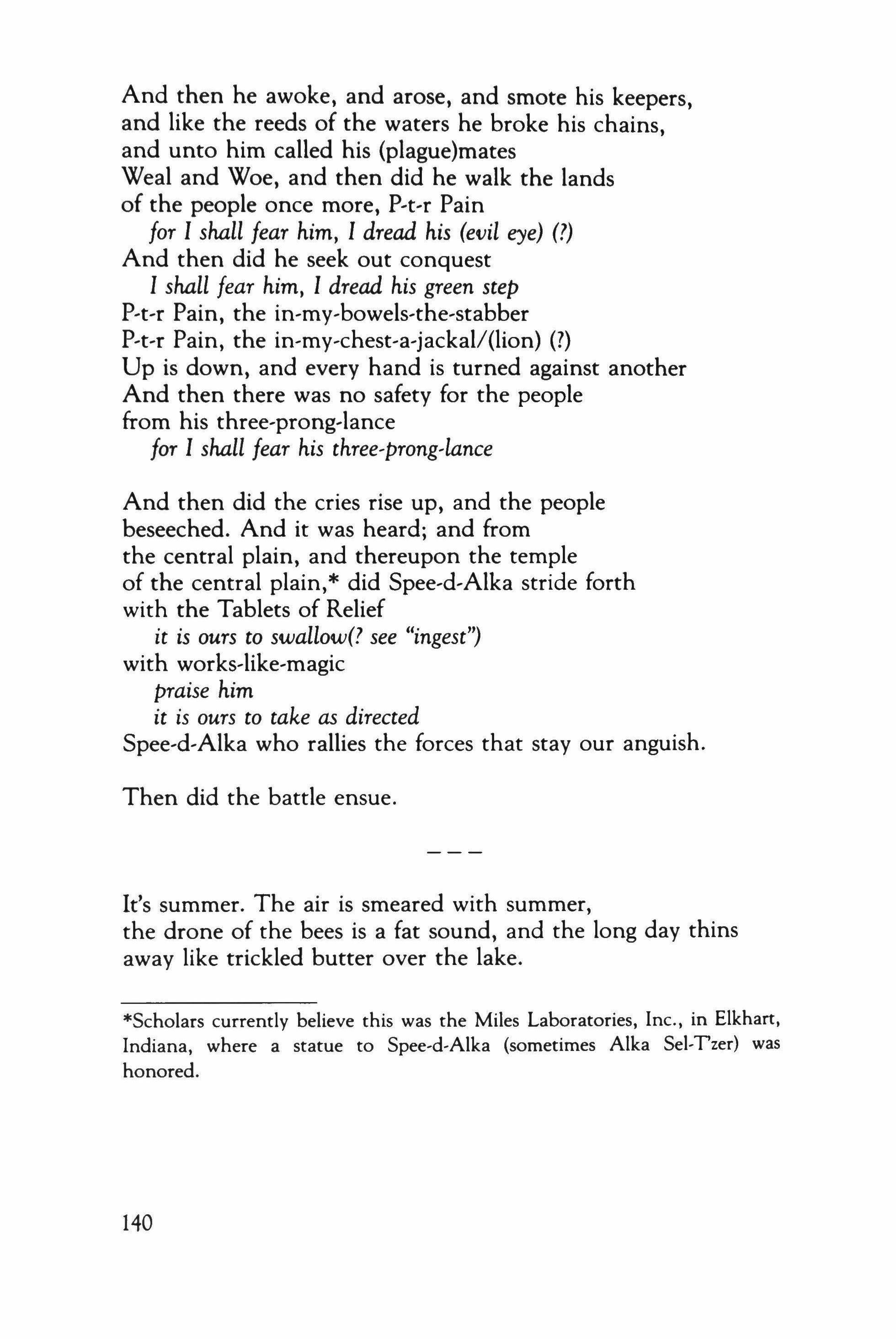
It's summer. The air is smeared with summer, the drone of the bees is a fat sound, and the long day thins away like trickled butter over the lake.
*Scholars currently believe this was the Miles Laboratories, Inc., in Elkhart, Indiana, where a statue to Spee-d-Alka {sometimes Alka Sel-Tzer} was honored.
140
The waves are involved in the project the rows of aspen boughs continue: trans/
substantiating the light, into another one of the fragmented bodies of Earth.
And the flowers close, and the awnings furl, and the alley becomes a lushly-stocked thesaurus read by the whiskers of rats.
Everywhere, the intangible is verified through its messengers. The stars speak spectra. Moses understood the announcement out of the bush.
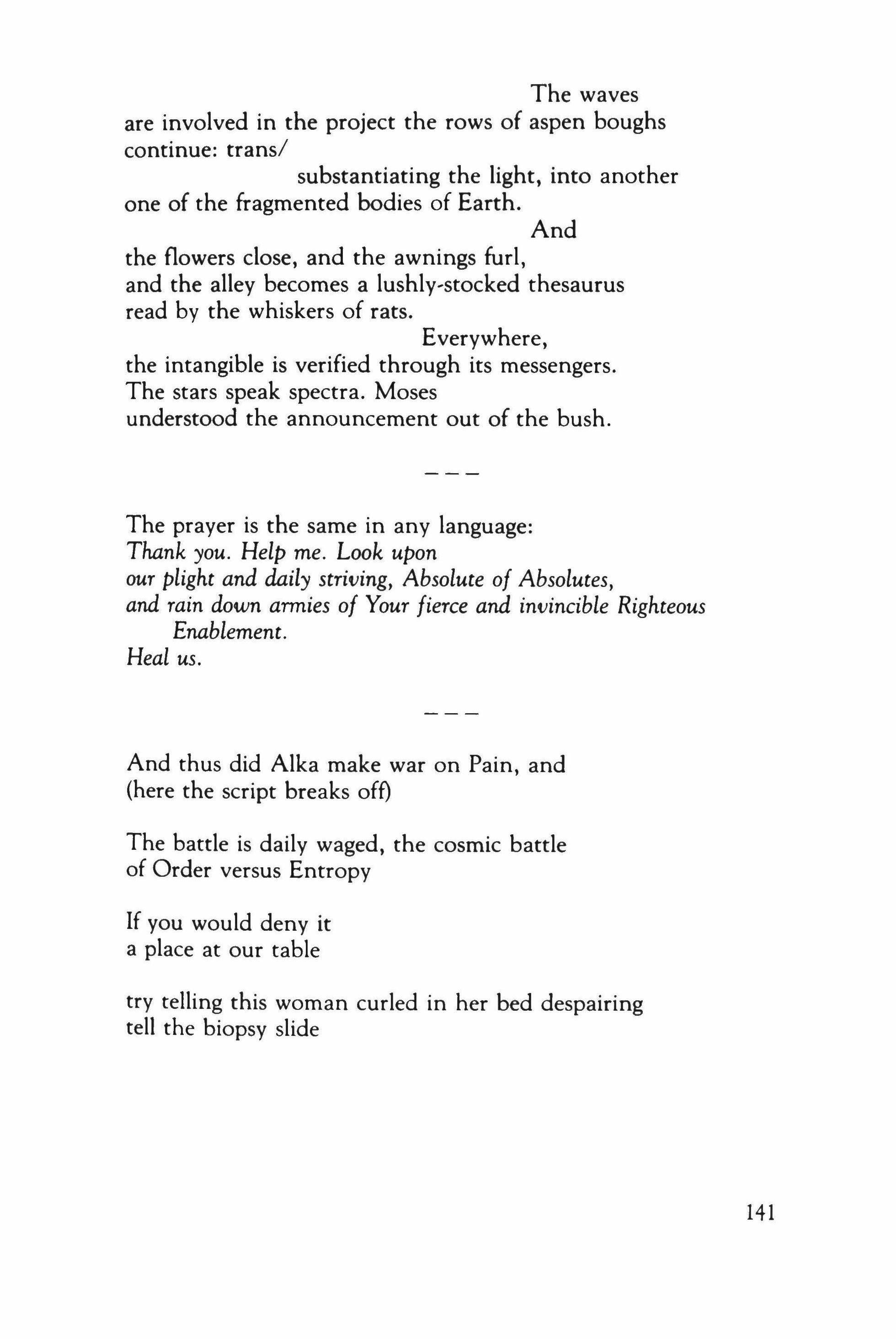
The prayer is the same in any language: Thank you. Help me. Look upon our plight and daily striving, Absolute of Absolutes, and rain down armies of Your fierce and invincible Righteous Enablement.
Heal us.
And thus did Alka make war on Pain, and (here the script breaks off)
The battle is daily waged, the cosmic battle of Order versus Entropy
If you would deny it a place at our table
try telling this woman curled in her bed despairing tell the biopsy slide
141
"The Reverend Patrick Bronte, wishing to know more about the minds of his six motherless children than he had hitherto discovered, placed each one behind a mask to make them speak with less timidity than before ,"
I've turned to watch her undone face in sleep become the spokesface
for the morphic fields of sentient life in the air, for the presto-chango physics of wave and particle, particle and wave, for the lovely broken contiguity of mind and flesh and needed to kiss it halfway wakeful, back again into being her face.
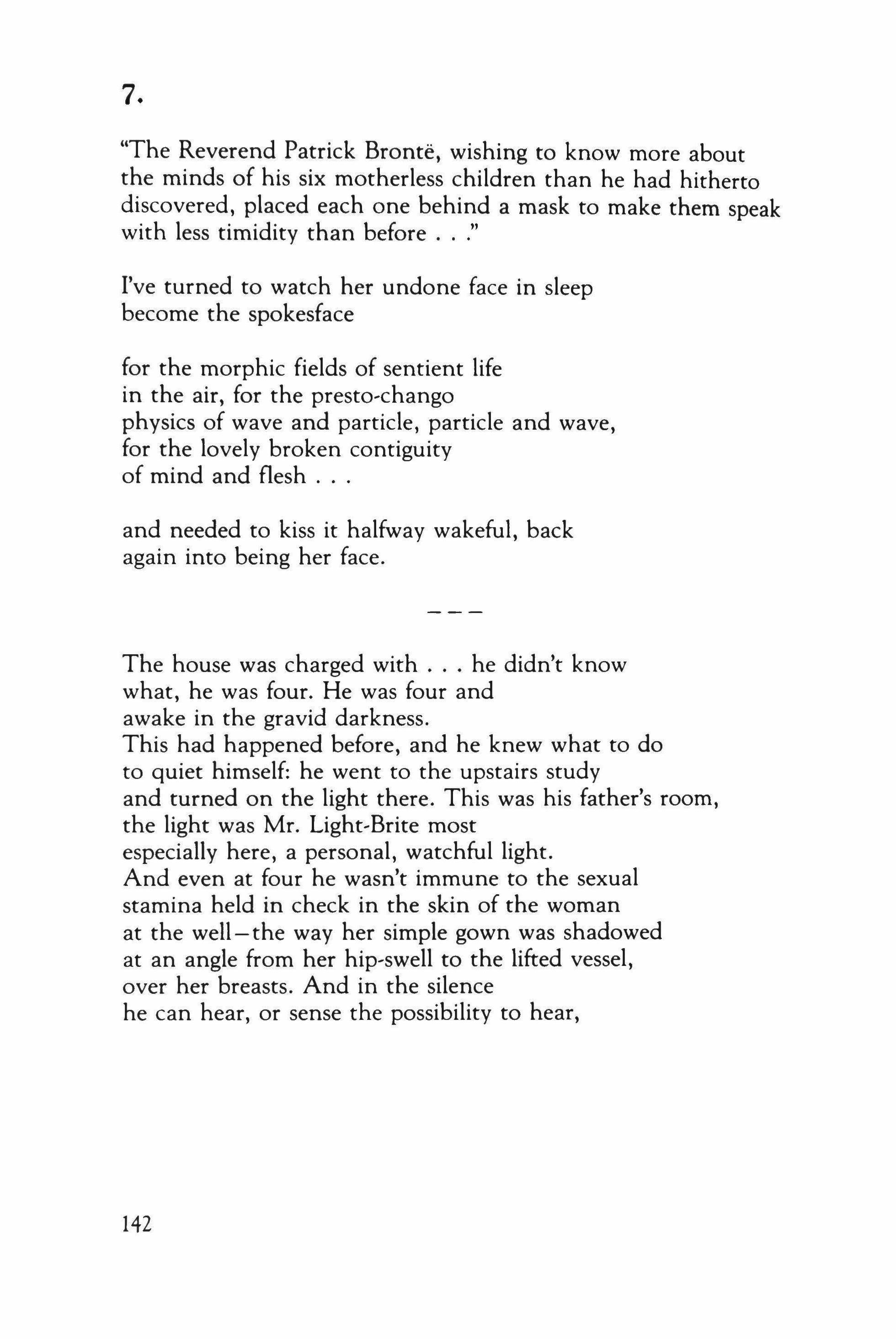
The house was charged with he didn't know what, he was four. He was four and awake in the gravid darkness, This had happened before, and he knew what to do to quiet himself: he went to the upstairs study and turned on the light there. This was his father's room, the light was Mr. Light-Brite most especially here, a personal, watchful light. And even at four he wasn't immune to the sexual stamina held in check in the skin of the woman at the well-the way her simple gown was shadowed at an angle from her hip-swell to the lifted vessel, over her breasts. And in the silence he can hear, or sense the possibility to hear,
7.
142
that world - to hear, not the clay, but the crystalline grid in clay, not the donkey, the Donkey, the prototypical wail, the first condensing gas this plain of mallow dust with its grief and brief pleasures descended from in the time before time, and was mixed to an iffy stability with the spit of stars and baked to crazing under our own relentless sun, and now out of the mouth of clay pours forth the water; and out of the woman, a song.
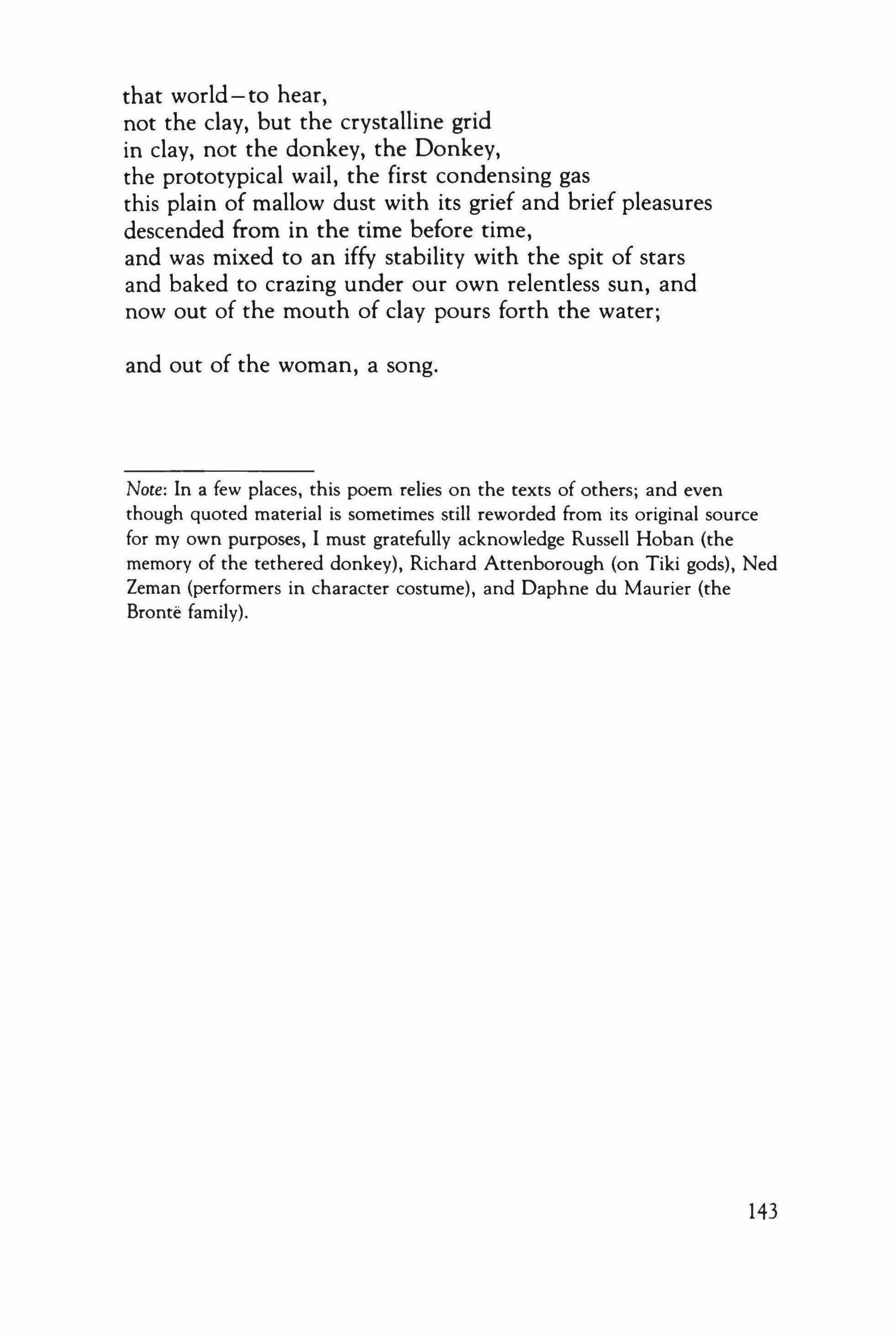
Note: In a few places, this poem relies on the texts of others; and even though quoted material is sometimes still reworded from its original source for my own purposes, I must gratefully acknowledge Russell Hoban (the memory of the tethered donkey), Richard Attenborough (on Tiki gods), Ned Zeman (performers in character costume), and Daphne du Maurier (the Bronte family).
143
FrODl Many Happy Returns
Michael Anania
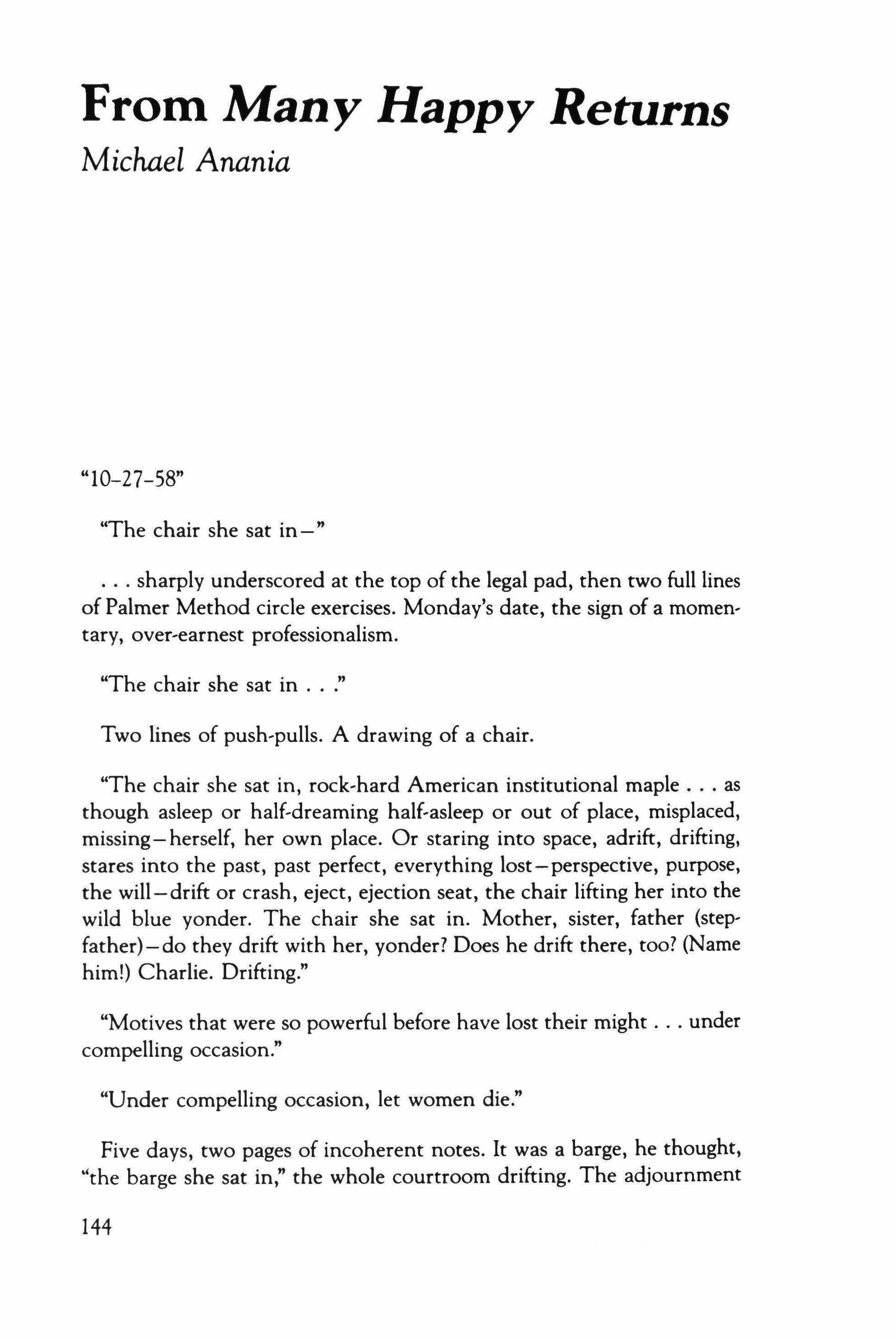
"10-27-58"
"The chair she sat in -
sharply underscored at the top of the legal pad, then two full lines of Palmer Method circle exercises. Monday's date, the sign of a momentary, over-earnest professionalism.
"The chair she sat in ."
Two lines of push-pulls. A drawing of a chair.
"The chair she sat in, rock-hard American institutional maple as though asleep or half-dreaming half-asleep or out of place, misplaced, missing-herself, her own place. Or staring into space, adrift, drifting, stares into the past, past perfect, everything lost-perspective, purpose, the will-drift or crash, eject, ejection seat, the chair lifting her into the wild blue yonder. The chair she sat in. Mother, sister, father (stepfather}-do they drift with her, yonder? Does he drift there, too? {Name himl) Charlie. Drifting."
"Motives that were so powerful before have lost their might under compelling occasion."
"Under compelling occasion, let women die."
Five days, two pages of incoherent notes. It was a barge, he thought, "the barge she sat in," the whole courtroom drifting. The adjournment
144
came as they all had with a rushing shuffle and murmur, as though a valve had been opened. The judge stood. Caril Ann was led way. Everything around him stirred, and the talk began. He thought about the deliberate hollowness of courtrooms, their intended echoes, like echoes in churches, meant to sanctify. Under compelling occasion. The matrons guiding her, each one cradling an elbow in both hands. If he could take her by the hand. If he had taken her by the hand, would he have been the murderer? The afternoon autumn light like bridge abutments through the high windows, the pale oak front of the bench bronzed with it, the high back of the judge's empty, leather chair going from soft brown to black, the clerk gathering the long ribbon of testimony into the lid of her steno-writer with meticulous deliberation, as though the words were merely sitting on the tape and, if mishandled, might slip into a rubble of loose letters at her feet. The door they had moved her through was closed.
He looked back at his legal pad - "The chair she sat in" - then at the chair itself sitting crooked, the evidence of her awkward departure. The accused, that's how they spoke of her here, a usage that seemed determined by the room's reverent echo. Caril Ann Fugate, fifteen years old and on trial for murder, and all he could manage in five days was two pages of muddled scribbling. Not that it mattered. He wasn't really a journalist. His press pass, the hotel suite, even the writing pad and the pencil in his hand were parts of his friend Buddy's charade-the Nebraska News Service, part con-game, part practical joke.
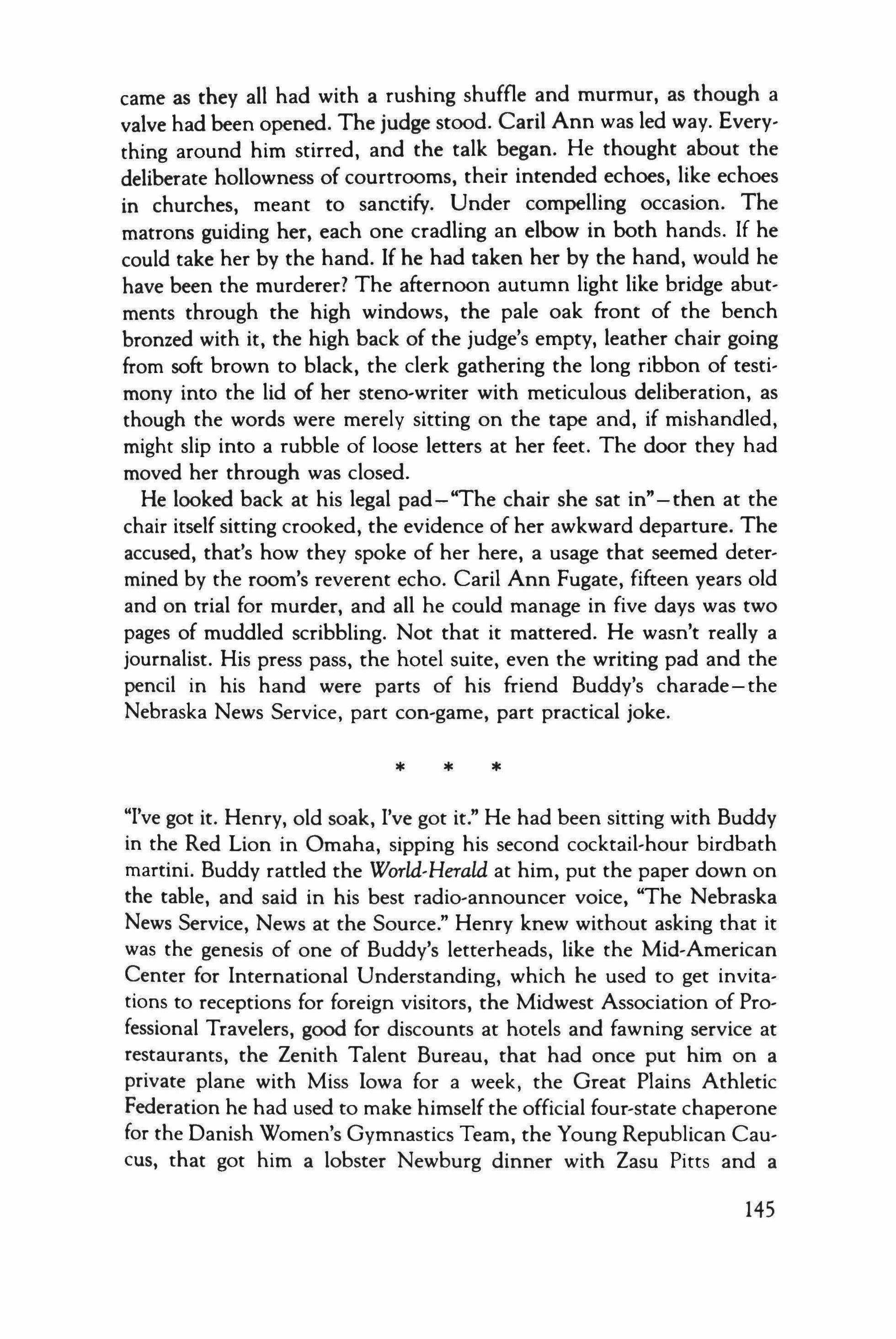
"I've got it. Henry, old soak, I've got it." He had been sitting with Buddy in the Red Lion in Omaha, sipping his second cocktail-hour birdbath martini. Buddy rattled the World-Herald at him, put the paper down on the table, and said in his best radio-announcer voice, "The Nebraska News Service, News at the Source." Henry knew without asking that it was the genesis of one of Buddy's letterheads, like the Mid-American Center for International Understanding, which he used to get invitations to receptions for foreign visitors, the Midwest Association of Professional Travelers, good for discounts at hotels and fawning service at restaurants, the Zenith Talent Bureau, that had once put him on a private plane with Miss Iowa for a week, the Great Plains Athletic Federation he had used to make himself the official four-state chaperone for the Danish Women's Gymnastics Team, the Young Republican Caucus, that got him a lobster Newburg dinner with Zasu Pitts and a
* * *
145
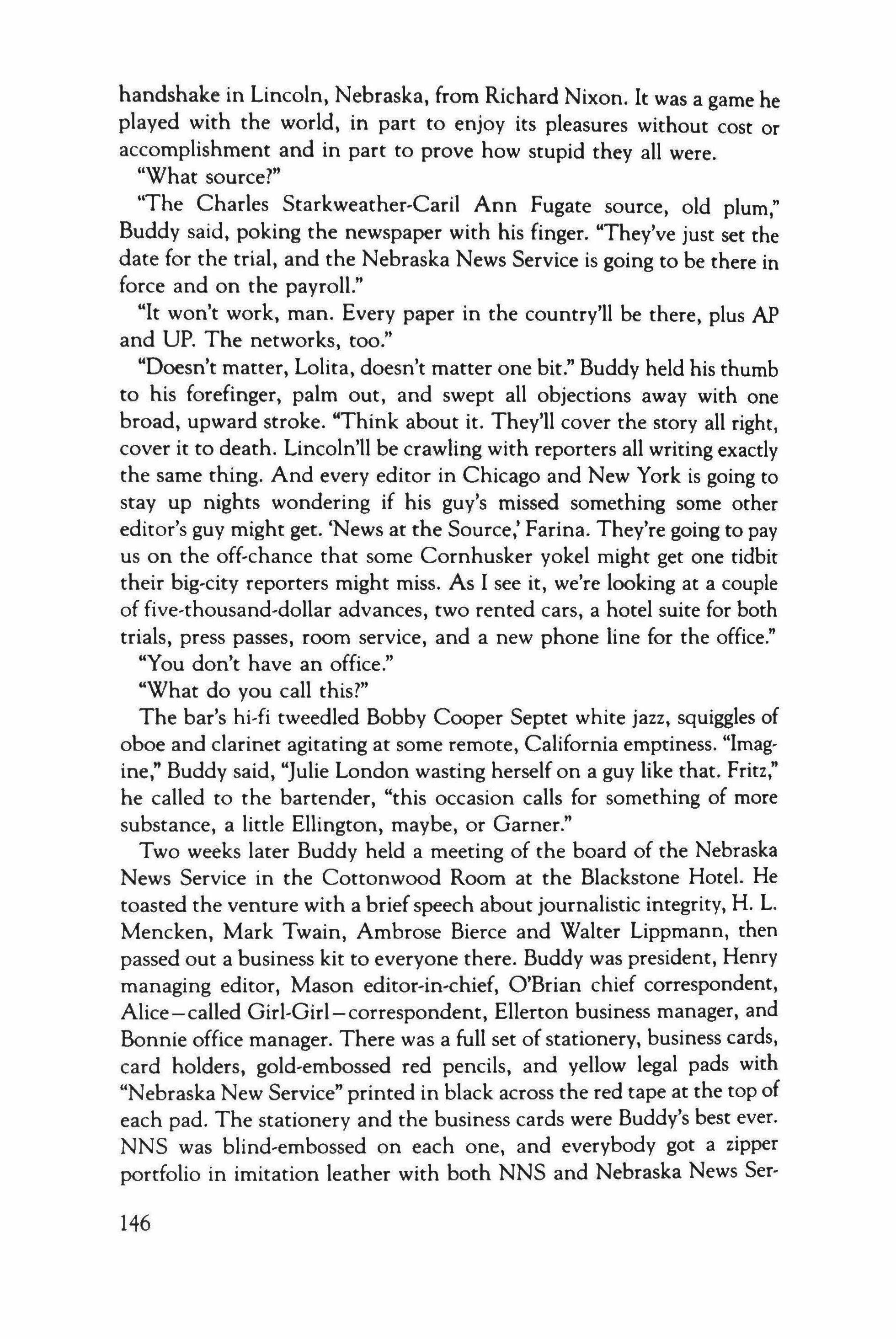
handshake in Lincoln, Nebraska, from Richard Nixon. It was a game he played with the world, in part to enjoy its pleasures without cost or accomplishment and in part to prove how stupid they all were.
"What source?"
"The Charles Starkwearher-Caril Ann Fugate source, old plum," Buddy said, poking the newspaper with his finger. "They've just set the date for the trial, and the Nebraska News Service is going to be there in force and on the payroll."
"It won't work, man. Every paper in the country'll be there, plus AP and UP. The networks, too."
"Doesn't matter, Lolita, doesn't matter one bit." Buddy held his thumb to his forefinger, palm out, and swept all objections away with one broad, upward stroke. "Think about it. They'll cover the story all right, cover it to death. Lincoln'll be crawling with reporters all writing exactly the same thing. And every editor in Chicago and New York is going to stay up nights wondering if his guy's missed something some other editor's guy might get. 'News at the Source,' Farina. They're going to pay us on the off-chance that some Cornhusker yokel might get one tidbit their big-city reporters might miss. As I see it, we're looking at a couple of five-thousand-dollar advances, two rented cars, a hotel suite for both trials, press passes, room service, and a new phone line for the office."
"You don't have an office."
"What do you call this?"
The bar's hi-fi tweedled Bobby Cooper Septet white jazz, squiggles of oboe and clarinet agitating at some remote, California emptiness. "Imagine," Buddy said, "Julie London wasting herself on a guy like that. Fritz," he called to the bartender, "this occasion calls for something of more substance, a little Ellington, maybe, or Garner."
Two weeks later Buddy held a meeting of the board of the Nebraska News Service in the Cottonwood Room at the Blackstone Hotel. He toasted the venture with a brief speech about journalistic integrity, H. L. Mencken, Mark Twain, Ambrose Bierce and Walter Lippmann, then passed out a business kit to everyone there. Buddy was president, Henry managing editor, Mason editor-in-chief, O'Brian chief correspondent, Alice-called Girl-Girl-correspondent, Ellerton business manager, and Bonnie office manager. There was a full set of stationery, business cards, card holders, gold-embossed red pencils, and yellow legal pads with "Nebraska New Service" printed in black across the red tape at the top of each pad. The stationery and the business cards were Buddy's best ever. NNS was blind-embossed on each one, and everybody got a zipper portfolio in imitation leather with both NNS and Nebraska News Ser-
146
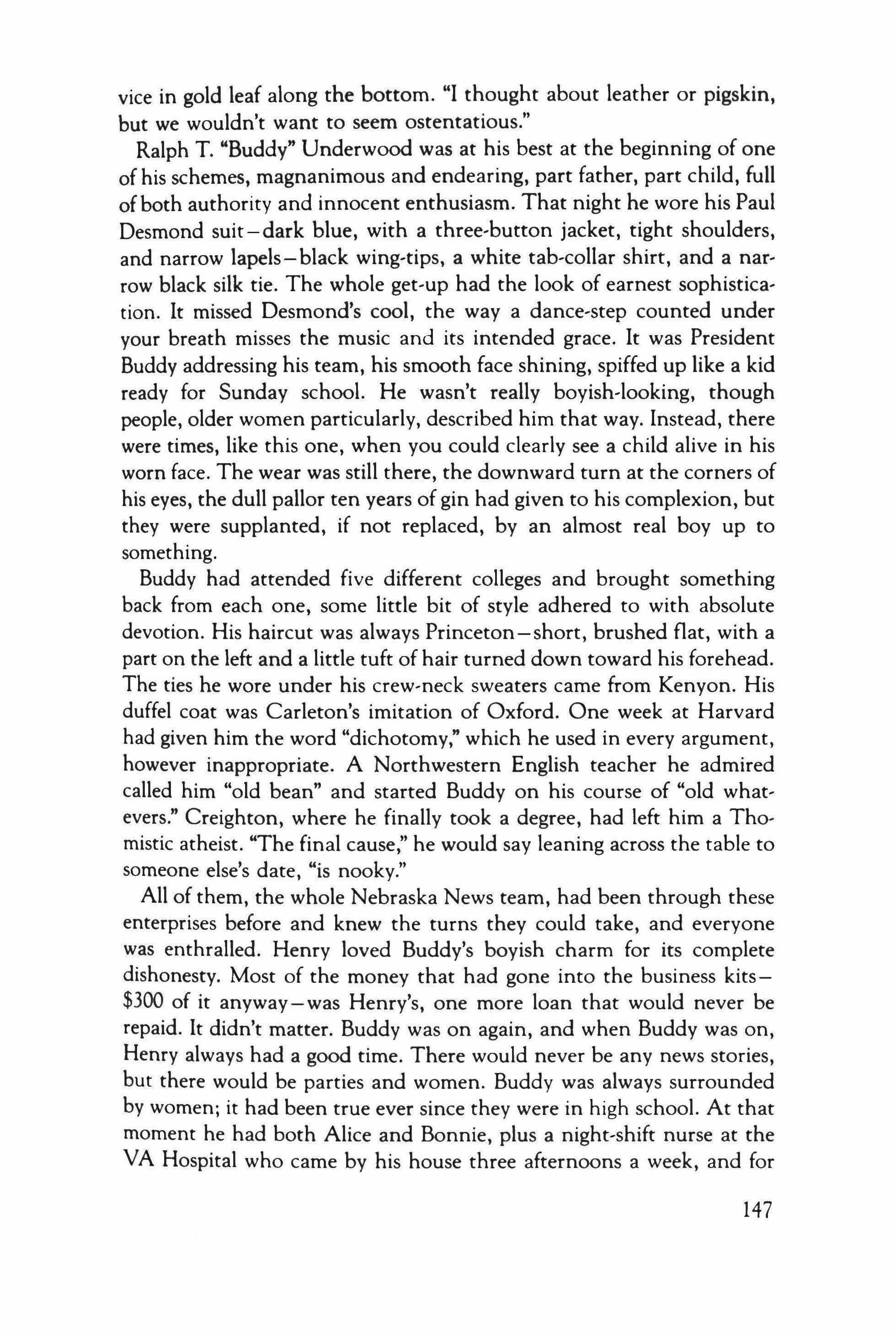
vice in gold leaf along the bottom. "I thought about leather or pigskin, but we wouldn't want to seem ostentatious."
Ralph T. "Buddy" Underwood was at his best at the beginning of one of his schemes, magnanimous and endearing, part father, part child, full ofboth authority and innocent enthusiasm. That night he wore his Paul Desmond suit-dark blue, with a three-button jacket, tight shoulders, and narrow lapels-black wing-tips, a white tab-collar shirt, and a narrow black silk tie. The whole get-up had the look of earnest sophistication. It missed Desmond's cool, the way a dance-step counted under your breath misses the music and its intended grace. It was President Buddy addressing his team, his smooth face shining, spiffed up like a kid ready for Sunday school. He wasn't really boyish-looking, though people, older women particularly, described him that way. Instead, there were times, like this one, when you could clearly see a child alive in his worn face. The wear was still there, the downward turn at the corners of his eyes, the dull pallor ten years of gin had given to his complexion, but they were supplanted, if not replaced, by an almost real boy up to something.
Buddy had attended five different colleges and brought something back from each one, some little bit of style adhered to with absolute devotion. His haircut was always Princeton-short, brushed flat, with a part on the left and a little tuft of hair turned down toward his forehead. The ties he wore under his crew-neck sweaters came from Kenyon. His duffel coat was Carleton's imitation of Oxford. One week at Harvard had given him the word "dichotomy," which he used in every argument, however inappropriate. A Northwestern English teacher he admired called him "old bean" and started Buddy on his course of "old whatevers." Creighton, where he finally took a degree, had left him a Thomistic atheist. "The final cause," he would say leaning across the table to someone else's date, "is nooky."
All of them, the whole Nebraska News team, had been through these enterprises before and knew the turns they could take, and everyone was enthralled. Henry loved Buddy's boyish charm for its complete dishonesty. Most of the money that had gone into the business kits$300 of it anyway - was Henry's, one more loan that would never be repaid. It didn't matter. Buddy was on again, and when Buddy was on, Henry always had a good time. There would never be any news stories, but there would be parties and women. Buddy was always surrounded by women; it had been true ever since they were in high school. At that moment he had both Alice and Bonnie, plus a night-shift nurse at the VA Hospital who came by his house three afternoons a week, and for
147
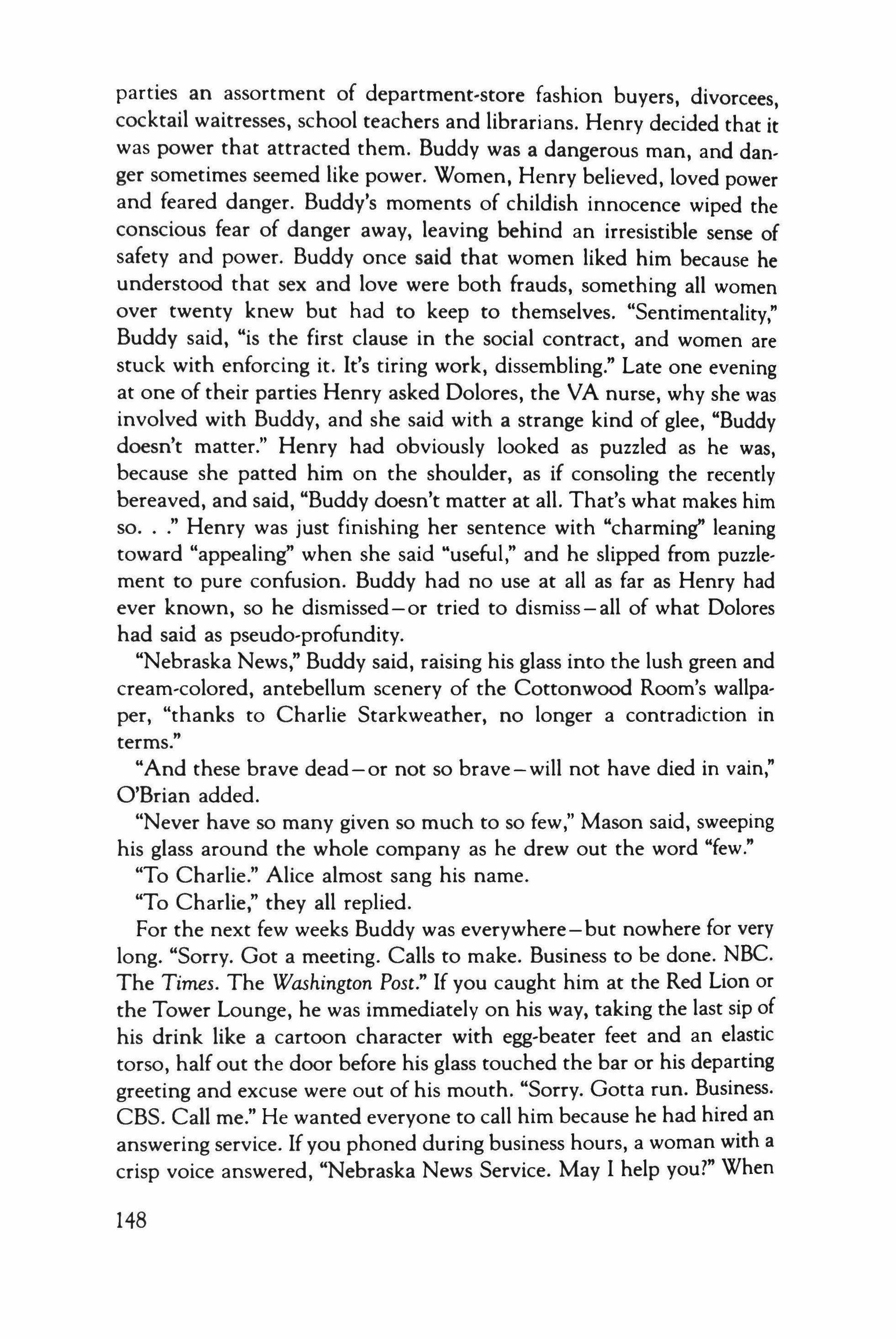
parties an assortment of department-store fashion buyers, divorcees, cocktail waitresses, school teachers and librarians. Henry decided that it was power that attracted them. Buddy was a dangerous man, and danger sometimes seemed like power. Women, Henry believed, loved power and feared danger. Buddy's moments of childish innocence wiped the conscious fear of danger away, leaving behind an irresistible sense of safety and power. Buddy once said that women liked him because he understood that sex and love were both frauds, something all women over twenty knew but had to keep to themselves. "Sentimentality," Buddy said, "is the first clause in the social contract, and women are stuck with enforcing it. It's tiring work, dissembling." Late one evening at one of their parties Henry asked Dolores, the VA nurse, why she was involved with Buddy, and she said with a strange kind of glee, "Buddy doesn't matter." Henry had obviously looked as puzzled as he was, because she patted him on the shoulder, as if consoling the recently bereaved, and said, "Buddy doesn't matter at all. That's what makes him so Henry was just finishing her sentence with "charming" leaning toward "appealing" when she said "useful," and he slipped from puzzlement to pure confusion. Buddy had no use at all as far as Henry had ever known, so he dismissed-or tried to dismiss-all of what Dolores had said as pseudo-profundity.
"Nebraska News," Buddy said, raising his glass into the lush green and cream-colored, antebellum scenery of the Cottonwood Room's wallpaper, "thanks to Charlie Starkweather, no longer a contradiction in terms."
"And these brave dead - or not so brave - will not have died in vain," O'Brian added.
"Never have so many given so much to so few," Mason said, sweeping his glass around the whole company as he drew out the word "few."
"To Charlie." Alice almost sang his name.
"To Charlie," they all replied.
For the next few weeks Buddy was everywhere-but nowhere for very long. "Sorry. Got a meeting. Calls to make. Business to be done. NBC. The Times. The Washington Post." If you caught him at the Red Lion or the Tower Lounge, he was immediately on his way, taking the last sip of his drink like a cartoon character with egg-beater feet and an elastic torso, half out the door before his glass touched the bar or his departing greeting and excuse were out of his mouth. "Sorry. Gotta run. Business. CBS. Call me." He wanted everyone to call him because he had hired an answering service. If you phoned during business hours, a woman with a crisp voice answered, "Nebraska News Service. May I help you?" When
148
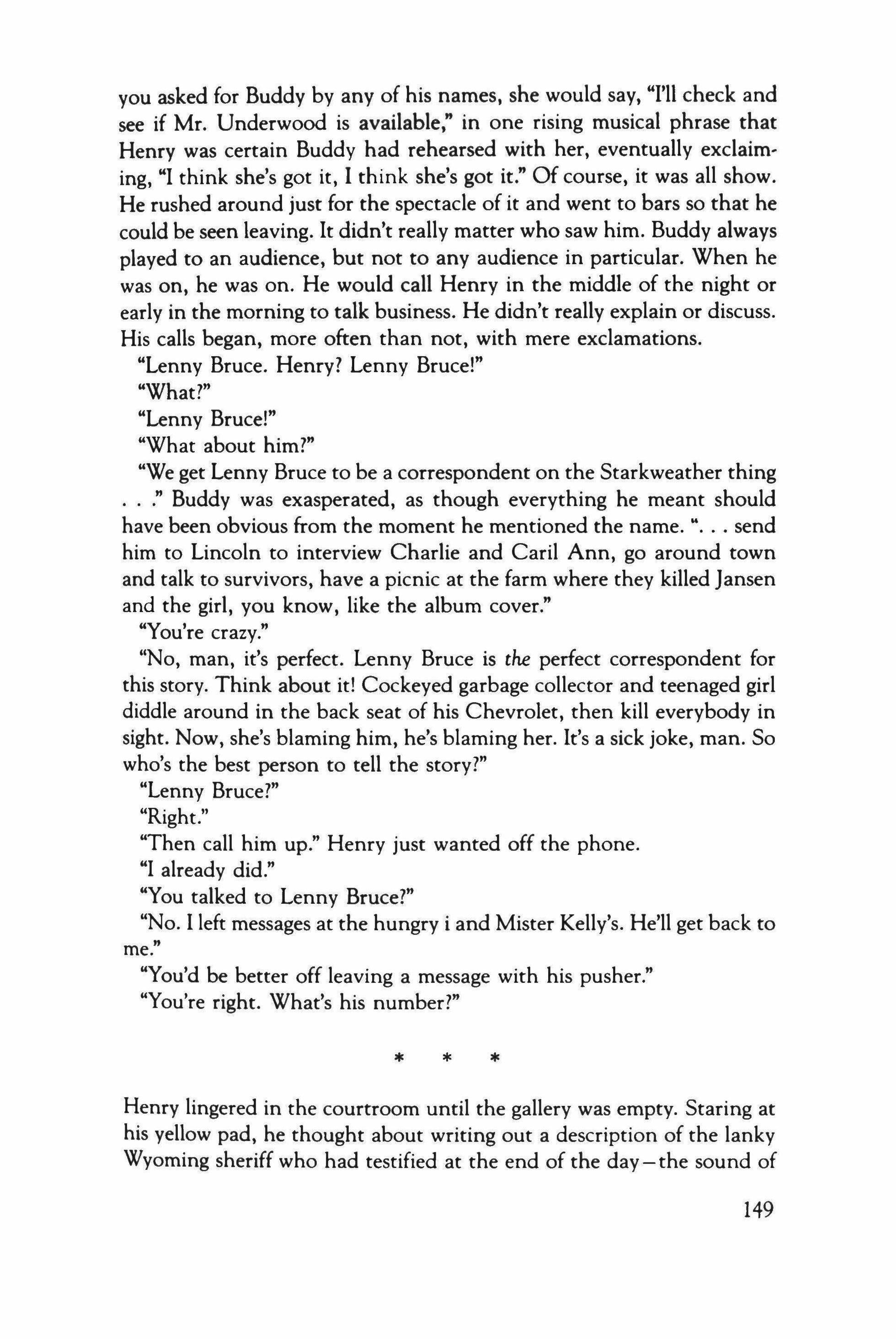
you asked for Buddy by any of his names, she would say, "I'll check and see if Mr. Underwood is available," in one rising musical phrase that Henry was certain Buddy had rehearsed with her, eventually exclaiming, "I think she's got it, I think she's got it." Of course, it was all show. He rushed around just for the spectacle of it and went to bars so that he could be seen leaving. It didn't really matter who saw him. Buddy always played to an audience, but not to any audience in particular. When he was on, he was on. He would call Henry in the middle of the night or early in the morning to talk business. He didn't really explain or discuss. His calls began, more often than not, with mere exclamations.
"Lenny Bruce. Henry? Lenny Bruce!"
"What?"
"Lenny Bruce!"
"What about him?"
"We get Lenny Bruce to be a correspondent on the Starkweather thing ." Buddy was exasperated, as though everything he meant should have been obvious from the moment he mentioned the name. M send him to Lincoln to interview Charlie and Caril Ann, go around town and talk to survivors, have a picnic at the farm where they killed Jansen and the girl, you know, like the album cover."
"You're crazy."
"No, man, it's perfect. Lenny Bruce is the perfect correspondent for this story. Think about it! Cockeyed garbage collector and teenaged girl diddle around in the back seat of his Chevrolet, then kill everybody in sight. Now, she's blaming him, he's blaming her. It's a sick joke, man. So who's the best person to tell the story?"
"Lenny Bruce?"
"Right."
"Then call him up." Henry just wanted off the phone.
"I already did."
"You talked to Lenny Bruce?"
"No.1 left messages at the hungry i and Mister Kelly's. He'll get back to me."
"You'd be better off leaving a message with his pusher."
"You're right. What's his number?" * * *
Henry lingered in the courtroom until the gallery was empty. Staring at his yellow pad, he thought about writing out a description of the lanky Wyoming sheriff who had testified at the end of the day - the sound of
149
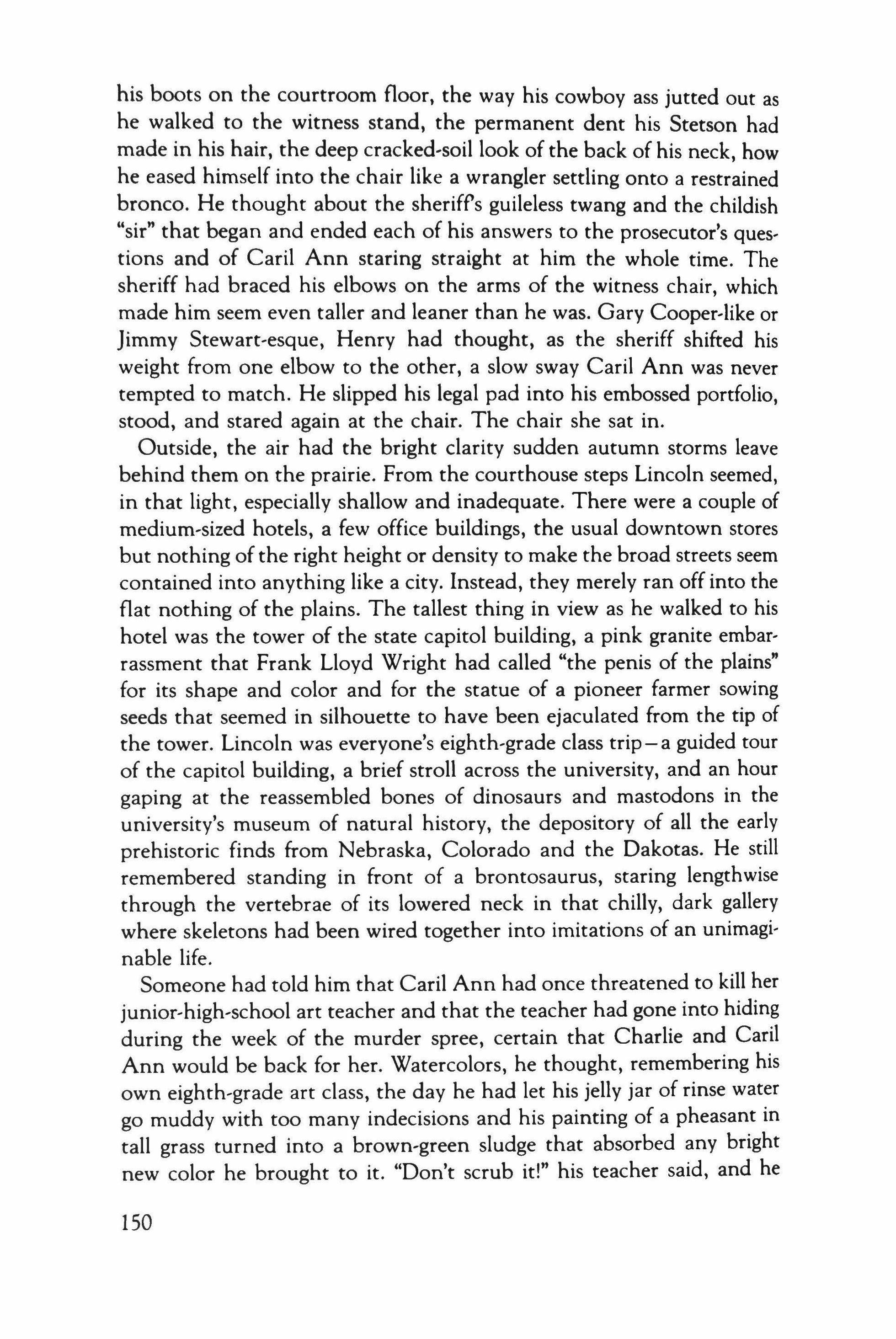
his boots on the courtroom floor, the way his cowboy ass jutted out as he walked to the witness stand, the permanent dent his Stetson had made in his hair, the deep cracked-soil look of the back of his neck, how he eased himself into the chair like a wrangler settling onto a restrained bronco. He thought about the sheriff's guileless twang and the childish "sir" that began and ended each of his answers to the prosecutor's questions and of Caril Ann staring straight at him the whole time. The sheriff had braced his elbows on the arms of the witness chair, which made him seem even taller and leaner than he was. Gary Cooper-like or Jimmy Srewart-esque, Henry had thought, as the sheriff shifted his weight from one elbow to the other, a slow sway Caril Ann was never tempted to match. He slipped his legal pad into his embossed portfolio, stood, and stared again at the chair. The chair she sat in.
Outside, the air had the bright clarity sudden autumn storms leave behind them on the prairie. From the courthouse steps Lincoln seemed, in that light, especially shallow and inadequate. There were a couple of medium-sized hotels, a few office buildings, the usual downtown stores but nothing ofthe right height or density to make the broad streets seem contained into anything like a city. Instead, they merely ran off into the flat nothing of the plains. The tallest thing in view as he walked to his hotel was the tower of the state capitol building, a pink granite embarrassment that Frank Lloyd Wright had called "the penis of the plains" for its shape and color and for the statue of a pioneer farmer sowing seeds that seemed in silhouette to have been ejaculated from the tip of the tower. Lincoln was everyone's eighth-grade class trip-a guided tour of the capitol building, a brief stroll across the university, and an hour gaping at the reassembled bones of dinosaurs and mastodons in the university's museum of natural history, the depository of all the early prehistoric finds from Nebraska, Colorado and the Dakotas. He still remembered standing in front of a brontosaurus, staring lengthwise through the vertebrae of its lowered neck in that chilly, dark gallery where skeletons had been wired together into imitations of an unimaginable life.
Someone had told him that Caril Ann had once threatened to kill her junior-high-school art teacher and that the teacher had gone into hiding during the week of the murder spree, certain that Charlie and Caril Ann would be back for her. Watercolors, he thought, remembering his own eighth-grade art class, the day he had let his jelly jar of rinse water go muddy with too many indecisions and his painting of a pheasant in tall grass turned into a brown-green sludge that absorbed any bright new color he brought to it. "Don't scrub it!" his teacher said, and he
150
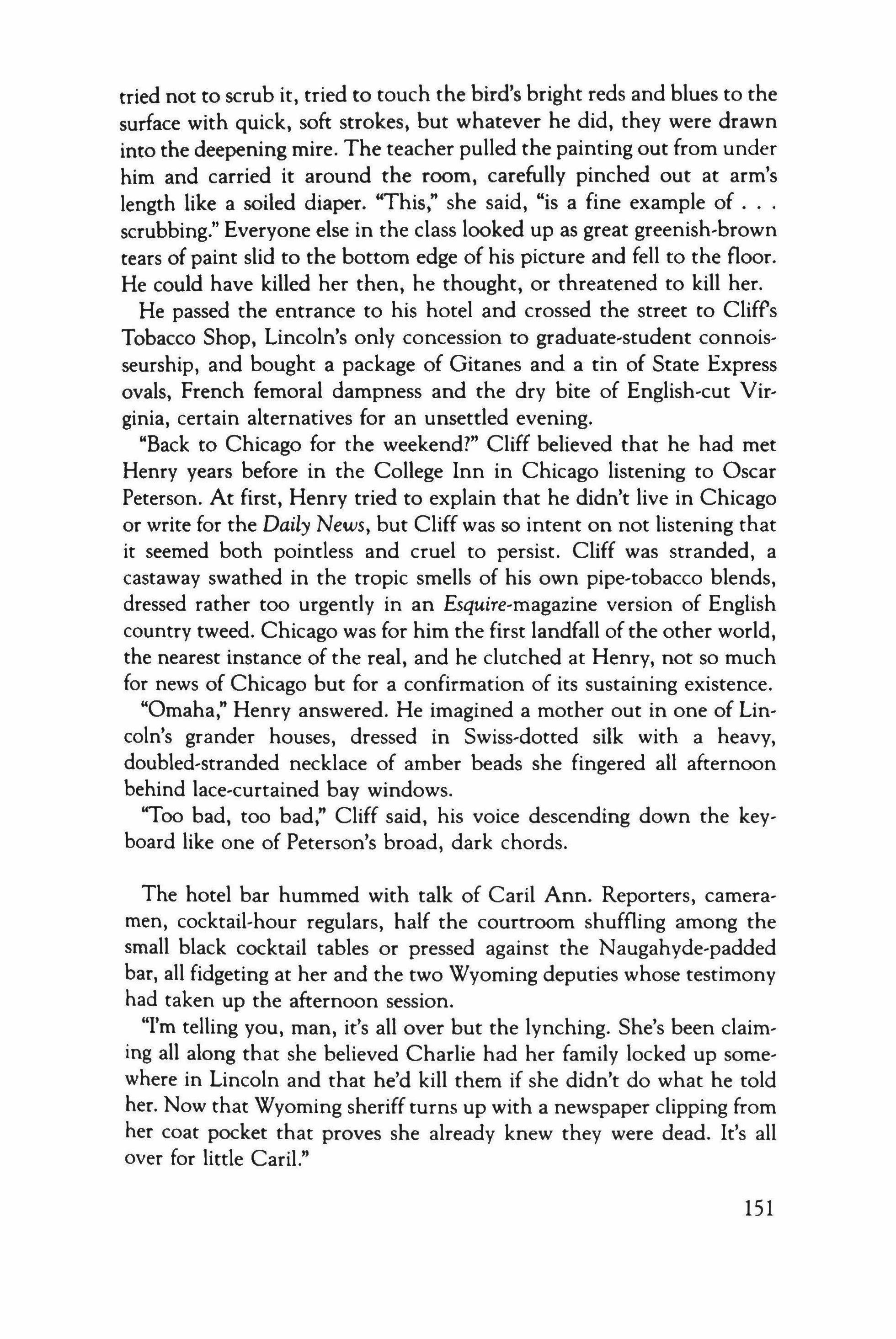
tried not to scrub it, tried to touch the bird's bright reds and blues to the surface with quick, soft strokes, but whatever he did, they were drawn into the deepening mire. The teacher pulled the painting out from under him and carried it around the room, carefully pinched out at arm's length like a soiled diaper. "This," she said, "is a fine example of scrubbing." Everyone else in the class looked up as great greenish-brown tears of paint slid to the bottom edge of his picture and fell to the floor. He could have killed her then, he thought, or threatened to kill her.
He passed the entrance to his hotel and crossed the street to Cliff's Tobacco Shop, Lincoln's only concession to graduate-student connoisseurship, and bought a package of Gitanes and a tin of State Express ovals, French femoral dampness and the dry bite of English-cut Virginia, certain alternatives for an unsettled evening.
"Back to Chicago for the weekend?" Cliff believed that he had met Henry years before in the College Inn in Chicago listening to Oscar Peterson. At first, Henry tried to explain that he didn't live in Chicago or write for the Daily News, but Cliff was so intent on not listening that it seemed both pointless and cruel to persist. Cliff was stranded, a castaway swathed in the tropic smells of his own pipe-tobacco blends, dressed rather too urgently in an Esquire-magazine version of English country tweed. Chicago was for him the first landfall of the other world, the nearest instance of the real, and he clutched at Henry, not so much for news of Chicago but for a confirmation of its sustaining existence.
"Omaha," Henry answered. He imagined a mother out in one of Lincoln's grander houses, dressed in Swiss-dotted silk with a heavy, doubled-stranded necklace of amber beads she fingered all afternoon behind lace-curtained bay windows.
"Too bad, too bad," Cliff said, his voice descending down the keyboard like one of Peterson's broad, dark chords.
The hotel bar hummed with talk of Caril Ann. Reporters, cameramen, cocktail-hour regulars, half the courtroom shuffling among the small black cocktail tables or pressed against the Naugahyde-padded bar, all fidgeting at her and the two Wyoming deputies whose testimony had taken up the afternoon session.
"I'm telling you, man, it's all over but the lynching. She's been claiming all along that she believed Charlie had her family locked up somewhere in Lincoln and that he'd kill them if she didn't do what he told her. Now that Wyoming sheriff turns up with a newspaper clipping from her coat pocket that proves she already knew they were dead. It's all over for little Caril."
151

"Nah. They'll claim she was afraid for her life the whole time, and that won't be hard to sell considering Charlie."
"Suppose they do? All Scheele's got to do is show that she had one chance to get away before Wyoming, just one chance."
"So what do you think?"
"About what?"
"Did she have Charlie's kid?"
"No."
"There was time."
"Well, if there's a kid, where is it?"
"They say it's hidden away somewhere out West."
"What would be the point? If she was pregnant last winter, Scheele would have sprung it months ago at the jurisdiction hearing, because it would have been less trouble getting her tried in criminal court as an adult. Out here, motherhood means adulthood. For that matter, her lawyers would have sprung it just to keep her out of the electric chair."
"You see that look she gave the sheriff? That's one tough cookie."
"It's all gonna depend on how she does on the stand."
"Well, tough'll get her the chair. She's gonna have to look weak. She's gonna have to look like a victim."
"Is Charlie going to testify?"
"That's what I hear."
"Guilty or innocent?"
"You mean the verdict?"
"Yeah. Guilty or innocent."
"Guilty. No question about it."
"You think she's guilty?"
"That's not what I said, and it's not what he asked me. He asked me if I thought she'd be convicted, and I said she would be."
"You know what I think? I think she doesn't have a clue. She's no more certain of what happened in those eight days than any of us."
According to Charlie, she killed all the women. That's three murders."
"According to Charlie? What the hell does that mean? Charlie's confessed half-a-dozen times, and when Scheele brings him to the stand against Caril, he'll confess again, and five'll get you ten this confession will be different than all the rest. Charlie's fucking crazy. Hasn't anybody told you that? You want to talk about knowing what happened. Charlie doesn't know which one of those confessions is true. He may not even know that he's confessed. Someplace in that cockeyed brain of his, he's got all the pieces, but it's like trying to put together a jigsaw puzzle in
152

the back of a dump truck going down a dirt road. That confession where he said he killed all the men and Caril Ann killed all the women, the one he scribbled on the Wyoming jailhouse wall, didn't even have the numbers right. It said there had been nine men and two women. If you count the gas-station attendant, it was six men, four women and one baby girl. How come you said three? Have you been studying arithmetic with Charlie?"
"I forgot about the mother and Caril's half-sister."
"Anyway, what I'm telling you is that Caril Ann Fugate is going to be convicted of aiding and abetting Charles Raymond Starkweather in the robbery and murder of Robert Jensen because she didn't run away, and the star witness for the prosecution is going to be none other than your friend and mine, Charles Starkweather, our own little homicidal Howdy Doody, who thinks the public prosecutor is Buffalo Bob."
"Howdy Doody?"
"Haven't you ever seen him? That loony smile of his, red hair, and his disjointed, bowlegged walk. Just like Howdy Doody."
"And Scheele's Buffalo Bob?"
"When Charlie was on trial, it was plain to everyone that he liked Scheele, the prosecutor, more than he liked his own lawyer."
"What?"
"That's right. You see, the public defender wanted to plead Charlie not guilty by reason of insanity. Charlie wanted to plead self-defense."
"Six men, four women and one baby, and he wanted to plead selfdefense? That's crazy."
"You got it. Anyway, Charlie and his lawyer had a falling-out over the plea. Scheele presented Charlie to the court as a cold-blooded killer, and Charlie liked that a whole lot better than he liked the idea of being insane, though he would have liked self-defense best. The other problem was that the public defender wouldn't let him wear a cowboy suit."
"You're kidding."
"Nope. Charlie wanted to wear a cowboy suit to court-hat, vest, boots and all- and his lawyer wouldn't let him."
"Remember the day he fell asleep?"
"Oh yeah. Gaughan, his lawyer, was reading something into the record, and there was Charlie, fast asleep, snoring at the defense table."
"You think they should have found him insane?"
"I don't know. Charlie's crazy all right, maybe too crazy to fit the legal requirements of insanity. There's another thing. The legal system is very orderly, and so it sees crime as an orderly process. A crime is committed, someone is charged and tried, and if there's a conviction, someone is
153
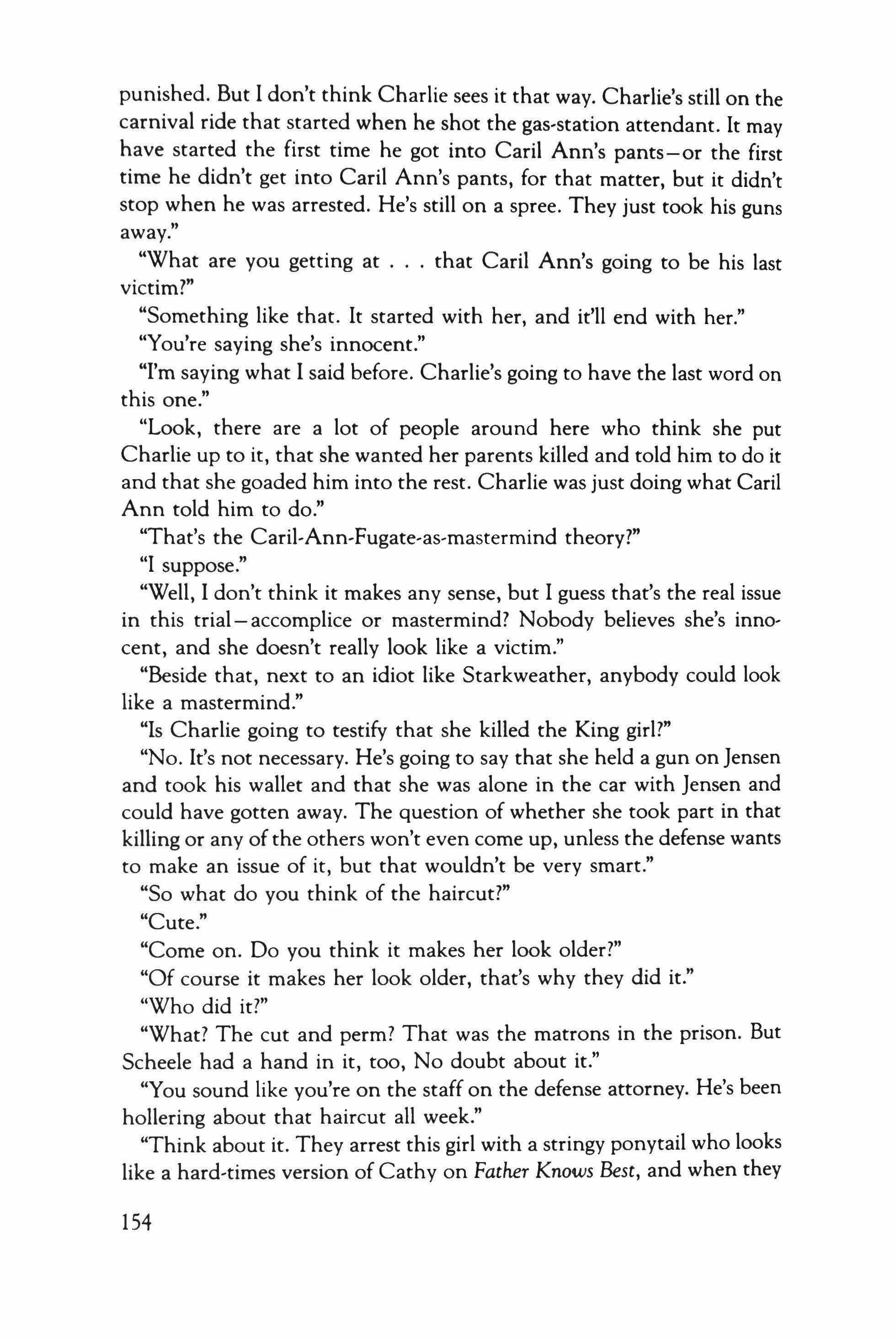
punished. But I don't think Charlie sees it that way. Charlie's still on the carnival ride that started when he shot the gas-station attendant. It may have started the first time he got into Caril Ann's pants-or the first time he didn't get into Caril Ann's pants, for that matter, but it didn't stop when he was arrested. He's still on a spree. They just took his guns away."
"What are you getting at that Caril Ann's going to be his last victim?"
"Something like that. It started with her, and it'll end with her."
"You're saying she's innocent."
"I'm saying what I said before. Charlie's going to have the last word on this one."
"Look, there are a lot of people around here who think she put Charlie up to it, that she wanted her parents killed and told him to do it and that she goaded him into the rest. Charlie was just doing what Caril Ann told him to do."
"That's the Caril-Ann-Fugare-as-rnasrermind theory?"
"I suppose."
"Well, I don't think it makes any sense, but I guess that's the real issue in this trial- accomplice or mastermind? Nobody believes she's innocent, and she doesn't really look like a victim."
"Beside that, next to an idiot like Starkweather, anybody could look like a mastermind."
"Is Charlie going to testify that she killed the King girl?"
"No. It's not necessary. He's going to say that she held a gun on Jensen and took his wallet and that she was alone in the car with Jensen and could have gotten away. The question of whether she took part in that killing or any ofthe others won't even come up, unless the defense wants to make an issue of it, but that wouldn't be very smart."
"So what do you think of the haircut?"
"Cute."
"Come on. Do you think it makes her look older?"
"Of course it makes her look older, that's why they did it."
"Who did it?"
"What? The cut and perm? That was the matrons in the prison. But Scheele had a hand in it, too, No doubt about it."
"You sound like you're on the staff on the defense attorney. He's been hollering about that haircut all week."
"Think about it. They arrest this girl with a stringy ponytail who looks like a hard-times version of Cathy on Father Knows Best, and when they
154
turn her out for trial, her hair's been cut and bobbed like something out of early Jennifer Jones."
"According to the people at the jail, Caril asked for the haircut."
"Maybe she did, but you can bet Scheele O.K.,ed it. He probably even bought the Toni they used."
The chair she sat in, Henry thought, the soft curl of her sweater over the chair's back, her head held high, turned only occasionally. Rigid, he might have said, or defiant, unmoved by what she heard, the controversial curls of her freshly cut and bobbed hair. The chair she sat in, rock, hard American institutional maple, the chair she sat in, one week, rigidly, unmoved by five days' worth of jurors' interviews and witnesses' testimony. The chair against her back, short curls across the top of her neck, a week of watching her shoulders lift and fall as she breathed. The chair she sat in.
The reporters in the bar were still a mystery to him. They all had intricate theories about the case, and some of them-the hawk-faced guy from Chicago, who had called Starkweather "Howdy Doody," especially - had a finely tuned sense of the girl and her oddly suspended place in the drama-actor, victim, witness, observer-like the last iron filing in the rough cluster that hangs from a bar magnet, loosely caught by forces that careen invisibly through the filings clumped above it, but solitary and exposed. But all of them, however complexly they viewed the trial and the mayhem it was recounting, hammered out the same dryly sensational news stories each afternoon before slipping into the consolations of gin and cigarette smoke in the Cornhusker Lounge. The haggling in the bar was nearly always the same. Each day's proceeding would add a few names and a few details, but the real subject was the unmoving, unmoved, inscrutable Caril Ann.
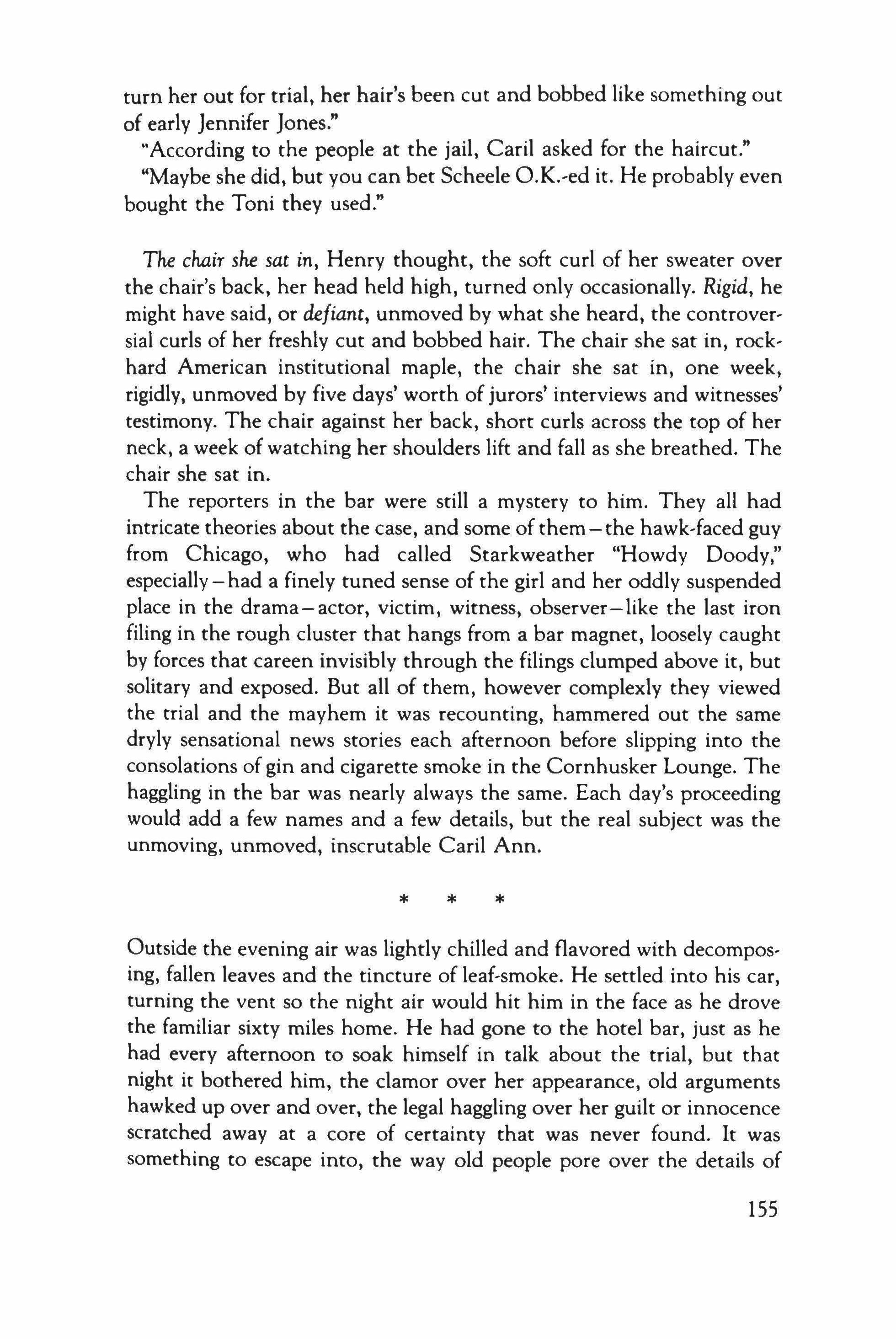
Outside the evening air was lightly chilled and flavored with decornposing, fallen leaves and the tincture of leaf-smoke. He settled into his car, turning the vent so the night air would hit him in the face as he drove the familiar sixty miles home. He had gone to the hotel bar, just as he had every afternoon to soak himself in talk about the trial, but that night it bothered him, the clamor over her appearance, old arguments hawked up over and over, the legal haggling over her guilt or innocence scratched away at a core of certainty that was never found. It was something to escape into, the way old people pore over the details of
* * *
155
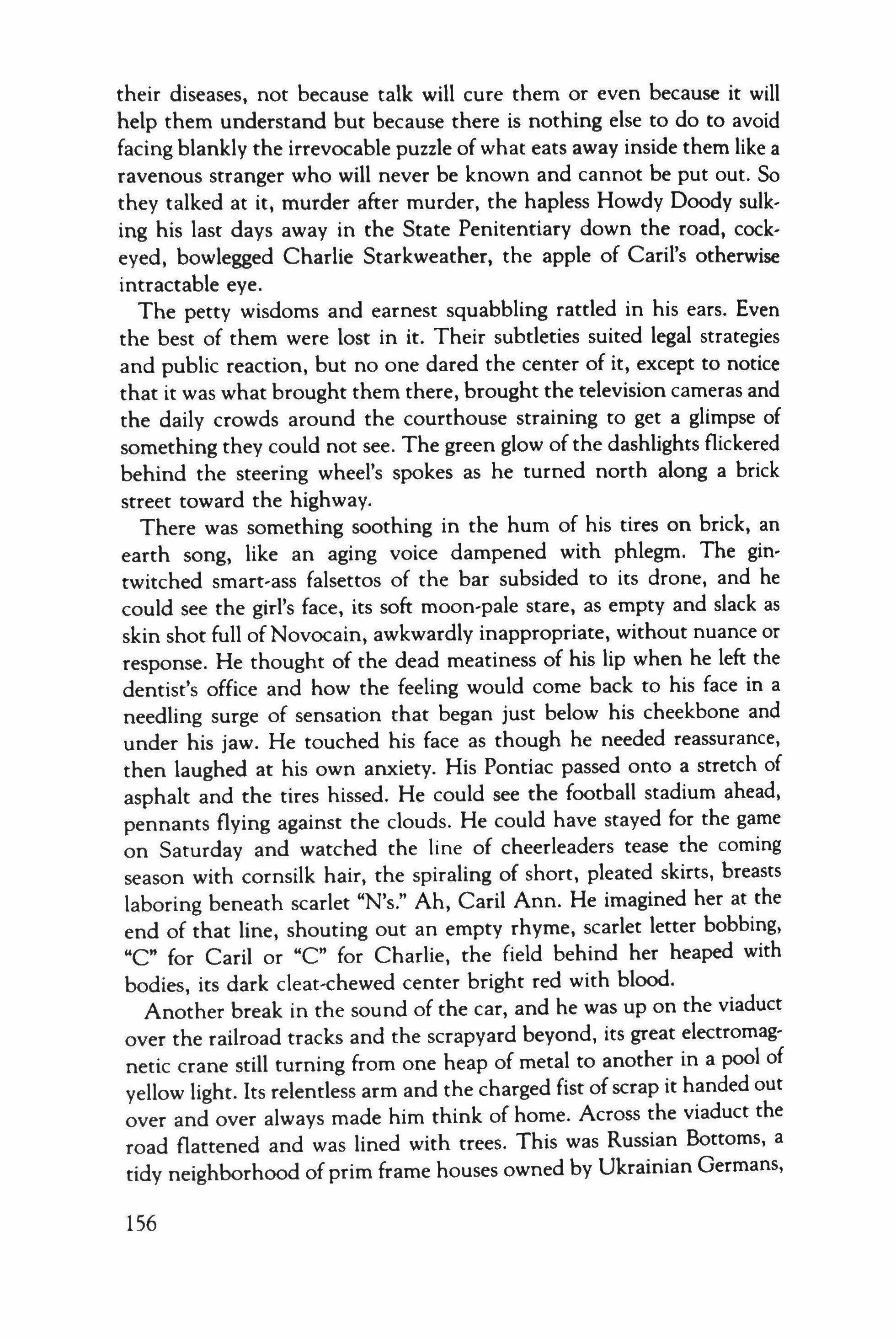
their diseases, not because talk will cure them or even because it will help them understand but because there is nothing else to do to avoid facing blankly the irrevocable puzzle ofwhat eats away inside them like a ravenous stranger who will never be known and cannot be put out. So they talked at it, murder after murder, the hapless Howdy Doody sulking his last days away in the State Penitentiary down the road, cockeyed, bowlegged Charlie Starkweather, the apple of Caril's otherwise intractable eye.
The petty wisdoms and earnest squabbling rattled in his ears. Even the best of them were lost in it. Their subtleties suited legal strategies and public reaction, but no one dared the center of it, except to notice that it was what brought them there, brought the television cameras and the daily crowds around the courthouse straining to get a glimpse of something they could not see. The green glow ofthe dashlighrs flickered behind the steering wheel's spokes as he turned north along a brick street toward the highway.
There was something soothing in the hum of his tires on brick, an earth song, like an aging voice dampened with phlegm. The gintwitched smart-ass falsettos of the bar subsided to its drone, and he could see the girl's face, its soft moon-pale stare, as empty and slack as skin shot full of Novocain, awkwardly inappropriate, without nuance or response. He thought of the dead meatiness of his lip when he left the dentist's office and how the feeling would come back to his face in a needling surge of sensation that began just below his cheekbone and under his jaw. He touched his face as though he needed reassurance, then laughed at his own anxiety. His Pontiac passed onto a stretch of asphalt and the tires hissed. He could see the football stadium ahead, pennants flying against the clouds. He could have stayed for the game on Saturday and watched the line of cheerleaders tease the coming season with cornsilk hair, the spiraling of short, pleated skirts, breasts laboring beneath scarlet "N's," Ah, Caril Ann. He imagined her at the end of that line, shouting out an empty rhyme, scarlet letter bobbing, "C" for Caril or "C" for Charlie, the field behind her heaped with bodies, its dark cleat-chewed center bright red with blood.
Another break in the sound of the car, and he was up on the viaduct over the railroad tracks and the scrapyard beyond, its great electromagnetic crane still turning from one heap of metal to another in a pool of yellow light. Its relentless arm and the charged fist of scrap it handed out over and over always made him think of home. Across the viaduct the road flattened and was lined with trees. This was Russian Bottoms, a tidy neighborhood of prim frame houses owned by Ukrainian Germans,
156
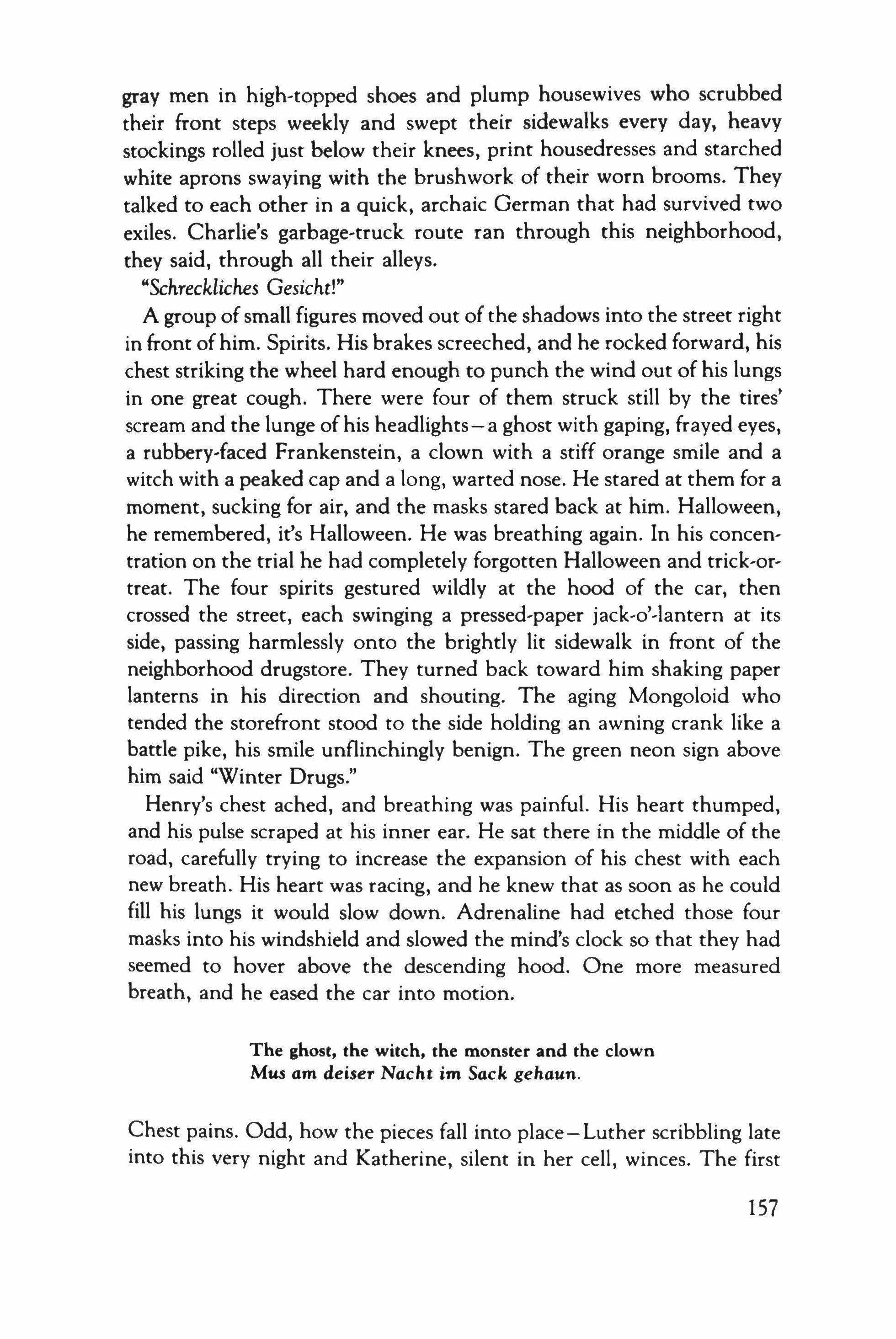
gray men in high-topped shoes and plump housewives who scrubbed their front steps weekly and swept their sidewalks every day, heavy stockings rolled just below their knees, print housedresses and starched white aprons swaying with the brushwork of their worn brooms. They talked to each other in a quick, archaic German that had survived two exiles. Charlie's garbage-truck route ran through this neighborhood, they said, through all their alleys.
"Schreckliches Gesicht!"
A group of small figures moved out of the shadows into the street right in front ofhim. Spirits. His brakes screeched, and he rocked forward, his chest striking the wheel hard enough to punch the wind out of his lungs in one great cough. There were four of them struck still by the tires' scream and the lunge of his headlights-a ghost with gaping, frayed eyes, a rubbery-faced Frankenstein, a clown with a stiff orange smile and a witch with a peaked cap and a long, warted nose. He stared at them for a moment, sucking for air, and the masks stared back at him. Halloween, he remembered, it's Halloween. He was breathing again. In his concentration on the trial he had completely forgotten Halloween and trick-ortreat. The four spirits gestured wildly at the hood of the car, then crossed the street, each swinging a pressed-paper jack-o-lanrern at its side, passing harmlessly onto the brightly lit sidewalk in front of the neighborhood drugstore. They turned back toward him shaking paper lanterns in his direction and shouting. The aging Mongoloid who tended the storefront stood to the side holding an awning crank like a battle pike, his smile unflinchingly benign. The green neon sign above him said "Winter Drugs."
Henry's chest ached, and breathing was painful. His heart thumped, and his pulse scraped at his inner ear. He sat there in the middle of the road, carefully trying to increase the expansion of his chest with each new breath. His heart was racing, and he knew that as soon as he could fill his lungs it would slow down. Adrenaline had etched those four masks into his windshield and slowed the mind's clock so that they had seemed to hover above the descending hood. One more measured breath, and he eased the car into motion.
The ghost, the witch, the monster and the clown Mus am deiser Nacht im Sack gehaun.
Chest pains. Odd, how the pieces fall into place-Luther scribbling late into this very night and Katherine, silent in her cell, winces. The first
157

nail was driven for her. "Bless me father for I have sinned. It has been a hundred and fifty years since my last confession."
The sharp pain that had hampered his breathing had given way to a dull ache deep inside his chest, and there was a spot of bile at the back of his tongue, a slow, sour burning that could not be swallowed away.
The leafless vault ofRussian Bottoms trees slipped off the roadway like a discarded skin. Bare two-lane blacktop, white center lines like vertebrae, stubbled weeds at the roadside flicking through his headlight's extended palm. Out beyond the truck depots and the bottled-gas company, the flat black nothing of the prairie. On his right, the residual glow of the city and its terminal fray-gas stations, a few diners and automobile salvage yard behind a barbed-wire-crowned board fence, chrome bumpers and grills grimacing at the opposing dark, the sentinel grain elevator just where the highway curved across the railroad tracks and onto the plains. The city, shambled and impermanent, falling away.
He thought again of the girl, straight-backed all day and the hard, unflinching look she gave the world. Was it defiance, really, or righteous anger or just the face of an empty determination? He had driven out to the Belmont Avenue house where she had lived with her mother, her stepsister, and Bartlett, her stepfather. It was part of the city's tattered edge, a squat little house, sided with brick-patterned asphalt, sitting on an uncertain cement-block foundation. The yard was a mudpatch of spikeweeds and junk, a gray country mailbox askew on a leaning wooden post. Behind the house there were outbuildings, sheds really, of gray, unpainted wood, where the police had found the bodies, the old man in the chicken coop and the mother and the baby sister in the outhouse. Marion, Velda, and baby Betty Jean and Caril Ann had all lived there under curling roof paper and a tall television antenna.
The house, the yard, the shambled outbuildings, even the canted mailbox were pure products of the white midwestern sub-rural poor. They had the look not so much of neglect but of faltering, incompetent enterprise, and it was impossible to guess which of the broken-off ambitions were Marion's and which were left half-finished by some earlier tenant. Every cluster ofjunk in the yard was the shard of one resolution or another. The two-by-fours imbedded in the mud by the driveway had been cut and carried there for some abandoned scheme; the outlying buildings were all unfinished, leaning against one another as though they had been dumped there; a roll of tar paper propped like a buttress against the last one seemed to support them all, but it was clearly the fragment of another left-off ambition, a can of rusted nails tilted into its
158
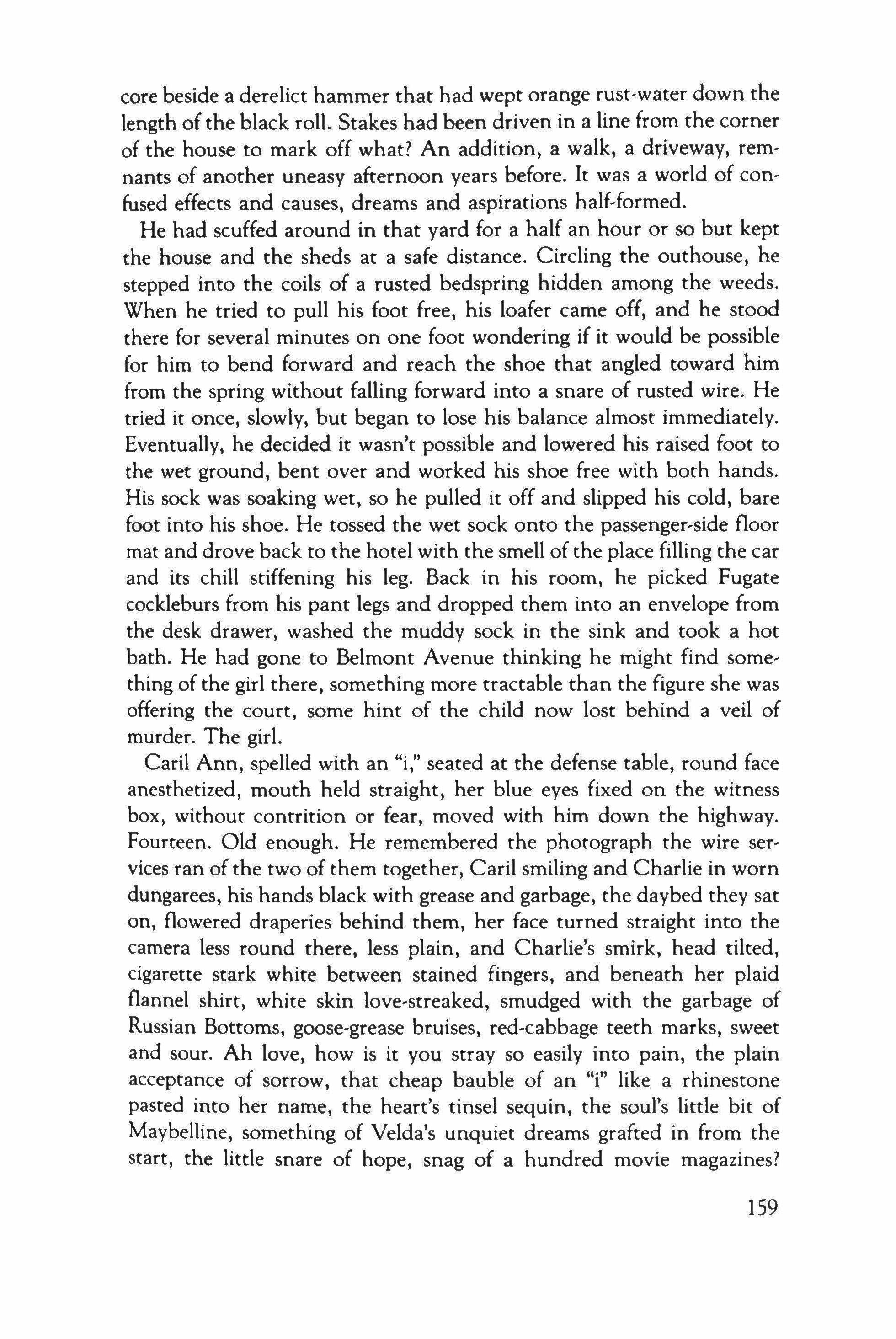
core beside a derelict hammer that had wept orange rust-water down the length of the black roll. Stakes had been driven in a line from the corner of the house to mark off what? An addition, a walk, a driveway, remnants of another uneasy afternoon years before. It was a world of confused effects and causes, dreams and aspirations half-formed.
He had scuffed around in that yard for a half an hour or so but kept the house and the sheds at a safe distance. Circling the outhouse, he stepped into the coils of a rusted bedspring hidden among the weeds. When he tried to pull his foot free, his loafer came off, and he stood there for several minutes on one foot wondering if it would be possible for him to bend forward and reach the shoe that angled toward him from the spring without falling forward into a snare of rusted wire. He tried it once, slowly, but began to lose his balance almost immediately. Eventually, he decided it wasn't possible and lowered his raised foot to the wet ground, bent over and worked his shoe free with both hands. His sock was soaking wet, so he pulled it off and slipped his cold, bare foot into his shoe. He tossed the wet sock onto the passenger-side floor mat and drove back to the hotel with the smell of the place filling the car and its chill stiffening his leg. Back in his room, he picked Fugate cockleburs from his pant legs and dropped them into an envelope from the desk drawer, washed the muddy sock in the sink and took a hot bath. He had gone to Belmont Avenue thinking he might find something of the girl there, something more tractable than the figure she was offering the court, some hint of the child now lost behind a veil of murder. The girl.
Caril Ann, spelled with an "i," seated at the defense table, round face anesthetized, mouth held straight, her blue eyes fixed on the witness box, without contrition or fear, moved with him down the highway. Fourteen. Old enough. He remembered the photograph the wire services ran of the two of them together, Caril smiling and Charlie in worn dungarees, his hands black with grease and garbage, the daybed they sat on, flowered draperies behind them, her face turned straight into the camera less round there, less plain, and Charlie's smirk, head tilted, cigarette stark white between stained fingers, and beneath her plaid flannel shirt, white skin love-streaked, smudged with the garbage of Russian Bottoms, goose-grease bruises, red-cabbage teeth marks, sweet and sour. Ah love, how is it you stray so easily into pain, the plain acceptance of sorrow, that cheap bauble of an "i" like a rhinestone pasted into her name, the heart's tinsel sequin, the soul's little bit of Maybelline, something of Velda's unquiet dreams grafted in from the start, the little snare of hope, snag of a hundred movie magazines?
159
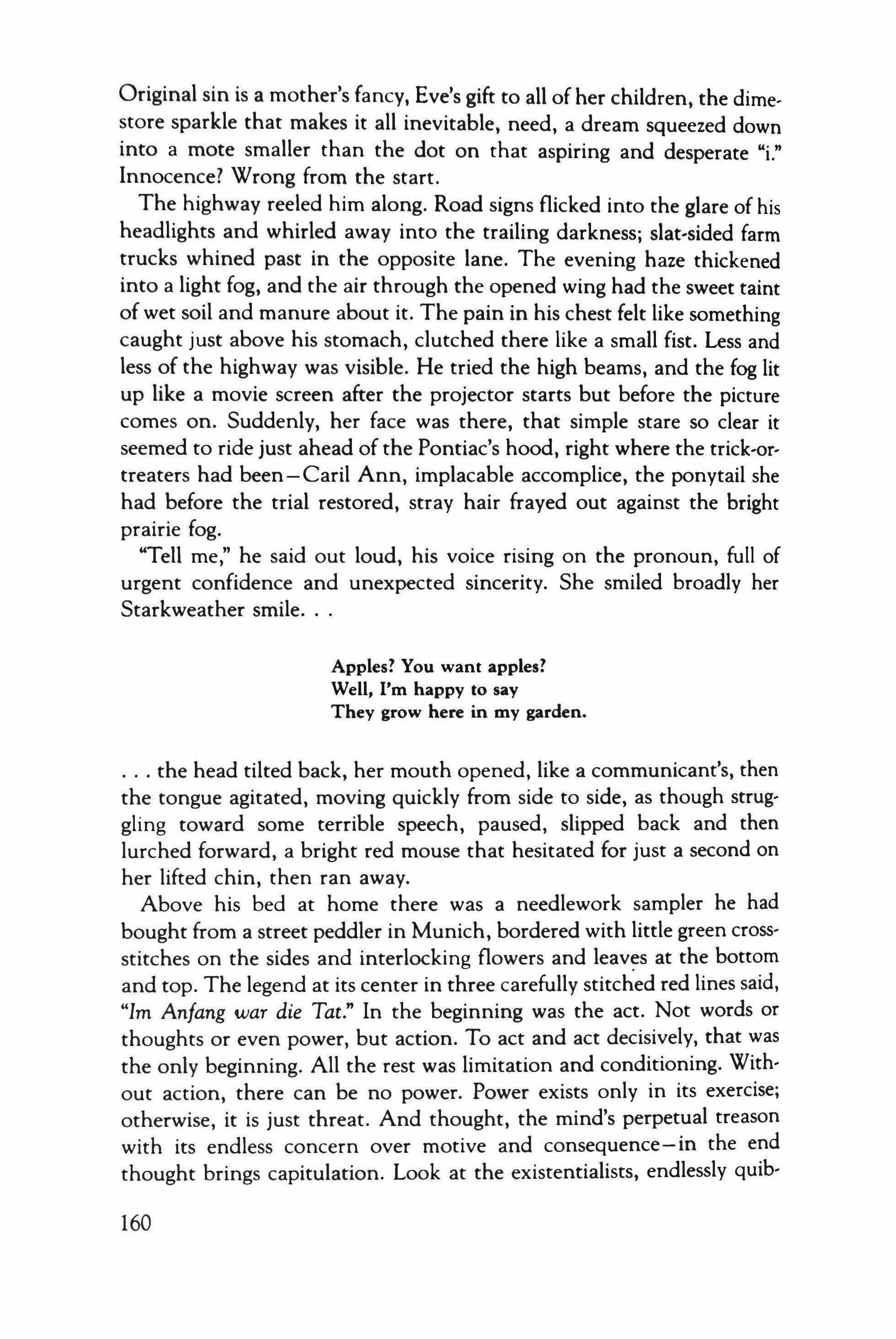
Original sin is a mother's fancy, Eve's gift to all of her children, the dimestore sparkle that makes it all inevitable, need, a dream squeezed down into a mote smaller than the dot on that aspiring and desperate "i." Innocence? Wrong from the start.
The highway reeled him along. Road signs flicked into the glare of his headlights and whirled away into the trailing darkness; slat-sided farm trucks whined past in the opposite lane. The evening haze thickened into a light fog, and the air through the opened wing had the sweet taint of wet soil and manure about it. The pain in his chest felt like something caught just above his stomach, clutched there like a small fist. Less and less of the highway was visible. He tried the high beams, and the fog lit up like a movie screen after the projector starts but before the picture comes on. Suddenly, her face was there, that simple stare so clear it seemed to ride just ahead of the Pontiac's hood, right where the trick-ortreaters had been-Caril Ann, implacable accomplice, the ponytail she had before the trial restored, stray hair frayed out against the bright prairie fog.
"Tell me," he said out loud, his voice rising on the pronoun, full of urgent confidence and unexpected sincerity. She smiled broadly her Starkweather smile
Apples? You want apples?
Well, I'm happy to say They grow here in my garden
the head tilted back, her mouth opened, like a communicant's, then the tongue agitated, moving quickly from side to side, as though struggling toward some terrible speech, paused, slipped back and then lurched forward, a bright red mouse that hesitated for just a second on her lifted chin, then ran away.
Above his bed at home there was a needlework sampler he had bought from a street peddler in Munich, bordered with little green crossstitches on the sides and interlocking flowers and leaves at the bottom and top. The legend at its center in three carefully stitched red lines said, "1m Anfang war die Tat." In the beginning was the act. Not words or thoughts or even power, but action. To act and act decisively, that was the only beginning. All the rest was limitation and conditioning. Without action, there can be no power. Power exists only in its exercise; otherwise, it is just threat. And thought, the mind's perpetual treason with its endless concern over motive and consequence-in the end thought brings capitulation. Look at the existentialists, endlessly quib-
160
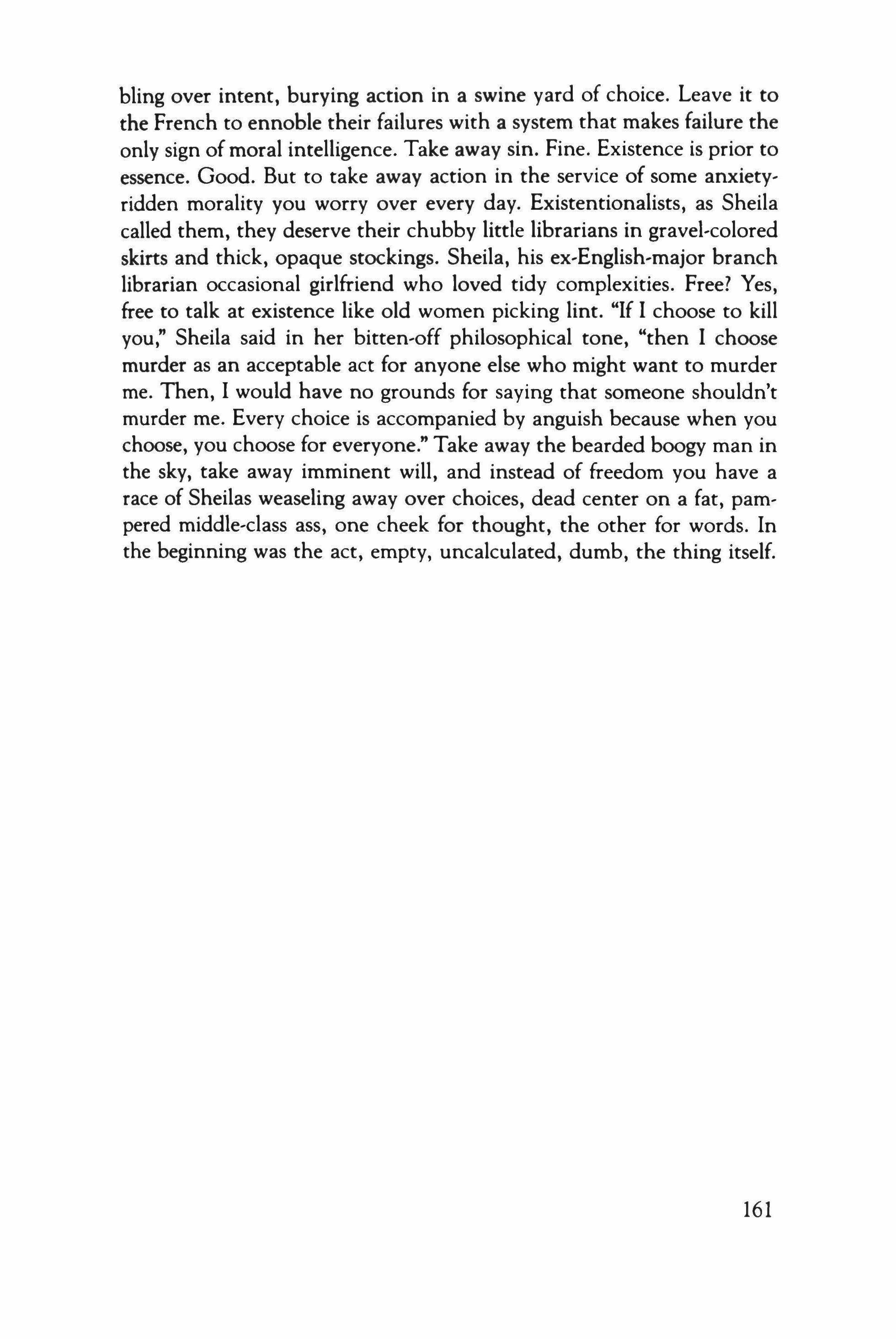
bling over intent, burying action in a swine yard of choice. Leave it to the French to ennoble their failures with a system that makes failure the only sign of moral intelligence. Take away sin. Fine. Existence is prior to essence. Good. But to take away action in the service of some anxietyridden morality you worry over every day. Existentionalists, as Sheila called them, they deserve their chubby little librarians in gravel-colored skirts and thick, opaque stockings. Sheila, his ex-English-major branch librarian occasional girlfriend who loved tidy complexities. Free? Yes, free to talk at existence like old women picking lint. "If I choose to kill you," Sheila said in her bitten-off philosophical tone, "then I choose murder as an acceptable act for anyone else who might want to murder me. Then, I would have no grounds for saying that someone shouldn't murder me. Every choice is accompanied by anguish because when you choose, you choose for everyone." Take away the bearded boogy man in the sky, take away imminent will, and instead of freedom you have a race of Sheilas weaseling away over choices, dead center on a fat, pampered middle-class ass, one cheek for thought, the other for words. In the beginning was the act, empty, uncalculated, dumb, the thing itself.
161
Her Sense of Timing
Stanley Elkin
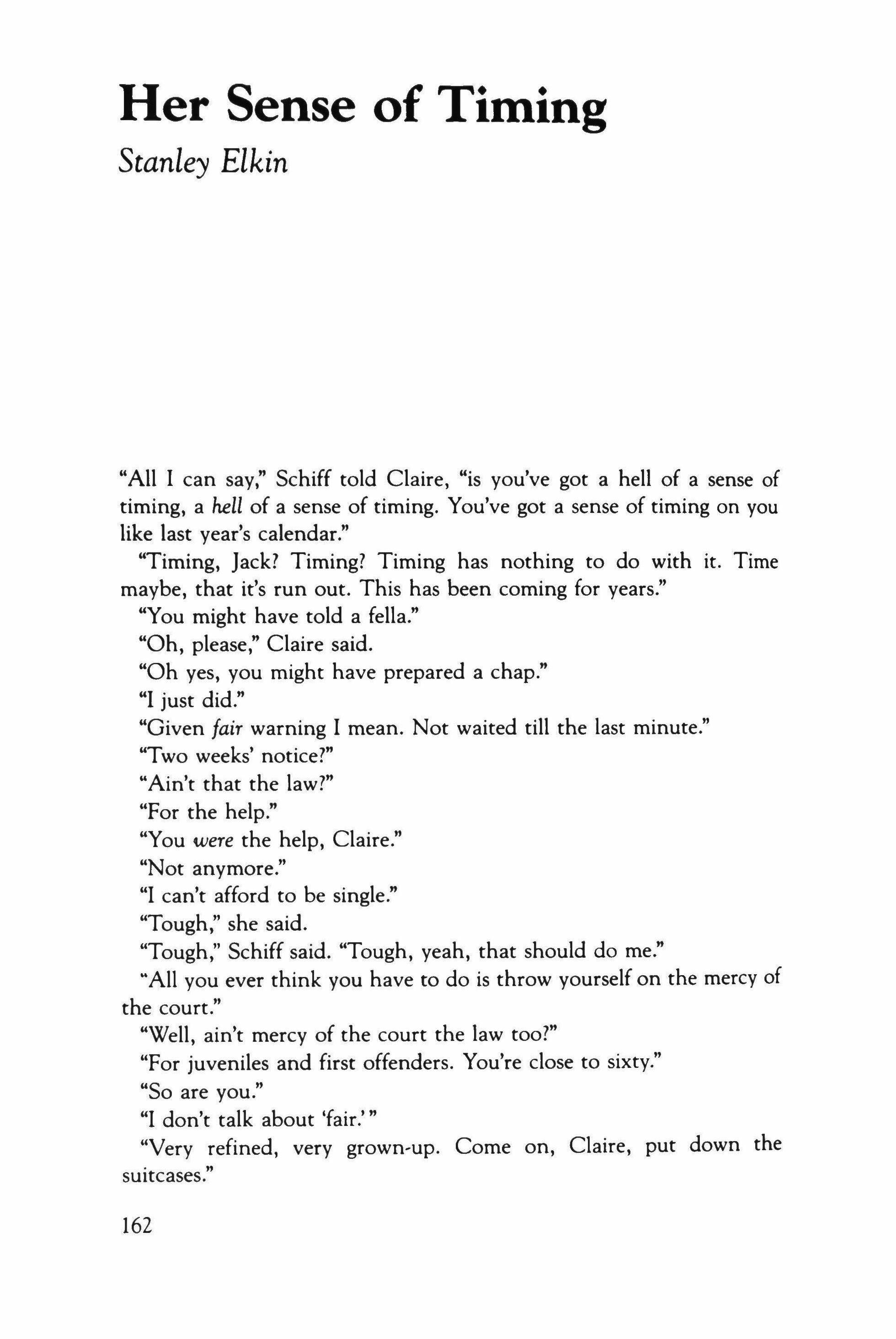
"All 1 can say," Schiff told Claire, "is you've got a hell of a sense of timing, a hell of a sense of timing. You've got a sense of timing on you like last year's calendar."
"Timing, Jack? Timing? Timing has nothing to do with it. Time maybe, that it's run out. This has been coming for years."
"You might have told a fella."
"Oh, please," Claire said.
"Oh yes, you might have prepared a chap."
"I just did."
"Given fair warning 1 mean. Not waited till the last minute."
"Two weeks' notice?"
Ain't that the law?"
"For the help."
"You were the help, Claire."
"Not anymore."
"I can't afford to be single."
"Tough," she said.
"Tough," Schiff said. "Tough, yeah, that should do me."
�All you ever think you have to do is throw yourself on the mercy of the court."
"Well, ain't mercy of the court the law too?"
"For juveniles and first offenders. You're close to sixty."
"So are you."
"I don't talk about 'fair.'"
"Very refined, very grown-up. Come on, Claire, put down the suitcases."
162

"No. The others are all packed. I'll send U.P.S. for them when I'm settled."
"I won't let the bastards in. The door to this house is barred to the sons of bitches."
"Oh, Jack," Claire said, "the things you say. Stand up to delivery people? You? Painters and repairmen? But you're such a coward. The man who comes to read the meter terrifies you. Tradesmen do, the kid who brings the pizza."
"Why are they blue-collar? This is America, Claire."
"Is that my cab?" She looked down out their bedroom window and waved.
"This is really going to happen?"
"It's happened," she said, leaned over the bed to kiss her husband on the cheek, and just upped and walked out the door on their thirty-sixyear marriage.
"Wait, hey wait," Schiff called after her, taking up his walker and moving toward the window. By the time he got around the bed Claire was already handing the driver two big valises. Schiff, bracing his hands on the sill, stood before the window in his shorty pajamas. "Excuse me," he called to the man. "Sir? Excuse me?" The fellow shaded his eyes and looked up. "Where are you taking her?"
The driver, a young man in his twenties, looked at Claire who shook her head. "Sorry," he said, "destinations between a fare and her cabbie are privileged information."
Schiff held up his walker. "But I'm a cripple, I'm handicapped," he said. "I'm close to sixty."
"Sorry," the man said, shut the trunk in which he'd put Claire's suit, cases, and got into his cab.
"That," Schiff called after the taxi, "was no fare, that was my wife."
And thought, her sense of timing, her wonderful, world-class, championship sense of timing. Leaving me like that. Just like that. Just get up and go. Just got up and gone. Don't tell me she forgot tomorrow's the party.
Schiff's annual party for his graduate students, though by no means a tradition-Schiff, who was a professor of political geography, had started it up only two or three years ago when, during a fit like some cocktail made of equal parts of sentimentality and pique, he realized that though it was barely a few years until retirement he had had only a stunningly scant handful of students who ever wrote him once they were done with their studies, let alone any who might regard him as a friend-had become - at least in Schiff's diminishing circles - one of the hottest tick-
163
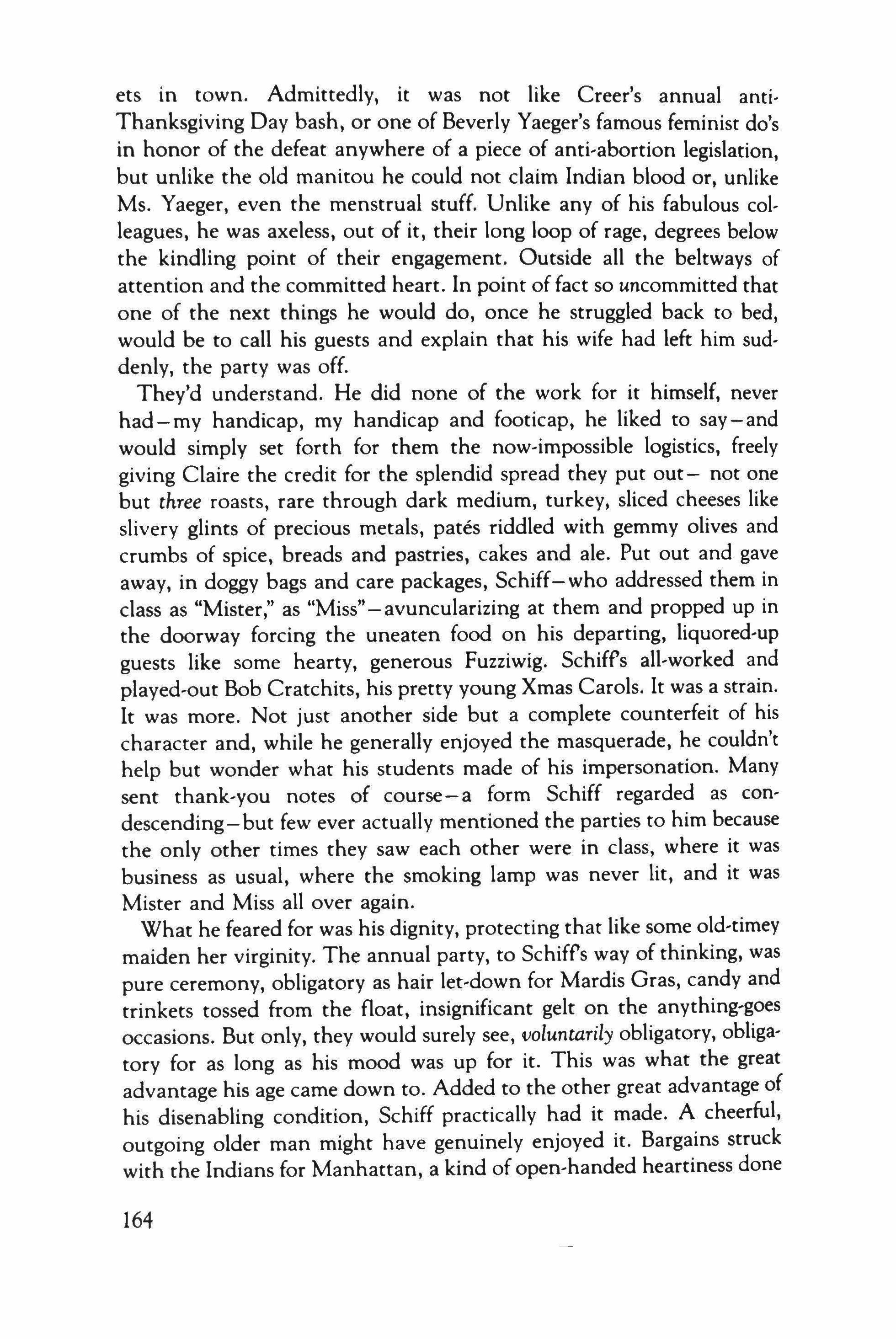
ets in town. Admittedly, it was not like Creer's annual anti. Thanksgiving Day bash, or one of Beverly Yaeger's famous feminist do's in honor of the defeat anywhere of a piece of anti-abortion legislation, but unlike the old manitou he could not claim Indian blood or, unlike Ms. Yaeger, even the menstrual stuff. Unlike any of his fabulous colleagues, he was axeless, out of it, their long loop of rage, degrees below the kindling point of their engagement. Outside all the beltways of attention and the committed heart. In point of fact so uncommitted that one of the next things he would do, once he struggled back to bed, would be to call his guests and explain that his wife had left him suddenly, the party was off.
They'd understand. He did none of the work for it himself, never had-my handicap, my handicap and footicap, he liked to say-and would simply set forth for them the now-impossible logistics, freely giving Claire the credit for the splendid spread they put out - not one but three roasts, rare through dark medium, turkey, sliced cheeses like slivery glints of precious metals, pates riddled with gemmy olives and crumbs of spice, breads and pastries, cakes and ale. Put out and gave away, in doggy bags and care packages, Schiff-who addressed them in class as "Mister," as "Miss" - avuncularizing at them and propped up in the doorway forcing the uneaten food on his departing, liquored-up guests like some hearty, generous Fuzziwig. Schiff's all-worked and played-out Bob Cratchits, his pretty young Xmas Carols. It was a strain. It was more. Not just another side but a complete counterfeit of his character and, while he generally enjoyed the masquerade, he couldn't help but wonder what his students made of his impersonation. Many sent thank-you notes of course-a form Schiff regarded as condescending-but few ever actually mentioned the parties to him because the only other times they saw each other were in class, where it was business as usual, where the smoking lamp was never lit, and it was Mister and Miss all over again.
What he feared for was his dignity, protecting that like some old-rirnev maiden her virginity. The annual party, to Schiff's way of thinking, was pure ceremony, obligatory as hair let-down for Mardis Gras, candy and trinkets tossed from the float, insignificant gelt on the anything-goes occasions. But only, they would surely see, voluntarily obligatory, obligatory for as long as his mood was up for it. This was what the great advantage his age came down to. Added to the other great advantage of his disenabling condition, Schiff practically had it made. A cheerful, outgoing older man might have genuinely enjoyed it. Bargains struck with the Indians for Manhattan, a kind of open-handed heartiness done
164
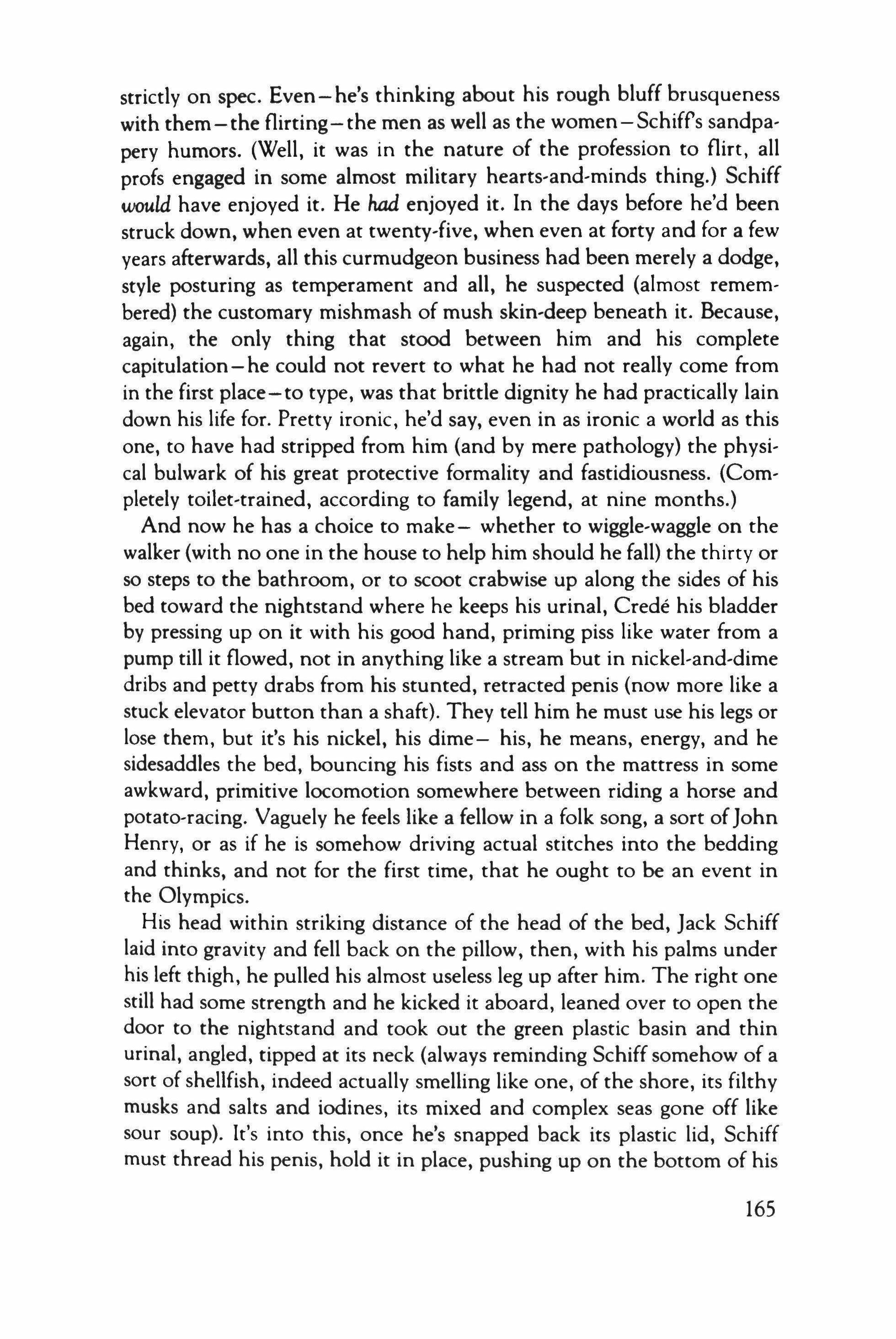
strictly on spec. Even-he's thinking about his rough bluff brusqueness with them-the flirting-the men as well as the women-Schiff's sandpapery humors. (Well, it was in the nature of the profession to flirt, all profs engaged in some almost military hearts-and-minds thing.) Schiff would have enjoyed it. He had enjoyed it. In the days before he'd been struck down, when even at twenty-five, when even at forty and for a few years afterwards, all this curmudgeon business had been merely a dodge, style posturing as temperament and all, he suspected (almost remembered) the customary mishmash of mush skin-deep beneath it. Because, again, the only thing that stood between him and his complete capitulation - he could not revert to what he had not really come from in the first place-to type, was that brittle dignity he had practically lain down his life for. Pretty ironic, he'd say, even in as ironic a world as this one, to have had stripped from him (and by mere pathology) the physical bulwark of his great protective formality and fastidiousness. (Completely toilet-trained, according to family legend, at nine months.)
And now he has a choice to make- whether to wiggle-waggle on the walker (with no one in the house to help him should he fall) the thirty or so steps to the bathroom, or to scoot crabwise up along the sides of his bed toward the nightstand where he keeps his urinal, Crede his bladder by pressing up on it with his good hand, priming piss like water from a pump till it flowed, not in anything like a stream but in nickel-and-dime dribs and petty drabs from his stunted, retracted penis (now more like a stuck elevator button than a shaft). They tell him he must use his legs or lose them, but it's his nickel, his dime- his, he means, energy, and he sidesaddles the bed, bouncing his fists and ass on the mattress in some awkward, primitive locomotion somewhere between riding a horse and potato-racing. Vaguely he feels like a fellow in a folk song, a sort ofJohn Henry, or as if he is somehow driving actual stitches into the bedding and thinks, and not for the first time, that he ought to be an event in the Olympics.
His head within striking distance of the head of the bed, Jack Schiff laid into gravity and fell back on the pillow, then, with his palms under his left thigh, he pulled his almost useless leg up after him. The right one still had some strength and he kicked it aboard, leaned over to open the door to the nightsrand and took out the green plastic basin and thin urinal, angled, tipped at its neck (always reminding Schiff somehow of a sort of shellfish, indeed actually smelling like one, of the shore, its filthy musks and salts and iodines, its mixed and complex seas gone off like sour soup). It's into this, once he's snapped back its plastic lid, Schiff must thread his penis, hold it in place, pushing up on the bottom of his
165
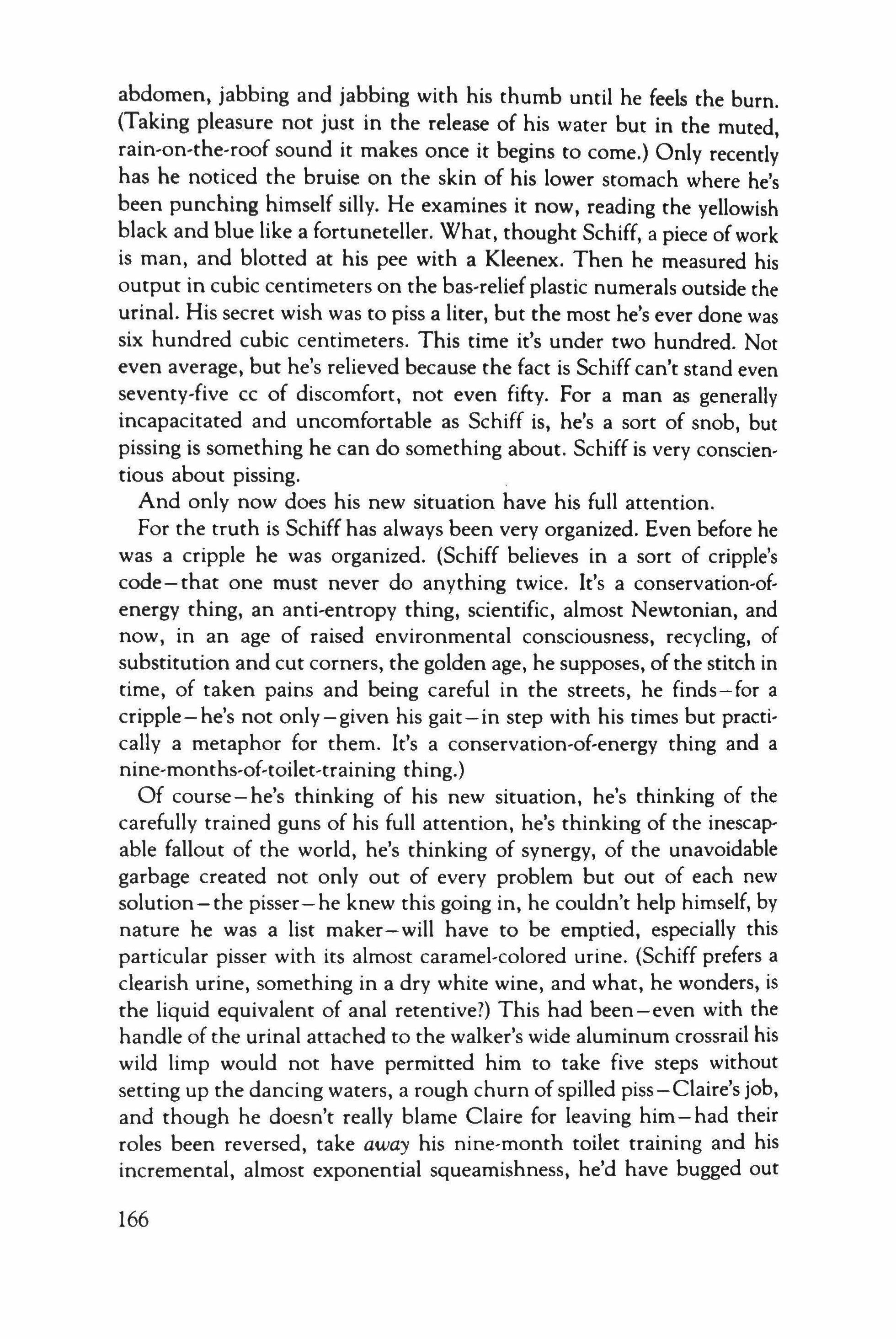
abdomen, jabbing and jabbing with his thumb until he feels the burn. (Taking pleasure not just in the release of his water but in the muted, rain-on-the-roof sound it makes once it begins to corne.) Only recently has he noticed the bruise on the skin of his lower stomach where he's been punching himself silly. He examines it now, reading the yellowish black and blue like a fortuneteller. What, thought Schiff, a piece of work is man, and blotted at his pee with a Kleenex. Then he measured his output in cubic centimeters on the bas-reliefplastic numerals outside the urinal. His secret wish was to piss a liter, but the most he's ever done was six hundred cubic centimeters. This time it's under two hundred. Not even average, but he's relieved because the fact is Schiff can't stand even seventy-five cc of discomfort, not even fifty. For a man as generally incapacitated and uncomfortable as Schiff is, he's a sort of snob, but pissing is something he can do something about. Schiff is very conscientious about pissing.
And only now does his new situation have his full attention.
For the truth is Schiff has always been very organized. Even before he was a cripple he was organized. (Schiff believes in a sort of cripple's code-that one must never do anything twice. It's a conservation-ofenergy thing, an anti-entropy thing, scientific, almost Newtonian, and now, in an age of raised environmental consciousness, recycling, of substitution and cut corners, the golden age, he supposes, of the stitch in time, of taken pains and being careful in the streets, he finds-for a cripple-he's not only-given his gait-in step with his times but practically a metaphor for them. It's a conservation-of-energy thing and a nine-months-of-toilet-training thing.)
Of course - he's thinking of his new situation, he's thinking of the carefully trained guns of his full attention, he's thinking of the inescapable fallout of the world, he's thinking of synergy, of the unavoidable garbage created not only out of every problem but out of each new solution-the pisser-he knew this going in, he couldn't help himself, by nature he was a list maker-will have to be emptied, especially this particular pisser with its almost caramel-colored urine. (Schiff prefers a clearish urine, something in a dry white wine, and what, he wonders, is the liquid equivalent of anal retentive?) This had been-even with the handle of the urinal attached to the walker's wide aluminum crossrail his wild limp would not have permitted him to take five steps without setting up the dancing waters, a rough churn of spilled piss-Claire's job, and though he doesn't really blame Claire for leaving him - had their roles been reversed, take away his nine-month toilet training and his incremental, almost exponential squeamishness, he'd have bugged out
166
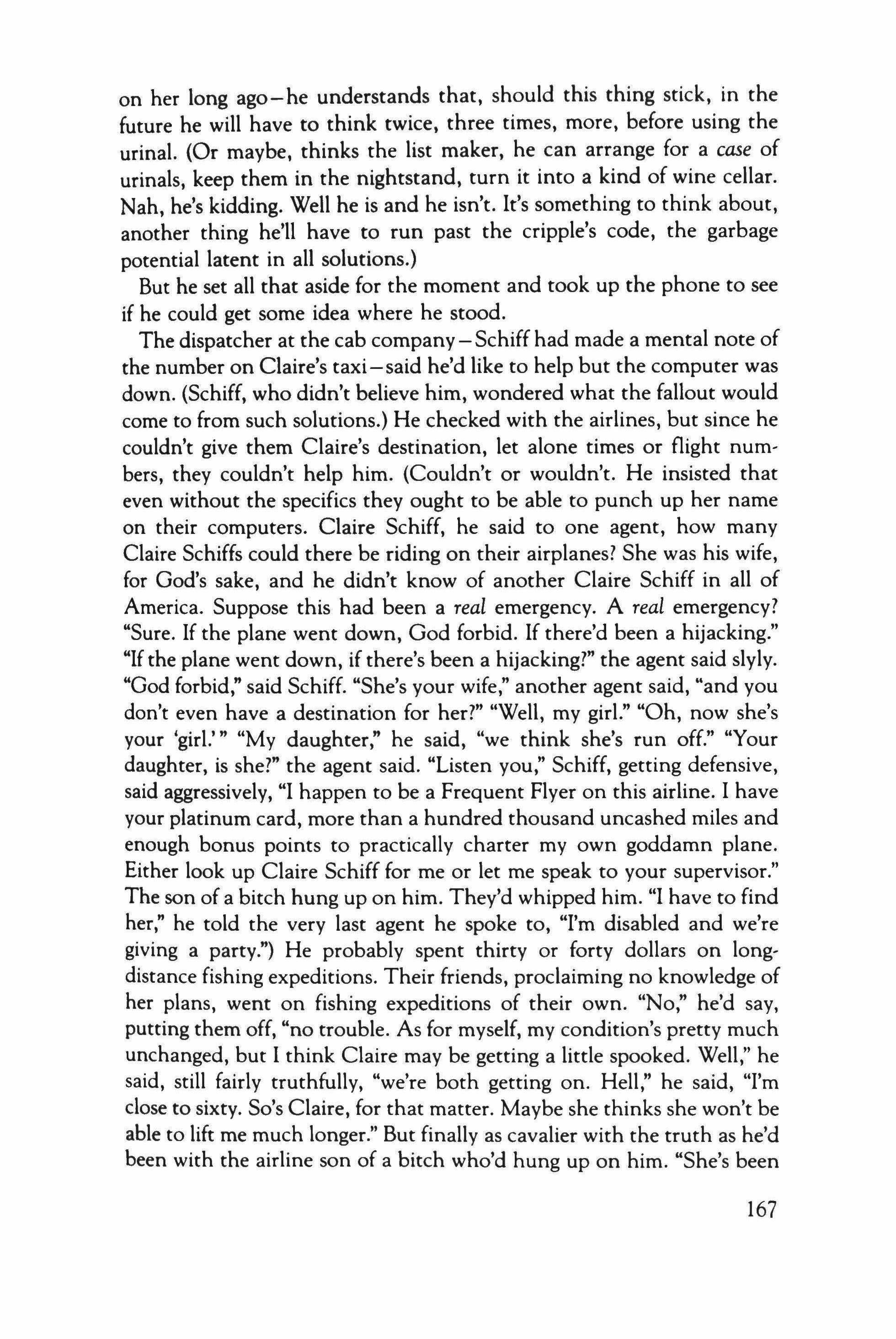
on her long ago-he understands that, should this thing stick, in the future he will have to think twice, three times, more, before using the urinal. (Or maybe, thinks the list maker, he can arrange for a case of urinals, keep them in the nightstand, turn it into a kind of wine cellar. Nah, he's kidding. Well he is and he isn't. It's something to think about, another thing he'll have to run past the cripple's code, the garbage potential latent in all solutions.)
But he set all that aside for the moment and took up the phone to see if he could get some idea where he stood.
The dispatcher at the cab company - Schiff had made a mental note of the number on Claire's taxi-said he'd like to help but the computer was down. (Schiff, who didn't believe him, wondered what the fallout would come to from such solutions.) He checked with the airlines, but since he couldn't give them Claire's destination, let alone times or flight numbers, they couldn't help him. (Couldn't or wouldn't. He insisted that even without the specifics they ought to be able to punch up her name on their computers. Claire Schiff, he said to one agent, how many Claire Schiffs could there be riding on their airplanes? She was his wife, for God's sake, and he didn't know of another Claire Schiff in all of America. Suppose this had been a real emergency. A real emergency? "Sure. If the plane went down, God forbid. If there'd been a hijacking." "If the plane went down, if there's been a hijacking?" the agent said slyly. "God forbid," said Schiff. "She's your wife," another agent said, "and you don't even have a destination for her?" "Well, my girl." "Oh, now she's your 'girl.'" "My daughter," he said, "we think she's run off." "Your daughter, is she?" the agent said. "Listen you," Schiff, getting defensive, said aggressively, "I happen to be a Frequent Flyer on this airline. I have your platinum card, more than a hundred thousand uncashed miles and enough bonus points to practically charter my own goddamn plane. Either look up Claire Schiff for me or let me speak to your supervisor." The son of a bitch hung up on him. They'd whipped him. "I have to find her," he told the very last agent he spoke to, "I'm disabled and we're giving a party.") He probably spent thirty or forty dollars on longdistance fishing expeditions. Their friends, proclaiming no knowledge of her plans, went on fishing expeditions of their own. "No," he'd say, putting them off, "no trouble. As for myself, my condition's pretty much unchanged, but I think Claire may be getting a little spooked. Well," he said, still fairly truthfully, "we're both getting on. Hell," he said, "I'm close to sixty. So's Claire, for that matter. Maybe she thinks she won't be able to lift me much longer." But finally as cavalier with the truth as he'd been with the airline son of a bitch who'd hung up on him. "She's been
167
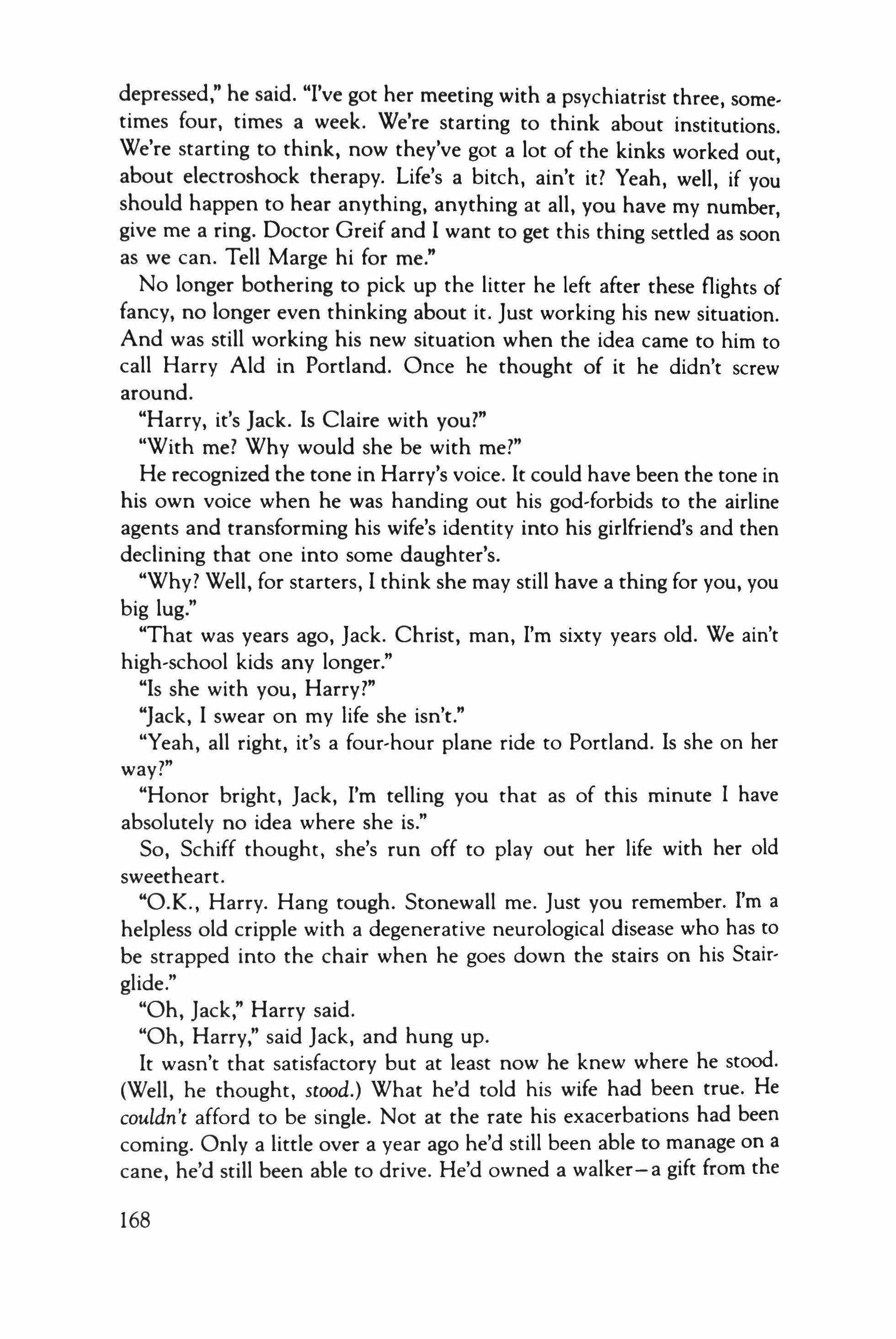
depressed," he said. "I've got her meeting with a psychiatrist three, sometimes four, times a week. We're starting to think about institutions. We're starting to think, now they've got a lot of the kinks worked out, about electroshock therapy. Life's a bitch, ain't it? Yeah, well, if you should happen to hear anything, anything at all, you have my number, give me a ring. Doctor Greif and I want to get this thing settled as soon as we can. Tell Marge hi for me."
No longer bothering to pick up the litter he left after these flights of fancy, no longer even thinking about it. Just working his new situation. And was still working his new situation when the idea came to him to call Harry Aid in Portland. Once he thought of it he didn't screw around.
"Harry, it's Jack. Is Claire with you?"
"With me? Why would she be with me?"
He recognized the tone in Harry's voice. It could have been the tone in his own voice when he was handing out his god-forbids to the airline agents and transforming his wife's identity into his girlfriend's and then declining that one into some daughter's.
"Why? Well, for starters, I think she may still have a thing for you, you big lug."
"That was years ago, Jack. Christ, man, I'm sixty years old. We ain't high-school kids any longer."
"Is she with you, Harry?"
"Jack, I swear on my life she isn't."
"Yeah, all right, it's a four-hour plane ride to Portland. Is she on her way?"
"Honor bright, Jack, I'm telling you that as of this minute I have absolutely no idea where she is."
So, Schiff thought, she's run off to play out her life with her old sweetheart.
"O.K., Harry. Hang tough. Stonewall me. Just you remember. I'm a helpless old cripple with a degenerative neurological disease who has to be strapped into the chair when he goes down the stairs on his Stairglide."
"Oh, Jack," Harry said.
"Oh, Harry," said Jack, and hung up.
It wasn't that satisfactory but at least now he knew where he stood. (Well, he thought, stood.) What he'd told his wife had been true. He couldn't afford to be single. Not at the rate his exacerbations had been coming. Only a little over a year ago he'd still been able to manage on a cane, he'd still been able to drive. He'd owned a walker-a gift from the
168
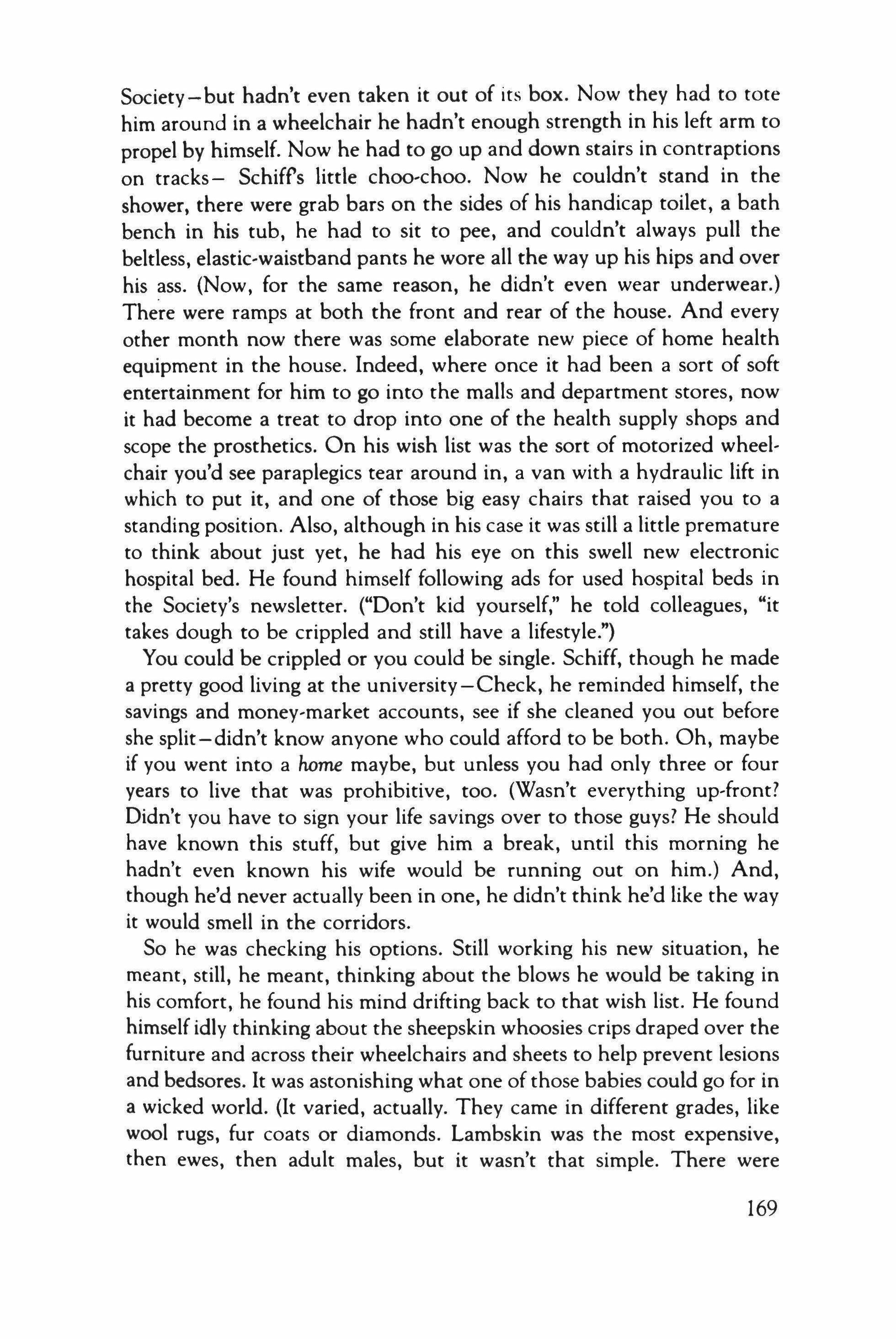
Society-but hadn't even taken it out of its box. Now they had to tote him around in a wheelchair he hadn't enough strength in his left arm to propel by himself. Now he had to go up and down stairs in contraptions on tracks- Schiff's little choo-choo. Now he couldn't stand in the shower, there were grab bars on the sides of his handicap toilet, a bath bench in his tub, he had to sit to pee, and couldn't always pull the beltless, elastic-waistband pants he wore all the way up his hips and over his ass. (Now, for the same reason, he didn't even wear underwear.) The"re were ramps at both the front and rear of the house. And every other month now there was some elaborate new piece of home health equipment in the house. Indeed, where once it had been a sort of soft entertainment for him to go into the malls and department stores, now it had become a treat to drop into one of the health supply shops and scope the prosthetics. On his wish list was the sort of motorized wheel, chair you'd see paraplegics tear around in, a van with a hydraulic lift in which to put it, and one of those big easy chairs that raised you to a standing position. Also, although in his case it was still a little premature to think about just yet, he had his eye on this swell new electronic hospital bed. He found himself following ads for used hospital beds in the Society's newsletter. ("Don't kid yourself," he told colleagues, "it takes dough to be crippled and still have a lifestyle.")
You could be crippled or you could be single. Schiff, though he made a pretty good living at the university-Check, he reminded himself, the savings and money-market accounts, see if she cleaned you out before she split-didn't know anyone who could afford to be both. Oh, maybe if you went into a home maybe, but unless you had only three or four years to live that was prohibitive, too. (Wasn't everything up-front? Didn't you have to sign your life savings over to those guys? He should have known this stuff, but give him a break, until this morning he hadn't even known his wife would be running out on him.) And, though he'd never actually been in one, he didn't think he'd like the way it would smell in the corridors.
So he was checking his options. Still working his new situation, he meant, still, he meant, thinking about the blows he would be taking in his comfort, he found his mind drifting back to that wish list. He found himself idly thinking about the sheepskin whoosies crips draped over the furniture and across their wheelchairs and sheets to help prevent lesions and bedsores. It was astonishing what one of those babies could go for in a wicked world. (It varied, actually. They came in different grades, like wool rugs, fur coats or diamonds. Lambskin was the most expensive, then ewes, then adult males, but it wasn't that simple. There were
169
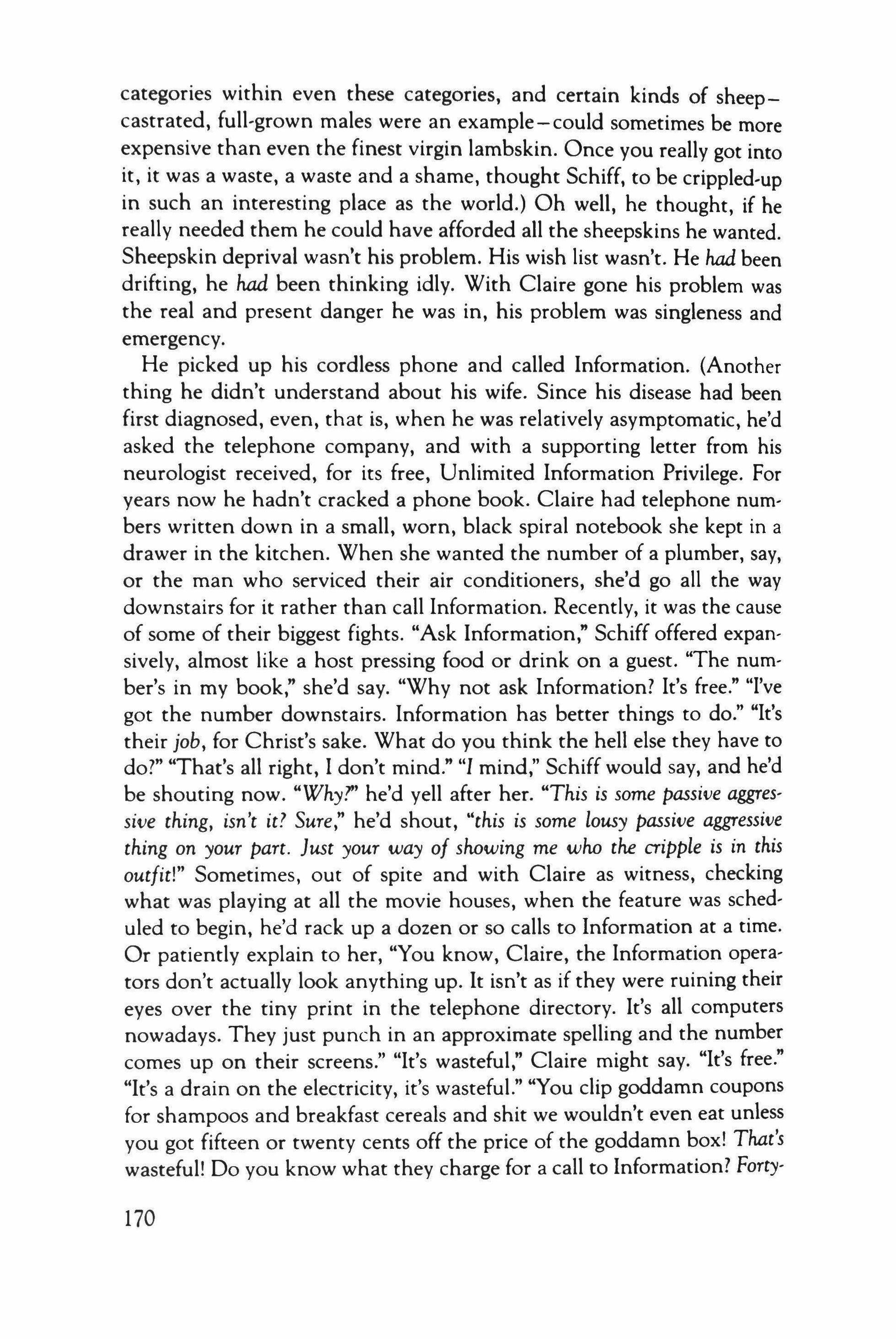
categories within even these categories, and certain kinds of sheepcastrated, full-grown males were an example-could sometimes be more expensive than even the finest virgin lambskin. Once you really got into it, it was a waste, a waste and a shame, thought Schiff, to be crippled-up in such an interesting place as the world.) Oh well, he thought, if he really needed them he could have afforded all the sheepskins he wanted. Sheepskin deprival wasn't his problem. His wish list wasn't. He had been drifting, he had been thinking idly. With Claire gone his problem was the real and present danger he was in, his problem was singleness and emergency.
He picked up his cordless phone and called Information. (Another thing he didn't understand about his wife. Since his disease had been first diagnosed, even, that is, when he was relatively asymptomatic, he'd asked the telephone company, and with a supporting letter from his neurologist received, for its free, Unlimited Information Privilege. For years now he hadn't cracked a phone book. Claire had telephone numbers written down in a small, worn, black spiral notebook she kept in a drawer in the kitchen. When she wanted the number of a plumber, say, or the man who serviced their air conditioners, she'd go all the way downstairs for it rather than call Information. Recently, it was the cause of some of their biggest fights. "Ask Information," Schiff offered expansively, almost like a host pressing food or drink on a guest. "The number's in my book," she'd say. "Why not ask Information? It's free." "I've got the number downstairs. Information has better things to do." "It's their job, for Christ's sake. What do you think the hell else they have to do?" "That's all right, I don't mind." "1 mind," Schiff would say, and he'd be shouting now. "Why?" he'd yell after her. "This is some passive aggressive thing, isn't it? Sure," he'd shout, "this is some lousy passive aggressive thing on your part. lust your way of showing me who the cripple is in this outfit!" Sometimes, out of spite and with Claire as witness, checking what was playing at all the movie houses, when the feature was scheduled to begin, he'd rack up a dozen or so calls to Information at a time. Or patiently explain to her, "You know, Claire, the Information operators don't actually look anything up. It isn't as if they were ruining their eyes over the tiny print in the telephone directory. It's all computers nowadays. They just punch in an approximate spelling and the number comes up on their screens." "It's wasteful," Claire might say. "It's free." "It's a drain on the electricity, it's wasteful." "You clip goddamn coupons for shampoos and breakfast cereals and shit we wouldn't even eat unless you got fifteen or twenty cents off the price of the goddamn box! That's wasteful! Do you know what they charge for a call to Information? Forty-
170
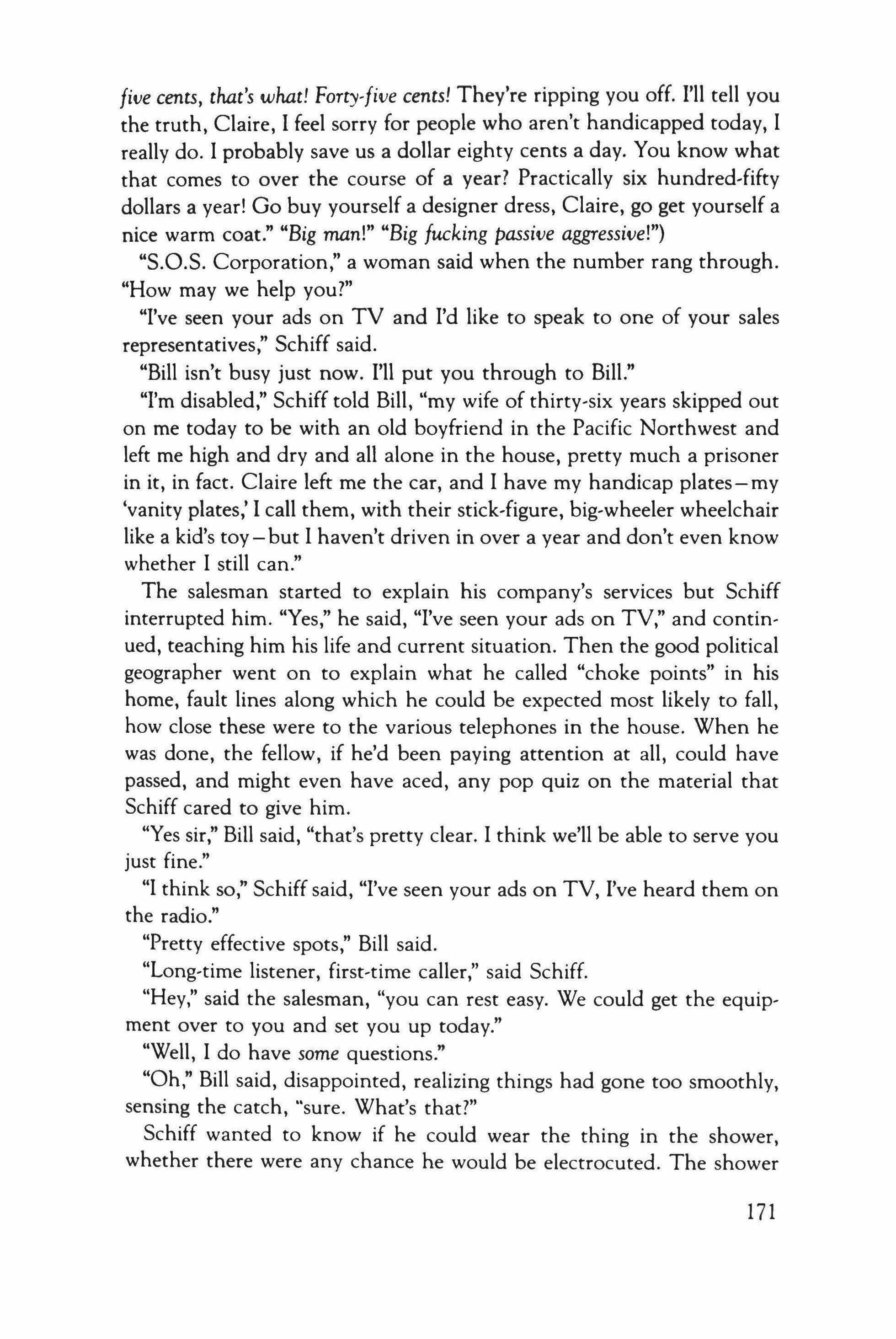
five cents, that's what! Forty-five cents! They're ripping you off. I'll tell you the truth, Claire, I feel sorry for people who aren't handicapped today, I really do. I probably save us a dollar eighty cents a day. You know what that comes to over the course of a year? Practically six hundred-fifty dollars a year! Go buy yourself a designer dress, Claire, go get yourself a nice warm coat." "Big man!" "Big fucking passive aggressive!")
"S.O.S. Corporation," a woman said when the number rang through. "How may we help you?"
"I've seen your ads on TV and I'd like to speak to one of your sales representatives," Schiff said.
"Bill isn't busy just now. I'll put you through to Bill."
"I'm disabled," Schiff told Bill, "my wife of thirty-six years skipped out on me today to be with an old boyfriend in the Pacific Northwest and left me high and dry and all alone in the house, pretty much a prisoner in it, in fact. Claire left me the car, and I have my handicap plates-my 'vanity plates,' I call them, with their stick-figure, big-wheeler wheelchair like a kid's toy - but I haven't driven in over a year and don't even know whether I still can."
The salesman started to explain his company's services but Schiff interrupted him. "Yes," he said, "I've seen your ads on TV," and continued, teaching him his life and current situation. Then the good political geographer went on to explain what he called "choke points" in his home, fault lines along which he could be expected most likely to fall, how close these were to the various telephones in the house. When he was done, the fellow, if he'd been paying attention at all, could have passed, and might even have aced, any pop quiz on the material that Schiff cared to give him.
"Yes sir," Bill said, "that's pretty clear. I think we'll be able to serve you just fine."
"I think so," Schiff said, "I've seen your ads on TV, I've heard them on the radio."
"Pretty effective spots," Bill said.
"Long-time listener, first-time caller," said Schiff. "Hey," said the salesman, "you can rest easy. We could get the equipment over to you and set you up today."
"Well, I do have some questions."
"Oh," Bill said, disappointed, realizing things had gone too smoothly, sensing the catch, "sure. What's that?"
Schiff wanted to know if he could wear the thing in the shower, whether there were any chance he would be electrocuted. The shower
171
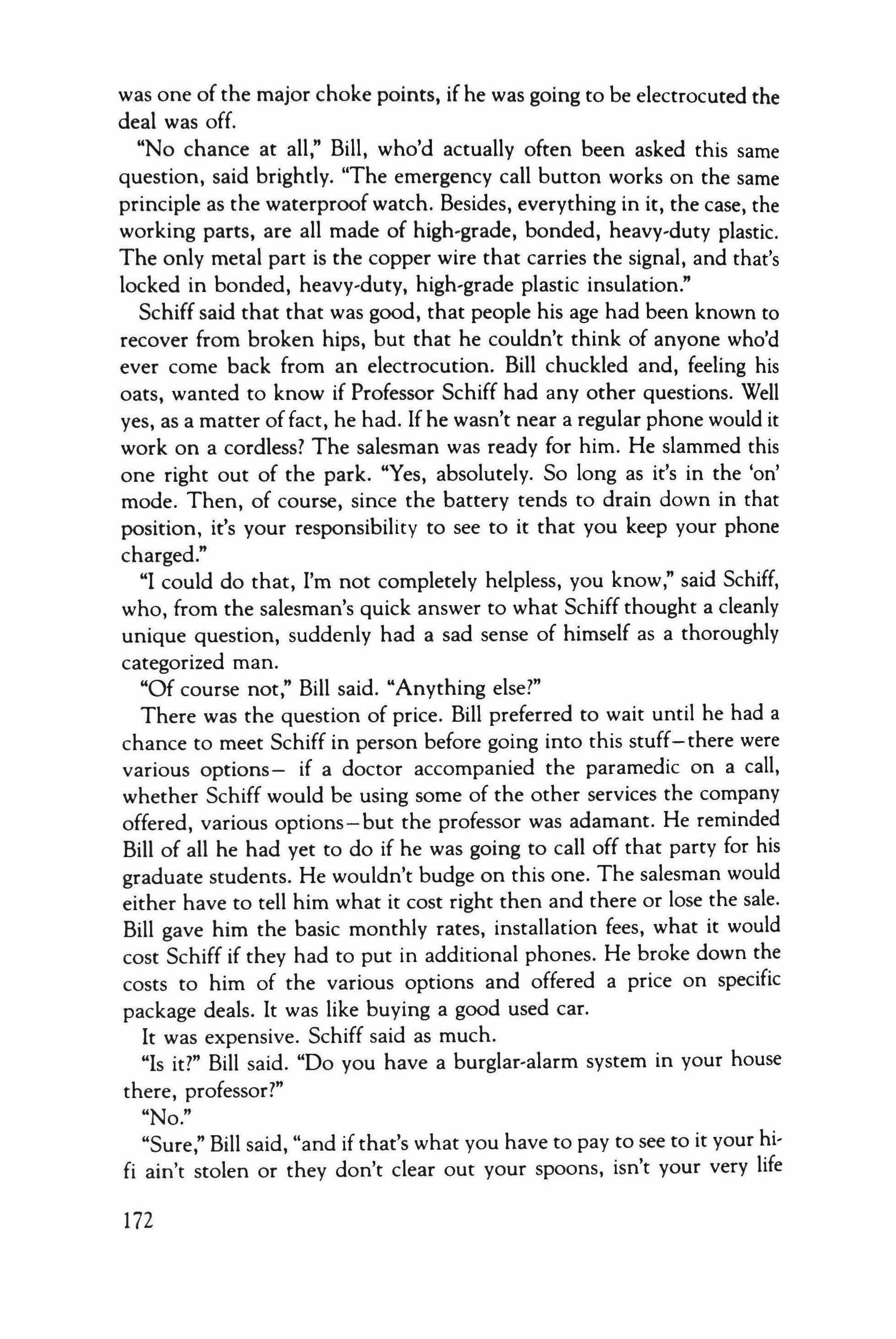
was one of the major choke points, if he was going to be electrocuted the deal was off.
"No chance at all," Bill, who'd actually often been asked this same question, said brightly. "The emergency call button works on the same principle as the waterproof watch. Besides, everything in it, the case, the working parts, are all made of high-grade, bonded, heavy-duty plastic. The only metal part is the copper wire that carries the signal, and that's locked in bonded, heavy-duty, high-grade plastic insulation."
Schiff said that that was good, that people his age had been known to recover from broken hips, but that he couldn't think of anyone who'd ever come back from an electrocution. Bill chuckled and, feeling his oats, wanted to know if Professor Schiff had any other questions. Well yes, as a matter offact, he had. If he wasn't near a regular phone would it work on a cordless? The salesman was ready for him. He slammed this one right out of the park. "Yes, absolutely. So long as it's in the 'on' mode. Then, of course, since the battery tends to drain down in that position, it's your responsibility to see to it that you keep your phone charged."
"I could do that, I'm not completely helpless, you know," said Schiff, who, from the salesman's quick answer to what Schiff thought a cleanly unique question, suddenly had a sad sense of himself as a thoroughly categorized man.
"Of course not," Bill said. "Anything else?"
There was the question of price. Bill preferred to wait until he had a chance to meet Schiff in person before going into this stuff-there were various options- if a doctor accompanied the paramedic on a call, whether Schiff would be using some of the other services the company offered, various options- but the professor was adamant. He reminded Bill of all he had yet to do if he was going to call off that party for his graduate students. He wouldn't budge on this one. The salesman would either have to tell him what it cost right then and there or lose the sale. Bill gave him the basic monthly rates, installation fees, what it would cost Schiff if they had to put in additional phones. He broke down the costs to him of the various options and offered a price on specific package deals. It was like buying a good used car.
It was expensive. Schiff said as much.
"Is it?" Bill said. "Do you have a burglar-alarm system in your house there, professor?"
"No."
"Sure," Bill said, "and if that's what you have to pay to see to it your hi, fi ain't stolen or they don't clear out your spoons, isn't your very life
172
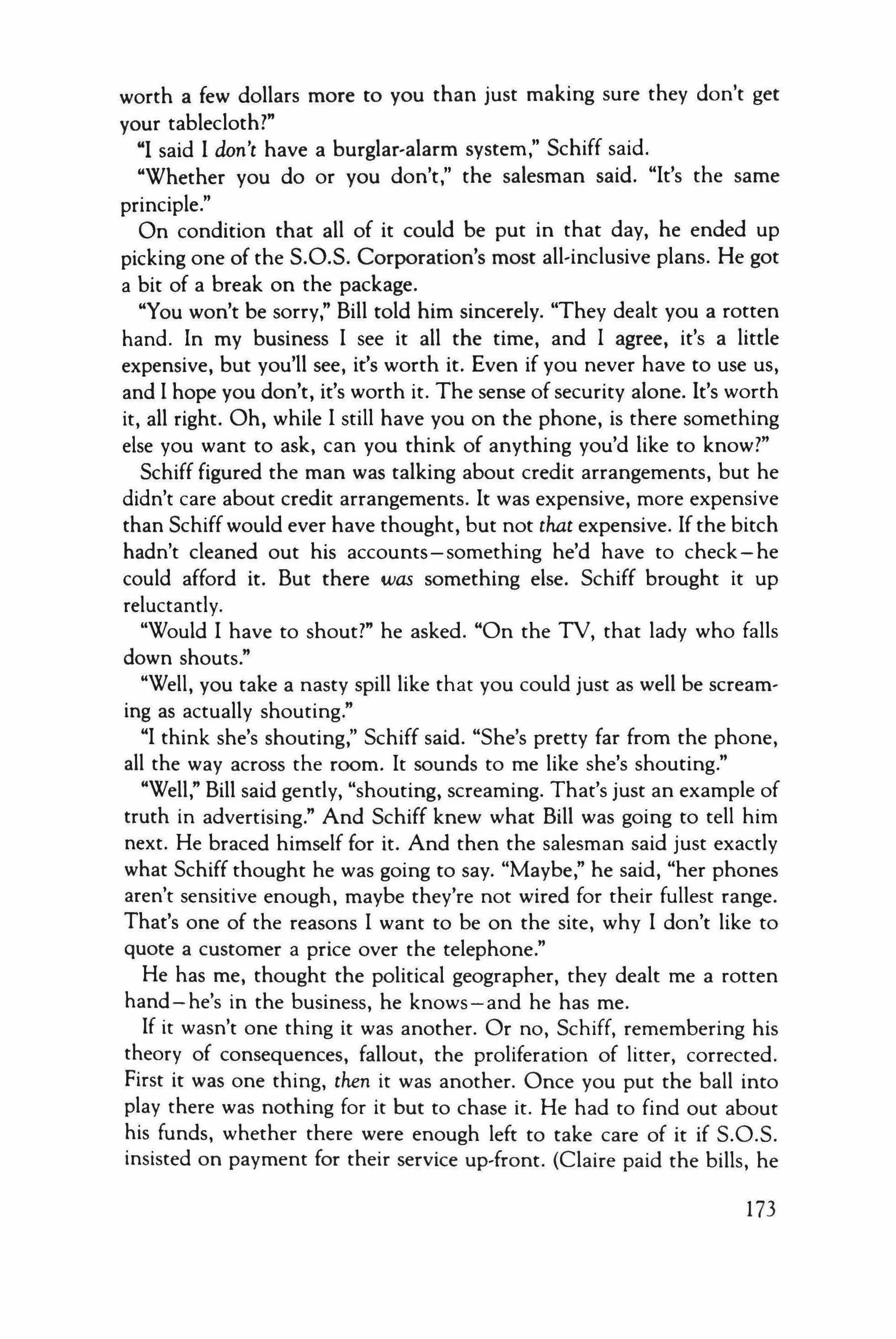
worth a few dollars more to you than just making sure they don't get your tablecloth?"
"I said I don't have a burglar-alarm system," Schiff said. "Whether you do or you don't," the salesman said. "It's the same principle."
On condition that all of it could be put in that day, he ended up picking one of the S.O.S. Corporation's most all-inclusive plans. He got a bit of a break on the package.
"You won't be sorry," Bill told him sincerely. "They dealt you a rotten hand. In my business I see it all the time, and I agree, it's a little expensive, but you'll see, it's worth it. Even if you never have to use us, and I hope you don't, it's worth it. The sense of security alone. It's worth it, all right. Oh, while I still have you on the phone, is there something else you want to ask, can you think of anything you'd like to know?"
Schiff figured the man was talking about credit arrangements, but he didn't care about credit arrangements. It was expensive, more expensive than Schiffwould ever have thought, but not that expensive. If the bitch hadn't cleaned out his accounts-something he'd have to check-he could afford it. But there was something else. Schiff brought it up reluctantly.
"Would I have to shout?" he asked. "On the TV, that lady who falls down shouts."
"Well, you take a nasty spill like that you could just as well be screaming as actually shouting."
"I think she's shouting," Schiff said. "She's pretty far from the phone, all the way across the room. It sounds to me like she's shouting."
"Well," Bill said gently, "shouting, screaming. That's just an example of truth in advertising." And Schiff knew what Bill was going to tell him next. He braced himself for it. And then the salesman said just exactly what Schiff thought he was going to say. "Maybe," he said, "her phones aren't sensitive enough, maybe they're not wired for their fullest range. That's one of the reasons I want to be on the site, why 1 don't like to quote a customer a price over the telephone."
He has me, thought the political geographer, they dealt me a rotten hand-he's in the business, he knows-and he has me.
If it wasn't one thing it was another. Or no, Schiff, remembering his theory of consequences, fallout, the proliferation of litter, corrected. First it was one thing, then it was another. Once you put the ball into play there was nothing for it but to chase it. He had to find out about his funds, whether there were enough left to take care of it if S.O.S. insisted on payment for their service up-front. (Claire paid the bills, he
173
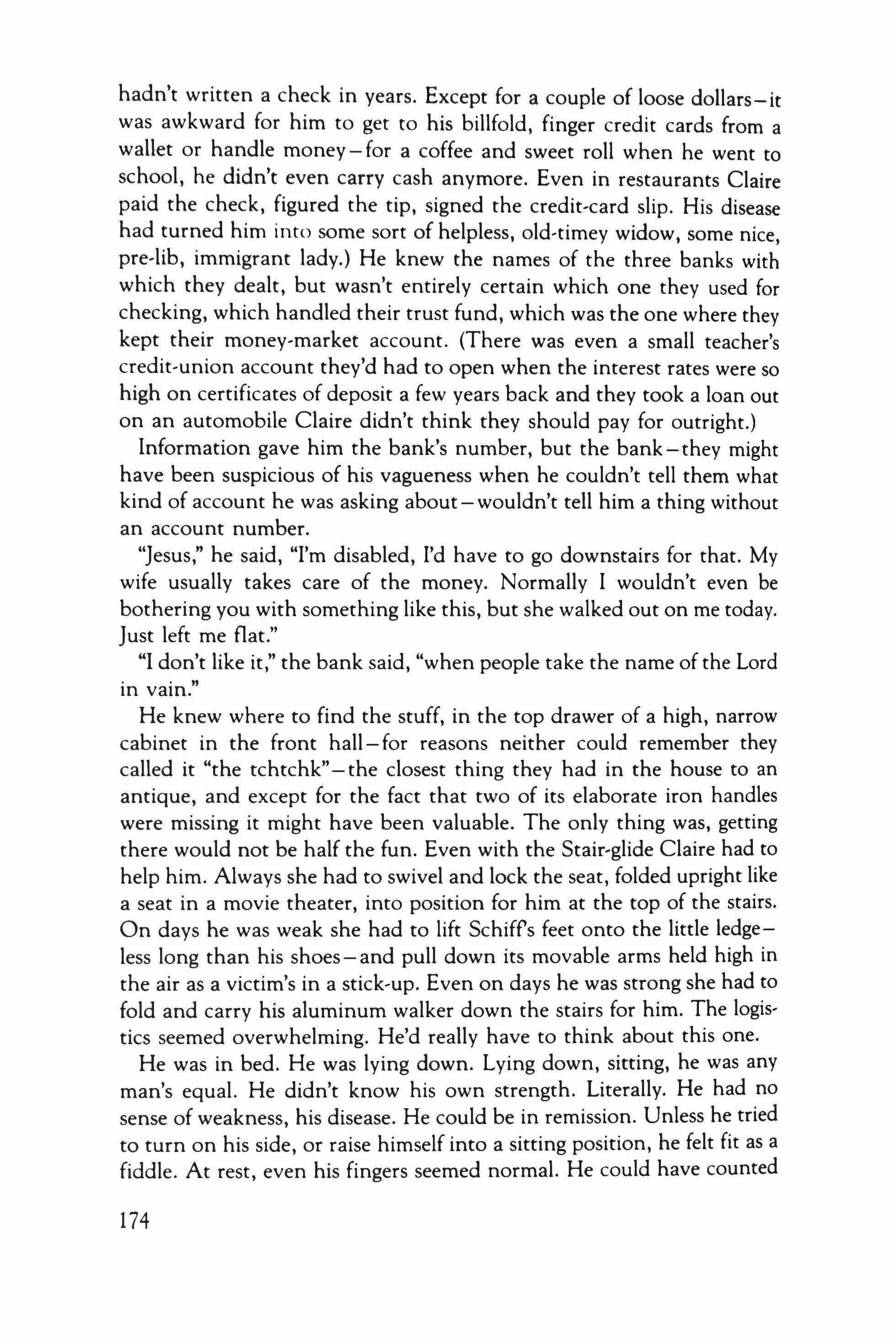
hadn't written a check in years. Except for a couple of loose dollars-it was awkward for him to get to his billfold, finger credit cards from a wallet or handle money - for a coffee and sweet roll when he went to school, he didn't even carry cash anymore. Even in restaurants Claire paid the check, figured the tip, signed the credit-card slip. His disease had turned him into some sort of helpless, old-rirnev widow, some nice, pre-lib, immigrant ladv.) He knew the names of the three banks with which they dealt, but wasn't entirely certain which one they used for checking, which handled their trust fund, which was the one where they kept their money-market account. (There was even a small teacher's credit-union account they'd had to open when the interest rates were so high on certificates of deposit a few years back and they took a loan out on an automobile Claire didn't think they should pay for ourright.)
Information gave him the bank's number, but the bank-they might have been suspicious of his vagueness when he couldn't tell them what kind of account he was asking about-wouldn't tell him a thing without an account number.
"Jesus," he said, "I'm disabled, I'd have to go downstairs for that. My wife usually takes care of the money. Normally I wouldn't even be bothering you with something like this, but she walked out on me today. Just left me flat."
"I don't like it," the bank said, "when people take the name of the Lord in vain."
He knew where to find the stuff, in the top drawer of a high, narrow cabinet in the front hall-for reasons neither could remember they called it "the tchtchk" - the closest thing they had in the house to an antique, and except for the fact that two of its elaborate iron handles were missing it might have been valuable. The only thing was, getting there would not be half the fun. Even with the Stair-glide Claire had to help him. Always she had to swivel and lock the seat, folded upright like a seat in a movie theater, into position for him at the top of the stairs. On days he was weak she had to lift Schiff's feet onto the little ledgeless long than his shoes-and pull down its movable arms held high in the air as a victim's in a stick-up. Even on days he was strong she had to fold and carry his aluminum walker down the stairs for him. The logistics seemed overwhelming. He'd really have to think about this one.
He was in bed. He was lying down. Lying down, sitting, he was any man's equal. He didn't know his own strength. Literally. He had no sense of weakness, his disease. He could be in remission. Unless he tried to turn on his side, or raise himself into a sitting position, he felt fit as a fiddle. At rest, even his fingers seemed normal. He could have counted
174
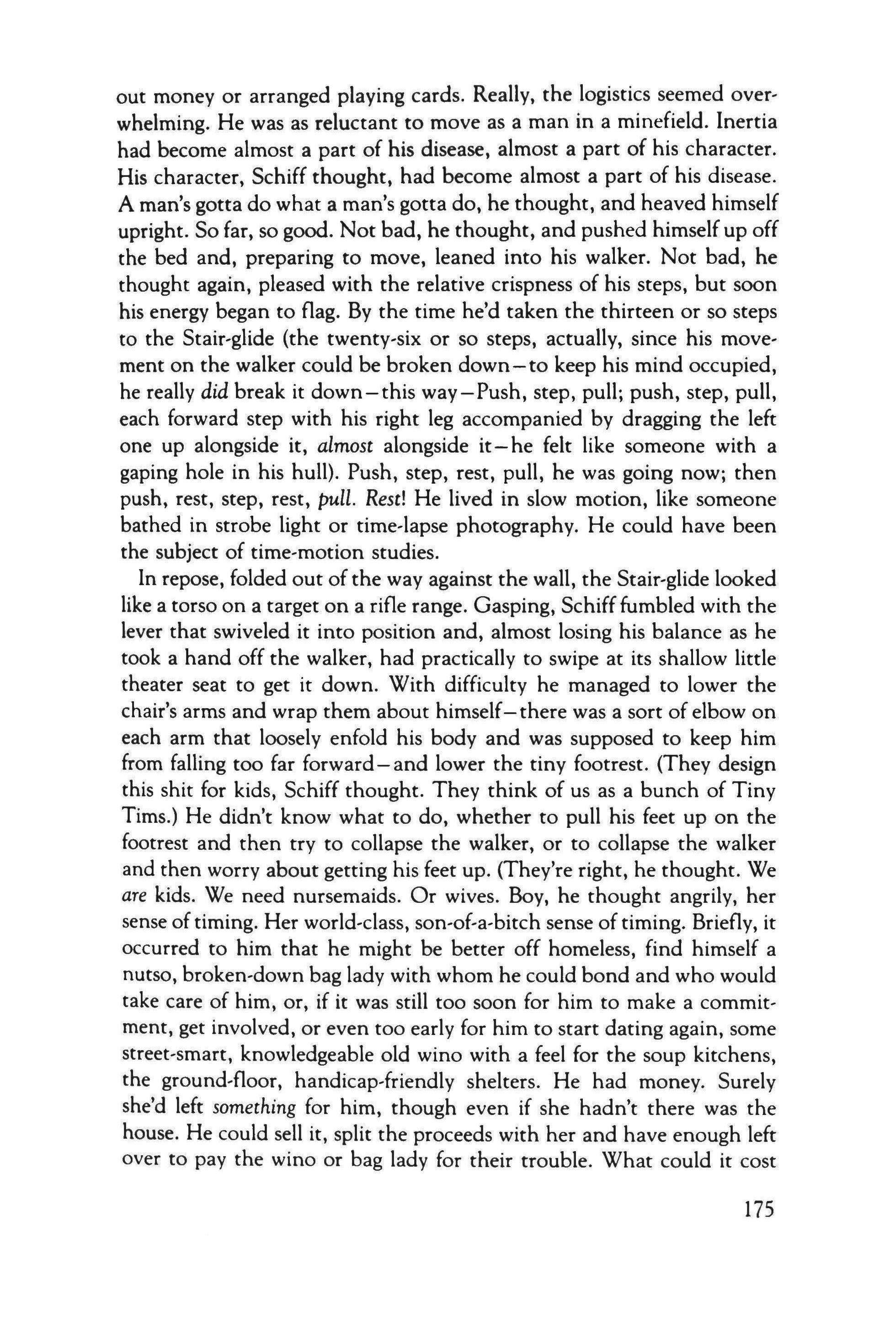
out money or arranged playing cards. Really, the logistics seemed overwhelming. He was as reluctant to move as a man in a minefield. Inertia had become almost a part of his disease, almost a part of his character. His character, Schiff thought, had become almost a part of his disease. A man's gotta do what a man's gotta do, he thought, and heaved himself upright. So far, so good. Not bad, he thought, and pushed himself up off the bed and, preparing to move, leaned into his walker. Not bad, he thought again, pleased with the relative crispness of his steps, but soon his energy began to flag. By the time he'd taken the thirteen or so steps to the Stair-glide (the twenty-six or so steps, actually, since his movement on the walker could be broken down-to keep his mind occupied, he really did break it down-this way-Push, step, pull; push, step, pull, each forward step with his right leg accompanied by dragging the left one up alongside it, almost alongside it - he felt like someone with a gaping hole in his hull). Push, step, rest, pull, he was going now; then push, rest, step, rest, pull. Rest! He lived in slow motion, like someone bathed in strobe light or time-lapse photography. He could have been the subject of time-motion studies.
In repose, folded out of the way against the wall, the Stair-glide looked like a torso on a target on a rifle range. Gasping, Schifffumbled with the lever that swiveled it into position and, almost losing his balance as he took a hand off the walker, had practically to swipe at its shallow little theater seat to get it down. With difficulty he managed to lower the chair's arms and wrap them about himself-there was a sort of elbow on each arm that loosely enfold his body and was supposed to keep him from falling too far forward - and lower the tiny footrest. (They design this shit for kids, Schiff thought. They think of us as a bunch of Tiny Tims.) He didn't know what to do, whether to pull his feet up on the footrest and then try to collapse the walker, or to collapse the walker and then worry about getting his feet up. (They're right, he thought. We are kids. We need nursemaids. Or wives. Boy, he thought angrily, her sense of timing. Her world-class, son-of-a-bitch sense of timing. Briefly, it occurred to him that he might be better off homeless, find himself a nutso, broken-down bag lady with whom he could bond and who would take care of him, or, if it was still too soon for him to make a commitment, get involved, or even too early for him to start dating again, some street-smart, knowledgeable old wino with a feel for the soup kitchens, the ground-floor, handicap-friendly shelters. He had money. Surely she'd left something for him, though even if she hadn't there was the house. He could sell it, split the proceeds with her and have enough left over to pay the wino or bag lady for their trouble. What could it cost
175

him-ten bucks a day, fifteen? Hell, if he didn't save almost that much on the calls he made to Information, he saved almost almost that much. I was already crippled. Schiff thought. now I'm crazy. too.} It was a dilemma. a whaddavacallu, Hobson's choice. This ain't going to happen, he told himself. If I bring my feet up and fold the walker my feet will slide off the footrest and I'll never get them back on it again. If I fold the walker and hold it I won't have the use of my hands to lift up my feet. Then. out of the blue, it came to him. He raised his feet onto the footrest and moved the chair into its glide mode. He leaned over and picked up the still-uncollapsed walker. He didn't even try to fold it. With his arms on the armrests and the heel of his hand pressed against the button that made the Stair-glide go. he raised the lightweight aluminum walker around his body and up about level with the top of his head and. to all intents and purposes. proceeded to wear it downstairs!
By the time he'd made it the eight steps to the landing-his hand kept slipping off the button and stopping the chair- a second walker, one he could keep permanently set up at the bottom of the stairs-had gone on his wish list. When the chair glide slowly started its turn into the second flight-he'd timed it once. it took exactly one minute to do the trip-the telephone began to ring. He knew it would stop ringing before he could get to it. I'm in farce, he thought. I take to farce the way ducks take to water. But, even in farce, Schiff was a hopeful man - a man, that is, obsessed with solutions, even though he tried always to live by the cripple's code with all its concomitant notions about the exponentiality of litter and his grand ideas about every solved problem creating a new one. Now, for example, he had still more items for his wish list. He could leave cordless phones all over the house, in every out-of-the-way place he was likely to be when a phone started to ring, by the shelf where the toilet paper was kept, along the tops of tables, between the cushions of the sofa, in the gap between his pants pocket and the side of a chair, beside potted plants on windowsills - in each inconvenient closet, pantry, alcove and cuddy, adjunct to all the complicated, nesty network of random space.
The minute was up. He was at the bottom of the stairs. He disrobed himself of the walker and set it down, aware at once (by the relief he felt, that suffused him like a kind of pleasure) of how rough it could be, how heavy it became if one wasn't up to the burdens of aluminum. The burdens of aluminum. And, still seated in the chair glide, already accustomed to his relief, no longer surprised by the return of his off-again, onagain energies, restored - so long as he remained seated - to health, which after the ordeal of the stairs he intended to savor a while longer,
176
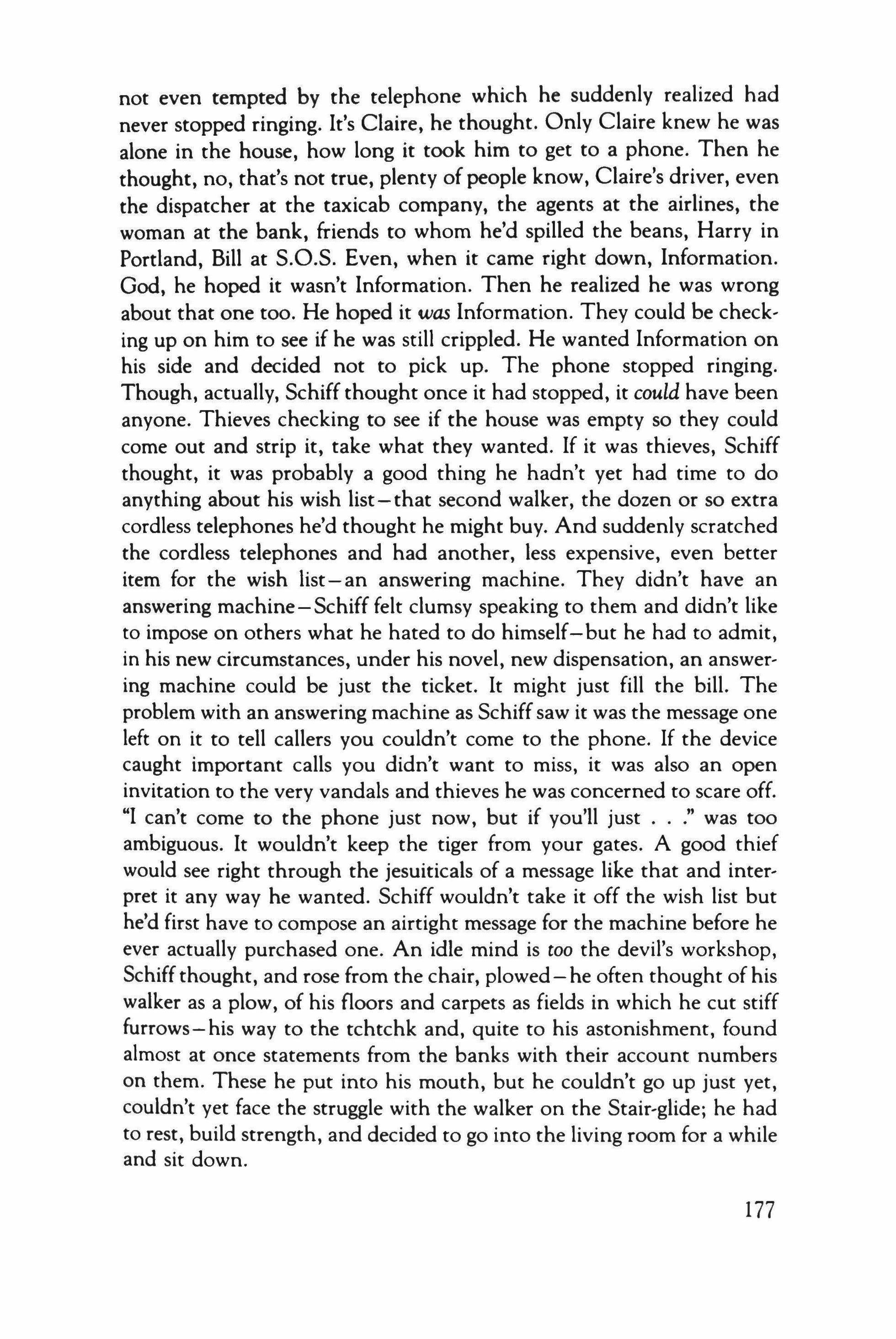
not even tempted by the telephone which he suddenly realized had never stopped ringing. It's Claire, he thought. Only Claire knew he was alone in the house, how long it took him to get to a phone. Then he thought, no, that's not true, plenty of people know, Claire's driver, even the dispatcher at the taxicab company, the agents at the airlines, the woman at the bank, friends to whom he'd spilled the beans, Harry in Portland, Bill at S.O.S. Even, when it came right down, Information. God, he hoped it wasn't Information. Then he realized he was wrong about that one too. He hoped it was Information. They could be checking up on him to see if he was still crippled. He wanted Information on his side and decided not to pick up. The phone stopped ringing. Though, actually, Schiff thought once it had stopped, it could have been anyone. Thieves checking to see if the house was empty so they could come out and strip it, take what they wanted. If it was thieves, Schiff thought, it was probably a good thing he hadn't yet had time to do anything about his wish list-that second walker, the dozen or so extra cordless telephones he'd thought he might buy. And suddenly scratched the cordless telephones and had another, less expensive, even better item for the wish list - an answering machine. They didn't have an answering machine-Schifffeit clumsy speaking to them and didn't like to impose on others what he hated to do himself-but he had to admit, in his new circumstances, under his novel, new dispensation, an answering machine could be just the ticket. It might just fill the bill. The problem with an answering machine as Schiff saw it was the message one left on it to tell callers you couldn't come to the phone. If the device caught important calls you didn't want to miss, it was also an open invitation to the very vandals and thieves he was concerned to scare off. "I can't come to the phone just now, but if you'll just ." was too ambiguous. It wouldn't keep the tiger from your gates. A good thief would see right through the jesuiticals of a message like that and interpret it any way he wanted. Schiff wouldn't take it off the wish list but he'd first have to compose an airtight message for the machine before he ever actually purchased one. An idle mind is too the devil's workshop, Schiffthought, and rose from the chair, plowed - he often thought of his walker as a plow, of his floors and carpets as fields in which he cut stiff furrows-his way to the tchtchk and, quite to his astonishment, found almost at once statements from the banks with their account numbers on them. These he put into his mouth, but he couldn't go up just yet, couldn't yet face the struggle with the walker on the Stair-glide; he had to rest, build strength, and decided to go into the living room for a while and sit down.
177
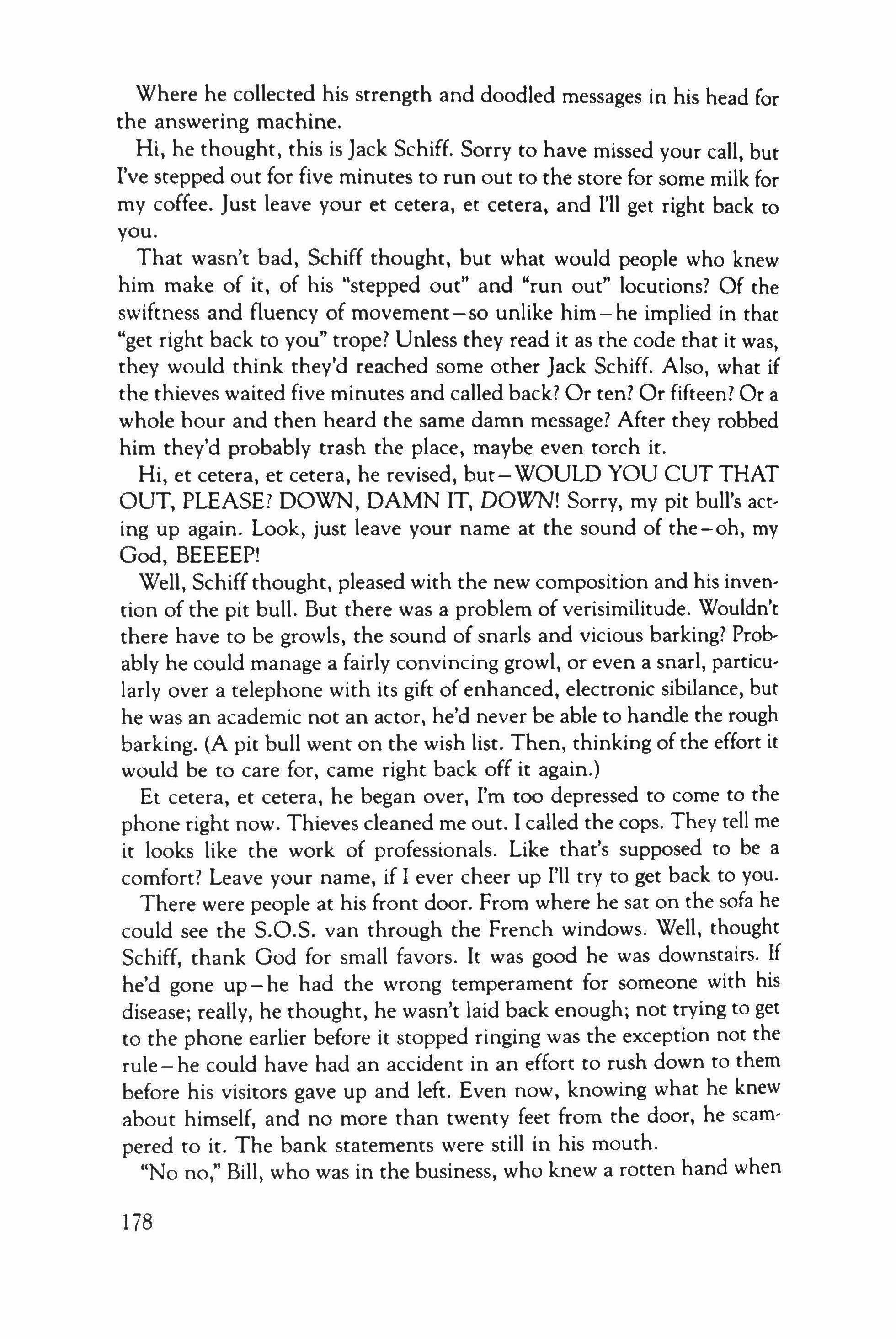
Where he collected his strength and doodled messages in his head for the answering machine.
Hi, he thought, this is Jack Schiff. Sorry to have missed your call, but I've stepped out for five minutes to run out to the store for some milk for my coffee. Just leave your et cetera, et cetera, and I'll get right back to you.
That wasn't bad, Schiff thought, but what would people who knew him make of it, of his "stepped out" and "run out" locutions? Of the swiftness and fluency of movement-so unlike him-he implied in that "get right back to you" trope? Unless they read it as the code that it was, they would think they'd reached some other Jack Schiff. Also, what if the thieves waited five minutes and called back? Or ten? Or fifteen? Or a whole hour and then heard the same damn message? After they robbed him they'd probably trash the place, maybe even torch it.
Hi, et cetera, et cetera, he revised, but- WOULD YOU CUT THAT OUT, PLEASE? DOWN, DAMN IT, DOWN! Sorry, my pit bull's acting up again. Look, just leave your name at the sound of the-oh, my God, BEEEEP!
Well, Schiff thought, pleased with the new composition and his invention of the pit bull. But there was a problem of verisimilitude. Wouldn't there have to be growls, the sound of snarls and vicious barking? Probably he could manage a fairly convincing growl, or even a snarl, particularly over a telephone with its gift of enhanced, electronic sibilance, but he was an academic not an actor, he'd never be able to handle the rough barking. (A pit bull went on the wish list. Then, thinking of the effort it would be to care for, came right back off it again.)
Et cetera, et cetera, he began over, I'm too depressed to come to the phone right now. Thieves cleaned me out. I called the cops. They tell me it looks like the work of professionals. Like that's supposed to be a comfort? Leave your name, if I ever cheer up I'll try to get back to you.
There were people at his front door. From where he sat on the sofa he could see the S.O.S. van through the French windows. Well, thought Schiff, thank God for small favors. It was good he was downstairs. If he'd gone up-he had the wrong temperament for someone with his disease; really, he thought, he wasn't laid back enough; not trying to get to the phone earlier before it stopped ringing was the exception not the rule - he could have had an accident in an effort to rush down to them before his visitors gave up and left. Even now, knowing what he knew about himself, and no more than twenty feet from the door, he scampered to it. The bank statements were still in his mouth.
"No no," Bill, who was in the business, who knew a rotten hand when
178
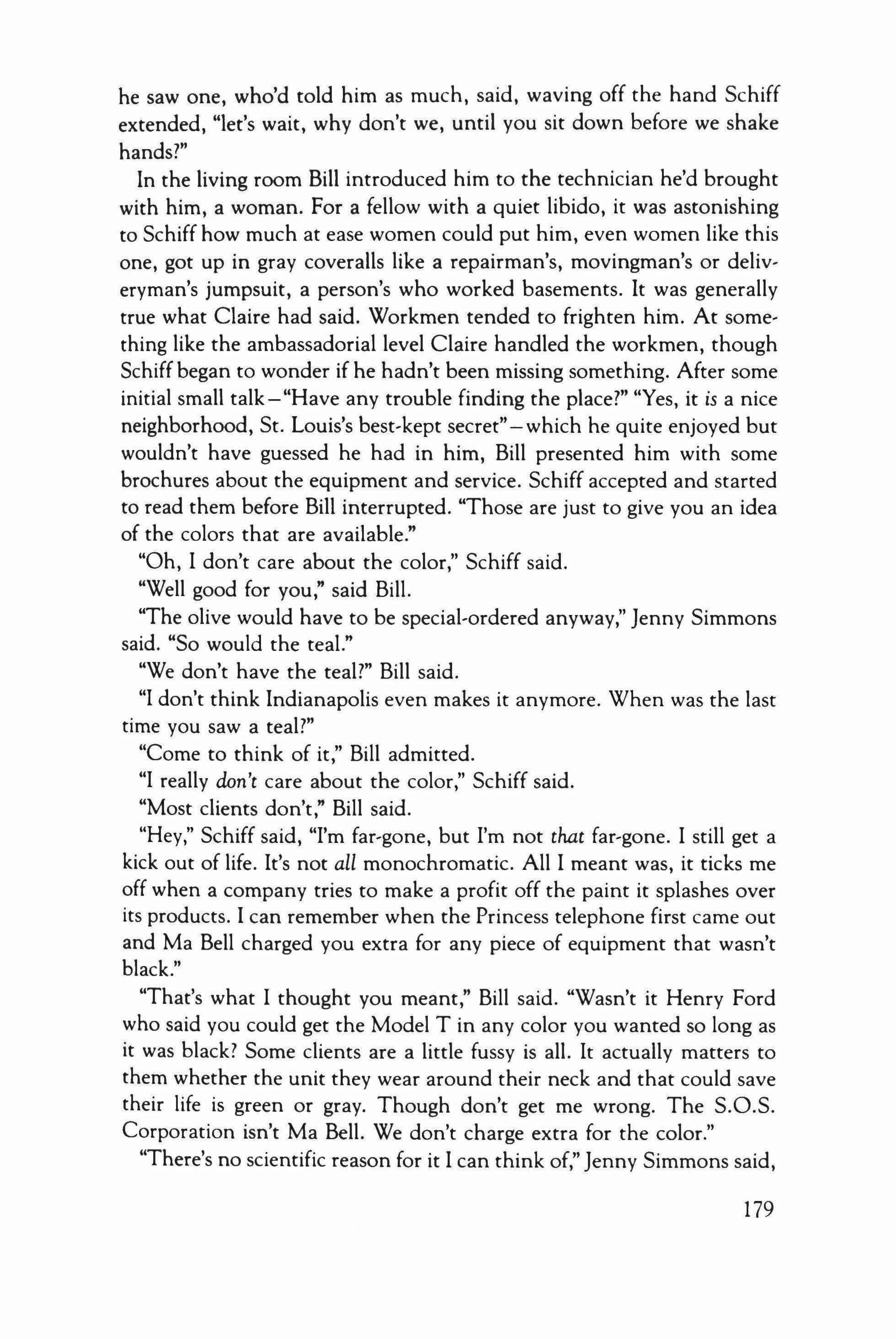
he saw one, who'd told him as much, said, waving off the hand Schiff extended, "let's wait, why don't we, until you sit down before we shake hands?"
In the living room Bill introduced him to the technician he'd brought with him, a woman. For a fellow with a quiet libido, it was astonishing to Schiff how much at ease women could put him, even women like this one, got up in gray coveralls like a repairman's, movingman's or deliveryman's jumpsuit, a person's who worked basements. It was generally true what Claire had said. Workmen tended to frighten him. At something like the ambassadorial level Claire handled the workmen, though Schiff began to wonder if he hadn't been missing something. After some initial small talk-"Have any trouble finding the place?" "Yes, it is a nice neighborhood, St. Louis's best-kept secret"-which he quite enjoyed but wouldn't have guessed he had in him, Bill presented him with some brochures about the equipment and service. Schiff accepted and started to read them before Bill interrupted. "Those are just to give you an idea of the colors that are available."
"Oh, I don't care about the color," Schiff said.
"Well good for you," said Bill.
"The olive would have to be special-ordered anyway," Jenny Simmons said. "So would the teal."
"We don't have the teal?" Bill said.
"I don't think Indianapolis even makes it anymore. When was the last time you saw a teal?"
"Come to think of it," Bill admitted.
"I really don't care about the color," Schiff said.
"Most clients don't," Bill said.
"Hey," Schiff said, "I'm far-gone, but I'm not that far-gone. I still get a kick out of life. It's not all monochromatic. All I meant was, it ticks me off when a company tries to make a profit off the paint it splashes over its products. I can remember when the Princess telephone first came out and Ma Bell charged you extra for any piece of equipment that wasn't black."
"That's what I thought you meant," Bill said. "Wasn't it Henry Ford who said you could get the Model T in any color you wanted so long as it was black? Some clients are a little fussy is all. It actually matters to them whether the unit they wear around their neck and that could save their life is green or gray. Though don't get me wrong. The S.o.S. Corporation isn't Ma Bell. We don't charge extra for the color."
"There's no scientific reason for it I can think of," Jenny Simmons said,
179
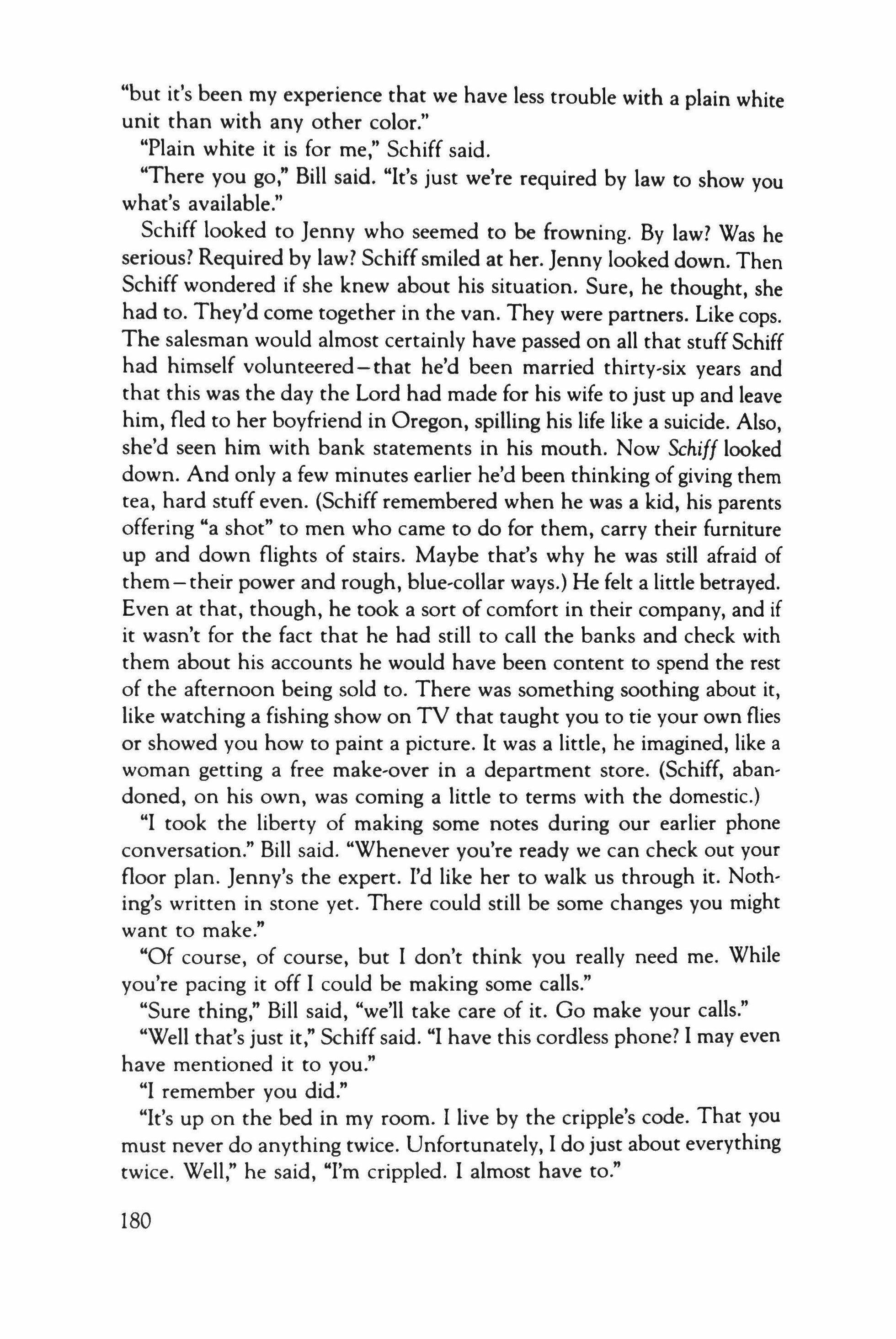
"but it's been my experience that we have less trouble with a plain white unit than with any other color."
"Plain white it is for me," Schiff said.
"There you go," Bill said. "It's just we're required by law to show you what's available."
Schiff looked to Jenny who seemed to be frowning. By law? Was he serious? Required by law? Schiffsmiled at her. Jenny looked down. Then Schiff wondered if she knew about his situation. Sure, he thought, she had to. They'd come together in the van. They were partners. Like cops. The salesman would almost certainly have passed on all that stuff Schiff had himself volunteered-that he'd been married thirty-six years and that this was the day the Lord had made for his wife to just up and leave him, fled to her boyfriend in Oregon, spilling his life like a suicide. Also, she'd seen him with bank statements in his mouth. Now Schiff looked down. And only a few minutes earlier he'd been thinking of giving them tea, hard stuff even. (Schiff remembered when he was a kid, his parents offering "a shot" to men who came to do for them, carry their furniture up and down flights of stairs. Maybe that's why he was still afraid of them - their power and rough, blue-collar ways.) He felt a little betrayed. Even at that, though, he took a sort of comfort in their company, and if it wasn't for the fact that he had still to call the banks and check with them about his accounts he would have been content to spend the rest of the afternoon being sold to. There was something soothing about it, like watching a fishing show on TV that taught you to tie your own flies or showed you how to paint a picture. It was a little, he imagined, like a woman getting a free make-over in a department store. (Schiff, abandoned, on his own, was coming a little to terms with the domestic.)
"I took the liberty of making some notes during our earlier phone conversation." Bill said. "Whenever you're ready we can check out your floor plan. Jenny's the expert. I'd like her to walk us through it. Nothing's written in stone yet. There could still be some changes you might want to make."
"Of course, of course, but I don't think you really need me. While you're pacing it off I could be making some calls."
"Sure thing," Bill said, "we'll take care of it. Go make your calls."
"Well that's just it," Schiff said. "I have this cordless phone? I may even have mentioned it to you."
"I remember you did."
"It's up on the bed in my room. I live by the cripple's code. That you must never do anything twice. Unfortunately, I do just about everything twice. Well," he said, "I'm crippled. I almost have to."
180
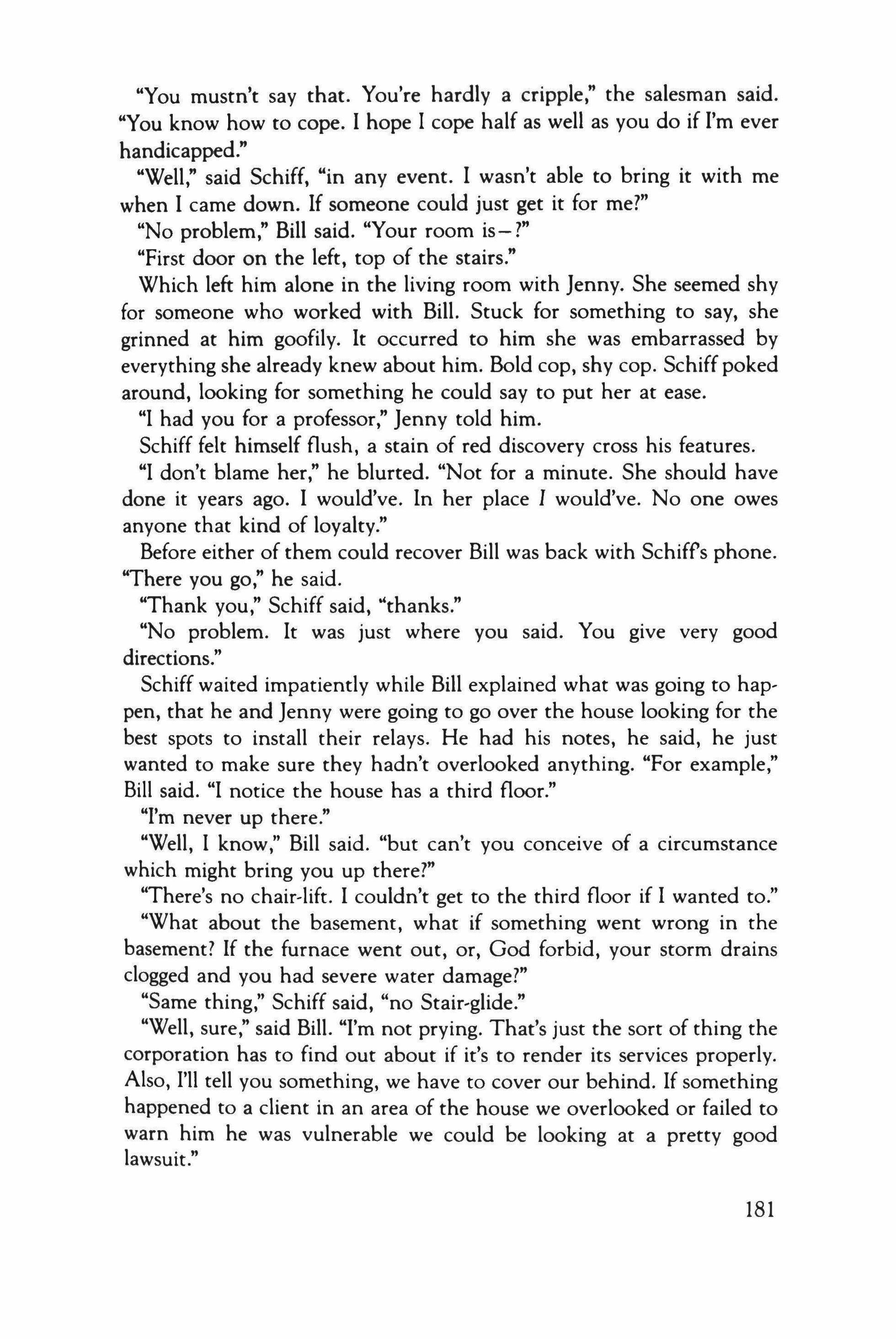
"You mustn't say that. You're hardly a cripple," the salesman said. "You know how to cope. I hope I cope half as well as you do if I'm ever handicapped."
"Well," said Schiff, "in any event. I wasn't able to bring it with me when I came down. If someone could just get it for me?"
"No problem," Bill said. "Your room is-?"
"First door on the left, top of the stairs."
Which left him alone in the living room with Jenny. She seemed shy for someone who worked with Bill. Stuck for something to say, she grinned at him goofily. It occurred to him she was embarrassed by everything she already knew about him. Bold cop, shy cop. Schiff poked around, looking for something he could say to put her at ease.
"I had you for a professor," Jenny told him.
Schiff felt himself flush, a stain of red discovery cross his features.
"I don't blame her," he blurted. "Not for a minute. She should have done it years ago. I would've. In her place I would've. No one owes anyone that kind of loyalty."
Before either of them could recover Bill was back with Schiff's phone. "There you go," he said.
"Thank you," Schiff said, "thanks."
"No problem. It was just where you said. You give very good directions."
Schiff waited impatiently while Bill explained what was going to happen, that he and Jenny were going to go over the house looking for the best spots to install their relays. He had his notes, he said, he just wanted to make sure they hadn't overlooked anything. "For example," Bill said. "I notice the house has a third floor."
"I'm never up there."
"Well, I know," Bill said. "but can't you conceive of a circumstance which might bring you up there?"
"There's no chair-lift. I couldn't get to the third floor if I wanted to."
"What about the basement, what if something went wrong in the basement? If the furnace went out, or, God forbid, your storm drains clogged and you had severe water damage?"
"Same thing," Schiff said, "no Stair-glide."
"Well, sure," said Bill. "I'm not prying. That's just the sort of thing the corporation has to find out about if it's to render its services properly. Also, I'll tell you something, we have to cover our behind. If something happened to a client in an area of the house we overlooked or failed to warn him he was vulnerable we could be looking at a pretty good lawsuit."
181
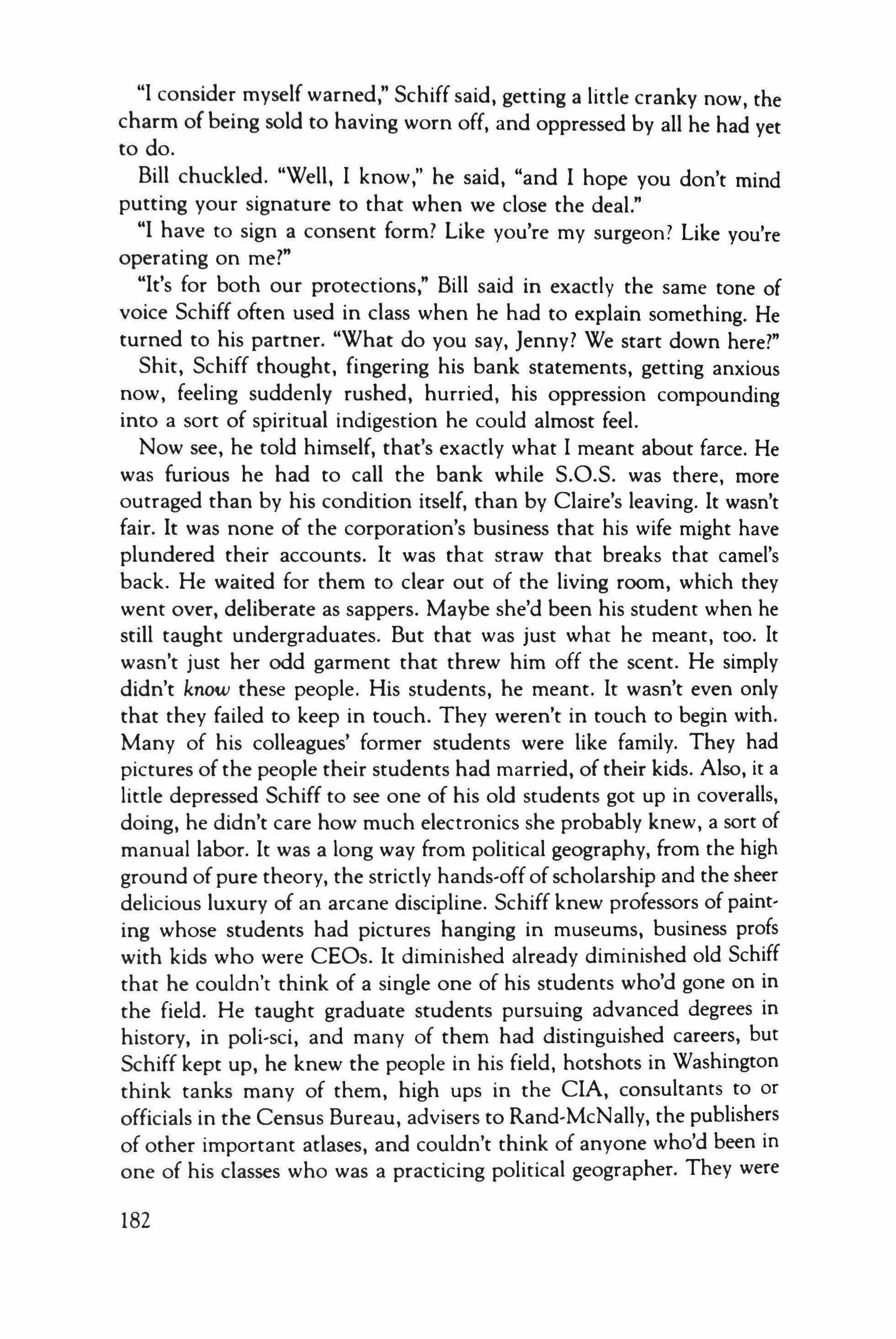
"I consider myself warned," Schiff said, getting a little cranky now, the charm of being sold to having worn off, and oppressed by all he had yet to do.
Bill chuckled. "Well, I know," he said, "and I hope you don't mind putting your signature to that when we close the deal."
"I have to sign a consent form? Like you're my surgeon? Like you're operating on me?"
"It's for both our protections," Bill said in exactly the same tone of voice Schiff often used in class when he had to explain something. He turned to his partner. "What do you say, Jenny? We start down here?"
Shit, Schiff thought, fingering his bank statements, getting anxious now, feeling suddenly rushed, hurried, his oppression compounding into a sort of spiritual indigestion he could almost feel.
Now see, he told himself, that's exactly what I meant about farce. He was furious he had to call the bank while S.O.S. was there, more outraged than by his condition itself, than by Claire's leaving. It wasn't fair. It was none of the corporation's business that his wife might have plundered their accounts. It was that straw that breaks that camel's back. He waited for them to clear out of the living room, which they went over, deliberate as sappers. Maybe she'd been his student when he still taught undergraduates. But that was just what he meant, too. It wasn't just her odd garment that threw him off the scent. He simply didn't know these people. His students, he meant. It wasn't even only that they failed to keep in touch. They weren't in touch to begin with. Many of his colleagues' former students were like family. They had pictures of the people their students had married, of their kids. Also, it a little depressed Schiff to see one of his old students got up in coveralls, doing, he didn't care how much electronics she probably knew, a sort of manual labor. It was a long way from political geography, from the high ground of pure theory, the strictly hands-offof scholarship and the sheer delicious luxury of an arcane discipline. Schiff knew professors of painting whose students had pictures hanging in museums, business profs with kids who were CEOs. It diminished already diminished old Schiff that he couldn't think of a single one of his students who'd gone on in the field. He taught graduate students pursuing advanced degrees in history, in poli-sci, and many of them had distinguished careers, but Schiff kept up, he knew the people in his field, hotshots in Washington think tanks many of them, high ups in the CIA, consultants to or officials in the Census Bureau, advisers to Rand-McNally, the publishers of other important atlases, and couldn't think of anyone who'd been in one of his classes who was a practicing political geographer. They were
182
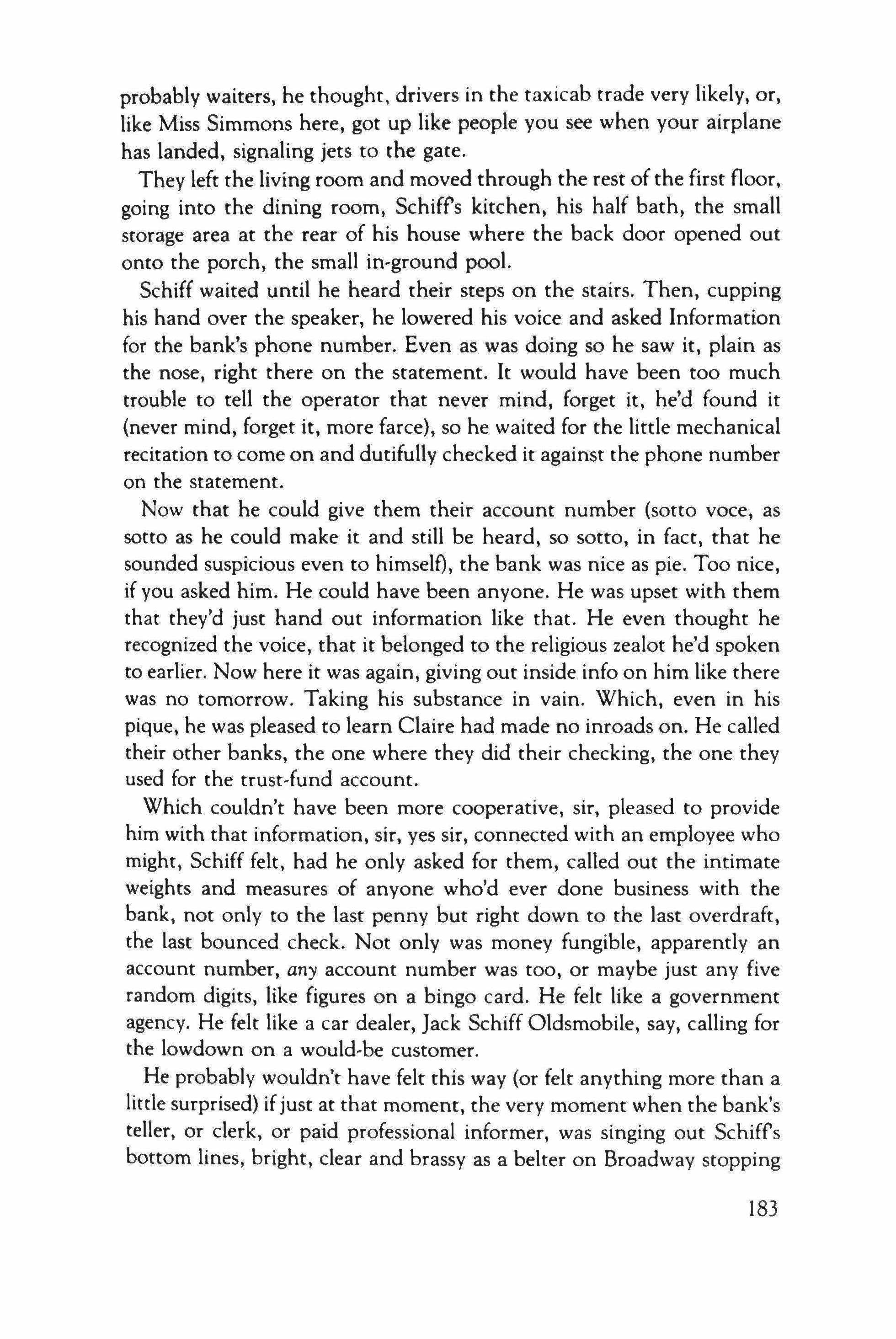
probably waiters, he thought, drivers in the taxicab trade very likely, or, like Miss Simmons here, got up like people you see when your airplane has landed, signaling jets to the gate.
They left the living room and moved through the rest of the first floor, going into the dining room, Schiff's kitchen, his half bath, the small storage area at the rear of his house where the back door opened out onto the porch, the small in-ground pool.
Schiff waited until he heard their steps on the stairs. Then, cupping his hand over the speaker, he lowered his voice and asked Information for the bank's phone number. Even as was doing so he saw it, plain as the nose, right there on the statement. It would have been too much trouble to tell the operator that never mind, forget it, he'd found it (never mind, forget it, more farce), so he waited for the little mechanical recitation to come on and dutifully checked it against the phone number on the statement.
Now that he could give them their account number (sotto voce, as sotto as he could make it and still be heard, so sotto, in fact, that he sounded suspicious even to himself), the bank was nice as pie. Too nice, if you asked him. He could have been anyone. He was upset with them that they'd just hand out information like that. He even thought he recognized the voice, that it belonged to the religious zealot he'd spoken to earlier. Now here it was again, giving out inside info on him like there was no tomorrow Taking his substance in vain. Which, even in his pique, he was pleased to learn Claire had made no inroads on. He called their other banks, the one where they did their checking, the one they used for the trust-fund account.
Which couldn't have been more cooperative, sir, pleased to provide him with that information, sir, yes sir, connected with an employee who might, Schiff felt, had he only asked for them, called out the intimate weights and measures of anyone who'd ever done business with the bank, not only to the last penny but right down to the last overdraft, the last bounced check. Not only was money fungible, apparently an account number, any account number was too, or maybe just any five random digits, like figures on a bingo card. He felt like a government agency. He felt like a car dealer, Jack Schiff Oldsmobile, say, calling for the lowdown on a would-be customer.
He probably wouldn't have felt this way (or felt anything more than a little surprised) ifjust at that moment, the very moment when the bank's teller, or clerk, or paid professional informer, was singing out Schiff's bottom lines, bright, clear and brassy as a belter on Broadway stopping
183
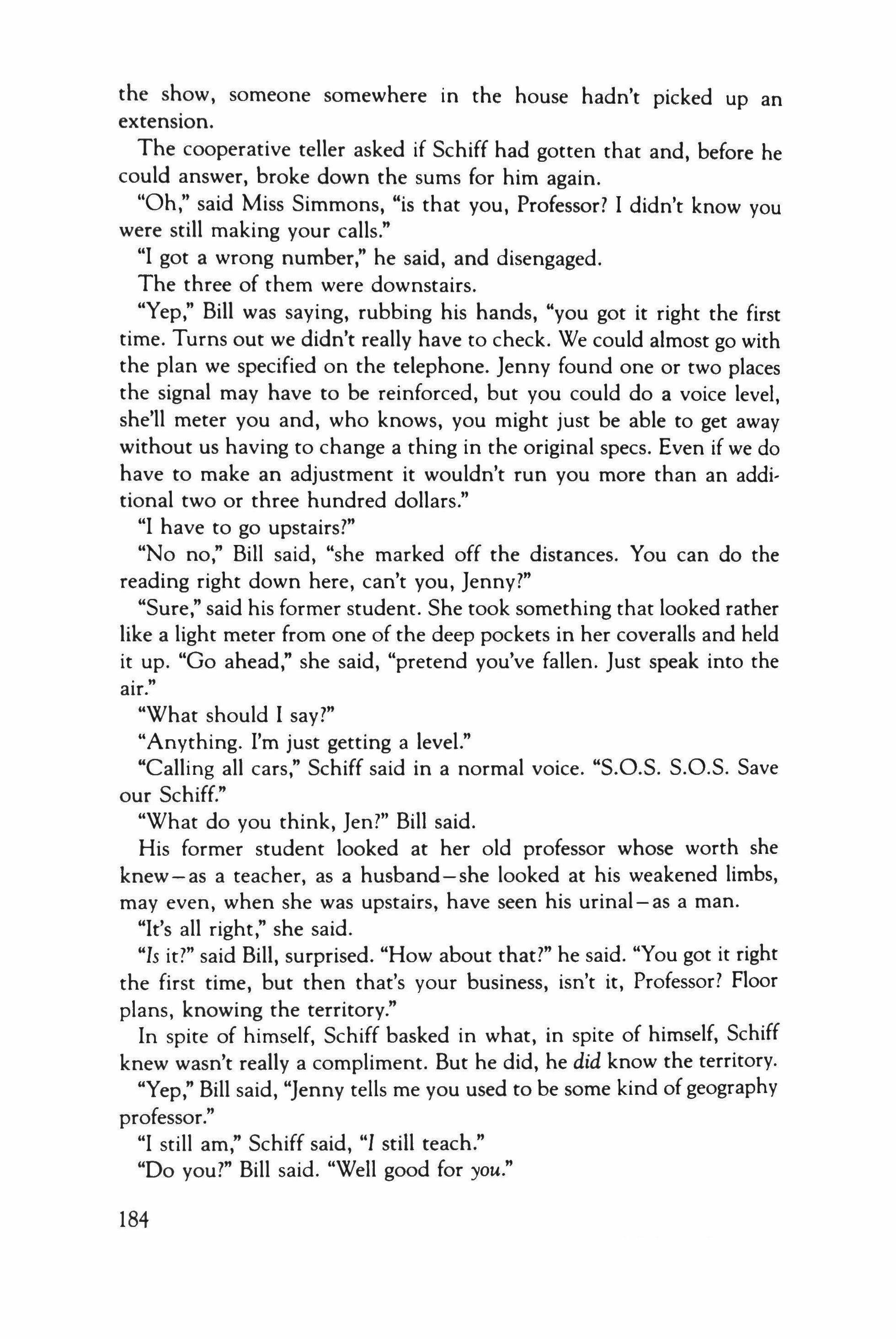
the show, someone somewhere in the house hadn't picked up an extension.
The cooperative teller asked if Schiff had gotten that and, before he could answer, broke down the sums for him again.
"Oh," said Miss Simmons, "is that you, Professor? I didn't know you were still making your calls."
"I got a wrong number," he said, and disengaged.
The three of them were downstairs.
"Yep," Bill was saying, rubbing his hands, "you got it right the first time. Turns out we didn't really have to check. We could almost go with the plan we specified on the telephone. Jenny found one or two places the signal may have to be reinforced, but you could do a voice level, she'll meter you and, who knows, you might just be able to get away without us having to change a thing in the original specs. Even if we do have to make an adjustment it wouldn't run you more than an additional two or three hundred dollars."
"I have to go upstairs?"
"No no," Bill said, "she marked off the distances. You can do the reading right down here, can't you, Jenny?"
"Sure," said his former student. She took something that looked rather like a light meter from one of the deep pockets in her coveralls and held it up. "Go ahead," she said, "pretend you've fallen. Just speak into the arr.
"What should I say?"
"Anything. I'm just getting a level."
"Calling all cars," Schiff said in a normal voice. "S.O.S. S.O.S. Save our Schiff."
"What do you think, Jen?" Bill said.
His former student looked at her old professor whose worth she knew-as a teacher, as a husband-she looked at his weakened limbs, may even, when she was upstairs, have seen his urinal- as a man.
"It's all right," she said.
"Is it?" said Bill, surprised. "How about that?" he said. "You got it right the first time, but then that's your business, isn't it, Professor? Floor plans, knowing the territory."
In spite of himself, Schiff basked in what, in spite of himself, Schiff knew wasn't really a compliment. But he did, he did know the territory.
"Yep," Bill said, "Jenny tells me you used to be some kind of geography professor."
"I still am," Schiff said, "I still teach."
"Do you?" Bill said. "Well good for you."
184
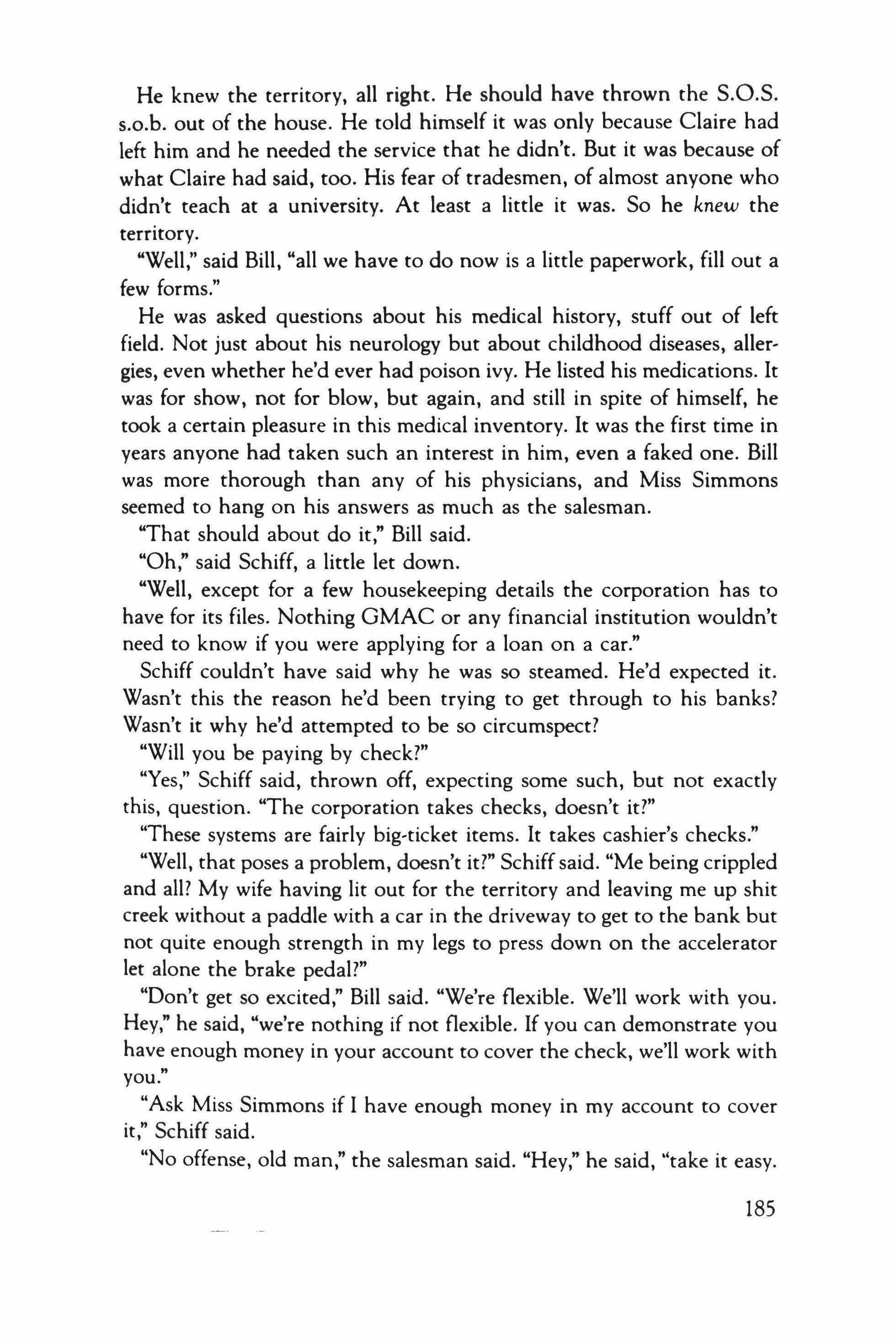
He knew the territory, all right. He should have thrown the S.O.S. s.o.b. out of the house. He told himself it was only because Claire had left him and he needed the service that he didn't. But it was because of what Claire had said, too. His fear of tradesmen, of almost anyone who didn't teach at a university. At least a little it was. So he knew the territory.
"Well," said Bill, "all we have to do now is a little paperwork, fill out a few forms."
He was asked questions about his medical history, stuff out of left field. Not just about his neurology but about childhood diseases, allergies, even whether he'd ever had poison ivy. He listed his medications. It was for show, not for blow, but again, and still in spite of himself, he took a certain pleasure in this medical inventory. It was the first time in years anyone had taken such an interest in him, even a faked one. Bill was more thorough than any of his physicians, and Miss Simmons seemed to hang on his answers as much as the salesman.
"That should about do it," Bill said.
"Oh," said Schiff, a little let down.
"Well, except for a few housekeeping details the corporation has to have for its files. Nothing GMAC or any financial institution wouldn't need to know if you were applying for a loan on a car."
Schiff couldn't have said why he was so steamed. He'd expected it. Wasn't this the reason he'd been trying to get through to his banks? Wasn't it why he'd attempted to be so circumspect?
"Will you be paying by check?"
"Yes," Schiff said, thrown off, expecting some such, but not exactly this, question. "The corporation takes checks, doesn't it?"
"These systems are fairly big-ticket items. It takes cashier's checks."
"Well, that poses a problem, doesn't it?" Schiff said. "Me being crippled and all? My wife having lit out for the territory and leaving me up shit creek without a paddle with a car in the driveway to get to the bank but not quite enough strength in my legs to press down on the accelerator let alone the brake pedal?"
"Don't get so excited," Bill said. "We're flexible. We'll work with you. Hey," he said, "we're nothing if not flexible. If you can demonstrate you have enough money in your account to cover the check, we'll work with you."
"Ask Miss Simmons if I have enough money in my account to cover it," Schiff said.
"No offense, old man," the salesman said. "Hey," he said, "take it easy.
185
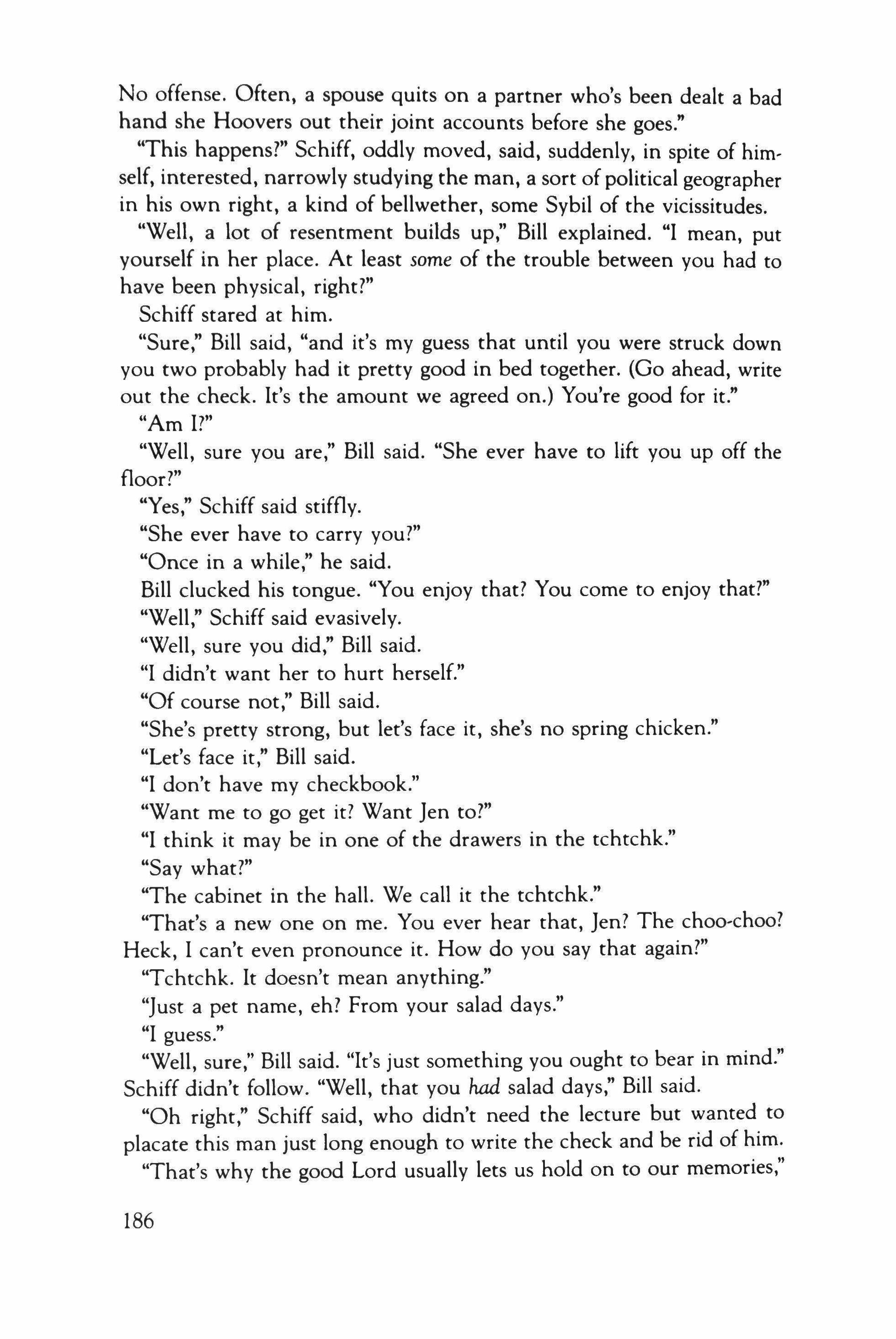
No offense. Often, a spouse quits on a partner who's been dealt a bad hand she Hoovers out their joint accounts before she goes."
"This happens?" Schiff, oddly moved, said, suddenly, in spite of himself, interested, narrowly studying the man, a sort of political geographer in his own right, a kind of bellwether, some Sybil of the vicissitudes.
"Well, a lot of resentment builds up," Bill explained. "I mean, put yourself in her place. At least some of the trouble between you had to have been physical, right?"
Schiff stared at him.
"Sure," Bill said, "and it's my guess that until you were struck down you two probably had it pretty good in bed together. (Go ahead, write out the check. It's the amount we agreed on.) You're good for it."
"Am !?"
"Well, sure you are," Bill said. "She ever have to lift you up off the floor?"
"Yes," Schiff said stiffly.
"She ever have to carry you?"
"Once in a while," he said.
Bill clucked his tongue. "You enjoy that? You corne to enjoy that?"
"Well," Schiff said evasively.
"Well, sure you did," Bill said.
"I didn't want her to hurt herself."
"Of course not," Bill said.
"She's pretty strong, but let's face it, she's no spring chicken."
"Let's face it," Bill said.
"I don't have my checkbook."
"Want me to go get it? Want [en to?"
"I think it may be in one of the drawers in the tchtchk,"
"Say what?"
"The cabinet in the hall. We call it the tchtchk,"
"That's a new one on me. You ever hear that, Jen? The choo-chooi Heck, I can't even pronounce it. How do you say that again?"
"Tchtchk. It doesn't mean anything."
"Just a pet name, eh? From your salad days."
"I guess."
"Well, sure," Bill said. "It's just something you ought to bear in mind." Schiff didn't follow. "Well, that you had salad days," Bill said.
"Oh right," Schiff said, who didn't need the lecture but wanted to placate this man just long enough to write the check and be rid of him.
"That's why the good Lord usually lets us hold on to our memories,"
186
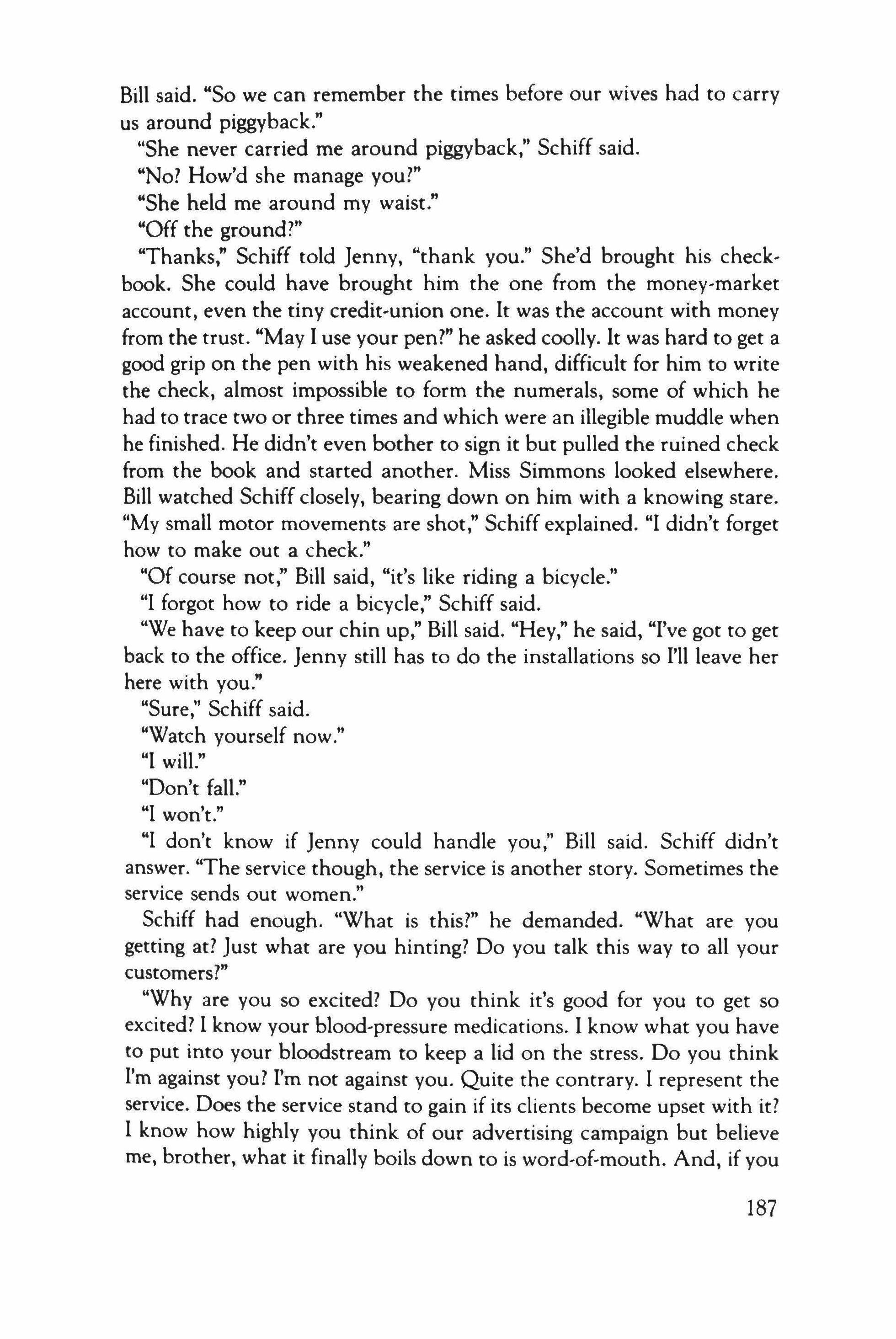
Bill said. "So we can remember the times before our wives had to carry us around piggyback."
"She never carried me around piggyback," Schiff said.
"No? How'd she manage you?"
"She held me around my waist."
"Off the ground?"
"Thanks," Schiff told Jenny, "thank you." She'd brought his check, book. She could have brought him the one from the money-market account, even the tiny credit-union one. It was the account with money from the trust. "May I use your pen?" he asked coolly. It was hard to get a good grip on the pen with his weakened hand, difficult for him to write the check, almost impossible to form the numerals, some of which he had to trace two or three times and which were an illegible muddle when he finished. He didn't even bother to sign it but pulled the ruined check from the book and started another. Miss Simmons looked elsewhere. Bill watched Schiff closely, bearing down on him with a knowing stare. "My small motor movements are shot," Schiff explained. "I didn't forget how to make out a check."
"Of course not," Bill said, "it's like riding a bicycle."
"I forgot how to ride a bicycle," Schiff said.
"We have to keep our chin up," Bill said. "Hey," he said, "I've got to get back to the office. Jenny still has to do the installations so I'll leave her here with you."
"Sure," Schiff said.
"Watch yourself now."
"I will."
"Don't fall."
"I won't."
"I don't know if Jenny could handle you," Bill said. Schiff didn't answer. "The service though, the service is another story. Sometimes the service sends out women."
Schiff had enough. "What is this?" he demanded. "What are you getting at? Just what are you hinting? Do you talk this way to all your customers?"
"Why are you so excited? Do you think it's good for you to get so excited? I know your blood-pressure medications. I know what you have to put into your bloodstream to keep a lid on the stress. Do you think I'm against you? I'm not against you. Quite the contrary. I represent the service. Does the service stand to gain if its clients become upset with it? I know how highly you think of our advertising campaign but believe me, brother, what it finally boils down to is word-of-mouth. And, if you
187
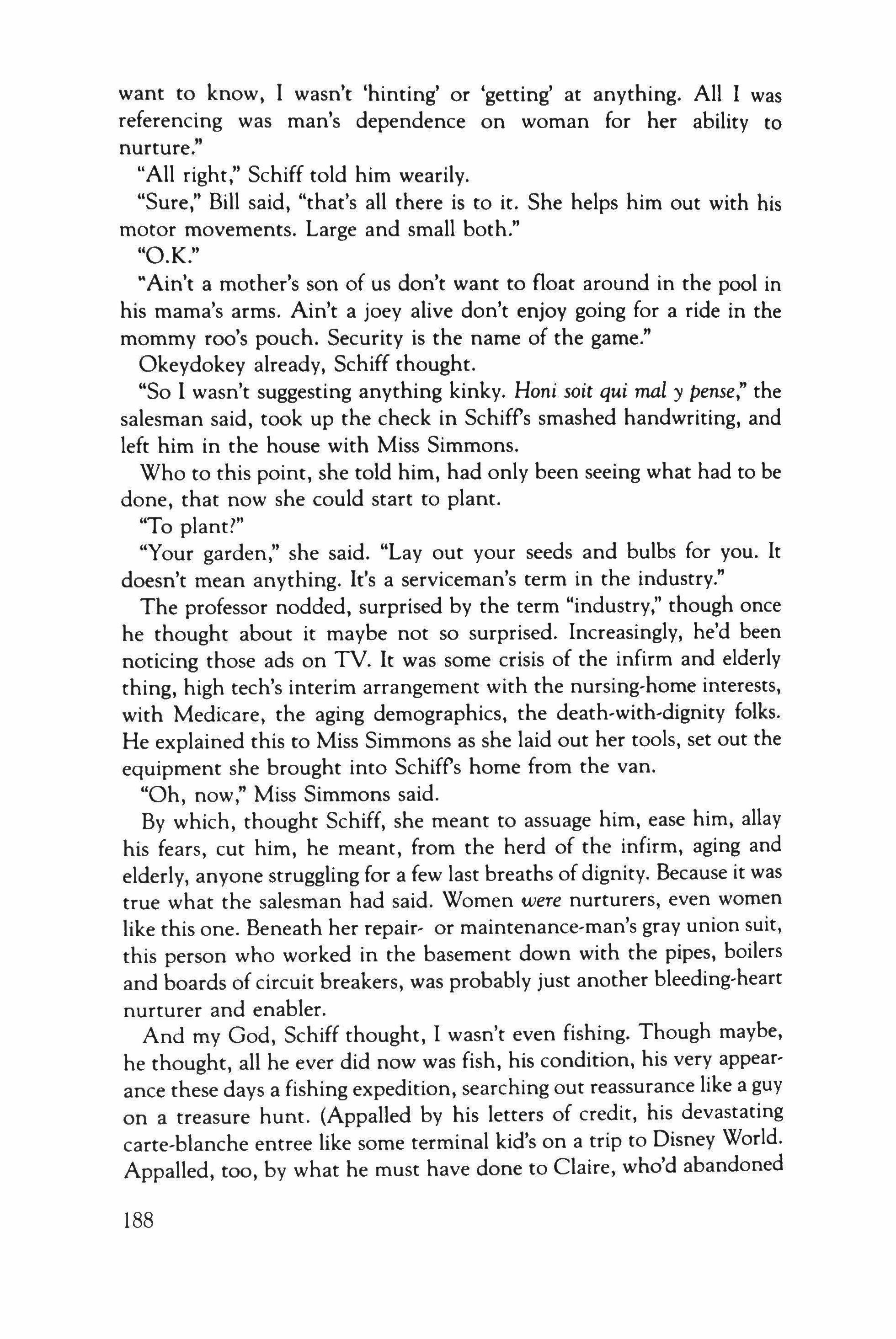
want to know, I wasn't 'hinting' or 'getting' at anything. All I was referencing was man's dependence on woman for her ability to nurture."
"All right," Schiff told him wearily.
"Sure," Bill said, "that's all there is to it. She helps him out with his motor movements. Large and small both."
"O.K."
"Ain't a mother's son of us don't want to float around in the pool in his mama's arms. Ain't a joey alive don't enjoy going for a ride in the mommy roo's pouch. Security is the name of the game."
Okeydokey already, Schiff thought.
"So I wasn't suggesting anything kinky. Honi soit qui mal y pense," the salesman said, took up the check in Schiff's smashed handwriting, and left him in the house with Miss Simmons.
Who to this point, she told him, had only been seeing what had to be done, that now she could start to plant.
"To plant?"
"Your garden," she said. "Layout your seeds and bulbs for you. It doesn't mean anything. It's a serviceman's term in the industry."
The professor nodded, surprised by the term "industry," though once he thought about it maybe not so surprised. Increasingly, he'd been noticing those ads on TV. It was some crisis of the infirm and elderly thing, high tech's interim arrangement with the nursing-home interests, with Medicare, the aging demographics, the death-with-dignity folks. He explained this to Miss Simmons as she laid out her tools, set out the equipment she brought into Schiff's home from the van.
"Oh, now," Miss Simmons said.
By which, thought Schiff, she meant to assuage him, ease him, allay his fears, cut him, he meant, from the herd of the infirm, aging and elderly, anyone struggling for a few last breaths of dignity. Because it was true what the salesman had said. Women were nurturers, even women like this one. Beneath her repair- or maintenance-man's gray union suit, this person who worked in the basement down with the pipes, boilers and boards of circuit breakers, was probably just another bleeding-heart nurturer and enabler.
And my God, Schiff thought, I wasn't even fishing. Though maybe, he thought, all he ever did now was fish, his condition, his very appearance these days a fishing expedition, searching out reassurance like a guy on a treasure hunt. (Appalled by his letters of credit, his devastating carte-blanche entree like some terminal kid's on a trip to Disney World. Appalled, too, by what he must have done to Claire, who'd abandoned
188
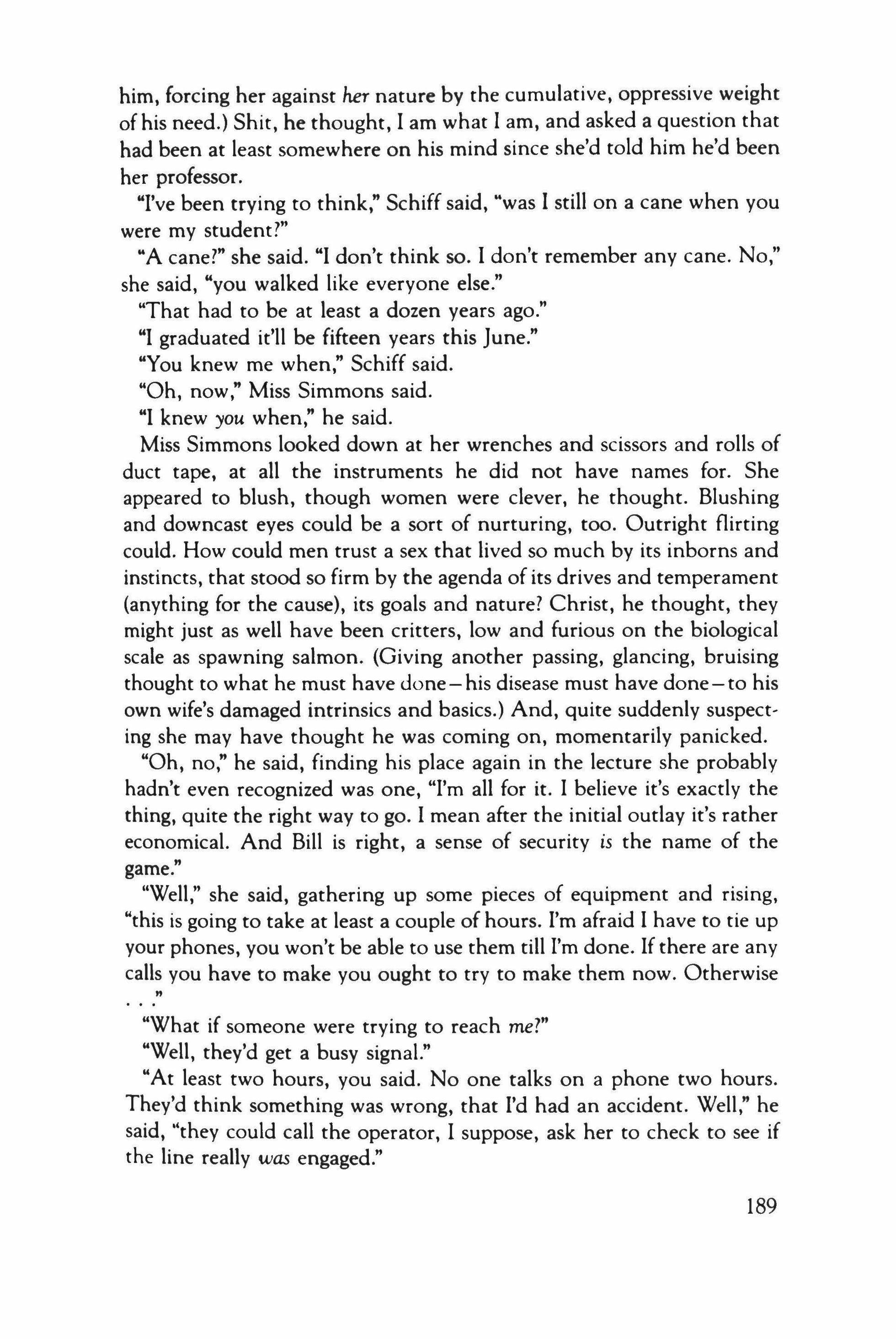
him, forcing her against her nature by the cumulative, oppressive weight of his need.) Shit, he thought, I am what I am, and asked a question that had been at least somewhere on his mind since she'd told him he'd been her professor.
"I've been trying to think," Schiff said, "was I still on a cane when you were my student?"
"A cane?" she said. "I don't think so. I don't remember any cane. No," she said, "you walked like everyone else."
"That had to be at least a dozen years ago."
"I graduated it'll be fifteen years this June."
"You knew me when," Schiff said.
"Oh, now," Miss Simmons said.
"I knew you when," he said.
Miss Simmons looked down at her wrenches and scissors and rolls of duct tape, at all the instruments he did not have names for. She appeared to blush, though women were clever, he thought. Blushing and downcast eyes could be a sort of nurturing, too. Outright flirting could. How could men trust a sex that lived so much by its inborns and instincts, that stood so firm by the agenda of its drives and temperament (anything for the cause), its goals and nature? Christ, he thought, they might just as well have been critters, low and furious on the biological scale as spawning salmon. (Giving another passing, glancing, bruising thought to what he must have done-his disease must have done-to his own wife's damaged intrinsics and basics.) And, quite suddenly suspecting she may have thought he was coming on, momentarily panicked.
"Oh, no," he said, finding his place again in the lecture she probably hadn't even recognized was one, "I'm all for it. I believe it's exactly the thing, quite the right way to go. I mean after the initial outlay it's rather economical. And Bill is right, a sense of security is the name of the game."
"Well," she said, gathering up some pieces of equipment and rising, "this is going to take at least a couple of hours. I'm afraid I have to tie up your phones, you won't be able to use them till I'm done. If there are any calls you have to make you ought to try to make them now. Otherwise
"What if someone were trying to reach me?"
"Well, they'd get a busy signal."
"At least two hours, you said. No one talks on a phone two hours. They'd think something was wrong, that I'd had an accident. Well," he said, "they could call the operator, I suppose, ask her to check to see if the line really was engaged."
189
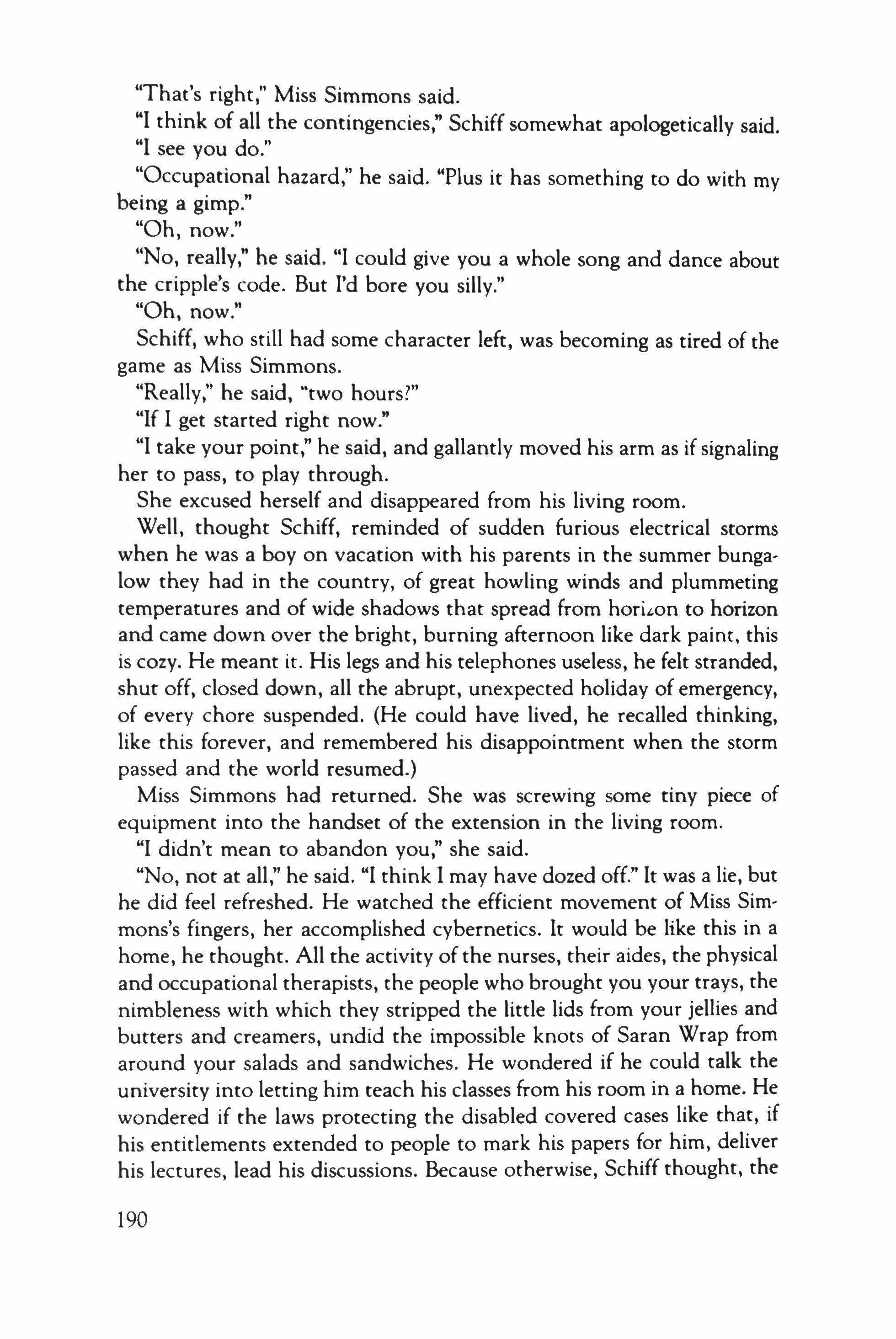
"That's right," Miss Simmons said.
"I think of all the contingencies," Schiff somewhat apologetically said.
"I see you do."
"Occupational hazard," he said. "Plus it has something to do with my being a gimp."
"Oh, now."
"No, really," he said. "I could give you a whole song and dance about the cripple's code. But I'd bore you silly."
"Oh, now."
Schiff, who still had some character left, was becoming as tired of the game as Miss Simmons.
"Really," he said, "two hours?"
"If I get started right now."
"I take your point," he said, and gallantly moved his arm as if signaling her to pass, to play through.
She excused herself and disappeared from his living room.
Well, thought Schiff, reminded of sudden furious electrical storms when he was a boy on vacation with his parents in the summer bungalow they had in the country, of great howling winds and plummeting temperatures and of wide shadows that spread from horizon to horizon and came down over the bright, burning afternoon like dark paint, this is cozy. He meant it. His legs and his telephones useless, he felt stranded, shut off, closed down, all the abrupt, unexpected holiday of emergency, of every chore suspended. (He could have lived, he recalled thinking, like this forever, and remembered his disappointment when the storm passed and the world resumed.)
Miss Simmons had returned. She was screwing some tiny piece of equipment into the handset of the extension in the living room.
"I didn't mean to abandon you," she said.
"No, not at all," he said. "I think I may have dozed off." It was a lie, but he did feel refreshed. He watched the efficient movement of Miss Simmons's fingers, her accomplished cybernetics. It would be like this in a home, he thought. All the activity of the nurses, their aides, the physical and occupational therapists, the people who brought you your trays, the nimbleness with which they stripped the little lids from your jellies and butters and creamers, undid the impossible knots of Saran Wrap from around your salads and sandwiches. He wondered if he could talk the university into letting him teach his classes from his room in a home. He wondered if the laws protecting the disabled covered cases like that, if his entitlements extended to people to mark his papers for him, deliver his lectures, lead his discussions. Because otherwise, Schiff thought, the
190
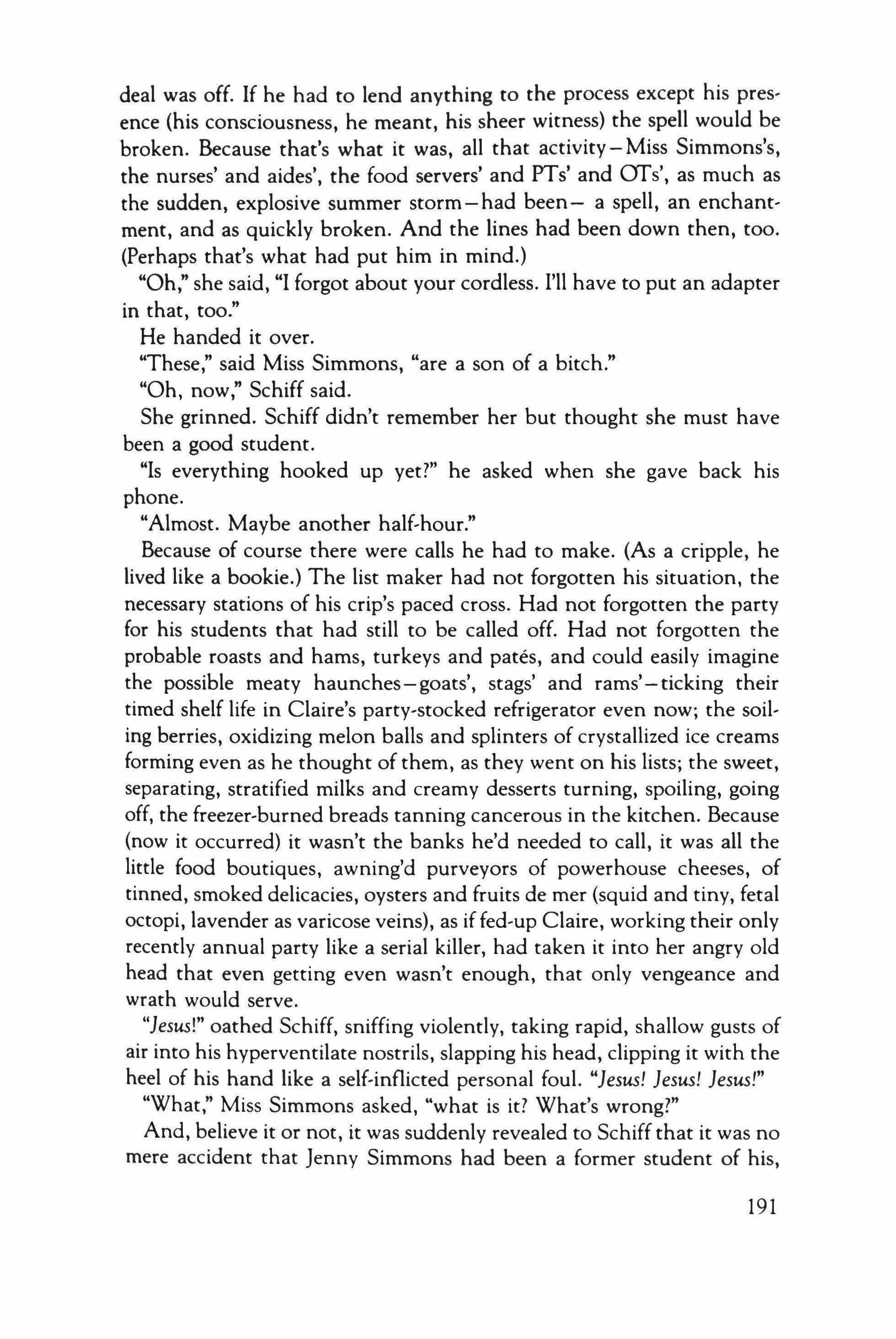
deal was off. If he had to lend anything to the process except his presence (his consciousness, he meant, his sheer witness) the spell would be broken. Because that's what it was, all that activity - Miss Simmons's, the nurses' and aides', the food servers' and PTs' and OTs', as much as the sudden, explosive summer storm-had been- a spell, an enchantment, and as quickly broken. And the lines had been down then, too. (Perhaps that's what had put him in mind.)
"Oh," she said, "I forgot about your cordless. I'll have to put an adapter in that, too."
He handed it over.
"These," said Miss Simmons, "are a son of a bitch."
"Oh, now," Schiff said.
She grinned. Schiff didn't remember her but thought she must have been a good student.
"Is everything hooked up yet?" he asked when she gave back his phone.
"Almost. Maybe another half-hour."
Because of course there were calls he had to make. (As a cripple, he lived like a bookie.) The list maker had not forgotten his situation, the necessary stations of his crip's paced cross. Had not forgotten the party for his students that had still to be called off. Had not forgotten the probable roasts and hams, turkeys and pates, and could easily imagine the possible meaty haunches-goats', stags' and rams'-ticking their timed shelf life in Claire's party-stocked refrigerator even now; the soiling berries, oxidizing melon balls and splinters of crystallized ice creams forming even as he thought of them, as they went on his lists; the sweet, separating, stratified milks and creamy desserts turning, spoiling, going off, the freezer-burned breads tanning cancerous in the kitchen. Because (now it occurred) it wasn't the banks he'd needed to call, it was all the little food boutiques, awning'd purveyors of powerhouse cheeses, of tinned, smoked delicacies, oysters and fruits de mer (squid and tiny, fetal octopi, lavender as varicose veins), as iffed-up Claire, working their only recently annual party like a serial killer, had taken it into her angry old head that even getting even wasn't enough, that only vengeance and wrath would serve.
"Jesus!" oathed Schiff, sniffing violently, taking rapid, shallow gusts of air into his hyperventilate nostrils, slapping his head, clipping it with the heel of his hand like a self-inflicted personal foul. "Jesus! Jesus! Jesus!"
"What," Miss Simmons asked, "what is it? What's wrong?"
And, believe it or not, it was suddenly revealed to Schiff that it was no mere accident that Jenny Simmons had been a former student of his,
191
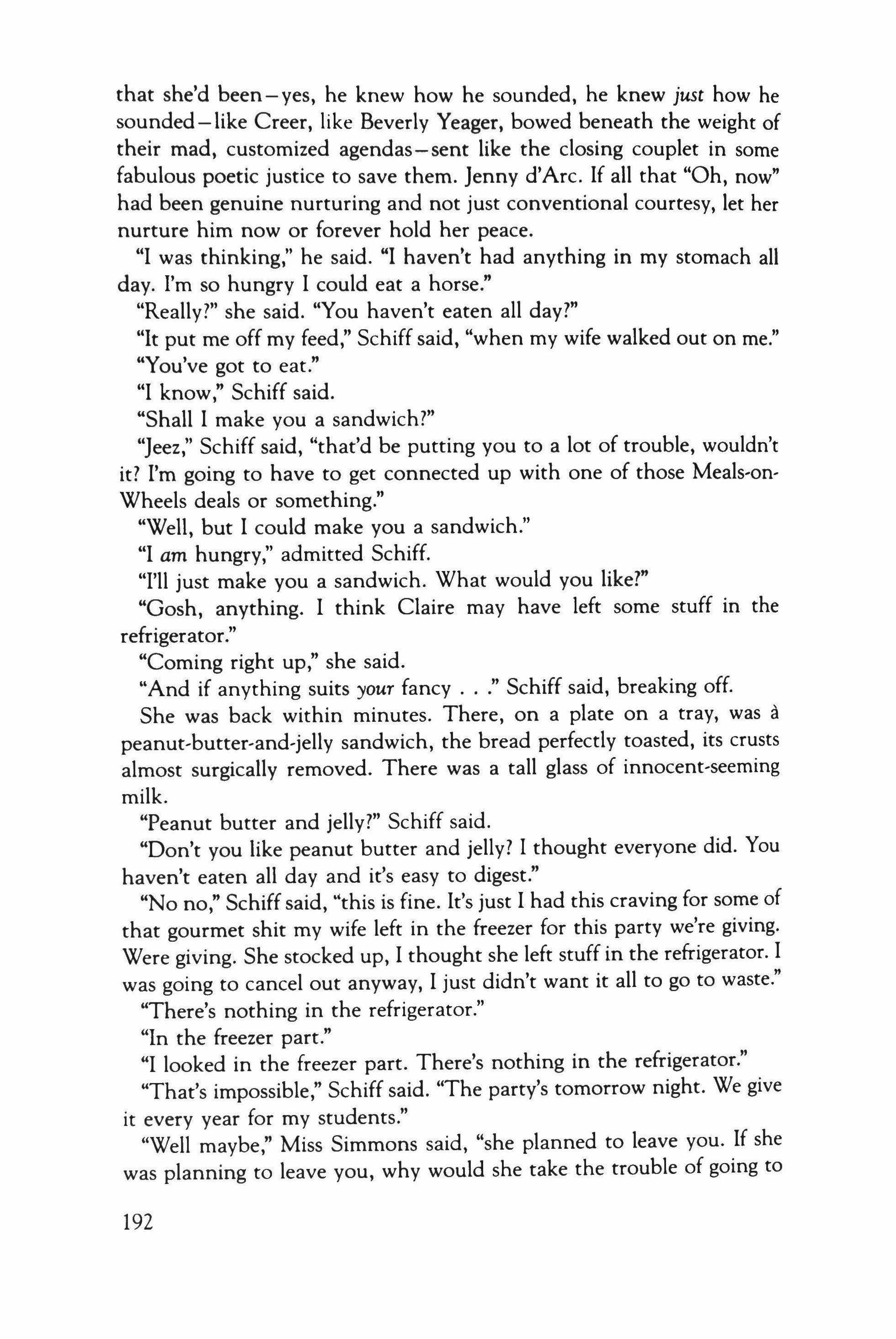
that she'd been-yes, he knew how he sounded, he knew just how he sounded-like Creer, like Beverly Yeager, bowed beneath the weight of their mad, customized agendas-sent like the closing couplet in some fabulous poetic justice to save them. jenny d'Arc. If all that "Oh, now" had been genuine nurturing and not just conventional courtesy, let her nurture him now or forever hold her peace.
"I was thinking," he said. "I haven't had anything in my stomach all day. I'm so hungry I could eat a horse."
"Really?" she said. "You haven't eaten all day?"
"It put me off my feed," Schiff said, "when my wife walked out on me."
"You've got to eat."
"I know," Schiff said.
"Shall I make you a sandwich?"
"[eez," Schiff said, "that'd be putting you to a lot of trouble, wouldn't it? I'm going to have to get connected up with one of those Meals-onWheels deals or something."
"Well, but I could make you a sandwich."
"I am hungry," admitted Schiff.
"I'll just make you a sandwich. What would you like?"
"Gosh, anything. I think Claire may have left some stuff in the refrigerator."
"Coming right up," she said.
"And if anything suits your fancy Schiff said, breaking off.
She was back within minutes. There, on a plate on a tray, was a peanut-butter-and-jelly sandwich, the bread perfectly toasted, its crusts almost surgically removed. There was a tall glass of innocent-seeming milk.
"Peanut butter and jelly?" Schiff said.
"Don't you like peanut butter and jelly? I thought everyone did. You haven't eaten all day and it's easy to digest."
"No no," Schiffsaid, "this is fine. It's just I had this craving for some of that gourmet shit my wife left in the freezer for this party we're giving. Were giving. She stocked up, I thought she left stuff in the refrigerator. I was going to cancel out anyway, I just didn't want it all to go to waste."
"There's nothing in the refrigerator."
"In the freezer part."
"I looked in the freezer part. There's nothing in the refrigerator."
"That's impossible," Schiff said. "The party's tomorrow night. We give it every year for my students."
"Well maybe," Miss Simmons said, "she planned to leave you. If she was planning to leave you, why would she take the trouble of going to
192
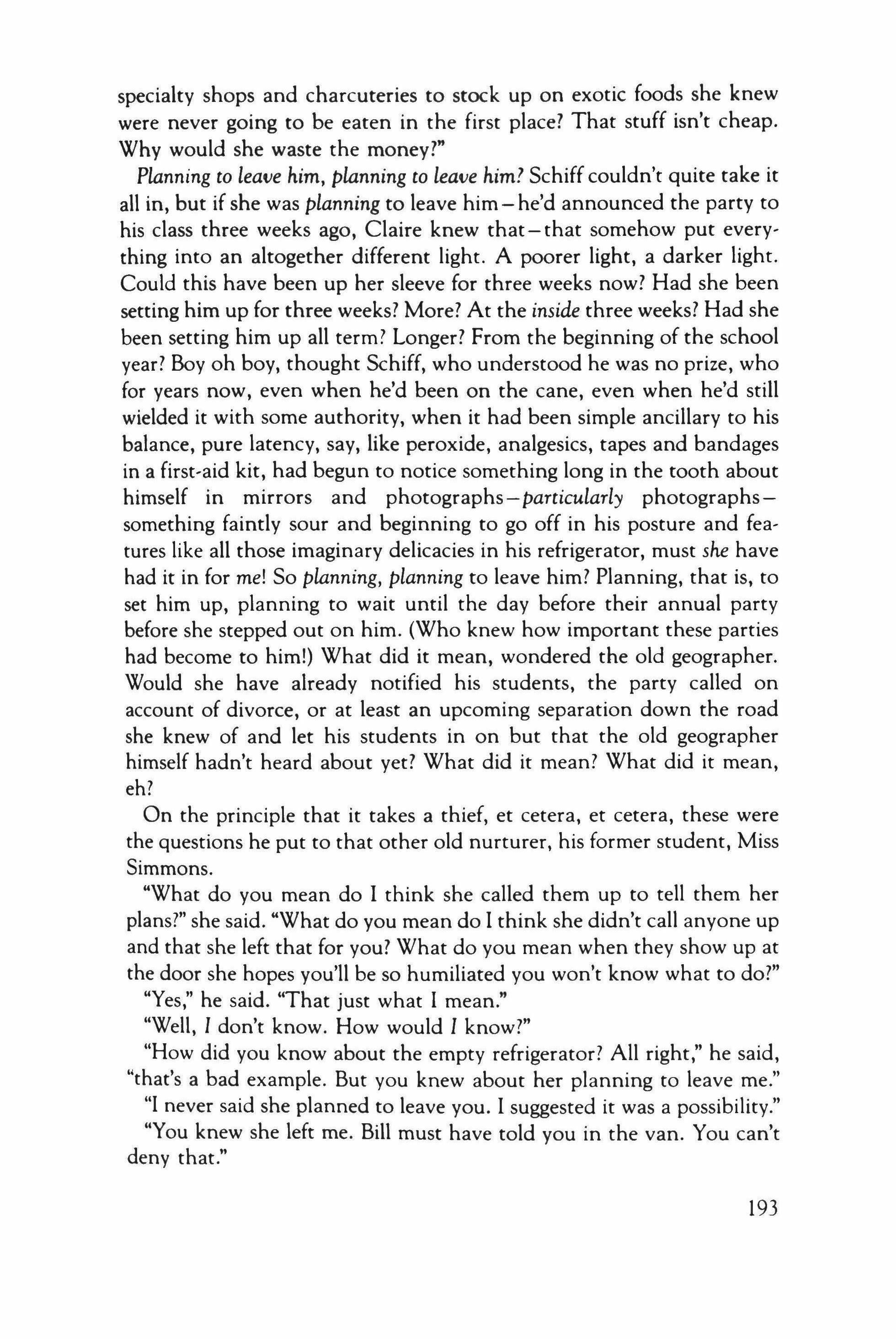
specialty shops and charcuteries to stock up on exotic foods she knew were never going to be eaten in the first place? That stuff isn't cheap. Why would she waste the money?"
Planning to leave him, planning to leave him? Schiff couldn't quite take it all in, but if she was pLanning to leave him - he'd announced the party to his class three weeks ago, Claire knew that-that somehow put everything into an altogether different light. A poorer light, a darker light. Could this have been up her sleeve for three weeks now? Had she been setting him up for three weeks? More? At the inside three weeks? Had she been setting him up all term? Longer? From the beginning of the school year? Boy oh boy, thought Schiff, who understood he was no prize, who for years now, even when he'd been on the cane, even when he'd still wielded it with some authority, when it had been simple ancillary to his balance, pure latency, say, like peroxide, analgesics, tapes and bandages in a first-aid kit, had begun to notice something long in the tooth about himself in mirrors and photographs - particuLarLy photographssomething faintly sour and beginning to go off in his posture and features like all those imaginary delicacies in his refrigerator, must she have had it in for me! So planning, pLanning to leave him? Planning, that is, to set him up, planning to wait until the day before their annual party before she stepped out on him. (Who knew how important these parties had become to him!) What did it mean, wondered the old geographer. Would she have already notified his students, the party called on account of divorce, or at least an upcoming separation down the road she knew of and let his students in on but that the old geographer himself hadn't heard about yet? What did it mean? What did it mean, eh?
On the principle that it takes a thief, et cetera, et cetera, these were the questions he put to that other old nurturer, his former student, Miss Simmons.
"What do you mean do 1 think she called them up to tell them her plans?" she said. "What do you mean do I think she didn't call anyone up and that she left that for you? What do you mean when they show up at the door she hopes you'll be so humiliated you won't know what to do?"
"Yes," he said. "That just what I mean."
"Well, 1 don't know. How would 1 know?"
"How did you know about the empty refrigerator? All right," he said, "that's a bad example. But you knew about her planning to leave me."
"I never said she planned to leave you. I suggested it was a possibility."
"You knew she left me. Bill must have told you in the van. You can't deny that."
193
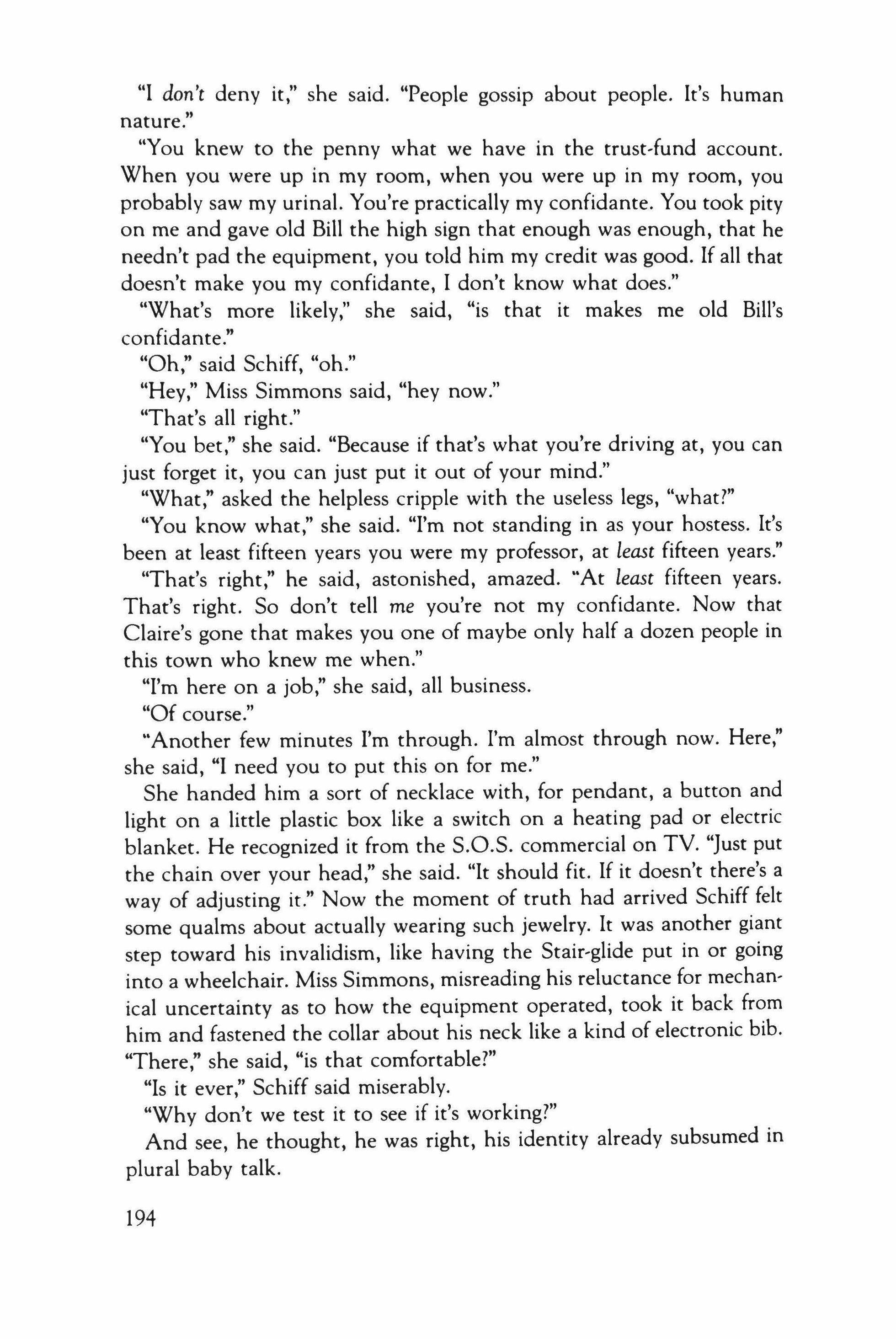
"I don't deny it," she said. "People gossip about people. It's human nature."
"You knew to the penny what we have in the trust-fund account. When you were up in my room, when you were up in my room, you probably saw my urinal. You're practically my confidante. You took pity on me and gave old Bill the high sign that enough was enough, that he needn't pad the equipment, you told him my credit was good. If all that doesn't make you my confidante, I don't know what does."
"What's more likely," she said, "is that it makes me old Bill's confidante."
"Oh," said Schiff, "oh."
"Hey," Miss Simmons said, "hey now."
"That's all right."
"You bet," she said. "Because if that's what you're driving at, you can just forget it, you can just put it out of your mind."
"What," asked the helpless cripple with the useless legs, "what?"
"You know what," she said. "I'm not standing in as your hostess. It's been at least fifteen years you were my professor, at least fifteen years."
"That's right," he said, astonished, amazed. "At least fifteen years. That's right. So don't tell me you're not my confidante. Now that Claire's gone that makes you one of maybe only half a dozen people in this town who knew me when."
"I'm here on a job," she said, all business.
"Of course."
"Another few minutes I'm through. I'm almost through now. Here," she said, "I need you to put this on for me."
She handed him a sort of necklace with, for pendant, a button and light on a little plastic box like a switch on a heating pad or electric blanket. He recognized it from the S.O.S. commercial on TV. "Just put the chain over your head," she said. "It should fit. If it doesn't there's a way of adjusting it." Now the moment of truth had arrived Schiff felt some qualms about actually wearing such jewelry. It was another giant step toward his invalidism, like having the Stair-glide put in or going into a wheelchair. Miss Simmons, misreading his reluctance for mechanical uncertainty as to how the equipment operated, took it back from him and fastened the collar about his neck like a kind of electronic bib.
"There," she said, "is that comfortable?"
"Is it ever," Schiff said miserably.
"Why don't we test it to see if it's working?"
And see, he thought, he was right, his identity already subsumed in plural baby talk.
194
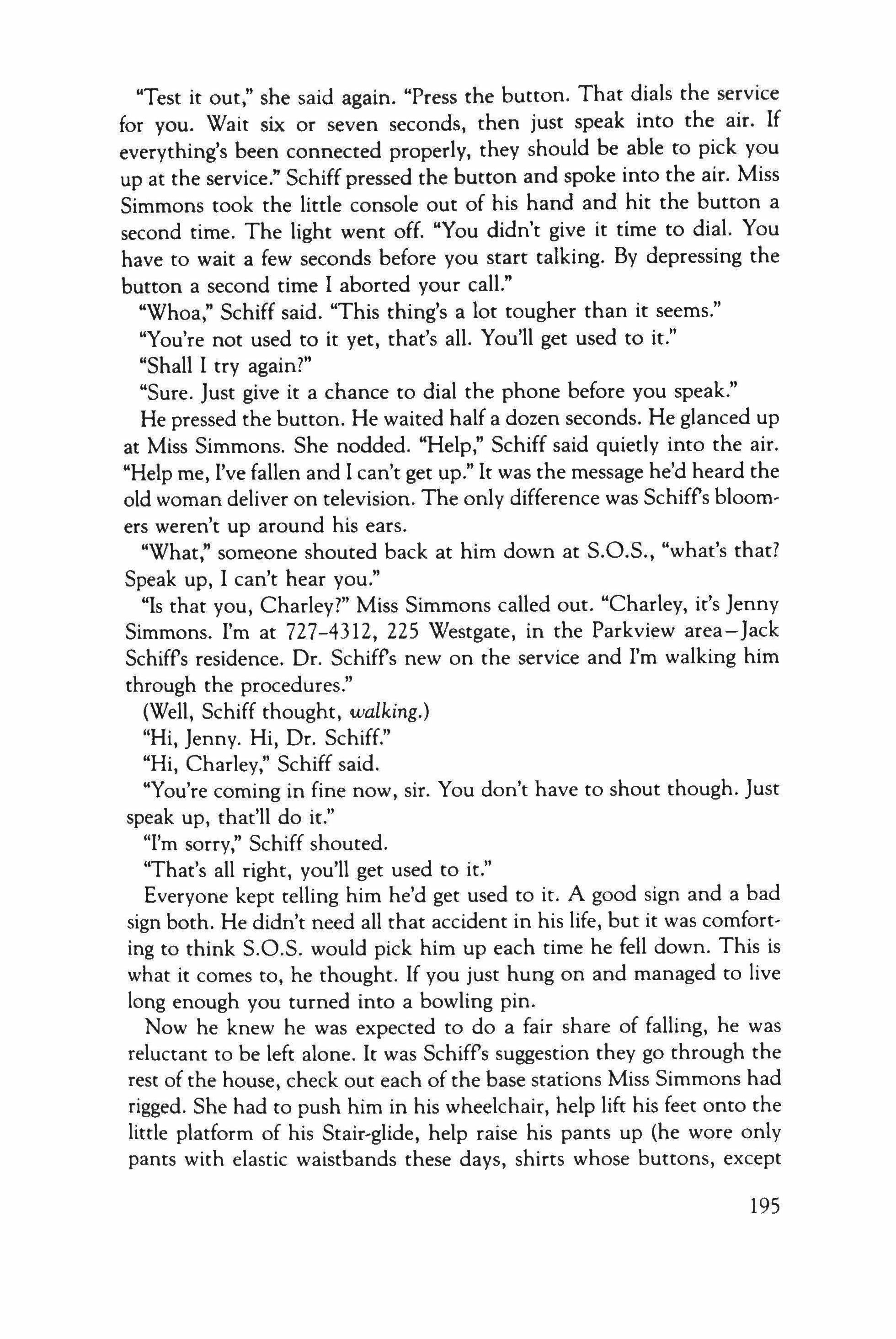
"Test it out," she said again. "Press the button. That dials the service for you. Wait six or seven seconds, then just speak into the air. If everything's been connected properly, they should be able to pick you up at the service." Schiff pressed the button and spoke into the air. Miss Simmons took the little console out of his hand and hit the button a second time. The light went off. "You didn't give it time to dial. You have to wait a few seconds before you start talking. By depressing the button a second time I aborted your call."
"Whoa," Schiff said. "This thing's a lot tougher than it seems."
"You're not used to it yet, that's all. You'll get used to it."
"Shall I try again?"
"Sure. Just give it a chance to dial the phone before you speak."
He pressed the button. He waited half a dozen seconds. He glanced up at Miss Simmons. She nodded. "Help," Schiff said quietly into the air. "Help me, I've fallen and I can't get up." It was the message he'd heard the old woman deliver on television. The only difference was Schiff's bloomers weren't up around his ears.
"What," someone shouted back at him down at S.O.S., "what's that? Speak up, I can't hear you."
"Is that you, Charley?" Miss Simmons called out. "Charley, it's Jenny Simmons. I'm at 727-4312, 225 Westgate, in the Parkview area-Jack Schiff's residence. Dr. Schiff's new on the service and I'm walking him through the procedures."
(Well, Schiff thought, walking.)
"Hi, Jenny. Hi, Dr. Schiff."
"Hi, Charley," Schiff said.
"You're coming in fine now, sir. You don't have to shout though. Just speak up, that'll do it."
"I'm sorry," Schiff shouted.
"That's all right, you'll get used to it."
Everyone kept telling him he'd get used to it. A good sign and a bad sign both. He didn't need all that accident in his life, but it was comforting to think S.O.S. would pick him up each time he fell down. This is what it comes to, he thought. If you just hung on and managed to live long enough you turned into a bowling pin.
Now he knew he was expected to do a fair share of falling, he was reluctant to be left alone. It was Schiff's suggestion they go through the rest of the house, check out each of the base stations Miss Simmons had rigged. She had to push him in his wheelchair, help lift his feet onto the little platform of his Stair-glide, help raise his pants up (he wore only pants with elastic waistbands these days, shirts whose buttons, except
195
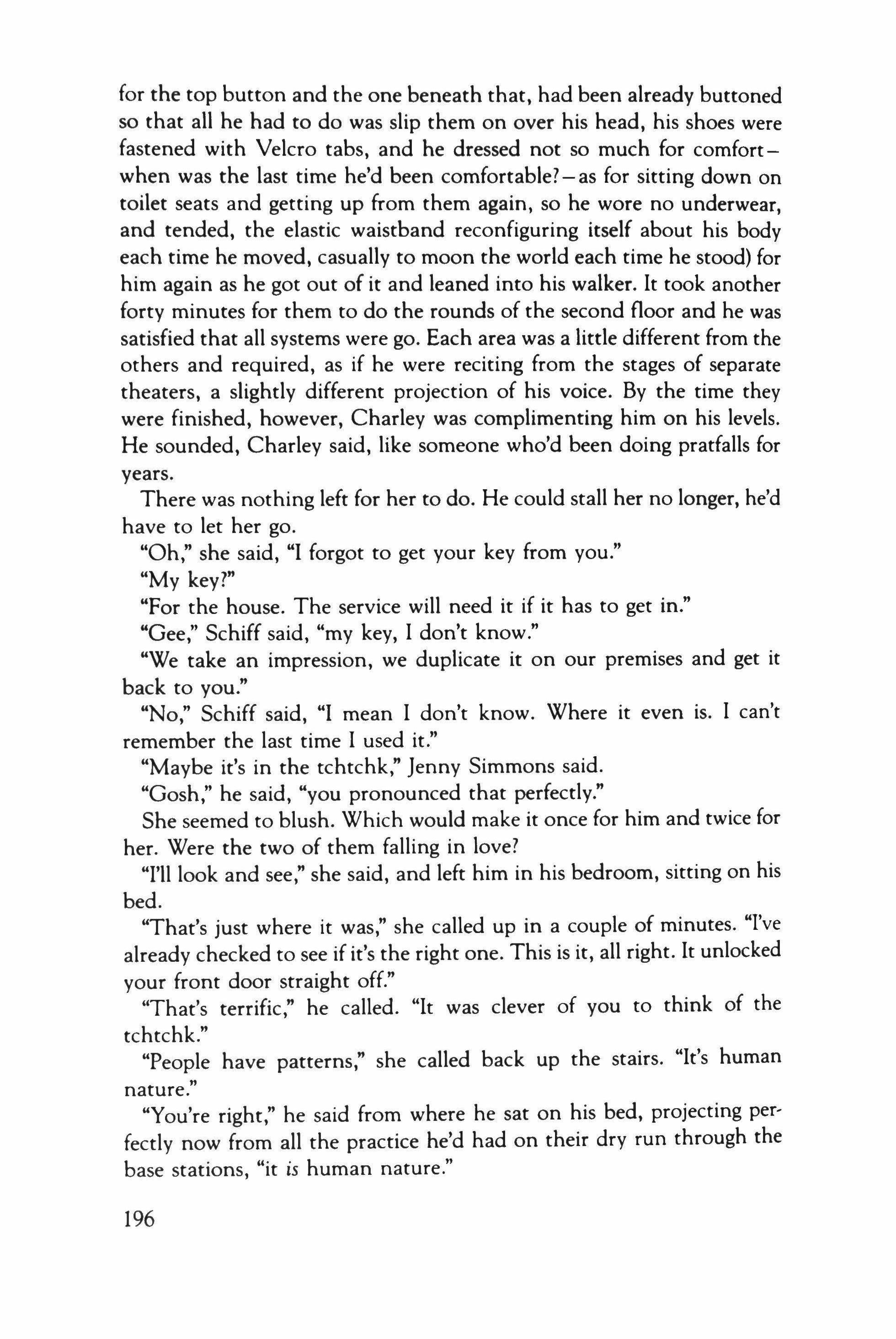
for the top button and the one beneath that, had been already buttoned so that all he had to do was slip them on over his head, his shoes were fastened with Velcro tabs, and he dressed not so much for comfortwhen was the last time he'd been comfortable?-as for sitting down on toilet seats and getting up from them again, so he wore no underwear, and tended, the elastic waistband reconfiguring itself about his body each time he moved, casually to moon the world each time he stood) for him again as he got out of it and leaned into his walker. It took another forty minutes for them to do the rounds of the second floor and he was satisfied that all systems were go. Each area was a little different from the others and required, as if he were reciting from the stages of separate theaters, a slightly different projection of his voice. By the time they were finished, however, Charley was complimenting him on his levels. He sounded, Charley said, like someone who'd been doing pratfalls for years.
There was nothing left for her to do. He could stall her no longer, he'd have to let her go.
"Oh," she said, "I forgot to get your key from you."
"My key?"
"For the house. The service will need it if it has to get in."
"Gee," Schiff said, "my key, I don't know."
"We take an impression, we duplicate it on our premises and get it back to you."
"No," Schiff said, "I mean I don't know. Where it even is. I can't remember the last time I used it."
"Maybe it's in the tchtchk," Jenny Simmons said.
"Gosh," he said, "you pronounced that perfectly."
She seemed to blush. Which would make it once for him and twice for her. Were the two of them falling in love?
"I'll look and see," she said, and left him in his bedroom, sitting on his bed.
"That's just where it was," she called up in a couple of minutes. "I've already checked to see if it's the right one. This is it, all right. It unlocked your front door straight off."
"That's terrific," he called. "It was clever of you to think of the tchtchk."
"People have patterns," she called back up the stairs. "It's human nature."
"You're right," he said from where he sat on his bed, projecting perfectly now from all the practice he'd had on their dry run through the base stations, "it is human nature."
196
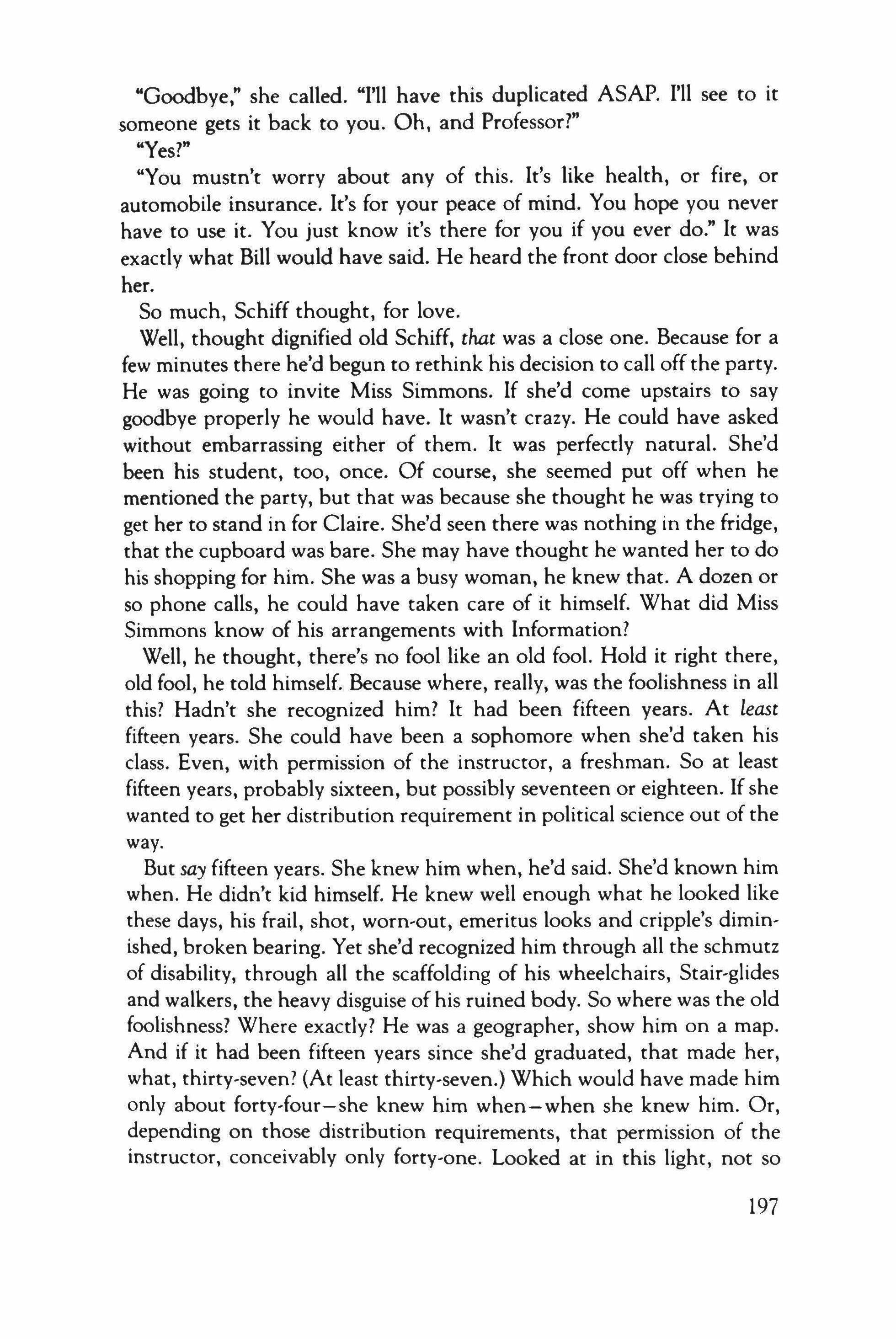
"Goodbye," she called. "I'll have this duplicated ASAP. I'll see to it someone gets it back to you. Oh, and Professor?" "Yes?"
"You mustn't worry about any of this. It's like health, or fire, or automobile insurance. It's for your peace of mind. You hope you never have to use it. You just know it's there for you if you ever do." It was exactly what Bill would have said. He heard the front door close behind her.
So much, Schiff thought, for love.
Well, thought dignified old Schiff, that was a close one. Because for a few minutes there he'd begun to rethink his decision to call off the party. He was going to invite Miss Simmons. If she'd come upstairs to say goodbye properly he would have. It wasn't crazy. He could have asked without embarrassing either of them. It was perfectly natural. She'd been his student, too, once. Of course, she seemed put off when he mentioned the party, but that was because she thought he was trying to get her to stand in for Claire. She'd seen there was nothing in the fridge, that the cupboard was bare. She may have thought he wanted her to do his shopping for him. She was a busy woman, he knew that. A dozen or so phone calls, he could have taken care of it himself. What did Miss Simmons know of his arrangements with Information?
Well, he thought, there's no fool like an old fool. Hold it right there, old fool, he told himself. Because where, really, was the foolishness in all this? Hadn't she recognized him? It had been fifteen years. At least fifteen years. She could have been a sophomore when she'd taken his class. Even, with permission of the instructor, a freshman. So at least fifteen years, probably sixteen, but possibly seventeen or eighteen. If she wanted to get her distribution requirement in political science out of the way.
But say fifteen years. She knew him when, he'd said. She'd known him when. He didn't kid himself. He knew well enough what he looked like these days, his frail, shot, worn-out, emeritus looks and cripple's diminished, broken bearing. Yet she'd recognized him through all the schmutz of disability, through all the scaffolding of his wheelchairs, Stair-glides and walkers, the heavy disguise of his ruined body. So where was the old foolishness? Where exactly? He was a geographer, show him on a map. And if it had been fifteen years since she'd graduated, that made her, what, thirty-seven? (At least thirty-seven.) Which would have made him only about forty-four-she knew him when-when she knew him. Or, depending on those distribution requirements, that permission of the instructor, conceivably only forty-one. Looked at in this light, not so
197
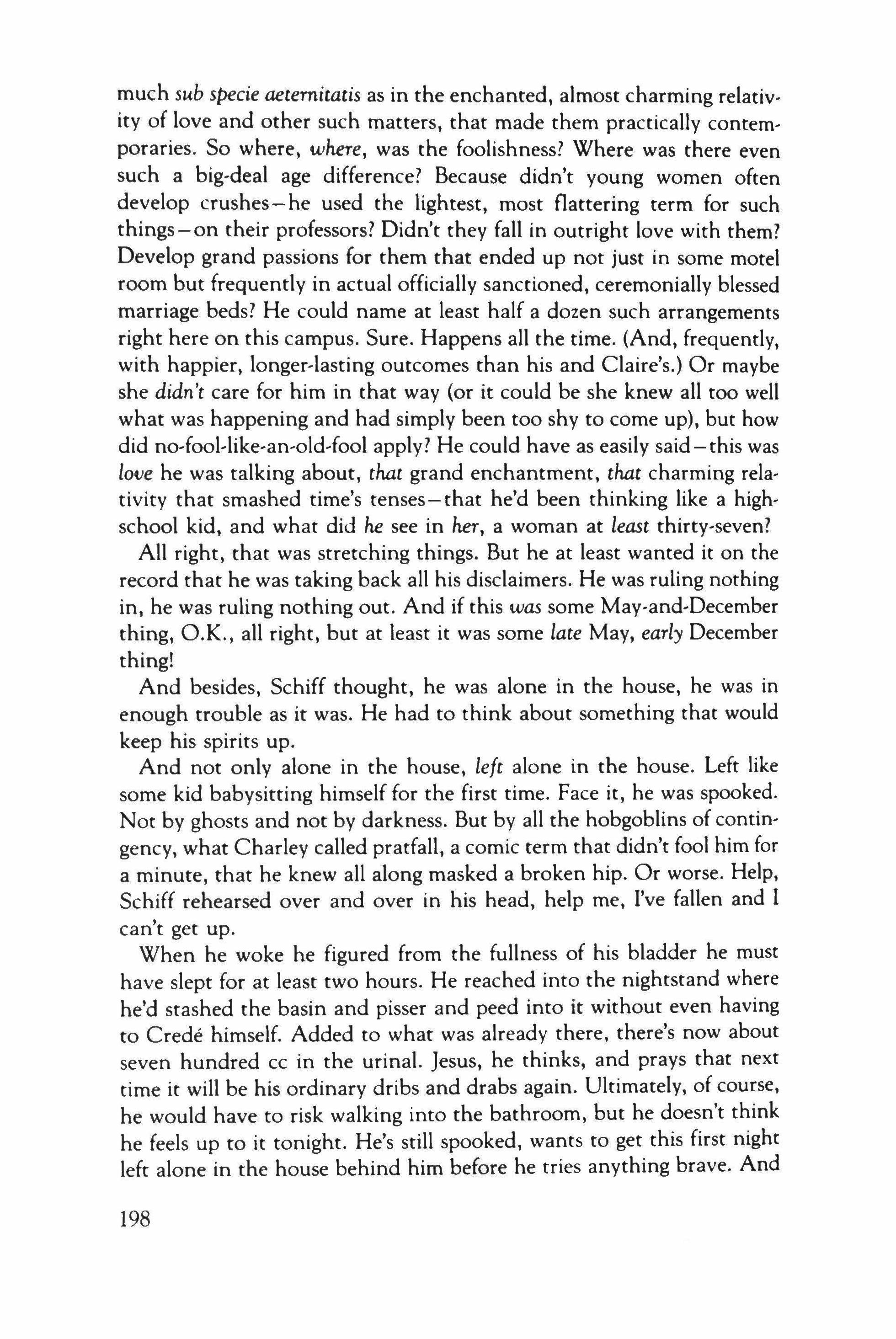
much sub specie aetemitatis as in the enchanted, almost charming relativity of love and other such matters, that made them practically contemporaries. So where, where, was the foolishness? Where was there even such a big-deal age difference? Because didn't young women often develop crushes- he used the lightest, most flattering term for such things-on their professors? Didn't they fall in outright love with them? Develop grand passions for them that ended up not just in some motel room but frequently in actual officially sanctioned, ceremonially blessed marriage beds? He could name at least half a dozen such arrangements right here on this campus. Sure. Happens all the time. (And, frequently, with happier, longer-lasting outcomes than his and Claire's.) Or maybe she didn't care for him in that way (or it could be she knew all too well what was happening and had simply been too shy to come up), but how did no-fool-like-an-old-fool apply? He could have as easily said-this was love he was talking about, that grand enchantment, that charming relativity that smashed time's tenses-that he'd been thinking like a highschool kid, and what did he see in her, a woman at least thirty-seven?
All right, that was stretching things. But he at least wanted it on the record that he was taking back all his disclaimers. He was ruling nothing in, he was ruling nothing out. And if this was some May-and-December thing, O.K., all right, but at least it was some late May, early December thing!
And besides, Schiff thought, he was alone in the house, he was in enough trouble as it was. He had to think about something that would keep his spirits up.
And not only alone in the house, left alone in the house. Left like some kid babysitting himself for the first time. Face it, he was spooked. Not by ghosts and not by darkness. But by all the hobgoblins of contingency, what Charley called pratfall, a comic term that didn't fool him for a minute, that he knew all along masked a broken hip. Or worse. Help, Schiff rehearsed over and over in his head, help me, I've fallen and I can't get up.
When he woke he figured from the fullness of his bladder he must have slept for at least two hours. He reached into the nightstand where he'd stashed the basin and pisser and peed into it without even having to Crede himself. Added to what was already there, there's now about seven hundred cc in the urinal. Jesus, he thinks, and prays that next time it will be his ordinary dribs and drabs again. Ultimately, of course, he would have to risk walking into the bathroom, but he doesn't think he feels up to it tonight. He's still spooked, wants to get this first night left alone in the house behind him before he tries anything brave. And
198

Damn, he thinks, feeling hunger pangs, and maybe even a little thirst there at the back of his throat, that son of a bitch. Meaning Claire. Who'd abandoned him to his bare necessities, his basic needs and what to do with his wastes and grimes. That no-good whoreheart! Damn her and all who sail in her!
He takes up the remote control for his television set and turns the power on, not because he wants to watch television but because he needs to see the yellow date and time stretched across the top of the screen like a banner headline. Ten thirty-nine. Figures, he figures. (He's not particularly superstitious, but he doesn't like it when numerals add up to thirteen.)
Well, he wonders, knocked back on his own devices, what to do, what to do?
Idly at first, his head and heart not only not really in it but not even aware that that's what they're doing, he begins to make up another of his messages for the answering machine he does not yet even own. Please leave a message at the beep, he composes, then, inspired, takes out the "please." Leave a message at the beep. Yes! he thinks. That's it! No frills. No chinks in the sheer insurmountability in so imposing a cliff face. What could be simpler, yet pack more powerhouse ambiguity? Thieves, even those professionals cops so loved to brag on and seemed to respect (if not flat-out admire, as if they were so many Sherlock Holmeses confronting so many Professors Moriarity), thugs worthy of them, thugs with mettle, thugs with brains, would be put off. Or would they? Is this guy for real, they might wonder. Who does he think he's fooling with this bluff? Surely, if they were truly worthy of the professionalism the cops claimed to respect them for, they'd recognize the made-day appeal in such a communique. Oh, oh, the looseness of cripples, mourned buffeted, crippled Schiff, who, on second thought, had seen that real professionals, genuine gangsters, or even only revved kids hopped-up on drugs, could read the vulnerable, terrified wimp factors right through such ploys. It was practically an open invitation. Why not just come out and say just come out and get it?
Good Christ, Schiff thought, taking another reading off the television screen, it was already eleven twenty-nine (again thirteen). Almost an hour had passed since the last time he'd checked. Was it too late to call his students to tell them the party had been scrubbed? Well, they were graduate students, accustomed, he would have thought, to burning the not-yet-but-almost midnight oil, hitting the books or, sunk in the creases of their own complicated lives, their various affairs and dramatized politicals, even their own ardent lonelinesses (drinking or partying
199
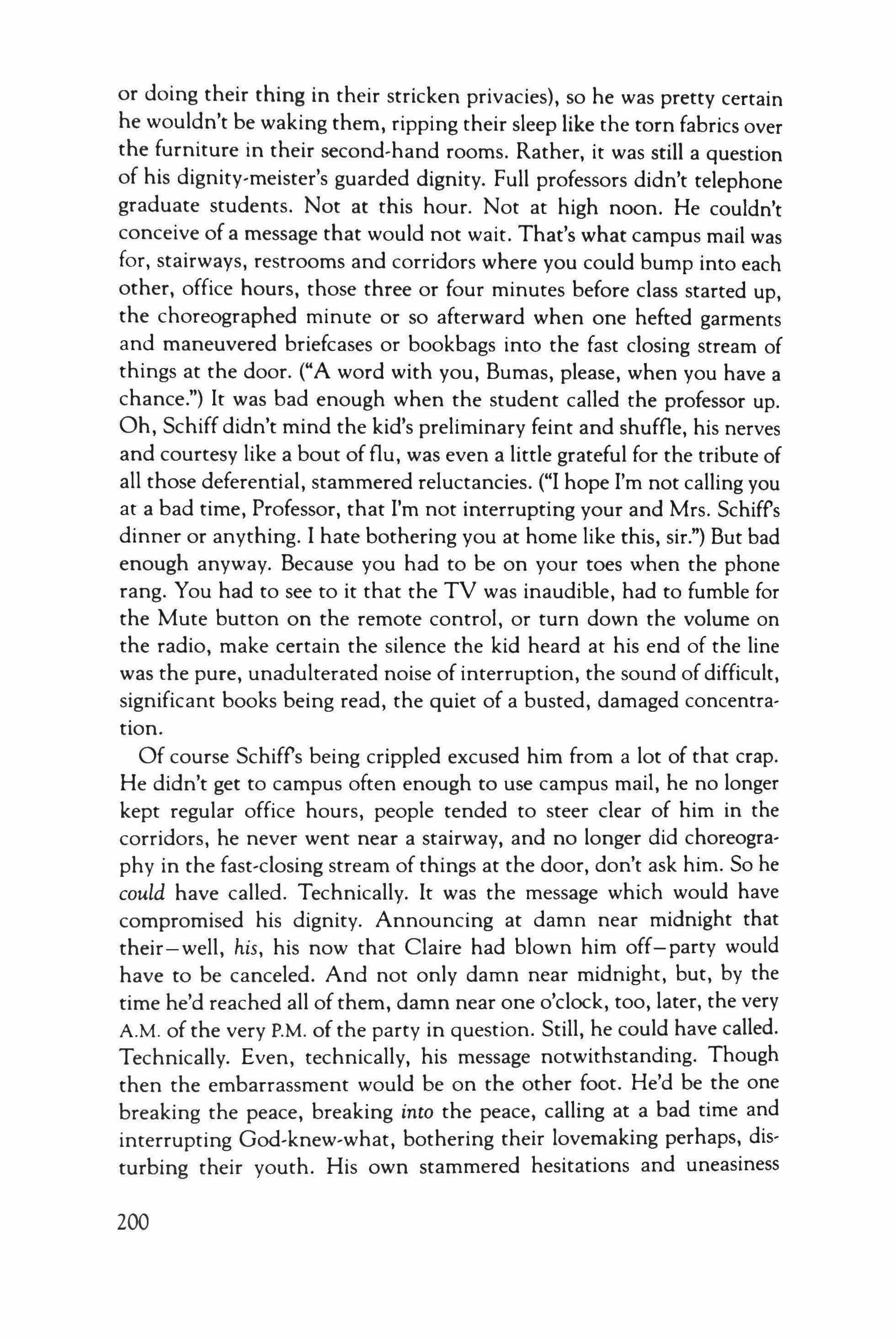
or doing their thing in their stricken privacies), so he was pretty certain he wouldn't be waking them, ripping their sleep like the torn fabrics over the furniture in their second-hand rooms. Rather, it was still a question of his dignirv-rneister's guarded dignity. Full professors didn't telephone graduate students. Not at this hour. Not at high noon. He couldn't conceive of a message that would not wait. That's what campus mail was for, stairways, restrooms and corridors where you could bump into each other, office hours, those three or four minutes before class started up, the choreographed minute or so afterward when one hefted garments and maneuvered briefcases or bookbags into the fast closing stream of things at the door. ("A word with you, Bumas, please, when you have a chance.") It was bad enough when the student called the professor up. Oh, Schiff didn't mind the kid's preliminary feint and shuffle, his nerves and courtesy like a bout of flu, was even a little grateful for the tribute of all those deferential, stammered reluctancies. ("I hope I'm not calling you at a bad time, Professor, that I'm not interrupting your and Mrs. Schiff's dinner or anything. I hate bothering you at home like this, sir.") But bad enough anyway. Because you had to be on your toes when the phone rang. You had to see to it that the TV was inaudible, had to fumble for the Mute button on the remote control, or turn down the volume on the radio, make certain the silence the kid heard at his end of the line was the pure, unadulterated noise of interruption, the sound of difficult, significant books being read, the quiet of a busted, damaged concentration.
Of course Schiff's being crippled excused him from a lot of that crap. He didn't get to campus often enough to use campus mail, he no longer kept regular office hours, people tended to steer clear of him in the corridors, he never went near a stairway, and no longer did choreography in the fast-closing stream of things at the door, don't ask him. So he could have called. Technically. It was the message which would have compromised his dignity. Announcing at damn near midnight that their-well, his, his now that Claire had blown him off-party would have to be canceled. And not only damn near midnight, but, by the time he'd reached all of them, damn near one o'clock, too, later, the very A.M. of the very P.M. of the party in question. Still, he could have called. Technically. Even, technically, his message notwithstanding. Though then the embarrassment would be on the other foot. He'd be the one breaking the peace, breaking into the peace, calling at a bad time and interrupting God-knew-what, bothering their lovemaking perhaps, disturbing their youth. His own stammered hesitations and uneasiness
200

barely audible over the unturned-down volume of hi-fi and boom box. ("Professor Schiff here. Schiff. SCHIFF!")
What time was it now? Twelve one-niner. (Again thirteen? This was beyond high odds. This was into fate.)
Still protective of his dignity, he thought fuck it, picked up the phone and asked Information for the telephone number of Molly Kohm.
Miss Kohm (though this was unclear, she could well have been married; older than his other students, in, he judged, her early forties, and got up always in the costumes, the cloaks, boots, skirts and dresses of ladies, he imagined, on symphony, museum and various other arts boards; and something too dramatic, even a little hysterical, about her dark makeup, its etched or engraved character, almost as if it were not makeup at all but a sort of tattoo, a kind of stenciled quality to her enduring tan, something about Miss-or Mrs.-Kohm which suggested, well, weekends spent elsewhere, her passport in her purse as surely as her car keys, coins for tolls; something-he admitted this though she was not his type-vaguely exciting about her, her intelligence grounded-if that was the word-in intimacy and some mysticism of the far, as though - he had no other way of putting this - Schiff was the geographer but she was the traveler) picked up on the very first ring. And, when he identified himself (hemming and hawing, beating about the bush, shuffling with the best of them), pretending-he assumed pretending-she'd been expecting his call.
"Oh," she said, "you poor man, 1 was going to call you."
"You were?"
"Well, when I heard what your not-so-better-half had done to you And on the eve of your party! Outrageous! People ought to know that some of the most significant damage one can do to others is to force them to change their plans at the last minute. Too too rude, 1 think. To treat other person's lives as though they were subject to alterations like something off-the-rack. Barbaric!"
"Then why didn't you?"
"Why didn't I-?"
"Call me," he called her.
"I thought Dickerson would take care of it. Dickerson was supposed to take care of it. That's what we arranged at any rate."
"We? You and Dickerson? Arranged?"
"We, the members of the Political Geographers Party Committee."
"There is such a thing?"
"Well now there is. The people in your seminar threw it together as soon as we heard."
201
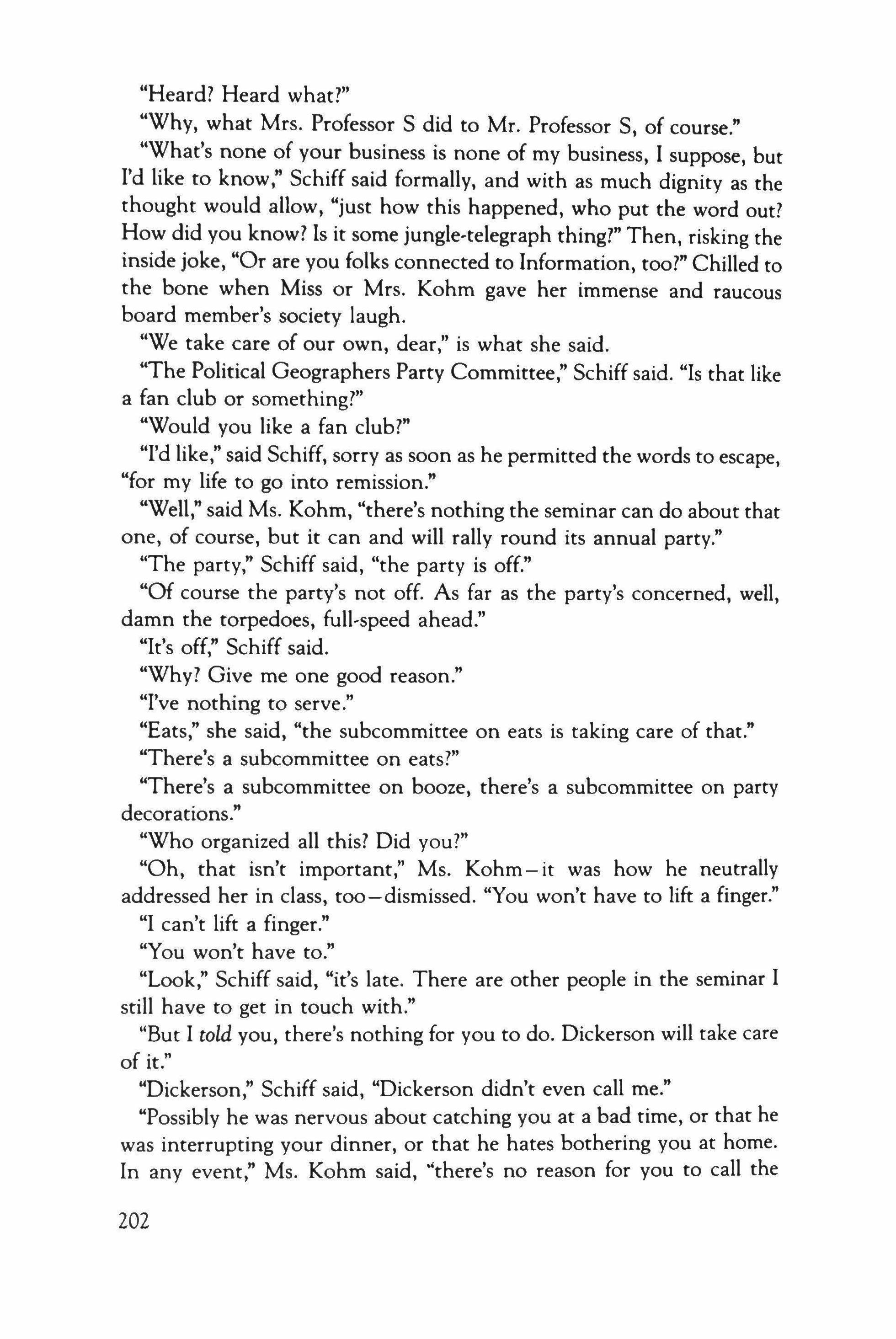
"Heard? Heard what?"
"Why, what Mrs. Professor S did to Mr. Professor S, of course."
"What's none of your business is none of my business, I suppose, but I'd like to know," Schiff said formally, and with as much dignity as the thought would allow, "just how this happened, who put the word out? How did you know? Is it some jungle-telegraph thing?" Then, risking the inside joke, "Or are you folks connected to Information, too?" Chilled to the bone when Miss or Mrs. Kohm gave her immense and raucous board member's society laugh.
"We take care of our own, dear," is what she said.
"The Political Geographers Party Committee," Schiff said. "Is that like a fan club or something?"
"Would you like a fan club?"
"I'd like," said Schiff, sorry as soon as he permitted the words to escape, "for my life to go into remission."
"Well," said Ms. Kohm, "there's nothing the seminar can do about that one, of course, but it can and will rally round its annual party."
"The party," Schiff said, "the party is off."
"Of course the party's not off. As far as the party's concerned, well, damn the torpedoes, full-speed ahead."
"It's off," Schiff said.
"Why? Give me one good reason."
"I've nothing to serve."
"Eats," she said, "the subcommittee on eats is taking care of that."
"There's a subcommittee on eats?"
"There's a subcommittee on booze, there's a subcommittee on party decorations."
"Who organized all this? Did you?"
"Oh, that isn't important," Ms. Kohm - it was how he neutrally addressed her in class, too-dismissed. "You won't have to lift a finger."
"I can't lift a finger."
"You won't have to."
"Look," Schiff said, "it's late. There are other people in the seminar I still have to get in touch with."
"But I told you, there's nothing for you to do. Dickerson will take care of it."
"Dickerson," Schiff said, "Dickerson didn't even call me."
"Possibly he was nervous about catching you at a bad time, or that he was interrupting your dinner, or that he hates bothering you at home. In any event," Ms. Kohm said, "there's no reason for you to call the
202

scholars. Everything really has been taken care of. The PGPC is on top of it."
"The Political Geographers Party Committee," Schiff said, exactly like a moderator of a news show identifying a reference for the audience.
"Exactly," Ms. Kohm said, exactly like a panelist.
"Listen," Schiff said, "what you and the others in the seminar have done is very kind. Really," he said, "very kind. And I appreciate it, I do, but to tell the truth, I don't believe I could even handle a party just now. Be a guest at one, I mean, never mind its host. I don't much enjoy playing hearts and flowers, Ms. Kohm, but it's been a pretty rough day, I've a log on my mind, and the last thing in the world I'm up to right now is a celebration."
"Jack, let me give you some advice, the worst thing someone like you can do at a time like this is to feel sorry for himself."
Jack? Jack?
"Negative energy, particularly for someone in your condition, has devastating effects."
In his condition? In his condition?
"Let me tell you something, Ms. Kohm," Schiff said, "unless they're referring to alternative fuels or to how they're feeling, I'm always a little suspicious of, and embarrassed for, people who use terms like 'energy'."
"Jack," she said, "I know you're upset, that you're just sick with worry about Claire, and, incidentally, I shouldn't think she's in Portland." Claire? Claire?
Where did this woman get off? (Or would she stop at nothing?) Was she drunk? She might be drunk. She looked like a drinker, had, he meant, a drinker's dramatic, slightly hysterical expression, and her makeup, fixed in place like cosmetic surgery, might have been a drinker's makeup, something planted on her face for emergency, like a name sewn into her clothing.
Still, he didn't know which bothered him more, the dignity he'd leaked through his mean outburst about her use of language, or the dignity he lost through her (and he could only assume everyone's) general knowledge of his business, how it was between him and Claire, how it was between him and his condition.
"I know," she was saying, and Schiff, who'd tuned out for a couple of moments, once for his indignation and once again for the regret he felt for permitting himself to give in to it, knew he'd missed something, perhaps even something important (maybe she'd gone on to say what the thinking was in political geography regarding Claire's whereabouts), "things are pretty much up in the air just now, but, you'll see, they'll
203
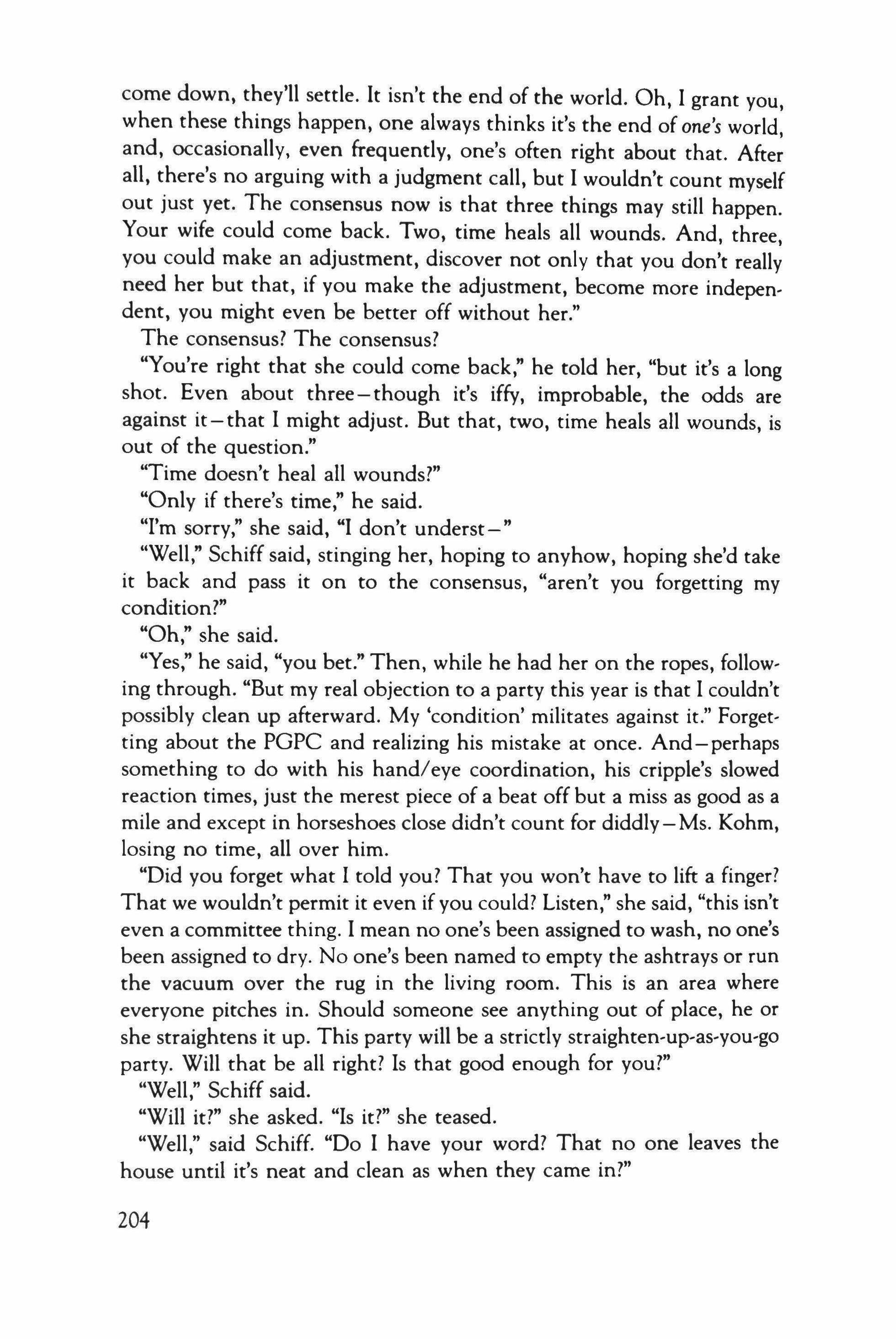
come down, they'll settle. It isn't the end of the world. Oh, I grant you, when these things happen, one always thinks it's the end of one's world, and, occasionally, even frequently, one's often right about that. After all, there's no arguing with a judgment call, but I wouldn't count myself out just yet. The consensus now is that three things may still happen. Your wife could come back. Two, time heals all wounds. And, three, you could make an adjustment, discover not only that you don't really need her but that, if you make the adjustment, become more independent, you might even be better off without her."
The consensus? The consensus?
"You're right that she could come back," he told her, "but it's a long shot. Even about three-though it's iffy, improbable, the odds are against it-that I might adjust. But that, two, time heals all wounds, is out of the question."
"Time doesn't heal all wounds?"
"Only if there's time," he said.
"I'm sorry," she said, "I don't underst -"
"Well," Schiff said, stinging her, hoping to anyhow, hoping she'd take it back and pass it on to the consensus, "aren't you forgetting my condition?"
"Oh," she said.
"Yes," he said, "you bet." Then, while he had her on the ropes, following through. "But my real objection to a party this year is that I couldn't possibly clean up afterward. My 'condition' militates against it." Forgetting about the PGPC and realizing his mistake at once. And-perhaps something to do with his hand/eye coordination, his cripple's slowed reaction times, just the merest piece of a beat off but a miss as good as a mile and except in horseshoes close didn't count for diddly - Ms. Kohrn, losing no time, all over him.
"Did you forget what I told you? That you won't have to lift a finger? That we wouldn't permit it even if you could? Listen," she said, "this isn't even a committee thing. I mean no one's been assigned to wash, no one's been assigned to dry. No one's been named to empty the ashtrays or run the vacuum over the rug in the living room. This is an area where everyone pitches in. Should someone see anything out of place, he or she straightens it up. This party will be a strictly straighten-up-as-you-go party. Will that be all right? Is that good enough for you?"
"Well," Schiff said.
"Will it?" she asked. "Is it?" she teased.
"Well," said Schiff. "Do I have your word? That no one leaves the house until it's neat and clean as when they carne in?"
204
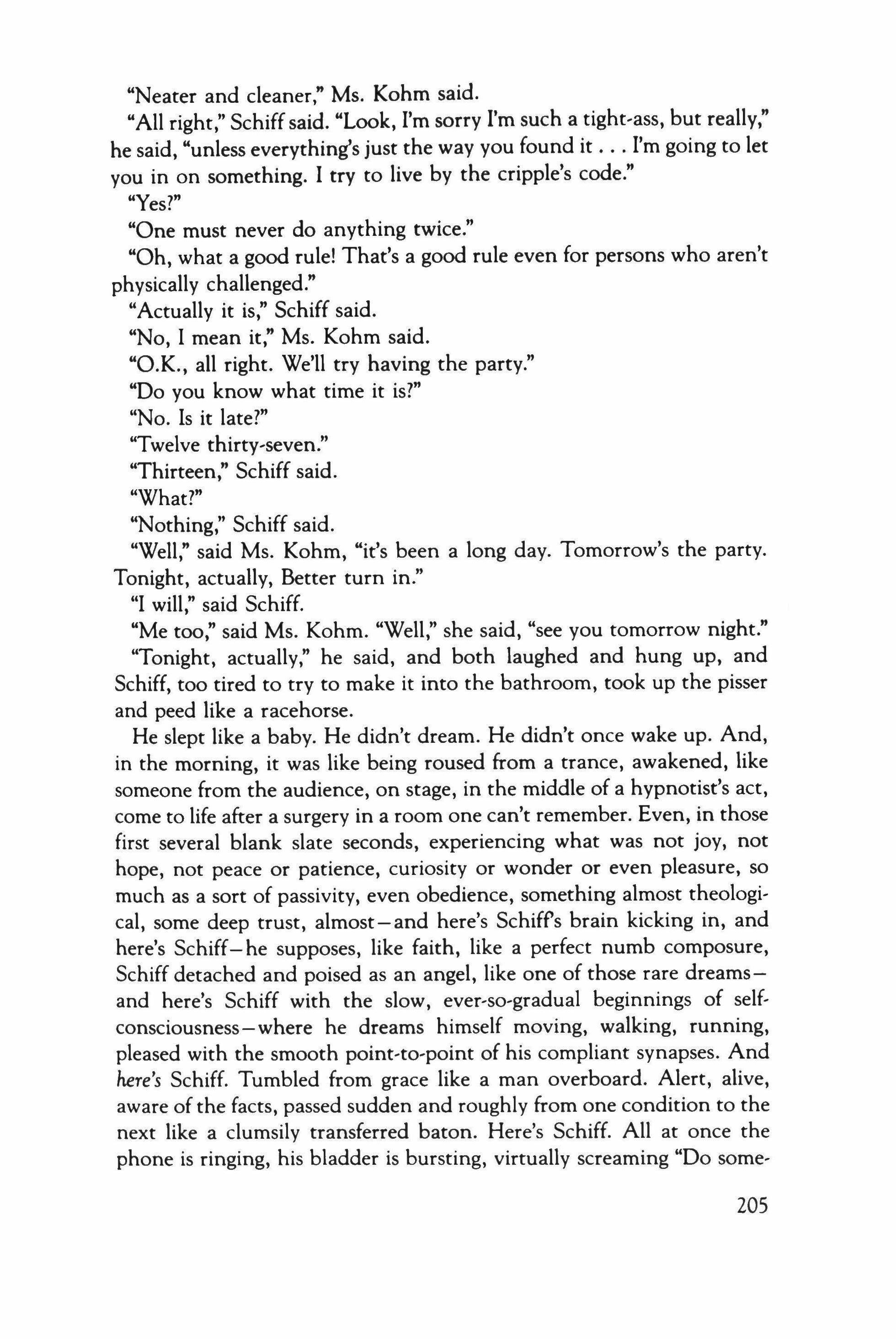
"Neater and cleaner," Ms. Kohm said.
"All right," Schiff said. "Look, I'm sorry I'm such a tight-ass, but really," he said, "unless everything's just the way you found it I'm going to let you in on something. I try to live by the cripple's code."
"Yes?"
"One must never do anything twice."
"Oh, what a good rule! That's a good rule even for persons who aren't physically challenged."
"Actually it is," Schiff said.
"No, I mean it," Ms. Kohm said.
"O.K., all right. We'll try having the party."
"Do you know what time it is?"
"No. Is it late?"
"Twelve thirty-seven."
"Thirteen," Schiff said.
"What?"
"Nothing," Schiff said.
"Well," said Ms. Kohm, "it's been a long day. Tomorrow's the party. Tonight, actually, Better turn in."
"I will," said Schiff.
"Me too," said Ms. Kohm. "Well," she said, "see you tomorrow night."
"Tonight, actually," he said, and both laughed and hung up, and Schiff, too tired to try to make it into the bathroom, took up the pisser and peed like a racehorse.
He slept like a baby. He didn't dream. He didn't once wake up. And, in the morning, it was like being roused from a trance, awakened, like someone from the audience, on stage, in the middle of a hypnotist's act, come to life after a surgery in a room one can't remember. Even, in those first several blank slate seconds, experiencing what was not joy, not hope, not peace or patience, curiosity or wonder or even pleasure, so much as a sort of passivity, even obedience, something almost theological, some deep trust, almost-and here's Schiff's brain kicking in, and here's Schiff-he supposes, like faith, like a perfect numb composure, Schiff detached and poised as an angel, like one of those rare dreamsand here's Schiff with the slow, ever-so-gradual beginnings of selfconsciousness-where he dreams himself moving, walking, running, pleased with the smooth point-to-point of his compliant synapses. And here's Schiff. Tumbled from grace like a man overboard. Alert, alive, aware of the facts, passed sudden and roughly from one condition to the next like a clumsily transferred baton. Here's Schiff. All at once the phone is ringing, his bladder is bursting, virtually screaming "Do some-
205
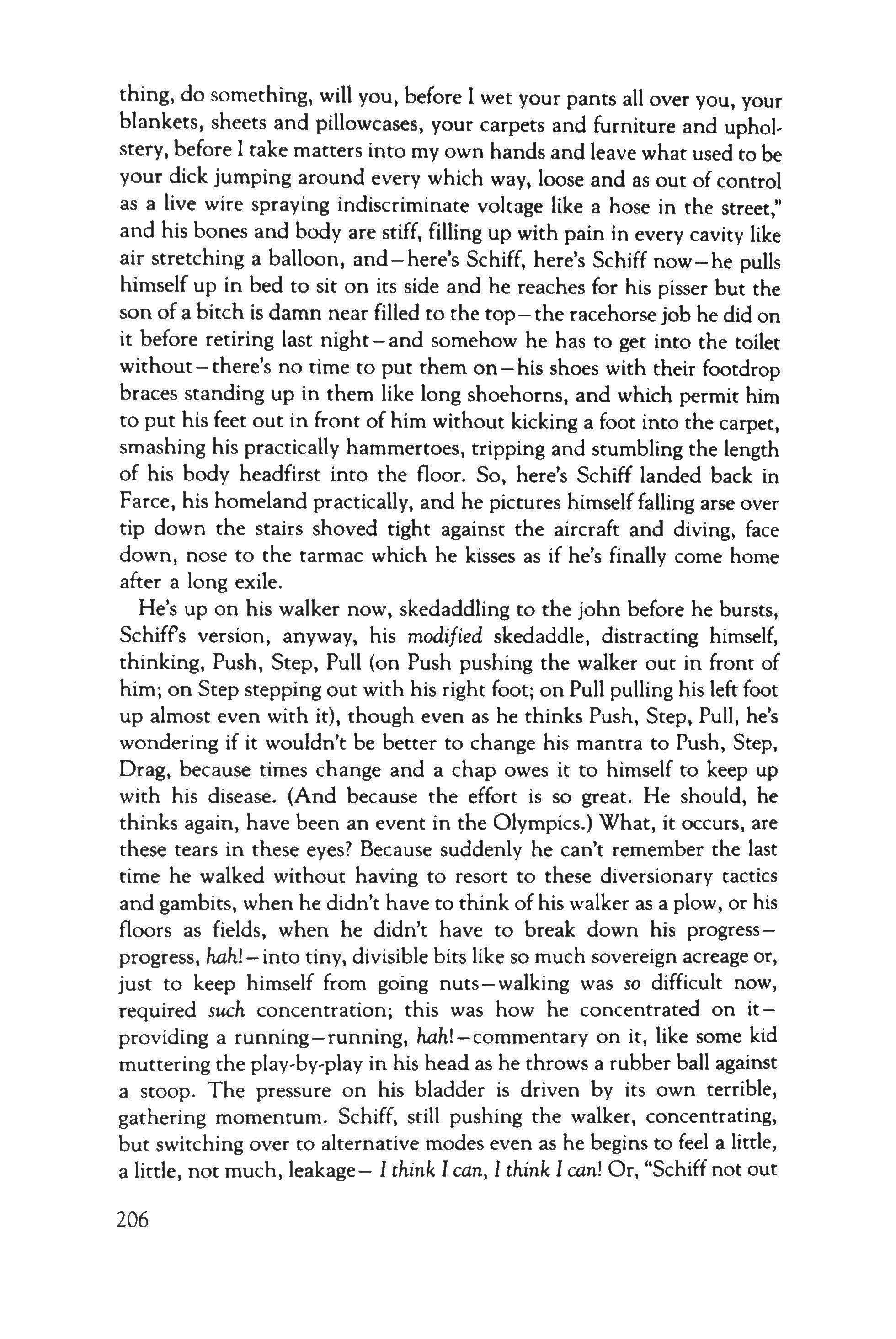
thing, do something, will you, before I wet your pants all over you, your blankets, sheets and pillowcases, your carpets and furniture and upholstery, before I take matters into my own hands and leave what used to be your dick jumping around every which way, loose and as out of control as a live wire spraying indiscriminate voltage like a hose in the street," and his bones and body are stiff, filling up with pain in every cavity like air stretching a balloon, and - here's Schiff, here's Schiff now - he pulls himself up in bed to sit on its side and he reaches for his pisser but the son of a bitch is damn near filled to the top-the racehorse job he did on it before retiring last night - and somehow he has to get into the toilet without - there's no time to put them on - his shoes with their footdrop braces standing up in them like long shoehorns, and which permit him to put his feet out in front of him without kicking a foot into the carpet, smashing his practically hammertoes, tripping and stumbling the length of his body headfirst into the floor. So, here's Schiff landed back in Farce, his homeland practically, and he pictures himself falling arse over tip down the stairs shoved tight against the aircraft and diving, face down, nose to the tarmac which he kisses as if he's finally come home after a long exile.
He's up on his walker now, skedaddling to the john before he bursts, Schiff's version, anyway, his modified skedaddle, distracting himself, thinking, Push, Step, Pull (on Push pushing the walker out in front of him; on Step stepping out with his right foot; on Pull pulling his left foot up almost even with it), though even as he thinks Push, Step, Pull, he's wondering if it wouldn't be better to change his mantra to Push, Step, Drag, because times change and a chap owes it to himself to keep up with his disease. (And because the effort is so great. He should, he thinks again, have been an event in the Olympics.) What, it occurs, are these tears in these eyes? Because suddenly he can't remember the last time he walked without having to resort to these diversionary tactics and gambits, when he didn't have to think of his walker as a plow, or his floors as fields, when he didn't have to break down his progressprogress, hah! - into tiny, divisible bits like so much sovereign acreage or, just to keep himself from going nuts-walking was so difficult now, required such concentration; this was how he concentrated on itproviding a running-running, hah!-commentary on it, like some kid muttering the play-by-play in his head as he throws a rubber ball against a stoop. The pressure on his bladder is driven by its own terrible, gathering momentum. Schiff, still pushing the walker, concentrating, but switching over to alternative modes even as he begins to feel a little, a little, not much, leakage- I think I can, I think I can! Or, "Schiff not out
206
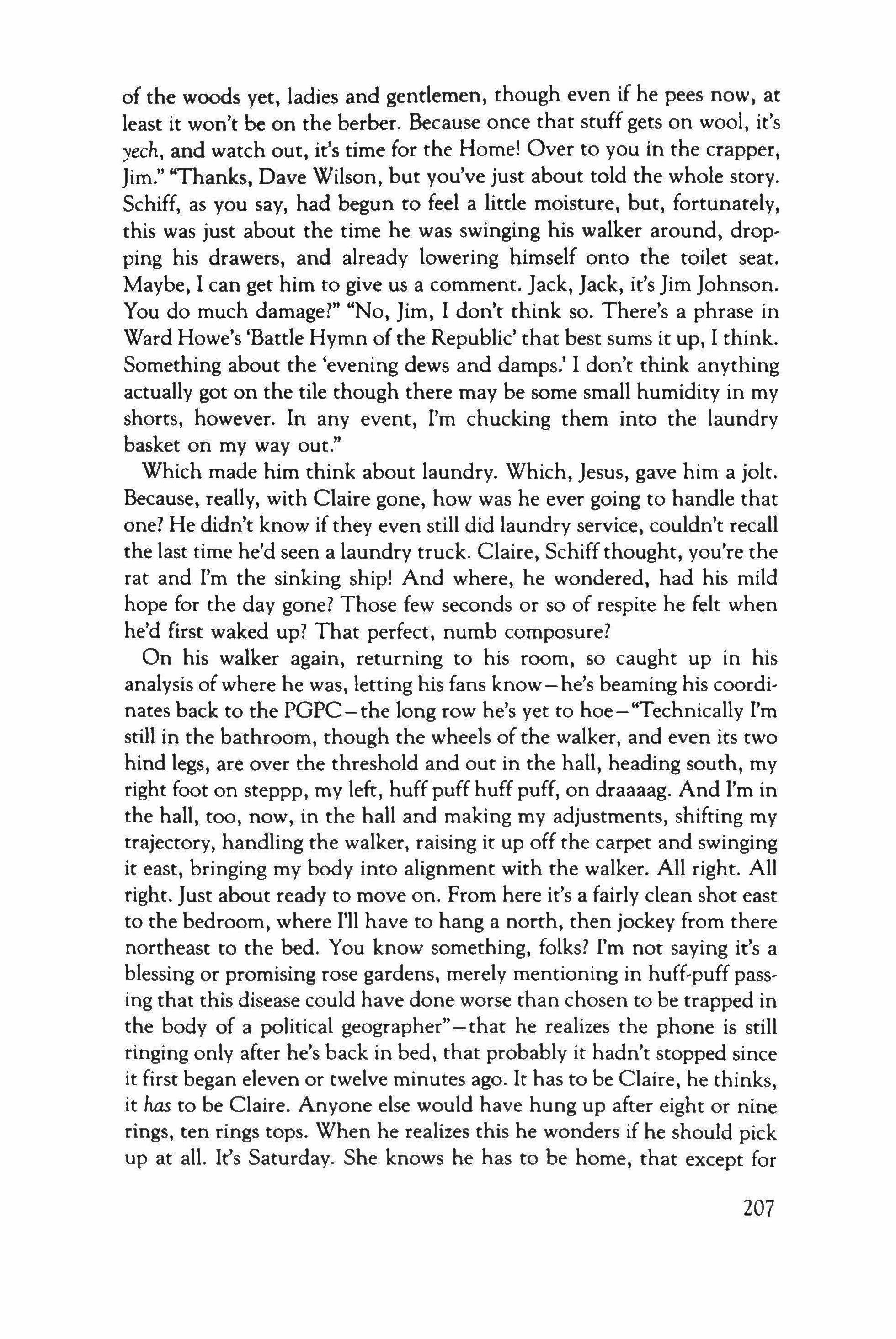
of the woods yet, ladies and gentlemen, though even if he pees now, at least it won't be on the berber. Because once that stuff gets on wool, it's yech, and watch out, it's time for the Home! Over to you in the crapper, Jim." "Thanks, Dave Wilson, but you've just about told the whole story. Schiff, as you say, had begun to feel a little moisture, but, fortunately, this was just about the time he was swinging his walker around, dropping his drawers, and already lowering himself onto the toilet seat. Maybe, I can get him to give us a comment. Jack, Jack, it's Jim Johnson. You do much damage?" "No, Jim, I don't think so. There's a phrase in Ward Howe's 'Battle Hymn of the Republic' that best sums it up, I think. Something about the 'evening dews and damps.' I don't think anything actually got on the tile though there may be some small humidity in my shorts, however. In any event, I'm chucking them into the laundry basket on my way out."
Which made him think about laundry. Which, Jesus, gave him a jolt. Because, really, with Claire gone, how was he ever going to handle that one? He didn't know if they even still did laundry service, couldn't recall the last time he'd seen a laundry truck. Claire, Schiff thought, you're the rat and I'm the sinking ship! And where, he wondered, had his mild hope for the day gone? Those few seconds or so of respite he felt when he'd first waked up? That perfect, numb composure?
On his walker again, returning to his room, so caught up in his analysis of where he was, letting his fans know - he's beaming his coordinates back to the POPC-the long row he's yet to hoe-"Technically I'm still in the bathroom, though the wheels of the walker, and even its two hind legs, are over the threshold and out in the hall, heading south, my right foot on steppp, my left, huff puff huff puff, on draaaag. And I'm in the hall, too, now, in the hall and making my adjustments, shifting my trajectory, handling the walker, raising it up off the carpet and swinging it east, bringing my body into alignment with the walker. All right. All right. Just about ready to move on. From here it's a fairly clean shot east to the bedroom, where I'll have to hang a north, then jockey from there northeast to the bed. You know something, folks? I'm not saying it's a blessing or promising rose gardens, merely mentioning in huff-puff passing that this disease could have done worse than chosen to be trapped in the body of a political geographer"-that he realizes the phone is still ringing only after he's back in bed, that probably it hadn't stopped since it first began eleven or twelve minutes ago. It has to be Claire, he thinks, it has to be Claire. Anyone else would have hung up after eight or nine rings, ten rings tops. When he realizes this he wonders if he should pick up at all. It's Saturday. She knows he has to be home, that except for
207
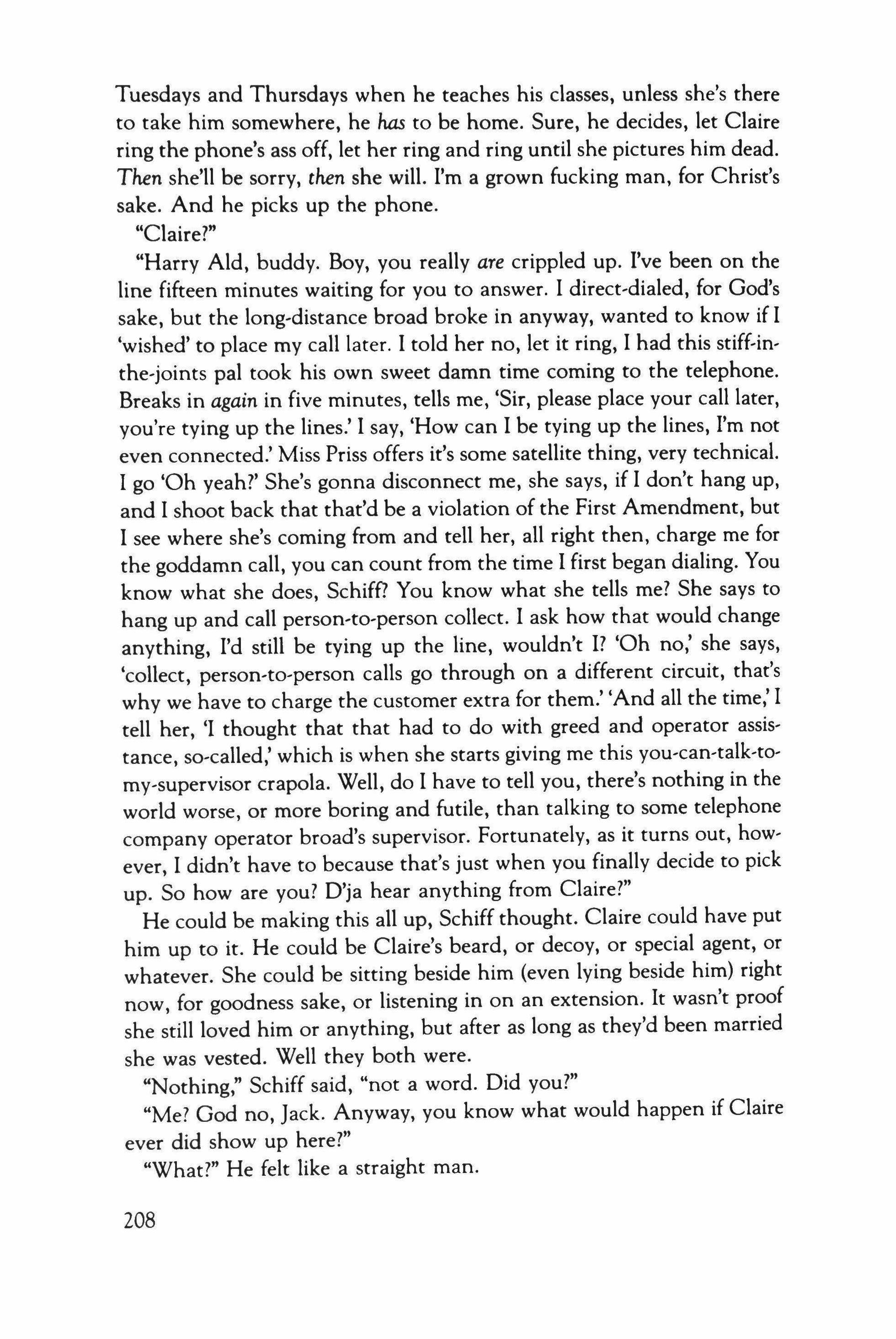
Tuesdays and Thursdays when he teaches his classes, unless she's there to take him somewhere, he has to be home. Sure, he decides, let Claire ring the phone's ass off, let her ring and ring until she pictures him dead. Then she'll be sorry, then she will. I'm a grown fucking man, for Christ's sake. And he picks up the phone.
"Claire?"
"Harry Aid, buddy. Boy, you really are crippled up. I've been on the line fifteen minutes waiting for you to answer. I direct-dialed, for God's sake, but the long-distance broad broke in anyway, wanted to know if I 'wished' to place my call later. I told her no, let it ring, I had this stiff-inthe-joints pal took his own sweet damn time coming to the telephone. Breaks in again in five minutes, tells me, 'Sir, please place your call later, you're tying up the lines.' I say, 'How can I be tying up the lines, I'm not even connected.' Miss Priss offers it's some satellite thing, very technical. I go 'Oh yeah?' She's gonna disconnect me, she says, if I don't hang up, and I shoot back that that'd be a violation of the First Amendment, but I see where she's coming from and tell her, all right then, charge me for the goddamn call, you can count from the time I first began dialing. You know what she does, Schiff? You know what she tells me? She says to hang up and call person-to-person collect. I ask how that would change anything, I'd still be tying up the line, wouldn't I? 'Oh no,' she says, 'collect, person-to-person calls go through on a different circuit, that's why we have to charge the customer extra for them.' 'And all the time,' I tell her, 'I thought that that had to do with greed and operator assis, tance, so-called,' which is when she starts giving me this you-can-talk-tomy-supervisor crapola. Well, do I have to tell you, there's nothing in the world worse, or more boring and futile, than talking to some telephone company operator broad's supervisor. Fortunately, as it turns out, how, ever, I didn't have to because that's just when you finally decide to pick up. So how are you? D'ja hear anything from Claire?"
He could be making this all up, Schiff thought. Claire could have put him up to it. He could be Claire's beard, or decoy, or special agent, or whatever. She could be sitting beside him (even lying beside him) right now, for goodness sake, or listening in on an extension. It wasn't proof she still loved him or anything, but after as long as they'd been married she was vested. Well they both were.
"Nothing," Schiff said, "not a word. Did you?"
"Me? God no, Jack. Anyway, you know what would happen if Claire ever did show up here?"
"What?" He felt like a straight man.
208
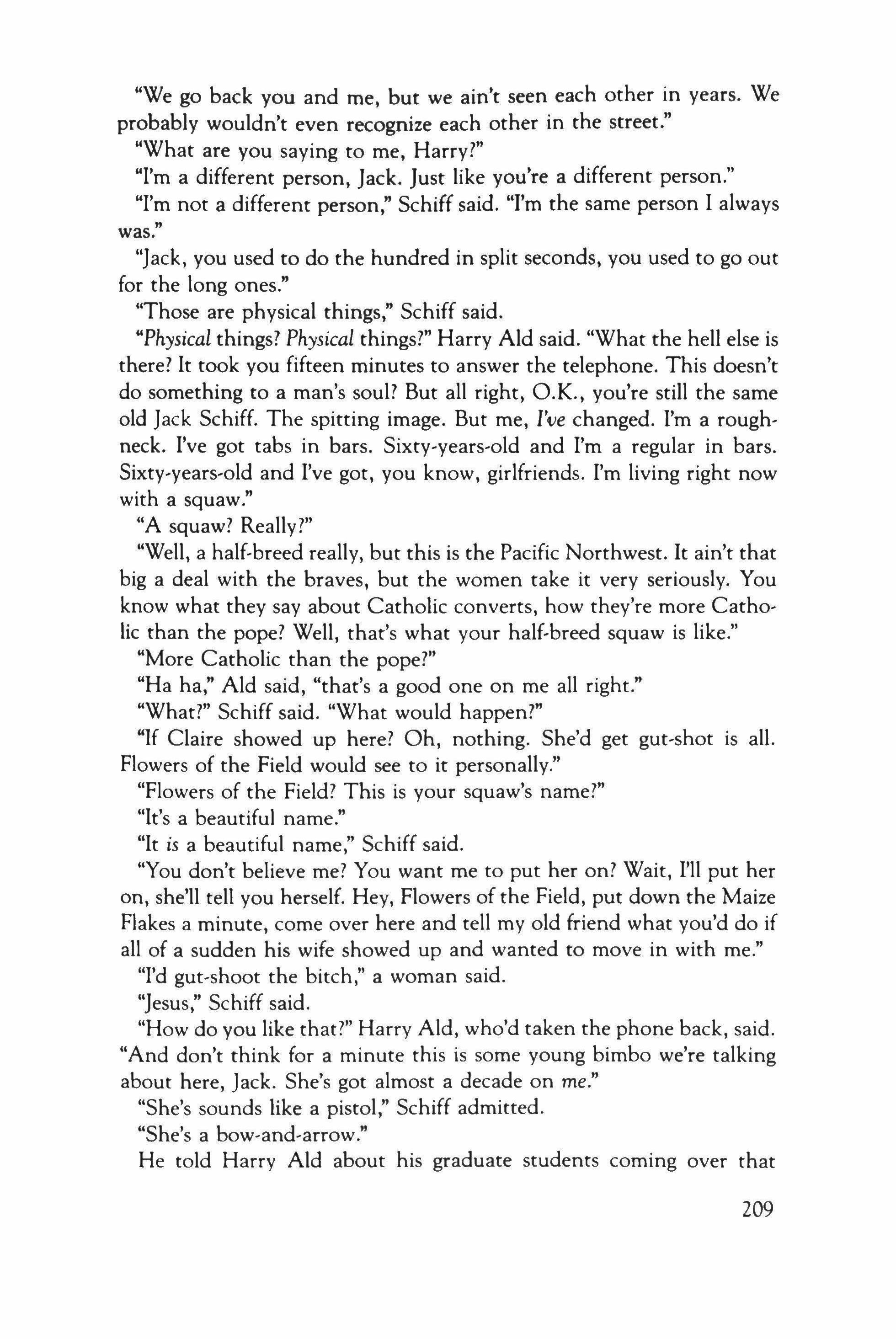
"We go back you and me, but we ain't seen each other in years. We probably wouldn't even recognize each other in the street."
"What are you saying to me, Harry?"
"I'm a different person, Jack. Just like you're a different person."
"I'm not a different person," Schiff said. "I'm the same person I always was."
"Jack, you used to do the hundred in split seconds, you used to go out for the long ones."
"Those are physical things," Schiff said.
"Physical things? Physical things?" Harry Aid said. "What the hell else is there? It took you fifteen minutes to answer the telephone. This doesn't do something to a man's soul? But all right, O.K., you're still the same old Jack Schiff. The spitting image. But me, I've changed. I'm a roughneck. I've got tabs in bars. Sixty-years-old and I'm a regular in bars. Sixty-years-old and I've got, you know, girlfriends. I'm living right now with a squaw."
"A squaw? Really?"
"Well, a half-breed really, but this is the Pacific Northwest. It ain't that big a deal with the braves, but the women take it very seriously. You know what they say about Catholic converts, how they're more Catholic than the pope? Well, that's what your half-breed squaw is like."
"More Catholic than the pope?"
"Ha ha," Aid said, "that's a good one on me all right."
"What?" Schiff said. "What would happen?"
"If Claire showed up here? Oh, nothing. She'd get gut-shot is all. Flowers of the Field would see to it personally."
"Flowers of the Field? This is your squaw's name?"
"It's a beautiful name."
"It is a beautiful name," Schiff said.
"You don't believe me? You want me to put her on? Wait, I'll put her on, she'll tell you herself. Hey, Flowers of the Field, put down the Maize Flakes a minute, come over here and tell myoid friend what you'd do if all of a sudden his wife showed up and wanted to move in with me."
"I'd gut-shoot the bitch," a woman said.
"Jesus," Schiff said.
"How do you like that?" Harry AId, who'd taken the phone back, said. "And don't think for a minute this is some young bimbo we're talking about here, Jack. She's got almost a decade on me."
"She's sounds like a pistol," Schiff admitted.
"She's a bow-and-arrow."
He told Harry AId about his graduate students coming over that
209
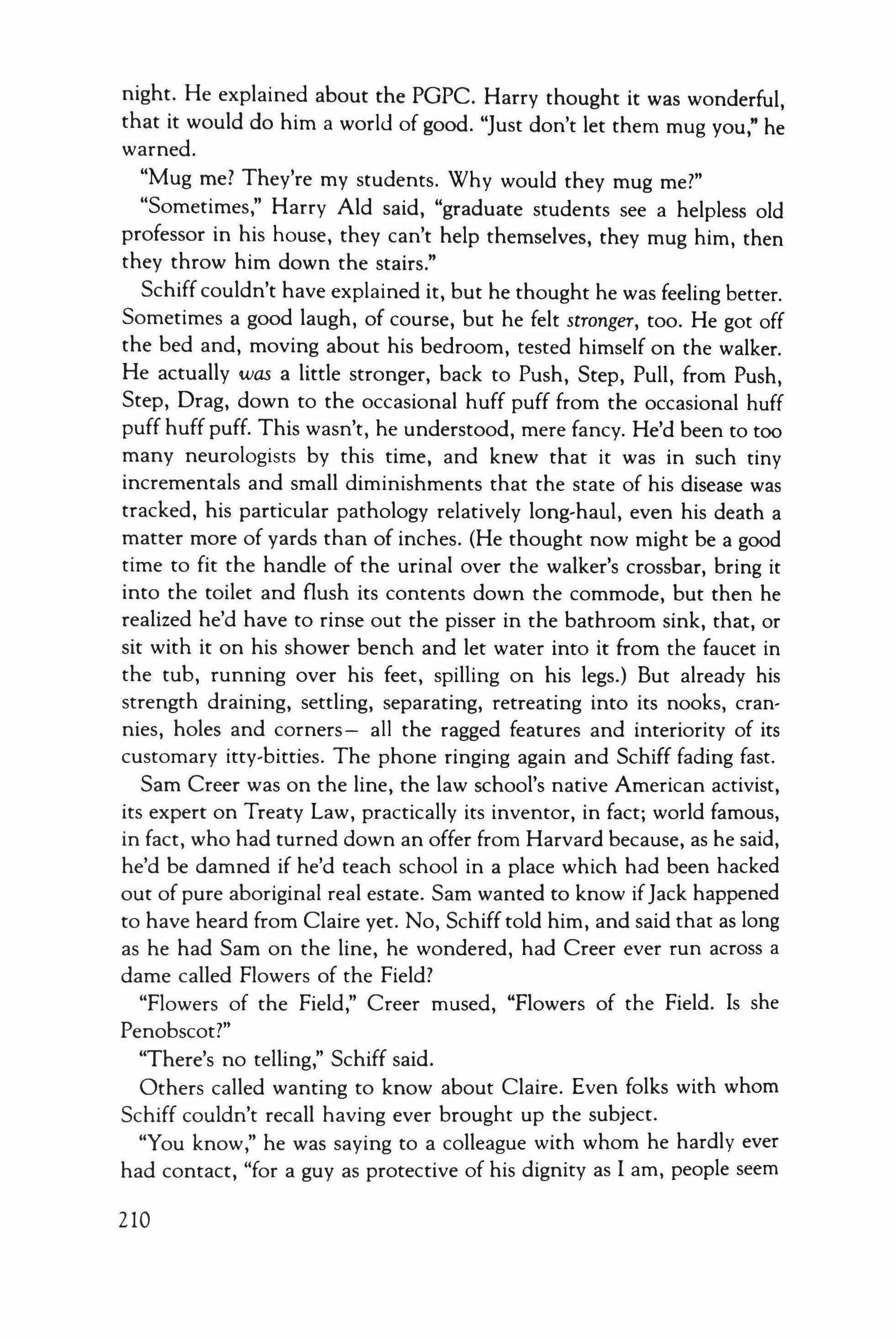
night. He explained about the PGPC. Harry thought it was wonderful, that it would do him a world of good. "Just don't let them mug you," he warned.
"Mug me? They're my students. Why would they mug me?"
"Sometimes," Harry AId said, "graduate students see a helpless old professor in his house, they can't help themselves, they mug him, then they throw him down the stairs."
Schiff couldn't have explained it, but he thought he was feeling better. Sometimes a good laugh, of course, but he felt stronger, too. He got off the bed and, moving about his bedroom, tested himself on the walker. He actually was a little stronger, back to Push, Step, Pull, from Push, Step, Drag, down to the occasional huff puff from the occasional huff puff huff puff. This wasn't, he understood, mere fancy. He'd been to too many neurologists by this time, and knew that it was in such tiny incrementals and small diminishments that the state of his disease was tracked, his particular pathology relatively long-haul, even his death a matter more of yards than of inches. (He thought now might be a good time to fit the handle of the urinal over the walker's crossbar, bring it into the toilet and flush its contents down the commode, but then he realized he'd have to rinse out the pisser in the bathroom sink, that, or sit with it on his shower bench and let water into it from the faucet in the tub, running over his feet, spilling on his legs.) But already his strength draining, settling, separating, retreating into its nooks, crannies, holes and corners- all the ragged features and interiority of its customary itty-bitties. The phone ringing again and Schiff fading fast.
Sam Creer was on the line, the law school's native American activist, its expert on Treaty Law, practically its inventor, in fact; world famous, in fact, who had turned down an offer from Harvard because, as he said, he'd be damned if he'd teach school in a place which had been hacked out of pure aboriginal real estate. Sam wanted to know ifJack happened to have heard from Claire yet. No, Schiff told him, and said that as long as he had Sam on the line, he wondered, had Creer ever run across a dame called Flowers of the Field?
"Flowers of the Field," Creer mused, "Flowers of the Field. Is she Penobscot?"
"There's no telling," Schiff said.
Others called wanting to know about Claire. Even folks with whom Schiff couldn't recall having ever brought up the subject.
"You know," he was saying to a colleague with whom he hardly ever had contact, "for a guy as protective of his dignity as I am, people seem
210
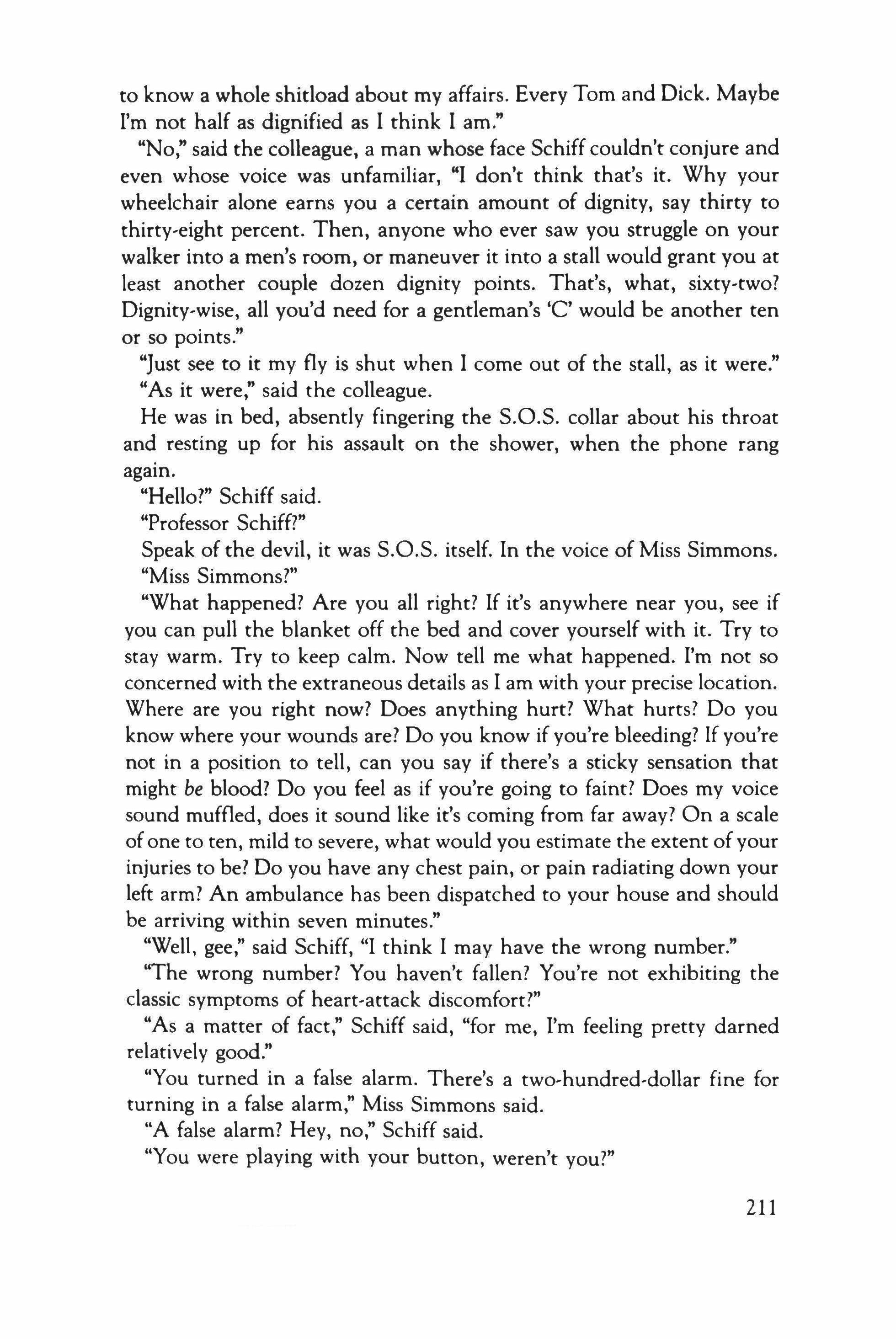
to know a whole shitload about my affairs. Every Tom and Dick. Maybe I'm not half as dignified as I think I am."
"No," said the colleague, a man whose face Schiff couldn't conjure and even whose voice was unfamiliar, "I don't think that's it. Why your wheelchair alone earns you a certain amount of dignity, say thirty to thirty-eight percent. Then, anyone who ever saw you struggle on your walker into a men's room, or maneuver it into a stall would grant you at least another couple dozen dignity points. That's, what, sixtv-two? Dignity-wise, all you'd need for a gentleman's 'C' would be another ten or so points."
"Just see to it my fly is shut when I come out of the stall, as it were."
"As it were," said the colleague.
He was in bed, absently fingering the S.O.S. collar about his throat and resting up for his assault on the shower, when the phone rang again.
"Hello?" Schiff said.
"Professor Schiff?"
Speak of the devil, it was S.O.S. itself. In the voice of Miss Simmons.
"Miss Simmons?"
"What happened? Are you all right? If it's anywhere near you, see if you can pull the blanket off the bed and cover yourself with it. Try to stay warm. Try to keep calm. Now tell me what happened. I'm not so concerned with the extraneous details as I am with your precise location. Where are you right now? Does anything hurt? What hurts? Do you know where your wounds are? Do you know if you're bleeding? If you're not in a position to tell, can you say if there's a sticky sensation that might be blood? Do you feel as if you're going to faint? Does my voice sound muffled, does it sound like it's coming from far away? On a scale of one to ten, mild to severe, what would you estimate the extent of your injuries to be? Do you have any chest pain, or pain radiating down your left arm? An ambulance has been dispatched to your house and should be arriving within seven minutes."
"Well, gee," said Schiff, "I think I may have the wrong number."
"The wrong number? You haven't fallen? You're not exhibiting the classic symptoms of heart-attack discomfort?"
"As a matter of fact," Schiff said, "for me, I'm feeling pretty darned relatively good."
"You turned in a false alarm. There's a two-hundred-dollar fine for turning in a false alarm," Miss Simmons said.
"A false alarm? Hey, no," Schiff said.
"You were playing with your button, weren't you?"
211
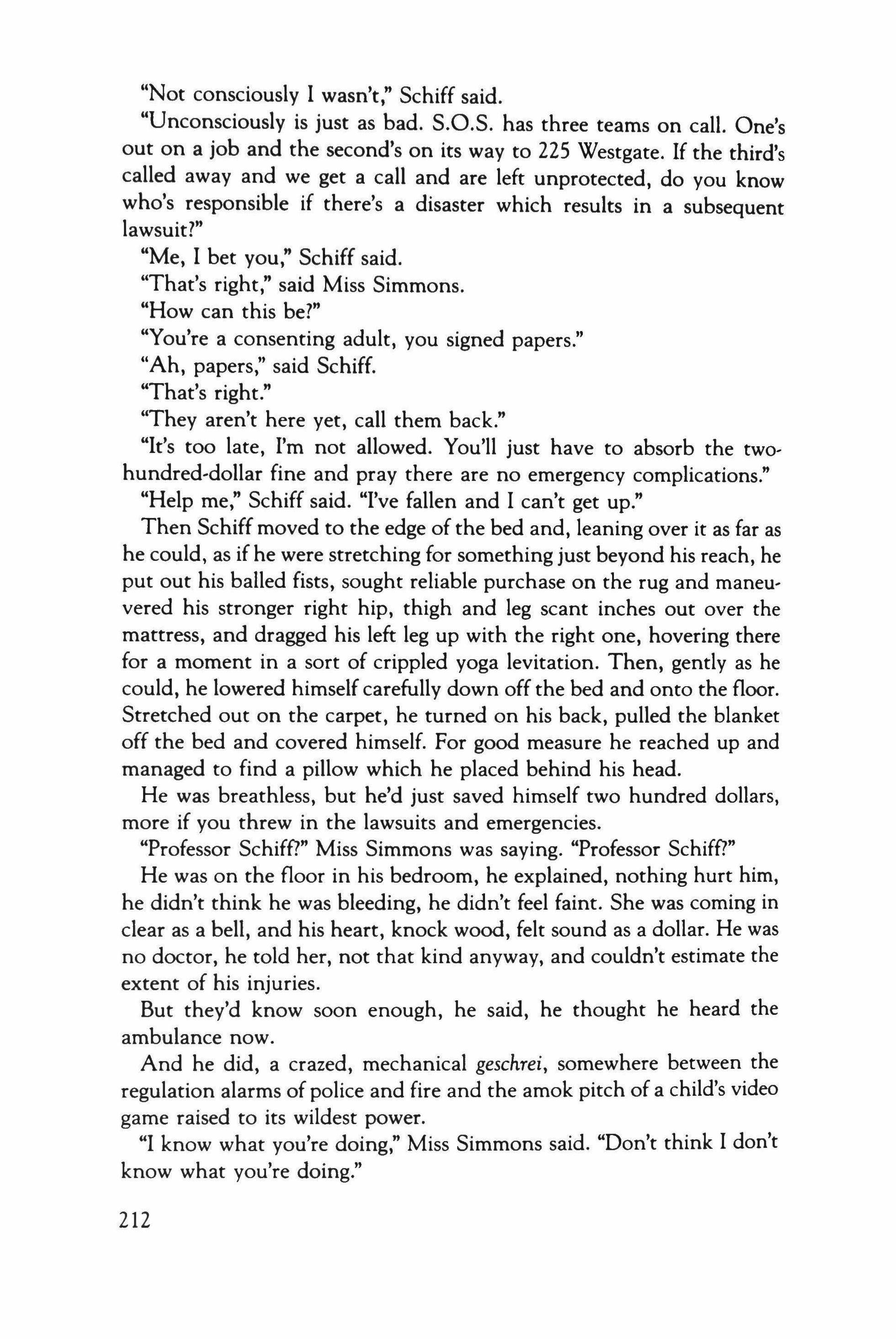
"Not consciously I wasn't," Schiff said.
"Unconsciously is just as bad. S.O.S. has three teams on call. One's out on a job and the second's on its way to 225 Westgate. If the third's called away and we get a call and are left unprotected, do you know who's responsible if there's a disaster which results in a subsequent lawsuit?"
"Me, I bet you," Schiff said.
"That's right," said Miss Simmons.
"How can this be?"
"You're a consenting adult, you signed papers."
"Ah, papers," said Schiff.
"That's right."
"They aren't here yet, call them back."
"It's too late, I'm not allowed. You'll just have to absorb the twohundred-dollar fine and pray there are no emergency complications."
"Help me," Schiff said. "I've fallen and I can't get up."
Then Schiff moved to the edge of the bed and, leaning over it as far as he could, as if he were stretching for something just beyond his reach, he put out his balled fists, sought reliable purchase on the rug and maneuvered his stronger right hip, thigh and leg scant inches out over the mattress, and dragged his left leg up with the right one, hovering there for a moment in a sort of crippled yoga levitation. Then, gently as he could, he lowered himself carefully down off the bed and onto the floor. Stretched out on the carpet, he turned on his back, pulled the blanket off the bed and covered himself. For good measure he reached up and managed to find a pillow which he placed behind his head.
He was breathless, but he'd just saved himself two hundred dollars, more if you threw in the lawsuits and emergencies.
"Professor Schiff?" Miss Simmons was saying. "Professor Schiff?"
He was on the floor in his bedroom, he explained, nothing hurt him, he didn't think he was bleeding, he didn't feel faint. She was coming in clear as a bell, and his heart, knock wood, felt sound as a dollar. He was no doctor, he told her, not that kind anyway, and couldn't estimate the extent of his injuries.
But they'd know soon enough, he said, he thought he heard the ambulance now.
And he did, a crazed, mechanical geschrei, somewhere between the regulation alarms of police and fire and the amok pitch of a child's video game raised to its wildest power.
"I know what you're doing," Miss Simmons said. "Don't think I don't know what you're doing."
212
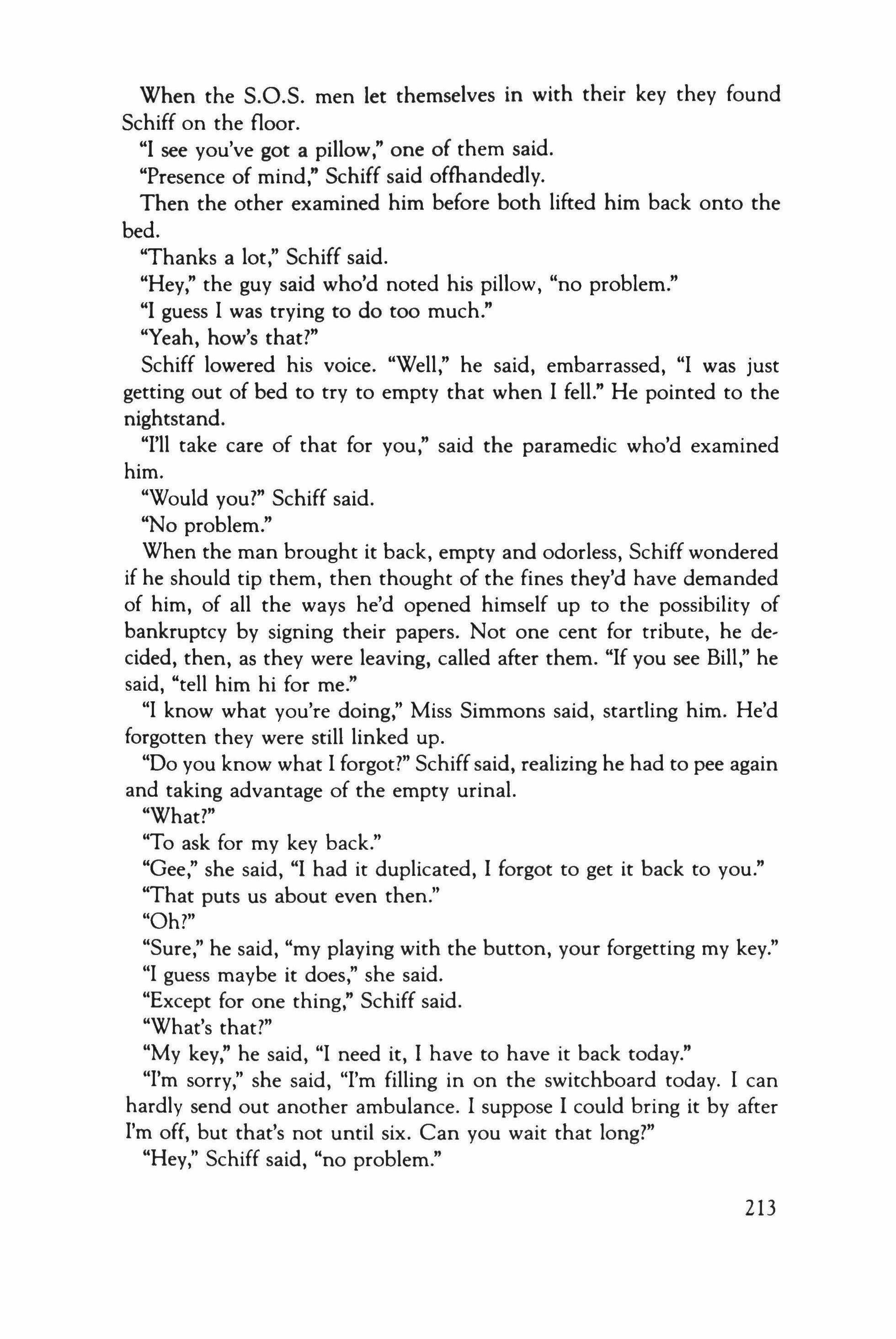
When the S.O.S. men let themselves in with their key they found Schiff on the floor.
"I see you've got a pillow," one of them said.
"Presence of mind," Schiff said offhandedly.
Then the other examined him before both lifted him back onto the bed.
"Thanks a lot," Schiff said.
"Hey," the guy said who'd noted his pillow, "no problem."
"I guess I was trying to do too much."
"Yeah, how's that?"
Schiff lowered his voice. "Well," he said, embarrassed, "I was just getting out of bed to try to empty that when I fell." He pointed to the nightstand.
"I'll take care of that for you," said the paramedic who'd examined him.
"Would you?" Schiff said.
"No problem."
When the man brought it back, empty and odorless, Schiff wondered if he should tip them, then thought of the fines they'd have demanded of him, of all the ways he'd opened himself up to the possibility of bankruptcy by signing their papers. Not one cent for tribute, he decided, then, as they were leaving, called after them. "If you see Bill," he said, "tell him hi for me."
"I know what you're doing," Miss Simmons said, startling him. He'd forgotten they were still linked up.
"Do you know what I forgot?" Schiff said, realizing he had to pee again and taking advantage of the empty urinal.
"What?"
"To ask for my key back."
"Gee," she said, "1 had it duplicated, I forgot to get it back to you."
"That puts us about even then."
"Oh?"
"Sure," he said, "my playing with the button, your forgetting my key."
"I guess maybe it does," she said.
"Except for one thing," Schiff said.
"What's that?"
"My key," he said, "I need it, I have to have it back today."
"I'm sorry," she said, "I'm filling in on the switchboard today. I can hardly send out another ambulance. 1 suppose 1 could bring it by after I'm off, but that's not until six. Can you wait that long?"
"Hey," Schiff said, "no problem."
213
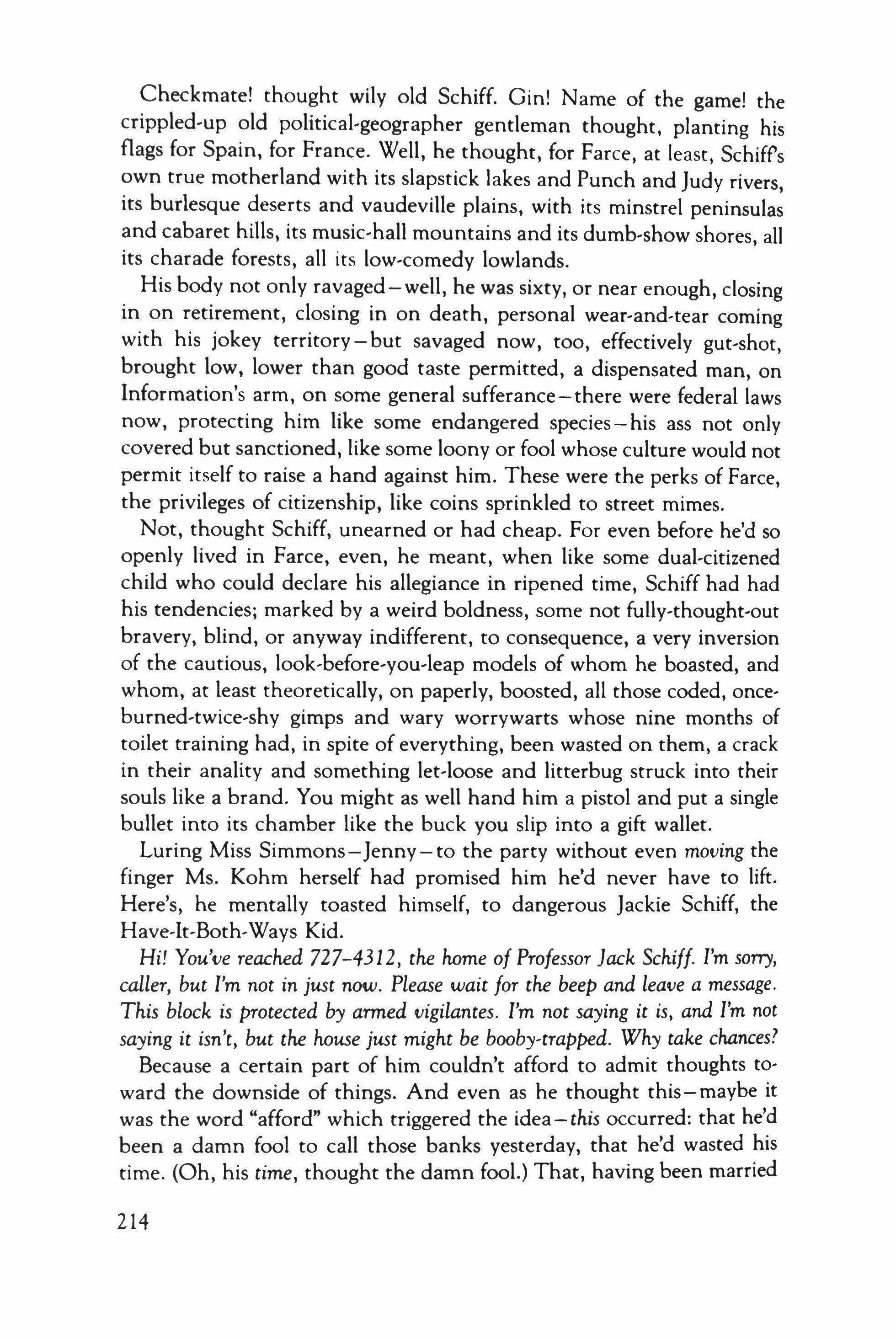
Checkmate! thought wily old Schiff. Gin! Name of the game! the crippled-up old political-geographer gentleman thought, planting his flags for Spain, for France. Well, he thought, for Farce, at least, Schiff's own true motherland with its slapstick lakes and Punch and Judy rivers, its burlesque deserts and vaudeville plains, with its minstrel peninsulas and cabaret hills, its music-hall mountains and its dumb-show shores, all its charade forests, all its low-comedy lowlands.
His body not only ravaged-well, he was sixty, or near enough, closing in on retirement, closing in on death, personal wear-and-tear corning with his jokey territory - but savaged now, too, effectively gut-shot, brought low, lower than good taste permitted, a dispensated man, on Information's arm, on some general sufferance-there were federal laws now, protecting him like some endangered species - his ass not only covered but sanctioned, like some loony or fool whose culture would not permit itself to raise a hand against him. These were the perks of Farce, the privileges of citizenship, like coins sprinkled to street mimes.
Not, thought Schiff, unearned or had cheap. For even before he'd so openly lived in Farce, even, he meant, when like some dual-citizened child who could declare his allegiance in ripened time, Schiff had had his tendencies; marked by a weird boldness, some not fully-thought-out bravery, blind, or anyway indifferent, to consequence, a very inversion of the cautious, look-before-you-leap models of whom he boasted, and whom, at least theoretically, on paperly, boosted, all those coded, onceburned-twice-shy gimps and wary worrywarts whose nine months of toilet training had, in spite of everything, been wasted on them, a crack in their anality and something let-loose and litterbug struck into their souls like a brand. You might as well hand him a pistol and put a single bullet into its chamber like the buck you slip into a gift wallet.
Luring Miss Simmons-Jenny-to the party without even moving the finger Ms. Kohm herself had promised him he'd never have to lift. Here's, he mentally toasted himself, to dangerous Jackie Schiff, the Have-It-Both-Ways Kid.
Hi! You've reached 727-4312, the home of Professor lack Schiff. I'm sorry, caller, but I'm not in just now. Please wait for the beep and leave a message. This block is protected by armed vigilantes. I'm not saying it is, and I'm not saying it isn't, but the house just might be booby-trapped. Why take chances?
Because a certain part of him couldn't afford to admit thoughts toward the downside of things. And even as he thought this-maybe it was the word "afford" which triggered the idea-this occurred: that he'd been a damn fool to call those banks yesterday, that he'd wasted his time. (Oh, his time, thought the damn fool.) That, having been married
214
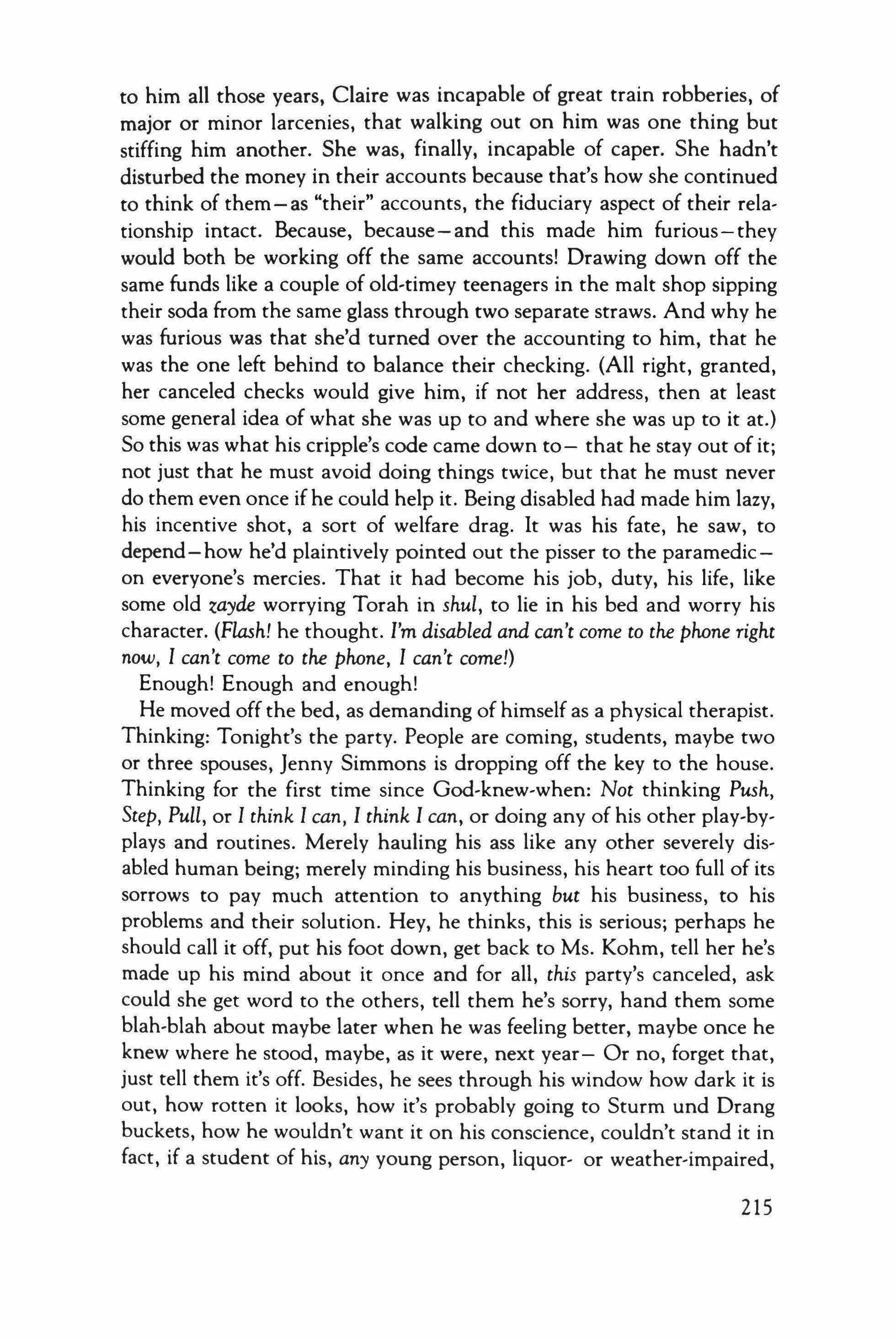
to him all those years, Claire was incapable of great train robberies, of major or minor larcenies, that walking out on him was one thing but stiffing him another. She was, finally, incapable of caper. She hadn't disturbed the money in their accounts because that's how she continued to think of them-as "their" accounts, the fiduciary aspect of their relationship intact. Because, because - and this made him furious - they would both be working off the same accounts! Drawing down off the same funds like a couple of old-timev teenagers in the malt shop sipping their soda from the same glass through two separate straws. And why he was furious was that she'd turned over the accounting to him, that he was the one left behind to balance their checking. (All right, granted, her canceled checks would give him, if not her address, then at least some general idea of what she was up to and where she was up to it at.) So this was what his cripple's code came down to- that he stay out of it; not just that he must avoid doing things twice, but that he must never do them even once ifhe could help it. Being disabled had made him lazy, his incentive shot, a sort of welfare drag. It was his fate, he saw, to depend-how he'd plaintively pointed out the pisser to the paramedicon everyone's mercies. That it had become his job, duty, his life, like some old zayde worrying Torah in shul, to lie in his bed and worry his character. (Flash! he thought. I'm disabled and can't come to the phone right now, I can't come to the phone, I can't come!)
Enough! Enough and enough!
He moved off the bed, as demanding of himself as a physical therapist. Thinking: Tonight's the party. People are coming, students, maybe two or three spouses, Jenny Simmons is dropping off the key to the house. Thinking for the first time since God-knew-when: Not thinking Push, Step, Pull, or I think I can, I think I can, or doing any of his other play-byplays and routines. Merely hauling his ass like any other severely disabled human being; merely minding his business, his heart too full of its sorrows to pay much attention to anything but his business, to his problems and their solution. Hey, he thinks, this is serious; perhaps he should call it off, put his foot down, get back to Ms. Kohm, tell her he's made up his mind about it once and for all, this party's canceled, ask could she get word to the others, tell them he's sorry, hand them some blah-blah about maybe later when he was feeling better, maybe once he knew where he stood, maybe, as it were, next year- Or no, forget that, just tell them it's off. Besides, he sees through his window how dark it is out, how rotten it looks, how it's probably going to Sturm und Orang buckets, how he wouldn't want it on his conscience, couldn't stand it in fact, if a student of his, any young person, liquor- or weather-impaired,
215
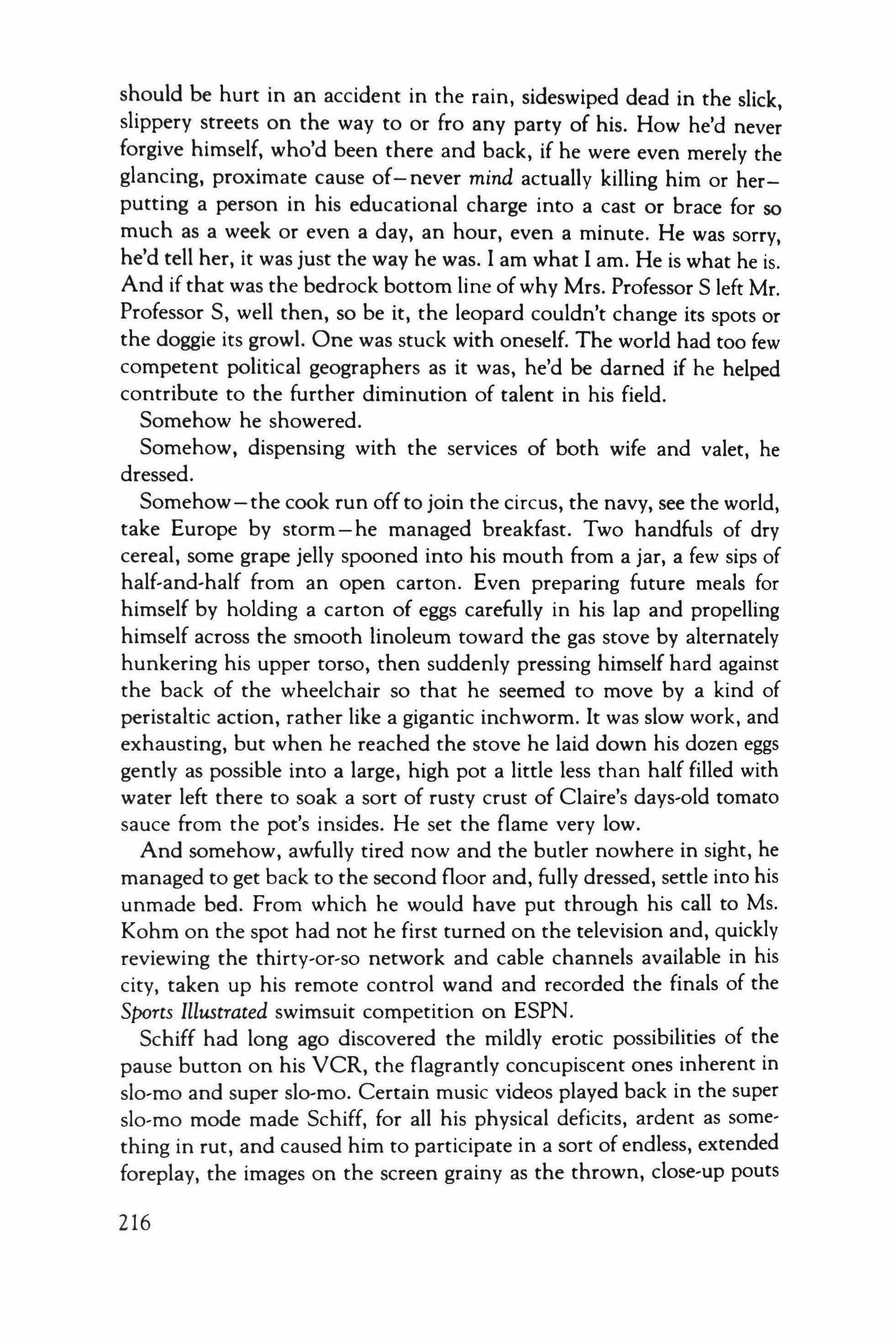
should be hurt in an accident in the rain, sideswiped dead in the slick, slippery streets on the way to or fro any party of his. How he'd never forgive himself, who'd been there and back, if he were even merely the glancing, proximate cause of-never mind actually killing him or herputting a person in his educational charge into a cast or brace for so much as a week or even a day, an hour, even a minute. He was sorry, he'd tell her, it was just the way he was. I am what I am. He is what he is. And if that was the bedrock bottom line ofwhy Mrs. Professor S left Mr. Professor S, well then, so be it, the leopard couldn't change its spots or the doggie its growl. One was stuck with oneself. The world had too few competent political geographers as it was, he'd be darned if he helped contribute to the further diminution of talent in his field.
Somehow he showered.
Somehow, dispensing with the services of both wife and valet, he dressed.
Somehow-the cook run off to join the circus, the navy, see the world, take Europe by storm - he managed breakfast. Two handfuls of dry cereal, some grape jelly spooned into his mouth from a jar, a few sips of half-and-half from an open carton. Even preparing future meals for himself by holding a carton of eggs carefully in his lap and propelling himself across the smooth linoleum toward the gas stove by alternately hunkering his upper torso, then suddenly pressing himself hard against the back of the wheelchair so that he seemed to move by a kind of peristaltic action, rather like a gigantic inchworm. It was slow work, and exhausting, but when he reached the stove he laid down his dozen eggs gently as possible into a large, high pot a little less than half filled with water left there to soak a sort of rusty crust of Claire's days-old tomato sauce from the pot's insides. He set the flame very low.
And somehow, awfully tired now and the butler nowhere in sight, he managed to get back to the second floor and, fully dressed, settle into his unmade bed. From which he would have put through his call to Ms. Kohm on the spot had not he first turned on the television and, quickly reviewing the thirty-or-so network and cable channels available in his city, taken up his remote control wand and recorded the finals of the Sports Illustrated swimsuit competition on ESPN.
Schiff had long ago discovered the mildly erotic possibilities of the pause button on his VCR, the flagrantly concupiscent ones inherent in slo-mo and super slo-mo. Certain music videos played back in the super slo-rno mode made Schiff, for all his physical deficits, ardent as something in rut, and caused him to participate in a sort of endless, extended foreplay, the images on the screen grainy as the thrown, close-up pouts
216
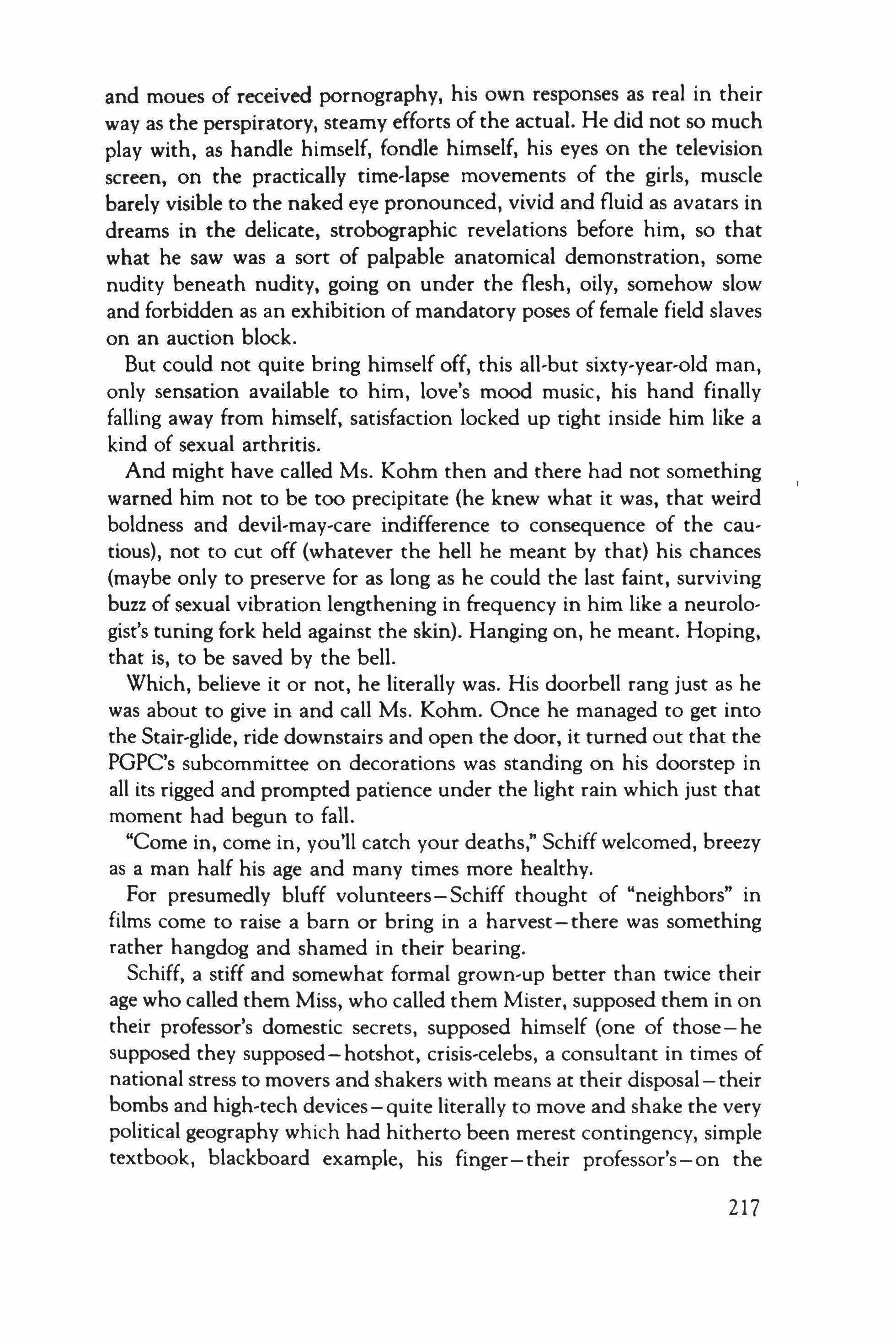
and moues of received pornography, his own responses as real in their way as the perspiratory, steamy efforts of the actual. He did not so much play with, as handle himself, fondle himself, his eyes on the television screen, on the practically time-lapse movements of the girls, muscle barely visible to the naked eye pronounced, vivid and fluid as avatars in dreams in the delicate, strobographic revelations before him, so that what he saw was a sort of palpable anatomical demonstration, some nudity beneath nudity, going on under the flesh, oily, somehow slow and forbidden as an exhibition of mandatory poses of female field slaves on an auction block.
But could not quite bring himself off, this all-but sixry-vear-old man, only sensation available to him, love's mood music, his hand finally falling away from himself, satisfaction locked up tight inside him like a kind of sexual arthritis.
And might have called Ms. Kohm then and there had not something warned him not to be too precipitate (he knew what it was, that weird boldness and devil-may-care indifference to consequence of the cautious), not to cut off (whatever the hell he meant by that) his chances (maybe only to preserve for as long as he could the last faint, surviving buzz of sexual vibration lengthening in frequency in him like a neurologist's tuning fork held against the skin). Hanging on, he meant. Hoping, that is, to be saved by the bell.
Which, believe it or not, he literally was. His doorbell rang just as he was about to give in and call Ms. Kohm. Once he managed to get into the Stair-glide, ride downstairs and open the door, it turned out that the PGPC's subcommittee on decorations was standing on his doorstep in all its rigged and prompted patience under the light rain which just that moment had begun to fall.
"Come in, come in, you'll catch your deaths," Schiff welcomed, breezy as a man half his age and many times more healthy.
For presumedly bluff volunteers-Schiff thought of "neighbors" in films come to raise a barn or bring in a harvest - there was something rather hangdog and shamed in their bearing.
Schiff, a stiff and somewhat formal grown-up better than twice their age who called them Miss, who called them Mister, supposed them in on their professor's domestic secrets, supposed himself (one of those-he supposed they supposed - hotshot, crisis-celebs, a consultant in times of national stress to movers and shakers with means at their disposal-their bombs and high-tech devices-quite literally to move and shake the very political geography which had hitherto been merest contingency, simple textbook, blackboard example, his finger-their professor's-on the
217
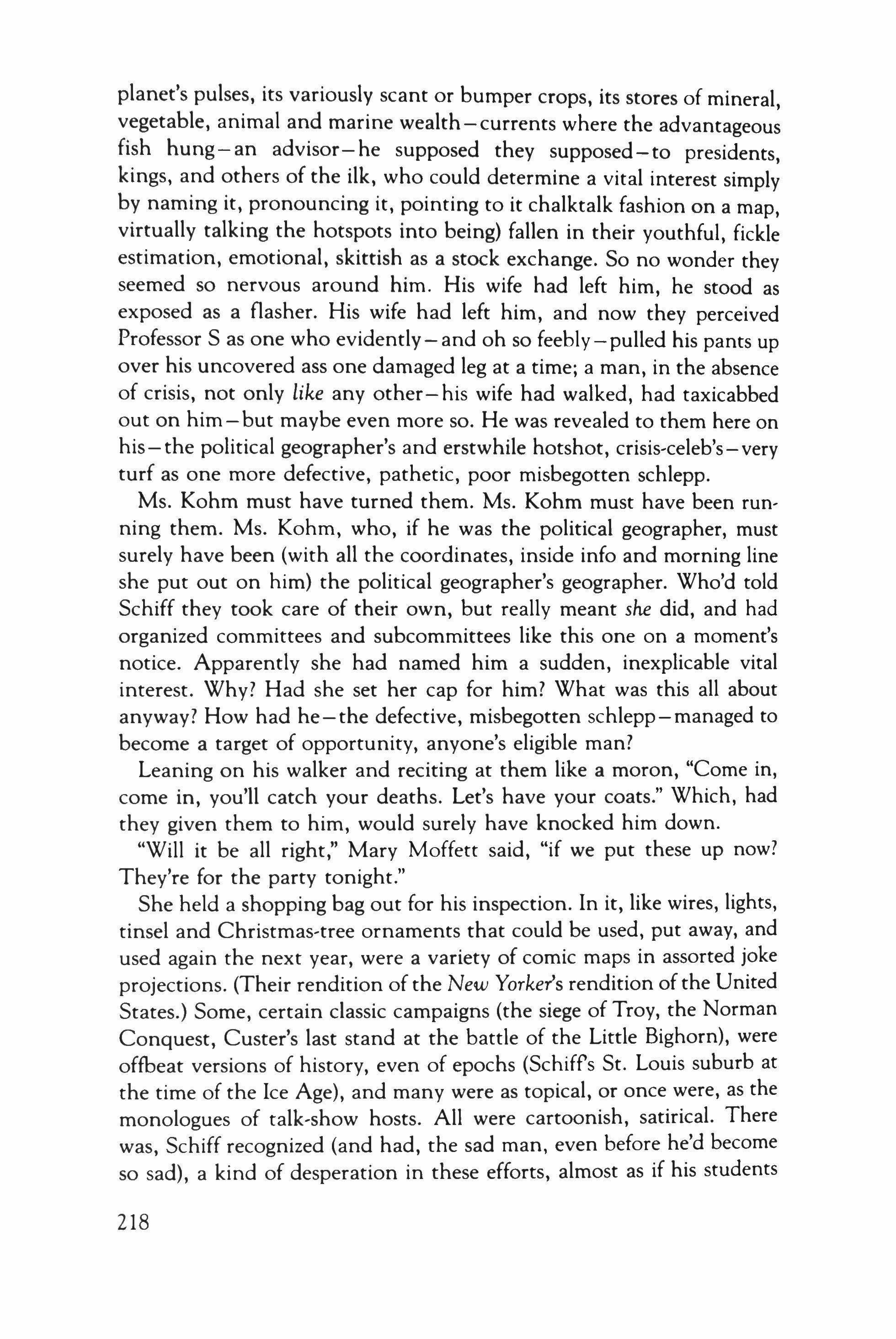
planet's pulses, its variously scant or bumper crops, its stores of mineral, vegetable, animal and marine wealth-currents where the advantageous fish hung-an advisor-he supposed they supposed-to presidents, kings, and others of the ilk, who could determine a vital interest simply by naming it, pronouncing it, pointing to it chalktalk fashion on a map, virtually talking the hotspots into being) fallen in their youthful, fickle estimation, emotional, skittish as a stock exchange. So no wonder they seemed so nervous around him. His wife had left him, he stood as exposed as a flasher. His wife had left him, and now they perceived Professor S as one who evidently-and oh so feebly-pulled his pants up over his uncovered ass one damaged leg at a time; a man, in the absence of crisis, not only like any other- his wife had walked, had taxicabbed out on him - but maybe even more so. He was revealed to them here on his-the political geographer's and erstwhile hotshot, crisis-celeb's-very turf as one more defective, pathetic, poor misbegotten schlepp.
Ms. Kohm must have turned them. Ms. Kohm must have been running them. Ms. Kohm, who, if he was the political geographer, must surely have been (with all the coordinates, inside info and morning line she put out on him) the political geographer's geographer. Who'd told Schiff they took care of their own, but really meant she did, and had organized committees and subcommittees like this one on a moment's notice. Apparently she had named him a sudden, inexplicable vital interest. Why? Had she set her cap for him? What was this all about anyway? How had he-the defective, misbegotten schlepp-managed to become a target of opportunity, anyone's eligible man?
Leaning on his walker and reciting at them like a moron, "Come in, come in, you'll catch your deaths. Let's have your coats." Which, had they given them to him, would surely have knocked him down.
"Will it be all right," Mary Moffett said, "if we put these up now? They're for the party tonight."
She held a shopping bag out for his inspection. In it, like wires, lights, tinsel and Christmas-tree ornaments that could be used, put away, and used again the next year, were a variety of comic maps in assorted joke projections. (Their rendition of the New Yorker's rendition ofthe United States.) Some, certain classic campaigns (the siege of Troy, the Norman Conquest, Custer's last stand at the battle of the Little Bighorn), were offbeat versions of history, even of epochs (Schiff's St. Louis suburb at the time of the Ice Age), and many were as topical, or once were, as the monologues of talk-show hosts. All were cartoonish, satirical. There was, Schiff recognized (and had, the sad man, even before he'd become so sad), a kind of desperation in these efforts, almost as if his students
218
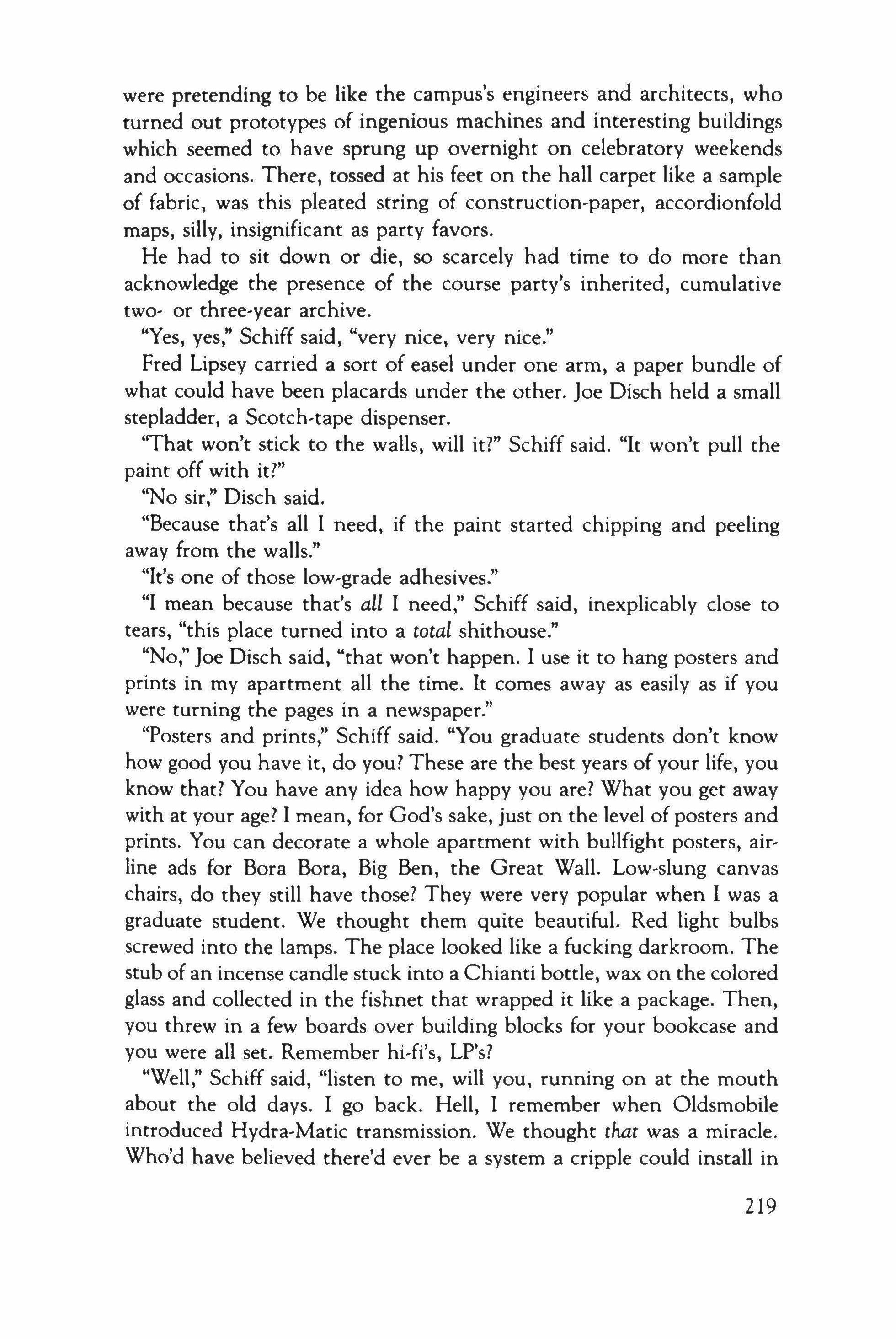
were pretending to be like the campus's engineers and architects, who turned out prototypes of ingenious machines and interesting buildings which seemed to have sprung up overnight on celebratory weekends and occasions. There, tossed at his feet on the hall carpet like a sample of fabric, was this pleated string of construction-paper, accordionfold maps, silly, insignificant as party favors.
He had to sit down or die, so scarcely had time to do more than acknowledge the presence of the course party's inherited, cumulative two- or three-year archive.
"Yes, yes," Schiff said, "very nice, very nice."
Fred Lipsey carried a sort of easel under one arm, a paper bundle of what could have been placards under the other. Joe Disch held a small stepladder, a Scotch-tape dispenser.
"That won't stick to the walls, will it?" Schiff said. "It won't pull the paint off with it?"
"No sir," Disch said.
"Because that's all I need, if the paint started chipping and peeling away from the walls."
"It's one of those low-grade adhesives."
"I mean because that's all I need," Schiff said, inexplicably close to tears, "this place turned into a total shithouse,"
"No," Joe Disch said, "that won't happen. I use it to hang posters and prints in my apartment all the time. It comes away as easily as if you were turning the pages in a newspaper."
"Posters and prints," Schiff said. "You graduate students don't know how good you have it, do you? These are the best years of your life, you know that? You have any idea how happy you are? What you get away with at your age? I mean, for God's sake, just on the level of posters and prints. You can decorate a whole apartment with bullfight posters, airline ads for Bora Bora, Big Ben, the Great Wall. Low-slung canvas chairs, do they still have those? They were very popular when I was a graduate student. We thought them quite beautiful. Red light bulbs screwed into the lamps. The place looked like a fucking darkroom. The stub of an incense candle stuck into a Chianti bottle, wax on the colored glass and collected in the fishnet that wrapped it like a package. Then, you threw in a few boards over building blocks for your bookcase and you were all set. Remember hi-fi's, LP's?
"Well," Schiff said, "listen to me, will you, running on at the mouth about the old days. I go back. Hell, I remember when Oldsmobile introduced Hydra-Matic transmission. We thought that was a miracle. Who'd have believed there'd ever be a system a cripple could install in
219
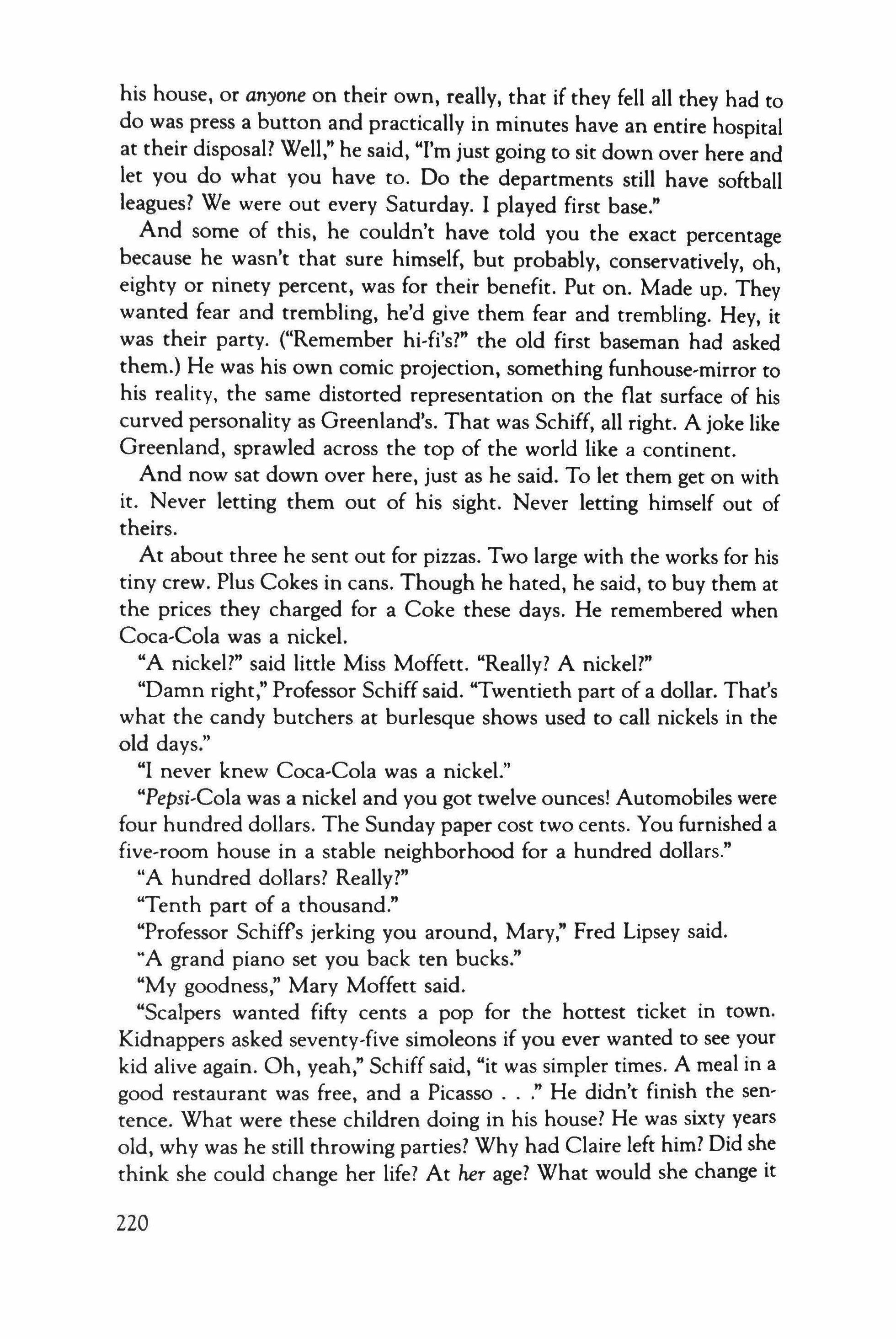
his house, or anyone on their own, really, that if they fell all they had to do was press a button and practically in minutes have an entire hospital at their disposal? Well," he said, "I'm just going to sit down over here and let you do what you have to. Do the departments still have softball leagues? We were out every Saturday. 1 played first base."
And some of this, he couldn't have told you the exact percentage because he wasn't that sure himself, but probably, conservatively, oh, eighty or ninety percent, was for their benefit. Put on. Made up. They wanted fear and trembling, he'd give them fear and trembling. Hey, it was their party. ("Remember hi-fi'si" the old first baseman had asked them.) He was his own comic projection, something funhouse-mirror to his reality, the same distorted representation on the flat surface of his curved personality as Greenland's. That was Schiff, all right. A joke like Greenland, sprawled across the top of the world like a continent.
And now sat down over here, just as he said. To let them get on with it. Never letting them out of his sight. Never letting himself out of theirs.
At about three he sent out for pizzas. Two large with the works for his tiny crew. Plus Cokes in cans. Though he hated, he said, to buy them at the prices they charged for a Coke these days. He remembered when Coca-Cola was a nickel.
"A nickel?" said little Miss Moffett. "Really? A nickel?"
"Damn right," Professor Schiff said. "Twentieth part of a dollar. That's what the candy butchers at burlesque shows used to call nickels in the old days."
"I never knew Coca-Cola was a nickel."
"Pepsi-Cola was a nickel and you got twelve ounces! Automobiles were four hundred dollars. The Sunday paper cost two cents. You furnished a five-room house in a stable neighborhood for a hundred dollars."
"A hundred dollars? Really?"
"Tenth part of a thousand."
"Professor Schiff's jerking you around, Mary," Fred Lipsey said.
"A grand piano set you back ten bucks."
"My goodness," Mary Moffett said.
"Scalpers wanted fifty cents a pop for the hottest ticket in town. Kidnappers asked seventy-five simoleons if you ever wanted to see your kid alive again. Oh, yeah," Schiff said, "it was simpler times. A meal in a good restaurant was free, and a Picasso ." He didn't finish the sentence. What were these children doing in his house? He was sixty years old, why was he still throwing parties? Why had Claire left him? Did she think she could change her life? At her age? What would she change it
220
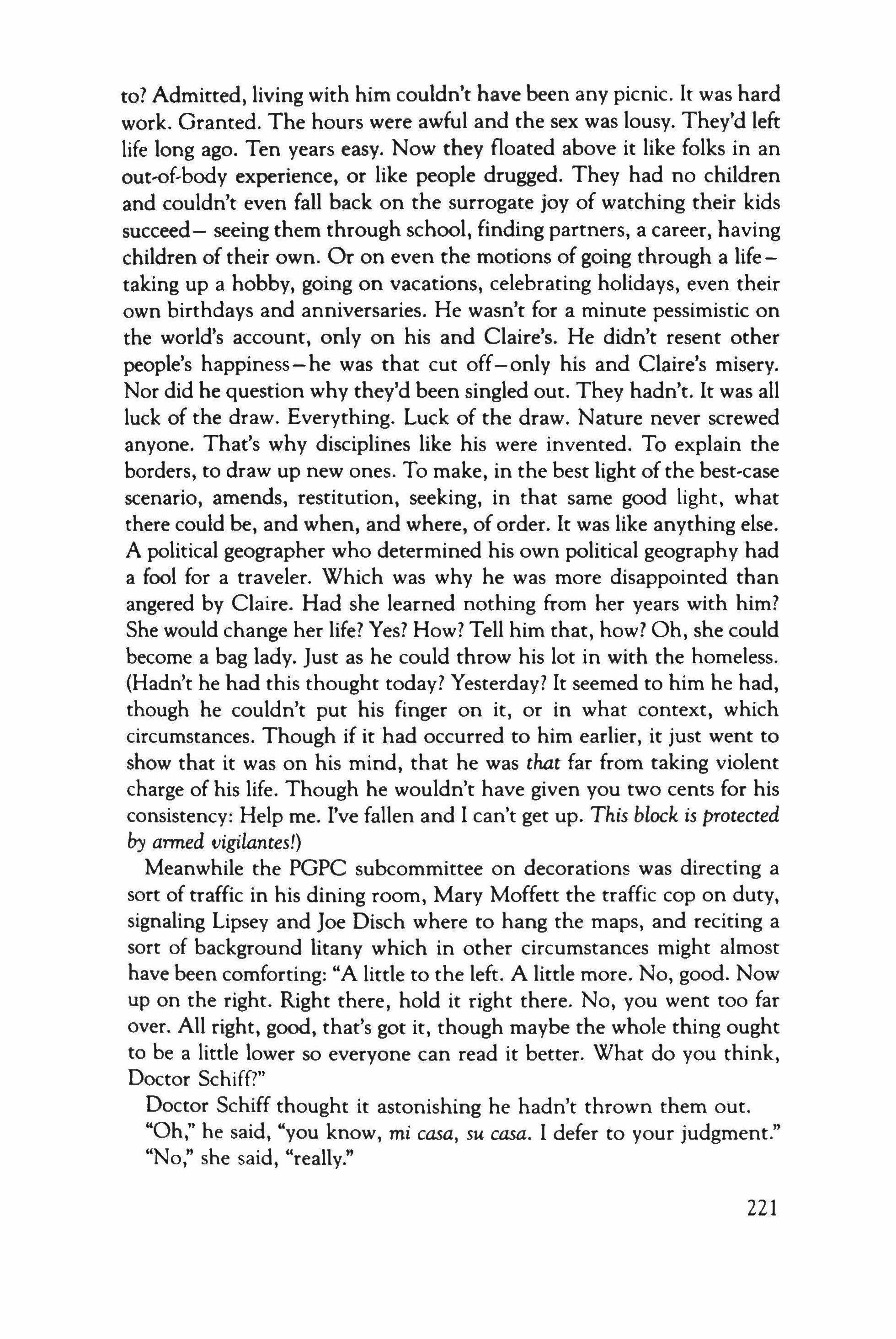
to? Admitted, living with him couldn't have been any picnic. It was hard work. Granted. The hours were awful and the sex was lousy. They'd left life long ago. Ten years easy. Now they floated above it like folks in an out-of-body experience, or like people drugged. They had no children and couldn't even fall back on the surrogate joy of watching their kids succeed- seeing them through school, finding partners, a career, having children of their own. Or on even the motions of going through a lifetaking up a hobby, going on vacations, celebrating holidays, even their own birthdays and anniversaries. He wasn't for a minute pessimistic on the world's account, only on his and Claire's. He didn't resent other people's happiness-he was that cut off-only his and Claire's misery. Nor did he question why they'd been singled out. They hadn't. It was all luck of the draw. Everything. Luck of the draw. Nature never screwed anyone. That's why disciplines like his were invented. To explain the borders, to draw up new ones. To make, in the best light of the best-case scenario, amends, restitution, seeking, in that same good light, what there could be, and when, and where, of order. It was like anything else. A political geographer who determined his own political geography had a fool for a traveler. Which was why he was more disappointed than angered by Claire. Had she learned nothing from her years with him? She would change her life? Yes? How? Tell him that, how? Oh, she could become a bag lady. Just as he could throw his lot in with the homeless. (Hadn't he had this thought today? Yesterday? It seemed to him he had, though he couldn't put his finger on it, or in what context, which circumstances. Though if it had occurred to him earlier, it just went to show that it was on his mind, that he was that far from taking violent charge of his life. Though he wouldn't have given you two cents for his consistency: Help me. I've fallen and I can't get up. This block is protected by armed vigilantes!)
Meanwhile the PGPC subcommittee on decorations was directing a sort of traffic in his dining room, Mary Moffett the traffic cop on duty, signaling Lipsey and Joe Disch where to hang the maps, and reciting a sort of background litany which in other circumstances might almost have been comforting: "A little to the left. A little more. No, good. Now up on the right. Right there, hold it right there. No, you went too far over. All right, good, that's got it, though maybe the whole thing ought to be a little lower so everyone can read it better. What do you think, Doctor Schiff?"
Doctor Schiff thought it astonishing he hadn't thrown them out. "Oh," he said, "you know, mi casa, su casa. I defer to your judgment." "No," she said, "really."
221
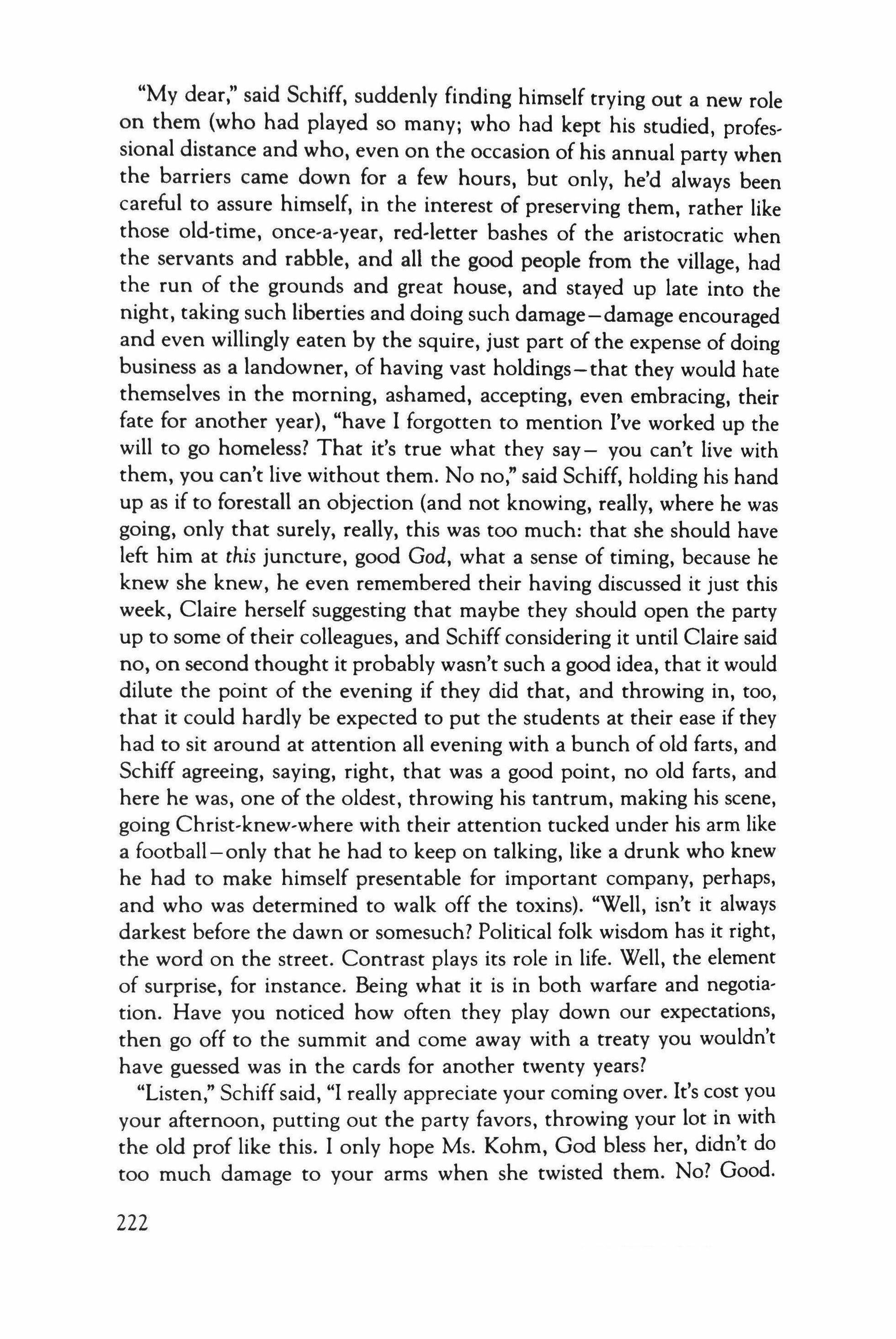
"My dear," said Schiff, suddenly finding himself trying out a new role on them (who had played so many; who had kept his studied, professional distance and who, even on the occasion of his annual party when the barriers came down for a few hours, but only, he'd always been careful to assure himself, in the interest of preserving them, rather like those old-time, once-a-year, red-letter bashes of the aristocratic when the servants and rabble, and all the good people from the village, had the run of the grounds and great house, and stayed up late into the night, taking such liberties and doing such damage-damage encouraged and even willingly eaten by the squire, just part of the expense of doing business as a landowner, of having vast holdings-that they would hate themselves in the morning, ashamed, accepting, even embracing, their fate for another year), "have I forgotten to mention I've worked up the will to go homeless? That it's true what they sayyou can't live with them, you can't live without them. No no," said Schiff, holding his hand up as if to forestall an objection (and not knowing, really, where he was going, only that surely, really, this was too much: that she should have left him at this juncture, good God, what a sense of timing, because he knew she knew, he even remembered their having discussed it just this week, Claire herself suggesting that maybe they should open the party up to some of their colleagues, and Schiff considering it until Claire said no, on second thought it probably wasn't such a good idea, that it would dilute the point of the evening if they did that, and throwing in, too, that it could hardly be expected to put the students at their ease if they had to sit around at attention all evening with a bunch of old farts, and Schiff agreeing, saying, right, that was a good point, no old farts, and here he was, one of the oldest, throwing his tantrum, making his scene, going Christ-knew-where with their attention tucked under his arm like a football-only that he had to keep on talking, like a drunk who knew he had to make himself presentable for important company, perhaps, and who was determined to walk off the toxins). "Well, isn't it always darkest before the dawn or somesuch? Political folk wisdom has it right, the word on the street. Contrast plays its role in life. Well, the element of surprise, for instance. Being what it is in both warfare and negotiation. Have you noticed how often they play down our expectations, then go off to the summit and come away with a treaty you wouldn't have guessed was in the cards for another twenty years? "Listen," Schiff said, "I really appreciate your coming over. It's cost you your afternoon, putting out the party favors, throwing your lot in with the old prof like this. I only hope Ms. Kohm, God bless her, didn't do too much damage to your arms when she twisted them. No? Good.
222
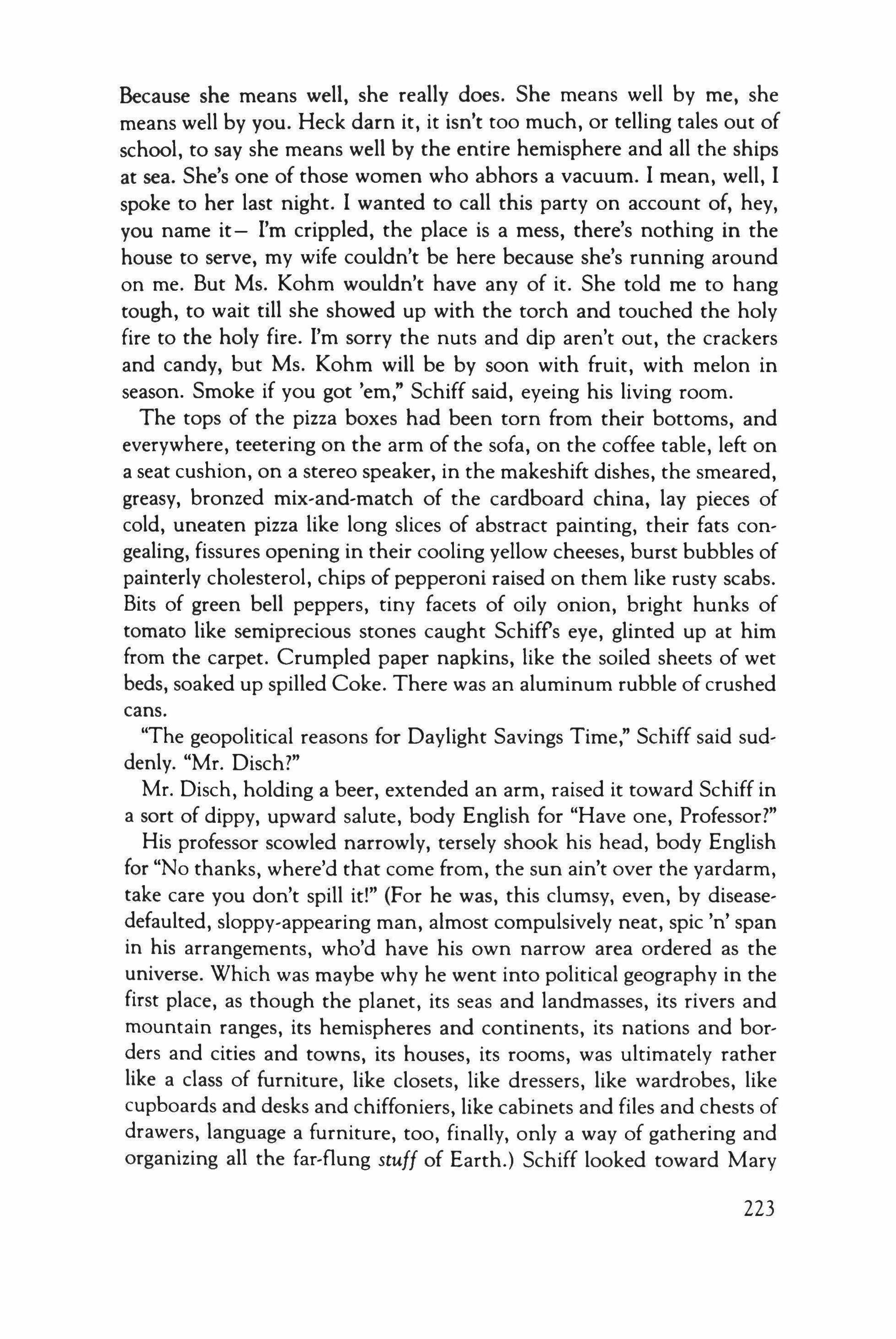
Because she means well, she really does. She means well by me, she means well by you. Heck darn it, it isn't too much, or telling tales out of school, to say she means well by the entire hemisphere and all the ships at sea. She's one of those women who abhors a vacuum. I mean, well, I spoke to her last night. I wanted to call this party on account of, hey, you name it - I'm crippled, the place is a mess, there's nothing in the house to serve, my wife couldn't be here because she's running around on me. But Ms. Kohm wouldn't have any of it. She told me to hang tough, to wait till she showed up with the torch and touched the holy fire to the holy fire. I'm sorry the nuts and dip aren't out, the crackers and candy, but Ms. Kohm will be by soon with fruit, with melon in season. Smoke if you got 'em," Schiff said, eyeing his living room.
The tops of the pizza boxes had been torn from their bottoms, and everywhere, teetering on the arm of the sofa, on the coffee table, left on a seat cushion, on a stereo speaker, in the makeshift dishes, the smeared, greasy, bronzed mix-and-match of the cardboard china, lay pieces of cold, uneaten pizza like long slices of abstract painting, their fats congealing, fissures opening in their cooling yellow cheeses, burst bubbles of painterly cholesterol, chips of pepperoni raised on them like rusty scabs. Bits of green bell peppers, tiny facets of oily onion, bright hunks of tomato like semiprecious stones caught Schiff's eye, glinted up at him from the carpet. Crumpled paper napkins, like the soiled sheets of wet beds, soaked up spilled Coke. There was an aluminum rubble of crushed cans.
"The geopolitical reasons for Daylight Savings Time," Schiff said suddenly. "Mr. Disch?"
Mr. Disch, holding a beer, extended an arm, raised it toward Schiff in a sort of dippy, upward salute, body English for "Have one, Professor?"
His professor scowled narrowly, tersely shook his head, body English for "No thanks, where'd that come from, the sun ain't over the yardarm, take care you don't spill it!" (For he was, this clumsy, even, by diseasedefaulted, sloppy-appearing man, almost compulsively neat, spic 'n' span in his arrangements, who'd have his own narrow area ordered as the universe. Which was maybe why he went into political geography in the first place, as though the planet, its seas and landmasses, its rivers and mountain ranges, its hemispheres and continents, its nations and borders and cities and towns, its houses, its rooms, was ultimately rather like a class of furniture, like closets, like dressers, like wardrobes, like cupboards and desks and chiffoniers, like cabinets and files and chests of drawers, language a furniture, too, finally, only a way of gathering and organizing all the far-flung stuff of Earth.) Schiff looked toward Mary
223
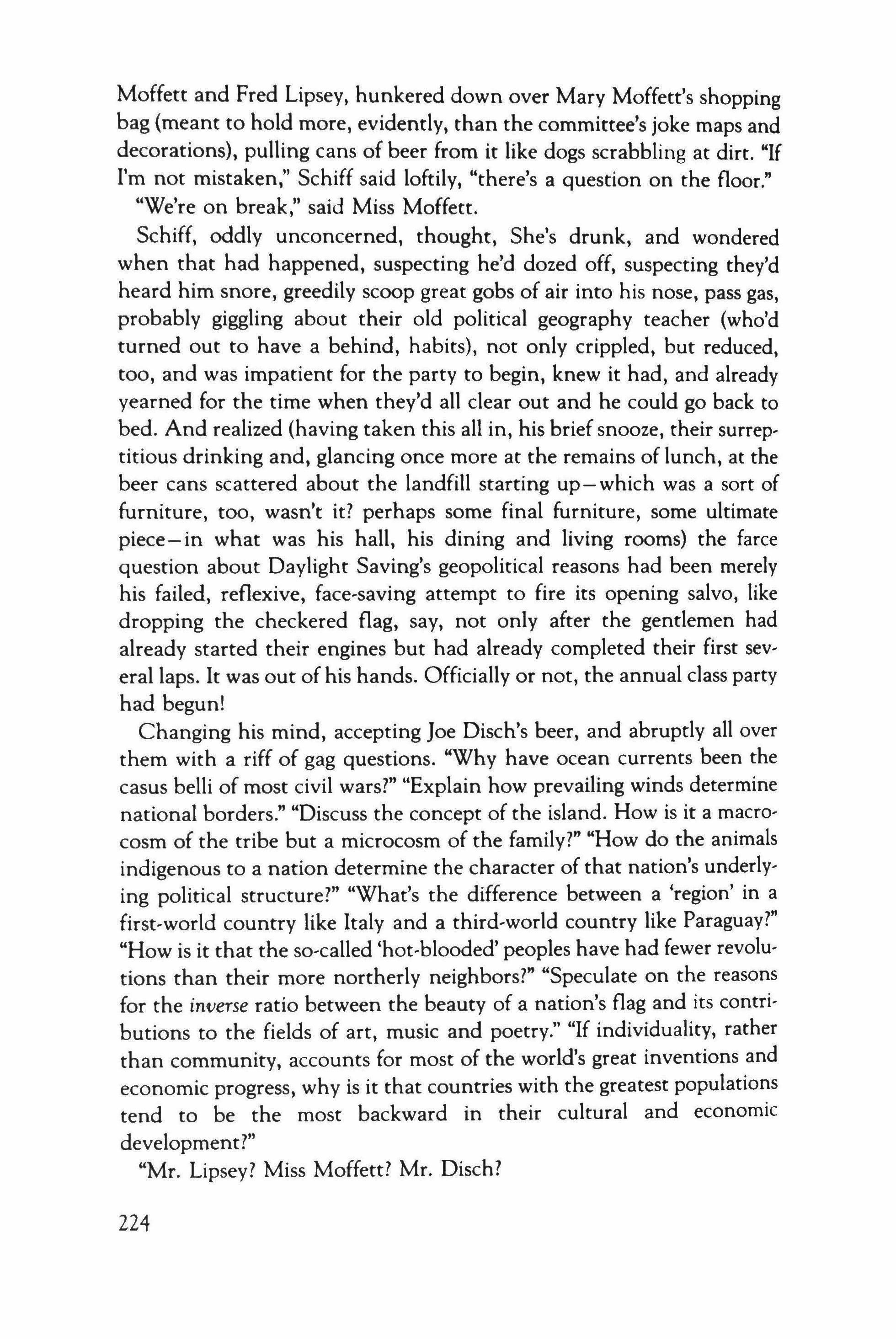
Moffett and Fred Lipsey, hunkered down over Mary Moffett's shopping bag (meant to hold more, evidently, than the committee's joke maps and decorations), pulling cans of beer from it like dogs scrabbling at dirt. "If I'm not mistaken," Schiff said loftily, "there's a question on the floor."
"We're on break," said Miss Moffett.
Schiff, oddly unconcerned, thought, She's drunk, and wondered when that had happened, suspecting he'd dozed off, suspecting they'd heard him snore, greedily scoop great gobs of air into his nose, pass gas, probably giggling about their old political geography teacher (who'd turned out to have a behind, habits), not only crippled, but reduced, too, and was impatient for the party to begin, knew it had, and already yearned for the time when they'd all clear out and he could go back to bed. And realized (having taken this all in, his brief snooze, their surreptitious drinking and, glancing once more at the remains of lunch, at the beer cans scattered about the landfill starting up - which was a sort of furniture, too, wasn't it? perhaps some final furniture, some ultimate piece-in what was his hall, his dining and living rooms) the farce question about Daylight Saving's geopolitical reasons had been merely his failed, reflexive, face-saving attempt to fire its opening salvo, like dropping the checkered flag, say, not only after the gentlemen had already started their engines but had already completed their first severallaps. It was out of his hands. Officially or not, the annual class party had begun!
Changing his mind, accepting Joe Disch's beer, and abruptly all over them with a riff of gag questions. "Why have ocean currents been the casus belli of most civil wars?" "Explain how prevailing winds determine national borders." "Discuss the concept of the island. How is it a macrocosm of the tribe but a microcosm of the family?" "How do the animals indigenous to a nation determine the character of that nation's underlying political structure?" "What's the difference between a 'region' in a first-world country like Italy and a third-world country like Paraguay?" "How is it that the so-called 'hot-blooded' peoples have had fewer revolutions than their more northerly neighbors?" "Speculate on the reasons for the inverse ratio between the beauty of a nation's flag and its contributions to the fields of art, music and poetry." "If individuality, rather than community, accounts for most of the world's great inventions and economic progress, why is it that countries with the greatest populations tend to be the most backward in their cultural and economic development?"
"Mr. Lipsey? Miss Moffett? Mr. Disch?
224
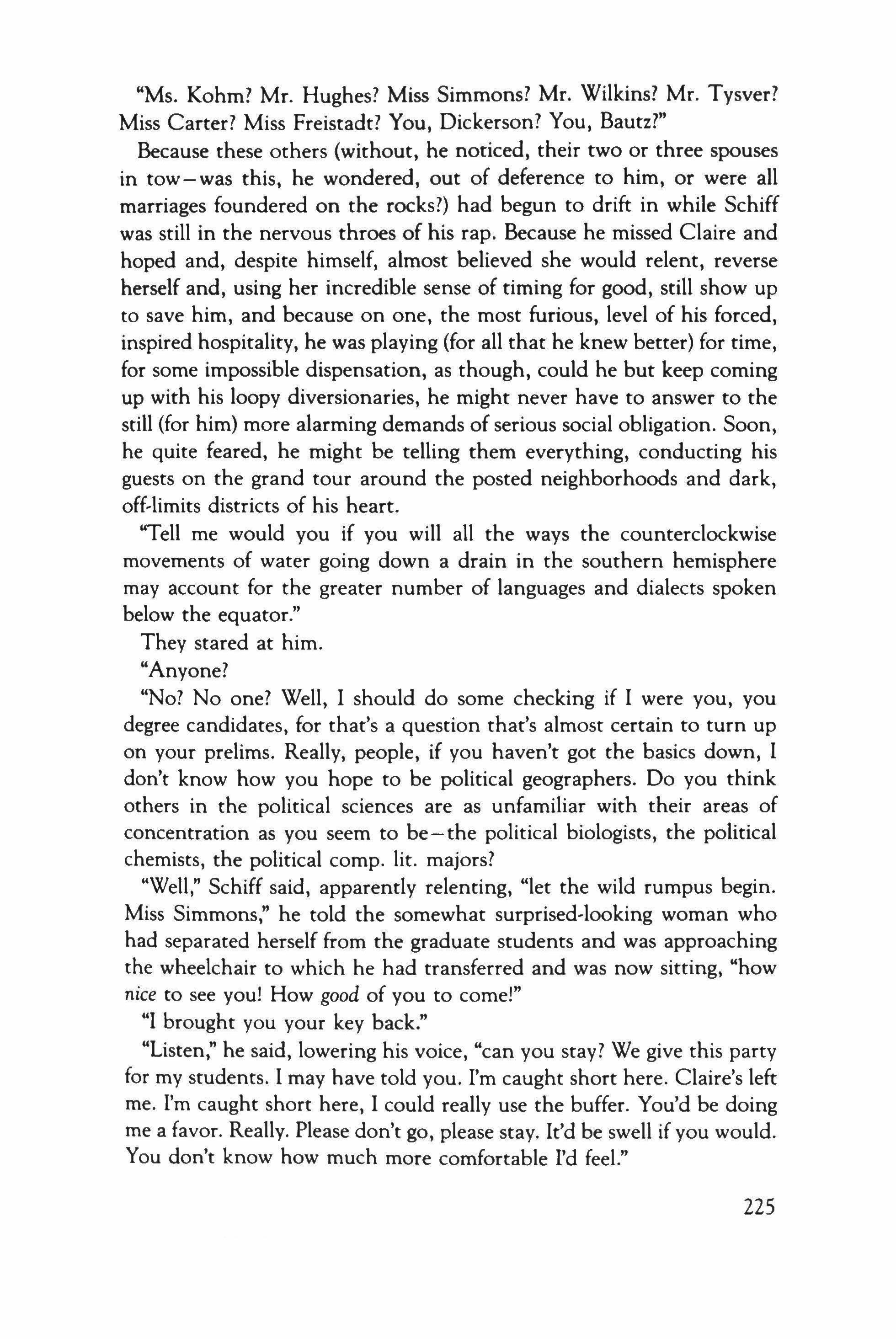
"Ms. Kohm? Mr. Hughes? Miss Simmons? Mr. Wilkins? Mr. Tysver? Miss Carter? Miss Freistadt? You, Dickerson? You, Bautz?"
Because these others (without, he noticed, their two or three spouses in tow-was this, he wondered, out of deference to him, or were all marriages foundered on the rocks?) had begun to drift in while Schiff was still in the nervous throes of his rap. Because he missed Claire and hoped and, despite himself, almost believed she would relent, reverse herself and, using her incredible sense of timing for good, still show up to save him, and because on one, the most furious, level of his forced, inspired hospitality, he was playing (for all that he knew better) for time, for some impossible dispensation, as though, could he but keep corning up with his loopy diversionaries, he might never have to answer to the still (for him) more alarming demands of serious social obligation. Soon, he quite feared, he might be telling them everything, conducting his guests on the grand tour around the posted neighborhoods and dark, off-limits districts of his heart.
"Tell me would you if you will all the ways the counterclockwise movements of water going down a drain in the southern hemisphere may account for the greater number of languages and dialects spoken below the equator."
They stared at him.
"Anyone?
"No? No one? Well, 1 should do some checking if 1 were you, you degree candidates, for that's a question that's almost certain to turn up on your prelims. Really, people, if you haven't got the basics down, 1 don't know how you hope to be political geographers. Do you think others in the political sciences are as unfamiliar with their areas of concentration as you seem to be-the political biologists, the political chemists, the political compo lit. majors?
"Well," Schiff said, apparently relenting, "let the wild rumpus begin. Miss Simmons," he told the somewhat surprised-looking woman who had separated herself from the graduate students and was approaching the wheelchair to which he had transferred and was now sitting, "how nice to see you! How good of you to come!"
"I brought you your key back."
"Listen," he said, lowering his voice, "can you stay? We give this party for my students. I may have told you. I'm caught short here. Claire's left me. I'm caught short here, 1 could really use the buffer. You'd be doing me a favor. Really. Please don't go, please stay. It'd be swell if you would. You don't know how much more comfortable I'd feel."
225
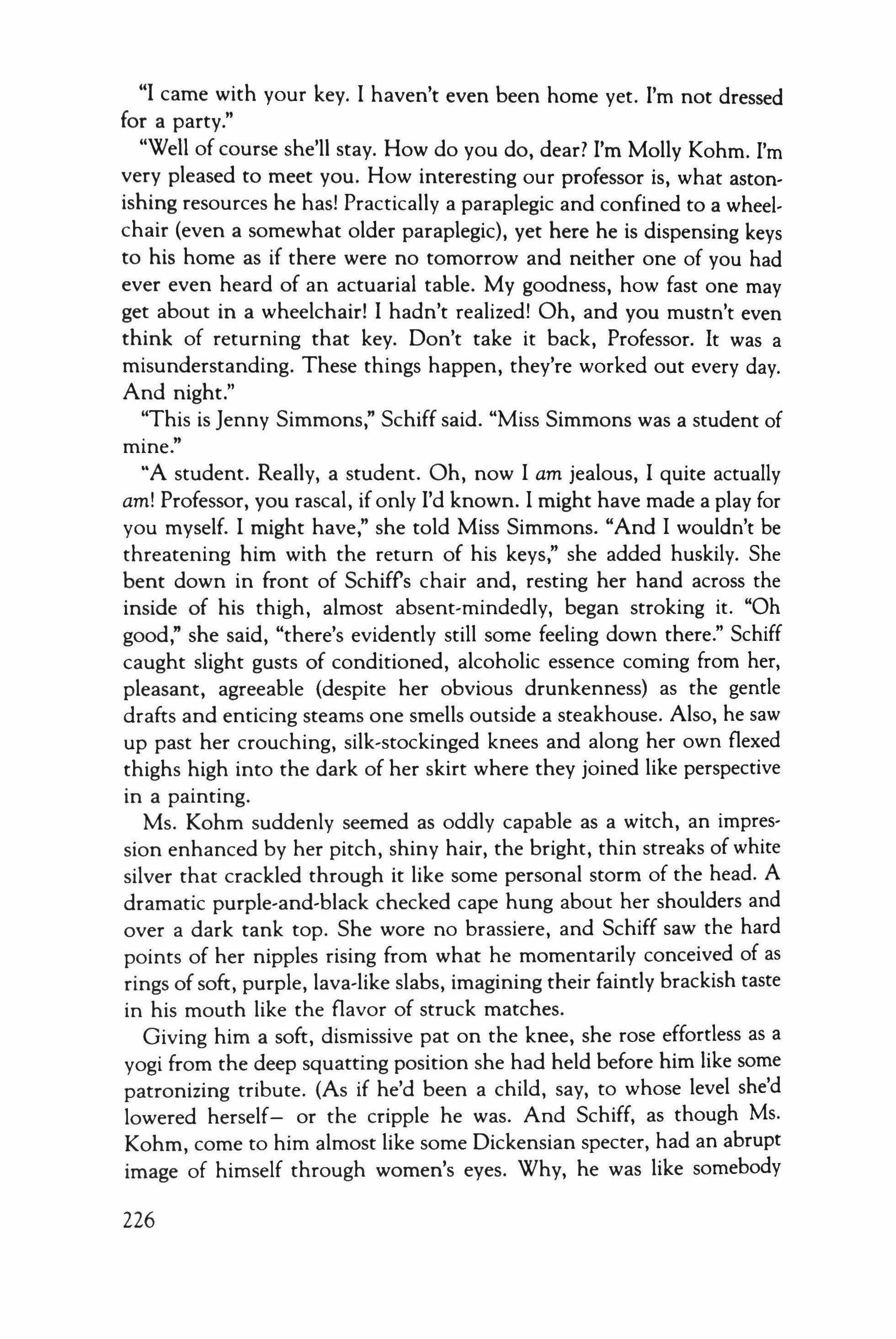
"I carne with your key. I haven't even been horne yet. I'm not dressed for a party."
"Well of course she'll stay. How do you do, dear? I'm Molly Kohm. I'm very pleased to meet you. How interesting our professor is, what astonishing resources he has! Practically a paraplegic and confined to a wheelchair (even a somewhat older paraplegic), yet here he is dispensing keys to his horne as if there were no tomorrow and neither one of you had ever even heard of an actuarial table. My goodness, how fast one may get about in a wheelchair! I hadn't realized! Oh, and you mustn't even think of returning that key. Don't take it back, Professor. It was a misunderstanding. These things happen, they're worked out every day. And night."
"This is Jenny Simmons," Schiff said. "Miss Simmons was a student of mine."
"A student. Really, a student. Oh, now I am jealous, I quite actually am! Professor, you rascal, if only I'd known. I might have made a play for you myself. I might have," she told Miss Simmons. "And I wouldn't be threatening him with the return of his keys," she added huskily. She bent down in front of Schiff's chair and, resting her hand across the inside of his thigh, almost absent-mindedly, began stroking it. "Oh good," she said, "there's evidently still some feeling down there." Schiff caught slight gusts of conditioned, alcoholic essence coming from her, pleasant, agreeable (despite her obvious drunkenness) as the gentle drafts and enticing stearns one smells outside a steakhouse. Also, he saw up past her crouching, silk-stockinged knees and along her own flexed thighs high into the dark of her skirt where they joined like perspective in a painting.
Ms. Kohm suddenly seemed as oddly capable as a witch, an impression enhanced by her pitch, shiny hair, the bright, thin streaks of white silver that crackled through it like some personal storm of the head. A dramatic purple-and-black checked cape hung about her shoulders and over a dark tank top. She wore no brassiere, and Schiff saw the hard points of her nipples rising from what he momentarily conceived of as rings of soft, purple, lava-like slabs, imagining their faintly brackish taste in his mouth like the flavor of struck matches.
Giving him a soft, dismissive pat on the knee, she rose effortless as a yogi from the deep squatting position she had held before him like some patronizing tribute. (As if he'd been a child, say, to whose level she'd lowered herself-or the cripple he was. And Schiff, as though Ms. Kohm, come to him almost like some Dickensian specter, had an abrupt image of himself through women's eyes. Why, he was like somebody
226
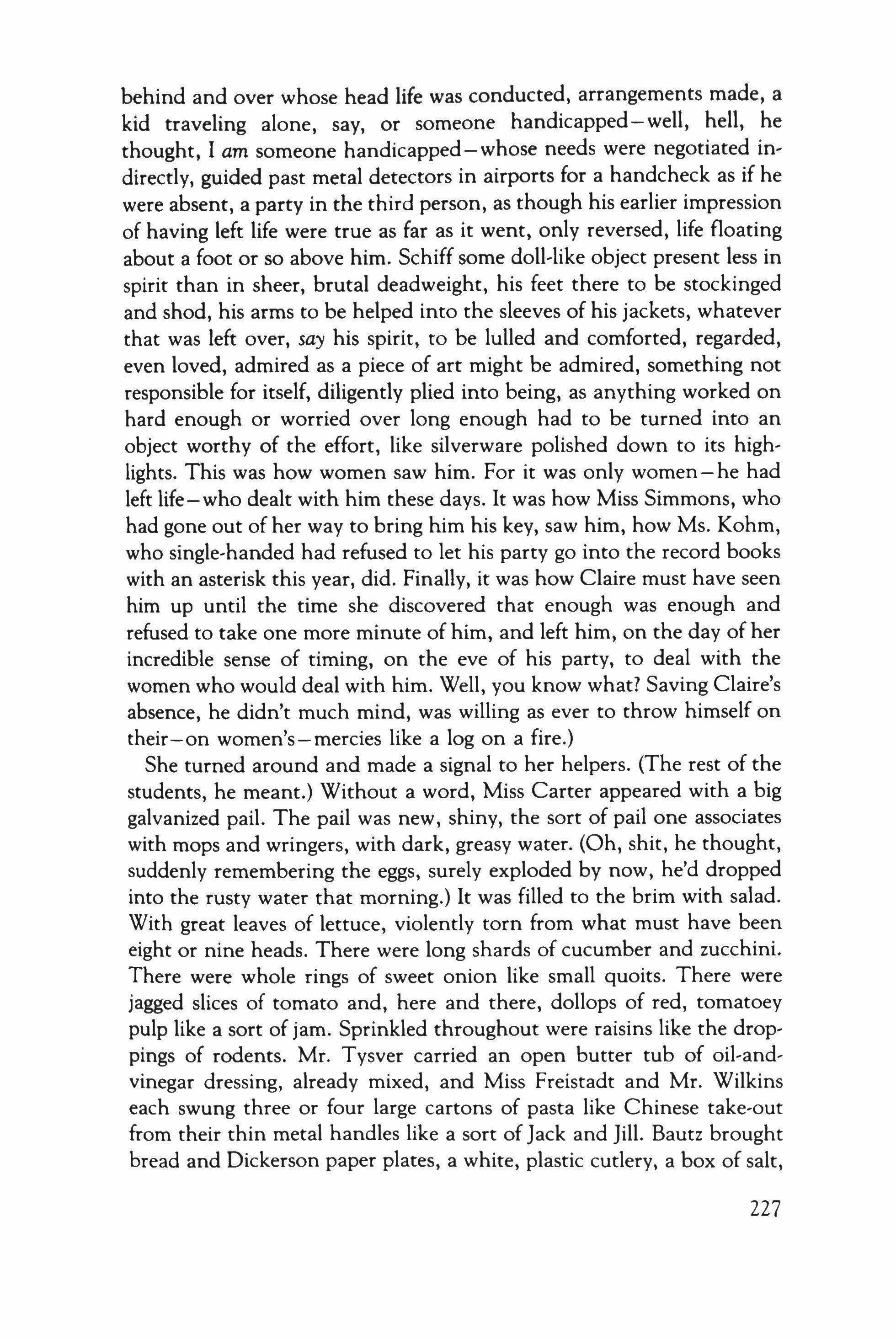
behind and over whose head life was conducted. arrangements made. a kid traveling alone. say. or someone handicapped-well. hell. he thought. I am someone handicapped-whose needs were negotiated indirectly. guided past metal detectors in airports for a handcheck as if he were absent. a party in the third person. as though his earlier impression of having left life were true as far as it went. only reversed. life floating about a foot or so above him. Schiff some doll-like object present less in spirit than in sheer. brutal deadweight. his feet there to be stockinged and shod. his arms to be helped into the sleeves of his jackets, whatever that was left over, say his spirit, to be lulled and comforted, regarded, even loved, admired as a piece of art might be admired, something not responsible for itself, diligently plied into being, as anything worked on hard enough or worried over long enough had to be turned into an object worthy of the effort, like silverware polished down to its highlights. This was how women saw him. For it was only women - he had left life-who dealt with him these days. It was how Miss Simmons, who had gone out of her way to bring him his key, saw him, how Ms. Kohm, who single-handed had refused to let his party go into the record books with an asterisk this year, did. Finally, it was how Claire must have seen him up until the time she discovered that enough was enough and refused to take one more minute of him, and left him, on the day of her incredible sense of timing, on the eve of his party, to deal with the women who would deal with him. Well, you know what? Saving Claire's absence, he didn't much mind, was willing as ever to throw himself on their-on women's-mercies like a log on a fire.)
She turned around and made a signal to her helpers. (The rest of the students, he meant.) Without a word, Miss Carter appeared with a big galvanized pail. The pail was new, shiny, the sort of pail one associates with mops and wringers, with dark, greasy water. (Oh, shit, he thought, suddenly remembering the eggs, surely exploded by now, he'd dropped into the rusty water that morning.) It was filled to the brim with salad. With great leaves of lettuce, violently torn from what must have been eight or nine heads. There were long shards of cucumber and zucchini. There were whole rings of sweet onion like small quoits. There were jagged slices of tomato and, here and there, dollops of red, tomatoey pulp like a sort of jam. Sprinkled throughout were raisins like the droppings of rodents. Mr. Tysver carried an open butter tub of oil-andvinegar dressing, already mixed, and Miss Freistadt and Mr. Wilkins each swung three or four large cartons of pasta like Chinese take-out from their thin metal handles like a sort ofJack and Jill. Bautz brought bread and Dickerson paper plates, a white, plastic cutlery, a box of salt,
227
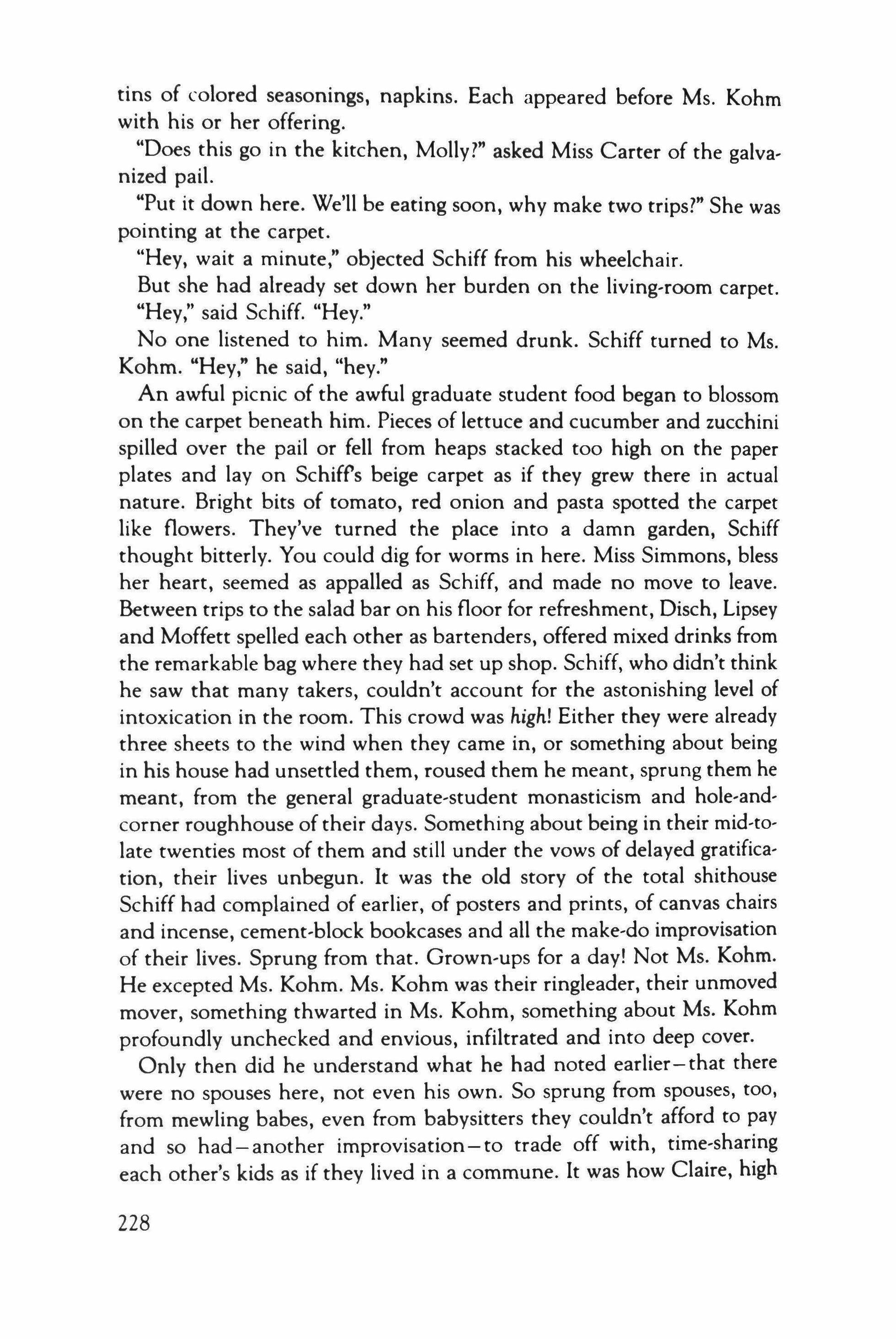
tins of colored seasonings, napkins. Each appeared before Ms. Kohm with his or her offering.
"Does this go in the kitchen, Molly?" asked Miss Carter of the galvanized pail.
"Put it down here. We'll be eating soon, why make two trips?" She was pointing at the carpet.
"Hey, wait a minute," objected Schiff from his wheelchair.
But she had already set down her burden on the living-room carpet. "Hey," said Schiff. "Hey."
No one listened to him. Many seemed drunk. Schiff turned to Ms. Kohm. "Hey," he said, "hey."
An awful picnic of the awful graduate student food began to blossom on the carpet beneath him. Pieces of lettuce and cucumber and zucchini spilled over the pail or fell from heaps stacked too high on the paper plates and lay on Schiff's beige carpet as if they grew there in actual nature. Bright bits of tomato, red onion and pasta spotted the carpet like flowers. They've turned the place into a damn garden, Schiff thought bitterly. You could dig for worms in here. Miss Simmons, bless her heart, seemed as appalled as Schiff, and made no move to leave. Between trips to the salad bar on his floor for refreshment, Disch, Lipsey and Moffett spelled each other as bartenders, offered mixed drinks from the remarkable bag where they had set up shop. Schiff, who didn't think he saw that many takers, couldn't account for the astonishing level of intoxication in the room. This crowd was high! Either they were already three sheets to the wind when they came in, or something about being in his house had unsettled them, roused them he meant, sprung them he meant, from the general graduate-student monasticism and hole-andcorner roughhouse of their days. Something about being in their mid-tolate twenties most of them and still under the vows of delayed gratification, their lives unbegun. It was the old story of the total shithouse Schiff had complained of earlier, of posters and prints, of canvas chairs and incense, cement-block bookcases and all the make-do improvisation of their lives. Sprung from that. Grown-ups for a day! Not Ms. Kohm. He excepted Ms. Kohm. Ms. Kohm was their ringleader, their unmoved mover, something thwarted in Ms. Kohm, something about Ms. Kohm profoundly unchecked and envious, infiltrated and into deep cover. Only then did he understand what he had noted earlier- that there were no spouses here, not even his own. So sprung from spouses, too, from mewling babes, even from babysitters they couldn't afford to pay and so had-another improvisation-to trade off with, time-sharing each other's kids as if they lived in a commune. It was how Claire, high
228
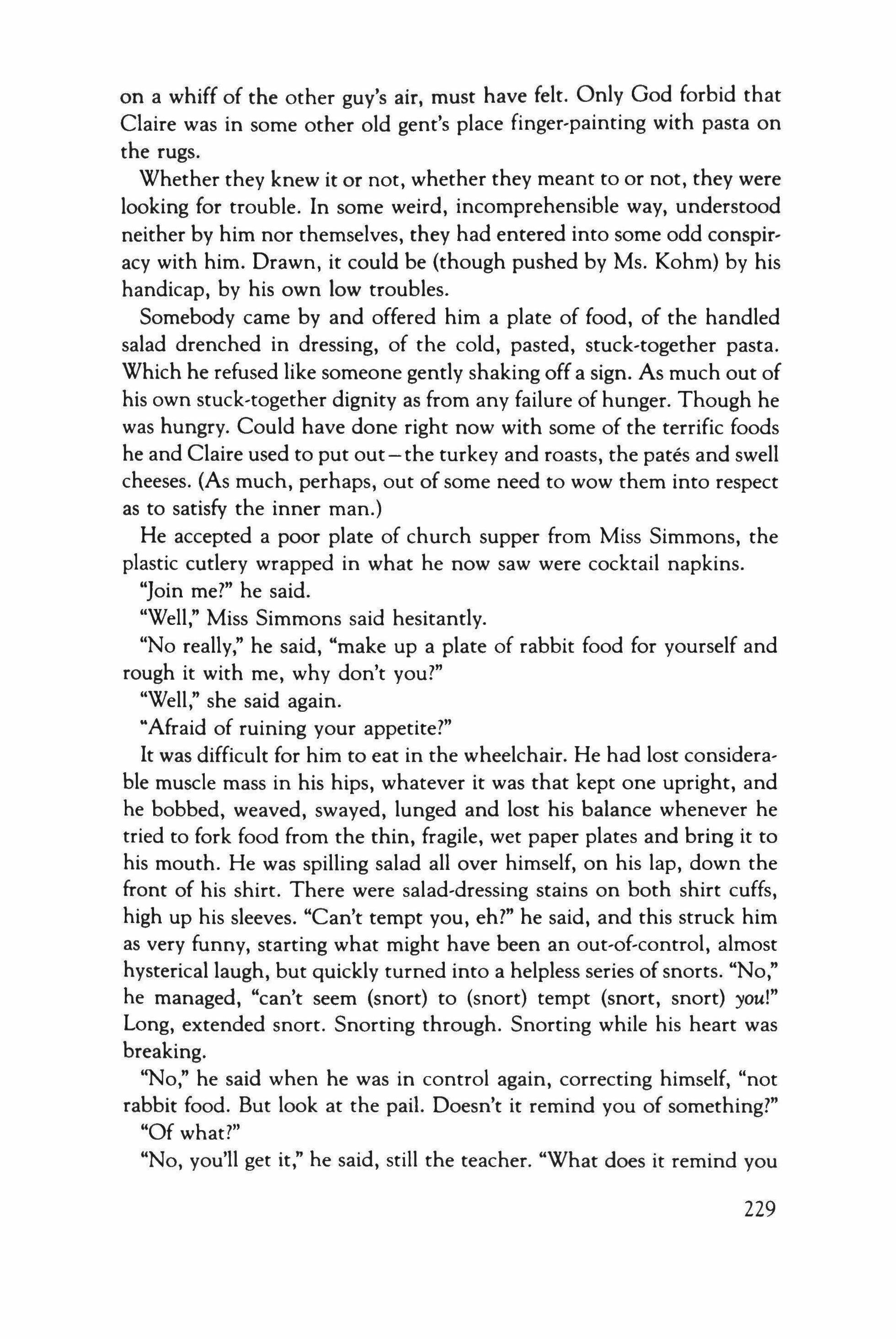
on a whiff of the other guy's air, must have felt. Only God forbid that Claire was in some other old gent's place finger-painting with pasta on the rugs.
Whether they knew it or not, whether they meant to or not, they were looking for trouble. In some weird, incomprehensible way, understood neither by him nor themselves, they had entered into some odd conspiracy with him. Drawn, it could be (though pushed by Ms. Kohm) by his handicap, by his own low troubles.
Somebody came by and offered him a plate of food, of the handled salad drenched in dressing, of the cold, pasted, stuck-together pasta. Which he refused like someone gently shaking off a sign. As much out of his own stuck-together dignity as from any failure of hunger. Though he was hungry. Could have done right now with some of the terrific foods he and Claire used to put out - the turkey and roasts, the pates and swell cheeses. (As much, perhaps, out of some need to wow them into respect as to satisfy the inner man.)
He accepted a poor plate of church supper from Miss Simmons, the plastic cutlery wrapped in what he now saw were cocktail napkins.
"Join me?" he said.
"Well," Miss Simmons said hesitantly.
"No really," he said, "make up a plate of rabbit food for yourself and rough it with me, why don't you?"
"Well," she said again.
"Afraid of ruining your appetite?"
It was difficult for him to eat in the wheelchair. He had lost considerable muscle mass in his hips, whatever it was that kept one upright, and he bobbed, weaved, swayed, lunged and lost his balance whenever he tried to fork food from the thin, fragile, wet paper plates and bring it to his mouth. He was spilling salad all over himself, on his lap, down the front of his shirt. There were salad-dressing stains on both shirt cuffs, high up his sleeves. "Can't tempt you, eh?" he said, and this struck him as very funny, starting what might have been an out-of-control, almost hysterical laugh, but quickly turned into a helpless series of snorts. "No," he managed, "can't seem (snort) to (snort) tempt (snort, snort) you!" Long, extended snort. Snorting through. Snorting while his heart was breaking.
"No," he said when he was in control again, correcting himself, "not rabbit food. But look at the pail. Doesn't it remind you of something?"
"Of what?"
"No, you'll get it," he said, still the teacher. "What does it remind you
229
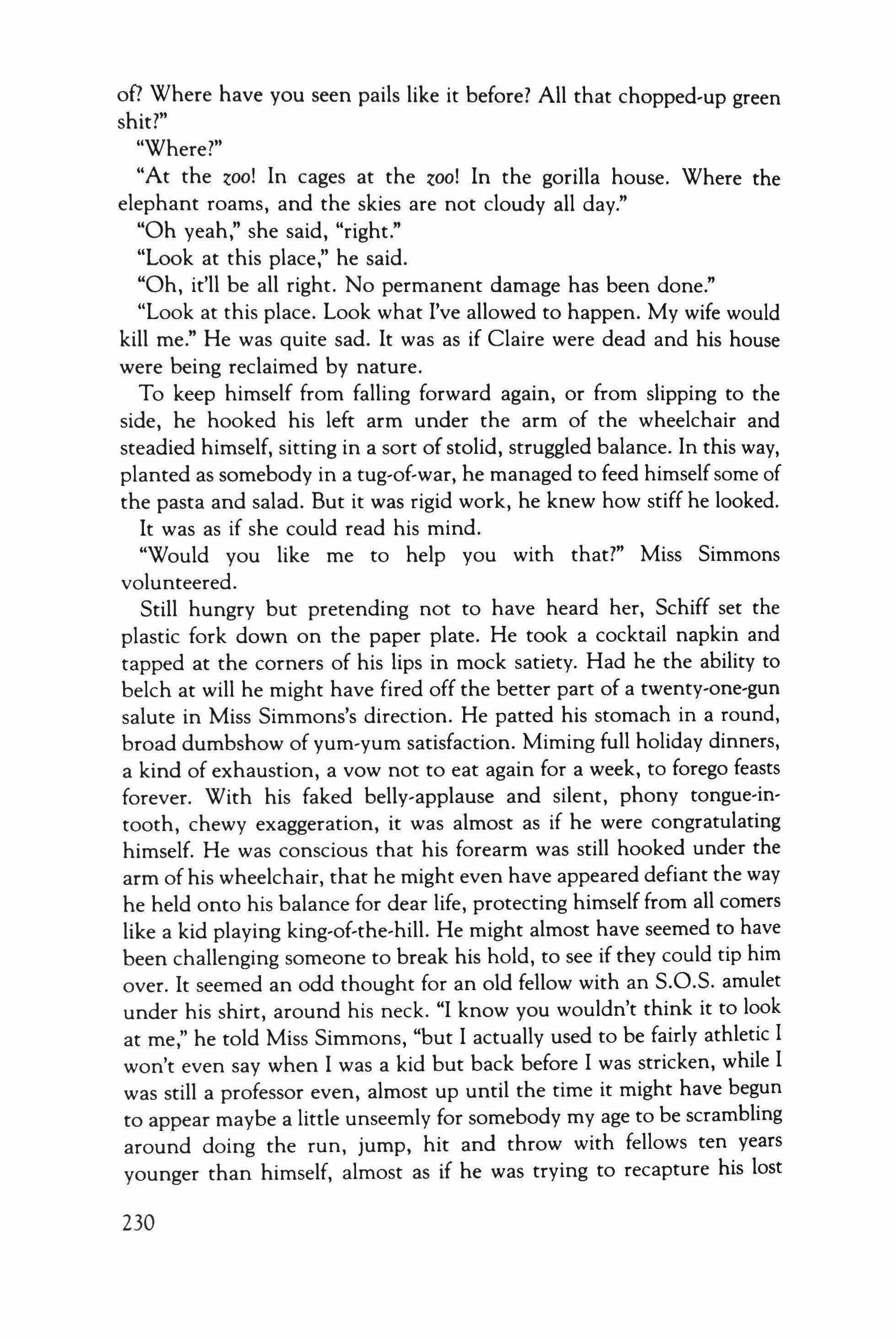
of? Where have you seen pails like it before? All that chopped-up green shit?"
"Where?"
"At the zoo! In cages at the zoo! In the gorilla house. Where the elephant roams, and the skies are not cloudy all day."
"Oh yeah," she said, "right."
"Look at this place," he said.
"Oh, it'll be all right. No permanent damage has been done."
"Look at this place. Look what I've allowed to happen. My wife would kill me." He was quite sad. It was as if Claire were dead and his house were being reclaimed by nature.
To keep himself from falling forward again, or from slipping to the side, he hooked his left arm under the arm of the wheelchair and steadied himself, sitting in a sort of stolid, struggled balance. In this way, planted as somebody in a tug-of-war, he managed to feed himself some of the pasta and salad. But it was rigid work, he knew how stiff he looked.
It was as if she could read his mind.
"Would you like me to help you with that?" Miss Simmons volunteered.
Still hungry but pretending not to have heard her, Schiff set the plastic fork down on the paper plate. He took a cocktail napkin and tapped at the corners of his lips in mock satiety. Had he the ability to belch at will he might have fired off the better part of a twenty-one-gun salute in Miss Simmons's direction. He patted his stomach in a round, broad dumbshow of vum-yum satisfaction. Miming full holiday dinners, a kind of exhaustion, a vow not to eat again for a week, to forego feasts forever. With his faked belly-applause and silent, phony tongue-intooth, chewy exaggeration, it was almost as if he were congratulating himself. He was conscious that his forearm was still hooked under the arm of his wheelchair, that he might even have appeared defiant the way he held onto his balance for dear life, protecting himself from all comers like a kid playing king-of-the-hill. He might almost have seemed to have been challenging someone to break his hold, to see if they could tip him over. It seemed an odd thought for an old fellow with an S.O.S. amulet under his shirt, around his neck. "I know you wouldn't think it to look at me," he told Miss Simmons, "but I actually used to be fairly athletic I won't even say when I was a kid but back before I was stricken, while I was still a professor even, almost up until the time it might have begun to appear maybe a little unseemly for somebody my age to be scrambling around doing the run, jump, hit and throw with fellows ten years younger than himself, almost as if he was trying to recapture his lost
230
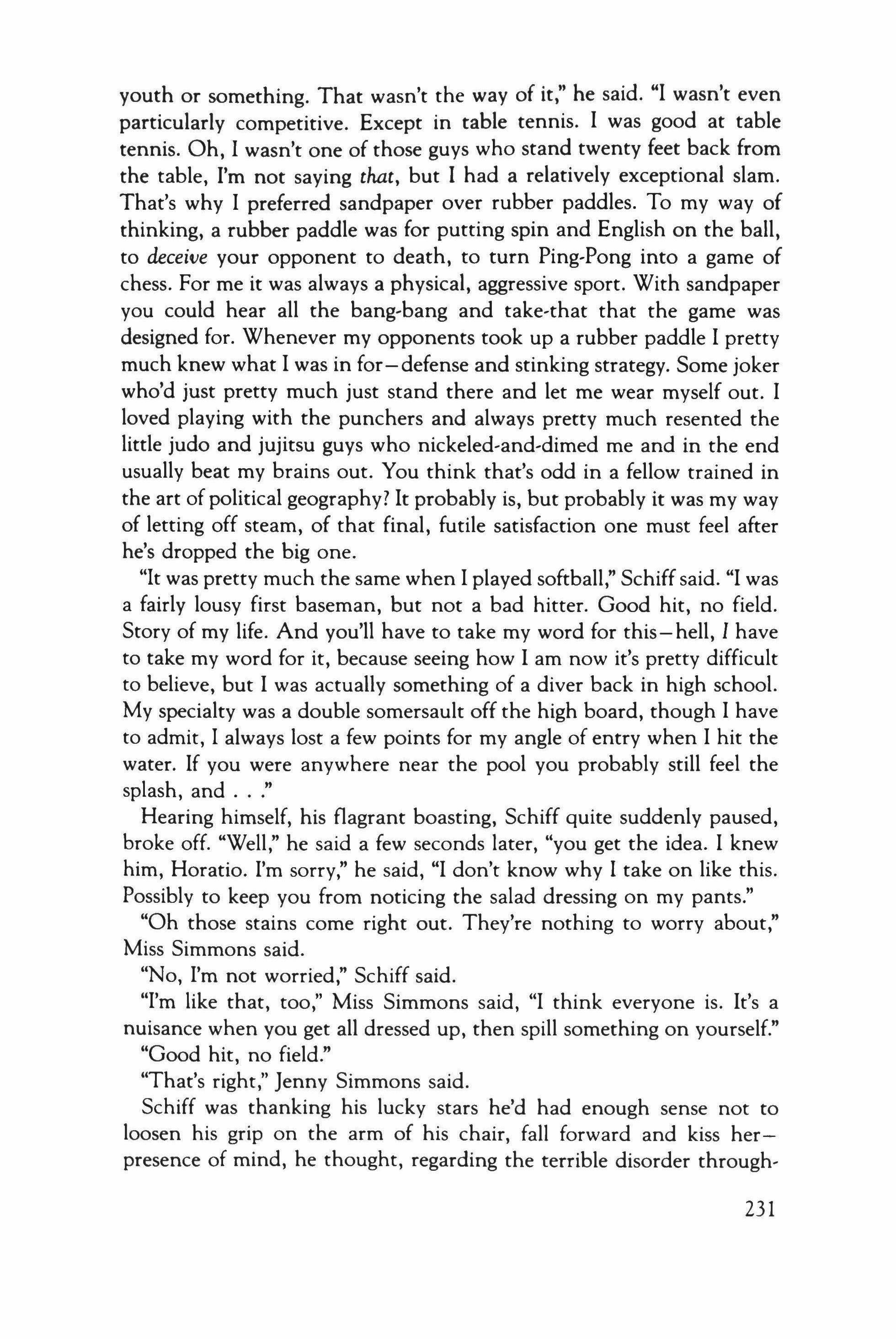
youth or something. That wasn't the way of it," he said. "I wasn't even particularly competitive. Except in table tennis. 1 was good at table tennis. Oh, 1 wasn't one of those guys who stand twenty feet back from the table, I'm not saying that, but I had a relatively exceptional slam. That's why I preferred sandpaper over rubber paddles. To my way of thinking, a rubber paddle was for putting spin and English on the ball, to deceive your opponent to death, to turn Ping-Pong into a game of chess. For me it was always a physical, aggressive sport. With sandpaper you could hear all the bang-bang and take-that that the game was designed for. Whenever my opponents took up a rubber paddle I pretty much knew what I was in for-defense and stinking strategy. Some joker who'd just pretty much just stand there and let me wear myself out. I loved playing with the punchers and always pretty much resented the little judo and jujitsu guys who nickeled-and-dimed me and in the end usually beat my brains out. You think that's odd in a fellow trained in the art of political geography? It probably is, but probably it was my way of letting off steam, of that final, futile satisfaction one must feel after he's dropped the big one.
"It was pretty much the same when I played softball," Schiff said. "I was a fairly lousy first baseman, but not a bad hitter. Good hit, no field. Story of my life. And you'll have to take my word for this-hell, I have to take my word for it, because seeing how I am now it's pretty difficult to believe, but I was actually something of a diver back in high school. My specialty was a double somersault off the high board, though I have to admit, I always lost a few points for my angle of entry when I hit the water. If you were anywhere near the pool you probably still feel the splash, and
Hearing himself, his flagrant boasting, Schiff quite suddenly paused, broke off. "Well," he said a few seconds later, "you get the idea. I knew him, Horatio. I'm sorry," he said, "I don't know why I take on like this. Possibly to keep you from noticing the salad dressing on my pants."
UOh those stains come right out. They're nothing to worry about," Miss Simmons said.
"No, I'm not worried," Schiff said.
"I'm like that, too," Miss Simmons said, "I think everyone is. It's a nuisance when you get all dressed up, then spill something on yourself."
"Good hit, no field."
"That's right," Jenny Simmons said.
Schiff was thanking his lucky stars he'd had enough sense not to loosen his grip on the arm of his chair, fall forward and kiss herpresence of mind, he thought, regarding the terrible disorder through-
231
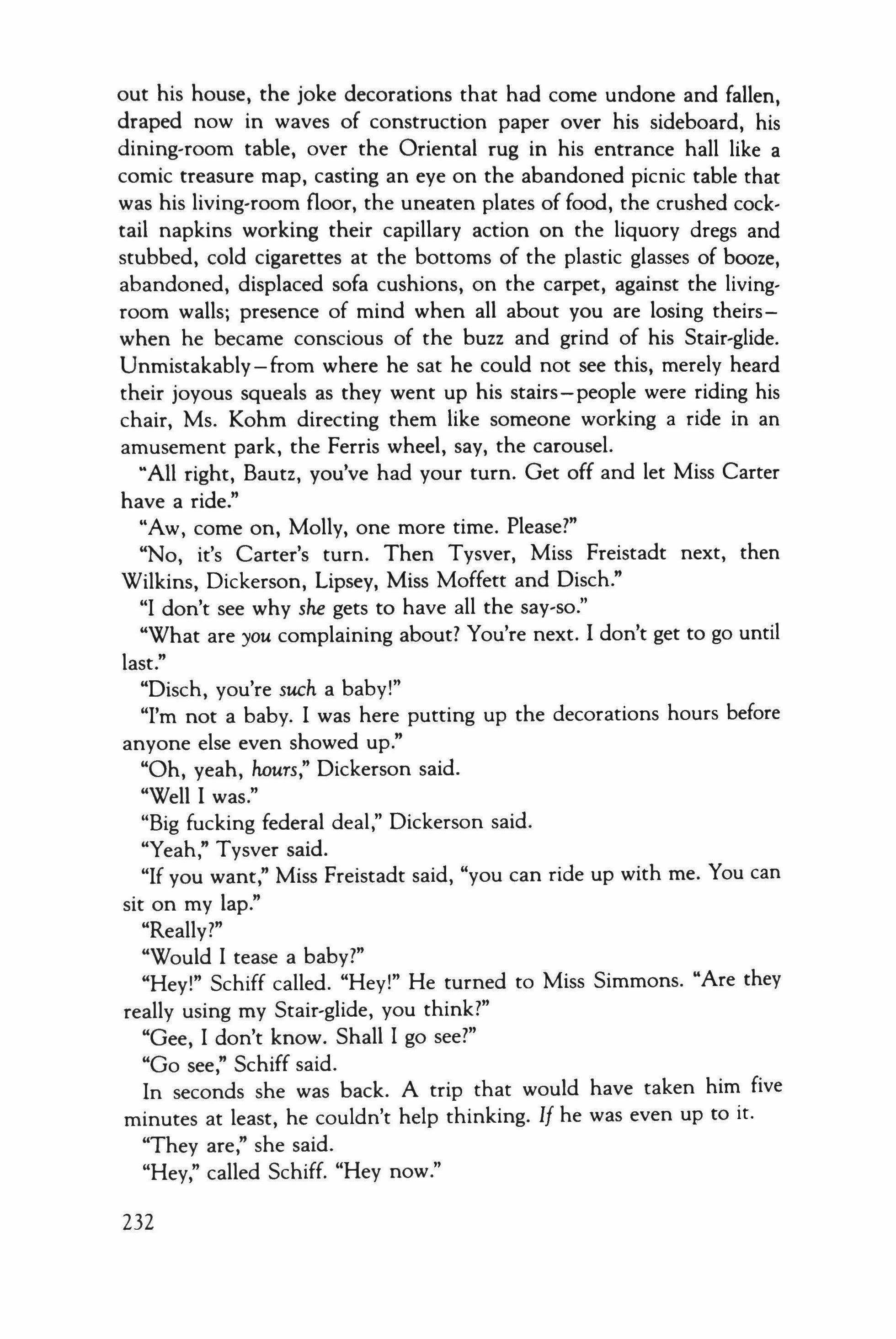
out his house, the joke decorations that had come undone and fallen, draped now in waves of construction paper over his sideboard, his dining-room table, over the Oriental rug in his entrance hall like a comic treasure map, casting an eye on the abandoned picnic table that was his living-room floor, the uneaten plates of food, the crushed cocktail napkins working their capillary action on the liquory dregs and stubbed, cold cigarettes at the bottoms of the plastic glasses of booze, abandoned, displaced sofa cushions, on the carpet, against the livingroom walls; presence of mind when all about you are losing theirswhen he became conscious of the buzz and grind of his Stair-glide. Unmistakably - from where he sat he could not see this, merely heard their joyous squeals as they went up his stairs-people were riding his chair, Ms. Kohm directing them like someone working a ride in an amusement park, the Ferris wheel, say, the carousel.
M All right, Bautz, you've had your turn. Get off and let Miss Carter have a ride."
"Aw, come on, Molly, one more time. Please?"
"No, it's Carter's turn. Then Tysver, Miss Freistadt next, then Wilkins, Dickerson, Lipsey, Miss Moffett and Disch."
"I don't see why she gets to have all the say-so."
"What are you complaining about? You're next. I don't get to go until last."
"Disch, you're such a baby!"
"I'm not a baby. I was here putting up the decorations hours before anyone else even showed up."
"Oh, yeah, hours," Dickerson said.
"Well I was."
"Big fucking federal deal," Dickerson said.
"Yeah," Tysver said.
"If you want," Miss Freistadt said, "you can ride up with me. You can sit on my lap."
"Really?"
"Would I tease a baby?"
"Hey!" Schiff called. "Hey!" He turned to Miss Simmons. "Are they really using my Stair-glide, you think?"
"Gee, I don't know. Shall I go see?"
"Go see," Schiff said.
In seconds she was back. A trip that would have taken him five minutes at least, he couldn't help thinking. If he was even up to it.
"They are," she said.
"Hey," called Schiff. "Hey now."
232
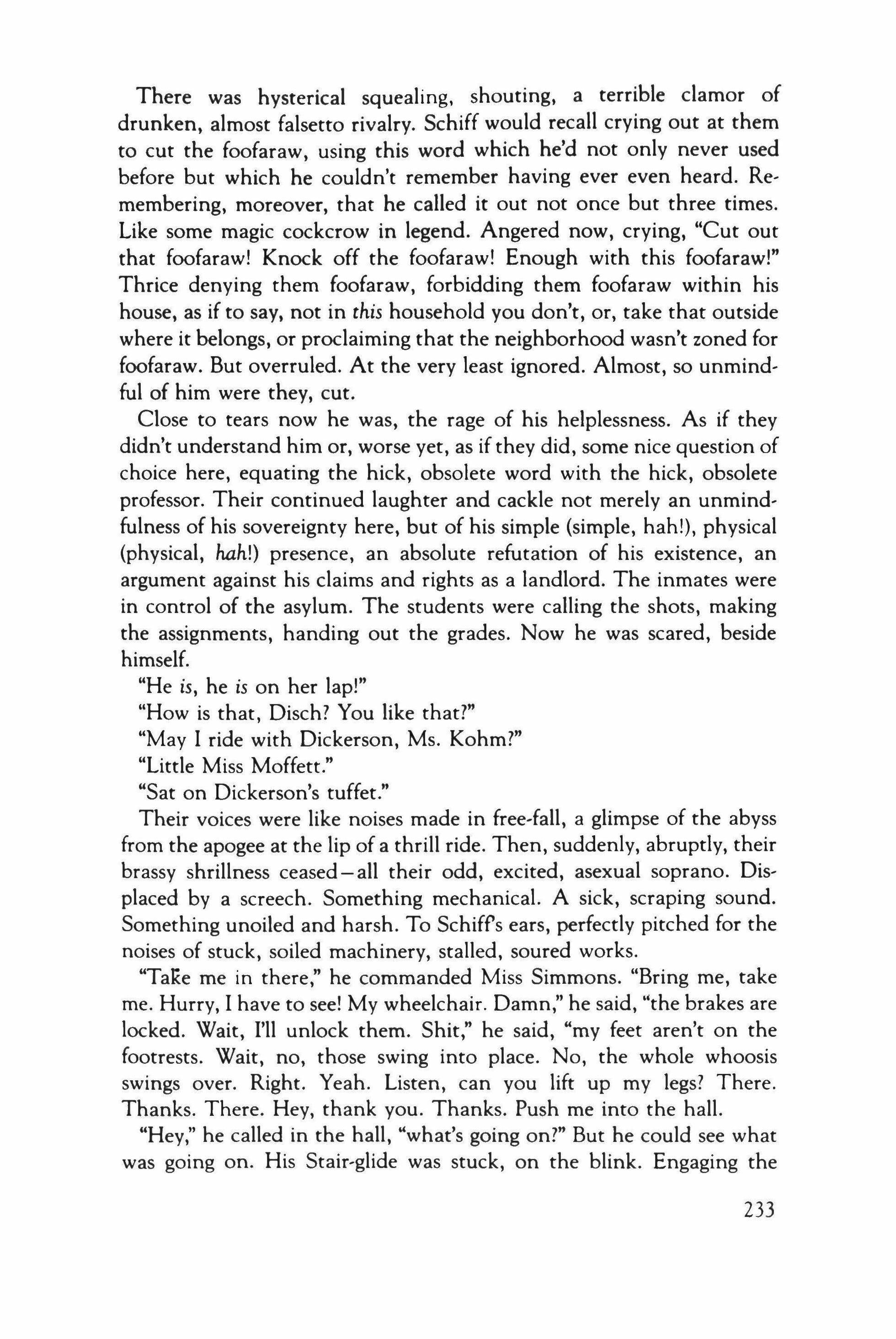
There was hysterical squealing, shouting, a terrible clamor of drunken, almost falsetto rivalry. Schiff would recall crying out at them to cut the foofaraw, using this word which he'd not only never used before but which he couldn't remember having ever even heard. Remembering, moreover, that he called it out not once but three times. Like some magic cockcrow in legend. Angered now, crying, "Cut out that foofaraw! Knock off the foofaraw! Enough with this foofaraw!" Thrice denying them foofaraw, forbidding them foofaraw within his house, as if to say, not in this household you don't, or, take that outside where it belongs, or proclaiming that the neighborhood wasn't zoned for foofaraw. But overruled. At the very least ignored. Almost, so unmindful of him were they, cut.
Close to tears now he was, the rage of his helplessness. As if they didn't understand him or, worse yet, as if they did, some nice question of choice here, equating the hick, obsolete word with the hick, obsolete professor. Their continued laughter and cackle not merely an unmindfulness of his sovereignty here, but of his simple (simple, hah!), physical (physical, hah!) presence, an absolute refutation of his existence, an argument against his claims and rights as a landlord. The inmates were in control of the asylum. The students were calling the shots, making the assignments, handing out the grades. Now he was scared, beside himself.
"He is, he is on her lap!"
"How is that, Disch? You like that?"
"May I ride with Dickerson, Ms. Kohm?"
"Little Miss Moffett."
"Sat on Dickerson's tuffet."
Their voices were like noises made in free-fall, a glimpse of the abyss from the apogee at the lip of a thrill ride. Then, suddenly, abruptly, their brassy shrillness ceased-all their odd, excited, asexual soprano. Displaced by a screech. Something mechanical. A sick, scraping sound. Something unoiled and harsh. To Schiff's ears, perfectly pitched for the noises of stuck, soiled machinery, stalled, soured works.
"Take me in there," he commanded Miss Simmons. "Bring me, take me. Hurry, I have to see! My wheelchair. Damn," he said, "the brakes are locked. Wait, I'll unlock them. Shit," he said, "my feet aren't on the footrests. Wait, no, those swing into place. No, the whole whoosis swings over. Right. Yeah. Listen, can you lift up my legs? There. Thanks. There. Hey, thank you. Thanks. Push me into the hall.
"Hey," he called in the hall, "what's going on?" But he could see what was going on. His Stair-glide was stuck, on the blink. Engaging the
233
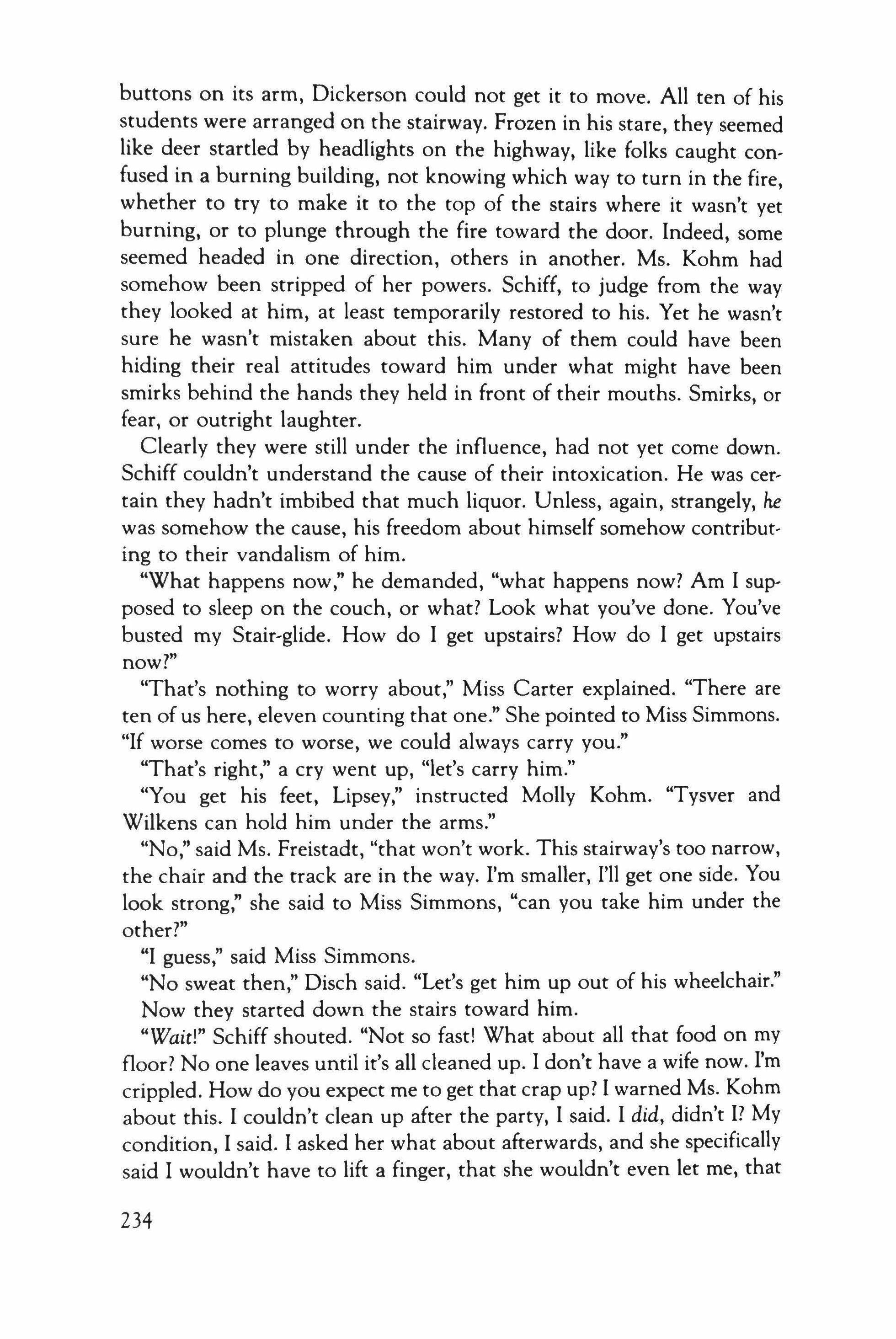
buttons on its arm, Dickerson could not get it to move. All ten of his students were arranged on the stairway. Frozen in his stare, they seemed like deer startled by headlights on the highway, like folks caught confused in a burning building, not knowing which way to turn in the fire, whether to try to make it to the top of the stairs where it wasn't yet burning, or to plunge through the fire toward the door. Indeed, some seemed headed in one direction, others in another. Ms. Kohm had somehow been stripped of her powers. Schiff, to judge from the way they looked at him, at least temporarily restored to his. Yet he wasn't sure he wasn't mistaken about this. Many of them could have been hiding their real attitudes toward him under what might have been smirks behind the hands they held in front of their mouths. Smirks, or fear, or outright laughter.
Clearly they were still under the influence, had not yet come down. Schiff couldn't understand the cause of their intoxication. He was certain they hadn't imbibed that much liquor. Unless, again, strangely, he was somehow the cause, his freedom about himself somehow contributing to their vandalism of him.
"What happens now," he demanded, "what happens now? Am I supposed to sleep on the couch, or what? Look what you've done. You've busted my Stair-glide. How do I get upstairs? How do I get upstairs now?"
"That's nothing to worry about," Miss Carter explained. "There are ten of us here, eleven counting that one." She pointed to Miss Simmons. "If worse comes to worse, we could always carry you."
"That's right," a cry went up, "let's carry him."
"You get his feet, Lipsey," instructed Molly Kohm. "Tysver and Wilkens can hold him under the arms."
"No," said Ms. Freistadt, "that won't work. This stairway's too narrow, the chair and the track are in the way. I'm smaller, I'll get one side. You look strong," she said to Miss Simmons, "can you take him under the other?"
"I guess," said Miss Simmons.
"No sweat then," Disch said. "Let's get him up out of his wheelchair." Now they started down the stairs toward him.
"Wait!" Schiff shouted. "Not so fast! What about all that food on my floor? No one leaves until it's all cleaned up. I don't have a wife now. I'm crippled. How do you expect me to get that crap up? I warned Ms. Kohm about this. I couldn't clean up after the party, I said. I did, didn't I? My condition, I said. I asked her what about afterwards, and she specifically said I wouldn't have to lift a finger, that she wouldn't even let me, that
234

you'd empty the ashtrays, that you'd vacuum the rugs. It wasn't even a committee thing, she said, you'd all straighten up, everyone would pitch in, do their fair share. You promised, Ms. Kohm.
"Well, what about it, Ms. Kohm? Those ashtrays are full. Most places these days, they don't even let you smoke. It wasn't all that long ago the only place they might not permit you to light up was the main branch of the public library. You could puff away everywhere-health-food stores, City Hall, any part of the cabin after the No Smoking sign was turned off. Even in your doctor's waiting room, for Christ's sake! Not now, not today. Most places are off-limits. Entire cities, complete countries. I gave you the whole house, and what do I see? Ashtrays spilling over!
"And as far as the carpet's concerned, incidentally, it would be swell if you vacuumed, but let's get real here. I'd be satisfied if you picked most of the salad up off the floor, the onions and cucumbers, the zucchini, the loose lettuce and tomatoes. If you got up some of the raisins. There's a broom in the closet off to the kitchen should God or good conscience lead you to see the light."
But they weren't listening. They seemed to be bickering, arguing amongst themselves on the stairway. Their voices were raised, some were actually shouting. Indeed, it seemed to Schiff to be the end of the PGPC as we know it. He was more than a little alarmed for his stairway, his rail and balusters. Ten people were on the eight steps.
"It's not an entrance to a museum," he explained to Miss Simmons. ''It's only a fairly modest home in a nice, middle-class neighborhood. It's not the summer palace, that ain't the grand staircase."
"They'll calm down," Miss Simmons said.
"Is that banister swaying, you think?"
But they had calmed down, their argument, if that's what it was, now declined to a simple discussion. Schiff, his own rage building, could even make out what some of them were saying. Moffett, Dickerson, Carter and Tysver knew of other parties that might still be going on. Wilkins and Bautz wanted to go dancing. It was six of one, half a dozen of the other to Disch and Freistadt, to Kohm and Lipsey. Whatever the rest of them decided, they said.
"Oh no," Schiff exploded, "oh no you don't!"
They looked down, startled.
"Nobody move! Stay right where you are!" he ordered. They stared at him, taking in his outburst, it seemed to Schiff, with something of a mild, patronizing amusement. Oh, he thought, I tickle you, do I? Well, he thought, I may be down, but I ain't out. Who's the political geographer here, anyway? he thought. And, gathering himself
235
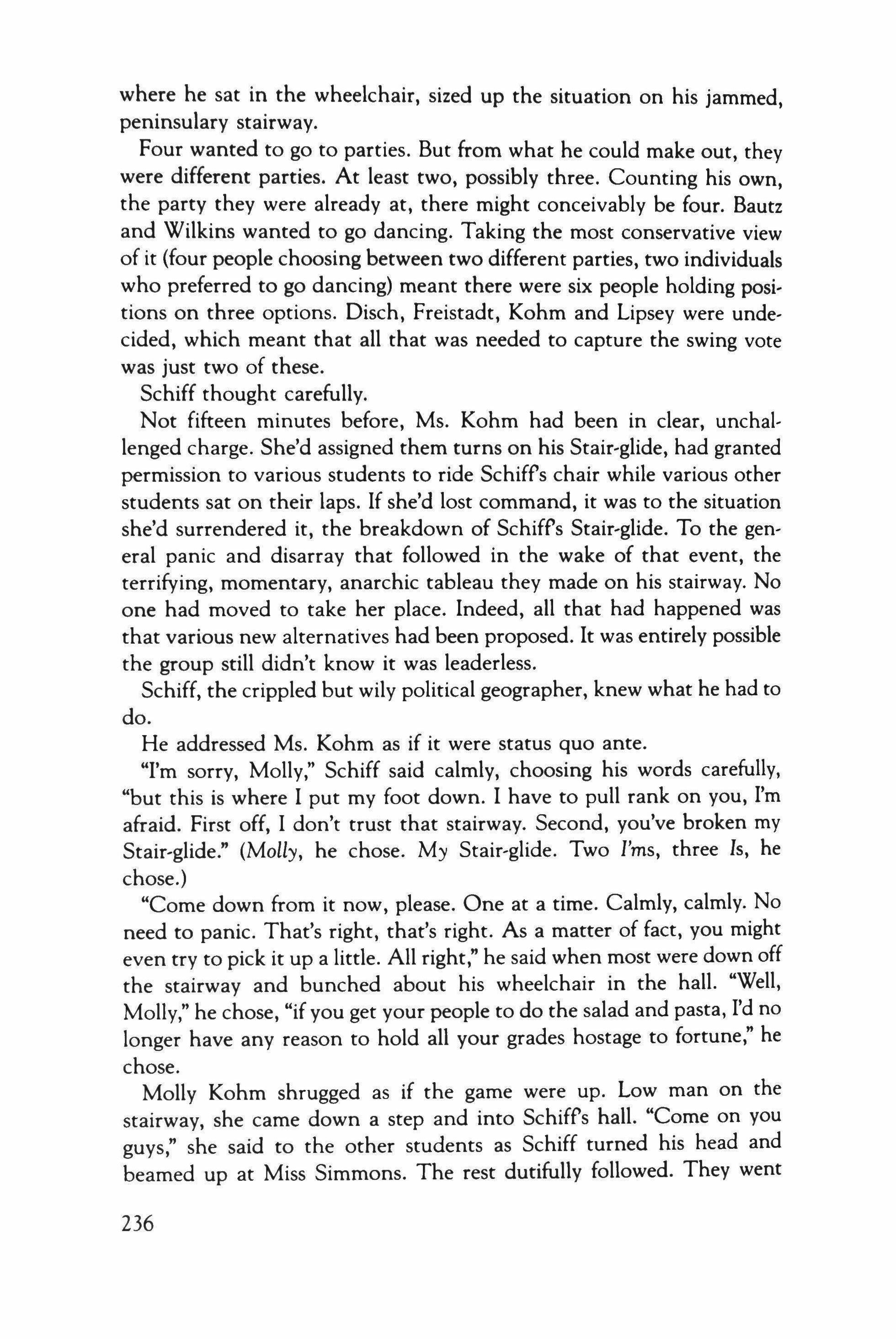
where he sat in the wheelchair, sized up the situation on his jammed, peninsulary stairway.
Four wanted to go to parties. But from what he could make out, they were different parties. At least two, possibly three. Counting his own, the party they were already at, there might conceivably be four. Bautz and Wilkins wanted to go dancing. Taking the most conservative view of it (four people choosing between two different parties, two individuals who preferred to go dancing) meant there were six people holding positions on three options. Disch, Freistadt, Kohm and Lipsey were undecided, which meant that all that was needed to capture the swing vote was just two of these.
Schiff thought carefully.
Not fifteen minutes before, Ms. Kohm had been in clear, unchallenged charge. She'd assigned them turns on his Stair-glide, had granted permission to various students to ride Schiff's chair while various other students sat on their laps. If she'd lost command, it was to the situation she'd surrendered it, the breakdown of Schiff's Stair-glide. To the general panic and disarray that followed in the wake of that event, the terrifying, momentary, anarchic tableau they made on his stairway. No one had moved to take her place. Indeed, all that had happened was that various new alternatives had been proposed. It was entirely possible the group still didn't know it was leaderless.
Schiff, the crippled but wily political geographer, knew what he had to do.
He addressed Ms. Kohm as if it were status quo ante.
"I'm sorry, Molly," Schiff said calmly, choosing his words carefully, "but this is where I put my foot down. I have to pull rank on you, I'm afraid. First off, I don't trust that stairway. Second, you've broken my Stair-glide." (Molly, he chose. My Stair-glide. Two I'ms, three Is, he chose.)
"Come down from it now, please. One at a time. Calmly, calmly. No need to panic. That's right, that's right. As a matter of fact, you might even try to pick it up a little. All right," he said when most were down off the stairway and bunched about his wheelchair in the hall. "Well, Molly," he chose, "if you get your people to do the salad and pasta, I'd no longer have any reason to hold all your grades hostage to fortune," he chose.
Molly Kohm shrugged as if the game were up. Low man on the stairway, she came down a step and into Schiff's hall. "Come on you guys," she said to the other students as Schiff turned his head and beamed up at Miss Simmons. The rest dutifully followed. They went
236
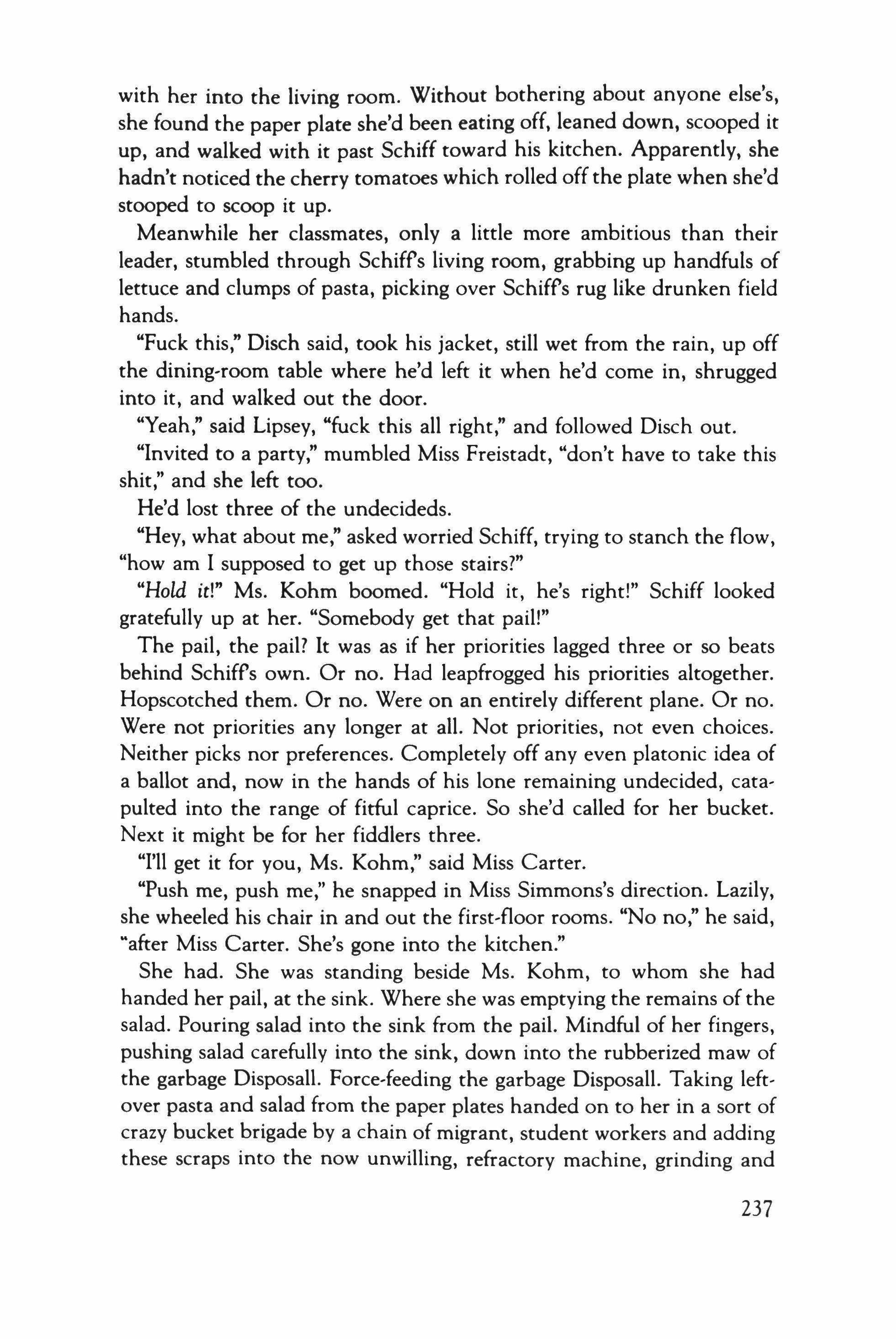
with her into the living room. Without bothering about anyone else's, she found the paper plate she'd been eating off, leaned down, scooped it up, and walked with it past Schiff toward his kitchen. Apparently, she hadn't noticed the cherry tomatoes which rolled off the plate when she'd stooped to scoop it up.
Meanwhile her classmates, only a little more ambitious than their leader, stumbled through Schiff's living room, grabbing up handfuls of lettuce and clumps of pasta, picking over Schiff's rug like drunken field hands.
"Fuck this," Disch said, took his jacket, still wet from the rain, up off the dining-room table where he'd left it when he'd come in, shrugged into it, and walked out the door.
"Yeah," said Lipsey, "fuck this all right," and followed Disch out.
"Invited to a party," mumbled Miss Freistadt, "don't have to take this shit," and she left too.
He'd lost three of the undecideds.
"Hey, what about me," asked worried Schiff, trying to stanch the flow, "how am I supposed to get up those stairs?"
"Hold it!" Ms. Kohm boomed. "Hold it, he's right!" Schiff looked gratefully up at her. "Somebody get that pail!"
The pail, the pail? It was as if her priorities lagged three or so beats behind Schiff's own. Or no. Had leapfrogged his priorities altogether. Hopscotched them. Or no. Were on an entirely different plane. Or no. Were not priorities any longer at all. Not priorities, not even choices. Neither picks nor preferences. Completely off any even platonic idea of a ballot and, now in the hands of his lone remaining undecided, catapulted into the range of fitful caprice. So she'd called for her bucket. Next it might be for her fiddlers three.
"I'll get it for you, Ms. Kohm," said Miss Carter.
"Push me, push me," he snapped in Miss Simmons's direction. Lazily, she wheeled his chair in and out the first-floor rooms. "No no," he said, "after Miss Carter. She's gone into the kitchen."
She had. She was standing beside Ms. Kohm, to whom she had handed her pail, at the sink. Where she was emptying the remains of the salad. Pouring salad into the sink from the pail. Mindful of her fingers, pushing salad carefully into the sink, down into the rubberized maw of the garbage Disposall. Force-feeding the garbage Disposall. Taking leftover pasta and salad from the paper plates handed on to her in a sort of crazy bucket brigade by a chain of migrant, student workers and adding these scraps into the now unwilling, refractory machine, grinding and
237

grinding down, growling and choking, coughing up lettuce, spitting zucchini over mounds of red, regurgitant pasta.
"Please stop, it's breaking," requested Schiff. "Please?" he offered. "No, really," he said, "it's all right. You don't have to bother, I'll get it. She won't stop," Schiff complained to Miss Simmons.
"Those other guys were right," said Miss Simmons. "Fuck this," she said, and she walked out on him, too.
"All right," spoke Schiff from his now pusherless chair, hoping to catch someone's attention, "see what you've done? Miss Simmons is gone. The strong-looking one walked out. See what you've done? Who'll get me upstairs? How will I manage? What's going to happen to me?" he appealed to them. And where, he wondered, did his own intoxication corne from? Why, from woe, he thought. Woe was its source, and he was as helpless to stanch it as he'd been to keep Lipsey and the others from leaving. Helplessly he continued to ask his rhetorical questions. "Why do bad things happen to good people? Or vice versa?" he asked. "If one knew going in that this was how a pretty fair country Ping-Pong player was going to end up, would one even have bothered? What are the odds, would you say, of my ever getting your respect back after putting you through an evening like this? All right," he said, addressing Ms. Kohm, "I've got one for you. If Claire's not in Seattle, where is she you think?"
But Ms. Kohm was still at her blind ablutions, bent over the kitchen sink, her arms plunged into the extraordinary pile of salad, lifting strands of it toward her face and examining them as if there were something inherent in the salad itself that prevented the Disposal! from handling it. "Nope," she pronounced, "she won't go down. Say," she said, turning to Schiff, "what are we thinking of here anyway? This stuff is still fresh. You could live off it for a week. Let's get it into the fridge." No one but Schiff seemed to be listening to her though, so she set an example. She took up an armful of the stuff and started with it toward the refrigerator. "Someone get that door for me, will you," she said, "my arms are full."
"No, really," Schiff said, "you don't have to bother. Not on my account. Tomorrow I'm making these arrangements with Meals-onWheels."
But by this time she'd managed to work the door open. Unceremoniously, she dumped her green burden onto a shelf in Schiff's refrigerator. "There," said Ms. Kohm, "it's on one of the lower shelves. See, I've made it handicap-accessible for you."
"Right," said Schiff. "You're in compliance. Now I won't have to take you to court."
238
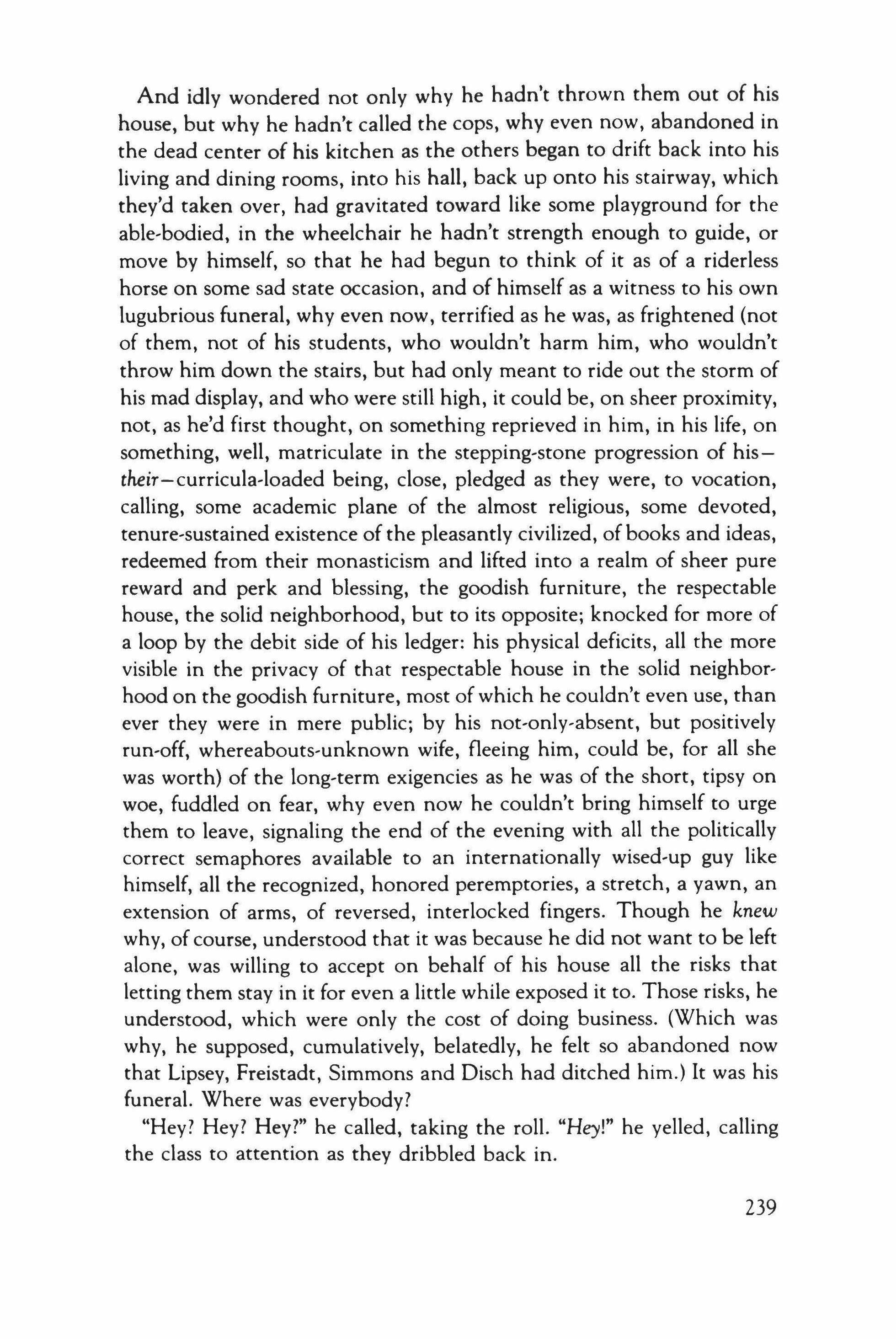
And idly wondered not only why he hadn't thrown them out of his house, but why he hadn't called the cops, why even now, abandoned in the dead center of his kitchen as the others began to drift back into his living and dining rooms, into his hall, back up onto his stairway, which they'd taken over, had gravitated toward like some playground for the able-bodied, in the wheelchair he hadn't strength enough to guide, or move by himself, so that he had begun to think of it as of a riderless horse on some sad state occasion, and of himself as a witness to his own lugubrious funeral, why even now, terrified as he was, as frightened (not of them, not of his students, who wouldn't harm him, who wouldn't throw him down the stairs, but had only meant to ride out the storm of his mad display, and who were still high, it could be, on sheer proximity, not, as he'd first thought, on something reprieved in him, in his life, on something, well, matriculate in the stepping-stone progression of histheir-curricula-loaded being, close, pledged as they were, to vocation, calling, some academic plane of the almost religious, some devoted, tenure-sustained existence of the pleasantly civilized, of books and ideas, redeemed from their monasticism and lifted into a realm of sheer pure reward and perk and blessing, the goodish furniture, the respectable house, the solid neighborhood, but to its opposite; knocked for more of a loop by the debit side of his ledger: his physical deficits, all the more visible in the privacy of that respectable house in the solid neighborhood on the goodish furniture, most of which he couldn't even use, than ever they were in mere public; by his not-only-absent, but positively run-off, whereabouts-unknown wife, fleeing him, could be, for all she was worth) of the long-term exigencies as he was of the short, tipsy on woe, fuddled on fear, why even now he couldn't bring himself to urge them to leave, signaling the end of the evening with all the politically correct semaphores available to an internationally wised-up guy like himself, all the recognized, honored peremptories, a stretch, a yawn, an extension of arms, of reversed, interlocked fingers. Though he knew why, of course, understood that it was because he did not want to be left alone, was willing to accept on behalf of his house all the risks that letting them stay in it for even a little while exposed it to. Those risks, he understood, which were only the cost of doing business. (Which was why, he supposed, cumulatively, belatedly, he felt so abandoned now that Lipsey, Freistadt, Simmons and Disch had ditched him.) It was his funeral. Where was everybody?
"Hey? Hey? Hey?" he called, taking the roll. "Hey!" he yelled, calling the class to attention as they dribbled back in.
239
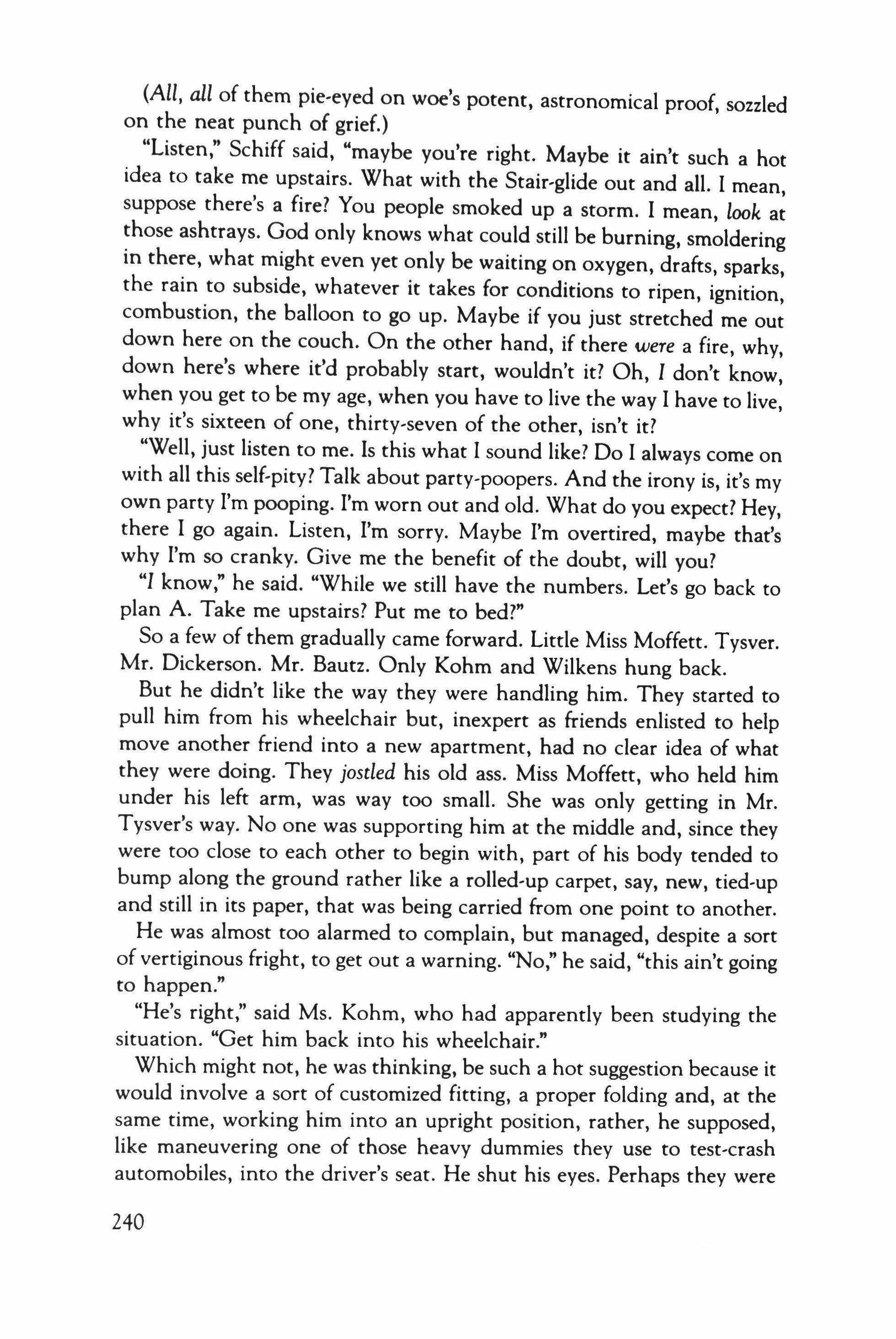
(All, all of them pie-eyed on woe's potent, astronomical proof, sozzled on the neat punch of grief.)
"Listen," Schiff said, "maybe you're right. Maybe it ain't such a hot idea to take me upstairs. What with the Stair-glide out and all. I mean, suppose there's a fire? You people smoked up a storm. I mean, look at those ashtrays. God only knows what could still be burning, smoldering in there, what might even yet only be waiting on oxygen, drafts, sparks, the rain to subside, whatever it takes for conditions to ripen, ignition, combustion, the balloon to go up. Maybe if you just stretched me out down here on the couch. On the other hand, if there were a fire, why, down here's where it'd probably start, wouldn't it? Oh, I don't know, when you get to be my age, when you have to live the way I have to live, why it's sixteen of one, thirty-seven of the other, isn't it?
"Well, just listen to me. Is this what I sound like? Do I always come on with all this self-pity? Talk about parry-poopers. And the irony is, it's my own party I'm pooping. I'm worn out and old. What do you expect? Hey, there I go again. Listen, I'm sorry. Maybe I'm overtired, maybe that's why I'm so cranky. Give me the benefit of the doubt, will you?
"I know," he said. "While we still have the numbers. Let's go back to plan A. Take me upstairs? Put me to bed?"
So a few of them gradually came forward. Little Miss Moffett. Tysver. Mr. Dickerson. Mr. Bautz. Only Kohm and Wilkens hung back.
But he didn't like the way they were handling him. They started to pull him from his wheelchair but, inexpert as friends enlisted to help move another friend into a new apartment, had no clear idea of what they were doing. They jostled his old ass. Miss Moffett, who held him under his left arm, was way too small. She was only getting in Mr. Tysver's way. No one was supporting him at the middle and, since they were too close to each other to begin with, part of his body tended to bump along the ground rather like a rolled-up carpet, say, new, tied-up and still in its paper, that was being carried from one point to another.
He was almost too alarmed to complain, but managed, despite a sort of vertiginous fright, to get out a warning. "No," he said, "this ain't going to happen."
"He's right," said Ms. Kohm, who had apparently been studying the situation. "Get him back into his wheelchair."
Which might not, he was thinking, be such a hot suggestion because it would involve a sort of customized fitting, a proper folding and, at the same time, working him into an upright position, rather, he supposed, like maneuvering one of those heavy dummies they use to test-crash automobiles, into the driver's seat. He shut his eyes. Perhaps they were
240
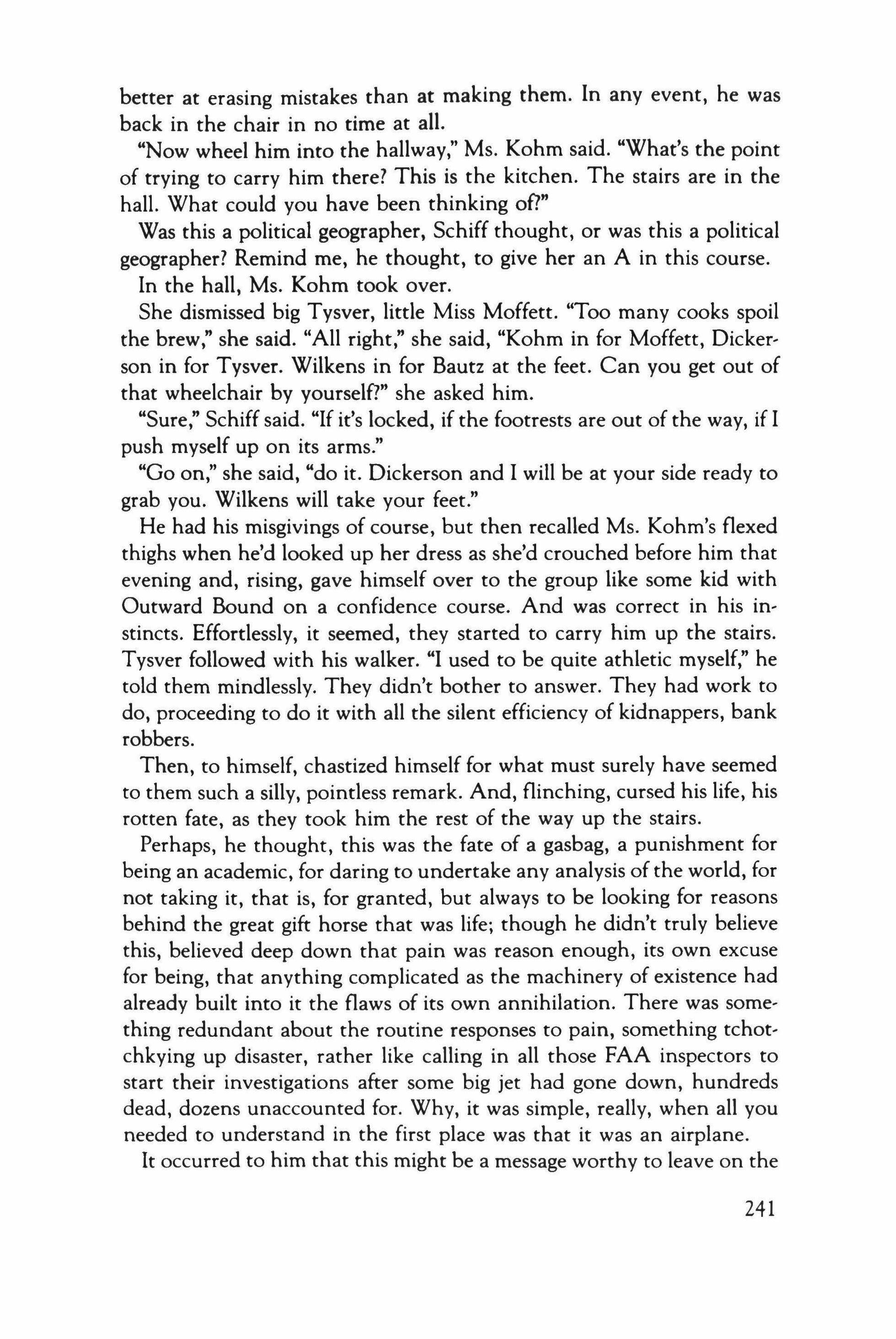
better at erasing mistakes than at making them. In any event, he was back in the chair in no time at all.
"Now wheel him into the hallway," Ms. Kohm said. "What's the point of trying to carry him there? This is the kitchen. The stairs are in the hall. What could you have been thinking ofl"
Was this a political geographer, Schiff thought, or was this a political geographer? Remind me, he thought, to give her an A in this course.
In the hall, Ms. Kohm took over.
She dismissed big Tysver, little Miss Moffett. "Too many cooks spoil the brew," she said. "All right," she said, "Kohm in for Moffett, Dickerson in for Tysver. Wilkens in for Bautz at the feet. Can you get out of that wheelchair by vourselfi" she asked him.
"Sure," Schiff said. "If it's locked, if the footrests are out of the way, if I push myself up on its arms."
"Go on," she said, "do it. Dickerson and 1 will be at your side ready to grab you. Wilkens will take your feet."
He had his misgivings of course, but then recalled Ms. Kohm's flexed thighs when he'd looked up her dress as she'd crouched before him that evening and, rising, gave himself over to the group like some kid with Outward Bound on a confidence course. And was correct in his instincts. Effortlessly, it seemed, they started to carry him up the stairs. Tysver followed with his walker. "I used to be quite athletic myself," he told them mindlessly. They didn't bother to answer. They had work to do, proceeding to do it with all the silent efficiency of kidnappers, bank robbers.
Then, to himself, chastized himself for what must surely have seemed to them such a silly, pointless remark. And, flinching, cursed his life, his rotten fate, as they took him the rest of the way up the stairs.
Perhaps, he thought, this was the fate of a gasbag, a punishment for being an academic, for daring to undertake any analysis of the world, for not taking it, that is, for granted, but always to be looking for reasons behind the great gift horse that was life; though he didn't truly believe this, believed deep down that pain was reason enough, its own excuse for being, that anything complicated as the machinery of existence had already built into it the flaws of its own annihilation. There was something redundant about the routine responses to pain, something tchotchkying up disaster, rather like calling in all those FAA inspectors to start their investigations after some big jet had gone down, hundreds dead, dozens unaccounted for. Why, it was simple, really, when all you needed to understand in the first place was that it was an airplane.
It occurred to him that this might be a message worthy to leave on the
241
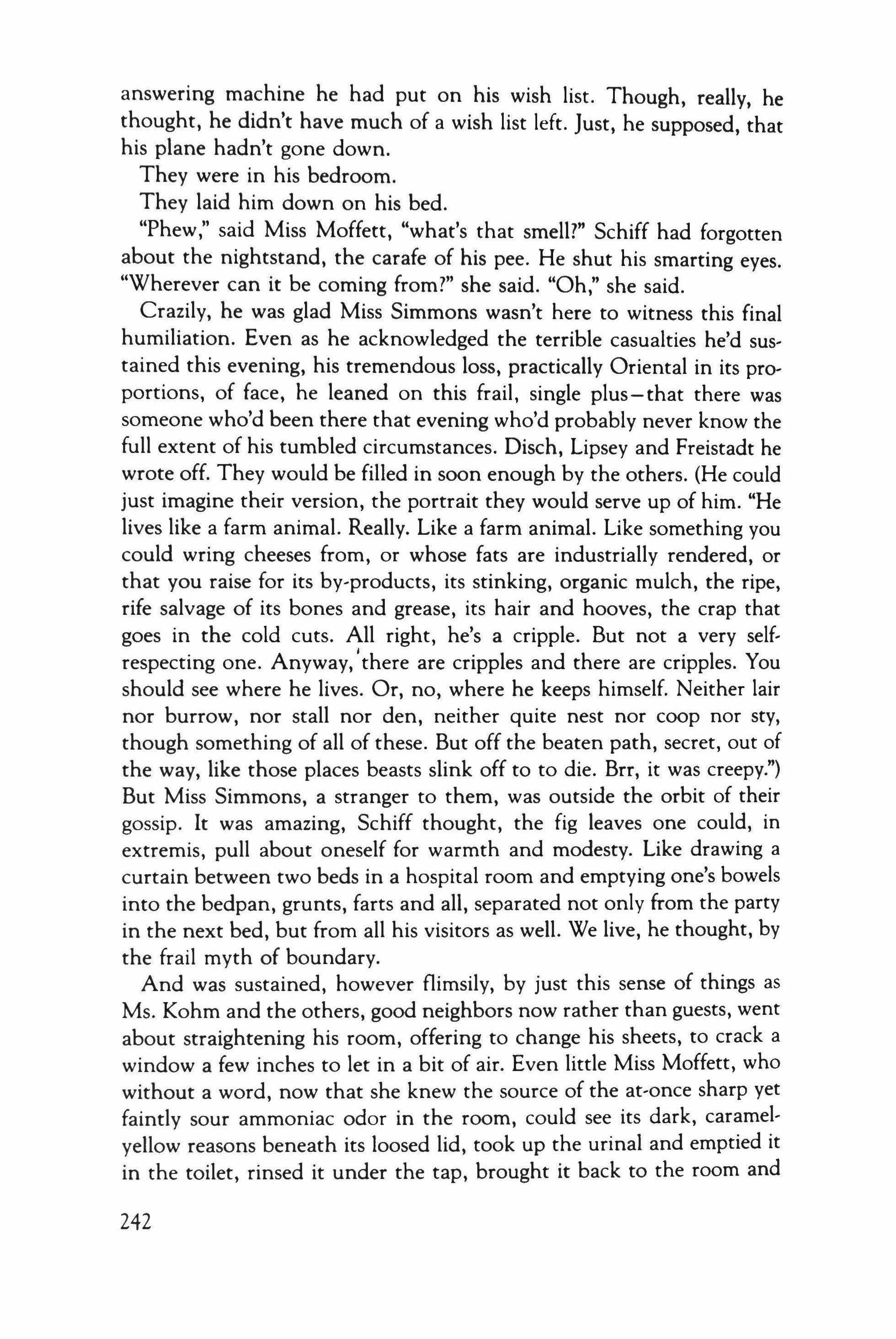
answering machine he had put on his wish list. Though, really, he thought, he didn't have much of a wish list left. Just, he supposed, that his plane hadn't gone down.
They were in his bedroom.
They laid him down on his bed.
"Phew," said Miss Moffett, "what's that smell?" Schiff had forgotten about the nighrstand, the carafe of his pee. He shut his smarting eyes. "Wherever can it be coming from?" she said. "Oh," she said.
Crazily, he was glad Miss Simmons wasn't here to witness this final humiliation. Even as he acknowledged the terrible casualties he'd sustained this evening, his tremendous loss, practically Oriental in its proportions, of face, he leaned on this frail, single plus-that there was someone who'd been there that evening who'd probably never know the full extent of his tumbled circumstances. Disch, Lipsey and Freistadt he wrote off. They would be filled in soon enough by the others. (He could just imagine their version, the portrait they would serve up of him. "He lives like a farm animal. Really. Like a farm animal. Like something you could wring cheeses from, or whose fats are industrially rendered, or that you raise for its by-products, its stinking, organic mulch, the ripe, rife salvage of its bones and grease, its hair and hooves, the crap that goes in the cold cuts. All right, he's a cripple. But not a very selfrespecting one. Anyway,'there are cripples and there are cripples. You should see where he lives. Or, no, where he keeps himself. Neither lair nor burrow, nor stall nor den, neither quite nest nor coop nor sty, though something of all of these. But off the beaten path, secret, out of the way, like those places beasts slink off to to die. Brr, it was creepy.") But Miss Simmons, a stranger to them, was outside the orbit of their gossip. It was amazing, Schiff thought, the fig leaves one could, in extremis, pull about oneself for warmth and modesty. Like drawing a curtain between two beds in a hospital room and emptying one's bowels into the bedpan, grunts, farts and all, separated not only from the party in the next bed, but from all his visitors as well. We live, he thought, by the frail myth of boundary.
And was sustained, however flimsily, by just this sense of things as Ms. Kohm and the others, good neighbors now rather than guests, went about straightening his room, offering to change his sheets, to crack a window a few inches to let in a bit of air. Even little Miss Moffett, who without a word, now that she knew the source of the at-once sharp yet faintly sour ammoniac odor in the room, could see its dark, caramelyellow reasons beneath its loosed lid, took up the urinal and emptied it in the toilet, rinsed it under the tap, brought it back to the room and
242

returned it (smelling fresh now, even lightly, pleasantly scented, as though she'd washed it out, scrubbed it with cleanser) to the nightstand by his bed. No more put off by his sick man's foul ways than she might have been by her own child's sullied diapers. But of course, Schiff thought, they lived in the age of Candy Stripers, nurse's aides, sponge bathers, administers of enemas, handlers of bedpans, masseuses of the comatose, volunteers at just about anyone's bedside, heroines of vicious diseases, broken in by AIDS patients, for whom the body and its poisons were just more brittle frontier. Fallen flesh meant nothing to them, nothing. Oust try to pinch one though, or steal a kiss. Cops would be brought in. Calling all cars, calling all cars.}
So they hovered, flitted about him, the alcoholic levels in their blood probably no lower now than they'd been at the height of their games on his stairway, or spreading out their picnic on his living-room floor. Whistling, giggling while they worked. Playing a sort of house with him now, a kind offamily, even Bautz and Tysver, even Wilkins and Dickerson, the special care they took of him maybe even a game of deathbed, making sure as they fluffed up his pillows and smoothed down his sheets to keep their voices low, addressing each other in exaggerated whispers, cautious high sign. Two or three of them actually tiptoeing, so that, despite himself, he found he could not keep his eyes open, was succumbing to the lullaby of their oddly soothing movements.
He must actually have dozed, for when he opened his eyes again everyone but Ms. Kohm was gone from his room. Only the lamp beside his bed was on.
Molly Kohm was sitting sidesaddle on his bed at about the level of his chest, her hip just pressing comfortably against his arm.
"Shh," she said, "hush," though he had uttered no sound. "I just wanted to thank you for the lovely evening."
"You're welcome. No problem," Schiff said hoarsely.
"Shh," she said. "No, really," she said, "thanks very much."
"Hey," Schiff said, wondering if he dare lift a finger, "I didn't lift a finger. It was all the PGPC's doing."
"The PGPC is dissolved now," she said. "They say that once the Macy's Day or Rose Bowl parade is over, the people who put it together are back at it again the very next morning, preparing for next year. Don't you believe it."
"I don't," Schiff said. "I never did."
"Well," she said, "are you going to be all right?"
"Oh, sure," he said.
"Your wife never called?"
243

"No," he said.
"I don't know where she is. She could be in Seattle. She could be anywhere."
He was gathering courage, putting together a sort of schoolkid's nerve he hadn't used in years. All that stuff yesterday about Miss Simmons had been wishful thinking, pure pipe dream, idle fantasy. At no time had she perched on the edge of his bed, been this close to him, her haunch brushing his arm, mere inches from his hand, his cupped palm. Yes, Schiff thought, I'm going to touch her. I'm going to reach over and hold her.
And was just shifting his weight when he heard a great, joined barrage of laughter from downstairs. His students. He thought they'd left. Had even taken this into account before he'd decided to make his move. And not only that, but what's more, had even believed that their departurehe could picture them, their fingers at their lips, shushing each other, up on point, on tiptoe again, in exaggerate, conspired, sneak-thief pantomime-may even have been a sort of deliberate ante-upping, building the story, the Disch, Lipsey, Freistadt version, leaving Ms. Kohm alone with him on his bed as though making off with the metaphorical silver. So, already enlisted in the farce, caught up in it, he was doubly disappointed, once for his ruined moves, once more for the shortfall of legend.
He heard their wild laughter again, helpless as a fit of coughing.
"What's that?" he asked her. "What are they up to?"
"They're young," Ms. Kohm said, rising, "they're having fun. Weren't you ever young?"
"Sure," Schiff said. "I was young. I think I was young."
"Well there you are."
"They sound drunk. They sound out of control."
"What are you worried about?"
"Jesus," he said, "they already broke the damn Stair-glide. There's every kind of pasta, oil-and-vinegar, spilled wine and lettuce stain you can think of on my carpets and furniture. The Disposall's stopped up like a toilet, and you tell me the pope is shut down for the duration. What do you mean what am 1 worried about?"
"All right," said Ms. Kohm.
"All right? All right? My Stair-glide is busted! Look around you, this bedroom, the other rooms on this floor-these are my borders, lady, this is my political geography!"
"Take it easy," she said. "Do you want to have a stroke? That's just the way people bring them on. You don't want to have a stroke, do you?"
244
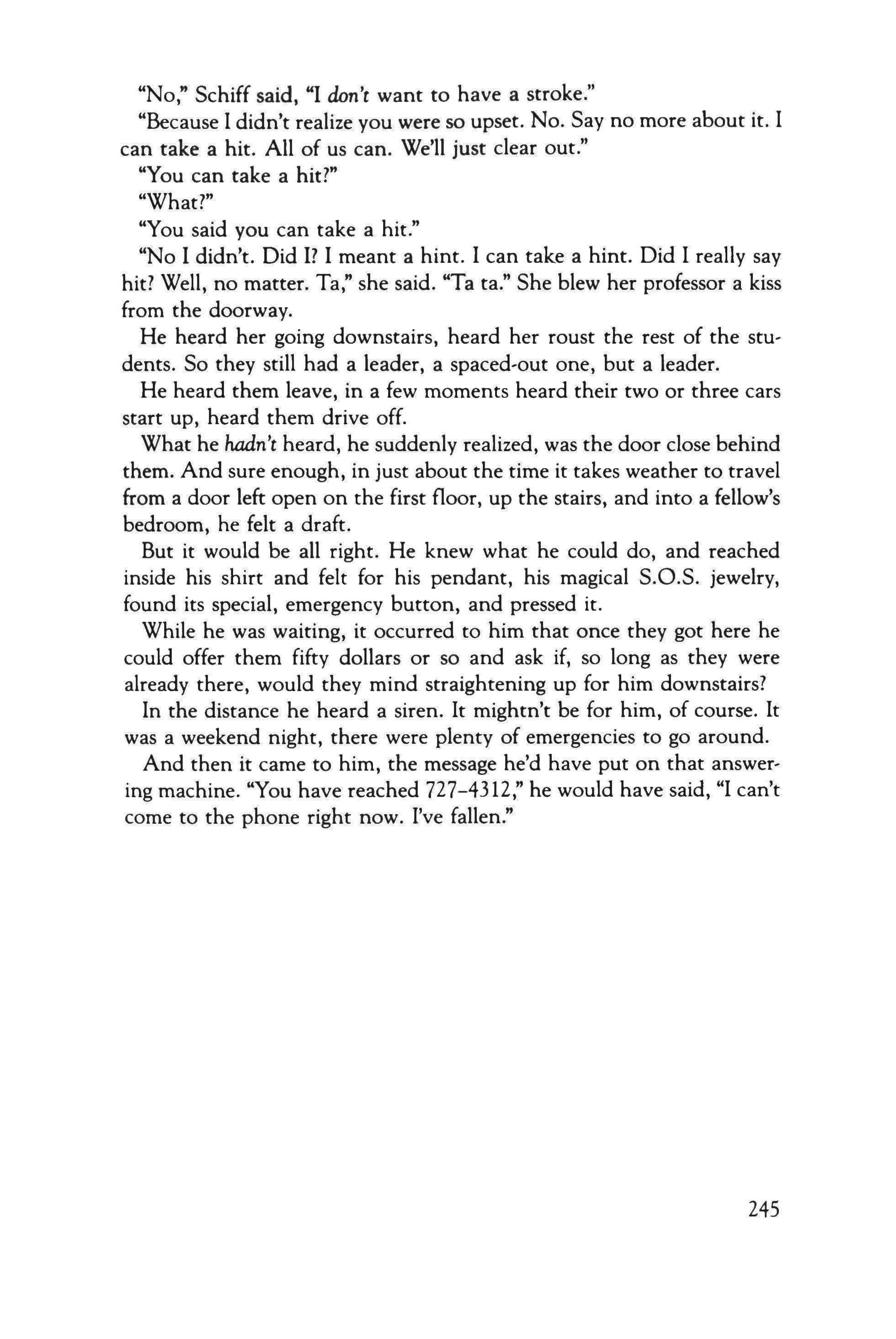
"No," Schiff said, "I don't want to have a stroke."
"Because I didn't realize you were so upset. No. Say no more about it. I can take a hit. All of us can. We'll just clear out."
"You can take a hit?"
"What?"
"You said you can take a hit."
"No I didn't. Did I? 1 meant a hint. I can take a hint. Did I really say hit? Well, no matter. Ta," she said. "Ta ta," She blew her professor a kiss from the doorway.
He heard her going downstairs, heard her roust the rest of the stu, dents. So they still had a leader, a spaced-out one, but a leader.
He heard them leave, in a few moments heard their two or three cars start up, heard them drive off.
What he hadn't heard, he suddenly realized, was the door close behind them. And sure enough, in just about the time it takes weather to travel from a door left open on the first floor, up the stairs, and into a fellow's bedroom, he felt a draft.
But it would be all right. He knew what he could do, and reached inside his shirt and felt for his pendant, his magical S.O.S. jewelry, found its special, emergency button, and pressed it.
While he was waiting, it occurred to him that once they got here he could offer them fifty dollars or so and ask if, so long as they were already there, would they mind straightening up for him downstairs?
In the distance he heard a siren. It mightn't be for him, of course. It was a weekend night, there were plenty of emergencies to go around.
And then it came to him, the message he'd have put on that answer, ing machine. "You have reached 727-4312," he would have said, "I can't come to the phone right now. I've fallen."
245
Contributors
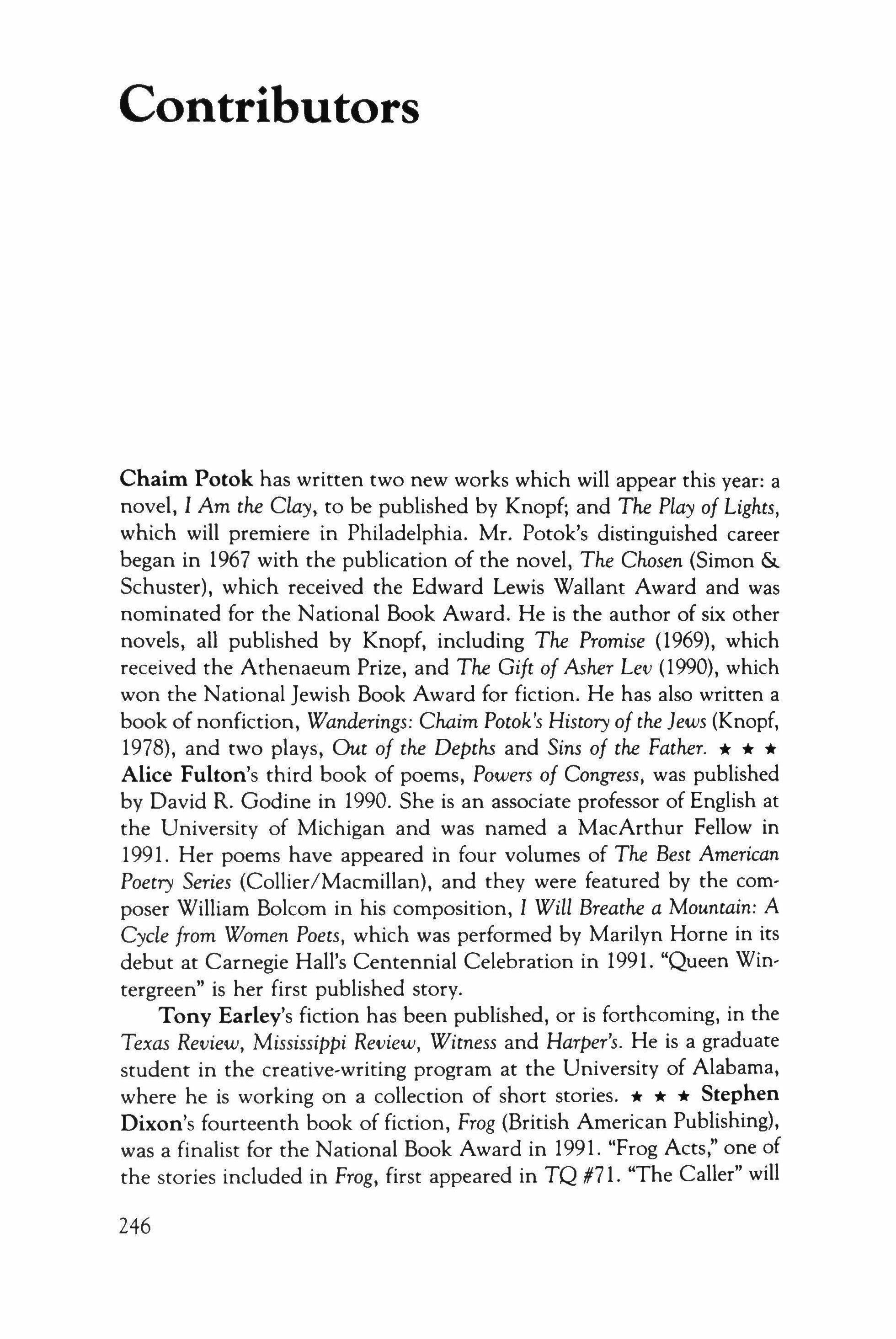
Chaim Potok has written two new works which will appear this year: a novel, 1 Am the Clay, to be published by Knopf; and The Play of Lights, which will premiere in Philadelphia. Mr. Potok's distinguished career began in 1967 with the publication of the novel, The Chosen (Simon & Schuster), which received the Edward Lewis Wallant Award and was nominated for the National Book Award. He is the author of six other novels, all published by Knopf, including The Promise (1969), which received the Athenaeum Prize, and The Gift of Asher Lev (1990), which won the National Jewish Book Award for fiction. He has also written a book of nonfiction, Wanderings: Chaim Potok's History of the Jews (Knopf, 1978), and two plays, Out of the Depths and Sins of the Father. * * * Alice Fulton's third book of poems, Powers of Congress, was published by David R. Godine in 1990. She is an associate professor of English at the University of Michigan and was named a MacArthur Fellow in 1991. Her poems have appeared in four volumes of The Best American Poetry Series (Collier/Macmillan), and they were featured by the composer William Balcom in his composition, 1 Will Breathe a Mountain: A Cycle from Women Poets, which was performed by Marilyn Horne in its debut at Carnegie Hall's Centennial Celebration in 1991. "Queen Wintergreen" is her first published story.
Tony Earley's fiction has been published, or is forthcoming, in the Texas Review, MississiPPi Review, Witness and Harper's. He is a graduate student in the creative-writing program at the University of Alabama, where he is working on a collection of short stories. * * * Stephen Dixon's fourteenth book of fiction, Frog (British American Publishing), was a finalist for the National Book Award in 1991. "Frog Acts," one of the stories included in Frog, first appeared in TQ #71. "The Caller" will
246
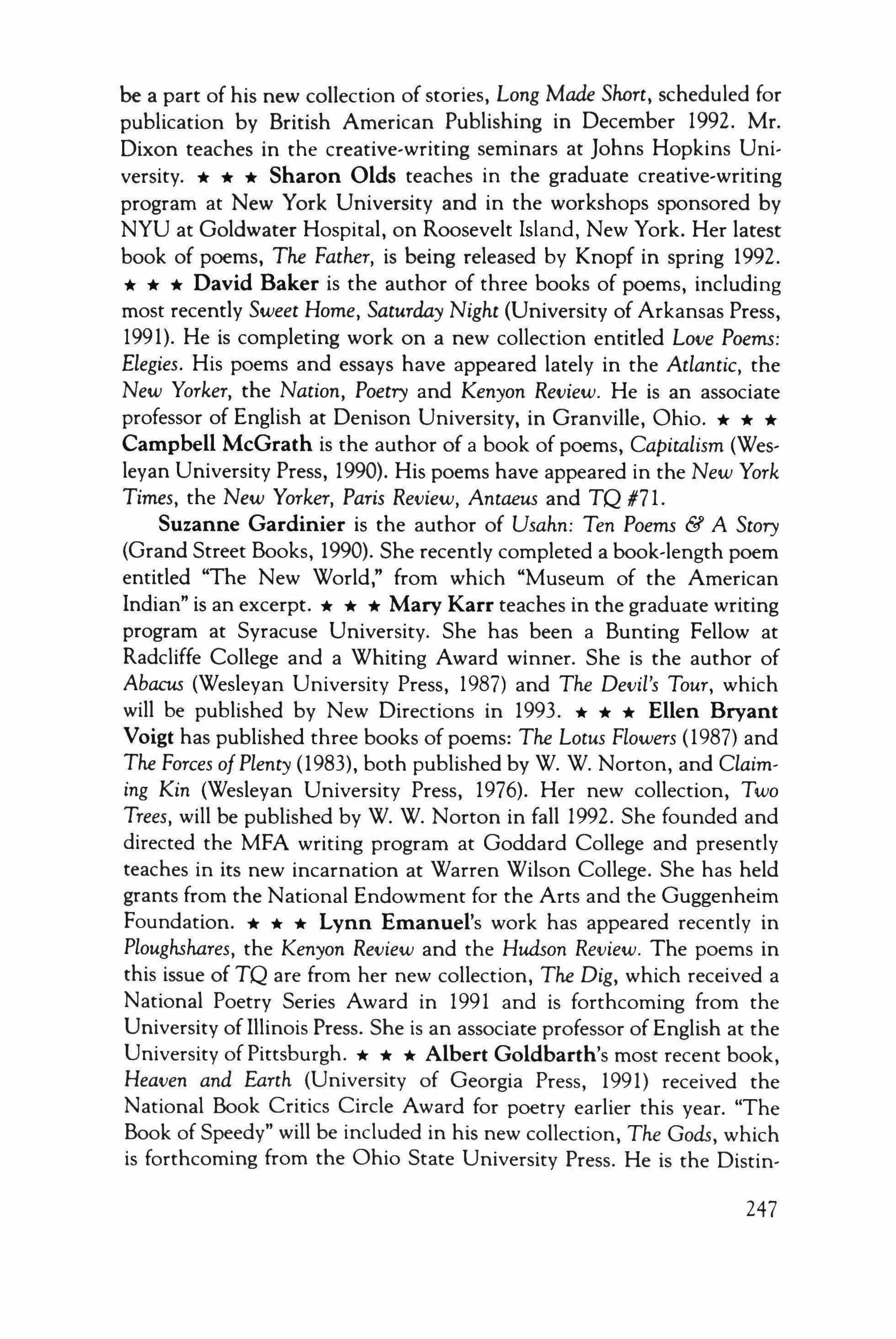
be a part of his new collection of stories, Long Made Short, scheduled for publication by British American Publishing in December 1992. Mr. Dixon teaches in the creative-writing seminars at Johns Hopkins University. * * * Sharon Olds teaches in the graduate creative-writing program at New York University and in the workshops sponsored by NYU at Goldwater Hospital, on Roosevelt Island, New York. Her latest book of poems, The Father, is being released by Knopf in spring 1992. * * * David Baker is the author of three books of poems, including most recently Sweet Home, Saturday Night (University of Arkansas Press, 1991). He is completing work on a new collection entitled Love Poems: Elegies. His poems and essays have appeared lately in the Atlantic, the New Yorker, the Nation, Poetry and Kenyon Review. He is an associate professor of English at Denison University, in Granville, Ohio. * * *
Campbell McGrath is the author of a book of poems, Capitalism (Wesleyan University Press, 1990). His poems have appeared in the New York Times, the New Yorker, Paris Review, Antaeus and TQ #71.
Suzanne Gardinier is the author of Usahn: Ten Poems & A Story (Grand Street Books, 1990). She recently completed a book-length poem entitled "The New World," from which "Museum of the American Indian" is an excerpt. * * * Mary Karr teaches in the graduate writing program at Syracuse University. She has been a Bunting Fellow at Radcliffe College and a Whiting Award winner. She is the author of Abacus (Wesleyan University Press, 1987) and The Devil's Tour, which will be published by New Directions in 1993. * * * Ellen Bryant Voigt has published three books of poems: The Lotus Flowers (1987) and The Forces 0/Plenty (1983), both published by W. W. Norton, and Claiming Kin (Wesleyan University Press, 1976). Her new collection, Two Trees, will be published by W. W. Norton in fall 1992. She founded and directed the MFA writing program at Goddard College and presently teaches in its new incarnation at Warren Wilson College. She has held grants from the National Endowment for the Arts and the Guggenheim Foundation. * * * Lynn Emanuel's work has appeared recently in Ploughshares, the Kenyon Review and the Hudson Review. The poems in this issue of TQ are from her new collection, The Dig, which received a National Poetry Series Award in 1991 and is forthcoming from the University of Illinois Press. She is an associate professor of English at the University of Pittsburgh. * * * Albert Goldbarth's most recent book, Heaven and Earth (University of Georgia Press, 1991) received the National Book Critics Circle Award for poetry earlier this year. "The Book of Speedy" will be included in his new collection, The Gods, which is forthcoming from the Ohio State University Press. He is the Distin-
247
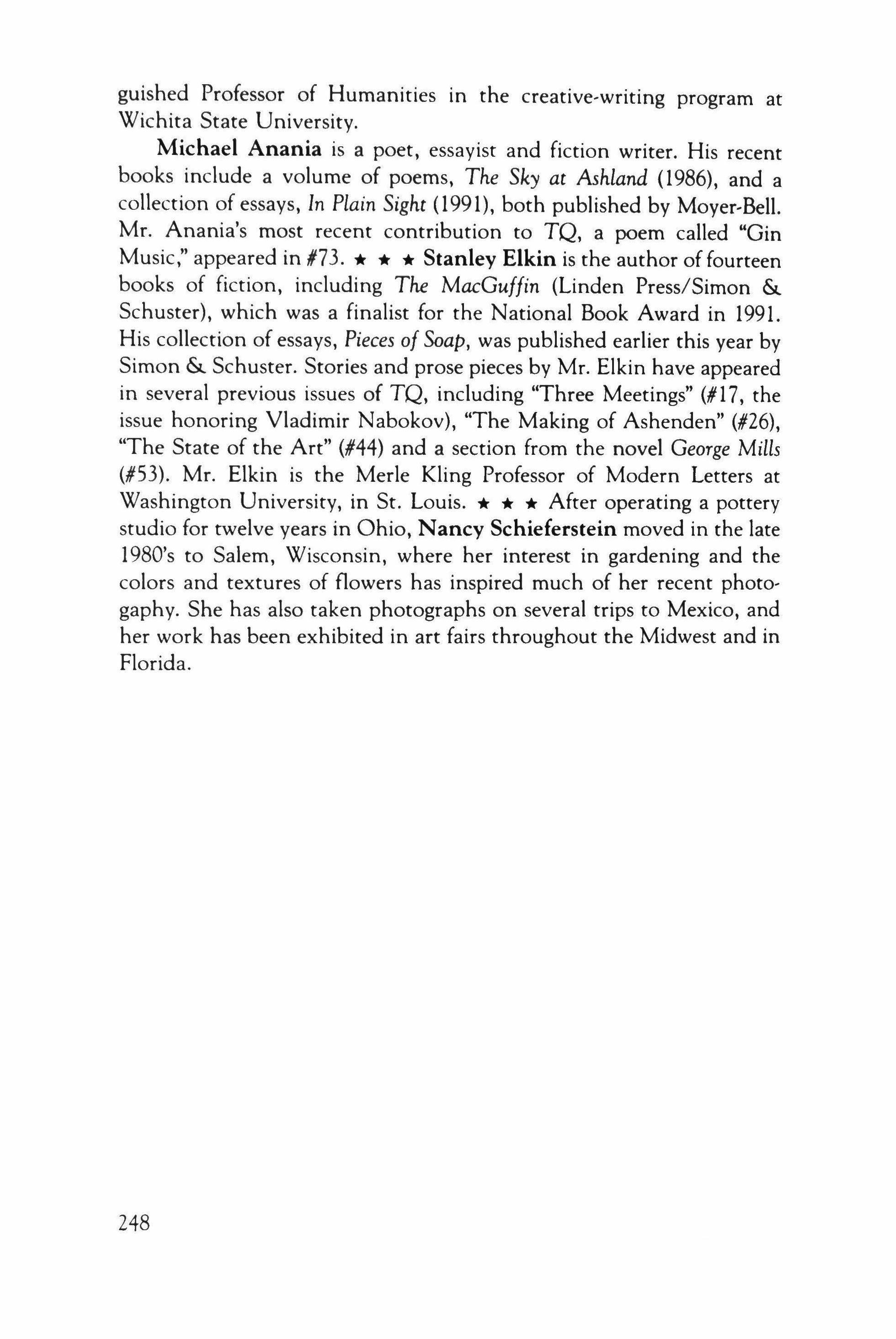
guished Professor of Humanities in the creative-writing program at Wichita State University.
Michael Anania is a poet, essayist and fiction writer. His recent books include a volume of poems, The Sky at Ashland (1986), and a collection of essays, In Plain Sight (1991), both published by Moyer-Bell. Mr. Anania's most recent contribution to TQ, a poem called "Gin Music," appeared in #73. * * * Stanley Elkin is the author of fourteen books of fiction, including The MacGuffin (Linden Press/Simon & Schuster), which was a finalist for the National Book Award in 1991. His collection of essays, Pieces of Soap, was published earlier this year by Simon & Schuster. Stories and prose pieces by Mr. Elkin have appeared in several previous issues of TQ, including "Three Meetings" (#17, the issue honoring Vladimir Nabokov), "The Making of Ashenden" (#26), "The State of the Art" (#44) and a section from the novel George Mills (#53). Mr. Elkin is the Merle Kling Professor of Modern Letters at Washington University, in St. Louis. * * * After operating a pottery studio for twelve years in Ohio, Nancy Schieferstein moved in the late 1980's to Salem, Wisconsin, where her interest in gardening and the colors and textures of flowers has inspired much of her recent photogaphy. She has also taken photographs on several trips to Mexico, and her work has been exhibited in art fairs throughout the Midwest and in Florida.
248
OPEFUL SIGNS IN THE LITERARY WORLD"
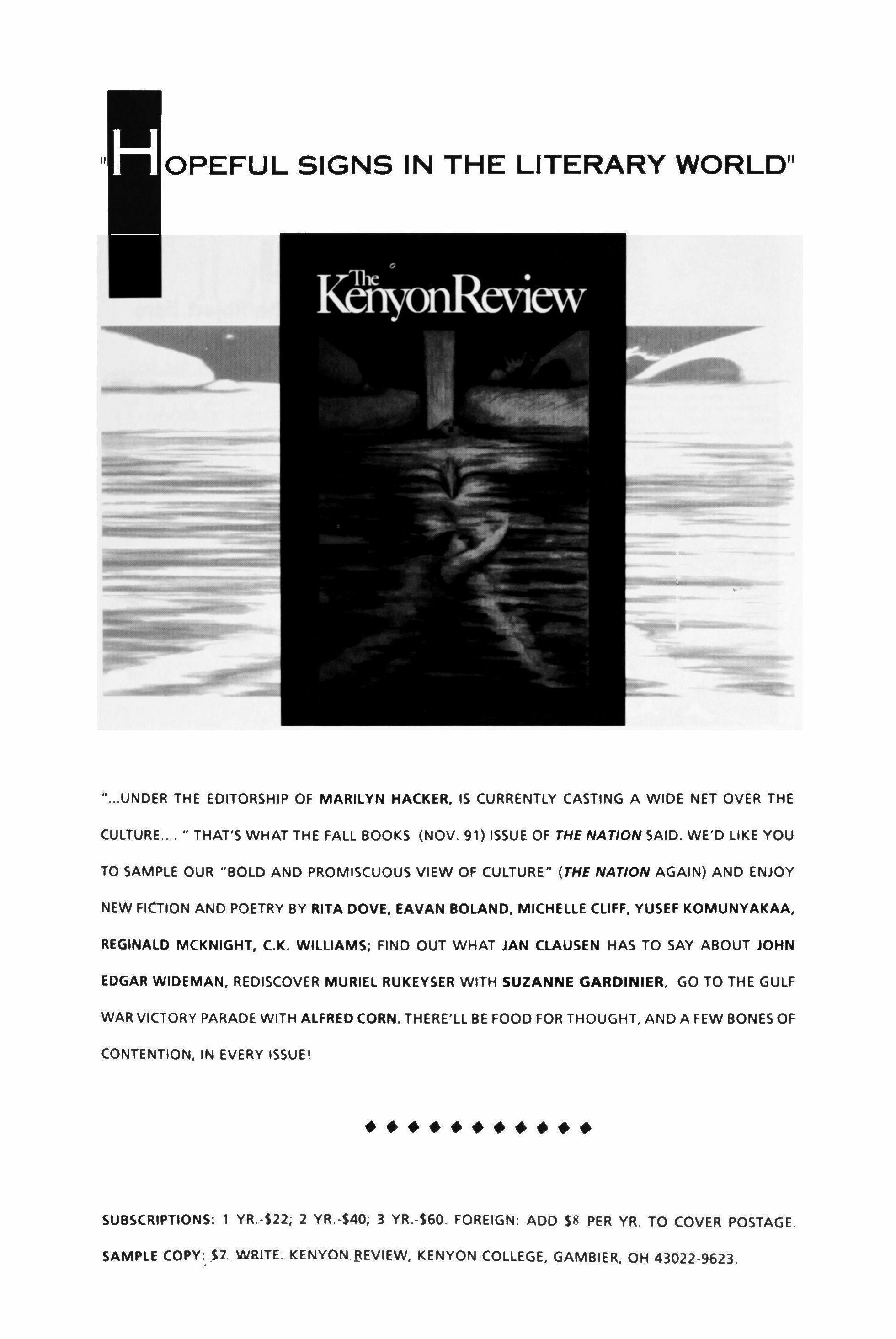
UNDER THE EDITORSHIP OF MARILYN HACKER, IS CURRENTLY CASTING A WIDE NET OVER THE CULTURE THAT'S WHAT THE FAll BOOKS (NOV. 91) ISSUE OF THE NATION SAID. WE'D LIKE YOU TO SAMPLE OUR "BOLD AND PROMISCUOUS VIEW OF CULTURE" (THE NATION AGAIN) AND ENJOY NEW FICTION AND POETRY BY RITA DOVE, EAVAN BOLAND, MICHElLE CLIFF, YUSEF KOMUNYAKAA, REGINALD MCKNIGHT, C.K. WILLIAMS; FIND OUT WHAT JAN CLAUSEN HAS TO SAY ABOUT JOHN EDGAR WIDEMAN, REDISCOVER MURiEl RUKEYSER WITH SUZANNE GARDINIER, GO TO THE GULF WAR VICTORY PARADE WITH ALFRED CORN. THERE'LL BE FOOD FOR THOUGHT, AND A FEW BONES OF CONTENTION, IN EVERY ISSUE!
SUBSCRIPTIONS: 1 YR.-S22; 2 YR.-S40; 3 YR.-S60. FOREIGN: ADD S8 PER YR. TO COVER POSTAGE. SAMPLE COPY:.$.LWRl.Tf..: K.£.NYON-BEVIEW, KENYON COLLEGE, GAMBIER, OH 43022-9623.
•••••••••••
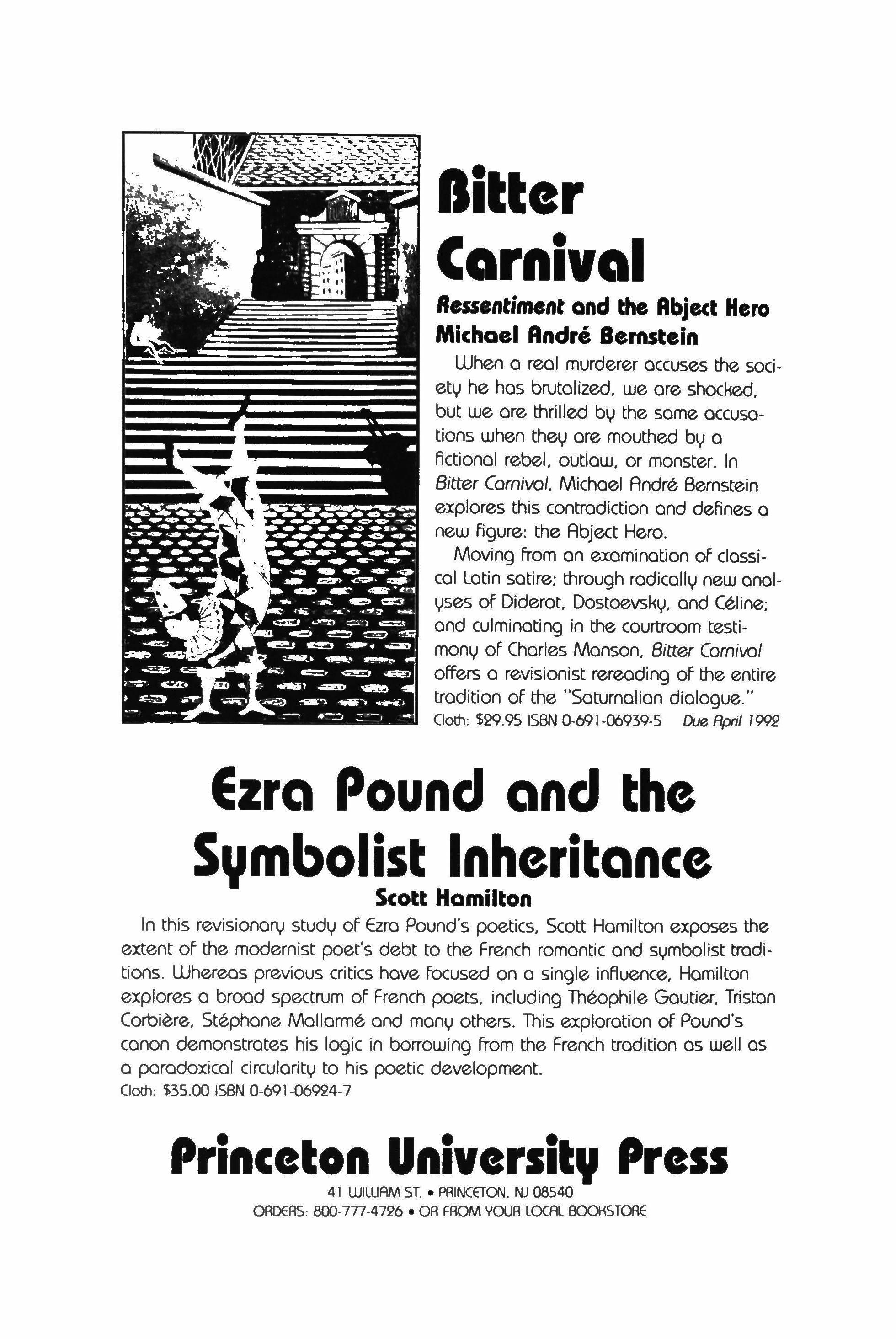
litter
Carnival
lIessentiment and the Abject Hero
Michael Andre lernsteln
When a real murderer accuses the society he has brutalized, we are shocked, but we are thrilled by the same accusations when they are mouthed by a fictional rebel. outlaw, or monster. In Bitter Cornival, Michael Andre Bernstein explores this contradiction and defines a new figure: the Abject Hero.
Moving from an examination of classical Latin satire; through radically new analyses of Diderot. Dostoevsky, and (eline; and culminating in the courtroom testimony of Charles Monson, Bitter Carnival offers a revisionist rereading of the entire tradition of the "Saturnalian dialogue."
Cloth: $29.95 ISBN 0-691-06939·5 Due April 1992
Ezra Pound and the Symbolist Inheritance
Scott Hamilton
In this revisionary study of Ezra Pound's poetics, Scott Hamilton exposes the extent of the modernist poet's debt to the French romantic and symbolist traditions. Whereas previous critics have focused on a single inAuence. Hamilton explores a broad spectrum of French poets, including Theopbne Goutier, Tristan Corbtere. Stephone Mollarme and many others. This exploration of Pound's canon demonstrates his logic in borrowing from the French tradition as well as a paradoxical circularity to his poetic development.
Cloth: $35.00 ISBN 0-691-06924-7
Princeton University
41 WILUAI\fI ST. PRINCETOf..J. NJ 08540 OADEAS: 800·777-4726. OR FROM YOUR LOCR BOOKSTORE
Press
IT WAS FEVER THAT MADE THE WORLD
Jim Powell
"His title burns away everywhere in the volume, in the fevers of eros, divination, memory, destruction, and grief. Page for page, there is more sheer fine, clear, yet syntactically subtle and metaphorically gorgeous writing in Powell than I have seen in some time."
- Mary Kinzie
Paper 58.95 88 pages Cloth 520.00
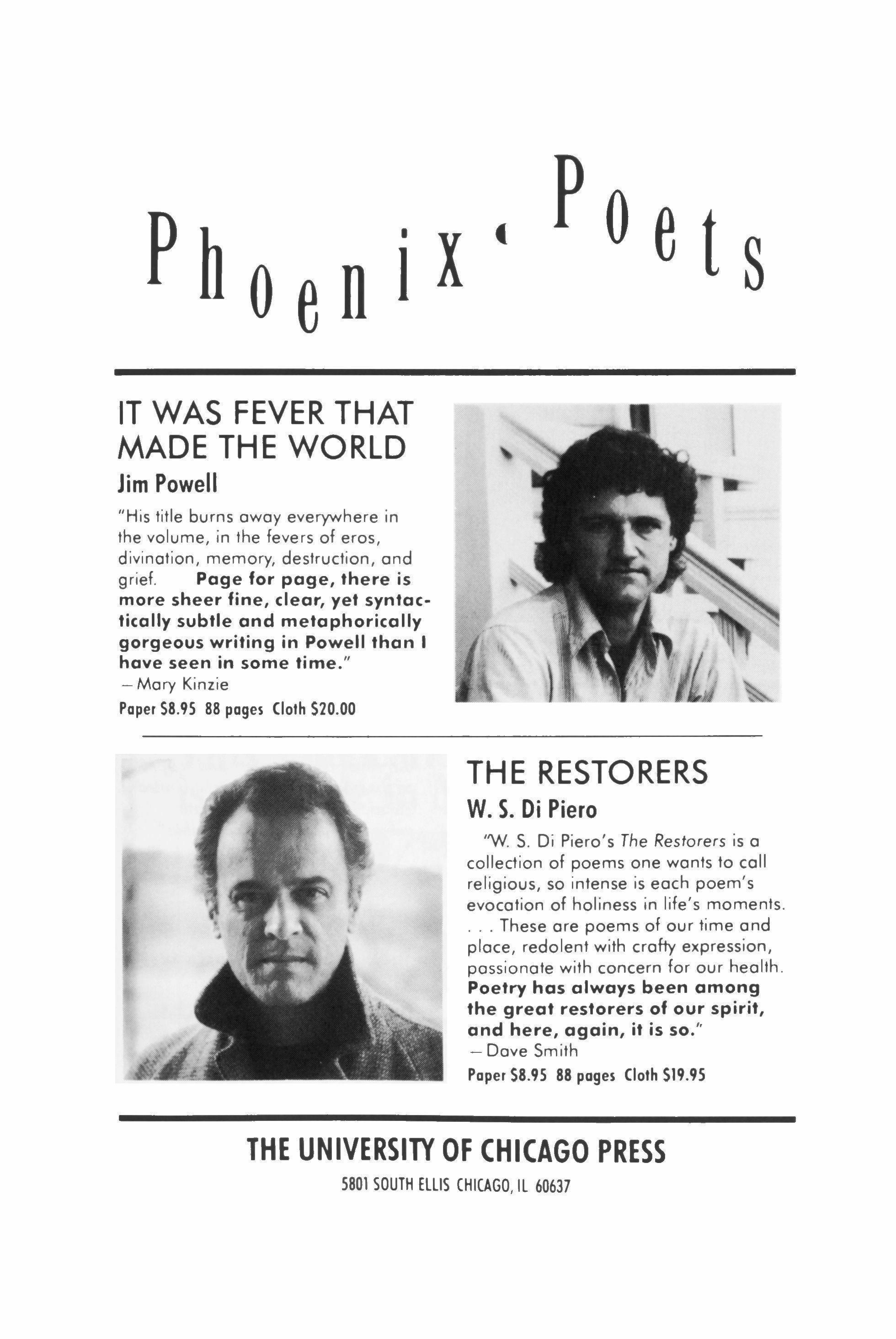
THE RESTORERS
w. S. Oi Piero
"W. S. Di Piero's The Restorers is a collection of poems one wonts to call religious, so intense is each poem's evocation of holiness in life's moments
These are poems of our time and place, redolent with crafty expression, possionate with concern for our health. Poetry has always been among the great restorers of our spirit, and here, again, it is so."
- Dove Smith
Paper 58.95 88 pages Cloth 519.95
OF CHICAGO PRESS 5801 SOUTH ELLIS CHICAGO, Il 60637
THE UNIVERSITY
the modern writer as witness
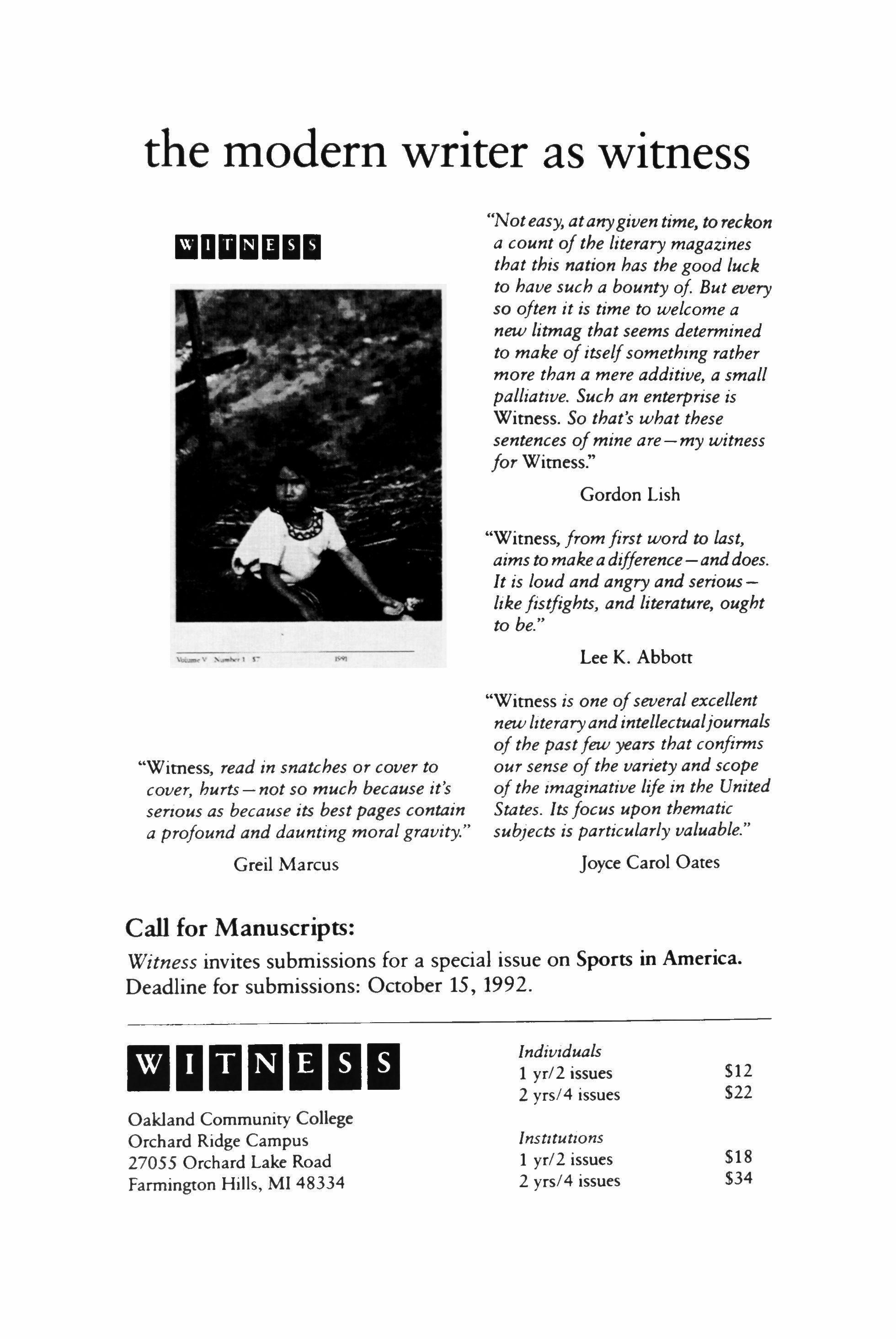
"Witness, read in snatches or cover to cover, hurts - not so much because it's senous as because its best pages contain a profound and daunting moral gravity."
Greil Marcus
Call for Manuscripts:
"Noteasy, atanygiven time, to reckon a count of the literary magazines that this nation has the good luck to have such a bounty of But every so often it is time to welcome a new litmag that seems determined to make ofitselfsomething rather more than a mere additive, a small palliative. Such an enterprise is Witness. So that's what these sentences ofmine are-my witness for Witness."
Gordon Lish
"Witness, fromfirst word to last, aims to make a difference - anddoes. It is loud and angry and seriouslikefistfights, and literature, ought to be."
Lee K. Abbott
"Witness is one ofseveral excellent new literaryandintellectualjournals of the pastfew years that confirms our sense ofthe variety and scope of the imaginative life in the United States. Its focus upon thematic subjects is particularly valuable."
Joyce Carol Oates
Witness invites submissions for a special issue on Sports in America.
Deadline for submissions: October 15, 1992.
11111111.1
1111111111 Oakland Community College Orchard Ridge Campus 27055 Orchard Lake Road Farmington Hills, MI 48334 Individuals 1 yr/2 issues 2 yrs/4 issues $12 $22 Institutions 1 yr/2 issues 2 yrs/4 issues $18 $34
CALYX,HlIlti-Cliltural
BLACK CANDLE
"" CIaiI Dj-'-i
A ltunnin( poetry collection aboutwomen fromSouthAlia.
DNply""man, UllGbuhtully
/emi1lUl, tAU baM u a tuta· _lit to tM womell itckpicU. -BooIdUt
DivaA:anuai recIGUrY1M hum· GIIUy that dutirI6UuM. aU gnatarl. -ladiaCurreata -,..100 SII.96 per, SI6.96 cIMh
THE FORBIDDEN
STITCH
Edi,.,..: Slairky Geo,,·U Li lIa,u"'; T.utall�
IIGI'larita DOfUIelly
The fllSt Aaian·American women', antholocY.
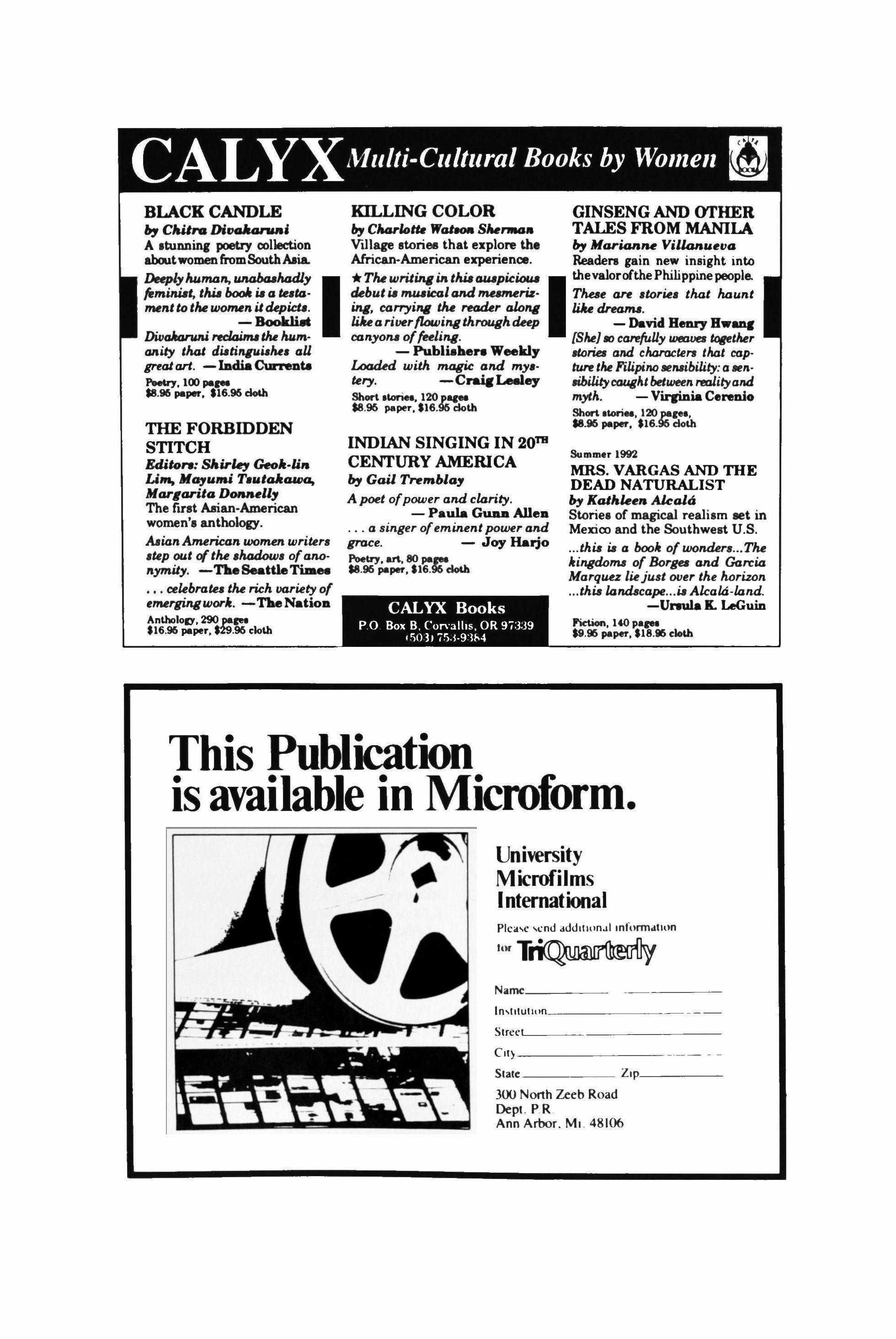
IA.iallAmericG1l wornm writers .tep out 0(tM .1uuIows ofIJIIO· lIymUy. -TIleSeaWen...
••. cekbratu 1M rich lJG1"iety of e_rgingwor'. -TIleNatio. :r�,:p.�J:.f:elolb
Books by Womell D
KILLING COLOR GINSENG AND OTHER by Cltarlone W.w- SM,,_,. TALES FROM MANILA Vtllage ltoriee that explore the "" lI_ian_ Villarauel/a African-American experience. Readen gain new insight into * TNt writinBill tAUauapieiDu
Ithevaloro{thePhilippinepeople. debutu muaalcuad _riz· Thae are storie. that MUlIt inB, C4rryi"ll 1M reader 010"11 liIae dreama. liIaeariuer/fDwi"llthroughdeep - D.vid Bemy B C4I1YOIll of{Hli"ll. [Site} so carefuUy II>eIJIa ,.IMr - Publiahe Weeld,. atoria tmd ch4roctera tlt4t cop· Loaded with mtJI1ic Grad my.· tun tlte Filipinosensibility: 0 .". tery. - CraieI...I.,. aibilityCGU{/lt.t""wee" realityond mytlt.. - VirPDia Cereal.
INDIAN SINGING IN 20TH CENTURY AMERICA
"" Gail Tremblay
A poet ofpower orad c14rity. - Paula Guaa All•• a sillger ofeminent power Grad groce. - Jay Harjo
Summer 1992
MRS. VARGAS AND THE DEAD NATURALIST
"" KGtltke Akald
Storie. of magical realism eet in Mexico and the Southweat U.S. thu U 0 boo' ofwonder•... The kingdoms of &rga cuad Garcia Marquez liejust OII,r the horizon thu 14ru:t.cape u Alcal4·14rad. -Unula It LeGuin P'inion, teo p St.96 paper, SI8.96 eIoIb
�P.��Ir.l6"cIMh
CALYX Books PO Box B. Cor-e allis. OR 9,3.39 .'iO!I''>j·9IM This Publication is available in Microform. University Microfilms International '''fT� Namc Slree{______________ C'I) State Zip 300 North Zeeb Road Depl. PR Ann Arbor. ML 48106
Fiction Poetry. Art Criticism
Three times a year
The New York Times has called TriQuarterly "perhaps the pre-eminent journal for literary fiction" in the nation. Chicago magazine describes it as one of the best. issue after issue." But see for yourself-subscribe now
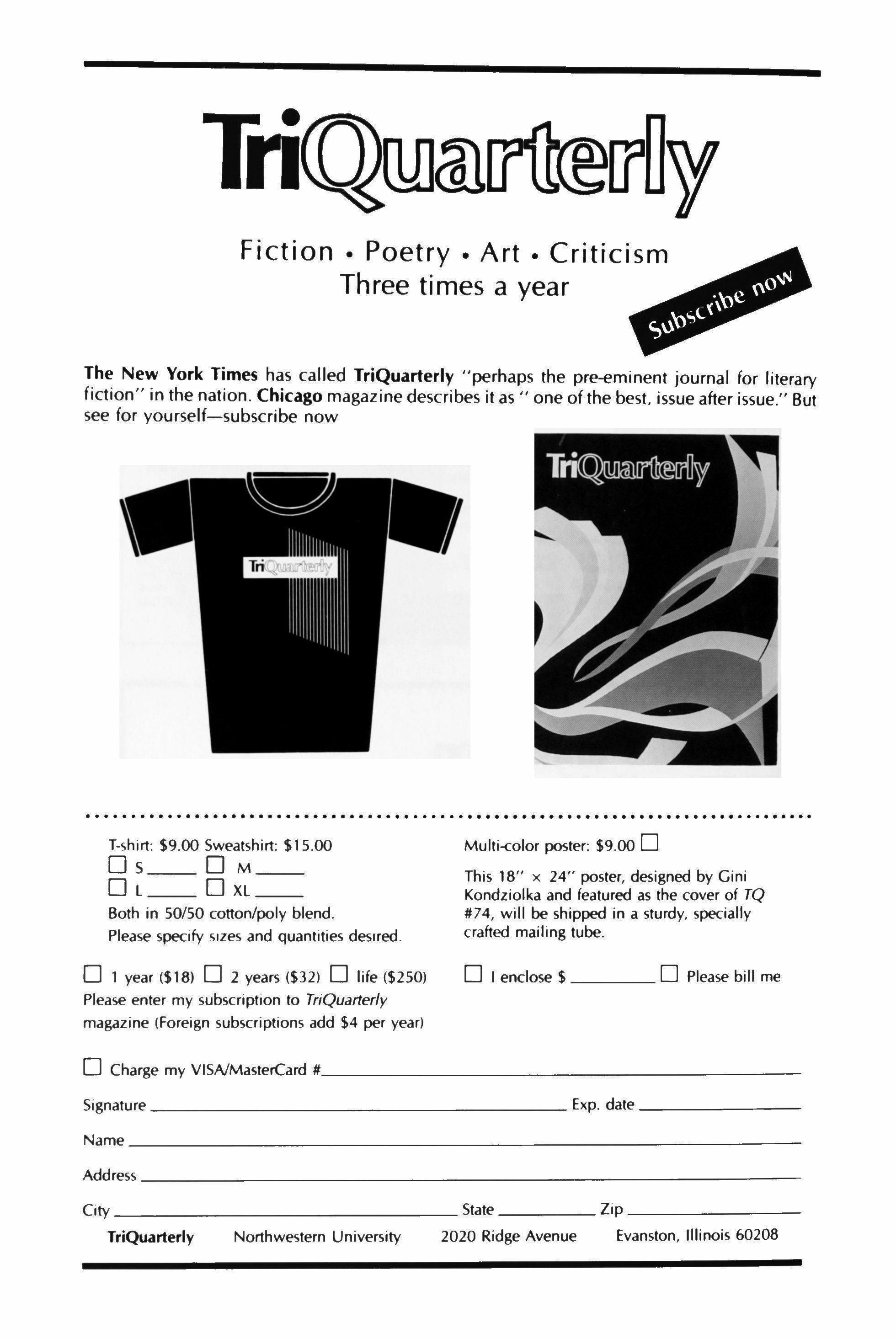
T-shirt: $9.00 Sweatshirt: $15.00 Ds DM
o L 0 XL
Both in 50/50 cotton/poly blend.
Please specify sizes and quantities desired.
o 1 year ($18) 0 2 years ($32) 0 life ($250)
Please enter my subscription to TriQuarterly magazine (Foreign subscriptions add $4 per year)
o Charge my VISNMasterCard #
Multi-color poster: $9.00 0
This 18" x 24" poster, designed by Gini Kondziolka and featured as the cover of TQ #74, will be shipped in a sturdy, specially crafted mailing tube.
o I enclose $ 0 Please bill me
Signature Exp. date
Name
Address City
State Zip TriQuarterly Northwestern University 2020 Ridge Avenue Evanston, Illinois 60208
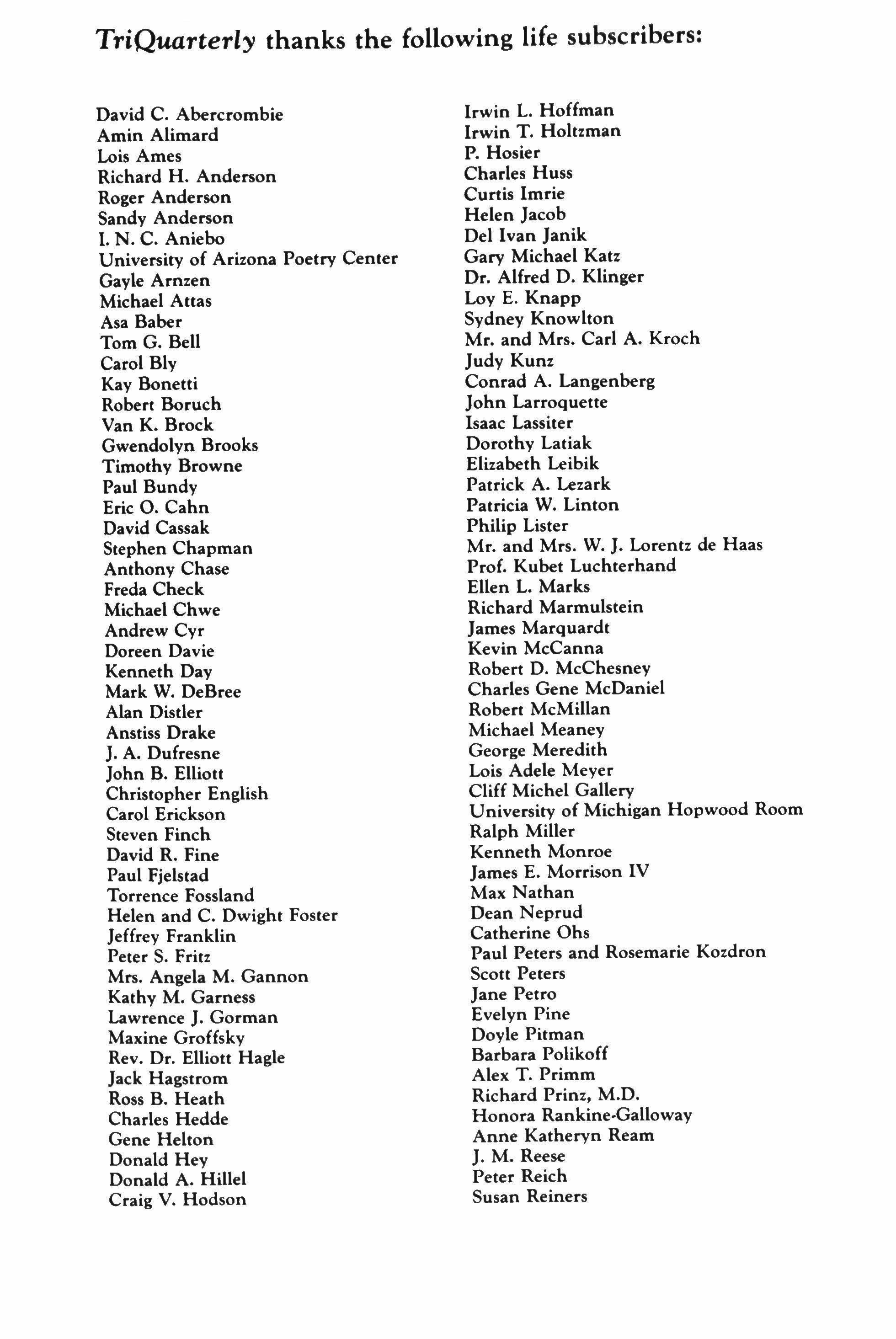
David C. Abercrombie
Amin Alimard
Lois Ames
Richard H. Anderson
Roger Anderson
Sandy Anderson
1. N. C. Aniebo
University of Arizona Poetry Center
Gayle Arnzen
Michael Attas
Asa Baber
Tom G. Bell
Carol Bly
Kay Bonetti
Robert Boruch
Van K. Brock
Gwendolyn Brooks
Timothy Browne
Paul Bundy
Eric O. Cahn
David Cassak
Stephen Chapman
Anthony Chase
Freda Check
Michael Chwe
Andrew Cyr
Doreen Davie
Kenneth Day
Mark W. DeBree
Alan Distler
Anstiss Drake
J. A. Dufresne
John B. Elliott
Christopher English
Carol Erickson
Steven Finch
David R. Fine
Paul Fjelstad
Torrence Fossland
Helen and C. Dwight Foster
Jeffrey Franklin
Peter S. Fritz
Mrs. Angela M. Gannon
Kathy M. Garness
Lawrence J. Gorman
Maxine Groffskv
Rev. Dr. Elliott Hagle
Jack Hagstrom
Ross B. Heath
Charles Hedde
Gene Helton
Donald Hey
Donald A. Hillel
Craig V. Hodson
Irwin L. Hoffman
Irwin T. Holtzman
P. Hosier
Charles Huss
Curtis Imrie
Helen Jacob
Del Ivan Janik
Gary Michael Katz
Dr. Alfred D. Klinger
Loy E. Knapp
Sydney Knowlton
Mr. and Mrs. Carl A. Kroch
Judy Kunz
Conrad A. Langenberg
John Larroquette
Isaac Lassiter
Dorothy Latiak
Elizabeth Leibik
Patrick A. Lezark
Patricia W. Linton
Philip Lister
Mr. and Mrs. W. J. Lorentz de Haas
Prof. Kubet Luchterhand
Ellen L. Marks
Richard Marmulstein
James Marquardt
Kevin McCanna
Robert D. McChesney
Charles Gene McDaniel
Robert McMillan
Michael Meaney
George Meredith
Lois Adele Meyer
Cliff Michel Gallery
University of Michigan Hopwood Room
Ralph Miller
Kenneth Monroe
James E. Morrison IV
Max Nathan
Dean Neprud
Catherine Ohs
Paul Peters and Rosemarie Kozdron
Scott Peters
Jane Petro
Evelyn Pine
Doyle Pitman
Barbara PolikoH
Alex T. Primm
Richard Prinz, M.D.
Honora Rankine-Galloway
Anne Katheryn Ream
J. M. Reese
Peter Reich
Susan Reiners
following
TriQuarterly thanks the
life subscribers:
Don Reynolds
Christopher Richter
Diane Rider
Rivier College
Sam Rosenthal
David Roth, M.D.
Jim Rowe
Patricia Ruby
Joan Rybka
Joel Schilling, D.D.S.
Paul and June Schlueter, Ph.D.s
Mrs. H. C. Schmidt
Robert 1. Schneideman
Hart Frank Schuh
Koji Seki
David A. Selby
Herbert Shore
John Silbersack
Martin Silverman
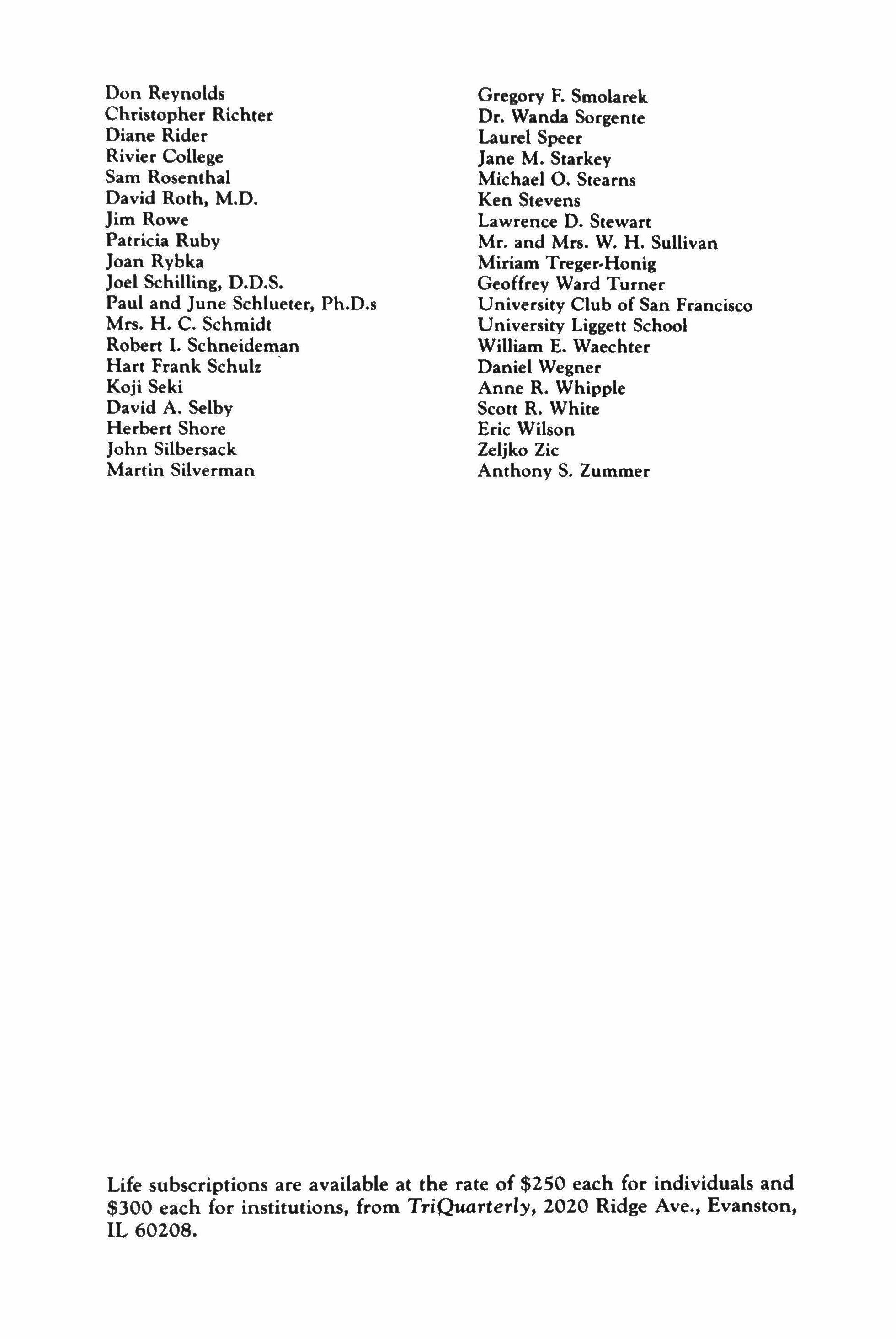
Gregory F. Smolarek
Dr. Wanda Sorgente
Laurel Speer
Jane M. Starkey
Michael O. Stearns
Ken Stevens
Lawrence D. Stewart
Mr. and Mrs. W. H. Sullivan
Miriam Treger-Honig
Geoffrey Ward Turner
University Club of San Francisco
University Liggett School
William E. Waechter
Daniel Wegner
Anne R. Whipple
Scott R. White
Eric Wilson
Zeljko Zic
Anthony S. Zummer
Life subscriptions are available at the rate of $250 each for individuals and $300 each for institutions, from TriQuarterly, 2020 Ridge Ave., Evanston, IL 60208.
Donors to TriQuarterly
We wish to express our thanks to the following donors to TriQuarterly:
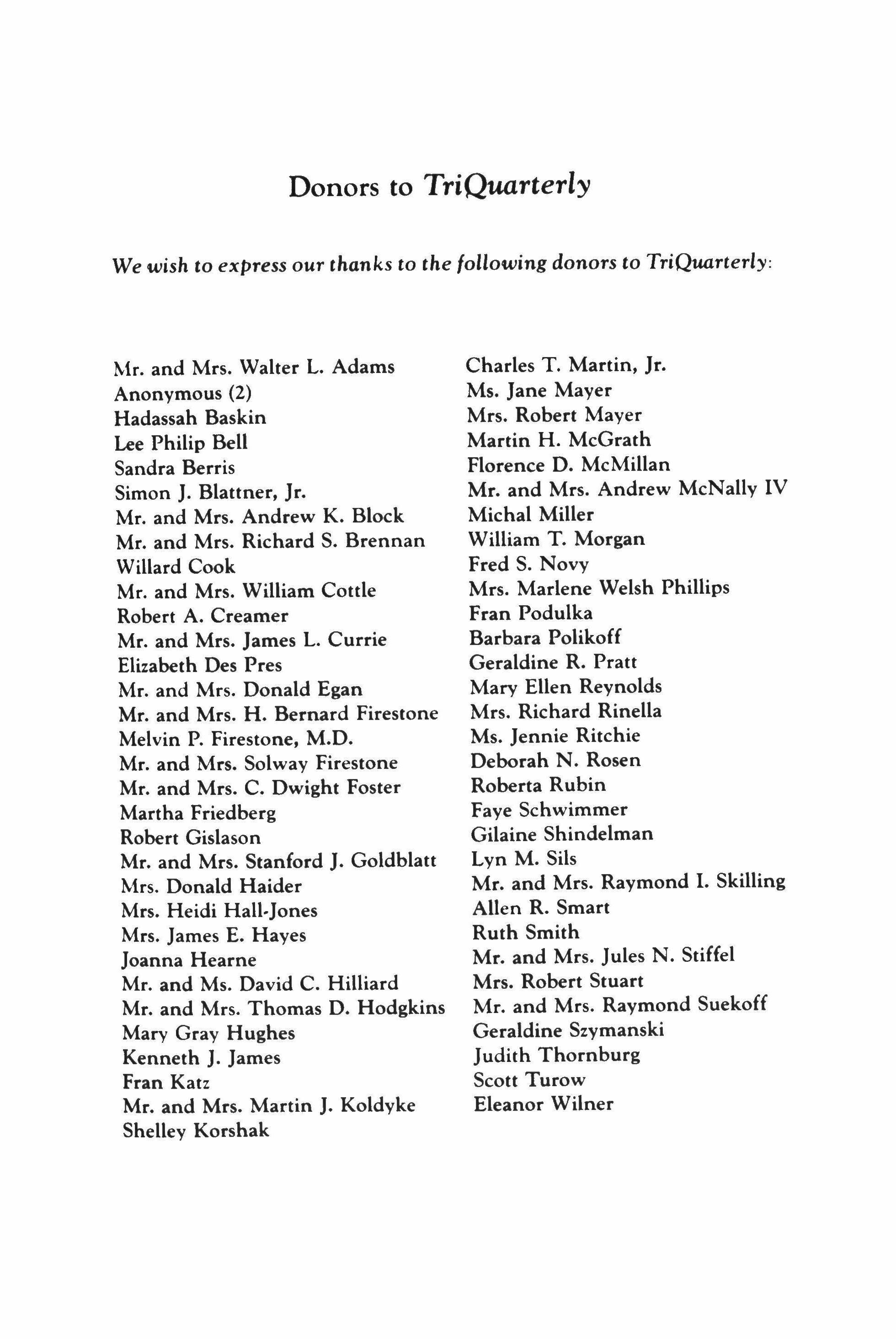
Mr. and Mrs. Walter L. Adams
Anonymous (2)
Hadassah Baskin
Lee Philip Bell
Sandra Berris
Simon J. Blattner, Jr.
Mr. and Mrs. Andrew K. Block
Mr. and Mrs. Richard S. Brennan
Willard Cook
Mr. and Mrs. William Cottle
Robert A. Creamer
Mr. and Mrs. James L. Currie
Elizabeth Des Pres
Mr. and Mrs. Donald Egan
Mr. and Mrs. H. Bernard Firestone
Melvin P. Firestone, M.D.
Mr. and Mrs. Solway Firestone
Mr. and Mrs. C. Dwight Foster
Martha Friedberg
Robert Gislason
Mr. and Mrs. Stanford J. Goldblatt
Mrs. Donald Haider
Mrs. Heidi Hall.Jones
Mrs. James E. Hayes
Joanna Hearne
Mr. and Ms. David C. Hilliard
Mr. and Mrs. Thomas D. Hodgkins
Mary Gray Hughes
Kenneth J. James
Fran Katz
Mr. and Mrs. Martin J. Koldvke
Shelley Korshak
Charles T. Martin, Jr.
Ms. Jane Mayer
Mrs. Robert Mayer
Martin H. McGrath
Florence D. McMillan
Mr. and Mrs. Andrew McNally IV
Michal Miller
William T. Morgan
Fred S. Novy
Mrs. Marlene Welsh Phillips
Fran Podulka
Barbara Polikoff
Geraldine R. Pratt
Mary Ellen Reynolds
Mrs. Richard Rinella
Ms. Jennie Ritchie
Deborah N. Rosen
Roberta Rubin
Faye Schwimmer
Gilaine Shindelman
Lvn M. Sils
Mr. and Mrs. Raymond I. Skilling
Allen R. Smart
Ruth Smith
Mr. and Mrs. Jules N. Stiffel
Mrs. Robert Stuart
Mr. and Mrs. Raymond Suekoff
Geraldine Szymanski
Judith Thornburg
Scott Turow
Eleanor Wilner
